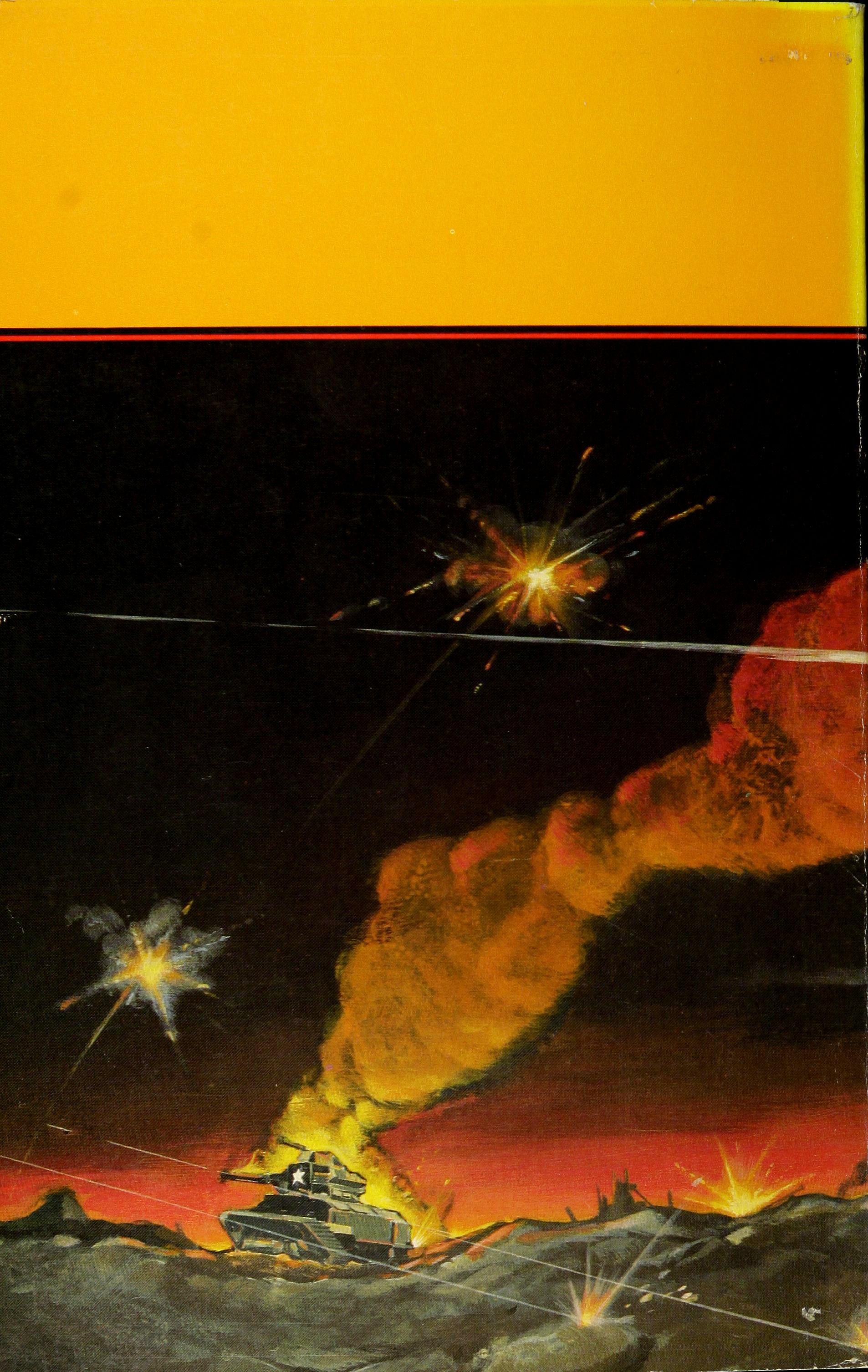

rly4S WARSTOIlIIS

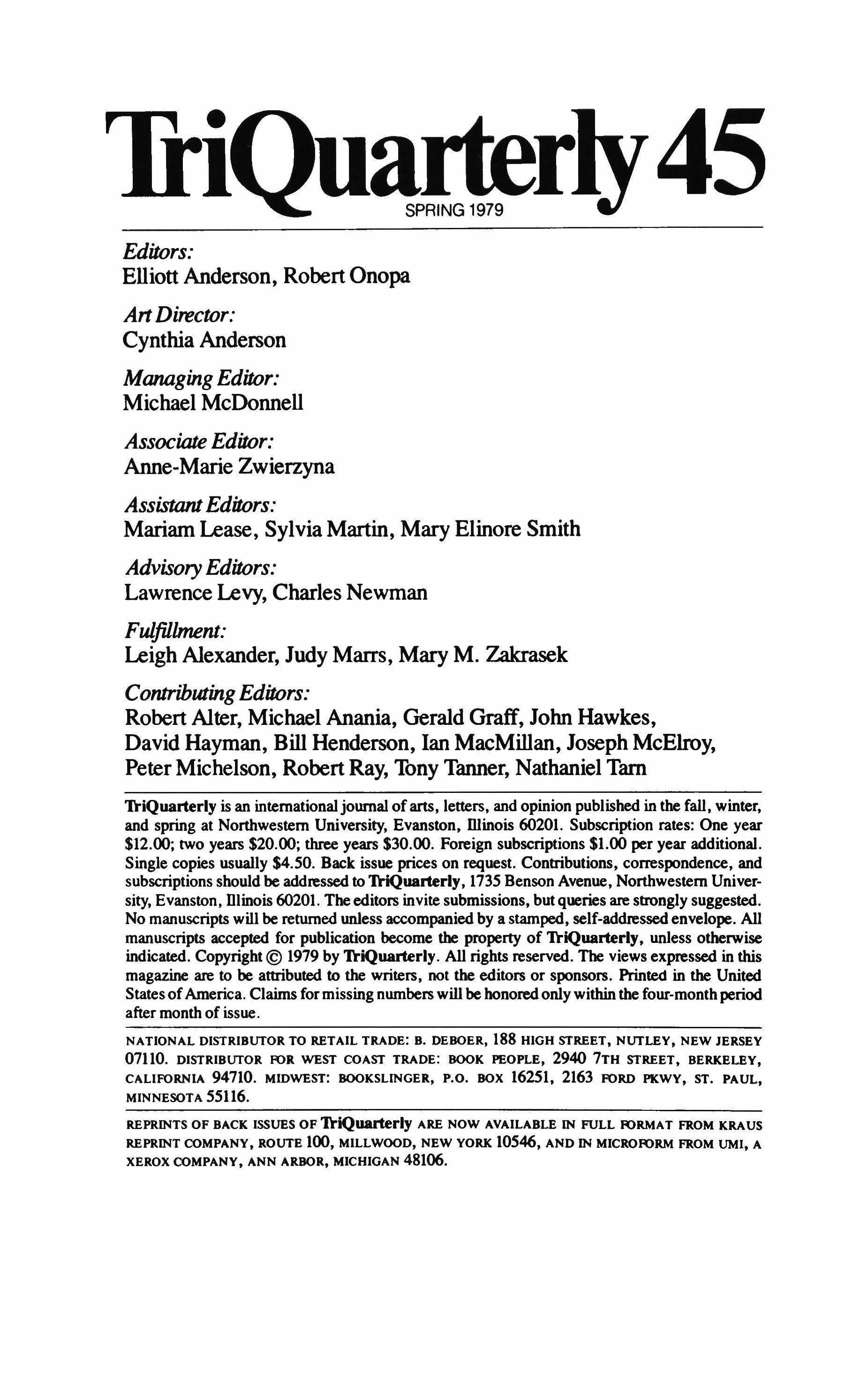
1iiQu��rly45
Editors:
Elliott Anderson, Robert Onopa
AnDirector: Cynthia Anderson
Managing Editor: �ichael�cI)onnell
Associate Editor: Anne-Marie Zwierzyna
AssistantEditors: Mariam Lease, Sylvia Martin, Mary Elinore Smith
AdvisoryEditors: Lawrence Levy, Charles Newman
Fulfillment:
Leigh Alexander, Judy Marrs, Mary M. Zakrasek
Contributing
Editors:
Robert Alter, Michael Anania, Gerald Graff, John Hawkes, David Hayman, Bill Henderson, Ian �ac�illan, Joseph �cElroy, Peter Michelson, Robert Ray, Tony Tanner, Nathaniel Tarn
TriQuarterly is an internationaljournal ofarts, letters, and opinion published in the fall, winter, and spring at Northwestern University, Evanston, Illinois 60201. Subscription rates: One year $12.00; two years $20.00; three years $30.00. Foreign subscriptions $1.00 per year additional. Single copies usually $4.50. Back issue prices on request. Contributions, correspondence, and subscriptions should be addressed to 'liiQuarterly, 1735 Benson Avenue, Northwestern University, Evanston, Dlinois 60201. The editors invite submissions, but queries are strongly suggested. No manuscripts will be returned unless accompanied by a stamped, self-addressed envelope. All manuscripts accepted for publication become the property of TriQuarterly, unless otherwise indicated. Copyright© 1979 by TriQuarterly. All rights reserved. The views expressed in this magazine are to be attributed to the writers, not the editors or sponsors. Printed in the United States ofAmerica. Claims formissing numbers will be honoredonly within the four-monthperiod after month of issue.
NATIONAL DISTRIBUTOR TO RETAIL TRADE: B. DEBOER, 188 HIGH STREET, NUTLEY, NEW JERSEY 07110. DISTRIBUTOR FOR WEST COAST TRADE: BOOK PEOPLE, 2940 7TH STREET, BERKELEY, CALIFORNIA 94710. MIDWEST: BOOKSLINGER, P.O. BOX 16251, 2163 FORD PKWY, ST. PAUL, MINNESOTA 55116.
REPRINTS OF BACK ISSUES OF 'liiQuarterly ARE NOW AVAILABLE IN FULL FORMAT FROM KRAUS REPRINT COMPANY, ROUTE 100, MILLWOOD, NEW YORK 10546, AND IN MICROFORM FROM UMI, A XEROX COMPANY, ANN ARBOR, MICHIGAN 48106.


Coverpainting and interior illustrations byRon Villani

Star of David!
Jay Neugeboren

Horses! Horses! Horses! They rear up around me and I slash at their legs with the side of my saber. The family crouches behind me. I hold the boyagainst my side with my left arm. His sister clutches at my leg and weeps inconsolably. I hearwailing and crackling. I see fire leaping around us, in a ring that extends for miles, far beyond the circle of horses. I smell the horses' rankness and feel their warm, sweat-laden bodies. Their flanks are enormous. I fear being crushed. Their veined eyes are crazed with fright. Their enormous lips unfold and they bare their teeth at me. Steam rises from their bodies into the freezing air. They heave and rush about, and I shout at them to go back. Their masters have little control over them. Suddenly I slip

and I am underneath the swollen belly of a horse, and I see that the belly is smeared with blood. With my saber I jab at its thighs and chop at its forefeet. It moves off and I can breathe again. A riderless horse now risesatmy left,its hooves thrashing the air, and I bury the boy beneath me, my body pressed down upon his, and I pray. I glance up and see that the horse's hollow hooves are clotted with mud and snow and dead grass. The horse whinnies and its hooves strike at the snow beside my boots, but miraculously I am not touched.
Do I dream? The horses are taller than the houses. They are wider than the night. I long to slit their bellies and plunge my cold hands in, deep into the steaming blood and entrails. There would I find comfort! In my heart I know the frenzy the Tartars and Cossacks feel when the wild Tarpan horses steal their stores ofhay and entice away their mares. I have seen them kill entire herds of these small-boned and beautiful creatures. I have seen them feast and drink afterward. There is nothing I have not seen.
Now the Jews are leaving Kiev-expelled at midnight by order of the tsar-and I, in myoid soldier's uniform, am among them, a traitor to the army I served for so many years. When the fires began, I took my uniform out ofthe chest next to my bed and I fled from the city, to stand with a cavalry regiment on a small hillside and to watch the lines of weeping Jews, with their nags and their barrows, their broken-down droshkies and their packs, setting westward from the city in the middle of the night. They trudged through snow, wailing and chanting like madmen. The soldiers raced their horses at them now and again, and swung their swords, but more to keep warm than for the pleasures of cruelty. I held back and watched. The sky was bright with fire and falling snowflakes. The night was windless. My own horse was strong and wellrested.
I watched the exodus and it fulfilled my every hope. Jewish backs were bent and Jewish eyes were frightened. At last! How I had hated their devils' eyes! How I had loathed the black pools in those eyes, those pools deep with schemes and lies and tricks! When I approached, in my uniform, they stared at me with such fear-with such frank servility and submissiveness-that I longed to pierce those dark eyes with my dagger, to stab through the veil of fear and suffering to the flesh beneath.
I watched children riding on the backs of their fathers, old men

sitting in the snow and pleading for mercy, young men beating their own fathers with whips and branches to make them rise and go on. Yet all the while I felt nothing but scorn for them. They were dirty and verminous, vile and odorous, a curse on mankind. Wherever they went, they carried with them their plagues and diseases, their books and their lies. How I relished their anguish! Their eyes were phlegm-drenched, their noses large and red and dripping, the men's beards tangled with grease and crumbs and scabs, the women's and children's scalps encrusted with sores. The chosen people, I laughed to myself. The chosen people! They were the ones who chose to be different. They were the ones who declared themselves the anointed of God. Then let them now reap the grim harvest!
Even the rich Jews were bent over, and this satisfied me most of all. What will you do with all your money now? I asked. Tell me that. What will you do with your walls of books and your silk clothing and your gilt-edged furniture and your chests of coins? Now at last you will be real Jews too-now you will feel what I have felt forever. Now you will suffer the way my father suffered and my mother suffered, and the way their fathers and mothers suffered before them. Now you will pay for their suffering! Except, I thought, you will not be as strong and cunning as I have been, and you will not know how to survive your suffering. You will wander as wandering Jews have always wandered, but, set loose in the wilds of Mother Russia, you will not, like me, know how to find and kill animals where no animals can be seen, or to keep warm when you have no heated home, or to stave off disease when you have no doctors.
I saw a family of wealthy Jews walking among a mass of poor Jews. The poor Jews made way for them. The father walked in front, his body almost erect. He wore a hat of gleaming black lamb's wool; a coat with a fur collar. He wore precious eyeglasses, rimmed in gold, and he carried nothing except a single book in a gloved hand. His wife, in black silk and foxfurs, walked three steps behind him, and behind her there walked a man and a womanperhaps a daughter and son, perhaps a husband and wife-carrying bundles in their arms. There were smaller children behind them, dressed luxuriously, like dwarf merchants, and there were servants behind them, pushing barrows and pulling wagons of clothing and furniture and food.
A soldier charged at them, his saber slicing circles in the air

above his head. But the Jew did not bow down. His wife knelt, her hands upon the back of her neck. The children huddled together and screamed. The soldier taunted the Jew but did not kill him. He took the Jew's hat and then he leaned down from his horse and tore the Jew's coat from him. The Jew gave him money and rings. The wife gave the soldier silver candlesticks, a golden menorah. The servants foraged frantically in the wagons, finding more giftsjewelry and silver and spice boxes and pots and silk and dresses and food and coins.
When the soldier returned to our lines, laden down with his spoils, we laughed and cheered him. He carried a woman's undergarment on the tip of his sword. But the rich Jew walked on, bareheaded through the snow, as if he were too proud to even glance back at us and acknowledge what had occurred. How I loathed him then! And how I envied his riches and his family and his pride! I watched him fade into the white landscape, a crown of snow upon his bare head, and I cursed his soul. I thought of the old joke my father had told me when I was a child, a joke I had repeated to my fellow soldiers many times through the years, but which I dared not repeat now. If a rich Jew should ever want to know how he can live forever and gain immortality, my father said, you- must tell him that the secret is to come and settle in our town. Then, before he spokeagain, my father would pause and his eyes would twinkle. No rich Jew ever died here, he would say.
Soon word was given that the bulk of the Jews were gone from Kiev and that the soldiers had permission to return. I returned with them. Their bloodcurdling screams ofjoy brought comfort to my soul. I raced my horse with theirs, even as they cut through the long lines of Jews, knocking them down and trampling upon their ragcovered bodies. Once I pulled my horse to, when I was stopped by an old woman rising from a snowdrift as ifshe had been livingin it. "Bread!" she cried to me, her empty hands trembling in the air. "Children!" she cried. "Bread and children! Bread! Bread! Bread and children!" But what were her losses to me? Her eyes were crazed, her lips seemed to be exploding in small boils. I was furious with her. I dipped my saber down and cut through the snow, to frozen earth. I dislodged some of it, and I flung it at her so that her mouth was filled with it-then my lungs filled with marvelous warmth, and I raced on to the city. Was I dreaming, even then? Had she been there? Was there anyone to whom I could tum to ask if I
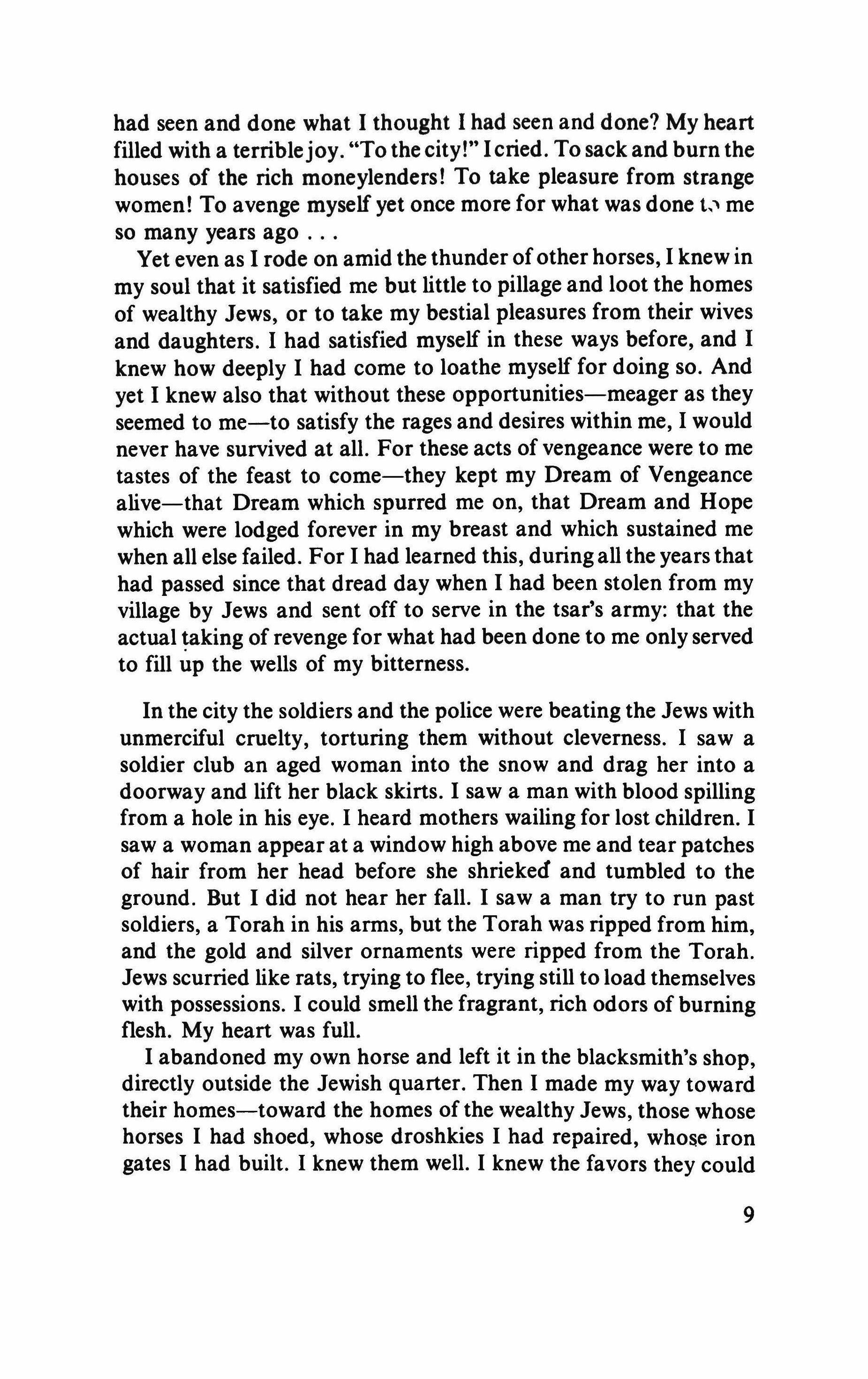
had seen and done what I thought I had seen and done? My heart filled with a terriblejoy. "To the city!" Icried. To sack and burn the houses of the rich moneylenders! To take pleasure from strange women! To avenge myself yet once more for what was done t.' me so many years ago
Yet even as I rode on amid the thunder ofother horses, I knew in my soul that it satisfied me but little to pillage and loot the homes of wealthy Jews, or to take my bestial pleasures from their wives and daughters. I had satisfied myself in these ways before, and I knew how deeply I had come to loathe myself for doing so. And yet I knew also that without these opportunities-meager as they seemed to me-to satisfy the rages and desires within me, I would never have survived at all. For these acts of vengeance were to me tastes of the feast to come-they kept my Dream of Vengeance alive-that Dream which spurred me on, that Dream and Hope which were lodged forever in my breast and which sustained me when all else failed. For I had learned this, during all the years that had passed since that dread day when I had been stolen from my village by Jews and sent off to serve in the tsar's army: that the actual taking of revenge for what had been done to me only served to fill up the wells of my bitterness.
In the city the soldiers and the police were beating the Jews with unmerciful cruelty, torturing them without cleverness. I saw a soldier club an aged woman into the snow and drag her into a doorway and lift her black skirts. I saw a man with blood spilling from a hole in his eye. I heard mothers wailing for lost children. I saw a woman appear at a window high above me and tear patches of hair from her head before she shrieked and tumbled to the ground. But I did not hear her fall. I saw a man try to run past soldiers, a Torah in his arms, but the Torah was ripped from him, and the gold and silver ornaments were ripped from the Torah. Jews scurried like rats, trying to flee, trying still to load themselves with possessions. I could smell the fragrant, rich odors of burning flesh. My heart was full.
I abandoned my own horse and left it in the blacksmith's shop, directly outside the Jewish quarter. Then I made my way toward their homes-toward the homes of the wealthy Jews, those whose horses I had shoed, whose droshkies I had repaired, whose iron gates I had built. I knew them well. I knew the favors they could

buy, from the police and from the army and from the government. And I knew in which houses lived the members ofthe Kehilla. Here, as in the village in which I had been born, they were the worms who, in their vanity, believed themselves to be the chosen of the chosen-the most beautiful of God's creatures. But now, their houses in flames, though they would crawl upon their bellies, they were not even cunning serpents. What will befall all Jews, I thought, remembering the old saying, will befall each Jew. Forever and forever and forever! No longer would they prey upon poor Jews, no longer would they live without fear. Their feast was done and I would have my way with them.
But most of their houses were already deserted and in ruins. The soldiers and police had been there before me. I had stayed too long outside the city. Still, I took my pleasures-I smashed windows and goblets, I slashed at furniture and walls, I searched for hidden treasures in floors and ceilings. I drank and grew dizzy. I threw my arms around the shoulders of my fellow soldiers and I kissed them with abandon. We poured marvelous curses on the Jews. Maythey wander forever in the snow with the howling ofwolves in their ears! May their feet and hands freeze and may we be there, in our mercy, to pour boiling water upon their toes and fingers! Maythe mothers live to see their daughters violated by the horses of Turks!
Then I heard the screams of a solitary wealthy Jew, who had not yet fled, and my heart thrilled as I rushed through the door of his house. But three policemen were alreadythere, laughing raucously. The room had been ravaged. Against a wall I saw the back of another policeman, bent over. Underneath him a boy with startled and pained eyes stared to the side, in horror. He was halfdressed. I followed the boy's eyes and I saw that the other policemen were forcing the mother to watch this unnatural act, a knife at her throat. My dull senses were suddenly on fire, and it was not the screaming in the room that had enflamed them, and awakened me.
Rather, it was the sound of gentle breathing which made me tum. An old man sat against a wall, abandoned by the policemen. His daughter lay next to him, her eyes covered with her forearm, in shame. She clutched at her legs, but I saw no blood. The old man stared across the room, his eyes wide and blind-and when I looked into them and he did not look back, it was as if, in the deep pools of those eyes, I could suddenly see myself, and my own father's suffering, when I had been taken from him.

I had seen men couple with other men before. I had seen men kill other men and violate small children. I had seen men in the most abominable acts. I had seen them perform with animals. I had seen men torn apart by wolves, and I had, in the coldest winters, not even turned my eyes away when starving men sustained themselves by the only means possible, when all help was gone and their comrades lay dead and frozen beside them. There was nothing I had not seen during the many years since I was first stolen from my father's house, taken by the Kehilla, and sent away to serve for twenty-five years in the tsar's army.
And suddenly I was that little boy again-the boy who had once been his father's hope and dream. All had been sacrificed so that I might study and become a man of learning, for in me, my father believed, God had planted a special gift. I was my father's jewel. Unlike him, and unlike my brothers and sisters, who were good and hardworking Jews, I had been chosen by God, my father believed, to serve Him with my mind. Myfather dreamed ofseeing me sit one day in the synagogue along the eastern wall, with the other honored and learned men of the community. He dreamed ofseeing me sit at the right hand of our Rebbe, studying Talmud. How cruel his dreams! How vain his hopes! But how wonderful his clear brown eyes when he heard me read and called my brothers and sisters to hear me! Worship was the highest expression of love, he had been taught, and study was the highest form of worship. He held my hands and touched my fingers gently, and he told me that they would always remain pale and fine, like a scholar's-never rough and broken like his own. Never would I be an amoretz like himself! Never! Never
How proud his eyes when the Rebbe of Burshtyn came to our meager dwelling one evening to tell my father that yes, there was a special quality that God had put into my soul which made it incumbent upon the Rebbe to take me as his pupil, without fees. My father counted the Rebbe's words as if they were pearls. The Rebbe praised my father for having borne me into the world and for having protected me until that day. Jews, he said, were like unto a vine of which the grapes represent the scholars and the leaves the simple folk. I hung upon his words and they made their way into my heart and I never forgot them. The leaves of the vine had two important tasks-they were essential to the growth ofthe vine, and they protected the grapes-and therefore they were of greater
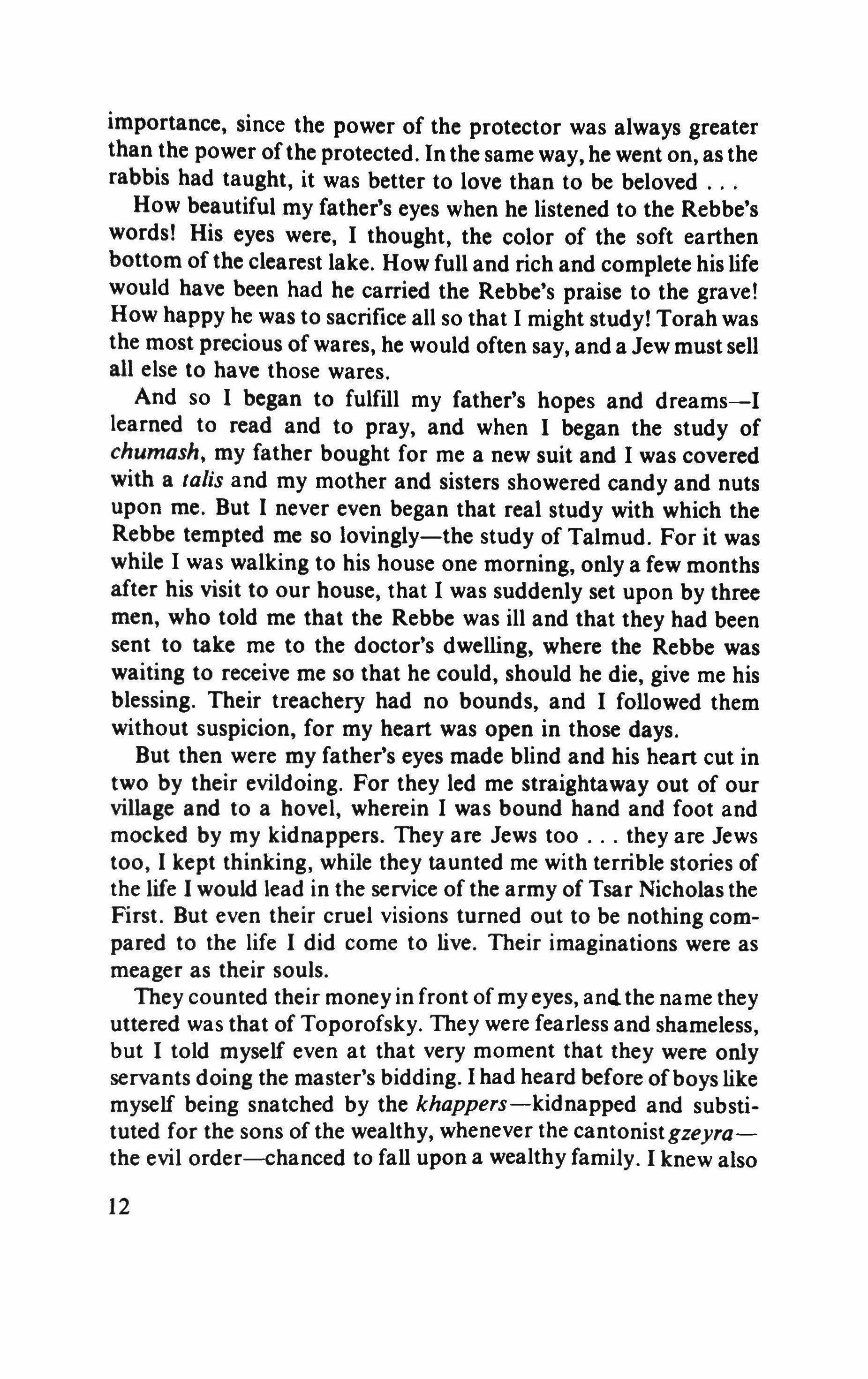
importance, since the power of the protector was always greater than the power ofthe protected. In the same way, he went on, as the rabbis had taught, it was better to love than to be beloved
How beautiful my father's eyes when he listened to the Rebbe's words! His eyes were, I thought, the color of the soft earthen bottom of the clearest lake. How full and rich and complete his life would have been had he carried the Rebbe's praise to the grave! How happy he was to sacrifice all so that I might study! Torah was the most precious of wares, he would often say, and a Jew must sell all else to have those wares.
And so I began to fulfill my father's hopes and dreams-I learned to read and to pray, and when I began the study of chumash, my father bought for me a new suit and I was covered with a talis and my mother and sisters showered candy and nuts upon me. But I never even began that real study with which the Rebbe tempted me so lovingly-the study of Talmud. For it was while I was walking to his house one morning, only a few months after his visit to our house, that I was suddenly set upon by three men, who told me that the Rebbe was ill and that they had been sent to take me to the doctor's dwelling, where the Rebbe was waiting to receive me so that he could, should he die, give me his blessing. Their treachery had no bounds, and I followed them without suspicion, for my heart was open in those days.
But then were my father's eyes made blind and his heart cut in two by their evildoing. For they led me straightaway out of our village and to a hovel, wherein I was bound hand and foot and mocked by my kidnappers. They are Jews too they are Jews too, I kept thinking, while they taunted me with terrible stories of the life I would lead in the service of the army of Tsar Nicholas the First. But even their cruel visions turned out to be nothing compared to the life I did come to live. Their imaginations were as meager as their souls.
They counted their money in front of my eyes, ami the name they uttered was that of Toporofsky. They were fearless and shameless, but I told myself even at that very moment that they were only servants doing the master's bidding. I had heard before ofboys like myself being snatched by the khappers-kidnapped and substituted for the sons of the wealthy, whenever the cantonistgzeyrathe evil order-chanced to fall upon a wealthy family. I knew also
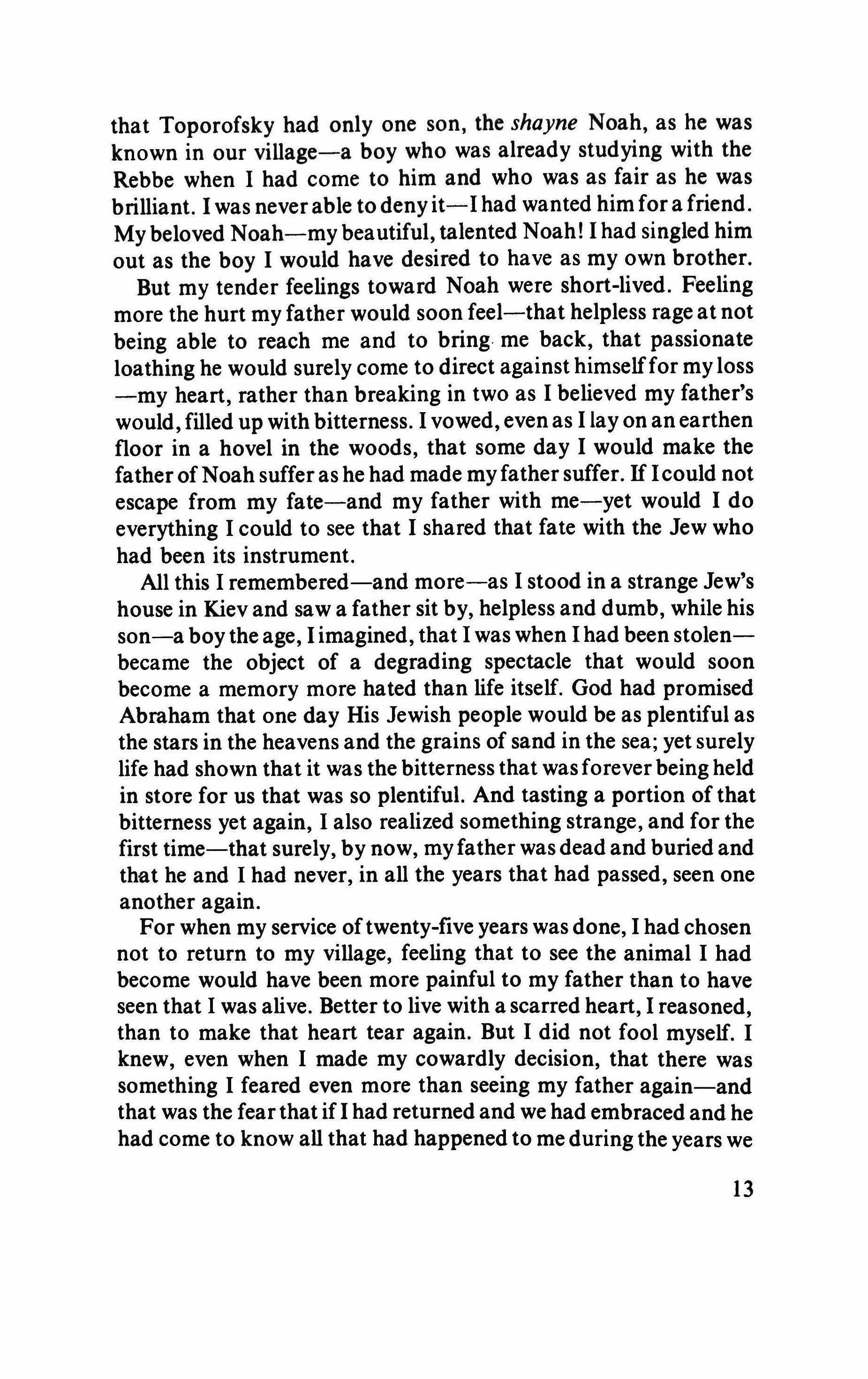
that Toporofsky had only one son, the shayne Noah, as he was known in our village-a boy who was already studying with the Rebbe when I had come to him and who was as fair as he was brilliant. Iwas never able to deny it-I had wanted him fora friend. My beloved Noah-my beautiful, talented Noah! I had singled him out as the boy I would have desired to have as my own brother.
But my tender feelings toward Noah were short-lived. Feeling more the hurt my father would soon feel-that helpless rage at not being able to reach me and to bring me back, that passionate loathing he would surely come to direct against himselffor my loss -my heart, rather than breaking in two as I believed my father's would, filled up with bitterness. I vowed, even as I lay on an earthen floor in a hovel in the woods, that some day I would make the father of Noah suffer as he had made my father suffer. If Icould not escape from my fate-and my father with me-yet would I do everything I could to see that I shared that fate with the Jew who had been its instrument.
All this I remembered-and more-as I stood in a strange Jew's house in Kiev and saw a father sit by, helpless and dumb, while his son-a boy the age, I imagined, that I was when I had been stolenbecame the object of a degrading spectacle that would soon become a memory more hated than life itself. God had promised Abraham that one day His Jewish people would be as plentiful as the stars in the heavens and the grains of sand in the sea; yet surely life had shown that it was the bitterness that was forever being held in store for us that was so plentiful. And tasting a portion of that bitterness yet again, I also realized something strange, and for the first time-that surely, by now, my father was dead and buried and that he and I had never, in all the years that had passed, seen one another again.
For when my service oftwenty-five years was done, I had chosen not to return to my village, feeling that to see the animal I had become would have been more painful to my father than to have seen that I was alive. Better to live with a scarred heart, I reasoned, than to make that heart tear again. But I did not fool myself. I knew, even when I made my cowardly decision, that there was something I feared even more than seeing my father again-and that was the fear that if I had returned and we had embraced and he had come to know all that had happened to me during the years we
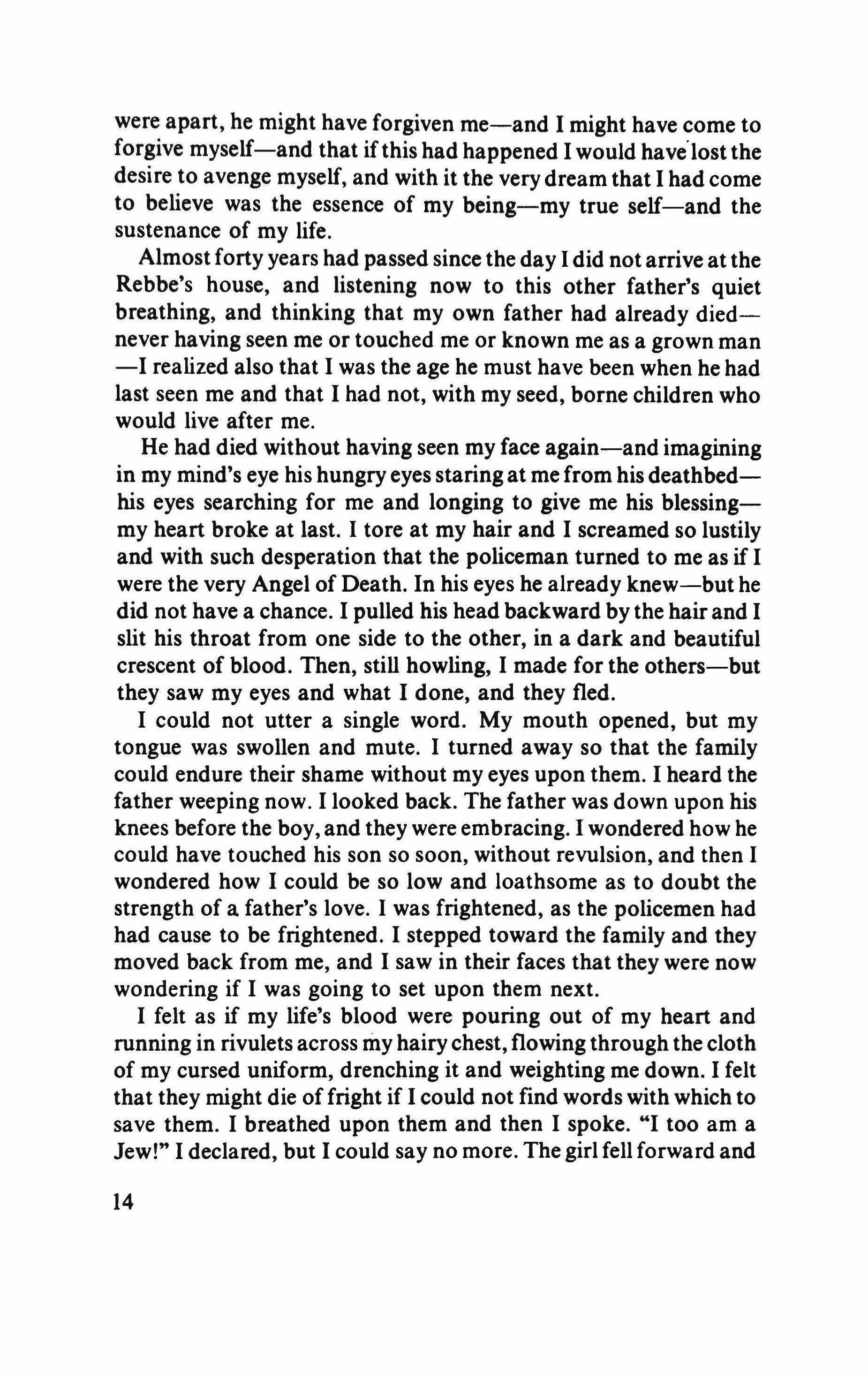
were apart, he might have forgiven me-and I might have come to forgive myself-and that ifthis had happened I would have'lost the desire to avenge myself, and with it the very dream that I had come to believe was the essence of my being-my true self-and the sustenance of my life.
Almost forty years had passed since the day I did not arrive at the Rebbe's house, and listening now to this other father's quiet breathing, and thinking that my own father had already diednever having seen me or touched me or known me as a grown man -I realized also that I was the age he must have been when he had last seen me and that I had not, with my seed, borne children who would live after me.
He had died without having seen my face again-and imagining in my mind's eye his hungry eyes staring at me from his deathbedhis eyes searching for me and longing to give me his blessingmy heart broke at last. I tore at my hair and I screamed so lustily and with such desperation that the policeman turned to me as if I were the very Angel of Death. In his eyes he already knew-but he did not have a chance. I pulled his head backward by the hair and I slit his throat from one side to the other, in a dark and beautiful crescent of blood. Then, still howling, I made for the others-but they saw my eyes and what I done, and they fled.
I could not utter a single word. My mouth opened, but my tongue was swollen and mute. I turned away so that the family could endure their shame without my eyes upon them. 1 heard the father weeping now. I looked back. The father was down upon his knees before the boy, and they were embracing. 1 wondered how he could have touched his son so soon, without revulsion, and then I wondered how 1 could be so low and loathsome as to doubt the strength of a father's love. I was frightened, as the policemen had had cause to be frightened. 1 stepped toward the family and they moved back from me, and I saw in their faces that they were now wondering if 1 was going to set upon them next.
1 felt as if my life's blood were pouring out of my heart and running in rivulets across myhairychest, flowingthrough the cloth of my cursed uniform, drenching it and weighting me down. 1 felt that they might die of fright if I could not find words with which to save them. I breathed upon them and then I spoke. "I too am a Jew!" I declared, but 1 could say no more. The girl fell forward and

clutched at my leg, uncovering her eyes. The father bowed his head, and, still on his knees, he began to give me his blessing. I stopped him and I spread my arms and they came to me. I would be their protector! I showed them the door, and made signs to them with my hand and with my knife. They understood. We would go out into the streets and make our way, with other Jews, past soldiers and horses and burning buildings, and I would save them. I felt delirious. I bent over the policeman and I removed the jacket of his uniform, so as to cover his face, and when I did I found -may God forgive me as He will surely never forgive him!-that against his bloodstained undergarments he too wore the silver Star of David.
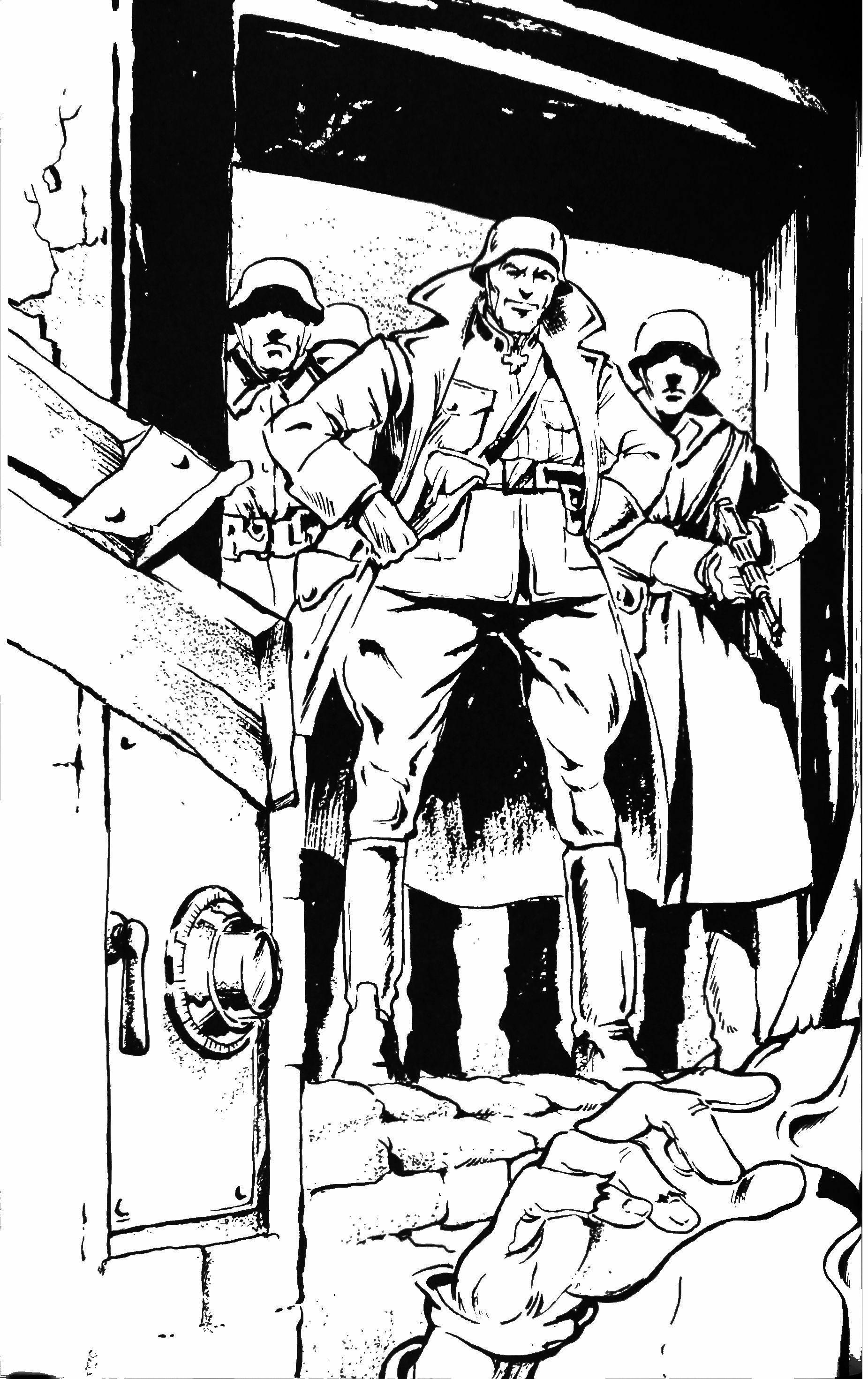
i Thieves' fate
Milovan Djilas
We knew the Germans were tough, but we hoped that at least the Occupation would usher in a kingdom ofthieves. After all, it was a time of anarchy.
And that was the way it almost happened. The police ran off or were killed in air raids, traffic was jammed, and there was a scarcity of just about everything. But apparently a kingdom of thieves was a long way off, if attainable at all.
When the Germans entered the gutted and deserted city, they established a curfew. After dusk they fired at everything that moveddogs, cats, rats. They strangled the night; it ceased to be the golden time of the lover, the thief, the rebel.
Copyright e 1978 Harcourt Brace Jovanovich, Inc. All rights reserved.
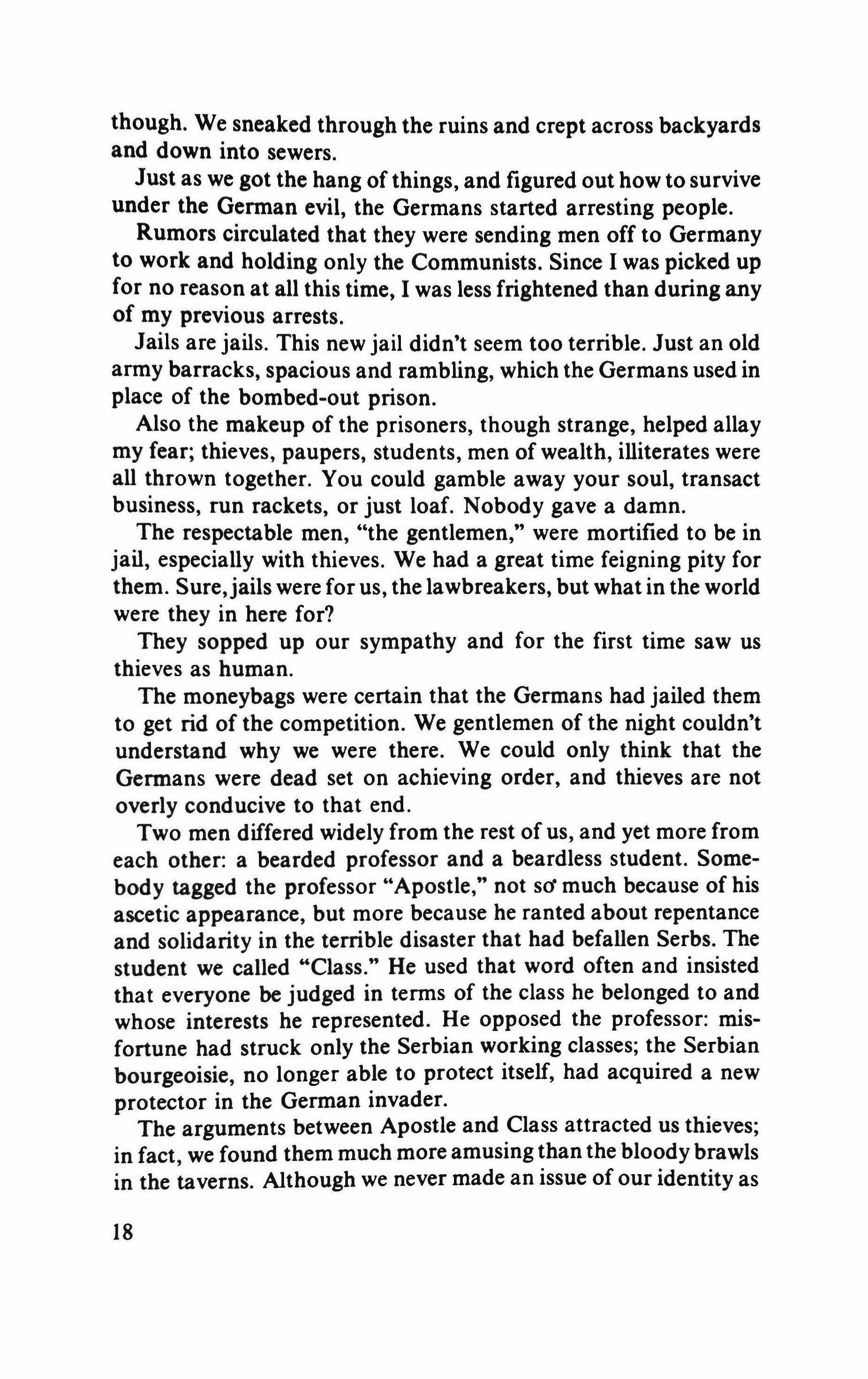
though. We sneaked through the ruins and crept across backyards and down into sewers.
Just as we got the hang of things, and figured out how to survive under the German evil, the Germans started arresting people.
Rumors circulated that they were sending men off to Germany to work and holding only the Communists. Since I was picked up for no reason at all this time, I was less frightened than during any of my previous arrests.
Jails are jails. This new jail didn't seem too terrible. Just an old army barracks, spacious and rambling, which the Germans used in place of the bombed-out prison.
Also the makeup of the prisoners, though strange, helped allay my fear; thieves, paupers, students, men of wealth, illiterates were all thrown together. You could gamble away your soul, transact business, run rackets, or just loaf. Nobody gave a damn.
The respectable men, "the gentlemen," were mortified to be in jail, especially with thieves. We had a great time feigning pity for them. Sure,jails were for us, the lawbreakers, but what in the world were they in here for?
They sopped up our sympathy and for the first time saw us thieves as human.
The moneybags were certain that the Germans had jailed them to get rid of the competition. We gentlemen of the night couldn't understand why we were there. We could only think that the Germans were dead set on achieving order, and thieves are not overly conducive to that end.
Two men differed widely from the rest of us, and yet more from each other: a bearded professor and a beardless student. Somebody tagged the professor "Apostle," not sci much because of his ascetic appearance, but more because he ranted about repentance and solidarity in the terrible disaster that had befallen Serbs. The student we called "Class." He used that word often and insisted that everyone be judged in terms of the class he belonged to and whose interests he represented. He opposed the professor: misfortune had struck only the Serbian working classes; the Serbian bourgeoisie, no longer able to protect itself, had acquired a new protector in the German invader.
The arguments between Apostle and Class attracted us thieves; in fact, we found them much more amusing than the bloody brawls in the taverns. Although we never made an issue of our identity as

Serbs, we couldn't help feeling like Serbs. And although we didn't belong to the working class, except when we were forced to, we knew we'd never become bourgeois.
Apostle warned us: "They'll exterminate all Serbs. They'll snuff out the Serbian candle." Class objected: "The rich never cared much whether they were Serbs or not. The people are indestructible-they'll take up arms and ensure their survival." We were not intimidated by the doom in Apostle's voice or heartened by Class's pluck. The thieves' worries were mundane: food, tobacco, sex, gambling-and, of course, figuring out ways to escape. But the gentlemen were terrified. They rapidly wilted on their unaccustomed regimen of dry bread and hard beds. They were in absentminded agreement with Apostle. On the other hand, Class, with his confident air, made quite an impression on the students and the workers, who were eager for a fight and for a future.
One thing drove Apostle to despair, while it confirmed Class's suspicions. The same guards and officials who had formerly served the state now served the enemy. The thieves, however, were apt to regard this as auspicious. The masters had changed and life had become different, but jails remained more or less the same.
Another thing worried us all, and that was the fact that no food, messages, or clean clothes got through to us from our women. Not even the educated prisoners could recall reading in their books that such a thing ever happened. We all hoped it was temporary. Nothing, not even the Germans, could stop women from taking care of their men.
We could learn nothing from the guards, not even from the two Ilijas of formertimes-Ilija the Flail, a sergeant, and Ilija the Cake, a detective.
These two Ilijas had been notorious for so long that criminals had heard of them before entering the prison. Injails, only faceless, formless men keep their real names. So the two Ilijas were known to everyone, including the officials, by their nicknames, Flail and Cake. And though Cake was hardly kind, Flail was worse. When he beat a man, a flailing would have felt better.
In his youth, Cake had been a burglar. Today burglars are the aristocracy ofthe underworld, its champions; their work is dangerous and they don't talk. No one ever learned what made Cake tum policeman. There were two versions, both impossible to verify: first, that a girl refused to marry him unless he mended his ways

and, second, that he started loathing himselfwhen he opened a safe and heard the woman of the house moan as ifthe safe had been her child. In any case, he soon became a most dreaded detective. He knew legions of thieves and burglars, and could tell the lawbreaker from the way a job was done. He never hit anyone except when someone resisted or attacked him, at which time a different Cake was released, powerful and cruel. He never forgot or forgave anything, no matter how trivial. He developed an elaborate, evil network of informers, not the usual prostitutes, pickpockets, waiters, and janitors but prisoners and their families. Cake did many favors for those he so diligently sent to prison. He carried messages to their families, brought back clothing and food, and protected the prisoners from Flail and other sadists. He was immune equally to thanks and to curses. In his dark eyes, sheltered by thick brows and long lashes, there was an ever-present sadness. His sadness was for human suffering and human pleasure, both unappeasable, and for immutable human lawlessness-essentially unfathomable.
Flail was a peasant and desperately eager to serve in the army so he could eventually become a policeman. He was a fair-haired, square-headed mountain of a man, with huge hands. To him, men were guilty by virtue oftheir imprisonment, and he felt it his duty to beat them every chance he got, unless someone higher up ordered otherwise. He battered the prisoners passionately, to compensate for his despair at being condemned to a lowlyand mean profession. He pounded them with his fists, punching ribs and kidneys, till he was out of breath. Then he'd really go wild and continue until his victims lost consciousness or spat blood. For them, jail brought back memories of bloody spots on the cobblestones in the prison yard. Flail hated prisoners. He forced them to scrub the concrete floors and polish the tin shit-buckets, bellowing, "If it were up to me there'd be no more jails. No more prisoners. I'd exterminate you like ticks!" When bread was handed out, he'd bark, "Take it, and goto hell! IfI had my way, you'd all be dead, like dogs in the night!"
So God had arranged it: outside, Cake was the scourge; inside, it was Flail.
Strange though it sounds, we expected an explanation from Flail for the senseless arrest of hundreds of men-hundreds in our prison alone. Maybe it wasn't that senseless. Everything had turned upside down, and not even Flail could go on being what he was before the Occupation. His homeland had become part of a
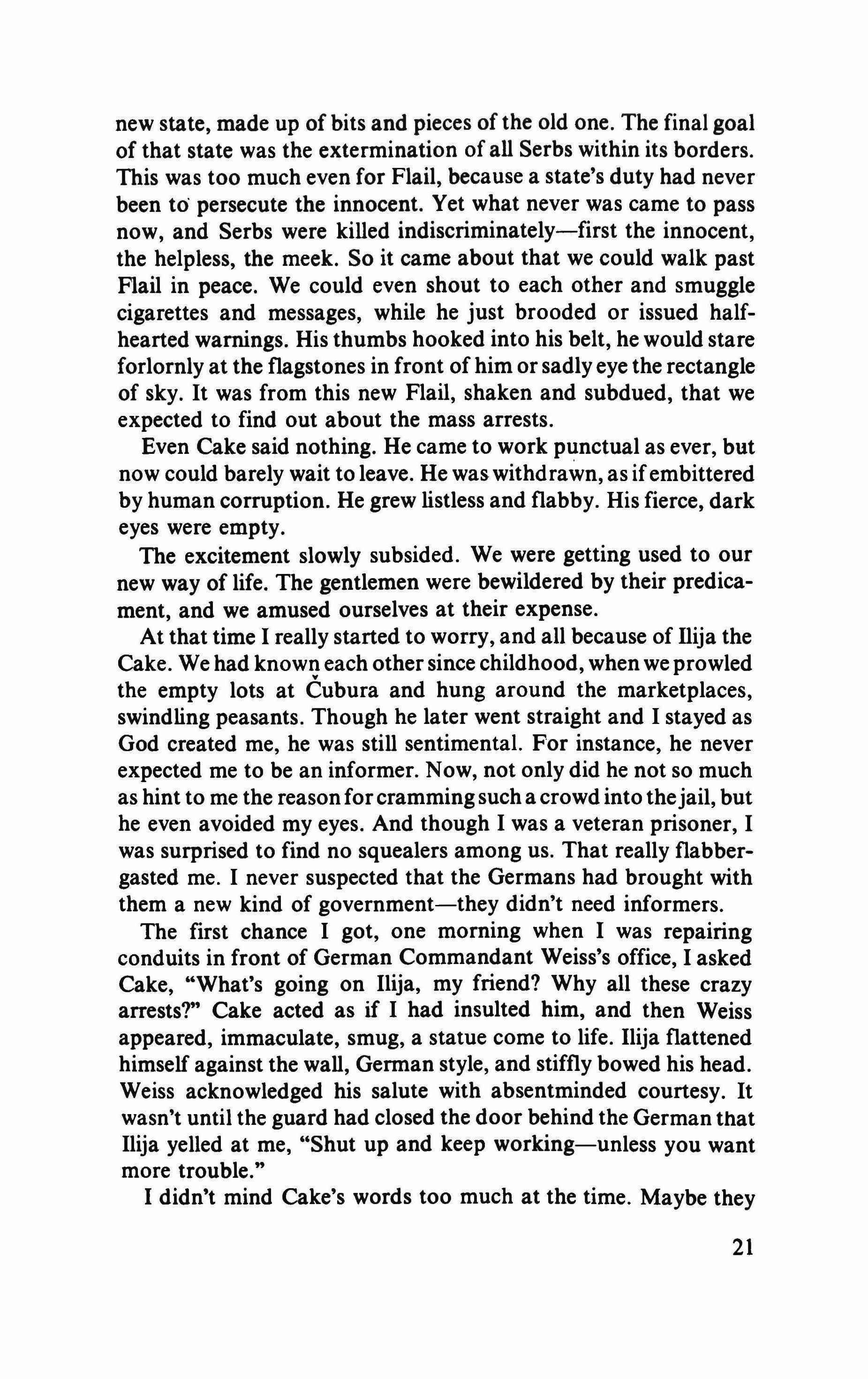
new state, made up of bits and pieces of the old one. The final goal of that state was the extermination of all Serbs within its borders. This was too much even for Flail, because a state's duty had never been to' persecute the innocent. Yet what never was came to pass now, and Serbs were killed indiscriminately-first the innocent, the helpless, the meek. So it came about that we could walk past Flail in peace. We could even shout to each other and smuggle cigarettes and messages, while he just brooded or issued halfhearted warnings. His thumbs hooked into his belt, he would stare forlornly at the flagstones in front of him or sadly eye the rectangle of sky. It was from this new Flail, shaken and subdued, that we expected to find out about the mass arrests.
Even Cake said nothing. He came to work punctual as ever, but now could barely wait to leave. He was withdrawn, as ifembittered by human corruption. He grew listless and flabby. His fierce, dark eyes were empty.
The excitement slowly subsided. We were getting used to our new way of life. The gentlemen were bewildered by their predicament, and we amused ourselves at their expense.
At that time I really started to worry, and all because of llija the Cake. We had known each other since childhood, when we prowled the empty lots at Cubura and hung around the marketplaces, swindling peasants. Though he later went straight and I stayed as God created me, he was still sentimental. For instance, he never expected me to be an informer. Now, not only did he not so much as hint to me the reason forcrammingsuch a crowd into thejail, but he even avoided my eyes. And though I was a veteran prisoner, I was surprised to find no squealers among us. That really flabbergasted me. I never suspected that the Germans had brought with them a new kind of government-they didn't need informers.
The first chance I got, one morning when I was repairing conduits in front of German Commandant Weiss's office, I asked Cake, "What's going on Ilija, my friend? Why all these crazy arrests?" Cake acted as if I had insulted him, and then Weiss appeared, immaculate, smug, a statue come to life. Ilija flattened himself against the wall, German style, and stiffly bowed his head. Weiss acknowledged his salute with absentminded courtesy. It wasn't until the guard had closed the door behind the German that Ilija yelled at me, "Shut up and keep working-unless you want more trouble."
I didn't mind Cake's words too much at the time. Maybe they
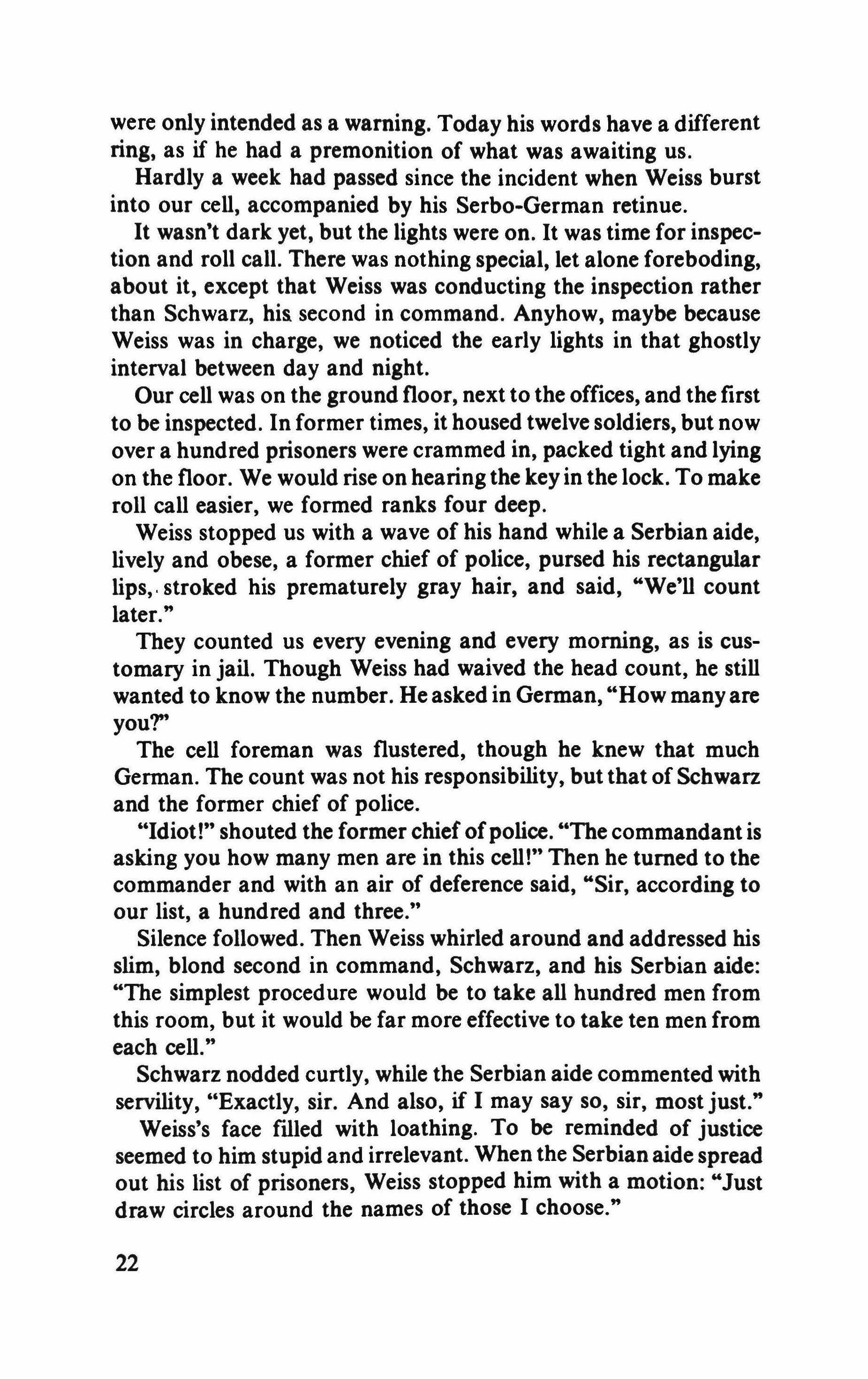
were only intended as a warning. Today his words have a different ring, as if he had a premonition of what was awaiting us.
Hardly a week had passed since the incident when Weiss burst into our cell, accompanied by his Serbo-German retinue.
It wasn't dark yet, but the lights were on. It was time for inspection and roll call. There was nothing special, let alone foreboding, about it, except that Weiss was conducting the inspection rather than Schwarz, his. second in command. Anyhow, maybe because Weiss was in charge, we noticed the early lights in that ghostly interval between day and night.
Our cell was on the ground floor, next to the offices, and the first to be inspected. In former times, it housed twelve soldiers, but now over a hundred prisoners were crammed in, packed tight and lying on the floor. We would rise on hearing the key in the lock. To make roll call easier, we formed ranks four deep.
Weiss stopped us with a wave of his hand while a Serbian aide, lively and obese, a former chief of police, pursed his rectangular lips,. stroked his prematurely gray hair, and said, "We'll count later."
They counted us every evening and every morning, as is customary in jail. Though Weiss had waived the head count, he still wanted to know the number. He asked in German, "How many are you?"
The cell foreman was flustered, though he knew that much German. The count was not his responsibility, but that of Schwarz and the former chief of police.
"Idiot!" shouted the former chief ofpolice. "The commandant is asking you how many men are in this cell!" Then he turned to the commander and with an air of deference said, "Sir, according to our list, a hundred and three."
Silence followed. Then Weiss whirled around and addressed his slim, blond second in command, Schwarz, and his Serbian aide: "The simplest procedure would be to take all hundred men from this room, but it would be far more effective to take ten men from each cell."
Schwarz nodded curtly, while the Serbian aide commented with servility, "Exactly, sir. And also, if I may say so, sir, most just." Weiss's face ruled with loathing. To be reminded of justice seemed to him stupid and irrelevant. When the Serbian aide spread out his list of prisoners, Weiss stopped him with a motion: "Just draw circles around the names of those I choose."
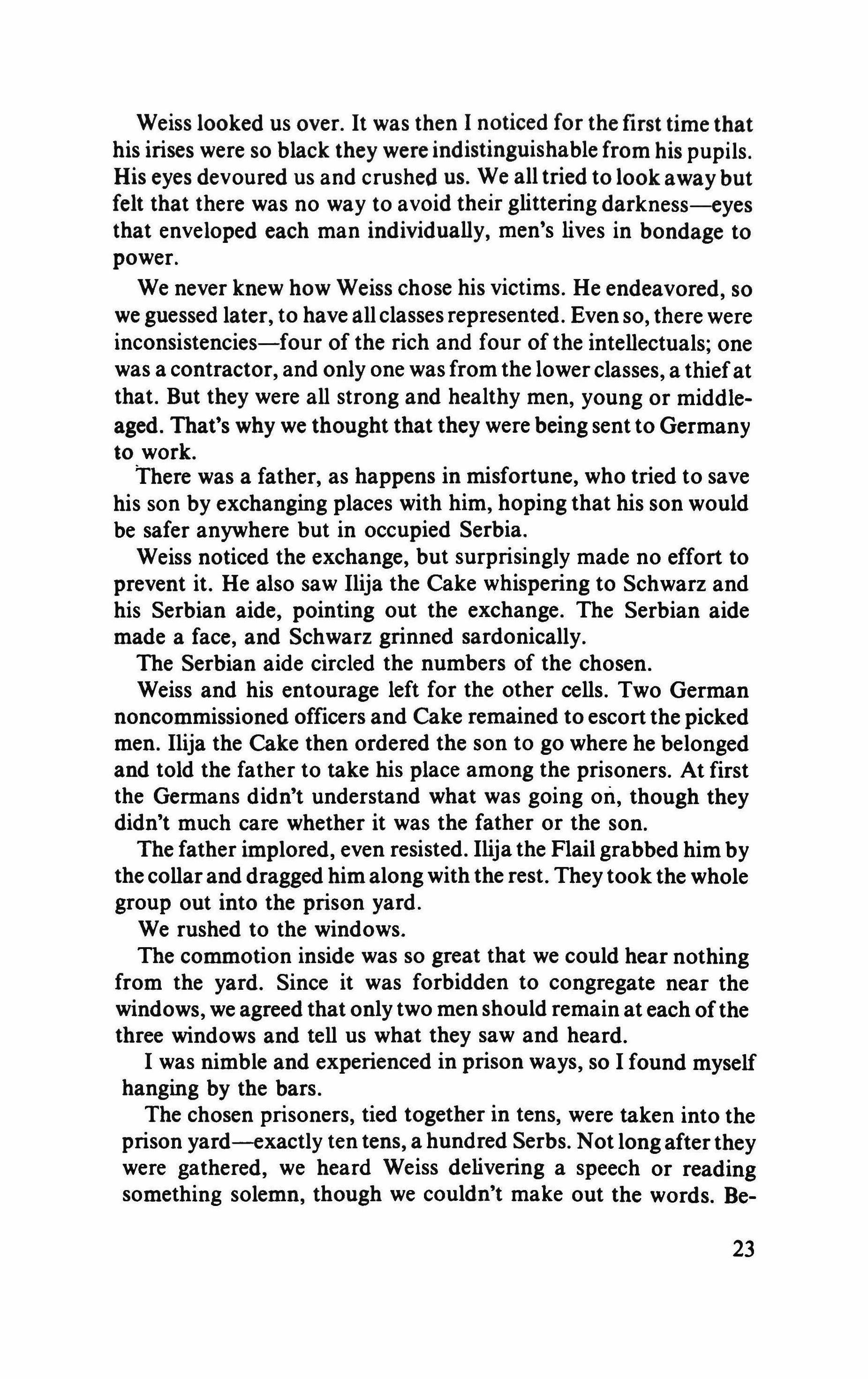
Weiss looked us over. It was then I noticed for the first time that his irises were so black they were indistinguishable from his pupils. His eyes devoured us and crushed us. We all tried to look away but felt that there was no way to avoid their glittering darkness-eyes that enveloped each man individually, men's lives in bondage to power.
We never knew how Weiss chose his victims. He endeavored, so we guessed later, to have all classes represented. Even so, there were inconsistencies-four of the rich and four of the intellectuals; one was a contractor, and only one was from the lower classes, a thiefat that. But they were all strong and healthy men, young or middleaged. That's why we thought that they were being sent to Germany to work.
there was a father, as happens in misfortune, who tried to save his son by exchanging places with him, hoping that his son would be safer anywhere but in occupied Serbia.
Weiss noticed the exchange, but surprisingly made no effort to prevent it. He also saw Ilija the Cake whispering to Schwarz and his Serbian aide, pointing out the exchange. The Serbian aide made a face, and Schwarz grinned sardonically.
The Serbian aide circled the numbers of the chosen.
Weiss and his entourage left for the other cells. Two German noncommissioned officers and Cake remained to escort the picked men. Ilija the Cake then ordered the son to go where he belonged and told the father to take his place among the prisoners. At first the Germans didn't understand what was going on, though they didn't much care whether it was the father or the son.
The father implored, even resisted. Ilija the Flail grabbed him by the collar and dragged him along with the rest. They took the whole group out into the prison yard.
We rushed to the windows.
The commotion inside was so great that we could hear nothing from the yard. Since it was forbidden to congregate near the windows, we agreed that only two men should remain at each ofthe three windows and tell us what they saw and heard.
I was nimble and experienced in prison ways, so I found myself hanging by the bars.
The chosen prisoners, tied together in tens, were taken into the prison yard-exactly ten tens, a hundred Serbs. Not long after they were gathered, we heard Weiss delivering a speech or reading something solemn, though we couldn't make out the words. Be-

hind my back, Apostle and Class were arguing quietly; their talk was distracting. Apostle was moaning that they would all be shot, considering that Weiss had selected mostly prominent men. Class contended that the men would be taken to labor camps, having been chosen on the basis of their health and strength. The bourgeois German army was bent on killing only the Serbian proletariat. "No, nol" Apostle insisted bitterly. "It may be a bourgeois army, but it still will kill only Serbs, all Serbs, bourgeois and proletarian alike." "Then all Serbs will become proletarian," Class taunted him. "I hope you are right," lamented Apostle. "Not a chancel Your comrades will provoke the Germans till they kill off all true Serbs," Class goaded him. "Look who serves the Germans -the same people who served your 'true' Serbsl"
The rest of us were silent during Weiss's speech. But the minute he finished there was a commotion, followed by cries in Serbian, commands in German, and a metallic clanking of arms.
The trucks' engines drowned all sound, except for a song coming from the first truck. From our perches on the windows we saw six trucks leave through the prison gate. The last one was uncovered and carried Serbian guards and German soldiers.
That evening we learned nothing. Nor could we come up with any decent explanations for what had happened. Only Apostle and Class continued their interminable argument, conducted in one language but sounding as if it came from the mouths oftwo utterly alien and embattled people.
Not until the next day could we piece it all together. Thejanitors were free to walk the corridors, and the Serbian guards were strangely listless.
Weiss had read the chosen prisoners their sentence. Somewhere in Serbia a. German soldier had been killed; in retaliation, a hundred Serbs were to be shot. It could happen again unless all Serbs forsook their criminal ways and stopped listening to their rebellious leaders.
Why did Weiss read out the sentence to one hundred condemned men when there was no possibility ofappeal?Perhaps the Germans were not yet accustomed to executing crowds of innocent men, so they kept, after their own fashion, to the traditional ritual of execution. An Orthodox priest was even brought to read the scriptures at the execution site.
The men were speechless, struck by the inconceivable horror of
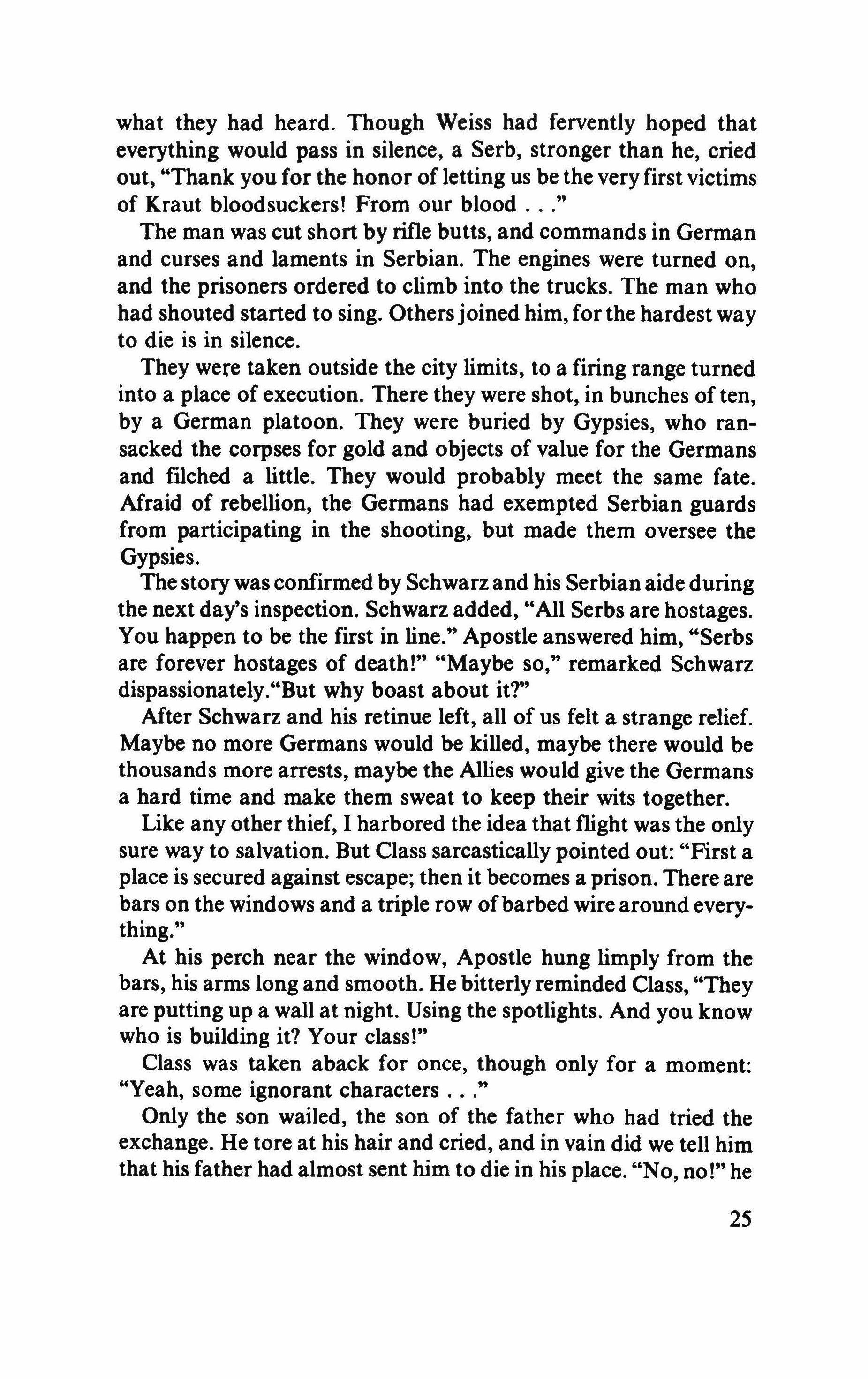
what they had heard. Though Weiss had fervently hoped that everything would pass in silence, a Serb, stronger than he, cried out, "Thank you for the honor of letting us be the very first victims of Kraut bloodsuckers! From our blood
The man was cut short by rifle butts, and commands in German and curses and laments in Serbian. The engines were turned on, and the prisoners ordered to climb into the trucks. The man who had shouted started to sing. Othersjoined him, for the hardest way to die is in silence.
They were taken outside the city limits, to a firing range turned into a place of execution. There they were shot, in bunches of ten, by a German platoon. They were buried by Gypsies, who ransacked the corpses for gold and objects of value for the Germans and filched a little. They would probably meet the same fate. Afraid of rebellion, the Germans had exempted Serbian guards from participating in the shooting, but made them oversee the Gypsies.
The story was confirmed by Schwarz and his Serbian aide during the next day's inspection. Schwarz added, "All Serbs are hostages. You happen to be the first in line." Apostle answered him, "Serbs are forever hostages of death!" "Maybe so," remarked Schwarz dispassionately."But why boast about it?"
After Schwarz and his retinue left, all of us felt a strange relief. Maybe no more Germans would be killed, maybe there would be thousands more arrests, maybe the Allies would give the Germans a hard time and make them sweat to keep their wits together.
Like any other thief, I harbored the idea that flight was the only sure way to salvation. But Class sarcastically pointed out: "First a place is secured against escape; then it becomes a prison. There are bars on the windows and a triple row ofbarbed wire around everything."
At his perch near the window, Apostle hung limply from the bars, his arms long and smooth. He bitterly reminded Class, "They are putting up a wall at night. Using the spotlights. And you know who is building it? Your class!"
Class was taken aback for once, though only for a moment: "Yeah, some ignorant characters
Only the son wailed, the son of the father who had tried the exchange. He tore at his hair and cried, and in vain did we tell him that his father had almost sent him to die in his place. "No, no!" he
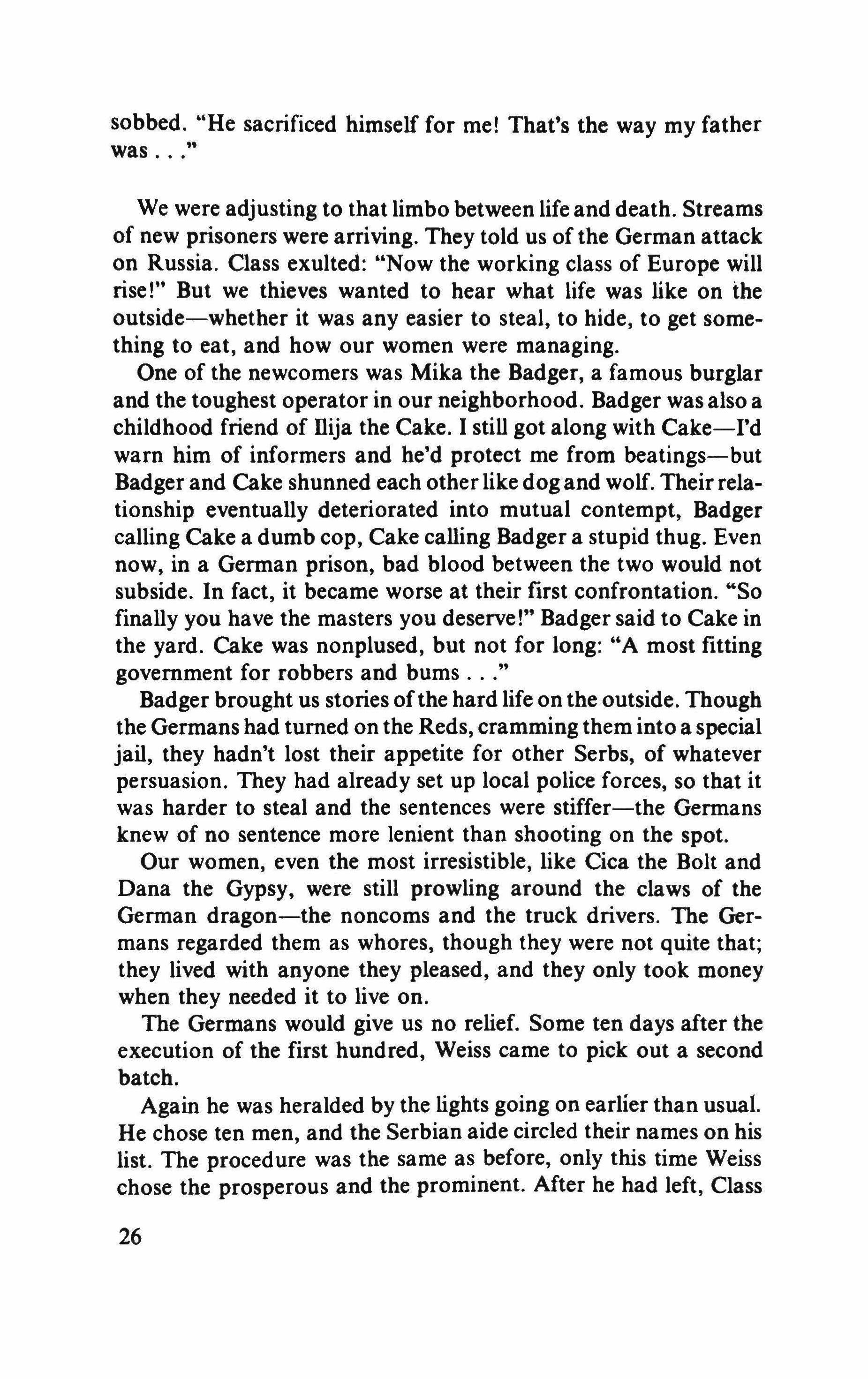
sobbed. "He sacrificed himself for me! That's the way my father was tt
We were adjusting to that limbo between life and death. Streams of new prisoners were arriving. They told us of the German attack on Russia. Class exulted: "Now the working class of Europe will rise!" But we thieves wanted to hear what life was like on the outside-whether it was any easier to steal, to hide, to get something to eat, and how our women were managing.
One of the newcomers was Mika the Badger, a famous burglar and the toughest operator in our neighborhood. Badger was also a childhood friend of llija the Cake. I still got along with Cake-I'd warn him of informers and he'd protect me from beatings-but Badger and Cake shunned each other like dog and wolf. Their relationship eventually deteriorated into mutual contempt, Badger calling Cake a dumb cop, Cake calling Badger a stupid thug. Even now, in a German prison, bad blood between the two would not subside. In fact, it became worse at their first confrontation. "So finally you have the masters you deserve!" Badger said to Cake in the yard. Cake was nonplused, but not for long: "A most fitting government for robbers and bums tt
Badger brought us stories ofthe hard life on the outside. Though the Germans had turned on the Reds, cramming them into a special jail, they hadn't lost their appetite for other Serbs, of whatever persuasion. They had already set up local police forces, so that it was harder to steal and the sentences were stiffer-the Germans knew of no sentence more lenient than shooting on the spot.
Our women, even the most irresistible, like Cica the Bolt and Dana the Gypsy, were still prowling around the claws of the German dragon-the noncoms and the truck drivers. The Germans regarded them as whores, though they were not quite that; they lived with anyone they pleased, and they only took money when they needed it to live on.
The Germans would give us no relief. Some ten days after the execution of the first hundred, Weiss came to pick out a second batch.
Again he was heralded by the lights going on earlier than usual. He chose ten men, and the Serbian aide circled their names on his list. The procedure was the same as before, only this time Weiss chose the prosperous and the prominent. After he had left, Class

said to Apostle viciously, "They want to terrorize your class." To which Apostle tearfully replied, "You and your kind will not acknowledge us as men even in death."
In the yard, too, the pattern was repeated. Weiss read the sentence, but the gentlemen didn't sing as they were being carted away.
Only then did it dawn on us that we had gotten used to nothing, and that we had unwittingly convinced ourselves that it was possible to live this way. One's own terror was reflected in the eyes of one's fellow sufferers. We became very close, and the room suddenly grew large as we huddled together on the floor. Even the quarrel between Class and Apostle petered out. Unable to sleep, Badger rose, stretched his arms, and knotted his fists: "How can men die without a murmur, without resistance?" Not a word in reply. Apostle muttered under his breath, "Whatever kept them going died long before they did." Class mumbled, "Consciousness. Consciousness is of ultimate importance."
We were paralyzed with fear. One morning Cake saw me scrubbing the corridor again. He wanted to pass by as if he hadn't noticed me, but I stood up and said to him, "What's going on, Ilija? How much longer do we have to put up with it?" He shrugged, walked past me down the corridor, and then suddenly turned around and said, "Joca, old Fox, not even the Germans know that. Unless being able to do just about anything they please does them in eventually."
Cake had never before addressed me in jail by my nickname, Joca, but always as Jovan, my first name. He had also called me by my other nickname, Fox, as if he was tired of not daring to be anything but a policeman.
On the fifth-or was it the sixth?-day, we were awakened in the middle of the nightby a howling somewhere to the northeast. Trees and houses were flying into the sky, as if trying to escape the tempest, their darkened shapes twisted in fiery convulsions. We decided it had to be the garages by the cemetery. Even though no one said it, we all knew what it meant: the next hundred were to die, and each man saw himself within that number.
The following day new prisoners were brought in. They confirmed what we had suspected-that garages near the cemetery had been set on fire, along with enemy trucks and cisterns. There were no dead among the Germans. But we all sensed that the destruction

of the trucks would be avenged on Serbs,just as ifsoldiers had been killed. Curses were heard against the arsonists, and Apostle wailed loudly, "Serbs have no greater enemies than Serbs! God Almighty can't save us now that we are destroying ourselves." Many looked at Class with fury in their eyes, as if he was personally responsible for the fire. Class said, "This is a struggle without mercy. The Germans have forced us to fight."
The very next day droves of new prisoners were brought in. At the same hour as all previous calls for execution, Weiss marched in with his entourage. "Merchants, businessmen, officials with university degrees, step forward!" he ordered in cold anger.
No one moved. No one wanted to die. "I have issued my orders!" barked Weiss, and the aide ran his finger down a list of names.
The first one to step forward was Apostle. Others followed him like a herd, more than half the cell. We suddenly realized that the thieves and the poor were not a majority, but rather that the prosperous and the educated were a silent and withdrawn bunch.
Weiss picked ten men. The aid called out Apostle and Class, and Schwarz sentenced them: "You two, a nationalist and a Communist, will have the honor of being first."
Class said, "I'd like to be fettered alone, if possible. These men are my class enemies." Apostle said, "I don't want to be tied to him either."
Weiss smiled bitterly and left the cell, walking with a stiff gait. Since he had made no decision one way or the other, Schwarz ordered the two tied together.
The Gypsy gravediggers couldn't tell us how the two had died. In a crowd of condemned men it is hard to single out individuals, even if the Gypsies had not been preoccupied with saving their own skins. Anyway we all knew that they had died without having settled their quarrel, each man unto himself. We mourned them. Some even wiped away a tear. Their absence had turned us into a rootless, hopeless, dying mass.
My memory of those days is confused. I recall, though, that the rich and the Communists were led away to the execution site. By and large, we thieves were left alone. We felt kind ofprivileged. We even thought that the thiefwho was included in the first hundred to be shot was a German mistake. The Germans must have finally concluded that Serbian thieves were no worse or different from their own. What good does it do you to be a Serb if you can't steal
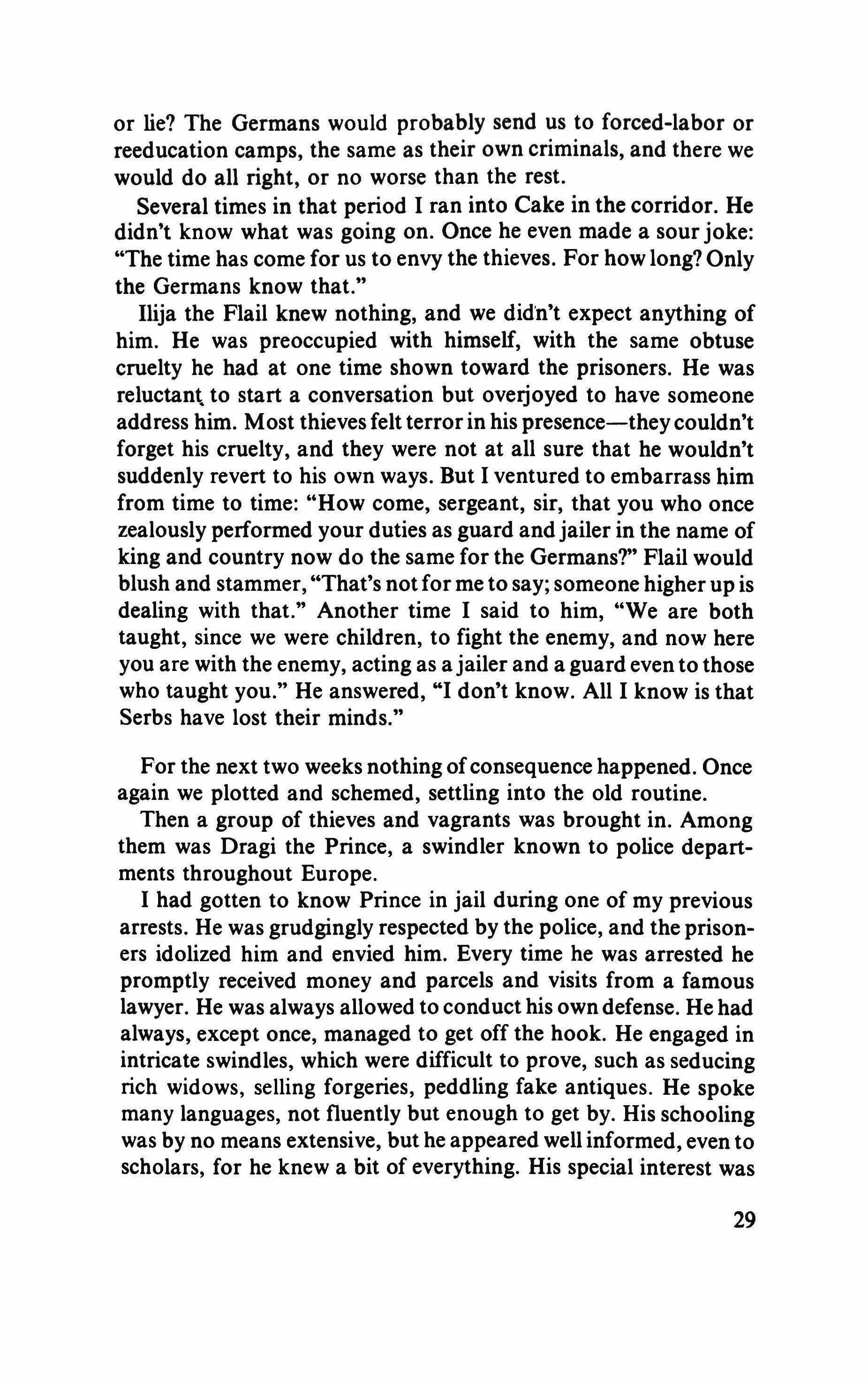
or lie? The Germans would probably send us to forced-labor or reeducation camps, the same as their own criminals, and there we would do all right, or no worse than the rest.
Several times in that period 1 ran into Cake in the corridor. He didn't know what was going on. Once he even made a sour joke: "The time has come for us to envy the thieves. For how long?Only the Germans know that."
Ilija the Flail knew nothing, and we didn't expect anything of him. He was preoccupied with himself, with the same obtuse cruelty he had at one time shown toward the prisoners. He was reluctant to start a conversation but overjoyed to have someone address him. Most thieves felt terror in his presence-theycouldn't forget his cruelty, and they were not at all sure that he wouldn't suddenly revert to his own ways. But 1 ventured to embarrass him from time to time: "How come, sergeant, sir, that you who once zealously performed your duties as guard and jailer in the name of king and country now do the same for the Germans?" Flail would blush and stammer, "That's not for me to say; someone higher up is dealing with that." Another time 1 said to him, "We are both taught, since we were children, to fight the enemy, and now here you are with the enemy, acting as a jailer and a guard even to those who taught you." He answered, "I don't know. All 1 know is that Serbs have lost their minds."
For the next two weeks nothing ofconsequence happened. Once again we plotted and schemed, settling into the old routine.
Then a group of thieves and vagrants was brought in. Among them was Dragi the Prince, a swindler known to police departments throughout Europe.
1 had gotten to know Prince in jail during one of my previous arrests. He was grudgingly respected by the police, and the prisoners idolized him and envied him. Every time he was arrested he promptly received money and parcels and visits from a famous lawyer. He was always allowed to conduct his own defense. He had always, except once, managed to get off the hook. He engaged in intricate swindles, which were difficult to prove, such as seducing rich widows, selling forgeries, peddling fake antiques. He spoke many languages, not fluently but enough to get by. His schooling was by no means extensive, but he appeared well informed, even to scholars, for he knew a bit of everything. His special interest was
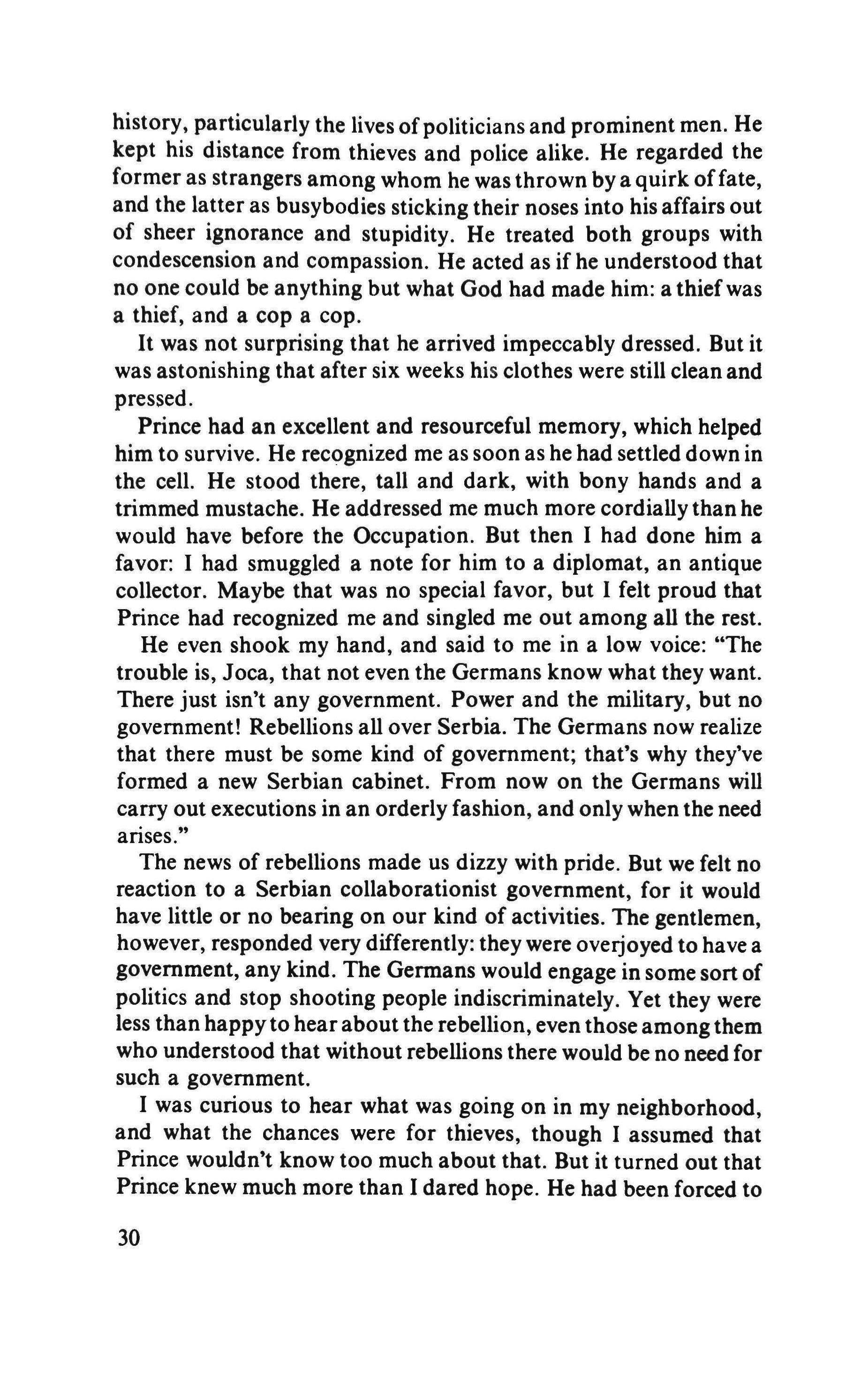
history, particularly the lives ofpoliticians and prominent men. He kept his distance from thieves and police alike. He regarded the former as strangers among whom he was thrown by a quirk offate, and the latter as busybodies sticking their noses into his affairs out of sheer ignorance and stupidity. He treated both groups with condescension and compassion. He acted as if he understood that no one could be anything but what God had made him: a thief was a thief, and a cop a cop.
It was not surprising that he arrived impeccably dressed. But it was astonishing that after six weeks his clothes were still clean and pressed.
Prince had an excellent and resourceful memory, which helped him to survive. He recognized me as soon as he had settled down in the cell. He stood there, tall and dark, with bony hands and a trimmed mustache. He addressed me much more cordially than he would have before the Occupation. But then I had done him a favor: I had smuggled a note for him to a diplomat, an antique collector. Maybe that was no special favor, but I felt proud that Prince had recognized me and singled me out among all the rest. He even shook my hand, and said to me in a low voice: "The trouble is, Joca, that not even the Germans know what they want. There just isn't any government. Power and the military, but no government! Rebellions all over Serbia. The Germans now realize that there must be some kind of government; that's why they've formed a new Serbian cabinet. From now on the Germans will carry out executions in an orderly fashion, and only when the need arises."
The news of rebellions made us dizzy with pride. But we felt no reaction to a Serbian collaborationist government, for it would have little or no bearing on our kind of activities. The gentlemen, however, responded very differently: they were overjoyed to have a government, any kind. The Germans would engage in some sort of politics and stop shooting people indiscriminately. Yet they were less than happy to hear about the rebellion, even those among them who understood that without rebellions there would be no need for such a government.
I was curious to hear what was going on in my neighborhood, and what the chances were for thieves, though I assumed that Prince wouldn't know too much about that. But it turned out that Prince knew much more than I dared hope. He had been forced to
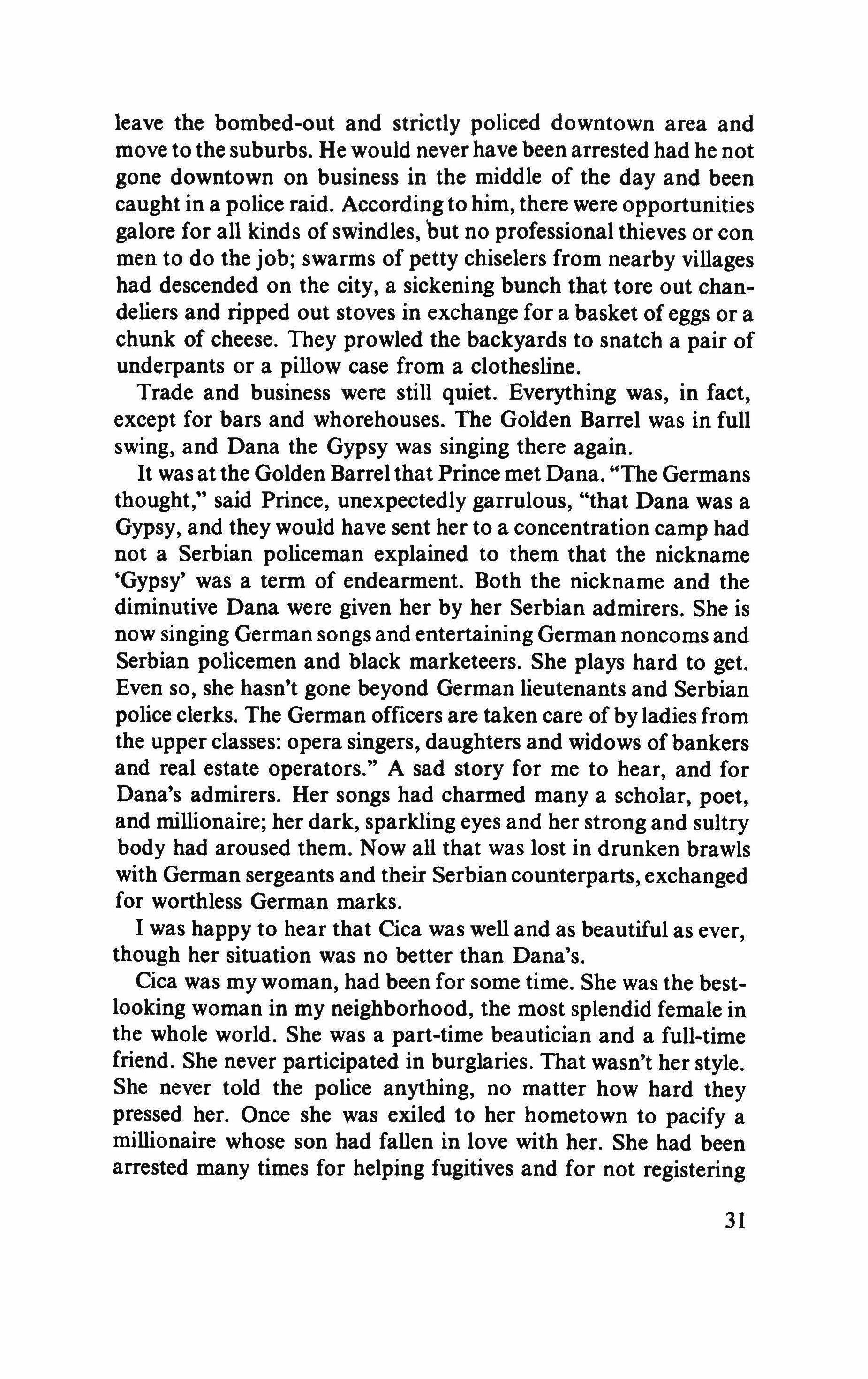
leave the bombed-out and strictly policed downtown area and move to the suburbs. He would never have been arrested had he not gone downtown on business in the middle of the day and been caught in a police raid. According to him, there were opportunities galore for all kinds of swindles, but no professional thieves or con men to do the job; swarms of petty chiselers from nearby villages had descended on the city, a sickening bunch that tore out chandeliers and ripped out stoves in exchange for a basket of eggs or a chunk of cheese. They prowled the backyards to snatch a pair of underpants or a pillow case from a clothesline.
Trade and business were still quiet. Everything was, in fact, except for bars and whorehouses. The Golden Barrel was in full swing, and Dana the Gypsy was singing there again.
It was at the Golden Barrel that Prince met Dana. "The Germans thought," said Prince, unexpectedly garrulous, "that Dana was a Gypsy, and they would have sent her to a concentration camp had not a Serbian policeman explained to them that the nickname 'Gypsy' was a term of endearment. Both the nickname and the diminutive Dana were given her by her Serbian admirers. She is now singing German songs and entertaining German noncoms and Serbian policemen and black marketeers. She plays hard to get. Even so, she hasn't gone beyond German lieutenants and Serbian police clerks. The German officers are taken care of by ladies from the upper classes: opera singers, daughters and widows of bankers and real estate operators." A sad story for me to hear, and for Dana's admirers. Her songs had charmed many a scholar, poet, and millionaire; her dark, sparkling eyes and her strong and sultry body had aroused them. Now all that was lost in drunken brawls with German sergeants and their Serbian counterparts, exchanged for worthless German marks.
I was happy to hear that Cica was well and as beautiful as ever, though her situation was no better than Dana's.
Cica was my woman, had been for some time. She was the bestlooking woman in my neighborhood, the most splendid female in the whole world. She was a part-time beautician and a full-time friend. She never participated in burglaries. That wasn't her style. She never told the police anything, no matter how hard they pressed her. Once she was exiled to her hometown to pacify a millionaire whose son had fallen in love with her. She had been arrested many times for helping fugitives and for not registering

her tenants. She despised pickpockets and petty burglars. I think she loved me because my jobs were dangerous and difficult and, above all, not petty. Petty thieves have a petty philosophy, of working some and stealing some, and trusting in God for the rest. But I kept God out of my ventures, trusting instead in my brains, luck, and strength.
Cica accepted money and gifts, but without obligation, and she was always loyal to the man she loved. Oh, she did change lovers, but I always felt I was the only one. Her hair was golden, her breasts warm, her thighs like your mother's womb. I was always afraid that she'd suck in my soul with her upturned lips, and I always passionately wanted her to do so.
Ah, that was my Cica, the only person I could call my own. And now she was running around with a German lieutenant, Prince said. He had not talked to her, but he had seen her in the Golden Barrel and could describe her down to her shoes and a birthmark on her upper lip.
Prison is a place of sufferingand of much bitterness andjealousy of the outside world and the loved ones left there. All I had was Cica. I never knew my father, I hardly remember my mother, and my relatives got rid of me as soon as they could. Cica was all I had, but the trouble was I never had her. No one could ever have her unless she wanted it. She was with the German lieutenant because she liked it that way. There was no point in getting angry. No use tormenting myself. When I get out of prison, I thought, I won't hold it against her. What is there to bitch about? She never promised herself to me. She used to say, with a smile, her cheekbones high and her eyes wide, "I live as I please, and you do whatever you want."
Even so, I was happy when Prince said, "Maybe Cica is trying to save you. YQU know no one has ever been able to resist her. She is a relentless woman. The Germans may think they're seducing her or buying her, but she'll get what she wants and discard them like the rest. The Germans may be her way to you. The only way to get you out."
Ten days after Prince was brought in, the gentlemen started receiving parcels and changes ofclothing. Some even had visitors. And both Weiss and Schwarz turned mellower-Weiss keeping up his dignity and Schwarz holding down his contempt. The Serbian aide fawned less in his dealings with his German superiors.

One day Prince and I were taken to the Serbian aide's office. We found Cake waiting for us there.
While he was opening parcels and examining their contents, I couldn't resist asking, "Is that from Cica? Did she say anything? Is there a message?"
Cake was silent, carefullychecking the clothing and food. Prince gave me a slight smile and a meaningful look.
"Yeah, this is from Cica," said Cake. "She's telling you not to worry unless you've done something the Germans don't like." Then he added contemptuously, "The other parcel is for Prince, from Dana the Gypsy."
"The Germans don't like anything anyone does-these days," Prince said, as if to himself, and took his parcel.
Prince and I were the only criminals to receive parcels. I was so overjoyed, more by Cica's concern than by the parcel itself, that I distributed all my food to my friends. Prince, though not stingy, was more controlled: he shared hisfood withthe sickandthe needy. Then he said, "Now that's something-the Germans letting someone take care of us. The trouble is, once the shooting starts, they don't make much distinction between the well-fed and the hungry."
A couple ofdays after we received our parcels, the lights went on early again-in fact, earlier than usual. Again Weiss selected his gentlemen, this time some real notables.
As soon as Weiss had departed with the men chosen to die, the gentlemen pounced on Prince. "Liar!" they called him. "What government were you talking about? What agreement with the Germans? The only agreement they'll ever make with us Serbs will be when we are all six feet under."
Prince was taken aback. "Well, the Germans," he said, "you know the Germans. They do everything methodically, even insane acts. Something must have gone wrong. Somewhere. They have their rules."
Something indeed had gone wrong, as I found out the next day while I was fixing the basin in the Serbian aide's room. Cake was there, listlessly guarding me, when he said, "An ambush. An ambush of German soldiers. In some godforsaken village, of course. Noone warned the Germans ofthe ambush. Serbia can't be ruled under the best of circumstances, let alone by this wreck of a government. The Germans are taking their revenge on all Serbs. They aren't picky about the class so long as they've got somebody.
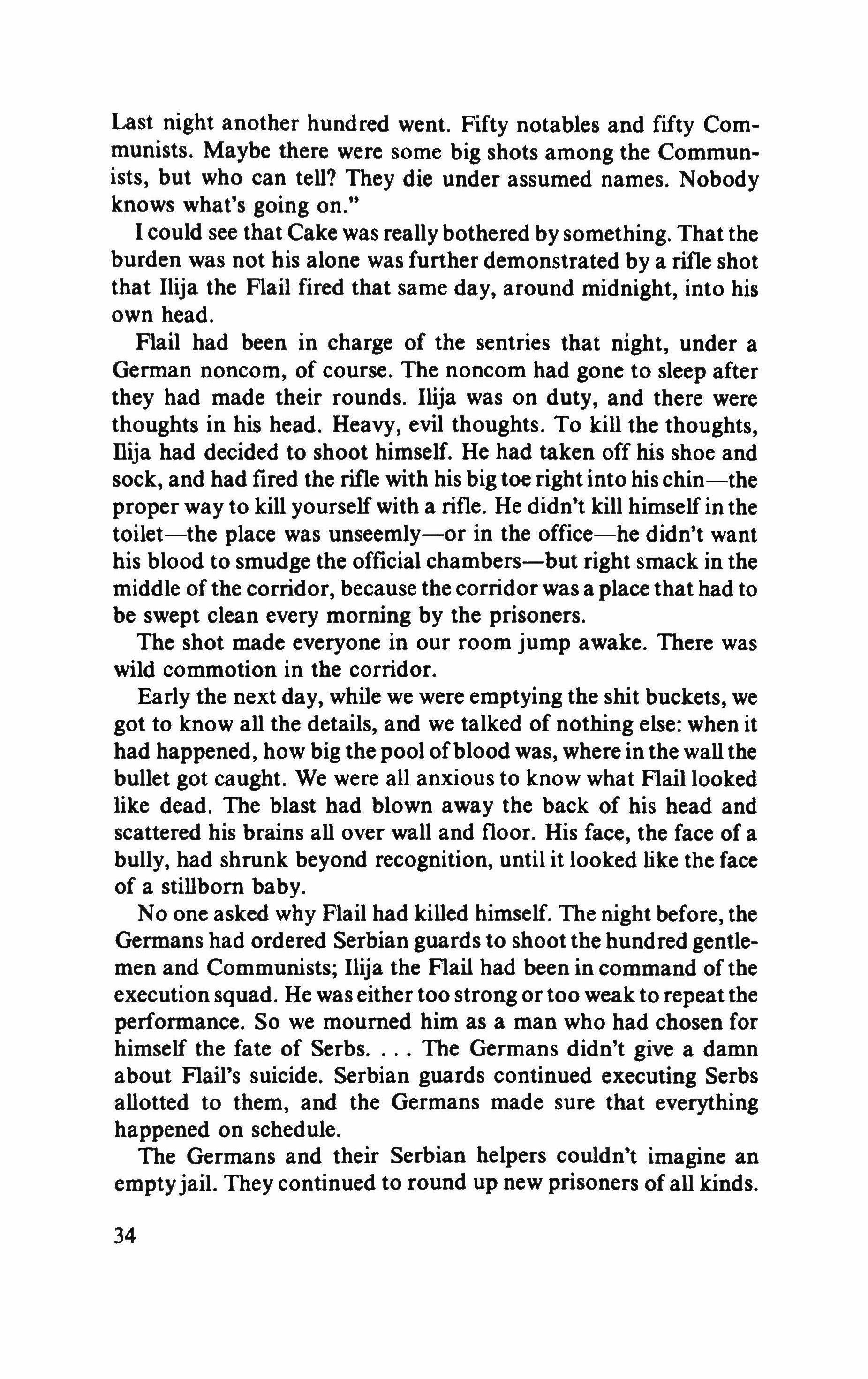
Last night another hundred went. Fifty notables and fifty Communists. Maybe there were some big shots among the Communists, but who can tell? They die under assumed names. Nobody knows what's going on."
I could see that Cake was really bothered bysomething. That the burden was not his alone was further demonstrated by a rifle shot that Ilija the Flail fired that same day, around midnight, into his own head.
Flail had been in charge of the sentries that night, under a German noncom, of course. The noncom had gone to sleep after they had made their rounds. Ilija was on duty, and there were thoughts in his head. Heavy, evil thoughts. To kill the thoughts, Ilija had decided to shoot himself. He had taken off his shoe and sock, and had fired the rifle with his big toe right into his chin-the proper way to kill yourself with a rifle. He didn't kill himself in the toilet-the place was unseemly-or in the office-he didn't want his blood to smudge the official chambers-but right smack in the middle of the corridor, because the corridor was a place that had to be swept clean every morning by the prisoners.
The shot made everyone in our room jump awake. There was wild commotion in the corridor.
Early the next day, while we were emptying the shit buckets, we got to know all the details, and we talked of nothing else: when it had happened, how big the pool ofblood was, where in the wall the bullet got caught. We were all anxious to know what Flail looked like dead. The blast had blown away the back of his head and scattered his brains all over wall and floor. His face, the face of a bully, had shrunk beyond recognition, until it looked like the face of a stillborn baby.
No one asked why Flail had killed himself. The night before, the Germans had ordered Serbian guards to shoot the hundred gentlemen and Communists; Ilija the Flail had been in command of the execution squad. He was either too strong or too weak to repeat the performance. So we mourned him as a man who had chosen for himself the fate of Serbs. The Germans didn't give a damn about Flail's suicide. Serbian guards continued executing Serbs allotted to them, and the Germans made sure that everything happened on schedule.
The Germans and their Serbian helpers couldn't imagine an emptyjail. They continued to round up new prisoners of all kinds.

The newcomers confirmed that the Germans had formed a Serbian government, and that the new government, in the interests of law and order, was intent on limiting the executions to participants in the uprising.
The poorer among the prisoners, and that meant us thieves too, were somewhat comforted by the news. So long as they didn't kill at random. As for the rest-who cared? The gentlemen were furious: some government, some law and order, they said; the Germans are still shooting men of prominence, innocence, and honesty.
We started segregating into rich and poor. Until then, the gentlemen had been joined to us by death, and they treated us well and carefully, as if our lives were as valuable as theirs. Now, suddenly, they were estranged from us and telling us that the enemy had more in common with thugs like us than with anyone else, and that we were not fit to die for Serbia. We figured we should lie low before German justice. Power and uprising were not our thing.
Only Prince and Badger were not fooled by the reprieve from execution. Badger said, "The Germans are eyeing Serbs for slaughter; no good can come from them." Prince took Badger and me aside and whispered: "There must be a way around German madness. We can't take up arms, and we can't escape into the woods; we don't have anything worth suffering or sacrificing for. Anywaythe rebels shoot thieves. We've got to convince the Germans that Serbs are worth more to them as slaves than as martyrs. None of those fine gentlemen have managed to do that."
The fine gentlemen didn't think much of this attitude. They had by this time shut themselves offfrom us, and we were more favored than ever. With much dignity and resignation, they continued to join their mortal enemies, the Communists, in common graves.
For leadership we people from the underground turned to Badger and Prince, the only two men who hadn't lost theiridentity in that panic-stricken herd. Curiouslyenough, the two ofthem had never been able to stand each other-Badger had despised Prince, while Prince had taunted Badger-but now they were growing reallyclose. Prince admired Badger's courage, and Badger admired Prince's mind. "If only I had his brains," he'd say. Prince never envied Badger his strength or courage; he thought the human brain more valuable than anything. "Brains always find ways to bend might," he'd say.

For the next few days nothing much happened. Then unexpectedly-I think it was a Monday, and I remember the time-ten o'clock, because Weiss was already in his officethey separated the gentlemen from us. The Germans came into the cell, and the aide called out the gentlemen's .names, and Schwarz ordered them to pick up their belongings. It was clear at once that nothing bad was to happen to them; both the German and the Serbian guards were relaxed and businesslike, not stiffand fierce as when they led men away to be shot. Besides, Weiss said to the group, "Perhaps Serbian leaders will finally sober up, and life will improve for you people."
The gentlemen were moved to the upper-story rooms, and the thieves from those rooms were brought into our cells on the ground floor.
No one had any inkling as to what that move meant. Except maybe Prince: he paced back and forth with his hands behind his back, wrapped in his thoughts, unapproachable. I saw him sitting on his bunk late into the night, smoking.
Several days later, Prince asked to see Schwarz. That seemed strange, even to those of us who had full confidence in him. What business had he with the Germans? What could he offer them? He knew a lot of our tricks and secrets. For us he was one ofthose rare people who break the law and squeal on no one. "H Prince is a squealer," said Badger, "we've all had it." He added, with a hiss, "I'll bash his head in."
Prince came back from Schwarz looking even more distractedso distracted, in fact, that I didn't have the guts to address him until we ran into each other in the washroom. He offered me a halfsmoked cigarette, and that gave me courage to say, "Hey, Prince, what's with you and the Germans?" He looked at me and arched his eyebrows: "There's no way to be on the good side ofthem. Not yet. They only recognize slaves and corpses. We are in serious danger. Couldn't be worse. The gentlemen and the big shots have made a deal with the Germans. What else could explain the separation? It's pretty obvious that relations between them are not as bad as they used to be. And what kind of a deal can we make with them? What can we offer the Germans? They don't give a damn about the tricks of our trade. And they aren't interested in the secrets ofthe prewar Serbian underworld. How do we get out of here alive?"
Then all the pieces fell in place. Not only Weiss and Schwarz, but all the Germans, down to the lowest rank, were sporting some
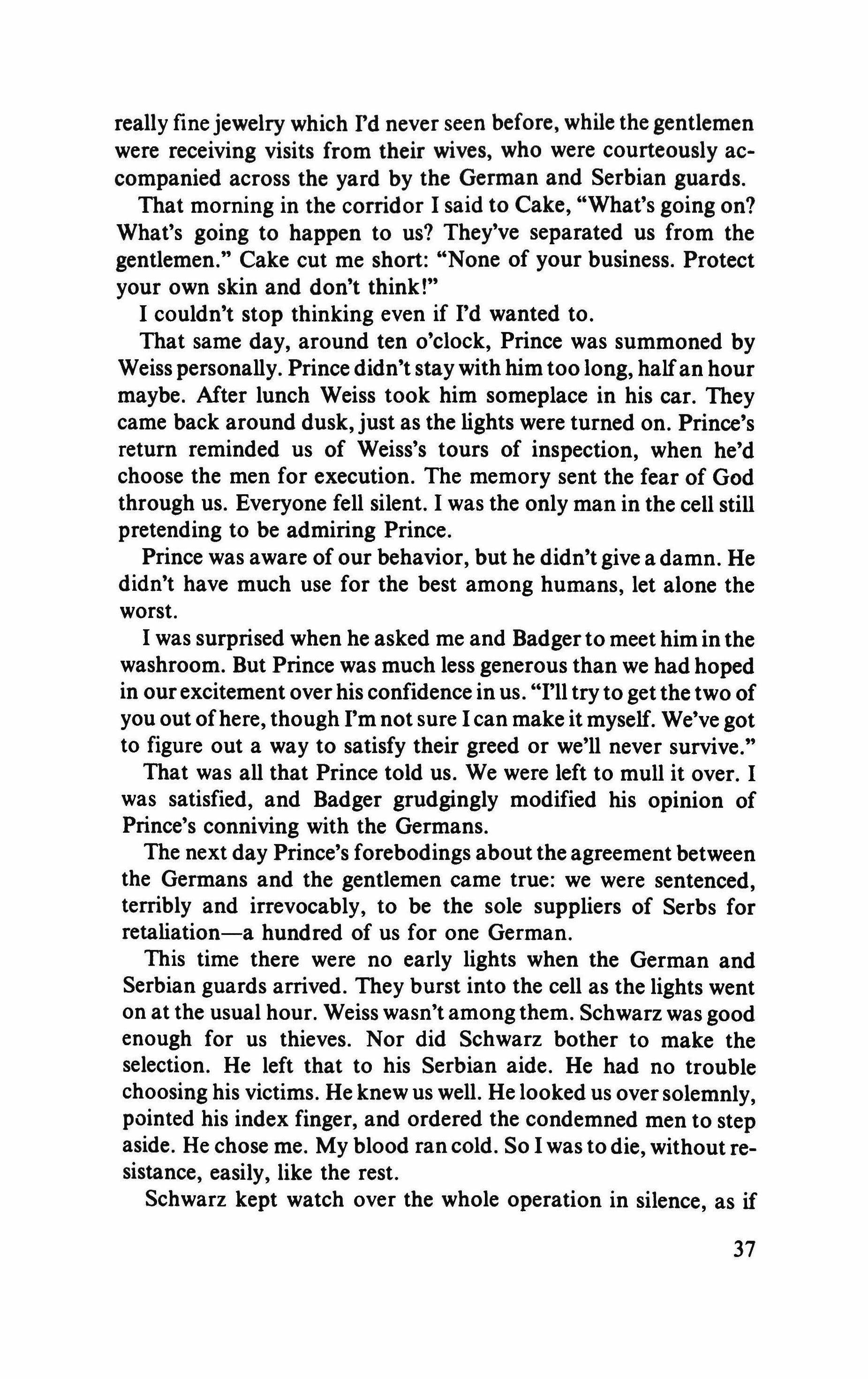
really fine jewelry which I'd never seen before, while the gentlemen were receiving visits from their wives, who were courteously accompanied across the yard by the German and Serbian guards.
That morning in the corridor I said to Cake, "What's going on? What's going to happen to us? They've separated us from the gentlemen." Cake cut me short: "None of your business. Protect your own skin and don't think!"
I couldn't stop thinking even if I'd wanted to.
That same day, around ten o'clock, Prince was summoned by Weiss personally. Prince didn't stay with him too long, half an hour maybe. After lunch Weiss took him someplace in his car. They came back around dusk, just as the lights were turned on. Prince's return reminded us of Weiss's tours of inspection, when he'd choose the men for execution. The memory sent the fear of God through us. Everyone fell silent. I was the only man in the cell still pretending to be admiring Prince.
Prince was aware of our behavior, but he didn't give a damn. He didn't have much use for the best among humans, let alone the worst.
I was surprised when he asked me and Badger to meet him in the washroom. But Prince was much less generous than we had hoped in our excitement over his confidence in us. "I'll try to get the two of you out ofhere, though I'm not sure I can make it myself. We've got to figure out a way to satisfy their greed or we'll never survive."
That was all that Prince told us. We were left to mull it over. I was satisfied, and Badger grudgingly modified his opinion of Prince's conniving with the Germans.
The next day Prince's forebodings about the agreement between the Germans and the gentlemen came true: we were sentenced, terribly and irrevocably, to be the sole suppliers of Serbs for retaliation-a hundred of us for one German.
This time there were no early lights when the German and Serbian guards arrived. They burst into the cell as the lights went on at the usual hour. Weiss wasn't among them. Schwarz was good enough for us thieves. Nor did Schwarz bother to make the selection. He left that to his Serbian aide. He had no trouble choosing his victims. He knew us well. He looked us over solemnly, pointed his index finger, and ordered the condemned men to step aside. He chose me. My blood ran cold. So I was to die, without resistance, easily, like the rest.
Schwarz kept watch over the whole operation in silence, as if

bored by his own immense self-satisfaction. Our Serbian guards were elated, all of them except Cake, who looked more withdrawn than ever. His eyes avoided mine. He was either unable or not brave enough to help me.
Prince saved me. He went up to Schwarz, whispered something into his ear, and pointed at me. Schwarz motioned me to rejoin the sullen crowd.
The aide substituted a Gypsy for me, a small-time chicken thief.
The Gypsy started to wail from the bottom of his heart. Tears were streaming down his closely cropped mustache. "Why me, dearest sir?" he sobbed. "Who'll feed my six children? Why me, a miserable Gypsy, when you have all these fine Serbs here?"
"Why are you crying? You don't have anything to lose, have you?" the aide said sardonically.
"No Gypsies!" barked Schwarz unexpectedly. "A Serb! I wanta Serb! Only Serbs in exchange for Germans! What's a Gypsydoing here anyway? They and the Jews are under special treatment. Transfer him to the Gypsy quarters and put a Serb in his place!"
Jews and Gypsies were not being exterminated yet. Jews were herded into concentration camps and put to work clearing up bombed-out areas. The Gypsies were confined to their ghettos, where it was hoped they would die of disease and hunger. Maybe the fact that for the moment the Gypsies were treated better than either Serbs or Jews gave the man the courage to say, "You're right, sir. This isn't the place for a Gypsy. Stupid me. I thought I'd be better off trying to pass as a Serb
No one gave a damn about the Gypsy. Schwarz glanced at him with boredom and contempt, while the aide spread his hands in mock horror-"Why do I have to deal with such garbage?" The aide chose a swarthy, stocky young man to replace the Gypsy and bowed slightly to Schwarz, as if congratulating him on his good taste. The young man joined the condemned meekly, in silence, with tears flowing down his face.
Everyone was preoccupied with his own problems. Or duties. The aide located on his list the names of the condemned and carefully circled them.
Then the guards escorted the men out, and we stood paralyzed. No one rushed to the windows to see what was happening. But Badger went stark raving mad. He stood in the middle of the cell and bellowed, "So that's what Serbdom has been reduced to! Let's

at least die like Serbs! Let's shout our battle cries! Let's, my brothers, rush the enemy, with tooth and nail, ifthat's all we've got. That way we'll die happier."
We listened to Badger with fierce, sullen pride, though we knew that was no way to talk. I calmed myselfslowly and deliberately. I helped Badger to simmer down, while Prince sat in his corner as if nothing had happened. That was the way he always acted when he didn't want to be a witness to something.
That same night a group of bold young thieves gathered in the washroom to discuss how best to conduct themselves at the place of execution. They racked their brains late into the night.
The next morning I was doing some chores in the corridor when Dija the Cake came by, acting as if he didn't know me. I followed him into the office on the pretense that I had to fix a lock on a cabinet. "Damn it, Ilija, since when have we thieves become such great Serbs? How come we suddenly count? Thieves and thieving have never brought ruin on anyone. The loot changes owners, that's all. Everything we steal goes right back to the merchants and bankers. The world wouldn't go on without thieves. Life itselfis a form of theft. What would you cops do without us? Even if we were the cause of all evil, we can't be blamed for killing Germans. Our lives may be worth nothing, but our lives have never before been taken for the crimes of others. If we are killed because we've stolen, fine. If we have to die because we are Serbs, okay-as long as we are not the only ones to pay the debt. But to die like this!"
"What the hell do you want from me?" shouted Cake. "You want me to argue with you?" He stood up at the sound of the gate and looked out the window. A dozen of the gentlemen were climbing into coaches, accompanied by their wives, who were crying with joy. Cake continued with his monologue: "What can I tell vou? I am not my own master! I can't leave my job for the same reason that I can'tjoin the rebels. Stay in the back row ifyou can. The ones in the front go first."
When I returned to the cell, I told Prince about my talk with Cake. He smiled: "Cake has no choice but to be upset. The Germans are executing their order. A hundred of us for one of them. The gentlemen have convinced them, either by bribes or by playing upon theirfear ofrevolt, not to shoot respectable men. You know the way the Germans follow orders. The orders are executed in the way that's least painful to the Germans and our gentlemen."

At that moment Badger entered the room.
He looked at us with haunted eyes. "What the hell are we to do?"
"It doesn't matter how you die, so long as you have faith," said Prince with a smile. "It doesn't matter, that is, if you accept death. Those who do, die happier. So let them die as Serbs. No one can deny them that luxury." He paced back and forth and then exclaimed, "If only someone, and not you thieves, were asking me about dying. For me, for you, faith is nonsense, a denial ofthe self, a capitulation before thieves and theft. Life is theft. Death is the thief above all thieves. You thieves ask me how to submit to the thief of thieves. You have to overcome him. Yes, overcome him. Be a better thief than the thief of thieves. Yes. Even if we don't overcome him, we are alive as long as we are engaged in overcoming him. Faith above all faiths." It was the only time I ever saw Prince lose control. He quickly calmed down, though, and grasped our hands. "But I don't think you two should die," he said gently.
We returned to our cell. Just as we had settled down, a guard summoned all three of us.
In the yard the Germans took over. Schwarz sat in a limousine next to the driver. Prince was ordered to get into the back seat with a German noncom. Badger and I were thrown into the prison van.
Schwarz's car drove ahead, and we followed, in the direction of the bombed-out heart of the city.
We stopped beside blackened skeletons of a couple of small storefronts. A group of Jews and their German guards were waiting for us.
Prince and Schwarz jumped out of their car. We waited in the van.
Prince acted as if he wasn't a prisoner. He inspected corners, jumped over beams, measured distances, looked over spaces. He pointed to a pile of debris from which some reinforcing irons protruded, and said, "Here--clear this away."
The Jews got to work. They stumbled with fatigue, but the Germans kept yelling at them to work harder and faster.
Prince sat down on some dilapidated steps, lit a cigarette, and barked orders to the prisoners. Badger and I were forgotten until lunchtime, when food was brought to us in mess tins.
It was dusk when a narrow cast-iron staircase appeared from the rubble, and the Jews hurriedly set about clearing it. They soon found a steel door leading to a cellar.

Badger and I were then brought to the site and Weiss appeared. He surveyed the scene with an air of importance and joyful expectation, and ordered the Jews taken away.
"At last a Serb who doesn't cheat or lie," he said in German, pointing to Prince.
Badger and I had an idea as to why we had been brought there, and when they gave us bundles of keys, we knew for sure.
The locks were intricate, but not much of a job for pros like Badger and me. The Germans assisted us byholding the flashlights over the locks, which is exactly how we used to operate in the old days.
However, once we got into the cellar, a small concrete room, it was not at all easy to open three steel safes, especially since the Germans were putting pressure on us to work fast. Badger didn't try very hard. His strong but sensitive fingers, capable of feeling even the smallest and most complicated latches and levers in the depths of steel doors, labored clumsily and inefficiently. The burden ofthejob fell on me, but I was not as skilled as Badger in the fine art of safe-picking.
The Germans could have broken the safes with explosives, but that would very likely have meant the destruction of what was inside. They could have moved the safes someplaceelse, but getting them out through the narrow door would be tricky and would have taken a long time, and they were anxious to see what was inside.
We saw Prince only for a short time, at the beginning of thejob. He looked the safes over carefully, but without any evident pleasure in having led the Germans to the buried treasure. He explained to us briefly what make of safe they were and how to handle them, and then disappeared.
The first to give was the largest, the one I worked on. Schwarz instantly emptied out its contents: lots of papers-bonds, certificates, and contracts. Weiss rummaged through the steel shelves, but they yielded nothing but papers, and the Germans crushed them with their boots.
The second safe had nothing of consequence either, except for stacks of prewar paper money. Not so long ago that would have been a fortune, but now Weiss just shoved them into a suitcase and yelled, "We've been had! Get him down here!"
Prince was brought down.
"What's this?" Weiss asked Prince, more insulted than injured.

He opened the suitcase and touched the money with the tip of his boot.
"Sir," said Prince with much dignity, "I never said there were jewels in every safe. I just said the safes were here, and that one of them might contain some jewelry. Also I warned you the jeweler could have removed the valuables just before the air raid."
"All right. Go on!" said Weiss cutting him short. He left the room, followed by Prince.
It must have been well past midnight when the third safe finally gave way under Badger's fingers. The Germans crowded around and grabbed at thejewels. Weiss ordered that everything be handed to him. Meanwhile Badger was still tinkering with a small door at the back of the safe.
Soon Badger opened the door. Weiss shoved his hand inside and brought out two diamond necklaces, three strings of pearls, and a collection of rings with precious stones.
Prince stayed outside, though he must have heard the greedy shouts. We found him walking dreamily among the torn girders. He seemed startled when Weiss patted him on the shoulder. Schwarz had us stripped naked and he personally checked our clothing for concealed gems. Badger and I stood shamefaced and shivering while the Germans averted their eyes from our bare bodies.
Then Weiss decided to be generous. He reached into his suitcase, took out a fistful of obsolete thousand-dinar bills, and offered them to Prince. But Prince declined the honor with a polite bow. Undaunted, Weiss gave a thousand dinars each to Badger and me. Badger accepted his reward in silence. I thanked the commandant perfunctorily. Weiss climbed into his car and drove off.
The three of us were escorted back to our cell. We fell asleep at once.
We woke up around noon the following day to face hundreds of questions from our mates, who were curious to know where we had been and what we had done. We had been forbidden to talk, but Badger told his friends about it in the washroom. Prince and I were then separated from the others as if by an invisible wall; we were regarded as German informers. Nobody crossed that wall. I felt uncomfortable and defended myself: I had done nothing out ofthe

ordinary, said nothing that I wouldn't say here. Badger was very upset at the accusations of impropriety in our conduct, but Prince remained as unperturbed as ever.
The wall grew even higher the next day, when Cica and Dana visited us.
If Prince was excited at all when Dana embraced him, he managed to hide his feelings. But I completely lost my head when I felt Cica's white bosom, though I suspected that she had made her way to me by selling her body to despicable Germans. I had seen her stepping out of Schwarz's car. Yet I knew that she wouldn't have come unless she loved me.
Later that same day Schwarzand his Serbian aide picked out the next group to be shot. With a wave ofhis hand Schwarz pointed to some twenty men, and when the aid wanted to check the names against his list, Schwarzindicated that he needn't bother. As he was leaving, Schwarz spotted me and gave me a generous smile.
From then on, the thieves were taken away to execution so often and in such numbers that we could no longer keep track of what was happening. No names were recorded. Just a head count until a hundred was reached. They were dragged off like cattle, sometimes several hundred a day, depending on how many Germans had been killed in some godforsaken part of Serbia.
From then on, the executions were carried out by our police, while the Germansjustkept watch. Otherdirtyjobs, like searching, beating, and torturing prisoners, were also entrusted to Serbs.
From then on, the thieves stopped dying silently. They sang as they were taken away, and they cursed at the execution ground.
Connections were set up with the outside world. and we sent messages of love and encouragement to our families and friends. We embroidered our last words on handkerchiefs and engraved them on tobacco boxes for the few who might survive the ordeal.
It's a blessing that our minds forget evil, or else we would go mad. Yet I'll never forget the day Badger was taken away-we had grown close, and his fierce courage and pride were sustenance to everyone.
It happened unexpectedly. Prince and Badger and I had by then opened quite a few safes. The Germans were familiar with us; they called us by our nicknames and gave us cigarettes.
But one evening Schwarz cut off twenty men with a flick of his

fingers, and then he looked over the rest, saw Badger, and motioned him to join the condemned.
Badger was calm. Only the muscles of his jaw flexed slightly. I looked at Ilija the Cake and implored him with my eyes to do something for Badger. But Cake had a dull look, as ifhe was unable to grasp what was going on. Badger embraced me and squeezed a note into the palm of my hand.
In the yard, while the prisoners were being tied up, Badger broke Schwarz's jaw with a swing of his fist, and leveled the aide with a blow to his head. That spurred the twenty thieves to throw themselves upon the German and the Serbian guards. All twenty thieves were shot down, right there in the yard, and carted off to the pits at the execution site. The trucks left behind a trail ofblood the length of those interminable seven kilometers.
Late that night I looked at Badger's note. It said that on the night when we opened the jeweler's safes, he managed to slip a diamond necklace into a broken drainpipe, next to the iron stairs. I wasn't thrilled with the information, because I expected to end up much the same way as Badger. But what a gesture, I thought. Badger was a friend to me and a foe to the Germans until the bitter end.
I couldn't refrain from reproaching Cake the next time I ran into him in the corridor.
"What could I do?" said Cake bitterly. "Tell Schwarz to choose someone else instead of Badger? I couldn't do that. Faced with death, we are all equally unfortunate and equally just. And you could tell that Schwarz had picked him out. Badger was betrayed. Probably by someone he had helped. Or maybe he betrayed himself."
I never tried to find out who betrayed him. What was the use anyway?
I worked wherever I was ordered to. I continued working even after Prince had made his escape, the night the Germans were busy plundering lengths of cloth from a warehouse.
Thieves became scarce. Those who weren't shot ran away. The Germans started filling up their deathly hundreds with peasants from rebellious districts. Their names were not marked on any lists. So it went until Germany was defeated and tens of thousands of German prisoners were brought in.
I was released.
I went straight to the ruins where Badger's necklace was buried.

Someone had leveled the pipe right down to the ground. Nothing but slime and mud.
I had to start from scratch again. That seems to be the fate of thieves. I asked Cica to marry me, but she refused. She found another man among the liberators of Belgrade. Ilija the Cake was shot without a trial, though he didn't deserve it.
But who did?
Prince?
I heard that he had fled to Germany with forged documents. So did Dana. I remembered, then, what Prince had told me in jail: "Germanyis a thieves' paradise. The men are at the front, the police are in the occupied countries. If it wasn't for those Allied air raids
Yes, the air raids. Maybe Prince had, despite all his consummate skill, suffered a fate he didn't deserve.
-translated by Mombilo Selic
Potatoes, linseeds and marzipan-kings
lillian Gewirtzman
On June 22, 1941 they bombed Kiev.
Grandfather had once tried to tell me about war. Seated on the veranda among pink tomatoes ripening on the window sills, me on his lap, he was reading a newspaper. "There won't be a war," he said to my father over the glasses that slipped down his nose. "The weapons are too powerful; the world would destroy itself."
"Grandpa, what's war?" I tugged at his beard.
"When people get cruel and shoot at each other."
"But why?"
"You're too young to know."
The sirens were silent, the airplanes had gone. Groups of men searched the debris. Their firemen's suits with square-toed high boots and accordion trunks that hung from their gas masks made them look like a lost herd of elephants roaming the strewn brick. The cylinders they aimed at the smoldering fires hissed a thick powder into the smoke and turned the night air of Kiev an opaque white. "Evacuees, board the vehicles, women with children first," a uniformed man shouted into a megaphone, guiding us to a caravan of green army trucks. "Call me mommy," Aunt Mia winked as she lifted me onto a wide wooden bench.

I was seated between them. With Mia on one side, mother with the sleeping infant on the other and a sack of bedding at my feet, I felt safe. Ienjoyed the ride. Swaying with the truck as it bounced on the country road, I watched the searchlights chase each other across the sky, counted the stars and made wishes on flying comets. The summer wind playing in my hair and the distant song of soldiers marching in the night made my head feel heavy. I nuzzled against my mother's body and thought of pillows.
"How far are we going?" someone tapped on the driver's cabin.
"Railroad station in Cherkassy, central evacuation point," came the muffled answer.
"We are here! We are here!" I awoke to someone's voice. Someone shook my shoulders and lowered me to a tiled floor. My head was aching from the engines and voices. My loose tooth was bleeding, dangling from a salty strip inside my mouth. My eyes were burning in the too bright light. Blinking, I searched for my mother's arms but found them, as usual, wrapped around the baby. "He is always in the way, and alwayscrying," I thought as I secretly poked my brother in the ribs. "We'll soon lie down," my mother whispered, managing to free a hand ana run it along my wet cheek.
I liked Cherkassy! The large red-tiled terminal had no scary windows painted black against air raids. It had no windows at all. And we didn't have to hide. "We are already underground," my mother explained when the sirens blew. "Just stretch out on the floor and cover your head."
I didn't like covering my head. Cheek on one hand I lay on the ground reading the banners above: "For Lenin! For Stalin! For Russia! Forward!" Their golden letters quivered with the distant explosions.
Tired of those, I would look at the posters. There were many posters at Cherkassy station. There was one of Lenin standing on a box in front of a crowd: "Pro-le-tar-yat U-nite." Mother always had to help me with the difficult words. And then there was a pretty one. Round-faced women in festive outfits were seeing their men off to war. In billowing skirts and embroidered blouses, in strands of beads and ribbon headpieces, they craned their necks towards their soldiers. "Come back a hero!"-I read the inscription all by myself. My favorite poster was the one of Stalin. I didn't fully understand it and spent hours thinking about it. It was the largest of them all. It covered an entire wall. Above officer's boots and
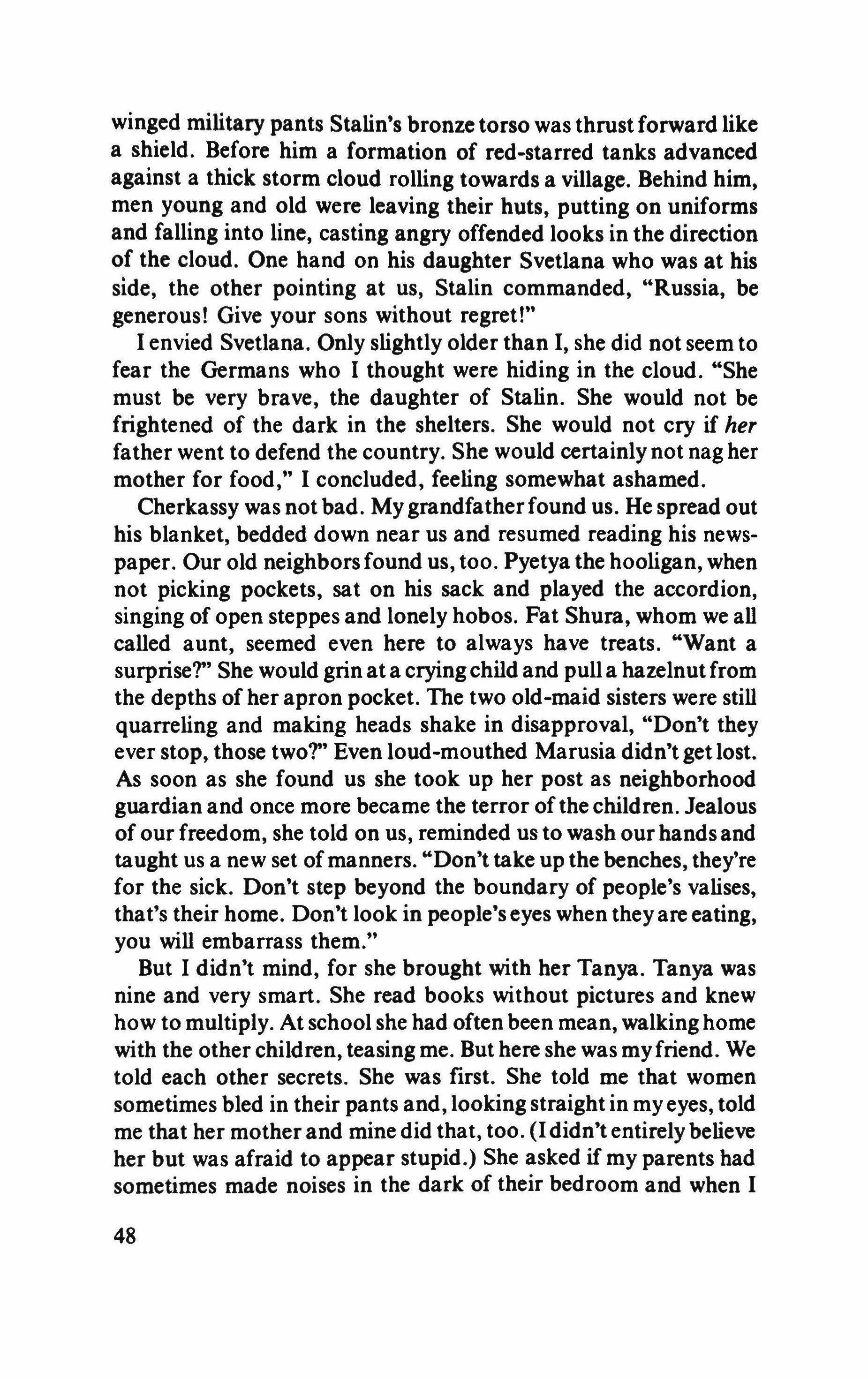
winged military pants Stalin's bronze torso was thrust forward like a shield. Before him a formation of red-starred tanks advanced against a thick storm cloud rolling towards a village. Behind him, men young and old were leaving their huts, putting on uniforms and falling into line, casting angry offended looks in the direction of the cloud. One hand on his daughter Svetlana who was at his side, the other pointing at us, Stalin commanded, "Russia, be generous! Give your sons without regret!"
I envied Svetlana. Only slightly older than I, she did not seem to fear the Germans who I thought were hiding in the cloud. "She must be very brave, the daughter of Stalin. She would not be frightened of the dark in the shelters. She would not cry if her father went to defend the country. She would certainly not nag her mother for food," I concluded, feeling somewhat ashamed.
Cherkassy was not bad. Mygrandfatherfound us. He spread out his blanket, bedded down near us and resumed reading his newspaper. Our old neighbors found us, too. Pyetya the hooligan, when not picking pockets, sat on his sack and played the accordion, singing of open steppes and lonely hobos. Fat Shura, whom we all called aunt, seemed even here to always have treats. "Want a surprise?" She would grin at a cryingchild and pull a hazelnut from the depths of her apron pocket. The two old-maid sisters were still quarreling and making heads shake in disapproval, "Don't they ever stop, those two?" Even loud-mouthed Marusia didn't get lost. As soon as she found us she took up her post as neighborhood guardian and once more became the terror ofthe children. Jealous of our freedom, she told on us, reminded us to wash our hands and taught us a new set of manners. "Don't take up the benches, they're for the sick. Don't step beyond the boundary of people's valises, that's their home. Don't look in people's eyes when they are eating, you will embarrass them."
But I didn't mind, for she brought with her Tanya. Tanya was nine and very smart. She read books without pictures and knew how to multiply, At school she had often been mean, walking home with the other children, teasing me. But here she was myfriend. We told each other secrets. She was first. She told me that women sometimes bled in their pants and, lookingstraight in my eyes, told me that her mother and mine did that, too. (Ididn't entirelybelieve her but was afraid to appear stupid.) She asked if my parents had sometimes made noises in the dark of their bedroom and when I
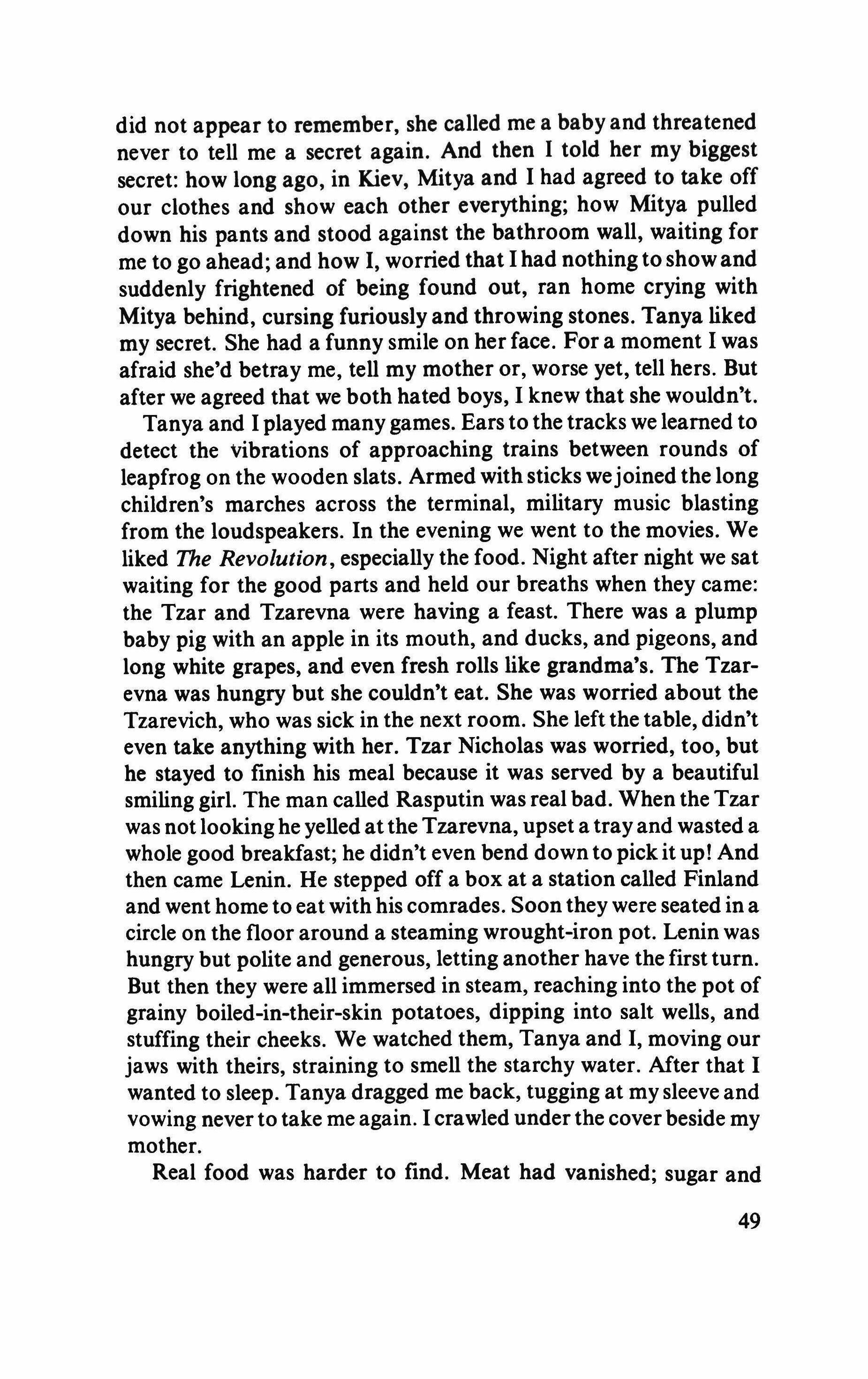
did not appear to remember, she called me a baby and threatened never to tell me a secret again. And then I told her my biggest secret: how long ago, in Kiev, Mitya and I had agreed to take off our clothes and show each other everything; how Mitya pulled down his pants and stood against the bathroom wall, waiting for me to go ahead; and how I, worried that I had nothing to showand suddenly frightened of being found out, ran home crying with Mitya behind, cursing furiously and throwing stones. Tanya liked my secret. She had a funny smile on her face. For a moment I was afraid she'd betray me, tell my mother or, worse yet, tell hers. But after we agreed that we both hated boys, I knew that she wouldn't.
Tanya and I played many games. Ears to the tracks we learned to detect the vibrations of approaching trains between rounds of leapfrog on the wooden slats. Armed with sticks wejoined the long children's marches across the terminal, military music blasting from the loudspeakers. In the evening we went to the movies. We liked The Revolution, especially the food. Night after night we sat waiting for the good parts and held our breaths when they came: the Tzar and Tzarevna were having a feast. There was a plump baby pig with an apple in its mouth, and ducks, and pigeons, and long white grapes, and even fresh rolls like grandma's. The Tzarevna was hungry but she couldn't eat. She was worried about the Tzarevich, who was sick in the next room. She left the table, didn't even take anything with her. Tzar Nicholas was worried, too, but he stayed to finish his meal because it was served by a beautiful smiling girl. The man called Rasputin was real bad. When the Tzar was not looking he yelled at the Tzarevna, upset a tray and wasted a whole good breakfast; he didn't even bend down to pick it up! And then came Lenin. He stepped off a box at a station called Finland and went home to eat with his comrades. Soon they were seated in a circle on the floor around a steaming wrought-iron pot. Lenin was hungry but polite and generous, letting another have the first turn. But then they were all immersed in steam, reaching into the pot of grainy boiled-in-their-skin potatoes, dipping into salt wells, and stuffing their cheeks. We watched them, Tanya and I, moving our jaws with theirs, straining to smell the starchy water. After that I wanted to sleep. Tanya dragged me back, tugging at my sleeve and vowing never to take me again. I crawled under the cover beside my mother.
Real food was harder to find. Meat had vanished; sugar and
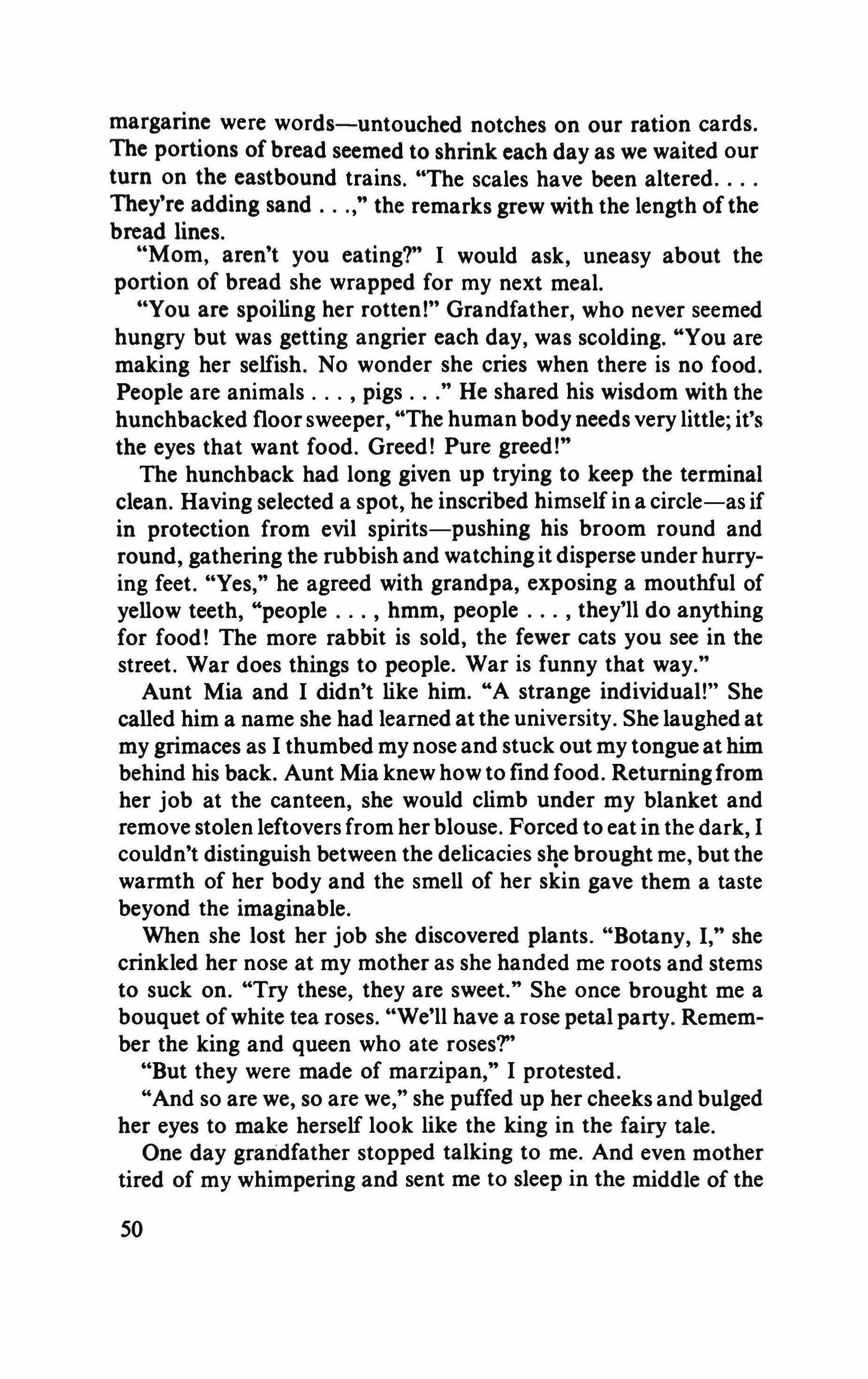
margarine were words-untouched notches on our ration cards. The portions of bread seemed to shrink each day as we waited our turn on the eastbound trains. "The scales have been altered They're adding sand .," the remarks grew with the length of the bread lines.
"Mom, aren't you eating?" I would ask, uneasy about the portion of bread she wrapped for my next meal.
"You are spoiling her rotten!" Grandfather, who never seemed hungry but was getting angrier each day, was scolding. "You are making her selfish. No wonder she cries when there is no food. People are animals pigs He shared his wisdom with the hunchbacked floor sweeper, "The human body needs very little; it's the eyes that want food. Greed! Pure greed!"
The hunchback had long given up trying to keep the terminal clean. Having selected a spot, he inscribed himself in a circle-as if in protection from evil spirits-pushing his broom round and round, gathering the rubbish and watching it disperse under hurrying feet. "Yes," he agreed with grandpa, exposing a mouthful of yellow teeth, "people hmm, people , they'll do anything for food! The more rabbit is sold, the fewer cats you see in the street. War does things to people. War is funny that way."
Aunt Mia and I didn't like him. "A strange individual!" She called him a name she had learned at the university. She laughed at my grimaces as I thumbed my nose and stuck out my tongue at him behind his back. Aunt Mia knew how to find food. Returningfrom her job at the canteen, she would climb under my blanket and remove stolen leftovers from her blouse. Forced to eat in the dark, I couldn't distinguish between the delicacies sqe brought me, but the warmth of her body and the smell of her skin gave them a taste beyond the imaginable.
When she lost her job she discovered plants. "Botany, I," she crinkled her nose at my mother as she handed me roots and stems to suck on. "Try these, they are sweet." She once brought me a bouquet of white tea roses. "We'll have a rose petal party. Remember the king and queen who ate roses?"
"But they were made of marzipan," I protested.
"And so are we, so are we, to she puffed up her cheeks and bulged her eyes to make herself look like the king in the fairy tale.
One day graridfather stopped talking to me. And even mother tired of my Whimpering and sent me to sleep in the middle of the

day. Mia arrived with a brand new dish. "Pressed cottonseeds," she explained, handing me a thick piece ofcardboard. "Chip off a piece and soak it under your tongue. Tastes like oil after awhile." She turned and left without a smile.
Grandfather was right. Not eating wasn't bad. Cramps gave way to wings. Closing my eyes, 1 floated high in the dome ofthe station and looked at the people as they spun on the ground. 1 pressed my fists to my eyes and saw fields of wild strawberries and brooks full of fish.
But things were changing at Cherkassy station. The trains we were waiting for were arriving full, carrying the wounded back from the front. We watched their hooded lights and the red-painted crosses as they passed slowly with their moaning cargo. "Mamma ,to the stifled moans mingled with those of our own sick.
"H she won't die of typhus, she'll go up in flames," grandfather protested as mother doused me with kerosene to protect me from lice.
"She will die of neither," the ever-present hunchback said, "she will starve to death."
1 didn't know much about death. Once, torn from my sleep by a glare of light, 1 saw a procession ofyellow lanterns. "Shsh, go back to sleep," mother whispered, pressing me to her body. 1 freed one eye just long enough to see the stretchers with human forms under canvas sheets. Quickly, 1 crawled under my mother's sweater. "Did people always die at night?"
"Did you see the corpses?" Tanya asked in the morning. "I saw five."
"I saw seven," 1 boasted. "Mother says they get old and die."
"They tell that to babies," Tanya curled her upper lip. "They die 'cause they're sick. The typhus kills them. And sometimes they starve: they swell and swell until they explode."
"Does that hurt?" 1 flinched at the picture.
"Once they are dead theydon't feel a thing." She poked herselfin the cheek to demonstrate numbness and an air of superiority.
"But how can you tell they are dead?" I forgot about hiding my fear.
"They don't breathe or move, stupid." She stretched out fulllength, made herself still and held her breath.
That night I was afraid to close my eyes-afraid to keep them open. I strained to keep breathing, but the more 1 thought of it the
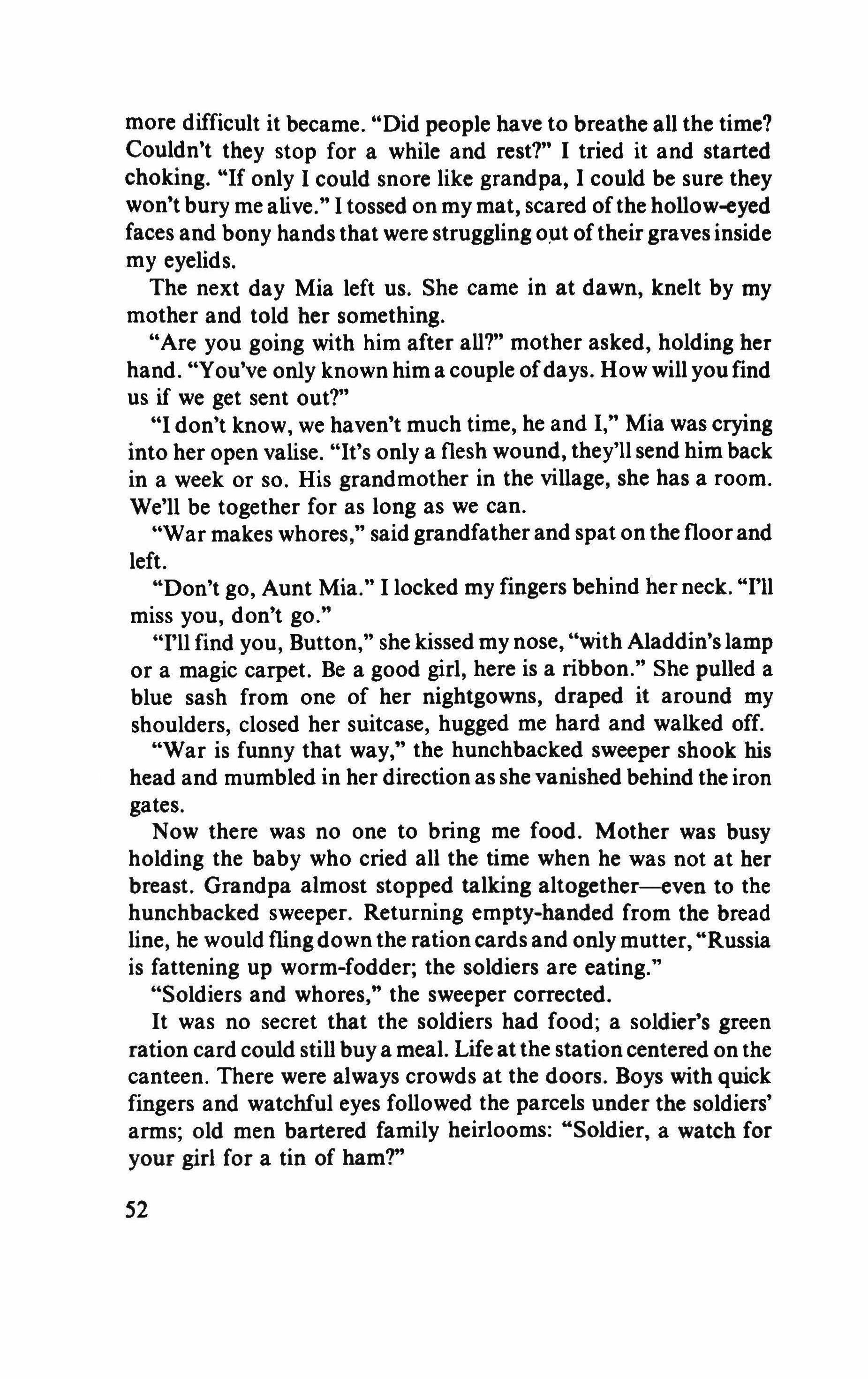
more difficult it became. "Did people have to breathe all the time? Couldn't they stop for a while and rest?" I tried it and started choking. "If only I could snore like grandpa, I could be sure they won't bury me alive." I tossed on my mat, scared ofthe hollow-eyed faces and bony hands that were struggling out oftheir graves inside my eyelids.
The next day Mia left us. She came in at dawn, knelt by my mother and told her something.
"Are you going with him after all?" mother asked, holding her hand. "You've only known him a couple ofdays. How will you find us if we get sent out?"
"I don't know, we haven't much time, he and I," Mia was crying into her open valise. "It's only a flesh wound, they'll send him back in a week or so. His grandmother in the village, she has a room. We'll be together for as long as we can.
"War makes whores," said grandfather and spat on the floor and left.
"Don't go, Aunt Mia." I locked my fingers behind her neck. "I'll miss you, don't go."
"I'll find you, Button," she kissed my nose, "with Aladdin's lamp or a magic carpet. Be a good girl, here is a ribbon." She pulled a blue sash from one of her nightgowns, draped it around my shoulders, closed her suitcase, hugged me hard and walked off.
"War is funny that way," the hunchbacked sweeper shook his head and mumbled in her direction as she vanished behind the iron gates.
Now there was no one to bring me food. Mother was busy holding the baby who cried all the time when he was not at her breast. Grandpa almost stopped talking altogether--even to the hunchbacked sweeper. Returning empty-handed from the bread line, he would fling down the ration cards and only mutter, "Russia is fattening up worm-fodder; the soldiers are eating."
"Soldiers and whores," the sweeper corrected.
It was no secret that the soldiers had food; a soldier's green ration card could still buy a meal. Life at the station centered on the canteen. There were always crowds at the doors. Boys with quick fingers and watchful eyes followed the parcels under the soldiers' arms; old men bartered family heirlooms: "Soldier, a watch for your girl for a tin of ham?"

"Let him eat, he's defending your skin!" There was always the voice of the righteous.
The square at the canteen was full of women. Dressed in gay prints, bows in their hair and bright red lips, they leaned on the walls, pouting and smiling mysterious smiles. Sometimes they tossed 'their hair, fluttered their eyelashes and invited soldiers for strolls. They returned with food. And some of them shared. One day one who looked like Mia fed me some sprats. "Fishing was good today, little one," she laughed, blowing the smell of wine in my face while I soaked up the oil with crusts of bread.
"Mother, why don't you wear pretty dresses?" I nagged.
"When the war is over," she promised.
"But why not now?" I persisted. "And where is your lipstick?"
"Here," she said, pulling a black tube from her bag, "I'll wear it for you."
"And will you wear a red bow in your hair?"
"What for?"
"To walk with the soldiers at the canteen."
"I told you to stay away from those women!" she yelled and smacked me twice across the face.
"They eat!" I answered. I met her eyes and stared her down.
Tanya didn't want to play with me anymore-not even cards. All day long she lay on the floor pretending a stomachache. At night they put her on the bench with some coats under her head. First she said she was cold; then she said she was hot, kicking off all the covers. And then she laystill, her eyes wide-open and shiny, staring at the ceiling; and I was glad she didn't close them for she wasn't moving much and I couldn't tell if she was breathing or not. In the morning I ran away and hid.
"Give me my dress with the violets," I demanded one day, as mother was changing my clothes, "and Mia's ribbon, too. Now, tie it. No, not like that, the bow on top."
I walked towards the canteen and leaned on the wall.
It was early in the morning. Only a few people were out on the square. Some soldiers stood in a circle, talking and joking and poking shoulders.
I looked and looked at them, trying to imitate the smiles I had seen, but the men did not notice me.
I tried a pout. "There's a girljust for you," one soldier slapped
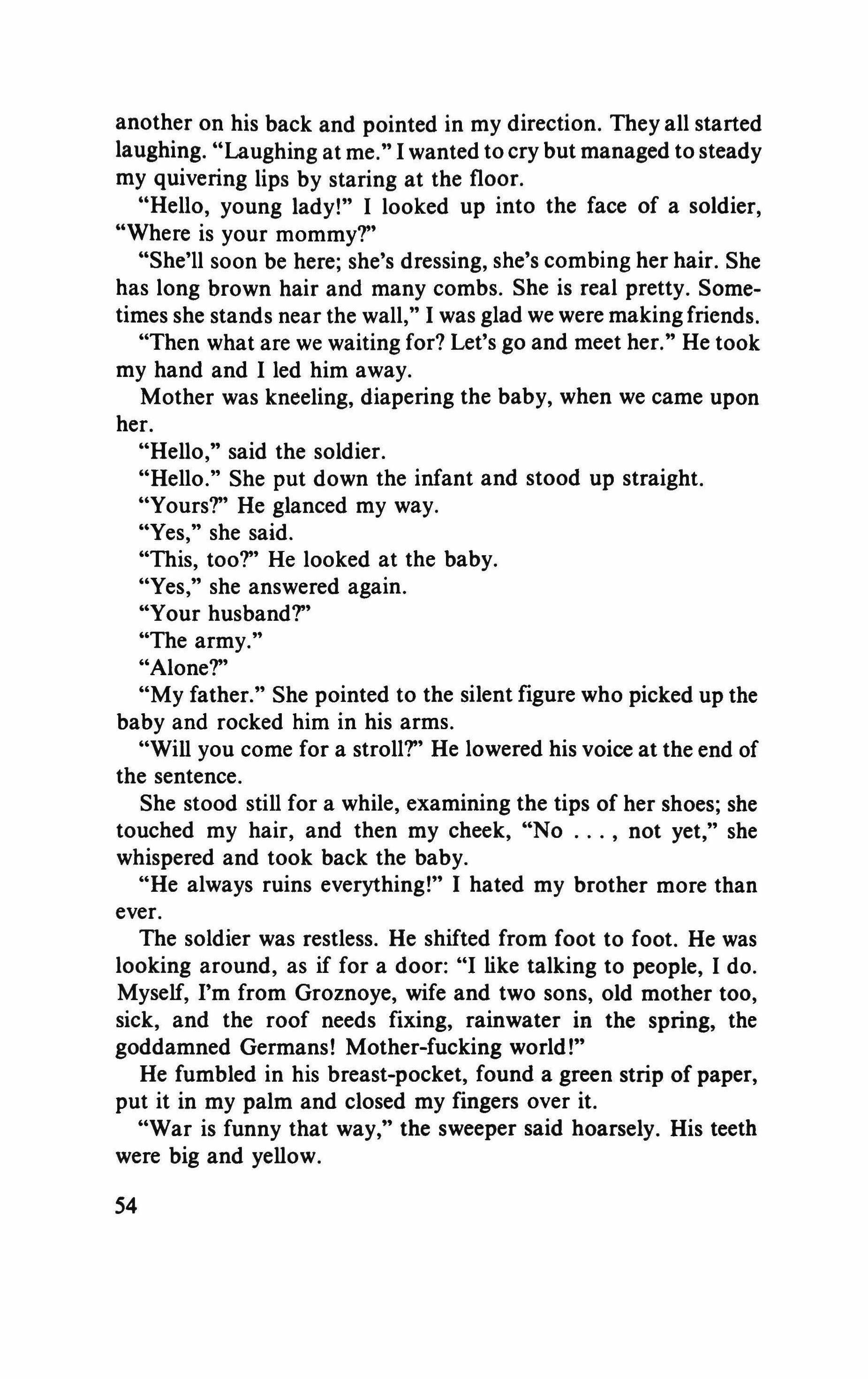
another on his back and pointed in my direction. They all started laughing. "Laughing at me." 1 wanted to cry but managed to steady my quivering lips by staring at the floor.
"Hello, young lady!" I looked up into the face of a soldier, "Where is your mommy?"
"She'll soon be here; she's dressing, she's combing her hair. She has long brown hair and many combs. She is real pretty. Sometimes she stands near the wall," 1 was glad we were makingfriends.
"Then what are we waiting for? Let's go and meet her." He took my hand and I led him away.
Mother was kneeling, diapering the baby, when we came upon her.
"Hello," said the soldier.
"Hello." She put down the infant and stood up straight. "Yours?" He glanced my way.
"Yes," she said.
"This, too?" He looked at the baby.
"Yes," she answered again.
"Your husband?"
"The army."
"Alone?"
"My father." She pointed to the silent figure who picked up the baby and rocked him in his arms.
"Will you come for a stroll?" He lowered his voice at the end of the sentence.
She stood still for a while, examining the tips of her shoes; she touched my hair, and then my cheek, "No not yet," she whispered and took back the baby.
"He always ruins everything!" I hated my brother more than ever.
The soldier was restless. He shifted from foot to foot. He was looking around, as if for a door: "I like talking to people, I do.
Myself, I'm from Groznoye, wife and two sons, old mother too, sick, and the roof needs fixing, rainwater in the spring, the goddamned Germans! Mother-fucking world!"
He fumbled in his breast-pocket, found a green strip of paper, put it in my palm and closed my fingers over it.
"War is funny that way," the sweeper said hoarsely. His teeth were big and yellow.
S4
from Proud Monster: Sketches
Ian MacMillan
Ravensbruck, Spring 1942-Giving Birth
Marte Dekker waits for the young Polish woman lying on the dirty mat in the corner of the treatment room to give birth, and glances frequently at Luise Schmidt, who runs water into a deep sink. Schmidt isn't feeling well today because she and her lover, an SS information officer, got drunk and spent the previous night together. Schmidt has heard rumors ofhis infidelity and has spent the morning taking it out on prisoners, particularly the seamstresses in the block she commands. She has beaten two of them black and blue with a section of metal cable, her favorite weapon. One is so sick that she will probably be put out of her misery with an Evipan injection. And now this surprise stint in the hospital is further annoyance for her-she is not a nurse and attendingabortions and disposing of the newborn is work she feels is beneath her.
The Polish woman cries out, twisting the front ofher smock with white-knuckled fists. Marte observes that the monstrous belly has flattened: the baby is in the birth canal. She leans down to the sweating woman and nods, than balloons out her cheeks in a parody of straining to push. Blearily, the woman comprehendsand pushes until her face is nearly purple with the effort.
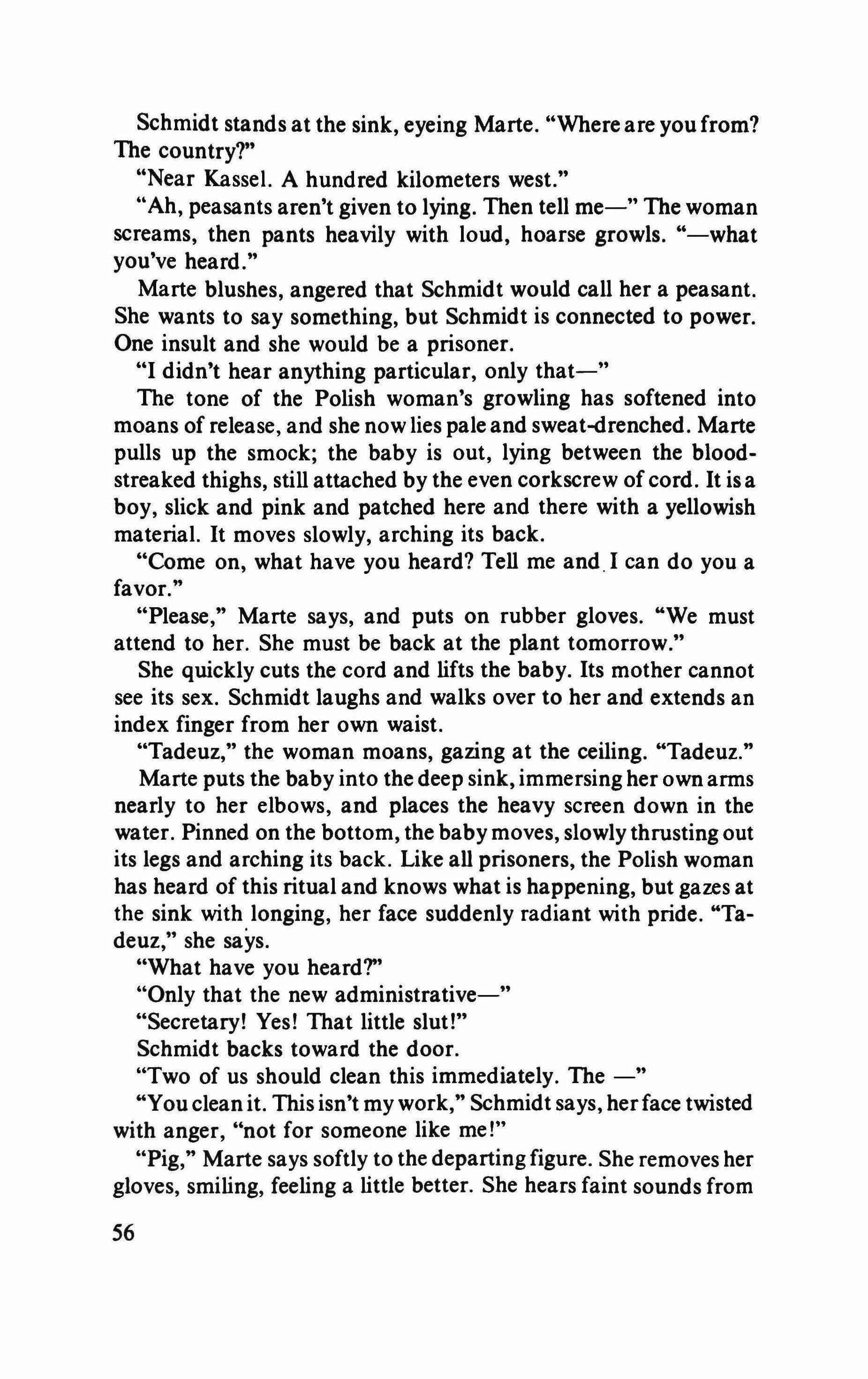
Schmidt stands at the sink, eyeing Marte. "Where are you from? The country?"
"Near Kassel. A hundred kilometers west."
"Ah, peasants aren't given to lying. Then tell me-" The woman screams, then pants heavily with loud, hoarse growls. "-what you've heard."
Marte blushes, angered that Schmidt would call her a peasant. She wants to say something, but Schmidt is connected to power. One insult and she would be a prisoner.
"I didn't hear anything particular, only that-"
The tone of the Polish woman's growling has softened into moans of release, and she now lies pale and sweat-drenched. Marte pulls up the smock; the baby is out, lying between the bloodstreaked thighs, still attached by the even corkscrew of cord. It is a boy, slick and pink and patched here and there with a yellowish material. It moves slowly, arching its back.
"Come on, what have you heard? Tell me andI can do you a favor."
"Please," Marte says, and puts on rubber gloves. "We must attend to her. She must be back at the plant tomorrow."
She quickly cuts the cord and lifts the baby. Its mother cannot see its sex. Schmidt laughs and walks over to her and extends an index finger from her own waist.
"Tadeuz," the woman moans, gazing at the ceiling. "Tadeuz."
Marte puts the baby into the deep sink, immersing her own arms nearly to her elbows, and places the heavy screen down in the water. Pinned on the bottom, the baby moves, slowlythrusting out its legs and arching its back. Like all prisoners, the Polish woman has heard of this ritual and knows what is happening, but gazes at the sink with longing, her face suddenly radiant with pride. "Tadeuz," she says.
"What have you heard?"
"Only that the new administrative-" "Secretary! Yes! That little slut!"
Schmidt backs toward the door.
"Two of us should clean this immediately. The -" "You clean it. This isn't my work," Schmidt says, herface twisted with anger, "not for someone like me!"
"Pig," Marte says softly to the departingfigure. She removes her gloves, smiling, feeling a little better. She hears faint sounds from
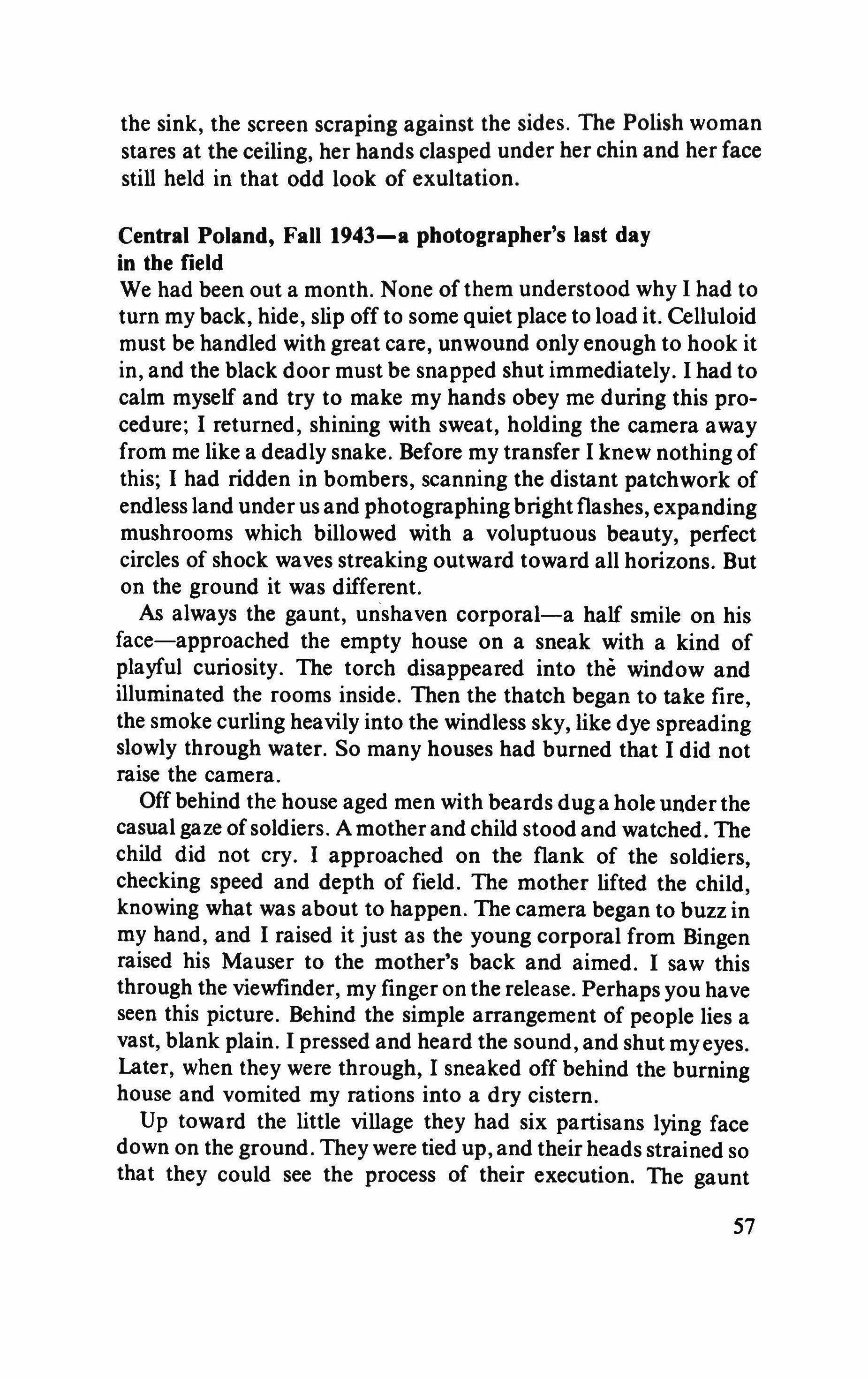
the sink, the screen scraping against the sides. The Polish woman stares at the ceiling, her hands clasped under her chin and her face still held in that odd look of exultation.
Central Poland, Fall 1943-a photographer's last day in the field
We had been out a month. None of them understood why I had to turn my back, hide, slip off to some quiet place to load it. Celluloid must be handled with great care, unwound only enough to hook it in, and the black door must be snapped shut immediately. I had to calm myself and try to make my hands obey me during this procedure; I returned, shining with sweat, holding the camera away from me like a deadly snake. Before my transfer I knew nothing of this; I had ridden in bombers, scanning the distant patchwork of endless land under us and photographingbrightflashes, expanding mushrooms which billowed with a voluptuous beauty, perfect circles of shock waves streaking outward toward all horizons. But on the ground it was different.
As always the gaunt, unshaven corporal-a half smile on his face-approached the empty house on a sneak with a kind of playful curiosity. The torch disappeared into the window and illuminated the rooms inside. Then the thatch began to take fire, the smoke curling heavily into the windless sky, like dye spreading slowly through water. So many houses had burned that I did not raise the camera.
Off behind the house aged men with beards dug a hole under the casual gaze ofsoldiers. A mother and child stood and watched. The child did not cry. I approached on the flank of the soldiers, checking speed and depth of field. The mother lifted the child, knowing what was about to happen. The camera began to buzz in my hand, and I raised it just as the young corporal from Bingen raised his Mauser to the mother's back and aimed. I saw this through the viewfinder, my finger on the release. Perhaps you have seen this picture. Behind the simple arrangement of people lies a vast, blank plain. I pressed and heard the sound, and shut my eyes. Later, when they were through, I sneaked off behind the burning house and vomited my rations into a dry cistern.
Up toward the little village they had six partisans lying face down on the ground. They were tied up, and their heads strained so that they could see the process of their execution. The gaunt
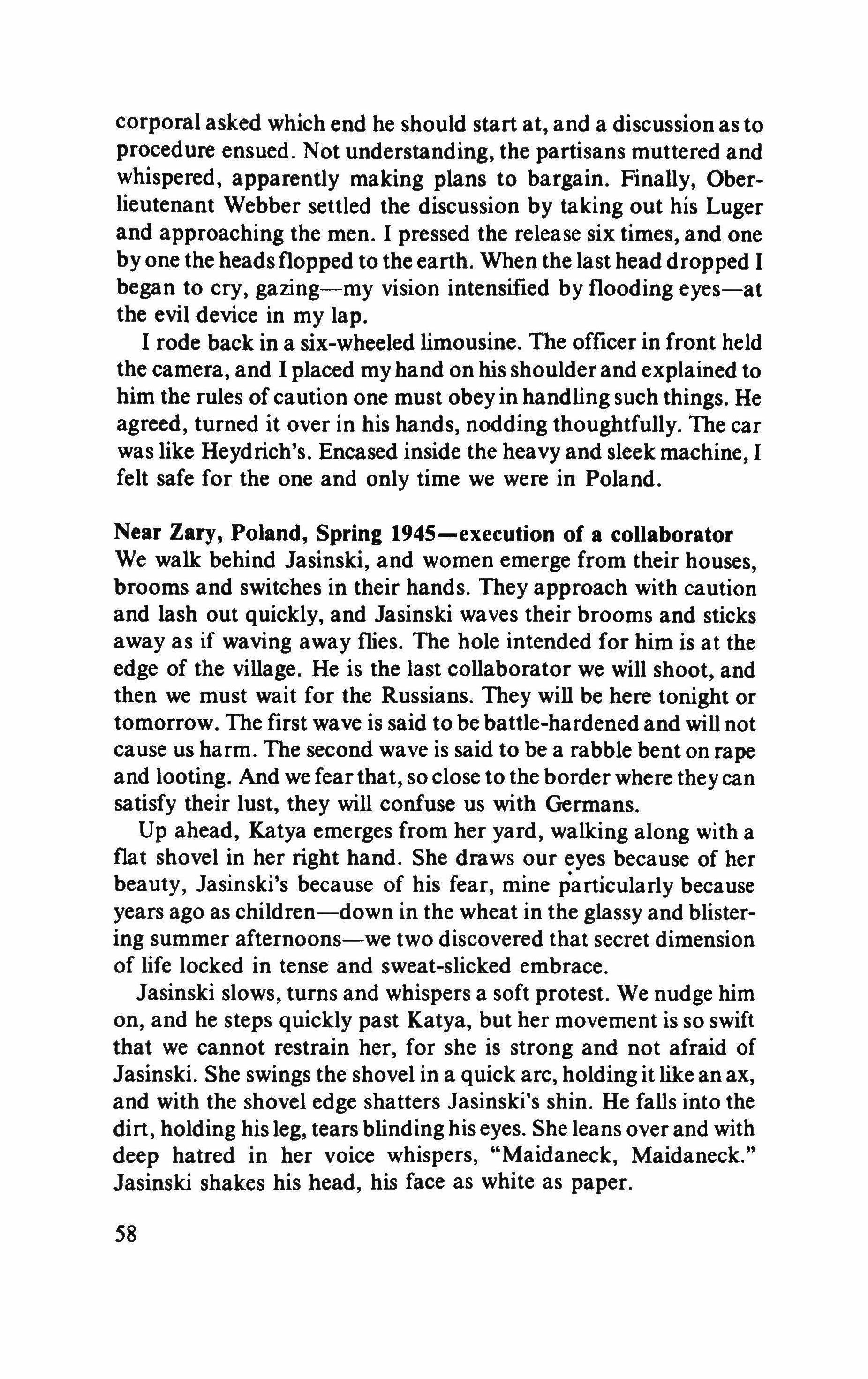
corporal asked which end he should start at, and a discussion as to procedure ensued. Not understanding, the partisans muttered and whispered, apparently making plans to bargain. Finally, Oberlieutenant Webber settled the discussion by taking out his Luger and approaching the men. I pressed the release six times, and one by one the heads flopped to the earth. When the last head dropped I began to cry, gazing-my vision intensified by flooding eyes-at the evil device in my lap.
I rode back in a six-wheeled limousine. The officer in front held the camera, and I placed my hand on his shoulder and explained to him the rules of caution one must obey in handling such things. He agreed, turned it over in his hands, nodding thoughtfully. The car was like Heydrich's. Encased inside the heavy and sleek machine, I felt safe for the one and only time we were in Poland.
Near Zary, Poland, Spring 1945-execution of a collaborator
We walk behind Jasinski, and women emerge from their houses, brooms and switches in their hands. They approach with caution and lash out quickly, and Jasinski waves their brooms and sticks away as if waving away flies. The hole intended for him is at the edge of the village. He is the last collaborator we will shoot, and then we must wait for the Russians. They will be here tonight or tomorrow. The first wave is said to be battle-hardened and will not cause us harm. The second wave is said to be a rabble bent on rape and looting. And we fearthat, so close to the border where they can satisfy their lust, they will confuse us with Germans.
Up ahead, Katya emerges from her yard, walking along with a flat shovel in her right hand. She draws our eyes because of her beauty, Jasinski's because of his fear, mine particularly because years ago as children-down in the wheat in the glassy and blistering summer afternoons-we two discovered that secret dimension of life locked in tense and sweat-slicked embrace.
Jasinski slows, turns and whispers a soft protest. We nudge him on, and he steps quickly past Katya, but her movement is so swift that we cannot restrain her, for she is strong and not afraid of Jasinski. She swings the shovel in a quick arc, holding it like an ax, and with the shovel edge shatters Jasinski's shin. He falls into the dirt, holding his leg, tears blinding his eyes. She leans over and with deep hatred in her voice whispers, "Maidaneck, Maidaneck." Jasinski shakes his head, his face as white as paper.
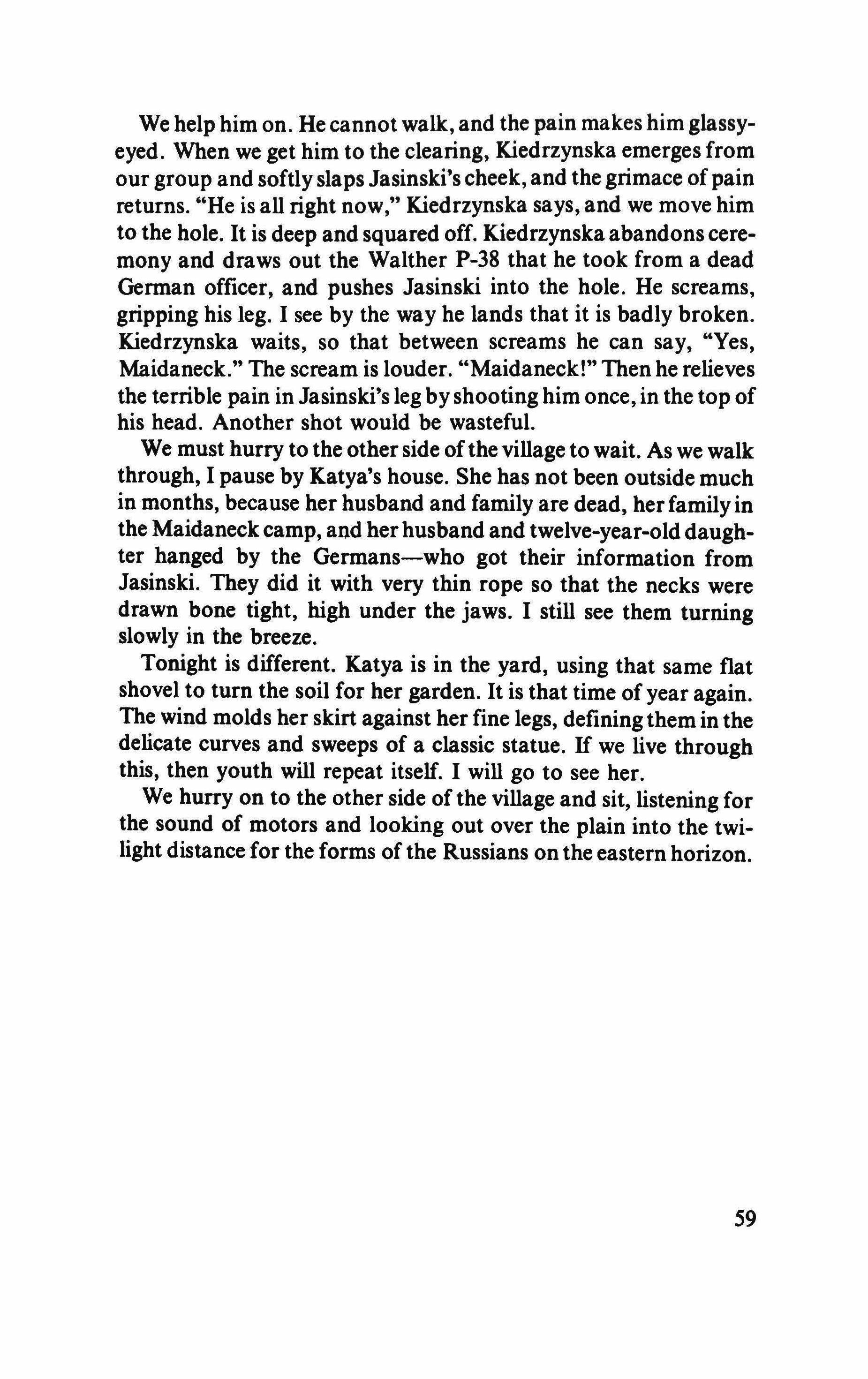
We help him on. He cannot walk, and the pain makes him glassyeyed. When we get him to the clearing, Kiedrzynska emerges from our group and softlyslaps Jasinski's cheek, and the grimace ofpain returns. "He is all right now," Kiedrzynska says, and we move him to the hole. It is deep and squared off. Kiedrzynska abandons ceremonyand draws out the Walther P-38 that he took from a dead German officer, and pushes Jasinski into the hole. He screams, gripping his leg. I see by the way he lands that it is badly broken. Kiedrzynska waits, so that between screams he can say, "Yes, Maidaneck." The scream is louder. "Maidaneck!" Then he relieves the terrible pain in Jasinski's legbyshooting him once, in the top of his head. Another shot would be wasteful.
We must hurry to the other side ofthe village to wait. As we walk through, I pause by Katya's house. She has not been outside much in months, because her husband and family are dead, her family in the Maidaneck camp, and her husband and twelve-year-old daughter hanged by the Germans-who got their information from Jasinski. They did it with very thin rope so that the necks were drawn bone tight, high under the jaws. I still see them turning slowly in the breeze.
Tonight is different. Katya is in the yard, using that same flat shovel to turn the soil for her garden. It is that time of year again. The wind molds her skirt against her fine legs, definingthem in the delicate curves and sweeps of a classic statue. If we live through this, then youth will repeat itself. I will go to see her.
We hurry on to the other side of the village and sit, listening for the sound of motors and looking out over the plain into the twilight distance for the forms of the Russians on the eastern horizon.
Blue day
Arnost Lustig
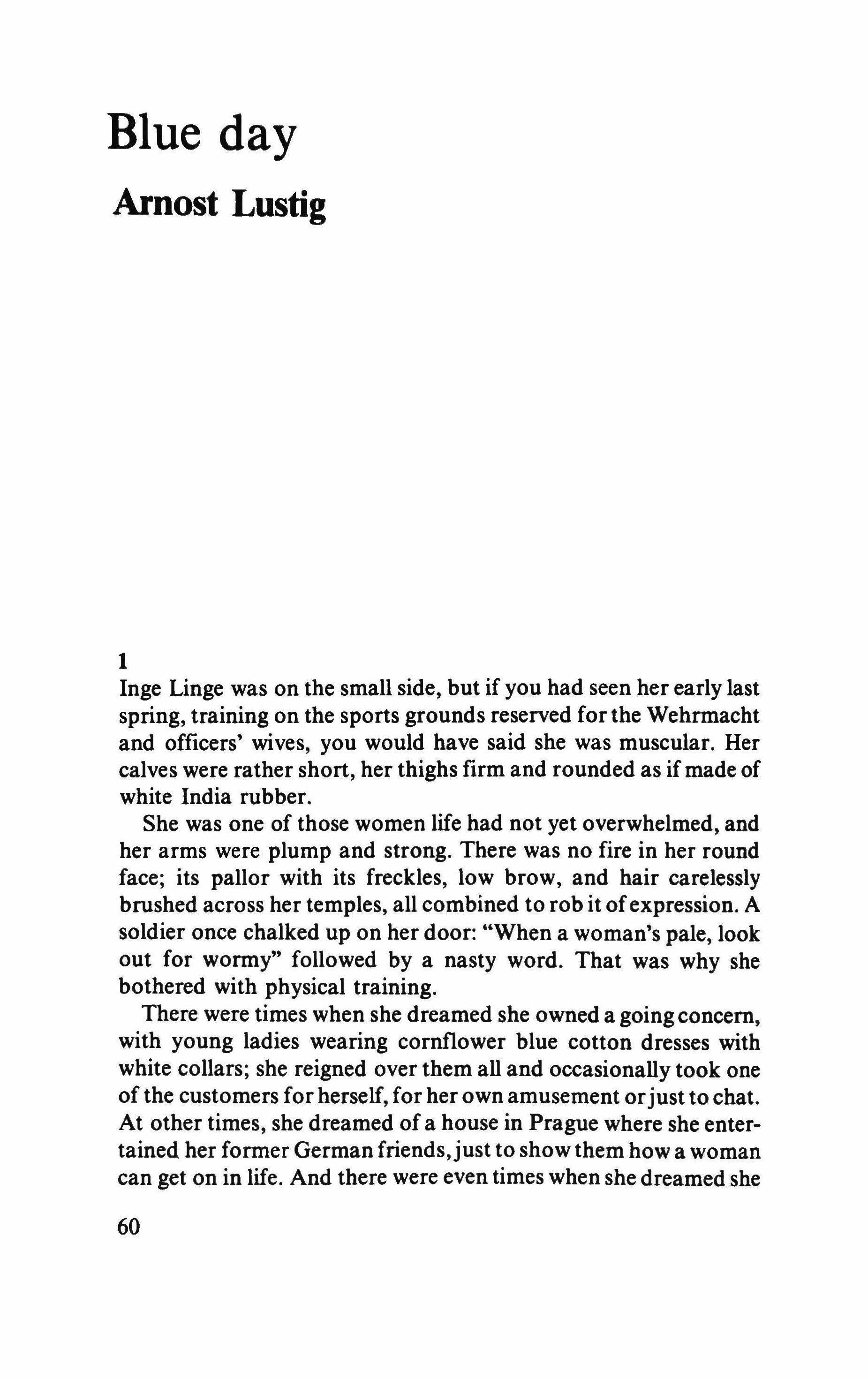
1
Inge Linge was on the small side, but if you had seen her early last spring, training on the sports grounds reserved for the Wehrmacht and officers' wives, you would have said she was muscular. Her calves were rather short, her thighs firm and rounded as ifmade of white India rubber.
She was one of those women life had not yet overwhelmed, and her arms were plump and strong. There was no fire in her round face; its pallor with its freckles, low brow, and hair carelessly brushed across her temples, all combined to rob it ofexpression. A soldier once chalked up on her door: "When a woman's pale, look out for wormy" followed by a nasty word. That was why she bothered with physical training.
There were times when she dreamed she owned a going concern, with young ladies wearing cornflower blue cotton dresses with white collars; she reigned over them all and occasionally took one of the customers for herself, for her own amusement orjust to chat. At other times, she dreamed of a house in Prague where she entertained her former German friends,just to show them how a woman can get on in life. And there were even times when she dreamed she

was tall and well-built, with the long legs of a film star. Her eyes were snake-green with dark lashes, playful and demanding, as though there were no war to burden the intricate machinery of the great Reich.
Originally, Inge Linge had come from Magdeburg to work in the Prague Labor Office as a secretary to one of the Reich's administrative officers. She turned out to be ill-fitted for the role of office mouse because of her temperament and faulty spelling-nor did she show any enthusiasm for her job. She was not very popular with the wives of her superiors either, and so it was fairly easy for her to set out on her own at the beginning of February 1943. The German Reich was in trouble along the Don or the Volgajustthen, trying to cross the river and then proceed across the steppes to occupy Russia.
The four-story house, No. 14, where Inge Linge lived in her office days, having refused to live in the Regulus Hotel, had two lower floors intended by the builder as expensive bachelor apartments and accommodations for their ladylike counterparts. Faced with Swedish marble, the building stood self-assured among decaying palaces which were falling down one after the other. It was not until later that the apartments were taken over by post office workers, tailors and shop assistants with large families.
Inge Linge was given an apartment here in May of 1942, andjust as she did not have to stain her hands or her green overalls with black and red ink for long, she did not stay here long either. This was the time of great military victories, except for briefdelays here and there along one of the Russian rivers; all she had to do at the Housing Office was mention the name of her friend, Major Detleff von Fuchs. From the very beginning, the slim, dark-complexioned major with the pimply face and brow had been her stay and support; he always treated her like a lady. He liked her because she gave him what he wanted without beating around the bush, and as with his barber and his tailor, he had his time set aside for her.
Because she chose not to move into one of those old apartments where, as the major put it, you could organize bug hunts, she was given a Jewish apartment with a southern exposure. The sun shone in almost all day and she could watch the children playing in the street in front of the chemist's; they would be leaning over the gutter, which seemed to contain secrets waiting to be revealed, or fighting over something. Children were her unfulfilled desire. Now,

though, they called each other Ivan and Jimmy and Friedrich and fought every day until the blood ran.
She remembered Magdeburg and it occurred to her that old towns, like old houses, always had something in common and, although the place did not look as neat and tidy as her German apartment, she stopped feeling homesick in time. Perhaps her own homesickness had been partly imagined anyway: people from the Reich always missed their native soil, even though they were far better off here than they had been in Germany, and Inge Linge had not wanted to appear any different.
The woman whose apartment she was given had been a Jewess, Ida Geron, who suffered from TB and had been sent away in January of 1942. She had moved slowly down the hallway, her two bags on her back, stooped with the weight. Her greed had punished her, Inge Linge thought, for trying to take the whole of the permitted fifty kilograms with her to the East. Only ten kilograms were allowed for hand luggage, and the transport authonties issued a receipt for the rest. Everybody knew perfectly well what that meant.
Without a word of farewell, Ida Geron had gone, dragging her feet down the stairs, disgustingly thin, her shoulder blades sticking out, all skin and bone, with her old-fashioned boots laced up over her ankles like a bareback rider in the circus. She certainly got no pleasure out of the fact that what she left behind was handed over to the Winterhilfe, and she was probably sorry she couldn't stuff her furniture into her brand-new bag with the yellow straps.
Inge Linge told Major Detleffvon Fuchs that the apartment was empty. Then she asked him if she could trade her own small apartment for Ida Geron's, lowering her long chestnut lashes as she spoke. Even before he replied, she realized that he wanted to take her to bed immediately. Detleff Fuchs was one ofthe few men who could have, too. Then she enjoyed one of those lovely days that made up for all the insults and cruel twists offate-for having been born to a barber and never having known her own mother.
In her mind she wrote long letters home to all kinds of people in Magdeburg-people she had known in school or neighborsdescribing in every detail the private house or the house of pleasure, as if they really belonged to her. She was delighted whenever she thought of the girls in their cornflower blue dresses with white collars, and ofherselfstanding at the entrance where the door set in
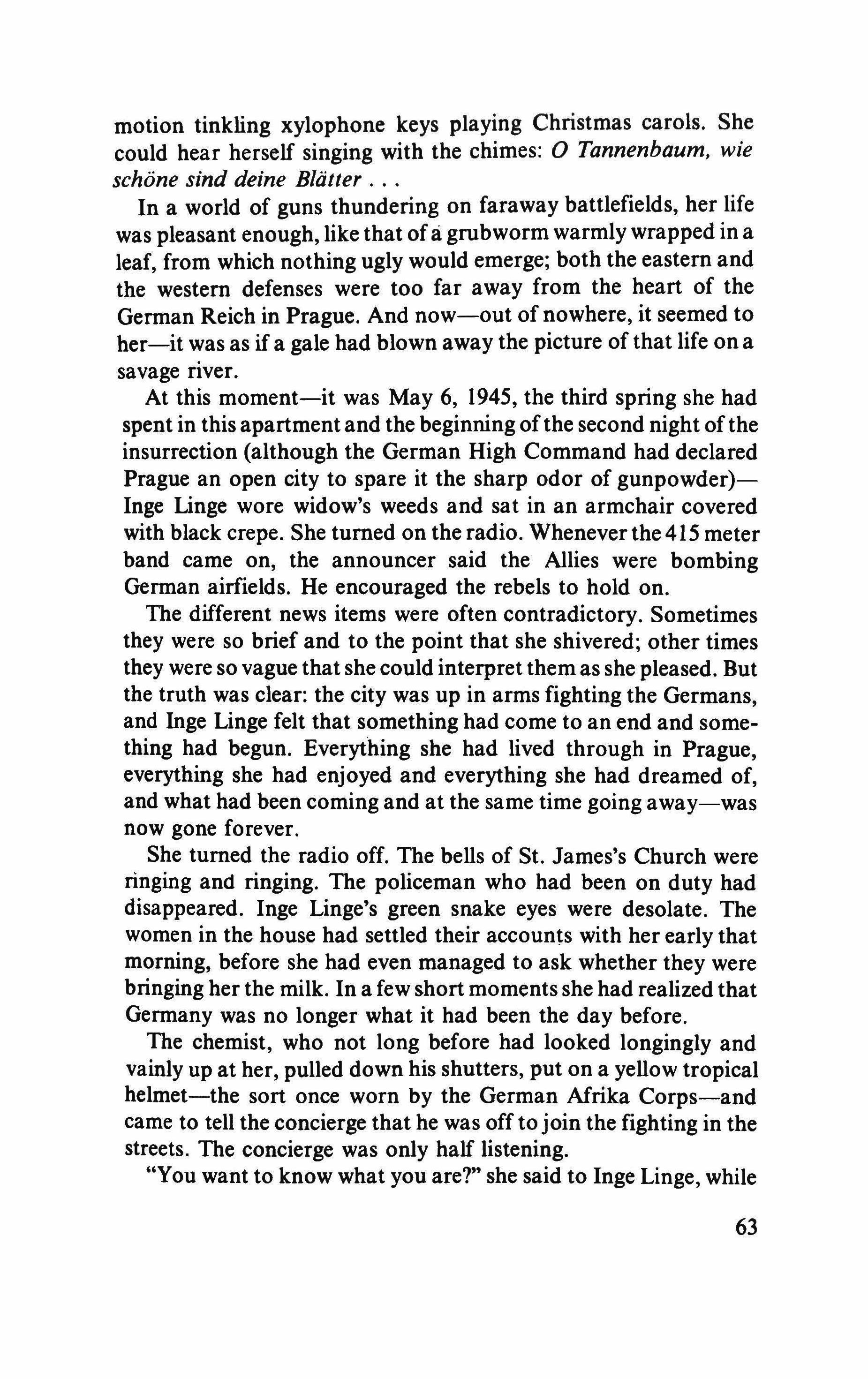
motion tinkling xylophone keys playing Christmas carols. She could hear herself singing with the chimes: 0 Tannenbaum, wie schone sind deine Blatter
In a world of guns thundering on faraway battlefields, her life was pleasant enough, like that ofa grubworm warmly wrapped in a leaf, from which nothing ugly would emerge; both the eastern and the western defenses were too far away from the heart of the German Reich in Prague. And now-out of nowhere, it seemed to her-it was as if a gale had blown away the picture of that life on a savage river.
At this moment-it was May 6, 1945, the third spring she had spent in this apartment and the beginning ofthe second night ofthe insurrection (although the German High Command had declared Prague an open city to spare it the sharp odor of gunpowder)Inge Linge wore widow's weeds and sat in an armchair covered with black crepe. She turned on the radio. Whenever the 415 meter band came on, the announcer said the Allies were bombing German airfields. He encouraged the rebels to hold on.
The different news items were often contradictory. Sometimes they were so brief and to the point that she shivered; other times they were so vague that she could interpret them as she pleased. But the truth was clear: the city was up in arms fighting the Germans, and Inge Linge felt that something had come to an end and something had begun. Everything she had lived through in Prague, everything she had enjoyed and everything she had dreamed of, and what had been coming and at the same time going away-was now gone forever.
She turned the radio off. The bells of St. James's Church were ringing and ringing. The policeman who had been on duty had disappeared. Inge Linge's green snake eyes were desolate. The women in the house had settled their accounts with her early that morning, before she had even managed to ask whether they were bringing her the milk. In a few short moments she had realized that Germany was no longer what it had been the day before.
The chemist, who not long before had looked longingly and vainly up at her, pulled down his shutters, put on a yellow tropical helmet-the sort once worn by the German Afrika Corps-and came to tell the concierge that he was off to join the fighting in the streets. The concierge was only half listening.
"You want to know what you are?" she said to Inge Linge, while
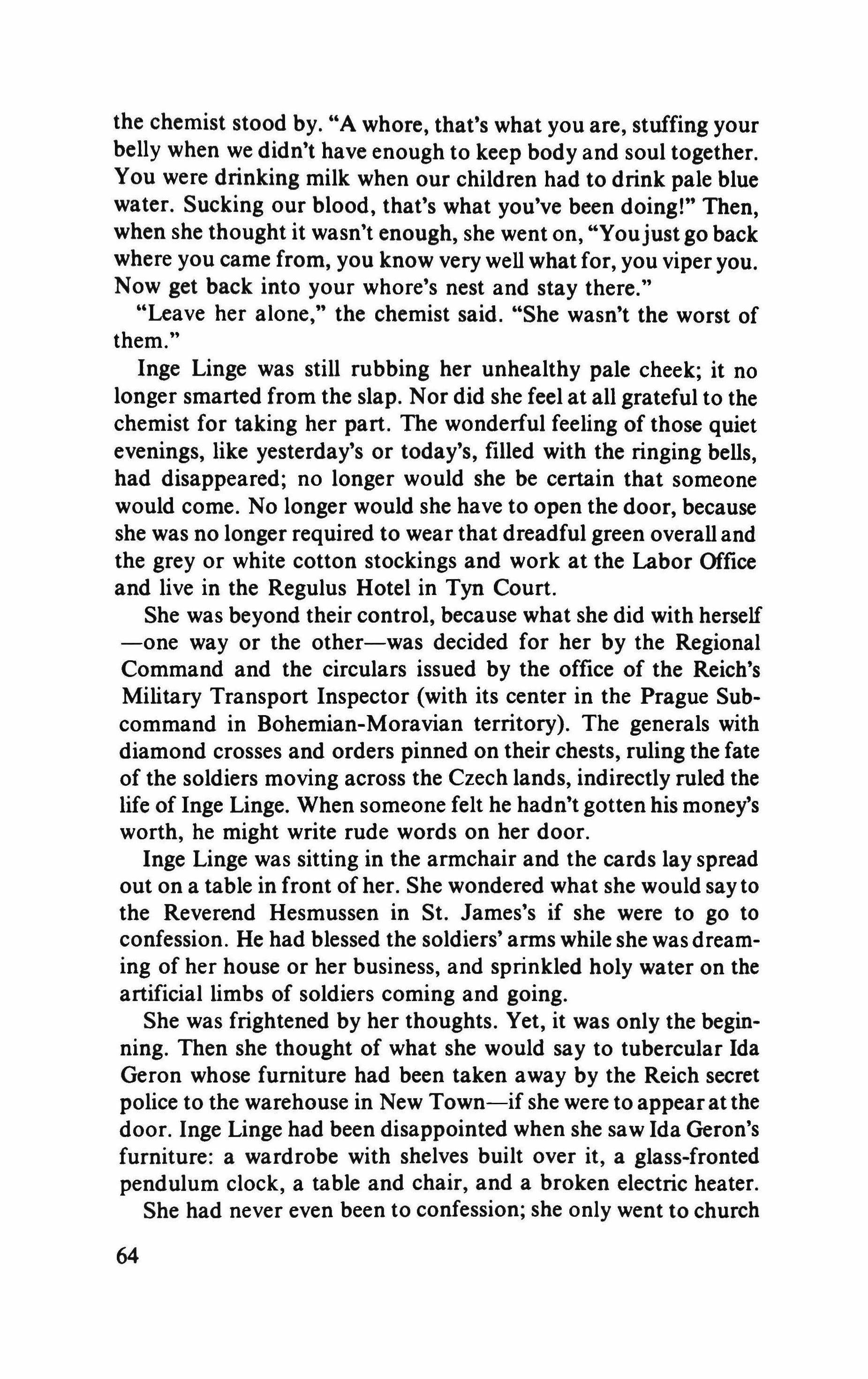
the chemist stood by. "A whore, that's what you are, stuffing your belly when we didn't have enough to keep body and soul together. You were drinking milk when our children had to drink pale blue water. Sucking our blood, that's what you've been doing!" Then, when she thought it wasn't enough, she went on, "Youjust go back where you came from, you know very well what for, you viper you. Now get back into your whore's nest and stay there."
"Leave her alone," the chemist said. "She wasn't the worst of them."
Inge Linge was still rubbing her unhealthy pale cheek; it no longer smarted from the slap. Nor did she feel at all grateful to the chemist for taking her part. The wonderful feeling of those quiet evenings, like yesterday's or today's, filled with the ringing bells, had disappeared; no longer would she be certain that someone would come. No longer would she have to open the door, because she was no longer required to wear that dreadful green overall and the grey or white cotton stockings and work at the Labor Office and live in the Regulus Hotel in Tyn Court.
She was beyond their control, because what she did with herself -one way or the other-was decided for her by the Regional Command and the circulars issued by the office of the Reich's Military Transport Inspector (with its center in the Prague Subcommand in Bohemian-Moravian territory). The generals with diamond crosses and orders pinned on their chests, ruling the fate of the soldiers moving across the Czech lands, indirectly ruled the life of Inge Linge. When someone felt he hadn't gotten his money's worth, he might write rude words on her door.
Inge Linge was sitting in the armchair and the cards lay spread out on a table in front of her. She wondered what she would say to the Reverend Hesmussen in St. James's if she were to go to confession. He had blessed the soldiers' arms while she was dreaming of her house or her business, and sprinkled holy water on the artificial limbs of soldiers coming and going.
She was frightened by her thoughts. Yet, it was only the beginning. Then she thought of what she would say to tubercular Ida Geron whose furniture had been taken away by the Reich secret police to the warehouse in New Town-if she were to appear at the door. Inge Linge had been disappointed when she saw Ida Geron's furniture: a wardrobe with shelves built over it, a glass-fronted pendulum clock, a table and chair, and a broken electric heater.
She had never even been to confession; she only went to church
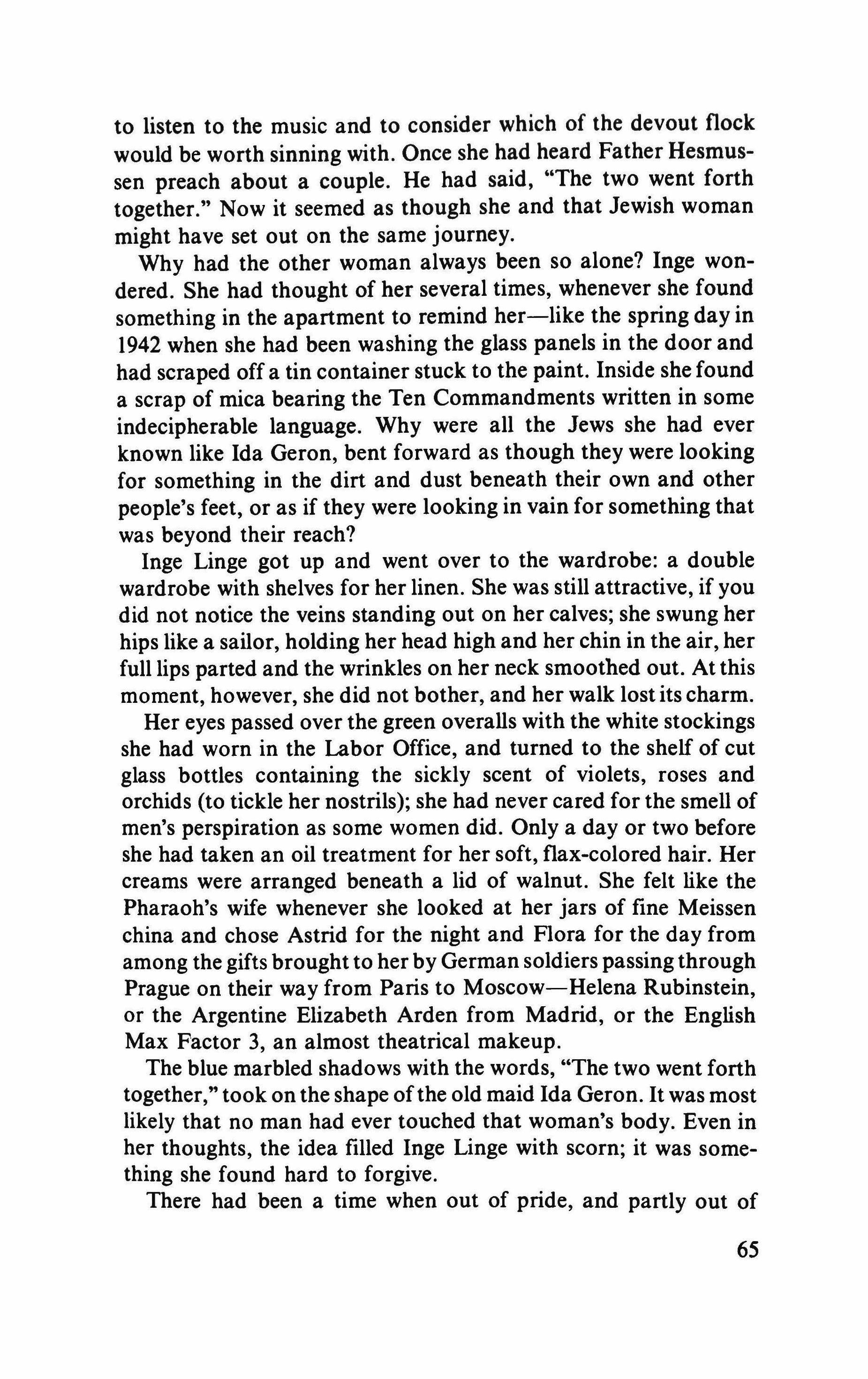
to listen to the music and to consider which of the devout flock would be worth sinning with. Once she had heard Father Hesmussen preach about a couple. He had said, "The two went forth together." Now it seemed as though she and that Jewish woman might have set out on the same journey.
Why had the other woman always been so alone? Inge wondered. She had thought of her several times, whenever she found something in the apartment to remind her-like the spring day in 1942 when she had been washing the glass panels in the door and had scraped off a tin container stuck to the paint. Inside she found a scrap of mica bearing the Ten Commandments written in some indecipherable language. Why were all the Jews she had ever known like Ida Geron, bent forward as though they were looking for something in the dirt and dust beneath their own and other people's feet, or as if they were looking in vain for something that was beyond their reach?
Inge Linge got up and went over to the wardrobe: a double wardrobe with shelves for her linen. She was still attractive, if you did not notice the veins standing out on her calves; she swung her hips like a sailor, holding her head high and her chin in the air, her full lips parted and the wrinkles on her neck smoothed out. At this moment, however, she did not bother, and her walk lost its charm.
Her eyes passed over the green overalls with the white stockings she had worn in the Labor Office, and turned to the shelf of cut glass bottles containing the sickly scent of violets, roses and orchids (to tickle her nostrils); she had never cared for the smell of men's perspiration as some women did. Only a day or two before she had taken an oil treatment for her soft, flax-colored hair. Her creams were arranged beneath a lid of walnut. She felt like the Pharaoh's wife whenever she looked at her jars of fine Meissen china and chose Astrid for the night and Flora for the day from among the gifts brought to her by German soldiers passingthrough Prague on their way from Paris to Moscow-Helena Rubinstein, or the Argentine Elizabeth Arden from Madrid, or the English Max Factor 3, an almost theatrical makeup.
The blue marbled shadows with the words, "The two went forth together," took on the shape ofthe old maid Ida Geron. It was most likely that no man had ever touched that woman's body. Even in her thoughts, the idea filled Inge Linge with scorn; it was something she found hard to forgive.
There had been a time when out of pride, and partly out of

caution, she had never said "Good morning" to her-it would have looked too strange when she was wearing the green overalls and white stockings-but she had never done anything to annoy her either, although at that time she might have hurt her as she pleased, even killed her, without any unpleasant consequences.
Ferdinand Linge, her father, used to say she'd better get it quite clear in her head that everybody on earth had one nose and tw.o eyes; he had shaved whole regiments of faces and he'd seen plenty. He would add that it didn't necessarily mean a German woman had to go and marry a Jew or a Chinese coolie, but he didn't go along with those sharp divisions that got even sharper as the territory of the Reich grew larger. Once, an officer her father was shaving and giving a haircut to-a tinker from their street who had taken over a Jewish workshop-said to her father: "There are eighty or ninety million of us, Kamerad Linge, and everyone of us might know a decent Jew. But if we didn't keep our eyes openand give them whatfor in time, everything in Germany would be topsy-turvy before long. A Chinese coolie? We're from the same street, Mr. Linge; take my advice and hold your tongue and be glad your blood's as German as Magdeburg itself. Luckily, your daughter's got a head on her shoulders and she'll choose the right man for herself."
She, too-dressed in these widow's weeds-had caressed many a face and knew that, roughly speaking, they all had a nose and two eyes-and one desire that took on many forms. Pure blood had nothing at all to do with it!
The bell ringer at St. James, Herr Haske, was still ringing the bells. What else could happen that had not yet happened to her? Suddenly, Inge Linge caught her throat with her hands. "So many people have died," she thought.
Inge Linge had always wanted children and now, for the first time in her life, she was glad she didn't have any.
It had been a long time since she'd had any coffee-not even on her A-I German ration ticket, which she had kept since her office days. Who could guess that the smell of it helped to drown out the smell of poverty that clung to the old days, so that she could say: "I've made something of my life, haven't I?" She had never worried about things before. She had learned to live with herself. She never sought revenge for the wrongs she had suffered.
Maybe that strange, foreign woman had felt better in the wastelands of the East: a sudden change was not always a bad thing-she

had heard them say so more than once in the office and on the radio. A German soldier from a Halle dye works lost his duodenal ulcers when put on military rations. Another soldier had told her that he had served with him in Odessa on the Black Sea; he talked of nothing else, as if there was nothing of interest in his own life. Before that, the dyer hadn't even been able to eat minced veal: it reminded him of boiled babies. His family was glad in the end that he had to join up; meat was rationed in Germany, too, and she supposed they didn't like him saying that it made him feel like a cannibal. In Odessa, on Revolution Square, which they renamed Adolf Hitler Square, the dyer pushed Russian partisans into double cages and left them there until the flesh froze off their bones-nobody had to bother about his diet any more. Then there was a soldier with asthma who joined the Afrika Corps under Marshal Rommel and started breathing as though he'd been given a new pair of lungs.
She herself would like to get as far away from Prague as she could just now, maybe to the wild Polish plains on the Russian border where the bogs shone with a copper light and there were snipe and it wasn't wise to hang about. The young Germans from Magdeburg told her about the light when they came through Prague, after getting her address from Jenny Bruckhart. Even Major Detleff von Fuchs said something about it, as did many others who probably wanted to talk no matter what and were afraid to talk to anybody else.
Ida Geron? Who did that woman have? Was she really quite alone? And then Detleff von Fuchs-she knew perfectly well that he had bought his von for thirteen hundred marks. The von made his racial origin sound safer and nobody bothered to look into it too closely.
To cheer herself up she turned on all the lights: the big chandelier in the middle of the ceiling-like three enormous ornamental chrome candelabras, upside down, the table lamp in the hall and the white bulb behind the aquarium. She stayed awake, hour after hour, prey to the anxiety she was trying to keep at bay with all that had been pleasant in her life and all that belonged only to her own experience, which nobody could take away from her.
She picked over her memories like a bowl ofdried peas, and then she suddenly realized that what had once made her happy was no longer enough. There were some strange little lights in the bogs, or
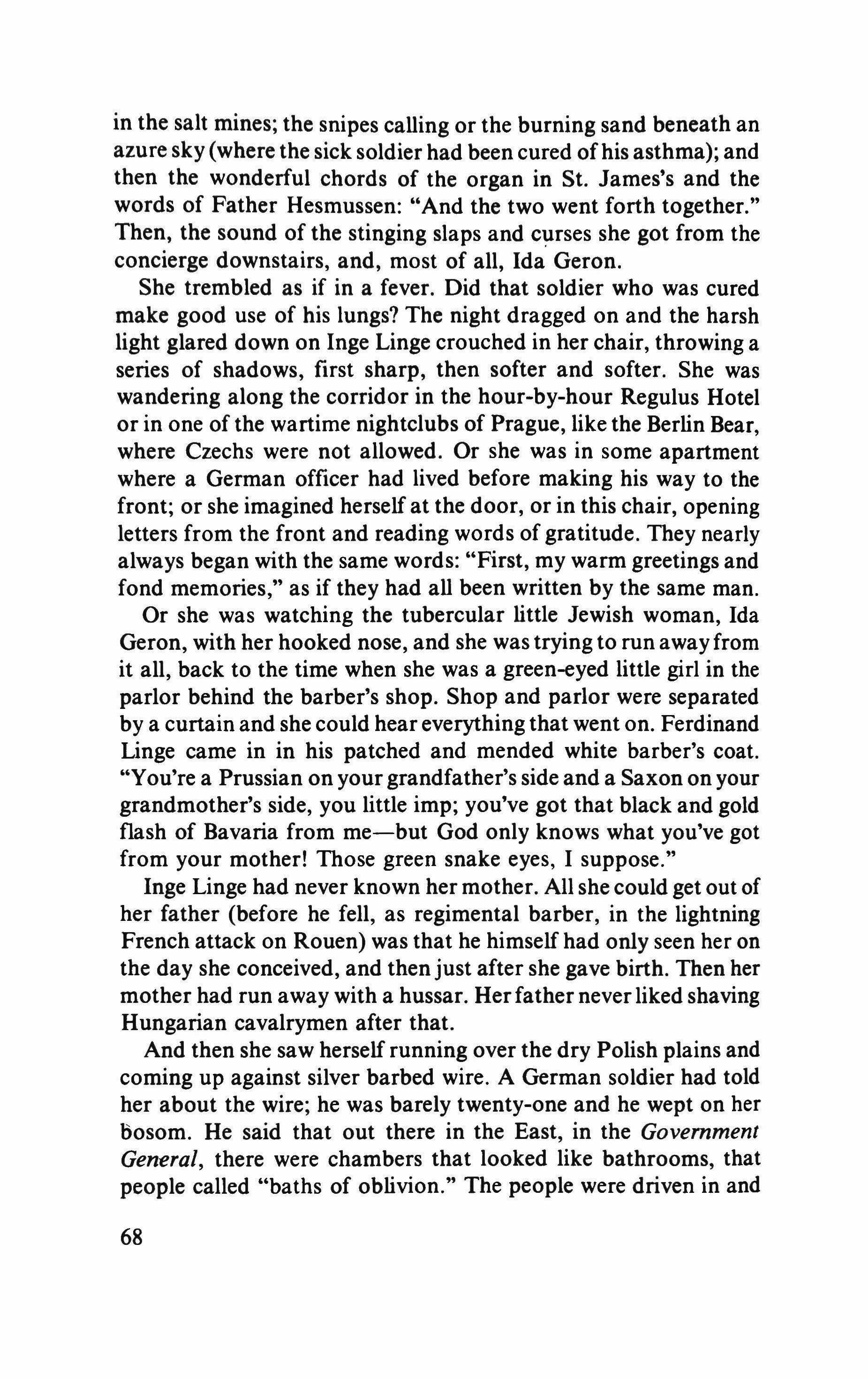
in the salt mines; the snipes calling or the burning sand beneath an azure sky(where the sick soldier had been cured ofhis asthma); and then the wonderful chords of the organ in St. James's and the words of Father Hesmussen: "And the two went forth together." Then, the sound of the stinging slaps and curses she got from the concierge downstairs, and, most of all, Ida Geron.
She trembled as if in a fever. Did that soldier who was cured make good use of his lungs? The night dragged on and the harsh light glared down on Inge Linge crouched in her chair, throwing a series of shadows, first sharp, then softer and softer. She was wandering along the corridor in the hour-by-hour Regulus Hotel or in one of the wartime nightclubs of Prague, like the Berlin Bear, where Czechs were not allowed. Or she was in some apartment where a German officer had lived before making his way to the front; or she imagined herself at the door, or in this chair, opening letters from the front and reading words of gratitude. They nearly always began with the same words: "First, my warm greetings and fond memories," as if they had all been written by the same man.
Or she was watching the tubercular little Jewish woman, Ida Geron, with her hooked nose, and she was trying to run away from it all, back to the time when she was a green-eyed little girl in the parlor behind the barber's shop. Shop and parlor were separated by a curtain and she could hear everything that went on. Ferdinand Linge came in in his patched and mended white barber's coat. "You're a Prussian on your grandfather's side and a Saxon on your grandmother's side, you little imp; you've got that black and gold flash of Bavaria from me-but God only knows what you've got from your mother! Those green snake eyes, I suppose."
Inge Linge had never known her mother. All she could get out of her father (before he fell, as regimental barber, in the lightning French attack on Rouen) was that he himself had only seen her on the day she conceived, and then just after she gave birth. Then her mother had run away with a hussar. Herfather never liked shaving Hungarian cavalrymen after that.
And then she saw herself running over the dry Polish plains and coming up against silver barbed wire. A German soldier had told her about the wire; he was barely twenty-one and he wept on her bosom. He said that out there in the East, in the Government General, there were chambers that looked like bathrooms, that people called "baths of oblivion." The people were driven in and

then, instead of water, gas was showered on them. Soldiers were specially detailed to collect the clothes and shoes and underwear from the changing rooms, where the people had stripped naked, and to send the stuff to the Winterhilfe to be distributed. At first they used to gas and burn the people as they were, dressed, but one of the big shots-in fact, it was Heinrich Himmler himself-had given special orders to strip the people first.
Inge Linge, both then and now, could feel the barbed wire scratching her skin-the barbs gleamed like moon-wasps' stingsand she could feel herself being driven into one of those chambers, after they'd shaved off whatever there was to shave-the tearful soldier had said that, too-and someone was watching her run and calling out in ridicule: "Look at that creature, she hasn't got a hair on her legs!" She imagined the gas chamber looked like the room she was in-or like a potato warehouse, or like the gymnasium in the Opera House in Long Street, or like the dance halls on Slav Island, or like the covered playing courts for officers' wives, with soundproof oak doors. And in place of the stout, brightly-clad Prussian general circa 1862, there was a notice on the wall:
BATHS OF OBLIVION
GERMAN WOMEN NEVER FORGET PERSONAL HYGIENE
She was only in the Labor Office a few weeks. Her hands went to her legs; her fingertips felt the texture of her supple muscles. It was better to get up and cross the room to the aquarium. Then she turned all the lights off again, the three big candelabras hanging head downwards in the dark. She pulled up the blackout curtain, opened the window and leaned out, breathing in the fresh night air. The bells were still ringing.
She felt a moment's gratitude towards Mr. Haske for ringing the bells that way. He was a German, but his wife was Czech and she suddenly envied him without knowing why. The sound of gunfire came from far away. She felt the pavement below draw her out and down. If she jumped now, perhaps she would suddenly solve the strange puzzle. At the same time, fear of what was below filled her. She closed the window and sat down to her cards again.
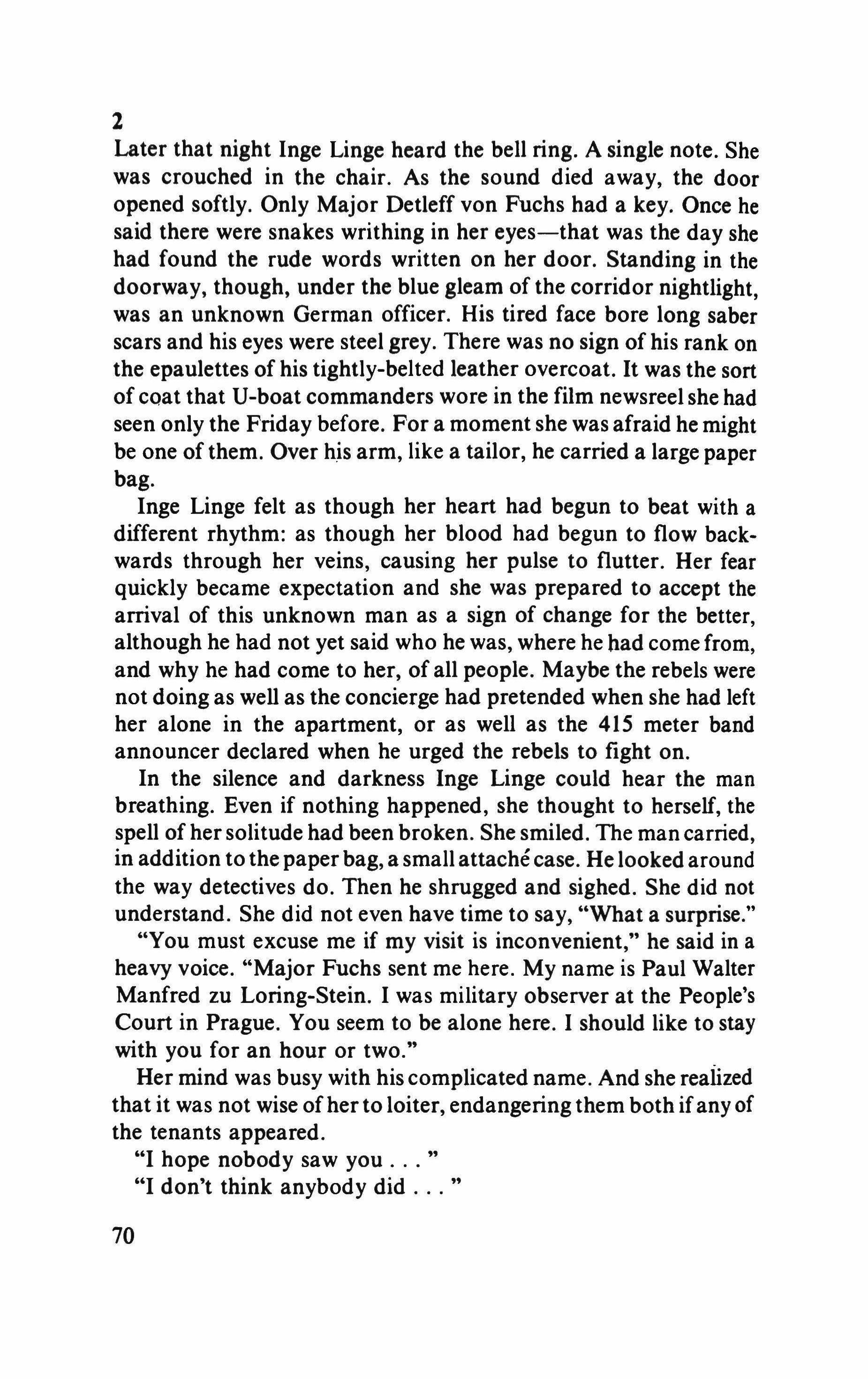
Later that night Inge Linge heard the bell ring. A single note. She was crouched in the chair. As the sound died away, the door opened softly. Only Major DetIeff von Fuchs had a key. Once he said there were snakes writhing in her eyes-that was the day she had found the rude words written on her door. Standing in the doorway, though, under the blue gleam of the corridor nightlight, was an unknown German officer. His tired face bore long saber scars and his eyes were steel grey. There was no sign of his rank on the epaulettes of his tightly-belted leather overcoat. It was the sort of coat that U-boat commanders wore in the film newsreel she had seen only the Friday before. For a moment she was afraid he might be one of them. Over his arm, like a tailor, he carried a large paper bag.
Inge Linge felt as though her heart had begun to beat with a different rhythm: as though her blood had begun to flow backwards through her veins, causing her pulse to flutter. Her fear quickly became expectation and she was prepared to accept the arrival of this unknown man as a sign of change for the better, although he had not yet said who he was, where he had come from, and why he had come to her, of all people. Maybe the rebels were not doing as well as the concierge had pretended when she had left her alone in the apartment, or as well as the 415 meter band announcer declared when he urged the rebels to fight on.
In the silence and darkness Inge Linge could hear the man breathing. Even if nothing happened, she thought to herself, the spell of her solitude had been broken. She smiled. The man carried, in addition to the paper bag, a small attache case. He looked around the way detectives do. Then he shrugged and sighed. She did not understand. She did not even have time to say, "What a surprise."
"You must excuse me if my visit is inconvenient," he said in a heavy voice. "Major Fuchs sent me here. My name is Paul Walter Manfred zu Loring-Stein. I was military observer at the People's Court in Prague. You seem to be alone here. I should like to stay with you for an hour or two."
Her mind was busy with his complicated name. And she realized that it was not wise ofher to loiter, endangering them both ifany of the tenants appeared.
"I hope nobody saw you "
"I don't think anybody did

When he spoke, the many-colored saber wounds in his face moved as though following his voice. There were three scars, side by side.
"You are courteous," he said in a low, serious voice. "Today a German woman is like an island in this city
Her reply was a hesitant, forced laugh.
Then he said, "We sound as though we had met at a dance, but things are worse " He observed her uncertain smile carefully, and then went on. "I belonged to the Tribunal presided over by Counsellor Dr. Johannis Danziger. He was transferred to Wiedenbrock and took the last Mercedes. 1 myself was on my way to Germany and was taken by surprise when the bandits captured the railway station. You can imagine the rest."
"I never thought judges looked like this
"What do you mean, like this?"
"Like this She wanted to say she had expected a monocle and a protruding stomach.
"Is there any danger that we'll be overheard?"
"I don't think so. On the left there's a separate building, and on the other side there's only an old woman who has lived alone since 1942. 1 don't really know why the whole familyappeared before the People's Court."
"Are you a member of the NSDAP?"
The questionsurprised her. She realized at once that the emotion she had felt in him that first moment in the dark, before he had begun to speak and his saber scars had begun to quiver up and down, had not been real. He was a German, filled withfears like her own, a soldier and a man, and wasn't that the most important thing?
Although her memory was not well-trained to deal with namesthis had caused her some trouble at the Labor Office-his name stuck: Paul Walter Manfred zu Loring-Stein. With the same horror she had felt when she realized how alone she was, she remembered that she was wearing ordinary artificial silk underwear. She had once had the foresight, however, to sew on labels from more expensive underwear she had bought in Paris. She was pleased, too, that Detleff Fuchs had sent her a judge. Recently, her visitors had been soldiers from the Hradcany hospital.
"I'm all alone here, and I was beginning to feel that it was more than anyone could bear on his own."

The military judge smiled.
It was an evasive answer. In her mind the sounds of the bells became the sounds of an organ, as ifthe organist at St. James's was practicing at night. Now that this man had come, the meaning of Father Hesmussen's words, "And the two went forth together." had changed.
The officer who stood looking at Inge Linge did not understand the light in her green eyes. He had too many other things to worry about to wonder why her nostrils were quivering and her eyelids fluttering. She was thinking to herselfthat she would almost prefer his "zu Loring-Stein" to have been bought like Major Fuchs' "von." Perhaps the mere fact of his coming had saved her life, for she was no longer alone. If that other woman had died, Inge Linge thought suddenly, it would be better if she were really and truly dead, with somebody who could officially confirm the fact. People from the Law Courts could do anything; they had laws and papers and rubber stamps for all purposes.
It was a silly idea. She realized at once how silly it was, but she still felt that wave of relief that had come over her when she saw somebody else standing in the doorway. "The two went forth together." Perhaps if there really were someone who could confirm it, her fears might disappear, too. She looked at the militaryjudge as he walked past her with his right hand in his pocket and marched slowly and deliberately around the entire apartment, includingthe kitchen and bedroom. When he returned to the hall, he looked into the lavatory and out the little window into the ventilating shaft, and into the bathroom as well.
"Which way do your windows face? Into the courtyard or out onto the street? Would you mind pulling the blackout curtains down?"
She nodded to both his questions and pulled down the curtains; meanwhile, he put his things down. He waited until she had switched on the light.
He was certainly surprised by something that his words had not expressed, for he remained silent, first watching Inge Linge and then the fish in her aquarium. There were black fish, and tiny transparent fish gaily swam around them; the ripple of the water made the green plants sway. The militaryjudge's lips were set. As long as she did not have to be alone, Inge Linge was herself again.
"I'll put the kettle on for tea," she said comfortingly, and knew at
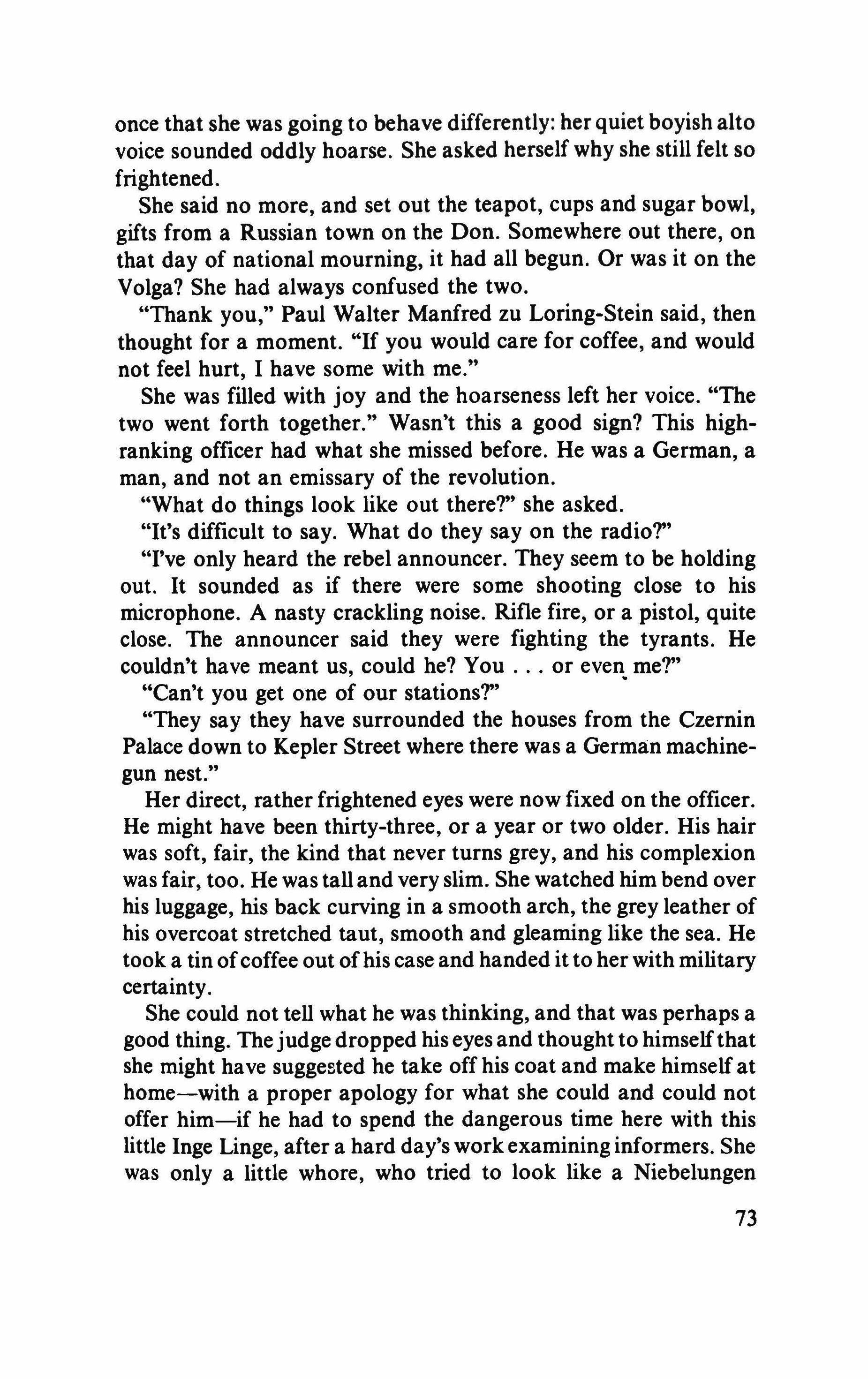
once that she was going to behave differently: her quiet boyish alto voice sounded oddly hoarse. She asked herself why she still felt so frightened.
She said no more, and set out the teapot, cups and sugar bowl, gifts from a Russian town on the Don. Somewhere out there, on that day of national mourning, it had all begun. Or was it on the Volga? She had always confused the two.
"Thank you," Paul Walter Manfred zu Loring-Stein said, then thought for a moment. "If you would care for coffee, and would not feel hurt, I have some with me."
She was filled with joy and the hoarseness left her voice. "The two went forth together." Wasn't this a good sign? This highranking officer had what she missed before. He was a German, a man, and not an emissary of the revolution.
"What do things look like out there?" she asked.
"It's difficult to say. What do they say on the radio?"
"I've only heard the rebel announcer. They seem to be holding out. It sounded as if there were some shooting close to his microphone. A nasty crackling noise. Rifle fire, or a pistol, quite close. The announcer said they were fighting the tyrants. He couldn't have meant us, could he? You or even. me?"
"Can't you get one of our stations?"
"They say they have surrounded the houses from the Czernin Palace down to Kepler Street where there was a German machinegun nest."
Her direct, rather frightened eyes were now fixed on the officer. He might have been thirty-three, or a year or two older. His hair was soft, fair, the kind that never turns grey, and his complexion was fair, too. He was tall and very slim. She watched him bend over his luggage, his back curving in a smooth arch, the grey leather of his overcoat stretched taut, smooth and gleaming like the sea. He took a tin ofcoffee out ofhis case and handed it to her with military certainty.
She could not tell what he was thinking, and that was perhaps a good thing. The judgedropped his eyes and thought to himselfthat she might have suggested he take off his coat and make himself at home-with a proper apology for what she could and could not offer him-if he had to spend the dangerous time here with this little Inge Linge, after a hard day's work examining informers. She was only a little whore, who tried to look like a Niebelungen

beauty; he would have to be blind in both eyes and deaf to the hoarse note in her voice, and would have to forget what Major Fuchs hinted at when he sent him here, not to see that. Even on a desert island he wouldn't want to exchange more than a few words with this woman. But he tried to keep the smile on his lips. He wondered what he would do if she became too insistent.
"Shouldn't you take your name off the front door?"
"The people here know me, and they've settled their accounts with me already."
"Who lives in the house?"
"There are only women at home now, and they won't bother me any more. They slapped my face this morning when I went out to get the milk, and called me names. I don't think theyreally believe I was ever a tyrant. I've never done anyone any harm."
Then she added, "Why don't you take your things off! There's nothing to be afraid of. Major Fuchs never let anyone down."
The military judge still didn't undress. "Isn't there anybody in that chemist's shop?"
"No, the owner got himself a gun and went off with the other men this morning. He had one of our tropical helmets on his head."
"Fuchs said this was a quiet spot, but he didn't say anything about that chemist's shop. Won't you take the name off your door?"
"I don't want to open the door unless I have to. If you think I should, though they told me what they thought of me yesterday morning, and they slapped my face, and that settles things between us. I suppose they've won, now, and there'll be courts set up to judge but not me I really never have done anybody any harm. I haven't got the heart to hurt anyone."
She saw his thoughtful metal-grey eyes in the network of saber scars and could not be sure whether or not he approved ofwhat she had felt forced to say.
"I didn't look out of the window until now, in the dark. There was shooting quite near. I expect it was near the Regulus Hotel, but that was this morning. They've got all the arms that were stored opposite the police headquarters in St. Bartholomew's Street. That's why I think the men who went away won't come anywhere near us."
Because the officer maintained his skeptical silence her thoughts returned to that woman's hooked nose. And once again she asked
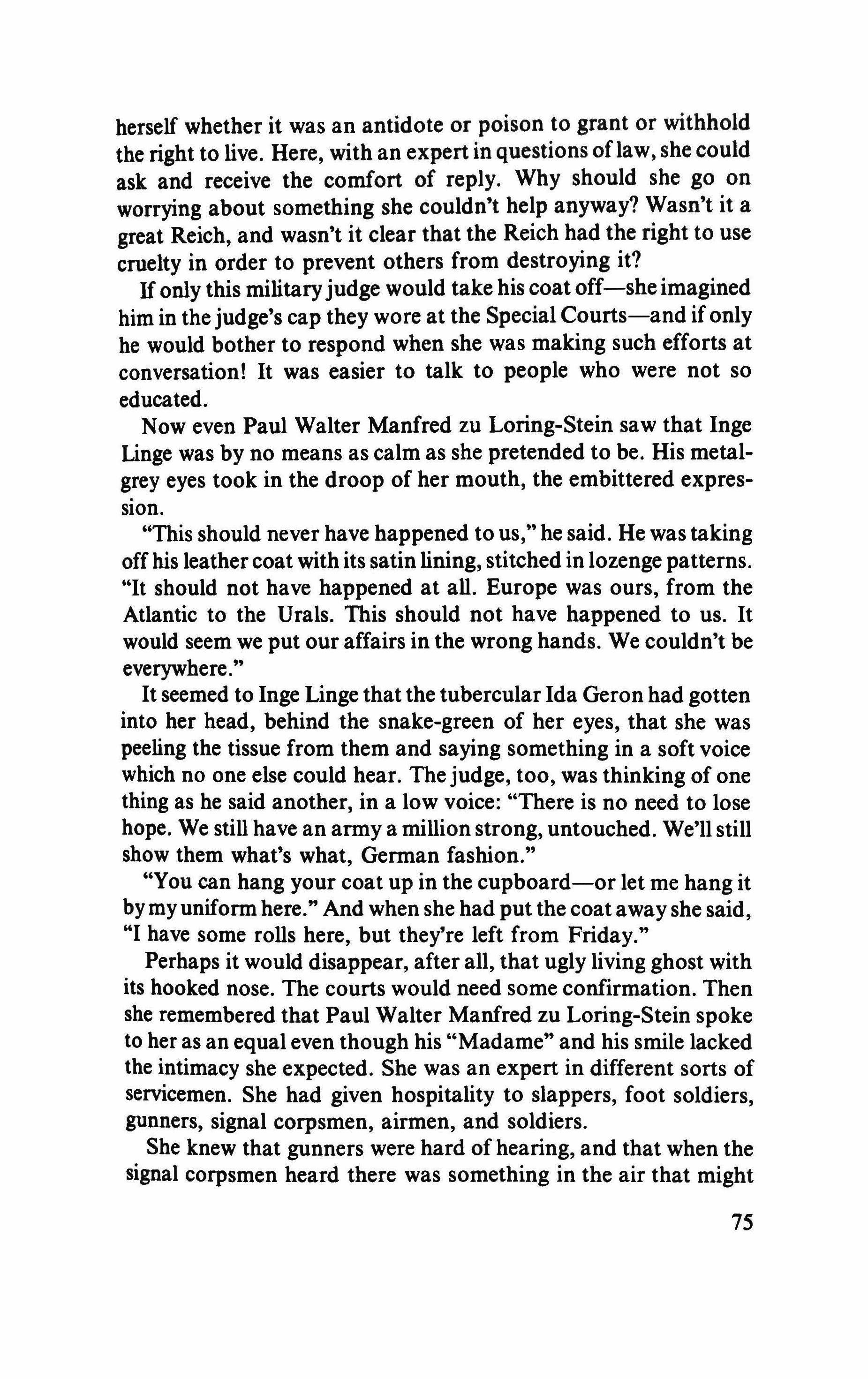
herself whether it was an antidote or poison to grant or withhold the right to live. Here, with an expert in questions oflaw, she could ask and receive the comfort of reply. Why should she go on worrying about something she couldn't help anyway? Wasn't it a great Reich, and wasn't it clear that the Reich had the right to use cruelty in order to prevent others from destroying it?
If only this militaryjudge would take his coat off-she imagined him in the judge's cap they wore at the Special Courts-and ifonly he would bother to respond when she was making such efforts at conversation! It was easier to talk to people who were not so educated.
Now even Paul Walter Manfred zu Loring-Stein saw that Inge Linge was by no means as calm as she pretended to be. His metalgrey eyes took in the droop of her mouth, the embittered expression.
"This should never have happened to us," he said. He was taking off his leather coat with its satin lining, stitched in lozenge patterns. "It should not have happened at all. Europe was ours, from the Atlantic to the Urals. This should not have happened to us. It would seem we put our affairs in the wrong hands. We couldn't be everywhere."
It seemed to Inge Linge that the tubercular Ida Geron had gotten into her head, behind the snake-green of her eyes, that she was peeling the tissue from them and saying something in a soft voice which no one else could hear. The judge, too, was thinking of one thing as he said another, in a low voice: "There is no need to lose hope. We still have an army a million strong, untouched. We'll still show them what's what, German fashion."
"You can hang your coat up in the cupboard-or let me hang it by myuniform here." And when she had put the coat away she said, "I have some rolls here, but they're left from Friday."
Perhaps it would disappear, after all, that ugly living ghost with its hooked nose. The courts would need some confirmation. Then she remembered that Paul Walter Manfred zu Loring-Stein spoke to her as an equal even though his "Madame" and his smile lacked the intimacy she expected. She was an expert in different sorts of servicemen. She had given hospitality to slappers, foot soldiers, gunners, signal corpsmen, airmen, and soldiers.
She knew that gunners were hard of hearing, and that when the signal corpsmen heard there was something in the air that might
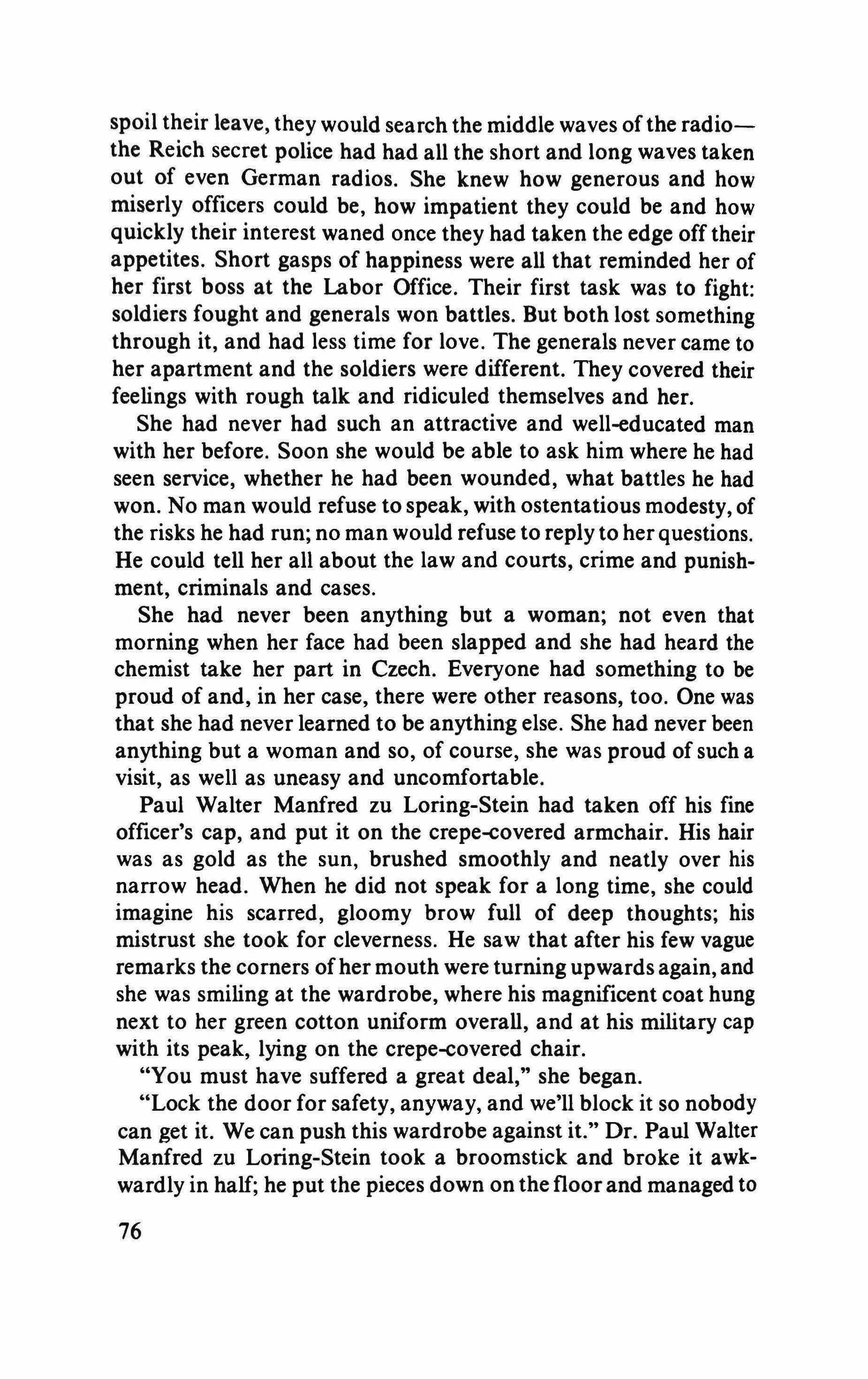
spoil their leave, they would search the middle waves ofthe radiothe Reich secret police had had all the short and long waves taken out of even German radios. She knew how generous and how miserly officers could be, how impatient they could be and how quickly their interest waned once they had taken the edge off their appetites. Short gasps of happiness were all that reminded her of her first boss at the Labor Office. Their first task was to fight: soldiers fought and generals won battles. But both lost something through it, and had less time for love. The generals never came to her apartment and the soldiers were different. They covered their feelings with rough talk and ridiculed themselves and her.
She had never had such an attractive and well-educated man with her before. Soon she would be able to ask him where he had seen service, whether he had been wounded, what battles he had won. No man would refuse to speak, with ostentatious modesty, of the risks he had run; no man would refuse to reply to her questions. He could tell her all about the law and courts, crime and punishment, criminals and cases.
She had never been anything but a woman; not even that morning when her face had been slapped and she had heard the chemist take her part in Czech. Everyone had something to be proud of and, in her case, there were other reasons, too. One was that she had never learned to be anything else. She had never been anything but a woman and so, of course, she was proud of such a visit, as well as uneasy and uncomfortable.
Paul Walter Manfred zu Loring-Stein had taken off his fine officer's cap, and put it on the crepe-covered armchair. His hair was as gold as the sun, brushed smoothly and neatly over his narrow head. When he did not speak for a long time, she could imagine his scarred, gloomy brow full of deep thoughts; his mistrust she took for cleverness. He saw that after his few vague remarks the corners ofher mouth were turningupwardsagain, and she was smiling at the wardrobe, where his magnificent coat hung next to her green cotton uniform overall, and at his military cap with its peak, lying on the crepe-covered chair.
"You must have suffered a great deal," she began.
"Lock the door for safety, anyway, and we'll block it so nobody can get it. We can push this wardrobe against it." Dr. Paul Walter Manfred zu Loring-Stein took a broomstick and broke it awkwardly in half; he put the pieces down on the floorand managed to

roll the wardrobe on them as far as the door. His fingers were strong and white, with ginger hairs at the first joint. He waited for Inge Linge to lock the door and slip past him-so close that he could smell the creams she used-and then he pushed the wardrobe up against the door.
"Do you see what I mean?" he asked. "Law is strength. That is the whole secret. Now I can make up for what I've missed the last three nights. We were sitting until the very last minute; there were about two thousand of them to be sentenced, during April and May, their people and ours."
"It's only the sixth today
When Paul Walter Manfred zu Loring-Stein spoke, his words seemed real, and made of lead. Now his silence had the same quality. She imagined him in his black gown, standing, passing sentence. It was strange that, for no reason, she imagined it all happening in a dark, rocky ravine and, instead of a black gown, he had on a bearskin. His tired eyes watched her. He really hasn't slept for a long time, she thought, and felt sorry for him, as though there was no cruelty anywhere in the world, in life, or in what he said. The mess they were in had brought them all down to the same level after all.
3
The night passed slowly.
"You've got everything you need," Inge Linge assured him for at least the third time. "The men are certainly all out ofthe building." The officer-judge's look had brightened and in his eyes she thought she saw the one response that could touch her closely.
"Are you of pure German blood?" he asked.
"What do you mean, exactly?"
"Are you from Germany, or from around here?"
"Partly from Germany and partly from here, but mostly from Germany-from Magdeburg."
He looked doubtfully at her for a moment. She turned on the radio, turning the knob to get the 415 meter band. The announcer declared that Prague was fighting well and that the battle had moved from the suburbs to the center of town. She turned it as low as possible. Sections of the enemy army had begun to surrender. Whenever tanks were sent against rebel units, they were put out of action by Molotov cocktails or else they surrendered. "Attention,
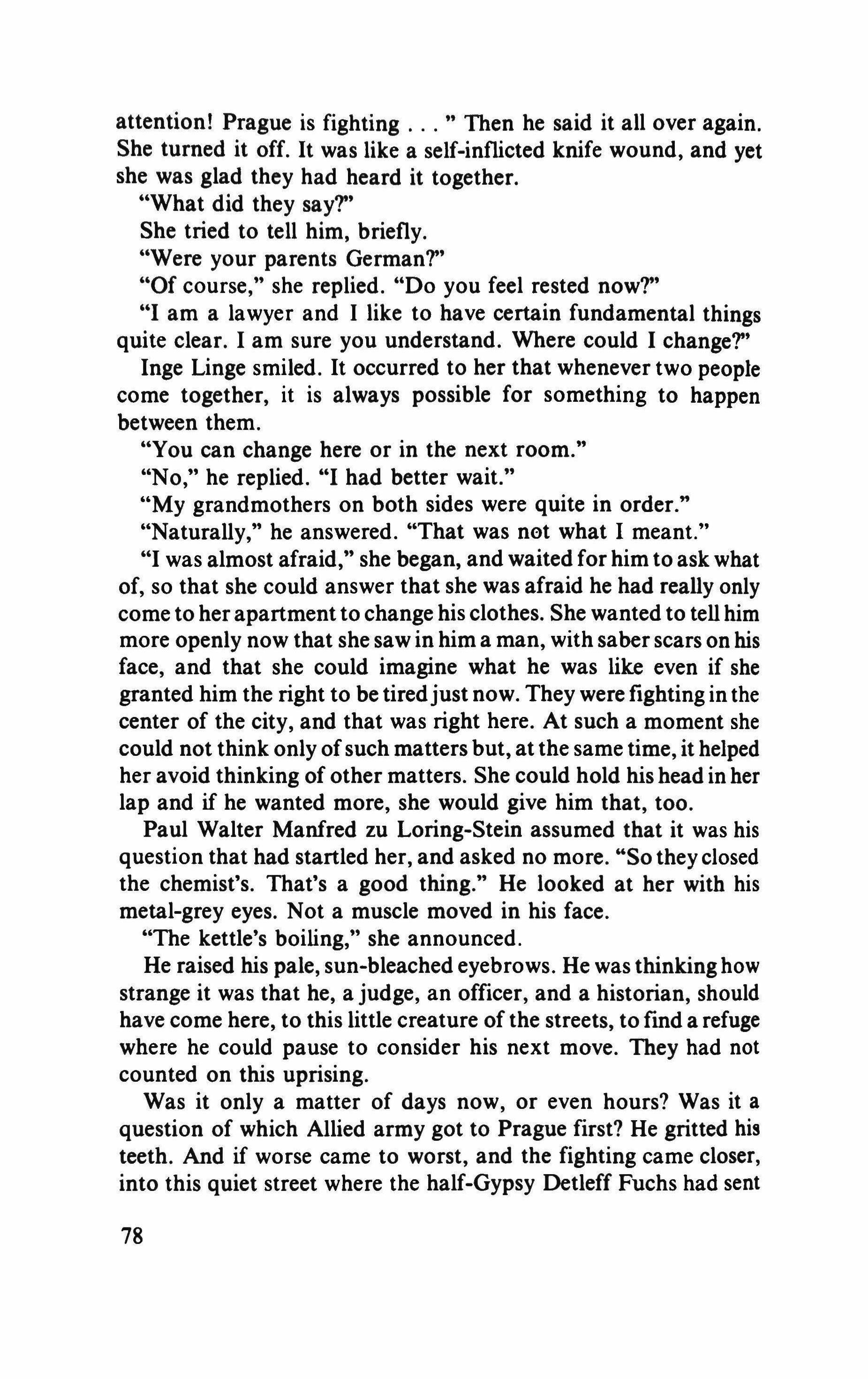
attention! Prague is fighting " Then he said it all over again. She turned it off. It was like a self-inflicted knife wound, and yet she was glad they had heard it together.
"What did they say?"
She tried to tell him, briefly.
"Were your parents German?"
"Of course," she replied. "Do you feel rested now?"
"I am a lawyer and I like to have certain fundamental things Quite clear. I am sure you understand. Where could I change?"
Inge Linge smiled. It occurred to her that whenever two people come together, it is always possible for something to happen between them.
"You can change here or in the next room."
"No," he replied. "I had better wait."
"My grandmothers on both sides were Quite in order."
"Naturally," he answered. "That was net what I meant."
"I was almost afraid," she began, and waited for him to ask what of, so that she could answer that she was afraid he had really only come to her apartment to change his clothes. She wanted to tell him more openly now that she saw in him a man, with saber scars on his face, and that she could imagine what he was like even if she granted him the right to be tiredjust now. They were fighting in the center of the city, and that was right here. At such a moment she could not think only ofsuch matters but, at the same time, it helped her avoid thinking of other matters. She could hold his head in her lap and if he wanted more, she would give him that, too.
Paul Walter Manfred zu Loring-Stein assumed that it was his Question that had startled her, and asked no more. "So they closed the chemist's. That's a good thing." He looked at her with his metal-grey eyes. Not a muscle moved in his face.
"The kettle's boiling," she announced.
He raised his pale, sun-bleached eyebrows. He was thinking how strange it was that he, a judge, an officer, and a historian, should have come here, to this little creature of the streets, to fmd a refuge where he could pause to consider his next move. They had not counted on this uprising.
Was it only a matter of days now, or even hours? Was it a question of which Allied army got to Prague first? He gritted his teeth. And if worse came to worst, and the fighting came closer, into this Quiet street where the half-Gypsy Detleff Fuchs had sent

him to hide, he'd stand at the window and fire until his ammunition was gone, as the Germans had done at Annaberg.
He looked around the apartment. The wardrobe stood against the door and there was a big empty space where it had been, with old cobwebs on the wall. She swept a cobweb away slowly, and squashed the spider.
Meanwhile, Paul Walter Manfred zu Loring-Stein had discovered all there was to know about the place. If things turned out as he was hoping they would, he would be leaving as quickly as he had come. He would not let this little whore, who kept rolling her eyes and trying to act like a widow, get in his way.
He followed the silent movements of the black fish in the dark green water. The tips of their dorsal fins broke the surface. The bright little neon fish swam rapidlyfrom one glass wall to the other.
Even if she had saved his life-and maybe she had, who could tell?-still, he would not burden himself with her. Law was both strength and cunning. But strength without law and cunning without law were only strength and cunning; with law they became principle. Nor could he give her any reason to think he might. At the same time, he wondered whether he could leave as easily as he had come, and began to worry about ensuring that he could. For the first time, it occurred to him that she mightbetray him. Should he ensure himself by performing the expected? A swine like Detleff Fuchs might saddle himself with her. Somebody in the German High Command must have had a cruel sense of humor to put him in charge of the Protection of Reich German Women; perhaps it was an organization like the pensions behind the front line.
In 1941, Adolf Hitler had thought of turning Paris into a vast amusement park for the whole of the Third Reich, but it didn't work out-like the floods that were meant to hold up the invading Allies. Around Dieppe almost everything had drowned; beyond that, it was not so simple. Those were the great days when Hitler, the parvenu, still found favor with the German nobility, the army, and the High Command. A lot of things happened around 1943 that might have turned out either way. The Law had decided to wait and see, and serve in the meantime. The fact that it was not revealed before the putsch, but afterwards, had confused things then.
It occurred to him that he might be able to buy security in advance. He suddenly wanted to win Inge Linge's trust; her look

was bold and skeptical. He was well aware that a mistrustful person is not easily or completely deceived. The furniture was not new. He was looking at it with an appreciation he hoped she would notice. Probably Major Fuchs had had a hand in that, too. He was responsible for the Protection of Reich German Women as well as the confiscated furniture stores of Bohemia and Moravia. He was grateful to the Major for giving him this hiding place. But what if the fighting did move into the center of the city? Hadn't the swine sent him here deliberately to get rid of him? It might have been treachery, or it might have been the only way out. His fate was following a twisting path. Only the road of the Law was straight!
He could, even today, have had Major Fuchs shot without the slightest regret. He told himself that he must get some sleep.
"Are you sure the light can't be seen from the passage?Through a crack in the door, or the spy-hole?"
"No."
"I have brought you a little present; I don't want something for nothing." He probably wasn't as sensual as she would have liked, and he wanted to make his intention quite clear, while gaining her confidence in some other way.
"Oh, no, I wouldn't like you to think that of me." Inge Linge's reply was unexpected.
Paul Walter Manfred zu Loring-Stein took out a small jewel. She did not see that his interest was elsewhere, and not on her soft white hands and this house faced with black marble. For a moment she forgot black-haired Ida Geron, but it was strange for how short a time. It occurred to her that the woman, too, had been young once. She, too, might have received a gift from a man. But the gifts given to people like her had passed into the wrong hands.
"Does Detleff Fuchs come here often?"
"Thank you," Inge Linge managed to say at last. "No I don't expect him I haven't seen him in a long time."
"There would be no danger for him in this street," Paul Walter Manfred zu Loring-Stein said in a voice too detached for her not to hear another undertone as well. "This isn't quite the center of the city."
"Still, I don't think any insurance company worth its salt would insure us now. I doubt ifwe'd even find a judge to set us free. And if we get hurt, there's not even a bandage left in the chemist's across the way."

Inge Linge suddenly stopped wanting to calm his fears. "You said you wanted to get some sleep. You can go to bed."
For the second time he thought she might betray him. Inge Linge was silent. Had the jewel belonged to his family? Hadn't he taken it from someone? He was a judge, after all. He had to deal with the law and the courts.
In her mind, she saw again the inflamed eyes ofthe soldier and he was telling her how they sent everything home to Germany, even umbrellas, spectacles, artificial limbs and gold teeth. He told her how they used coal shovels to pile up the heaps ofchildren's shoes, and how glad he was that his little niece had been killed by a bomb. It must have been a mountain of children's shoes: white and blue and pink ones, with straggly laces.
But Paul Walter Manfred zu Loring-Stein was looking into the wardrobe again. It seemed rather too luxurious. He thought about how they had all been ready when the trough was filled to the brim with the loot of the special commandos.
The dresses were heavy with perfume. It made him feel a hundred times more sleepy. Why should he restrain himselfin front of this little whore? Why shouldn't he do what he wanted to do?
He looked at Inge Linge. He took in her firm little figure, the knotted muscles of her legs, one crossed over the other. He looked at her calmly through his network of saber scars. She was a whore on whom all he said was wasted. Just as Detleff Fuchs would never stop stealing and whoring with anyone who came his way, so this creature would go on spreading her legs in the name of the Third Reich. His eyes had begun to smart. He was more tired than he had thought.
"Do you think I could lie down without fear ofperfidy, then?" he asked drily.
"Of course." Inge Linge went to turn the bed covers down. She did not know what he meant by perfidy.
"I want to be alone." It sounded like an order.
The corners ofher mouth drooped. He was harsh. Where was the line that separated one from another, if he behaved as though she was going to bite him, or as though he found her disgusting? Once more she felt guilty because of Ida Geron with her TB-and goodness only knew what had become of her. Now she doubted that sharp line of division which separated her from people like Ida Geron or Jenny Bruckhart, who used to live in their street, or her

father Ferdinand Linge, as long as he had been alive and lathering the chins of all ranks and services except the Hungarian Cavalry. She knew the woman had died long before; there was no need for anybody to give her confirmation of the fact. And although in her mind she still saw her as she had looked that day-as though she were still alive, with the two bags nobody helped her carry-at the same time, she thought of her in another way, too.
"Naturally," she said aloud. "Here's your bed. Sleep well. I'm next door, in the kitchen."
She walked out slowly as though she had given up the battle, hurt and surprised by herself. The diversion she had hoped he would provide had been short. She thought about the officerjudge, and Paul Walter Manfred zu Loring-Stein let his eyes rest on the wall where the picture was hanging.
"Is that a Prussian general?"
Inge Linge looked around and nodded. The figure was wearing a blue general's uniform with broad red cuffs and a high stiff yellow collar that made him hold his nose in the air.
She went out and shut the door behind her. Perhaps it was all due to his fatigue. She should have realized it sooner and saved herself a headache. He wasn't a pear hanging on a tree waiting to be plucked. If only Paul Walter Manfred zu Loring-Stein had tried to overcome his anxiety, tried to forget it all, things wouldn't have been too bad. Now she realized that the officer-judge who was so coldly dispassionate would stay or not according to his own better judgment. The bells had stopped ringing. Neither Father Hesmussen nor Herr Haske was likely to be asleep, though; it was unlikely that the Germans in Prague could sleep.
She tried to sleep on the sofa in the kitchen, but instead she lay and gazed with open eyes at the dark ceiling. Where did it come from, this longing to be with someone-even though the other did not feel it in the least? She listened to what was on the other side of the wall. Paul Walter Manfred zu Loring-Stein was lying in bed but he was not resting. She could hear him tossing and turning. The house was silent. Number 14 Chestnut Street was not a part ofthe Prague uprising, and Inge Linge was suddenly not sure that she was really glad of that.
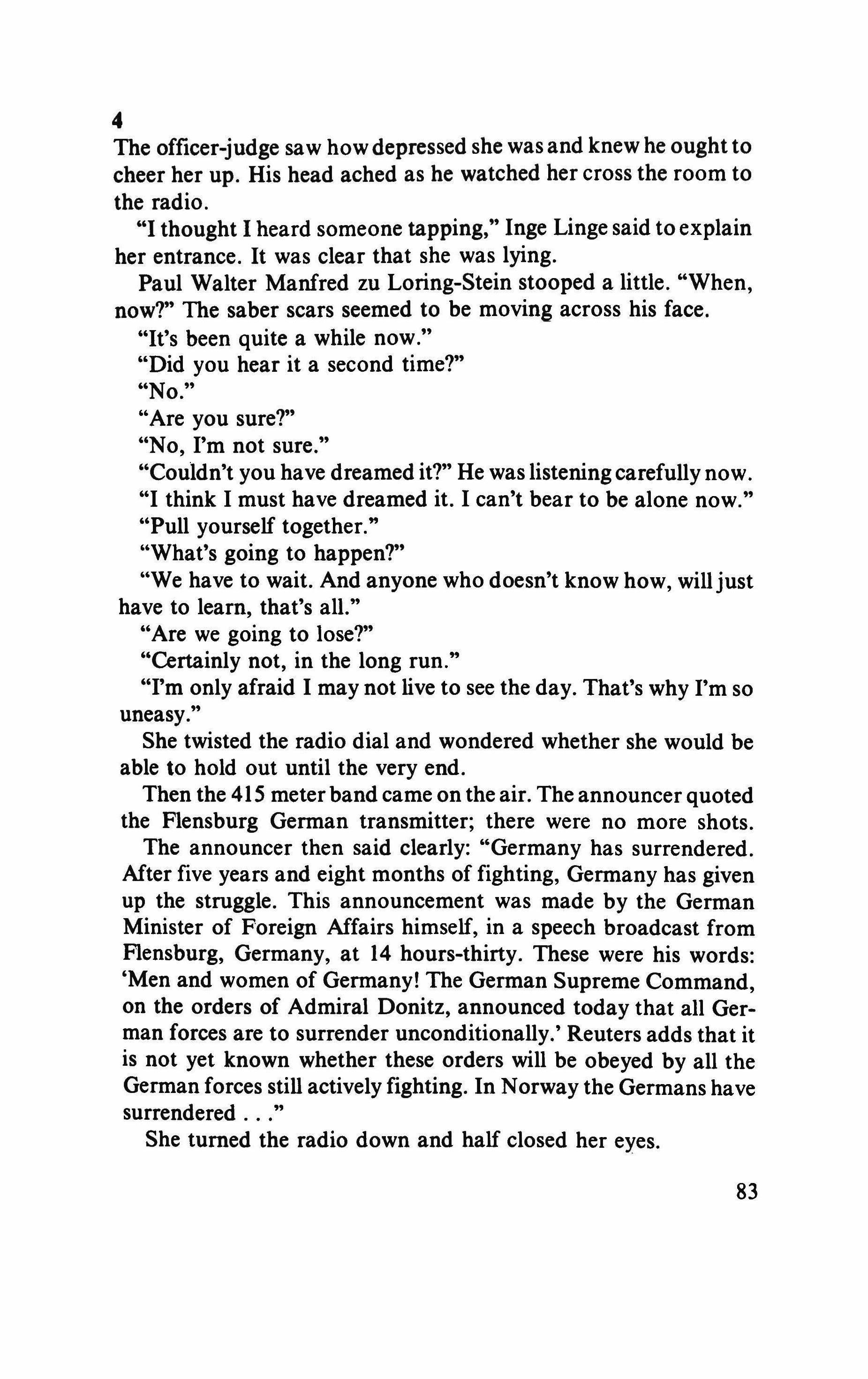
The officer-judge saw how depressed she was and knew he ought to cheer her up. His head ached as he watched her cross the room to the radio.
"I thought I heard someone tapping," Inge Linge said to explain her entrance. It was clear that she was lying.
Paul Walter Manfred zu Loring-Stein stooped a little. "When, now?" The saber scars seemed to be moving across his face.
"It's been quite a while now."
"Did you hear it a second time?"
"No."
"Are you sure?"
"No, I'm not sure."
"Couldn't you have dreamed it?" He was listeningcarefully now.
"I think I must have dreamed it. I can't bear to be alone now."
"Pull yourself together."
"What's going to happen?"
"We have to wait. And anyone who doesn't know how, willjust have to learn, that's all."
"Are we going to lose?"
"Certainly not, in the long run."
"I'm only afraid I may not live to see the day. That's why I'm so uneasy."
She twisted the radio dial and wondered whether she would be able to hold out until the very end.
Then the 415 meter band came on the air. The announcer quoted the Flensburg German transmitter; there were no more shots.
The announcer then said clearly: "Germany has surrendered. After five years and eight months of fighting, Germany has given up the struggle. This announcement was made by the German Minister of Foreign Affairs himself, in a speech broadcast from Flensburg, Germany, at 14 hours-thirty. These were his words: 'Men and women of Germany! The German Supreme Command, on the orders of Admiral Donitz, announced today that all German forces are to surrender unconditionally.' Reuters adds that it is not yet known whether these orders will be obeyed by all the German forces still actively fighting. In Norway the Germans have surrendered
She turned the radio down and half closed her eyes.

"For God's sake you heard it yourself tt "Calm yourself. There must be something else on. It could be a trick."
She remained standing in the middle ofthe room. With her green eyes fixed on the scarred face of Paul Walter Manfred zu LoringStein, she remembered the very first time she had been with a man. She'd not been very sure of what she was doing. She did not even know as much as Jenny Bruckhart, then. She had stroked his thighs down by the knee and felt him tremble and wait with bated breath and beating heart for what would come next, for whatever she would do with her gentle, sensitive, caressing fingers. When she'd realized with all her senses how happy he was, she felt happy, too-it was all so wonderfully exciting, so unknown to her, half child and half adult.
It was never the same after the first time. There were moments when it came back to her, like a distant reward for much hard work, but it was never more than a feeble reflection of what she remembered. It was like the picture of the first boy that came to mind. He did not even put a shy hand on her breasts. He simply tried to kiss her, there, where she had expected to feel his hand. He did not even kiss her on the mouth. They sat side by side, and that was enough for them. He caressed her, and that was all. But it was all so strange that when she woke up the next day she wanted to sing, she felt so happy.
She watched the metal-grey eyes of Paul Walter Manfred zu Loring-Stein. She felt sure she knew him. She might have forgiven him the insult of the night before. And then she realized why she was what the concierge had called her.
The 415 meter band, which was now her weapon and her unspoken ultimatum, spoke up again as her fingers turned the knob: "The Allies officially announced today that Germany has unconditionally surrendered. The act of surrender took place at 14.41, French time, in the small school which houses Allied Headquarters. General Kurt Jodl signed for Germany. Although Donitz has unconditionally surrendered, it is probable that at the last moment Field-Marshal Schorner will order his forces in Bohemia
The broadcast was suddenly interrupted and Inge Linge turned away, as though even the radio had let her down. She had to leave the room before she did something inexplicable like shout that he
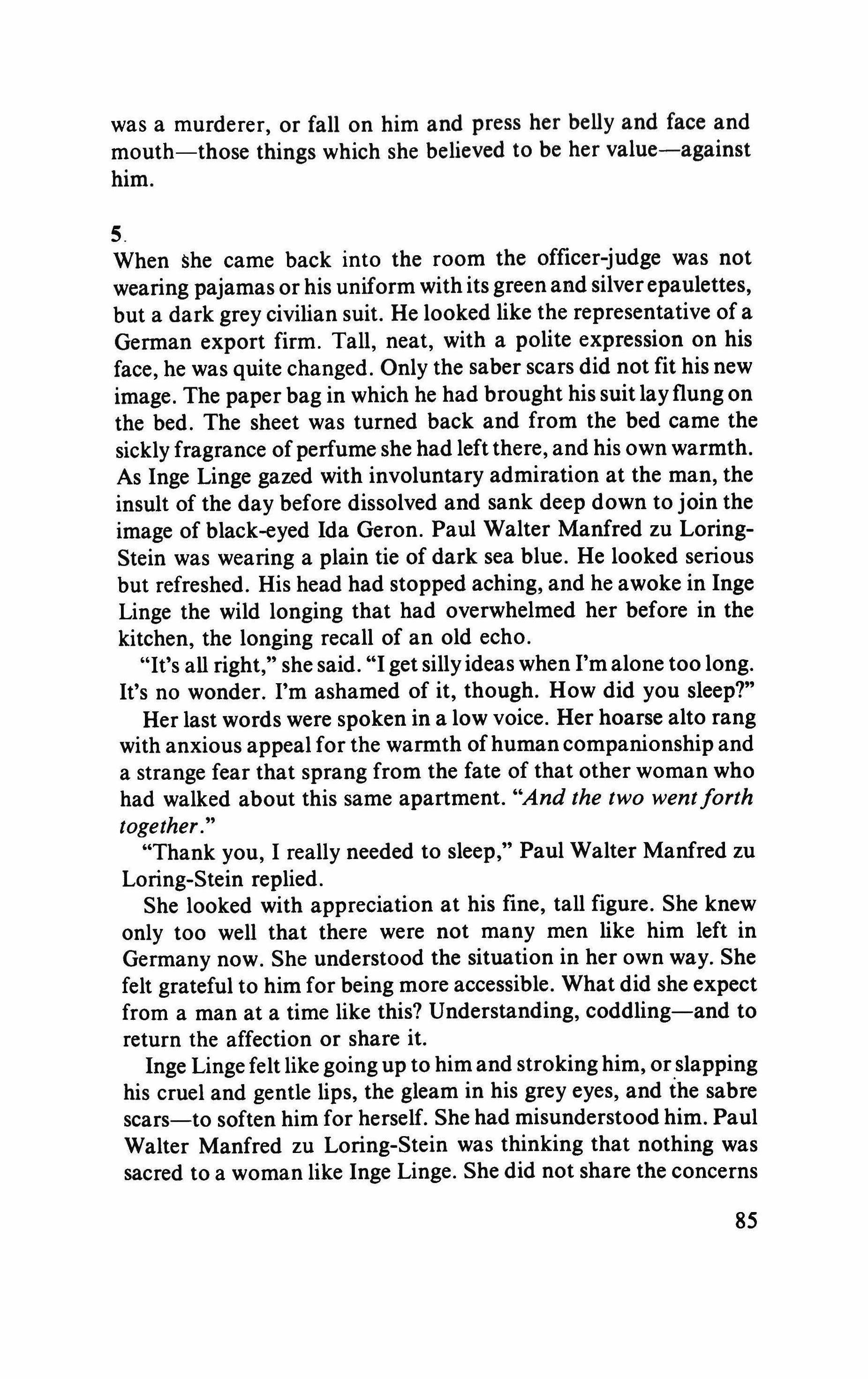
was a murderer, or fall on him and press her belly and face and mouth-those things which she believed to be her value-against him.
5.
When she came back into the room the officer-judge was not wearing pajamas or his uniform with its green and silverepaulettes, but a dark grey civilian suit. He looked like the representative of a German export firm. Tall, neat, with a polite expression on his face, he was quite changed. Only the saber scars did not fit his new image. The paper bag in which he had brought his suit layflung on the bed. The sheet was turned back and from the bed came the sicklyfragrance ofperfume she had leftthere, and his own warmth. As Inge Linge gazed with involuntary admiration at the man, the insult of the day before dissolved and sank deep down to join the image of black-eyed Ida Geron. Paul Walter Manfred zu LoringStein was wearing a plain tie of dark sea blue. He looked serious but refreshed. His head had stopped aching, and he awoke in Inge Linge the wild longing that had overwhelmed her before in the kitchen, the longing recall of an old echo.
"It's all right," she said. "I get silly ideas when I'm alone too long. It's no wonder. I'm ashamed of it, though. How did you sleep?"
Her last words were spoken in a low voice. Her hoarse alto rang with anxious appeal for the warmth of human companionship and a strange fear that sprang from the fate of that other woman who had walked about this same apartment. "And the two went forth together."
"Thank you, I really needed to sleep," Paul Walter Manfred zu Loring-Stein replied.
She looked with appreciation at his fine, tall figure. She knew only too well that there were not many men like him left in Germany now. She understood the situation in her own way. She felt grateful to him for being more accessible. What did she expect from a man at a time like this? Understanding, coddling-and to return the affection or share it.
Inge Linge felt like going up to him and strokinghim, or slapping his cruel and gentle lips, the gleam in his grey eyes, and the sabre scars-to soften him for herself. She had misunderstood him. Paul Walter Manfred zu Loring-Stein was thinking that nothing was sacred to a woman like Inge Linge. She did not share the concerns

that occupied the men and women of Germany at this dreadful moment, the loss of the rights and power of the great Reich. You whore! he thought to himself, and he wanted to shout: Our great men are dying, and all you can think of is that!
"When the sun shines, like now, and the sky is so clear, there are wonderful blue days in Prague," she said. "I don't know why they seem so blue-perhaps because of the bluish-colored roofs and the gardens."
"Blue days," Paul Walter Manfred zu Loring-Stein repeated thoughtfully. He wondered whetherthat dark-skinned thiefDetleff Fuchs made sure that women like Inge Linge were inspected thoroughly and often by an army doctor. He ought to hang, according to the canons of military law. The deep-set eyes darkened. The face with its mobile scars flushed.
"Have you got some place I can burn my things?"
"No," Inge Linge said. "Major Fuchs had everything wired for electricity. He was afraid of gas and open fires. I haven't even got a cellar here. I gave it up to the concierge. It's a bigfamily, three men. They all work on the trolleys."
"Could you hide these for me, then?"
"There's only the cupboard. I could put them at the back."
He was reconciled to the fact that beneath that fair hair, carelessly loose about the temples, her head was empty, her snakegreen eyes without intelligence.
"Hide it somewhere," he said. "You know how important it is just now."
Inge Linge felt the need to turn the light out. It was sudden and obvious. Everything was mixed up in her head-a head so round that German officers always said her mother must have come from Bohemia, or at any rate from Upper Silesia, where everything was mixed, but certainly not from Germany. It was not only nut oil that made her golden hair shine. She turned the center light off and left on only the little white bulb behind the green aquarium. Flatcolored fish were swimming about, slow and lazy. As long as she had been able to buy fresh ant's eggs every day, they had avoided the big black fish, but now they came out ofhiding even in daytime. They wanted to be as near the surface as possible when she sprinkled food for them. Now they were all starving and would be lucky to survive till dawn.
Once again she saw the image of that woman floating there, the
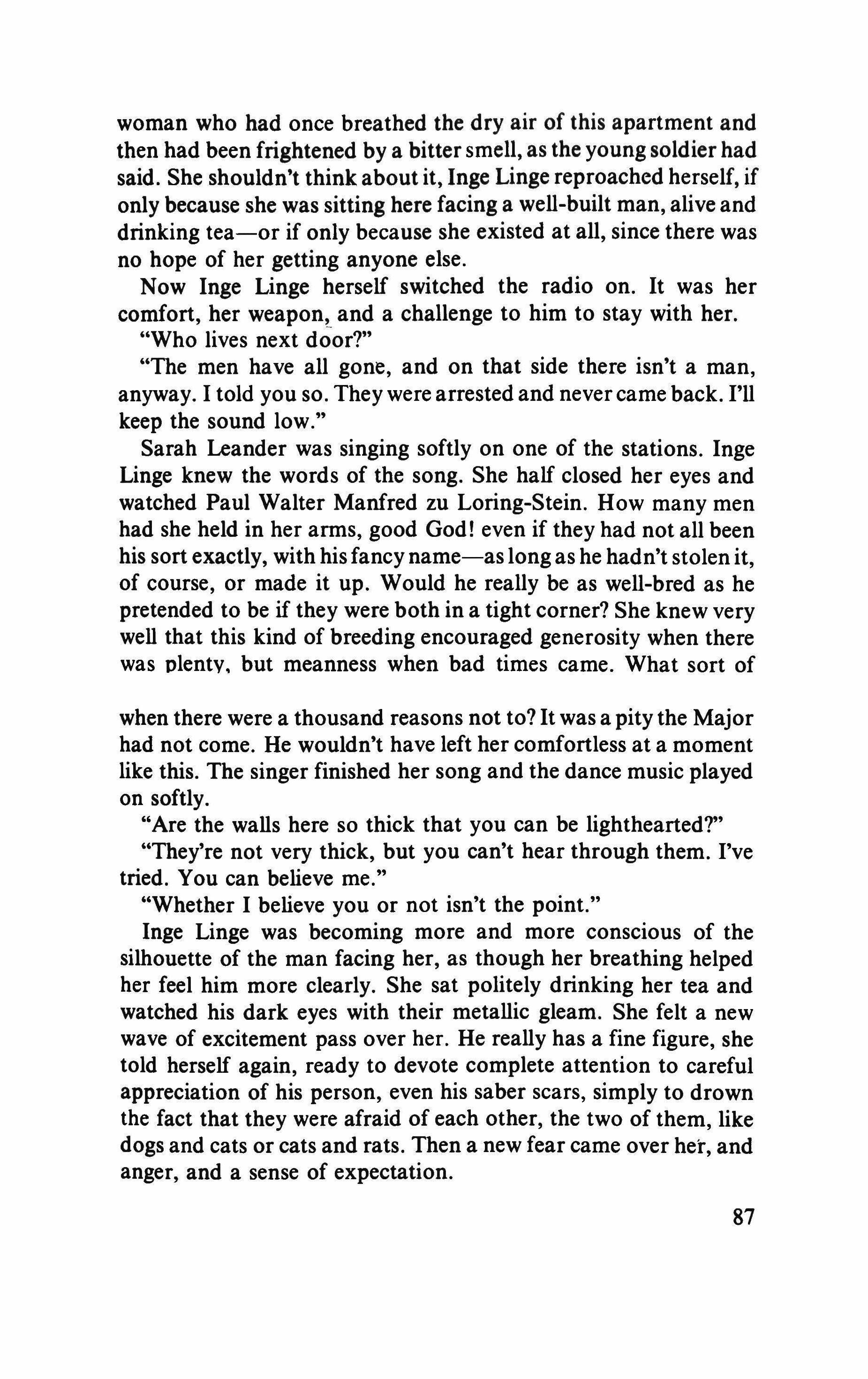
woman who had once breathed the dry air of this apartment and then had been frightened by a bitter smell, as the young soldier had said. She shouldn't think about it, Inge Linge reproached herself, if only because she was sitting here facing a well-built man, alive and drinking tea-or if only because she existed at all, since there was no hope of her getting anyone else.
Now Inge Linge herself switched the radio on. It was her comfort, her weapon, and a challenge to him to stay with her.
"Who lives next door?"
"The men have all gone, and on that side there isn't a man, anyway. I told you so. They were arrested and never came back. I'll keep the sound low."
Sarah Leander was singing softly on one of the stations. Inge Linge knew the words of the song. She half closed her eyes and watched Paul Walter Manfred zu Loring-Stein. How many men had she held in her arms, good God! even if they had not all been his sort exactly, with his fancy name-as long as he hadn't stolen it, of course, or made it up. Would he really be as well-bred as he pretended to be if they were both in a tight corner? She knew very well that this kind of breeding encouraged generosity when there was nlentv, but meanness when bad times came. What sort of
when there were a thousand reasons not to? It was a pity the Major had not come. He wouldn't have left her comfortless at a moment like this. The singer finished her song and the dance music played on softly.
"Are the walls here so thick that you can be lighthearted?"
"They're not very thick, but you can't hear through them. I've tried. You can believe me."
"Whether I believe you or not isn't the point."
Inge Linge was becoming more and more conscious of the silhouette of the man facing her, as though her breathing helped her feel him more clearly. She sat politely drinking her tea and watched his dark eyes with their metallic gleam. She felt a new wave of excitement pass over her. He really has a fine figure, she told herself again, ready to devote complete attention to careful appreciation of his person, even his saber scars, simply to drown the fact that they were afraid of each other, the two of them, like dogs and cats or cats and rats. Then a new fear came over her, and anger, and a sense of expectation.
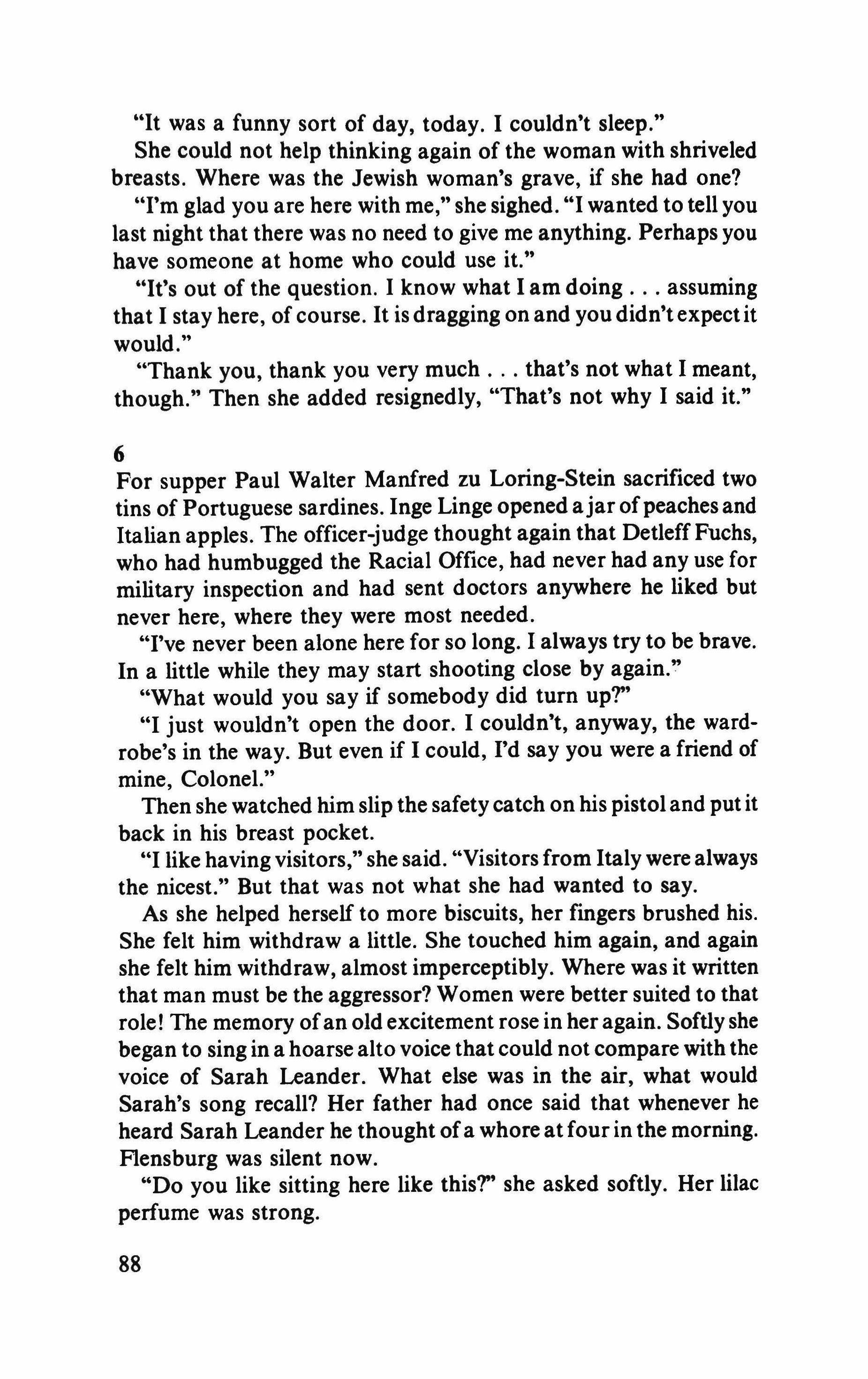
"It was a funny sort of day, today. I couldn't sleep."
She could not help thinking again of the woman with shriveled breasts. Where was the Jewish woman's grave, if she had one?
"I'm glad you are here with me," she sighed. "I wanted to tell you last night that there was no need to give me anything. Perhaps you have someone at home who could use it."
"It's out of the question. I know what I am doing assuming that I stay here, of course. It is dragging on and you didn't expect it would."
"Thank you, thank you very much that's not what I meant, though." Then she added resignedly, "That's not why I said it."
6
For supper Paul Walter Manfred zu Loring-Stein sacrificed two tins of Portuguese sardines. Inge Linge opened a jar ofpeaches and Italian apples. The officer-judge thought again that Detleff Fuchs, who had humbugged the Racial Office, had never had any use for military inspection and had sent doctors anywhere he liked but never here, where they were most needed.
"I've never been alone here for so long. I always try to be brave. In a little while they may start shooting close by again."
"What would you say if somebody did turn up?"
"I just wouldn't open the door. I couldn't, anyway, the wardrobe's in the way. But even if I could, I'd say you were a friend of mine, Colonel."
Then she watched him slip the safetycatch on his pistoland putit back in his breast pocket.
"I like havingvisitors," she said. "Visitors from Italy were always the nicest." But that was not what she had wanted to say.
As she helped herself to more biscuits, her fingers brushed his. She felt him withdraw a little. She touched him again, and again she felt him withdraw, almost imperceptibly. Where was it written that man must be the aggressor? Women were better suited to that role! The memory of an old excitement rose in her again. Softly she began to sing in a hoarse alto voice that could not compare withthe voice of Sarah Leander. What else was in the air, what would Sarah's song recall? Her father had once said that whenever he heard Sarah Leander he thought of a whore at four in the morning. Flensburg was silent now.
"Do you like sitting here like this?" she asked softly. Her lilac perfume was strong.

"Sometimes," he admitted. "Of course, 1 have a mission to fulfill, even if 1 am here with you. It really is nice here."
He spoke with cold brevity. And as his mouth opened to say something, anything at all, and the saber scars moved in their own way across his face, in his mind his voice was quite different. What an impudent little whore she was, indeed. Adolf Hitler had been dead a week. It was partly his fault, and by taking his own life he had perhaps somewhat diminished his own immortal fame. And here he was sitting, resisting this woman's solicitations.
It was the third day and the third night of the uprising that had taken him by surprise, for it would seem, after all, that the rights of Germany ended where the enemy's strength began. And then, she was only normally stupid and empty-headed and thought only about bed and what went with it, and she was fat if she didn't wear a good corset night and day, and he would have to go on being careful because what on first sight looked like a creature to be pitied might have been cured of syphilis five times and neglected the sixth. Yes, right required might, and that was the strength of German law. Inge Linge was more persistent, and he could not rudely push her away, like a cow in a country lane, nor could he sentence her for undermining military vigilance, particularly since he was wearing neither gown nor uniform, and perhaps she did not even feel herselftied to the cause ofGermany, ifthe concierge in the house had thought the matter settled with a couple of slaps and a few curses. And after all, he needed this refuge for a while. Ifit had to be, he would just close his eyes.
"Shall 1 make the bed again?" Inge Linge asked. She knew for certain now that she would have her way, holding her own with soft music and warm breezes.
"A little later," replied Paul Walter Manfred zu Loring-Stein, officer and judge. "I must finish my tea first."
7
Then Inge Linge was lying beside the officer-judge. She was still wearing a dressing-gown of Japanese silk with a large and bright green floral design, the best her wardrobe had to offer.
"The bottles are all empty," she said apologetically. "I haven't got a single drop."
"It doesn't matter," he said.
He was looking at the empty vase with complete indifference. They were strangers. She felt the urge to pick up the vase and fling

it at his metal-grey eyes, which were full ofdisgust, and at his scars, to reduce the distance between them. She had before her the proud, tight-lipped mouth of an officer-judge, smelling faintly of eau-decologne after his shave.
Yes, she thought, she was only a slut from whom anybodymight turn in disgust, or even beat, ifhe couldn't throw her out ofher own house.
Paul Walter Manfred zu Loring-Stein, although he was thinking more about himself than about trying to understand what was going on in Inge Linge's mind, nevertheless dimly realized what had happened. His scars were set in motion again. Her green eyes, full of distress at all the questions to which there were no answers, gazed at him, and her chestnut lashes were moist. Her complexion was pale, almost white, milky.
"I'll go and lie down next door."
"Why should you?"
"I don't know."
"I would be better company, I suppose, if I had come to you in different circumstances."
As suddenly as she had decided to go into the next room, she now felt a sudden pity for him. Then that, too, passed as he bit his lips, slashed and scarred in two places, and her old anxiety driven by her anger threatened to return.
"Were you ever wounded?"
"No," he answered. "Whydo you ask?" And then: "Do you think that's why And he laughed deep and loud, as if he were laughing at himself in another way about something else. It really meant nothing at all to this slut that the finest soldiers had been put to mending streets. "No, I'm just too occupied with other worries."
It was a lie, although what was worrying him most of all was how to get out of this lacuna of German law and order; it was taking longer than he had thought it would. For Paul Walter Manfred zu Loring-Stein would really not have liked to mend the streets of Prague, dirty, his head shaved, dressed in rags.
Inge Linge felt somewhat relieved that her guess had been so near the mark, and she felt a grain of superiority and the seed of a new cunning. Paul Walter Manfred zu Loring-Stein, turning from his own thoughts, wanted to talk to her. Was he afraid even ofthis tramp? Was she capable ofjoining the bandits and betraying him? It was most unpleasant. His thoughts returned to mending streets.
"What are you thinking about?"
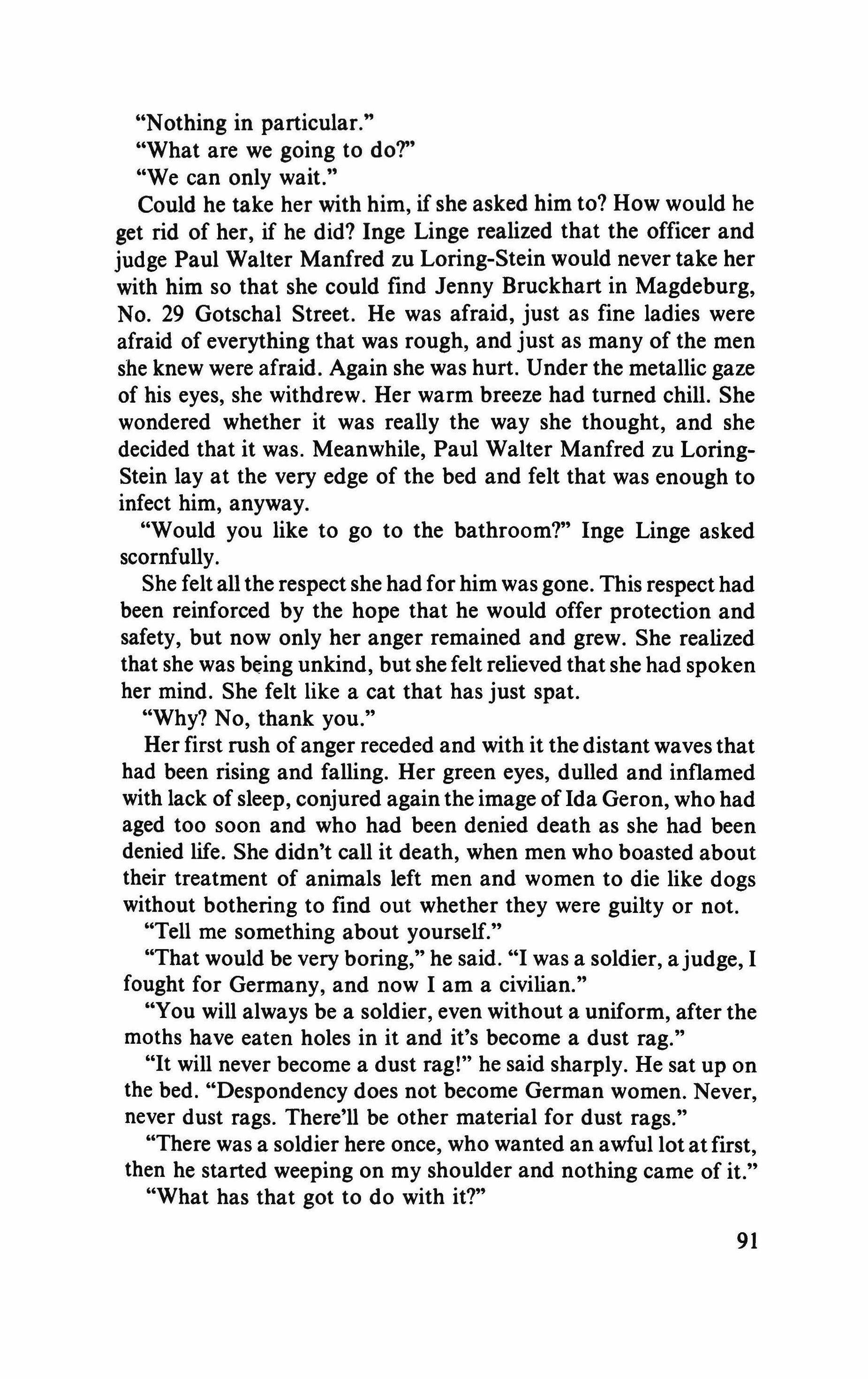
"Nothing in particular."
"What are we going to do?"
"We can only wait."
Could he take her with him, if she asked him to? How would he get rid of her, if he did? Inge Linge realized that the officer and judge Paul Walter Manfred zu Loring-Stein would never take her with him so that she could find Jenny Bruckhart in Magdeburg, No. 29 Gotschal Street. He was afraid, just as fine ladies were afraid of everything that was rough, and just as many of the men she knew were afraid. Again she was hurt. Under the metallic gaze of his eyes, she withdrew. Her warm breeze had turned chill. She wondered whether it was really the way she thought, and she decided that it was. Meanwhile, Paul Walter Manfred zu LoringStein lay at the very edge of the bed and felt that was enough to infect him, anyway.
"Would you like to go to the bathroom?" Inge Linge asked scornfully.
She felt all the respect she had for him was gone. This respect had been reinforced by the hope that he would offer protection and safety, but now only her anger remained and grew. She realized that she was being unkind, but she felt relieved that she had spoken her mind. She felt like a cat that has just spat.
"Why? No, thank you."
Her first rush of anger receded and with it the distant waves that had been rising and falling. Her green eyes, dulled and inflamed with lack of sleep, conjured again the image of Ida Geron, who had aged too soon and who had been denied death as she had been denied life. She didn't call it death, when men who boasted about their treatment of animals left men and women to die like dogs without bothering to find out whether they were guilty or not.
"Tell me something about yourself."
"That would be very boring," he said. "I was a soldier, ajudge, I fought for Germany, and now I am a civilian."
"You will always be a soldier, even without a uniform, after the moths have eaten holes in it and it's become a dust rag."
"It will never become a dust rag!" he said sharply. He sat up on the bed. "Despondency does not become German women. Never, never dust rags. There'll be other material for dust rags."
"There was a soldier here once, who wanted an awful lot at first, then he started weeping on my shoulder and nothing came of it."
"What has that got to do with it?"

"He told me all about Birkenau-Auschwitz. I can't remember everything he said. I've got such a bad memory. He said there were baths, and showers, and men and women and children went in and nobody ever came out. All he had to do was open cans marked I. G. Farben. He checked every can off on a slip of paper and then he handed it in for them to send to Berlin. They were awfully strict about his checking every single can. Do you see? Maybe he was crazy, I don't know. He had been a parachutist before, then he was demoted to the infantry. I suppose his nerves weren't goodenough for the parachutists, he didn't say exactly. You're a high-ranking officer and a judge, and you've seen a lot of the world-is it true or isn't it, what he said about those baths and showers, and chambers like bathrooms?"
She went on, "They found a lovely name for it: the Heavenly Commando, and sometimes they called it the Baths of Eternal Oblivion. They gave it beautiful names, just as they never used the term 'killing,' but only 'action' or 'execution of orders.'"
Inge Linge felt anxious. She wanted to relieve her feelings, stop them from constantly going round and round in her mind. Forthe first time she thought that he might kill her. She didn't worry about what he might say next. He was still sitting up, leaning back on his elbows, the scars on his face twitching. Inge Linge layquietlyin the bright green Japanese kimono with her hands behind her head. The officer-judge watched her intently.
"A Jewess used to live in this house." Now it sounded terribly distant, the idea of the tubercular dark-haired Ida Geron. "In 1942."
It must have been a long time ago, nineteen hundred and fortytwo. Yes, she, Inge Linge, had the portrait of a Prussian general hanging here, nearly a hundred years old, and somebody had given it to her, and his chin hadn't been shot away. And the story ought to go on with more Czech heads, like the judge had said so convincingly, and some shot-away chins her father had lathered with snow-white soap. Paul Walter Manfred zu Loring-Stein, Doctor of Laws, was much surer of his ground there than in bed; he must know what he was talking about. And somewhere someone was smiling happily at it all. Inge Linge thought ofthe concierge's head, downstairs, and the heads of the three men of the family with their flat workmen's caps-and if that Jewess ever came back, her head, too.
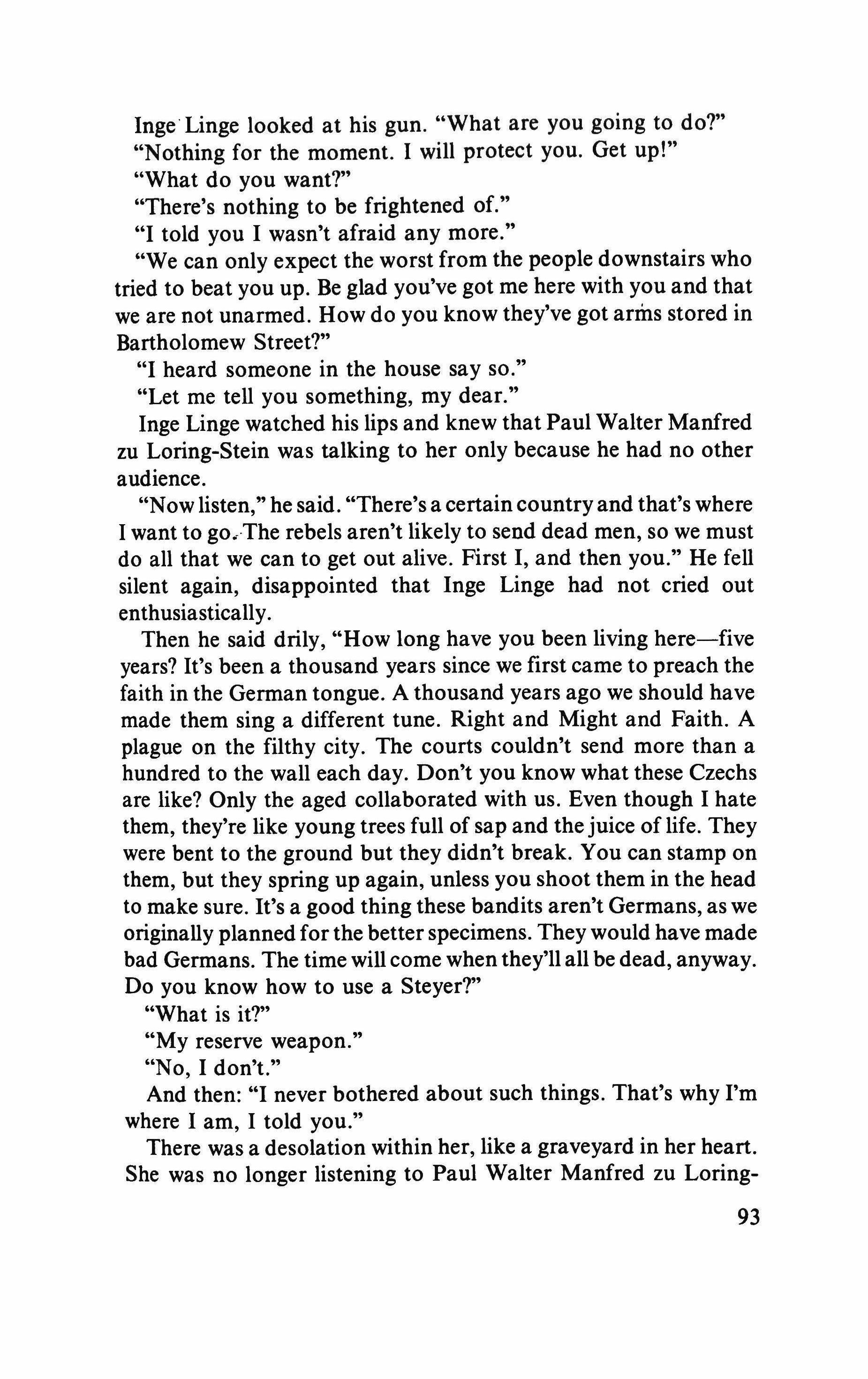
Inge Linge looked at his gun. "What are you going to do?"
"Nothing for the moment. I will protect you. Get up!"
"What do you want?"
"There's nothing to be frightened of."
"I told you I wasn't afraid any more."
"We can only expect the worst from the people downstairs who tried to beat you up. Be glad you've got me here with you and that we are not unarmed. How do you know they've got anTIS stored in Bartholomew Street?"
"I heard someone in the house say so."
"Let me tell you something, my dear."
Inge Linge watched his lips and knew that Paul Walter Manfred zu Loring-Stein was talking to her only because he had no other audience.
"Now listen," he said. "There's a certaincountry and that's where I want to go.The rebels aren't likely to send dead men, so we must do all that we can to get out alive. First I, and then you." He fell silent again, disappointed that Inge Linge had not cried out enthusiastically.
Then he said drily, "How long have you been living here-five years? It's been a thousand years since we first came to preach the faith in the German tongue. A thousand years ago we should have made them sing a different tune. Right and Might and Faith. A plague on the filthy city. The courts couldn't send more than a hundred to the wall each day. Don't you know what these Czechs are like? Only the aged collaborated with us. Even though I hate them, they're like young trees full of sap and the juice of life. They were bent to the ground but they didn't break. You can stamp on them, but they spring up again, unless you shoot them in the head to make sure. It's a good thing these bandits aren't Germans, as we originally planned for the better specimens. They would have made bad Germans. The time will come when they'll all be dead, anyway. Do you know how to use a Steyer?"
"What is it?"
"My reserve weapon."
"N0, I don't."
And then: "I never bothered about such things. That's why I'm where I am, I told you."
There was a desolation within her, like a graveyard in her heart. She was no longer listening to Paul Walter Manfred zu Loring-

Stein. In her mind she was putting flowers on a grave and the words of Father Hesmussen took on a new meaning. White lilies and hyacinths, and red roses-not only for herself. The thousand perfumes in her bottles in that cupboard, and her underwear, artificial silk and real muslin, her beautiful dresses, and Ida Geron who had lived here before her. Inside of her. there was no trace of stimulation, nor of hate.
"They say we have done terrible things," she said. "We only did what others would have done in our place. That, of course, is the legal way to look at it. Now we are sent to mend the streets. It's a good thing we did what we did. Fear inspires respect. They had to be shown who they were dealing with-that for each one they killed, others would come, worse, more brutal, more ruthless. There was too little ofeverything. If you had had a Steyer, you could have shot at them from this window when they came to the chemist's for those bandages. Don't try to look innocent! Every child knows we had liquidation squads. That was what your befuddled parachutist was talking about. I would say he didn't deserve to be demoted to the infantry; he should have been hanged outright. You can soothe your conscience, though. We were never as thorough as the world would like to think."
"So it is the truth."
"What do you mean, the truth? Czech truth? Or even Jewish truth?"
"I mean the baths and the showers."
"Have you seen them with your own eyes? You haven't? Everybody should be asked that question when he starts asking impertinent questions. What you haven't seen doesn't exist, do you understand?" Then he laughed: "My dear Inge Linge, perhaps this isn't the right moment for what I am going to say to you. When those who survived our baths and showers grow up, they will be astonished at how mild we were-as mild as lambs. You can rely on the men and women who marched in the front ranks and didn't leave much evidence behind. And then you can rely on German lawyers. They will know what to do and how to do it. There's no need to think about it now, if it makes you nervous. Things really weren't as bad as people say. Our camps were places of opportunity, after all, for our soldiers and the undisciplined units. We gave the strong a chance and the weak a way out. Everyone had an

opportunity to show what he could do. Don't listen to stories. There are far too many stories being told! Of course, if there were no incriminating evidence our tribunals would have died of old age. The strong will be grateful to us one day. The weak would have died anyway, without our help. Life is like that. The criteria of selection. It's equally true of us."
And he was thinking that no one would have any interest in glorifying those groups of people who had gone to the gas chambers without resisting.
He still held his pistol in his hand. She noticed once more his strong white fingers with the ginger hair.
"That is an eternal truth, not the sort of truth you were asking about. That may be proof for your concierge woman. That is the way you must look at things. Chin up, now! There's no need to be so sad, Inge Linge. You are German!"
"They're still shooting."
"Yes, 1 know."
"I heard it while you were talking, but I'm not afraid now. Do you think they won't come here?"
"You were always kind to them. There's nothing for you to be afraid of."
The stern metal-grey eyes searched the green eyes for signs of treachery, and found none.
"I don't know," she replied. "I'm living in a Jewish apartment." Then she said, "I'm going to lie down next door. I've got a terrible headache."
"Take the pistol with you, and if they start shooting under the windows of the house, come back in here."
8
Inge Linge did not even turn the radio off. She let the soft, sweet dance music play, full of longing and silly words which suddenly took on a new meaning. She left the little white bulb on behind the aquarium, and watched the fish gasping for air with their last vestiges of strength.
When she went into the kitchen, still filled with a feeling of desolation, she opened the window so that she could hear the men ifthey were to come back, and the shooting ifit came into Chestnut Street. Night air filled the room. With strange deliberation Inge
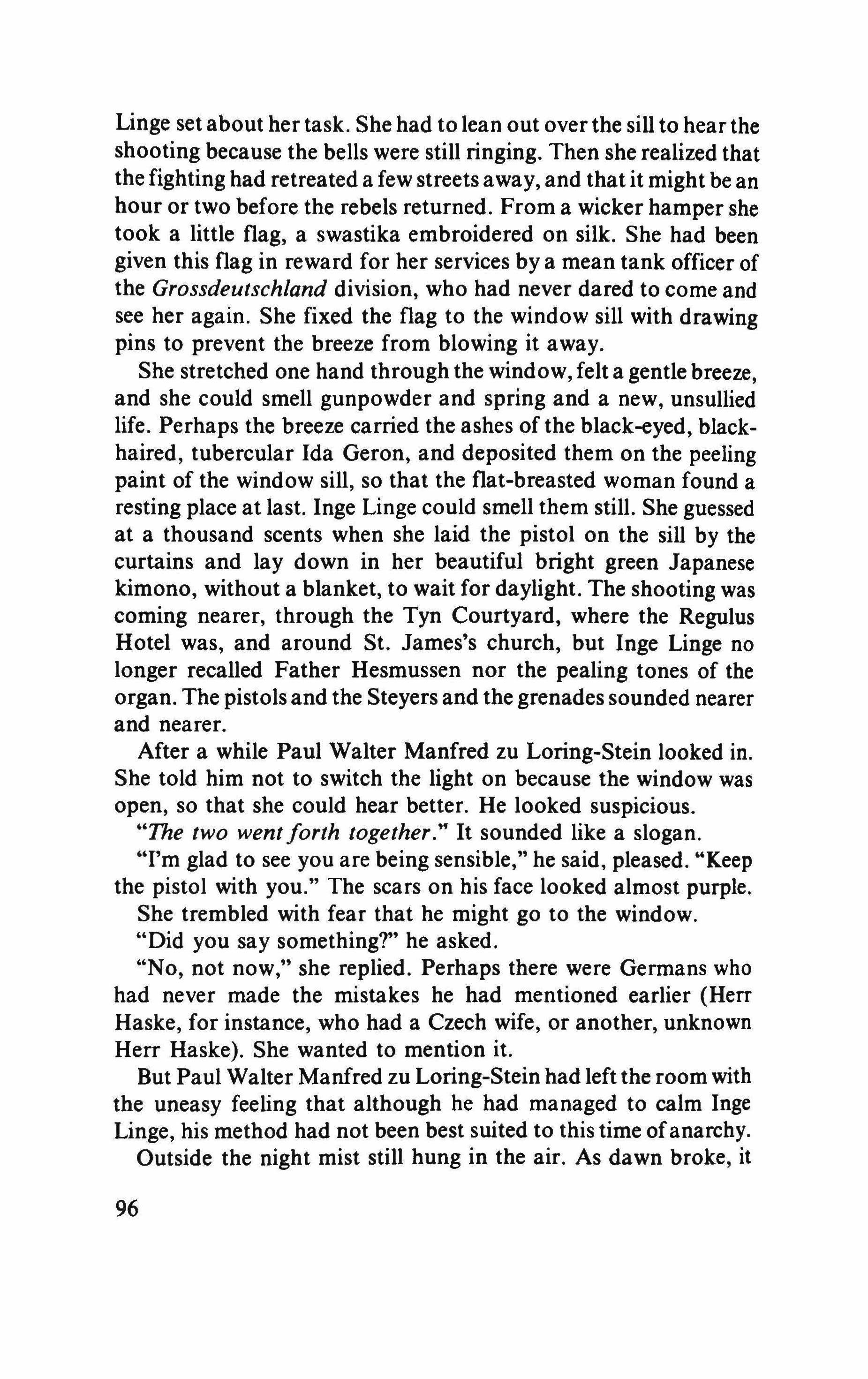
Linge set about her task. She had to lean out over the sill to hear the shooting because the bells were still ringing. Then she realized that the fighting had retreated a few streets away, and that it might be an hour or two before the rebels returned. From a wicker hamper she took a little flag, a swastika embroidered on silk. She had been given this flag in reward for her services by a mean tank officer of the Grossdeutschland division, who had never dared to come and see her again. She fixed the flag to the window sill with drawing pins to prevent the breeze from blowing it away.
She stretched one hand through the window, felt a gentle breeze, and she could smell gunpowder and spring and a new, unsullied life. Perhaps the breeze carried the ashes of the black-eyed, blackhaired, tubercular Ida Geron, and deposited them on the peeling paint of the window sill, so that the flat-breasted woman found a resting place at last. Inge Linge could smell them still. She guessed at a thousand scents when she laid the pistol on the sill by the curtains and lay down in her beautiful bright green Japanese kimono, without a blanket, to wait for daylight. The shooting was coming nearer, through the Tyn Courtyard, where the Regulus Hotel was, and around St. James's church, but Inge Linge no longer recalled Father Hesmussen nor the pealing tones of the organ. The pistols and the Steyers and the grenades sounded nearer and nearer.
After a while Paul Walter Manfred zu Loring-Stein looked in. She told him not to switch the light on because the window was open, so that she could hear better. He looked suspicious.
"The two went forth together." It sounded like a slogan.
"I'm glad to see you are being sensible," he said, pleased. "Keep the pistol with you." The scars on his face looked almost purple. She trembled with fear that he might go to the window.
"Did you say something?" he asked.
"No, not now," she replied. Perhaps there were Germans who had never made the mistakes he had mentioned earlier (Herr Haske, for instance, who had a Czech wife, or another, unknown Herr Haske). She wanted to mention it.
But Paul Walter Manfred zu Loring-Stein had left the room with the uneasy feeling that although he had managed to calm Inge Linge, his method had not been best suited to this time ofanarchy.
Outside the night mist still hung in the air. As dawn broke, it

began to thin. Inge Linge waited. As she lay motionless, anxious but impatient, everythingpassed through her. Zu Loring-Stein was waiting in the next room to see what would happen. At the moment of daybreak, when the steel grenades came through the windows of the apartment, where once a stooping Jewish woman had lived, Inge Linge thought that at last the night had gone and day had come. She knew the sun would be shining brightly, at first red and then yellow and then white. The blue day was there in her eyes, but nothing else now, not light, not the breeze, not even the gulping of dying fish from the shattered aquarium.
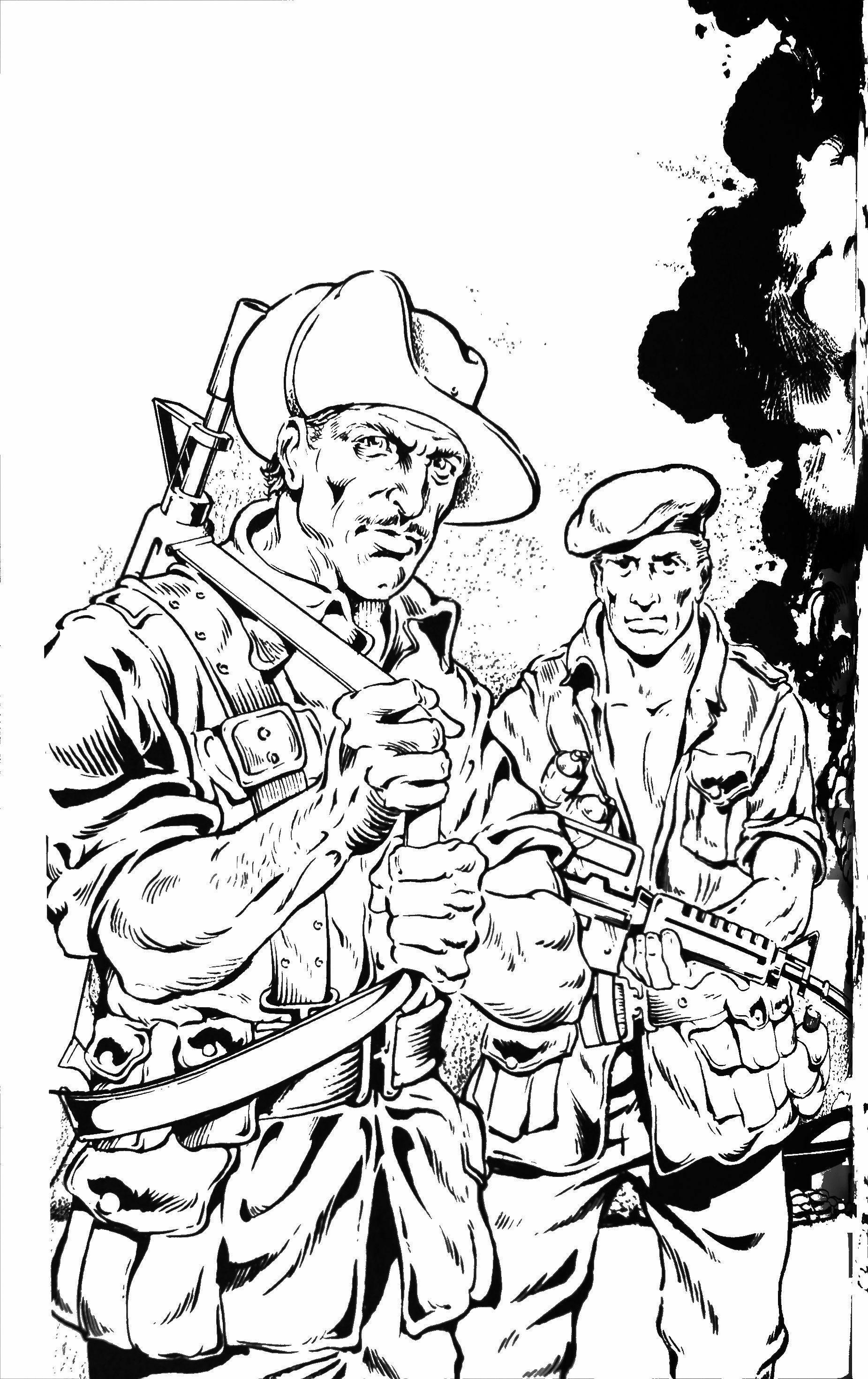
Sympathy for the devil Kent Anderson

A sheet of paper was tacked to the wall over Hanson's bunk:
EVERY DAY IN THE WORLD 100,000 PEOPLE DIE A HUMAN LIFE MEANS NOTHING -General Vo Nguyen Giap Commander in Chief North Vietnamese Army
IN ORDER TO DESPISE SUFFERING, TO BE ALWAYS CONTENT AND NEVER ASTONISHED AT ANYTHING, ONE MUST REACH SUCH A STATE AS THIS -AND IVAN DMITRICH INDICATED THE OBESE PEASANT, BLOATED WITH FAT-OR ELSE ONE MUST HARDEN ONE'S SELF THROUGH SUFFERINGS TO SUCH A DEGREE AS TO LOSE ALL SENSITIVITY TO THEM: THAT IS, IN OTHER WORDS, CEASE TO LIVE.
-Anton Chekhov
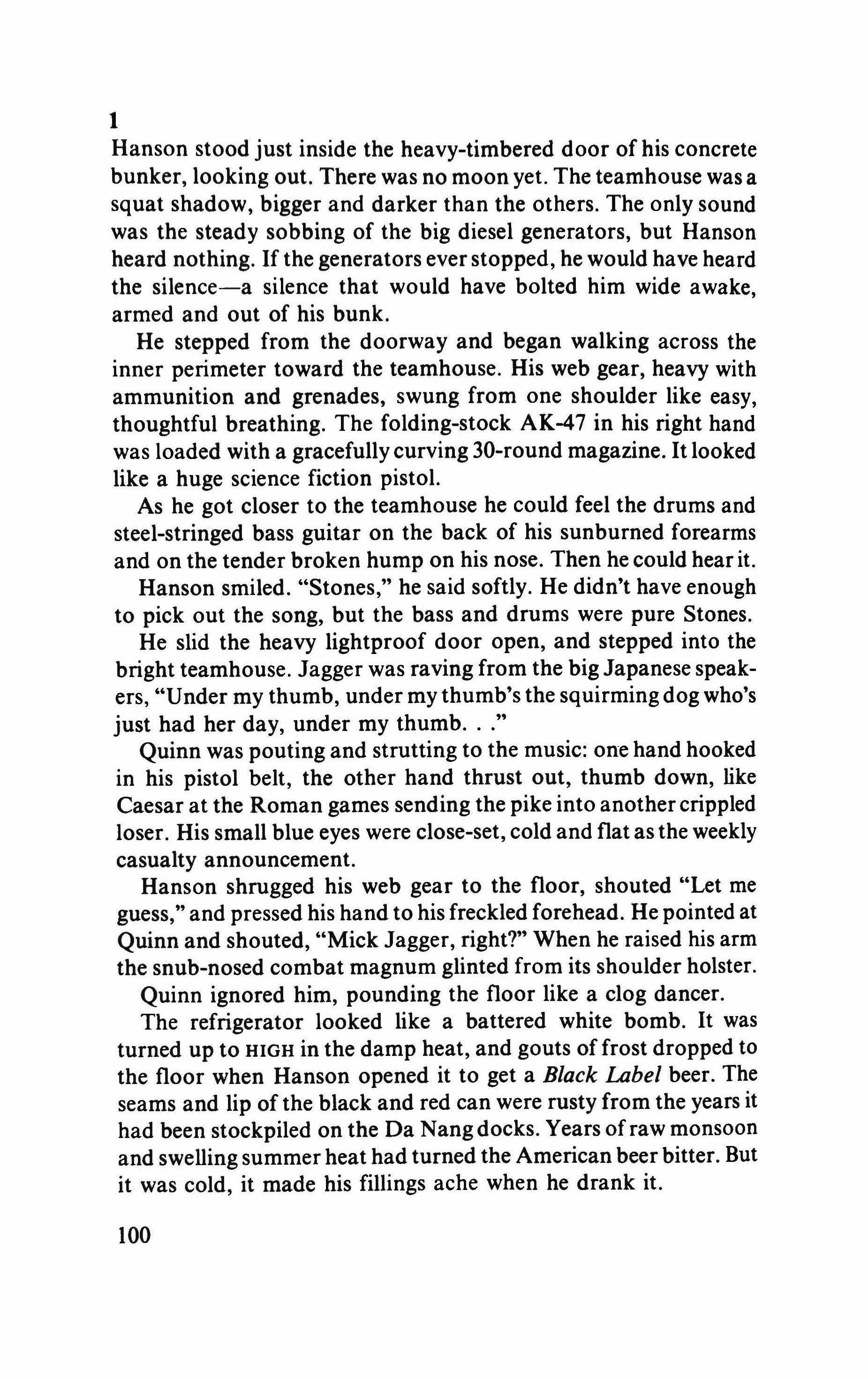
Hanson stood just inside the heavy-timbered door of his concrete bunker, looking out. There was no moon yet. The teamhouse wasa squat shadow, bigger and darker than the others. The only sound was the steady sobbing of the big diesel generators, but Hanson heard nothing. If the generators ever stopped, he would have heard the silence-a silence that would have bolted him wide awake, armed and out of his bunk.
He stepped from the doorway and began walking across the inner perimeter toward the teamhouse. His web gear, heavy with ammunition and grenades, swung from one shoulder like easy, thoughtful breathing. The folding-stock AK-47 in his right hand was loaded with a gracefullycurving 30-round magazine. It looked like a huge science fiction pistol.
As he got closer to the teamhouse he could feel the drums and steel-stringed bass guitar on the back of his sunburned forearms and on the tender broken hump on his nose. Then he could hear it.
Hanson smiled. "Stones," he said softly. He didn't have enough to pick out the song, but the bass and drums were pure Stones. He slid the heavy lightproof door open, and stepped into the bright teamhouse. Jagger was raving from the big Japanese speakers, "Under my thumb, under my thumb's the squirmingdog who's just had her day, under my thumb
Quinn was pouting and strutting to the music: one hand hooked in his pistol belt, the other hand thrust out, thumb down, like Caesar at the Roman games sending the pike into another crippled loser. His small blue eyes were close-set, cold and flat as the weekly casualty announcement.
Hanson shrugged his web gear to the floor, shouted "Let me guess," and pressed his hand to his freckled forehead. He pointed at Quinn and shouted, "Mick Jagger, right?" When he raised his arm the snub-nosed combat magnum glinted from its shoulder holster. Quinn ignored him, pounding the floor like a clog dancer. The refrigerator looked like a battered white bomb. It was turned up to HIGH in the damp heat, and gouts of frost dropped to the floor when Hanson opened it to get a Black Label beer. The seams and lip of the black and red can were rusty from the years it had been stockpiled on the Da Nang docks. Years of raw monsoon and swelling summer heat had turned the American beer bitter. But it was cold, it made his fillings ache when he drank it.

On top of the refrigerator was a flesh-colored quart jar. Hanson screwed off the top and took out two of the green and white amphetamine capsules. He knocked them back with the icy beer.
"Beats coffee for starting your day," he thought smiling, recalling the double-time marching chant back at Fort Bragg, "Airborne Ranger Green Beret, this is the way we start our day," running the sandhills before dawn. Rumor had it that one team had run over a PFC from a supply unit who had been drunkenlycrossing the road in front of them. The team had trampled him and left him behind, never falling out of step, chanting each time their left jump boots hit the ground, "Pray for war, pray for war,pray for war."
He sat down on one ofthe footlockers and began pagingthrough the Time magazine that had come in on the last mail chopper.
The Stones finished "Under My Thumb," paused, and began "Mother's Little Helper." Quinn turned the volume down and walked over to Hanson. Quinn moved with an ominous deliberation, like a man carrying nitroglycerin. People got uncomfortable when he moved too close or too quickly.
"Keepin' up with current events, my man?" he asked Hanson. "How's the war going?"
"This magazine says we're kicking shit out of'em," Hanson said tapping the open magazine. "But now, what about the home front. Here's this young man, a 'Cornell Senior' it says here. 'I'm nervous as hell. I finally decided on a field-economics-and then I find out I'm number 59 on the draft lottery.' Huh now? Just when he decided on economics."
Hanson kept thumbing through the magazine, singing softly, "Mah candy man, he's come an' gone. Mah candy man, he's come an' gone. An' I love ever' thing in this godomighty worl', GOD knows I do
To the west a heavy machine gun was firing, the distant pounding as monotonous as an assembly-line machine. Artillery was going in up north. Three guns working out. They were good, the rounds going in one on top ofthe other, each explosion like a quick violent wind, the sound your fire starter makes when you touch off the backyard charcoal grill. Normal night sounds.
Hanson read the ads outloud. "'There's a Ford in yourJuture.' 'Tired of diet plans that don't work? .'''
Quinn interrupted, "Then come to Vietnam, you fat fuck, and get twenty pounds blown off your ass."
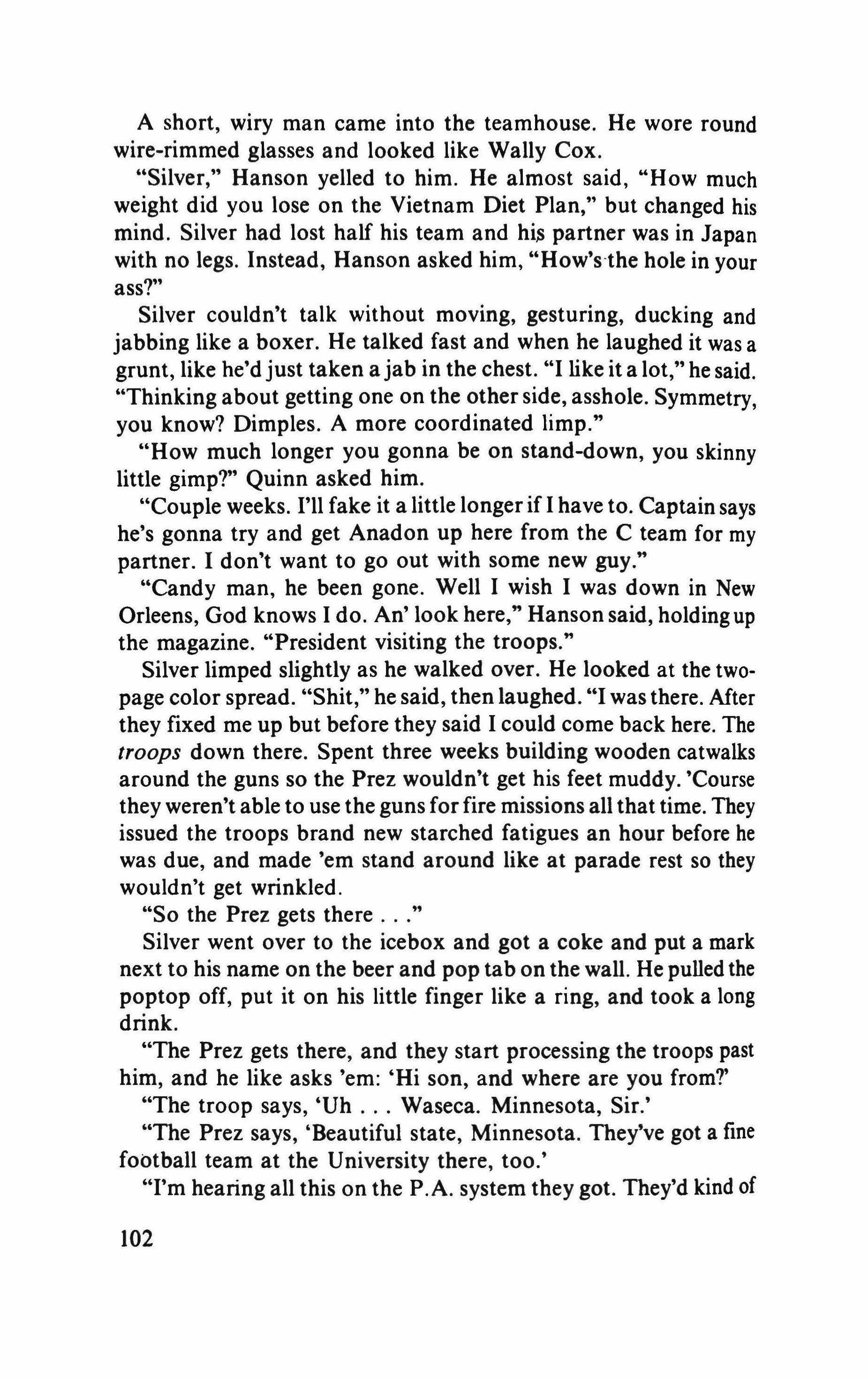
A short, wiry man came into the teamhouse. He wore round wire-rimmed glasses and looked like Wally Cox.
"Silver," Hanson yelled to him. He almost said, "How much weight did you lose on the Vietnam Diet Plan," but changed his mind. Silver had lost half his team and his partner was in Japan with no legs. Instead, Hanson asked him, "How'sthe hole in your ass?"
Silver couldn't talk without moving, gesturing, ducking and jabbing like a boxer. He talked fast and when he laughed it was a grunt, like he'd just taken a jab in the chest. "I like it a lot," he said.
"Thinking about getting one on the other side, asshole. Symmetry, you know? Dimples. A more coordinated limp."
"How much longer you gonna be on stand-down, you skinny little gimp?" Quinn asked him.
"Couple weeks. I'll fake it a little longer if I have to. Captain says he's gonna try and get Anadon up here from the C team for my partner. I don't want to go out with some new guy."
"Candy man, he been gone. Well I wish I was down in New Orleens, God knows 1 do. An' look here," Hanson said, holding up the magazine. "President visiting the troops."
Silver limped slightly as he walked over. He looked at the twopage color spread. "Shit," he said, then laughed. "I was there. After they fixed me up but before they said 1 could come back here. The troops down there. Spent three weeks building wooden catwalks around the guns so the Prez wouldn't get his feet muddy. 'Course they weren't able to use the guns for fire missions all that time. They issued the troops brand new starched fatigues an hour before he was due, and made 'em stand around like at parade rest so they wouldn't get wrinkled.
"So the Prez gets there
Silver went over to the icebox and got a coke and put a mark next to his name on the beer and pop tab on the wall. He pulled the poptop off, put it on his little finger like a ring, and took a long drink.
"The Prez gets there, and they start processing the troops past him, and he like asks 'em: 'Hi son, and where are you from?'
"The troop says, 'Uh Waseca. Minnesota, Sir.'
"The Prez says, 'Beautiful state, Minnesota. They've got a fine football team at the University there, too.'
"I'm hearing all this on the P.A. system they got. They'd kind of

put me and some of the other people out of sight. 1 wasn't looking too good."
Silver glanced down at his baggy fatigues, "You know, at best 1 don't look like a model soldier. Anyway, the Prez gives the guy a big handshake and says, 'I just wanted to personally let you know, private uh '
"'Private schmuck, Sir,' this fuckin' cannon loader says and turns so the Prez can see his name tag but there ain't no name tag 'cause somebody forgot to put out the word that name tags had to be sewn on the new fatigues. Some supply officer's military career is over.
"So the Prez says, 'I'm here, Private Schmuck, because 1 wanted to let you boys know .'"
Silver laughed his tight laugh, "Huh. Bunch of brothers standing near me. Go into the routine."
He pulled himself up tight and began strutting and jabbing his finger at the floor, talking angrily to himself. "Boy? You Boys? Fool up there best not be talkin' 'bout boys, one of the brothers up there. That's the motherfuckin' truth, that ain't no boolshit. Say. Gimme some of that power now."
Silver took a sip of coke and went on in his normal voice, "The brothers started doing the power handshake and all the white boys started moving away. So the Prez shakes some more hands, gives out a few medals and says what a finejob we're doing, and that he, your President, was doingeverything he could to get us boys home. Then he climbs in his chopper and flies away, all the officers up there kind ofcrouching at attention, trying to hold their hats on in the rotor blast."
"And you sat through the whole thing," Quinn said, "you enjoy the show that much?"
"I was afraid to leave. I was afraid tomove. I'm glad I didn't have to shake hands with that fucker. I didn't want to get within 100 feet of him. That was Mr. Death standing up there shaking hands. They had gunships flying patterns I couldn't fuckin' believe. Then you got MPs all over, trying to look sharp, nervous and trigger-happy as hell. And then these guys. All around the Prez. Skin-head haircuts, mirror shades so you can't see their eyes. They didn't look rational, you know? And they were all packing Uzis on assault slings under their coats. Anything move too fast or the wrong way, it would've got shot 800 times. Half the camp would've got wiped out. Like a bunch of ARVNs in a fire fight, shooting at everything."

Silver looked at the wristwatch hanging through the buttonhole of his breast pocket. "Better get down and take the radio watch," he said. "End of the month. Gonna be clearing artillery grids all night. They gotta blow up what's left of the old monthly allotment or next month's allotment will be smaller. That's logical, right. The US Army is logical. It's a logical war.
"Hey, you want anything blown up? Fifth Mech's set up a new firebase. 'Firebase Flora' in honor of the commander's wife. Got everything, 155s, 175s, eight inch. Want me to have them plow the ground for you?"
"How about that ridge?" Hanson said.
Quinn nodded.
"You know the one," Hanson said. "'bout eight clicks north."
"The one where Charles ate up that company of dumbass 5th Mech?"
"Yeah. Might as well put a little shit on that. South side, kinda walk it from the valley halfway up the side. We'll probably be over that way in the morning."
"OK," Silver said, "you fuckers watch your ass over there, Charles has got you by the balls when he gets you in Cambodia. I fucken know."
Silver went down into the underground, concrete-reinforced radio bunker and relieved Vyers. He sat at a small desk surrounded on three sides by banks of radios, some of them as big as filing cabinets. They all hummed slightly, each at a different pitch, radiating heat like a closed oven door.
Silver spent his first few minutes studying call signs, code names for different units and firebases. The call signs were composed by computer each month and changed in an attempt to confuse the enemy about what name a unit went by. Call signs were two words, such as "inside packs," "formal granite," or "recent voice." At times the random combinations sounded ominous and units were glad when they were changed.
His glasses flashing in the dim yellow and blue dial lights, Silver looked demonic, his face the color of someone already dead.
Mr. Minh walked into the teamhouse, smiling. All his teeth had been filed to points, as was the custom of the Rhade Montagnard tribes, but his were capped in gold with jade inlays the shapes of stars and crescent moons. He was the Montagnard team leader.

The gold and jade caps were a sign ofwealth and respect. And they were part of his magic. He had high cheekbones and quick black eyes bright with pride and courage. His shoulder-length black hair was tied back with a piece of green parachute nylon. He was wearing striped tiger fatigues, and his web gear was hung with grenades and ammo pouches.
Mr. Minh wore a small amulet, a Katha, around his neck. Chicken man had made it for him. It protected his body from bullets. Once Hanson had asked him, "Mr. Minh, I have seen Rhade KIA and they were wearing Kathas, how could that be?"
Mr. Minh thought a moment, shrugged, and said, "Bad Katha." Mr. Minh knew that he would die some day, and he had no fear of death. If he lived well and fought bravely, he would be reborn as a hawk, or a hill spirit, or a tiger. All life was the same. Death meant nothing.
"We are ready, Sar," Mr. Minh said to Hanson in his soft hill tribesman's voice.
"OK, Mr. Minh. Maybe ten minutes."
When he went back out the door, Hanson could see the shadows of the three other stocky "Yards." Their foreheads and weapons flickered in the starlight like a school of piranha in the dark river. Quinn was checking his gear. Hanson began a last-minute equipment check, more a confidence ritual than anything else. He'd gone through his AK-47 the day before, checking for worn or broken parts while cleaning it, then test-fired one clip. He carried the Communist weapon instead of the standard American M-16 because the sound ofthe AK-47 would not give away his position, and the NVA could not be sure he was an American. The M-16 fired red tracer rounds while the AK.-47 fired green, and if they made contact at night the tracer rounds would pinpoint him. On the illegal cross-border operations all equipment was "sanitized." No insignia was worn and all weapons and equipment were of foreign manufacture, most of it acquired from the big CIA warehouse in Da Nang. If they were killed on the wrong side of the border, the North Vietnamese could not "prove" they were Americans.
Their web gear looked much like a parachute harness. Wide suspenders hooked into a heavy brass-grommeted pistol belt. Two pieces of nylon webbing ran from the front of the pistol belt through the inside of the thighs to the back ofthe pistol belt. Thirty
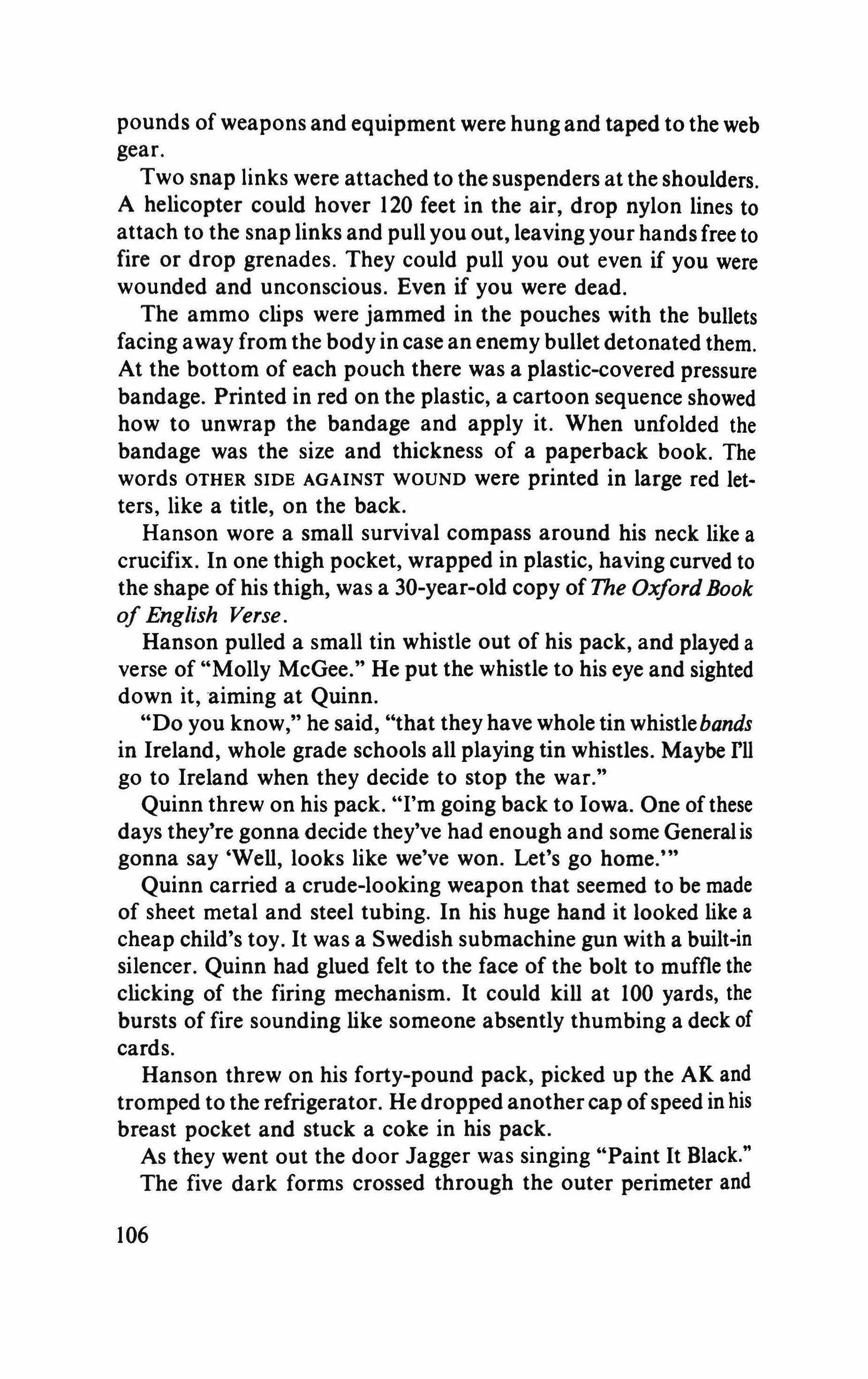
pounds of weapons and equipment were hung and taped to the web gear.
Two snap links were attached to the suspenders at the shoulders. A helicopter could hover 120 feet in the air, drop nylon lines to attach to the snap links and pull you out, leaving your hands free to fire or drop grenades. They could pull you out even if you were wounded and unconscious. Even if you were dead.
The ammo clips were jammed in the pouches with the bullets facing away from the body in case an enemy bullet detonated them. At the bottom of each pouch there was a plastic-covered pressure bandage. Printed in red on the plastic, a cartoon sequence showed how to unwrap the bandage and apply it. When unfolded the bandage was the size and thickness of a paperback book. The words OTHER SIDE AGAINST WOUND were printed in large red letters, like a title, on the back.
Hanson wore a small survival compass around his neck like a crucifix. In one thigh pocket, wrapped in plastic, having curved to the shape of his thigh, was a 30-year-old copy of The OxfordBook of Eng/ish Verse.
Hanson pulled a small tin whistle out of his pack, and played a verse of "Molly McGee." He put the whistle to his eye and sighted down it, aiming at Quinn.
"Do you know," he said, "that they have whole tin whistlebands in Ireland, whole grade schools all playing tin whistles. Maybe I'll go to Ireland when they decide to stop the war."
Quinn threw on his pack. "I'm going back to Iowa. One of these days they're gonna decide they've had enough and some Generalis gonna say 'Well, looks like we've won. Let's go home.'"
Quinn carried a crude-looking weapon that seemed to be made of sheet metal and steel tubing, In his huge hand it looked like a cheap child's toy. It was a Swedish submachine gun with a built-in silencer. Quinn had glued felt to the face of the bolt to muffle the clicking of the firing mechanism. It could kill at 100 yards, the bursts of fire sounding like someone absently thumbing a deck of cards.
Hanson threw on his forty-pound pack, picked up the AK and tromped to the refrigerator. He dropped another cap ofspeed in his breast pocket and stuck a coke in his pack.
As they went out the door Jagger was singing "Paint It Black."
The five dark forms crossed through the outer perimeter and

headed west. Another heavy machine gun opened up in the distance, and the big red tracers floated gracefully, like glowing golf balls, across the sky. Scores of them hit a hillside and rebounded in random patterns.
Artillery rounds blinked silver and yellow and bluish-white against the mountains.
Hanson watched them, his eyes slightly dilated. "God damn, Quinn," he said, "it's always springtime in Vietnam."
Before dawn, they would be across the border.
Most of the NCO clubs in Vietnam had plywood walls and a sheet-metal roof that kept out the rain, but not the heat or the stink of the piss-tubes out back.
The Special Forces NCO club looked like one wing of an exclusive mountain resort. The walls were stone. The bar was stone and hand-carved mahogany, and the big mirror was tinted a pleasant cool green. A huge green beret was set in the flagstone floor in thick glass bricks, the Special Forces crest was inset in chrome and brass. The club was air-conditioned, the Vietnamese barmaids were pretty, and Chivas was 30¢ a shot.
The SKS mounted over the bar had been captured by Quinn and Hanson and traded for two pallets of beer for the camp. The SKS had belonged to a survivor of an ambush, a ragged straggler who wasn't in the killing zone when the ambush was sprung. Hanson and Quinn went after him. Hanson threw himself onto his stomach, braced his weapon, and fired two bursts. One round from the first burst tore the straggler's calf and he stumbled. Hanson walked the second burst diagonally from hip to shoulder, and the soldier slammed into the ground face first, bucking like a stunned carp. Hanson ripped another burst across his back to make sure that he was dead, then kicked him over like a rotten log that might have thousands of blind white bugs under it. There was an SKS under him, an obsolete and rare rifle worth 400 dollars as a trophy.
"Food on the table," Hanson said.
"Yeah," Quinn said, "and you almost fucked it up."
"What?"
"That's right. Shootin' him up like that. Look."
The last burst of brass-jacketed bullets had gone through the body and torn a furrow through bloody gray-green grass and sunbaked clay that lay in little piles like bleeding chips of flint.
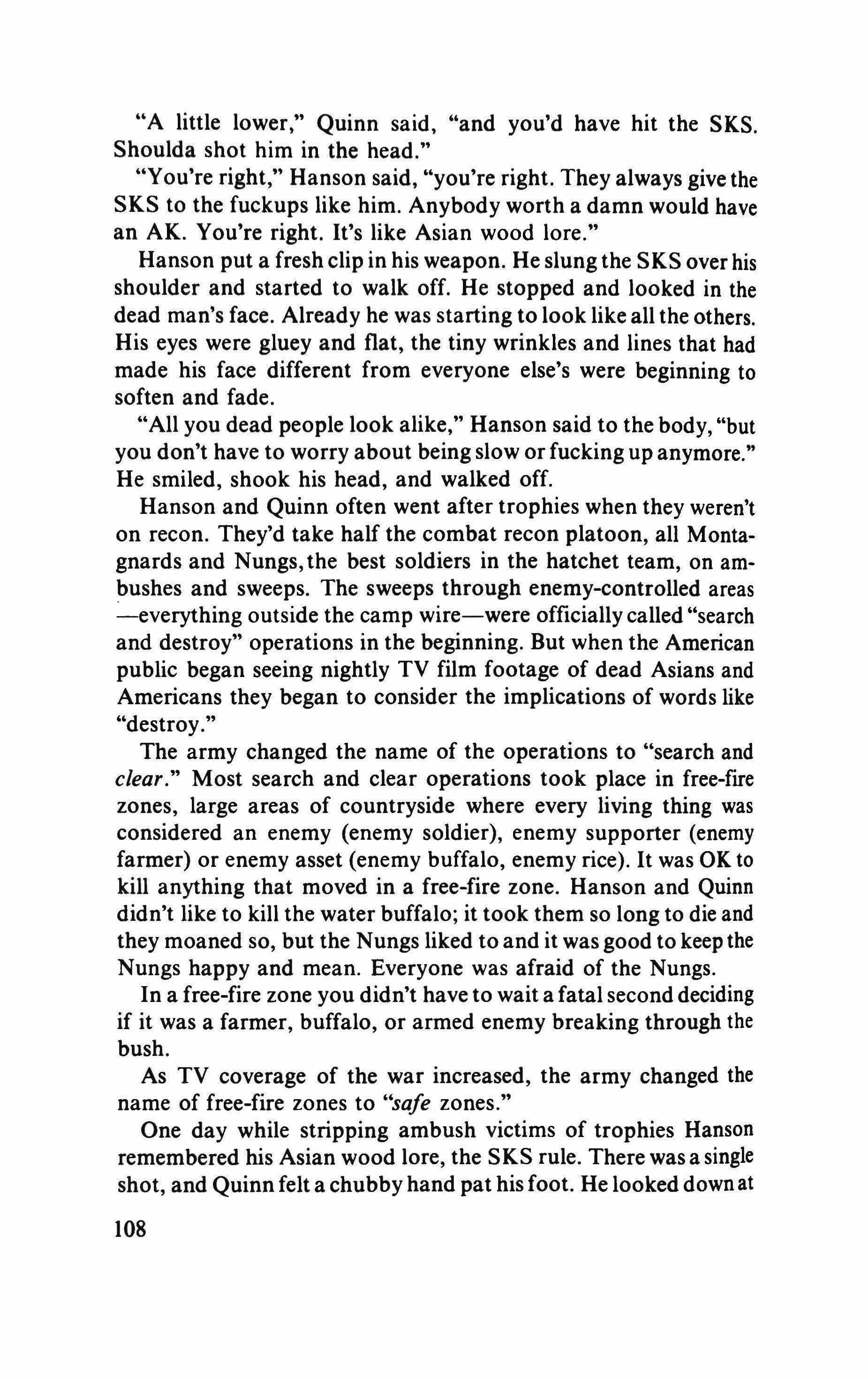
"A little lower," Quinn said, "and you'd have hit the SKS. Shoulda shot him in the head."
"You're right," Hanson said, "you're right. They always give the SKS to the fuckups like him. Anybody worth a damn would have an AK. You're right. It's like Asian wood lore."
Hanson put a fresh clip in his weapon. He slung the SKS over his shoulder and started to walk off. He stopped and looked in the dead man's face. Already he was starting to look like all the others. His eyes were gluey and flat, the tiny wrinkles and lines that had made his face different from everyone else's were beginning to soften and fade.
"All you dead people look alike," Hanson said to the body, "but you don't have to worry about being slow or fucking up anymore." He smiled, shook his head, and walked off.
Hanson and Quinn often went after trophies when they weren't on recon. They'd take half the combat recon platoon, all Mentagnards and Nungs, the best soldiers in the hatchet team, on ambushes and sweeps. The sweeps through enemy-controlled areas :'_everything outside the camp wire-were officially called "search and destroy" operations in the beginning. But when the American public began seeing nightly TV film footage of dead Asians and Americans they began to consider the implications of words like "destroy.
The army changed the name of the operations to "search and clear." Most search and clear operations took place in free-fire zones, large areas of countryside where every living thing was considered an enemy (enemy soldier), enemy supporter (enemy farmer) or enemy asset (enemy buffalo, enemy rice). It was OK to kill anything that moved in a free-fire zone. Hanson and Quinn didn't like to kill the water buffalo; it took them so long to die and they moaned so, but the Nungs liked to and it was good to keep the Nungs happy and mean. Everyone was afraid of the Nungs.
In a free-fire zone you didn't have to wait a fatal second deciding if it was a farmer, buffalo, or armed enemy breaking through the bush.
As TV coverage of the war increased, the army changed the name of free-fire zones to "safe zones."
One day while stripping ambush victims of trophies Hanson remembered his Asian wood lore, the SKS rule. There was a single shot, and Quinn felt a chubby hand pat his foot. He looked down at

the flap of brain stuck to his boot, then thrust his foot out and studied it like the ugliest girl in Iowa coyly looking at her new party shoe. With a scholarly frown he said, "Humm. I wonder what he's thinking about right now."
"That's a Nine-O Nine-O. At least. Very nice. Performance and degree of difficulty," Hanson said.
Quinn beamed.
While the recon platoon set up a defensive perimeter, Hanson, Quinn, and Silver would go among the dead, rolling the bodies over, cursing some and praising others for their clothes and equipment.
An officer's pith helmet with an enameled red star was a $50.00 item. An officer's belt buckle, recycled aluminum from American bombs with an enameled red star, would go for $75.00. A buckle without the star was worth half that. They had to fill in with Montagnard crossbows, plain pith helmets, jungle hats, and the NVA battle flags that Co Ba and her daughter made.
There were occasional novelty items. Hanson once found a Red Chinese copy of a Scripto fountain pen on a dead lieutenant. It had the word SCRIPTO on the nib. The engraving on the side exhorted the dead 2d Lt. to STEADFASTLY ATTACK AND DESTROY ALL AMERICAN IMPERIALISTS.
Hanson studied the engraving and pictured the engraver working on the pen, worrying that he would not have room to get the last word on the pen that was to be a gift to the young officer from his parents, thinking how wrong and terribly important even little things often seemed.
Cheaper items like plain pith helmets brought much more money if you shot a hole in them and sprinkled them with some chicken blood, but it wasn't wise to do that too often. Not that it mattered so much that the buyer might suspect that it wasn't human blood-an authentic result of a soldier having his head blown open-it was simply a matter of economics. Too many of them on the market would lower the price.
It was almost five and the bar was filling up. Janis Joplin was wailing from thejukebox, "So comeoncomeonCOMEONCOMEON an' TAKE IT, YEOW! if it makesyoufeelgood
Only two soldiers in the bar were wearing camouflage fatigues. They had gotten off a chopper from the north only ten minutes

before. Standing together at the slate-topped bar they looked like two reflections of the same soldier. The baggyjungle fatigues were mottled and striped to blend with the jungle, the dead browns and greens of healing bruises or of a body left too long in the sun. The backs of their hands were crosshatched with small scars and bloodcrusted welts. The fine blond hair on the backs of their hands and wrists had been burned to brown stubble over hurried cookfires. They both had an easy, tireless concentration. But they were not at all alike.
Quinn was much bigger than Hanson. He was bigger than anyone else in the bar. His features were as small and blunt as his eyes. It was a face that could take a lot ofdamage and still function. He rarely smiled. When he did smile it was not a comforting expression.
He'd been a linebacker in college until he'd gotten into a fight. During the fight the crowd that had gathered, laughing, shouting, and making bets, slowly quieted as Quinn worked with the same cold rage that filled him when he chopped wood, or stacked bales of hay on his father's farm, that drove him to study the textbooks full of useless facts that got him off the farm and into college where five afternoons a week and every Saturday he would trade blow for blow with others like himself for the entertainment of the same people who were silently watching him outside the bar.
Quinn had stepped back, letting the semiconscious man fall to the ground, kicked him once, viciously, in the ribs, and walked away.
"That was the night," Quinn had told Hanson, "I realized I'd been doing shit I hated all my life. I hated the farm, I hated those goddamn books, and I hated football. I didn't want to tackle those motherfuckers, I wanted to kill 'em. Of course, three months later, three months after I stopped hurting quarterbacks and ends as bad as I could-blindsiding running backs right out ofthe game, while those college wimps up in the stands held their weenies, and their beer, and their date's tit-three months later the army had my ass."
Quinn smiled when he told that story.
Quinn finished his Budweiser and looked at Hanson in the big bar mirror. "You'll be back ," he began.
"Do me a favor. Shoot me in the head when I step offthe plane, OK? Save me the trouble of humpin' waiting for Charles to do it."
"You'll be back. You know those killer guard-dogs the zoomies
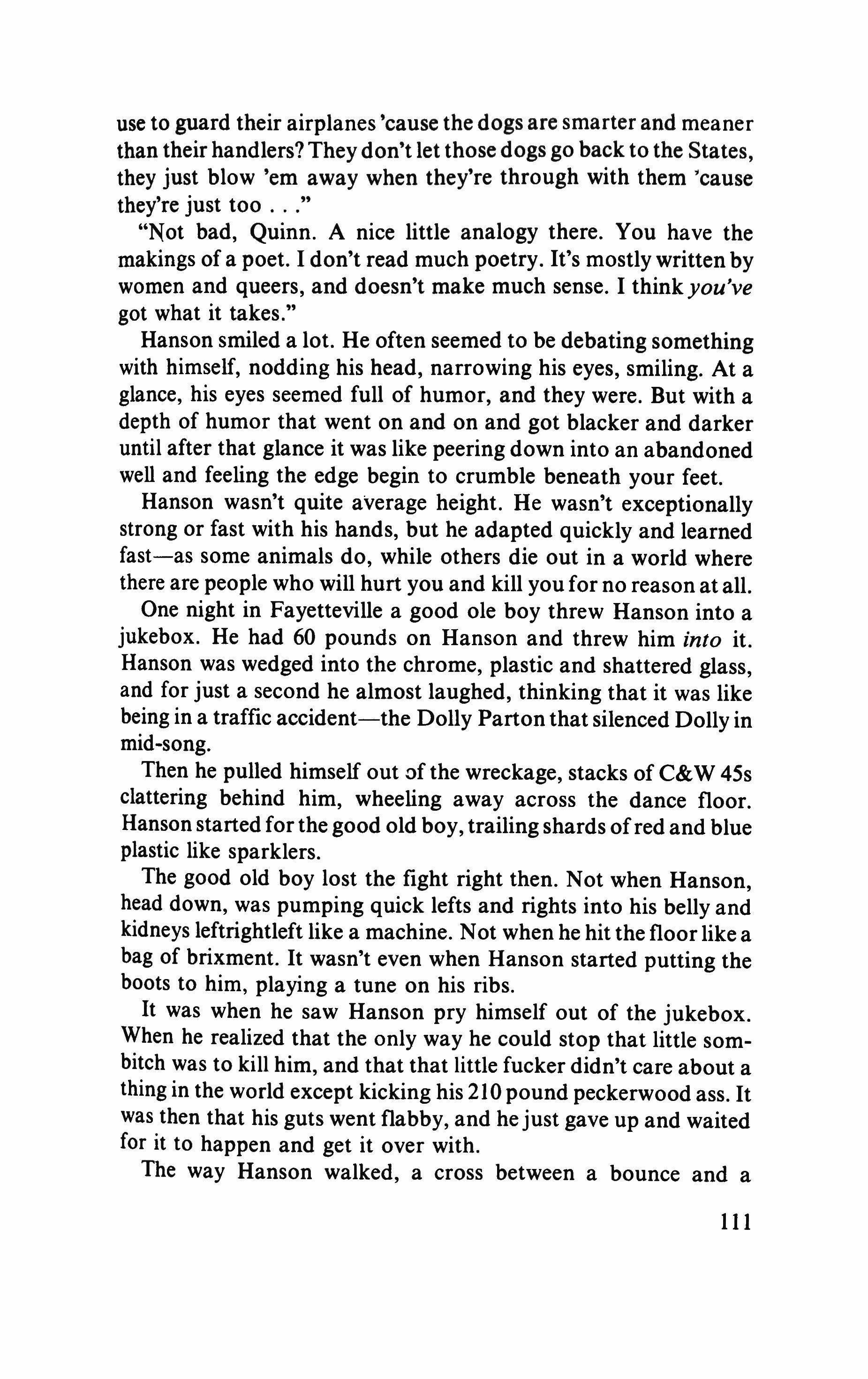
use to guard their airplanes 'cause the dogs are smarter and meaner than their handlers? They don't let those dogs go back to the States, they just blow 'em away when they're through with them 'cause they're just too
"Not bad, Quinn. A nice little analogy there. You have the makings of a poet. I don't read much poetry. It's mostly written by women and queers, and doesn't make much sense. I think you've got what it takes."
Hanson smiled a lot. He often seemed to be debating something with himself, nodding his head, narrowing his eyes, smiling. At a glance, his eyes seemed full of humor, and they were. But with a depth of humor that went on and on and got blacker and darker until after that glance it was like peering down into an abandoned well and feeling the edge begin to crumble beneath your feet.
Hanson wasn't quite average height. He wasn't exceptionally strong or fast with his hands, but he adapted quickly and learned fast-as some animals do, while others die out in a world where there are people who will hurt you and kill you for no reason at all.
One night in Fayetteville a good ole boy threw Hanson into a jukebox. He had 60 pounds on Hanson and threw him into it. Hanson was wedged into the chrome, plastic and shattered glass, and for just a second he almost laughed, thinking that it was like being in a traffic accident-the Dolly Parton that silenced Dolly in mid-song.
Then he pulled himself out of the wreckage, stacks of C&W 45s clattering behind him, wheeling away across the dance floor. Hanson started for the good old boy, trailing shards ofred and blue plastic like sparklers.
The good old boy lost the fight right then. Not when Hanson, head down, was pumping quick lefts and rights into his belly and kidneys leftrightleft like a machine. Not when he hit the floor like a bag of brixment. It wasn't even when Hanson started putting the boots to him, playing a tune on his ribs.
It was when he saw Hanson pry himself out of the jukebox. When he realized that the only way he could stop that little sombitch was to kill him, and that that little fucker didn't care about a thing in the world except kicking his 210 pound peckerwood ass. It was then that his guts went flabby, and he just gave up and waited for it to happen and get it over with.
The way Hanson walked, a cross between a bounce and a
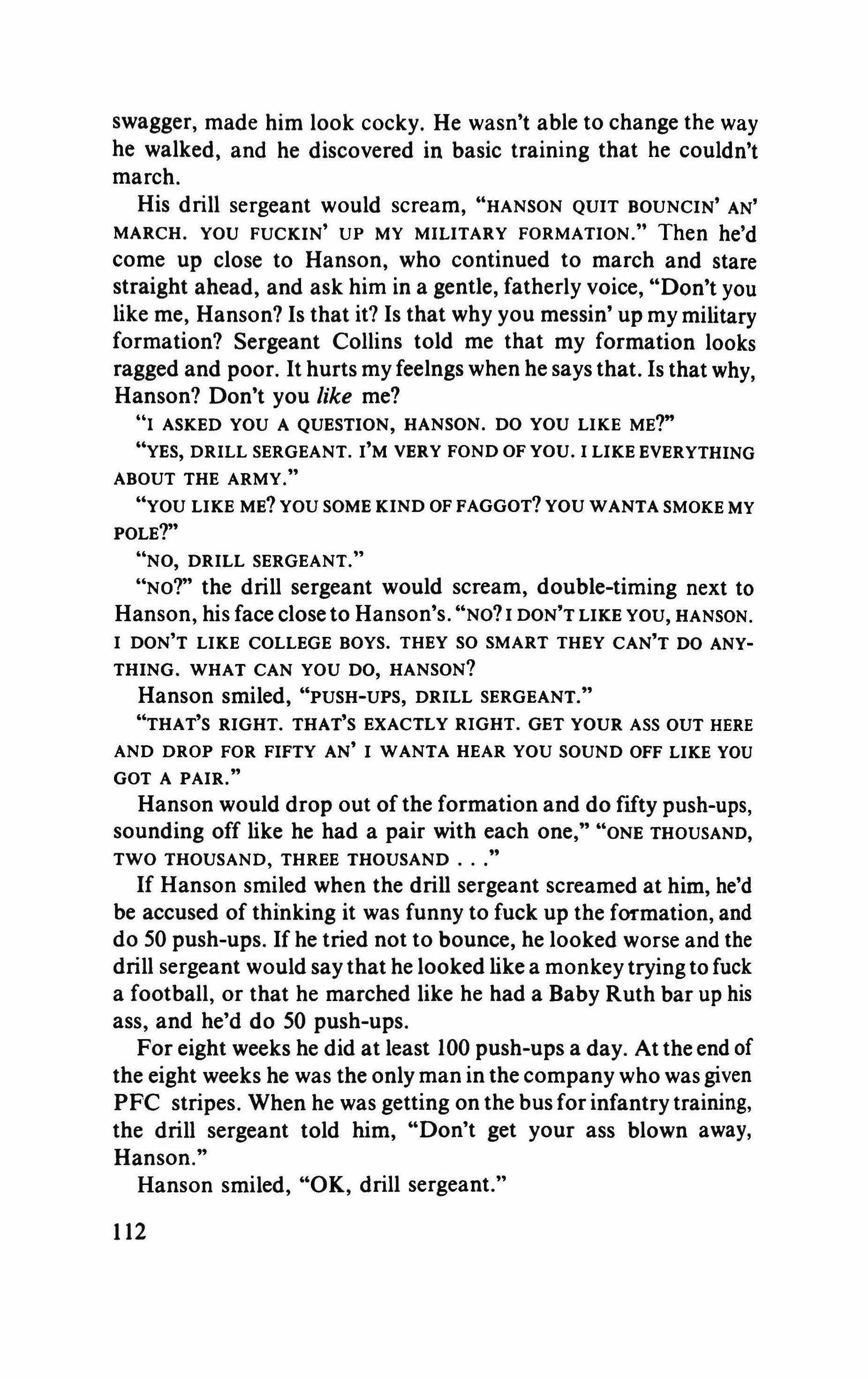
swagger, made him look cocky. He wasn't able to change the way he walked, and he discovered in basic training that he couldn't march.
His drill sergeant would scream, "HANSON QUIT BOUNCIN' AN' MARCH. YOU FUCKIN' UP MY MILITARY FORMATION." Then he'd come up close to Hanson, who continued to march and stare straight ahead, and ask him in a gentle, fatherly voice, "Don't you like me, Hanson? Is that it? Is that why you messin' up my military formation? Sergeant Collins told me that my formation looks ragged and poor. It hurts my feelngs when he says that. Is that why, Hanson? Don't you like me?
"I ASKED YOU A QUESTION, HANSON. DO YOU LIKE ME?"
"YES, DRILL SERGEANT. I'M VERY FOND OF YOU. I LIKE EVERYTHING ABOUT THE ARMY."
"YOU LIKE ME? YOU SOME KIND OF FAGGOT? YOU WANTA SMOKE MY POLE?"
"NO, DRILL SERGEANT."
"NO?" the drill sergeant would scream, double-timing next to Hanson, his face close to Hanson's. "NO? I DON'T LIKE YOU, HANSON. I DON'T LIKE COLLEGE BOYS. THEY SO SMART THEY CAN'T DO ANYTHING. WHAT CAN YOU DO, HANSON?
Hanson smiled, "PUSH-UPS, DRILL SERGEANT."
"THAT'S RIGHT. THAT'S EXACTLY RIGHT. GET YOUR ASS OUT HERE AND DROP FOR FIFTY AN' I WANTA HEAR YOU SOUND OFF LIKE YOU GOT A PAIR."
Hanson would drop out of the formation and do fifty push-ups, sounding off like he had a pair with each one," "ONE THOUSAND, TWO THOUSAND, THREE THOUSAND
If Hanson smiled when the drill sergeant screamed at him, he'd be accused of thinking it was funny to fuck up the formation, and do 50 push-ups. If he tried not to bounce, he looked worse and the drill sergeant would say that he looked like a monkeytrying to fuck a football, or that he marched like he had a Baby Ruth bar up his ass, and he'd do 50 push-ups.
For eight weeks he did at least 100 push-ups a day. At the end of the eight weeks he was the only man in the company who was given PFC stripes. When he was getting on the bus for infantry training, the drill sergeant told him, "Don't get your ass blown away, Hanson."
Hanson smiled, "OK, drill sergeant."
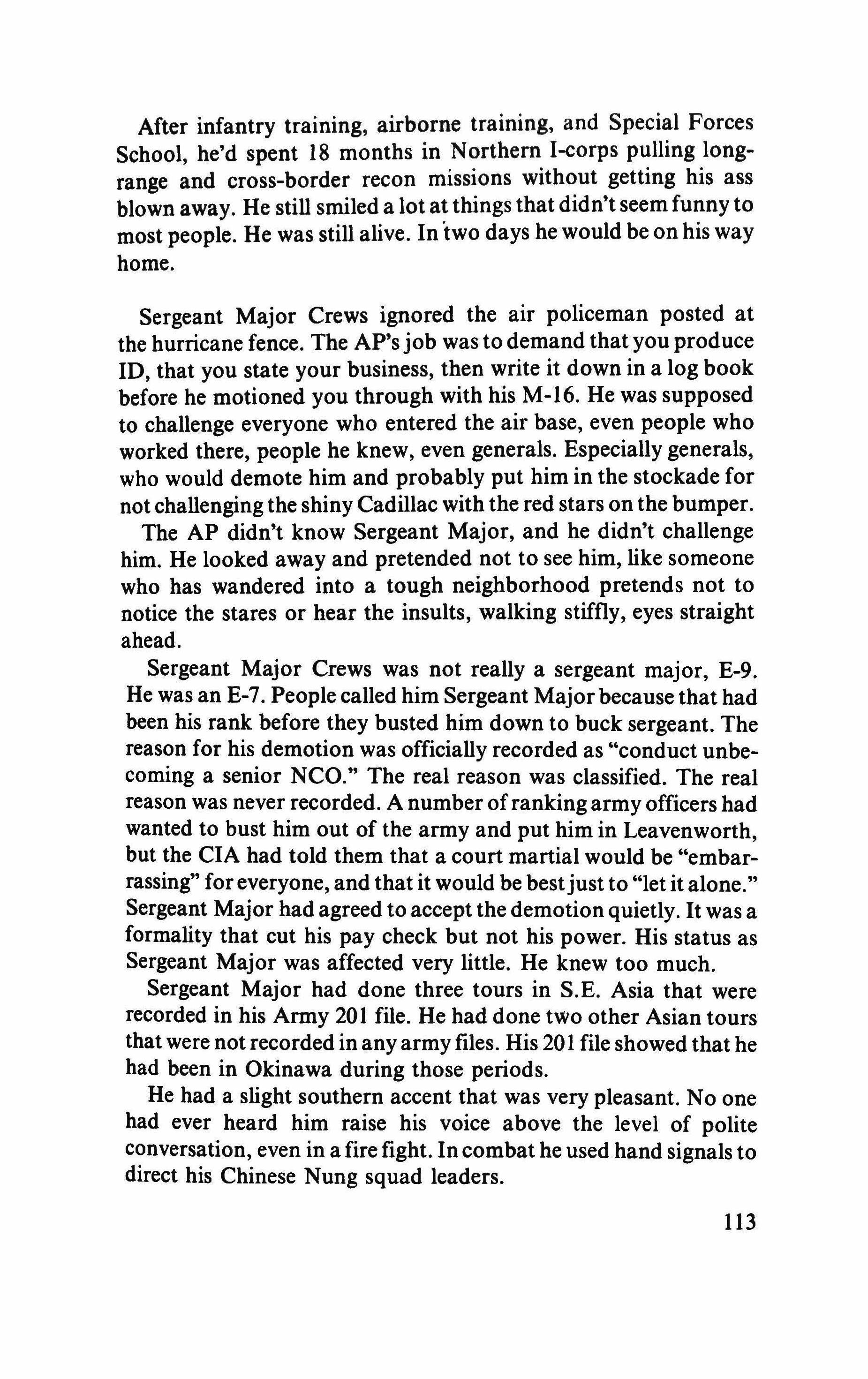
After infantry training, airborne training, and Special Forces School, he'd spent 18 months in Northern I-corps pulling longrange and cross-border recon missions without getting his ass blown away. He still smiled a lot at things that didn't seem funny to most people. He was still alive. In 'two days he would be on his way home.
Sergeant Major Crews ignored the air policeman posted at the hurricane fence. The AP's job was to demand that you produce ID, that you state your business, then write it down in a log book before he motioned you through with his M-16. He was supposed to challenge everyone who entered the air base, even people who worked there, people he knew, even generals. Especially generals, who would demote him and probably put him in the stockade for not challenging the shiny Cadillac with the red stars on the bumper. The AP didn't know Sergeant Major, and he didn't challenge him. He looked away and pretended not to see him, like someone who has wandered into a tough neighborhood pretends not to notice the stares or hear the insults, walking stiffly, eyes straight ahead.
Sergeant Major Crews was not really a sergeant major, E-9. He was an E-7. People called him Sergeant Major because that had been his rank before they busted him down to buck sergeant. The reason for his demotion was officially recorded as "conduct unbecoming a senior NCO." The real reason was classified. The real reason was never recorded. A number ofranking army officers had wanted to bust him out of the army and put him in Leavenworth, but the CIA had told them that a court martial would be "embarrassing" for everyone, and that it would be bestjust to "let it alone." Sergeant Major had agreed to accept the demotion quietly. It was a formality that cut his pay check but not his power. His status as Sergeant Major was affected very little. He knew too much.
Sergeant Major had done three tours in S.E. Asia that were recorded in his Army 201 file, He had done two other Asian tours that were not recorded in any army files. His 201 file showed that he had been in Okinawa during those periods. He had a slight southern accent that was very pleasant. Noone had ever heard him raise his voice above the level of polite conversation, even in a fire fight. In combat he used hand signals to direct his Chinese Nung squad leaders.

There was a knotted rope of scar around Sergeant Major's ankles, like someone who has worn leg irons for years on a chain gang. All the old S.E. Asia hands had the ankle scars. They were from the leeches.
Inside the air force base was the headquarters of the NCO in charge of routing supplies from the giant Da Nang warehouse complex to smaller camps in I-corps. The NCO saw that food and supplies were loaded on the cargo planes, inventoried, and balanced out in the books. The officers and enlisted men who worked with him stayed only one year, then were replaced by others interested only in doing their year and going home.
The Senior Supply NCO was big and smart and ruthless. He had been in Vietnam for four years in charge ofsupply. Each year's new batch of supply personnel knew only what the Senior NCO wanted them to know. As long as they cooperated with him, they had a pleasant year away from the fighting. But ifanyone beganchecking manifests too closely, or asking too many questions, life became difficult for them; their inventory began coming up short, their civilian labor force began breaking or misrouting things, or not showing up for work. As a result, they were not promoted, and they were sent home with bad efficiency reports.
The Senior Supply NCO had highly-placed Vietnamese friends who owed him favors. He had large bank accounts in several states back home.
His office was an olive drab mobile home. Inside, it looked like that office tucked way back on the two-acre lot ofgleamingsinglewides and wood-grain and chrome double-wides, the office where you take the wife to close the deal. It was air-conditioned, carpeted and richly furnished. The handsome walnut liquor cabinet had been manifested for a major general in 1966, but had been misrouted, along with the sectional sofa.
The Supply NCO had a pretty Vietnamese secretary. She was more than pretty, she was perfect. Like a doll. He had paid for the operation that had removed the Oriental eye-folds so she would look more American, a "round eye." He had sent her to Japan to get the silicone injections in her breasts. She was wearing a miniskirt and spike heels that had been ordered from Los Angeles.
"Sergeant Major," the Supply NCO said, with the warmth of a
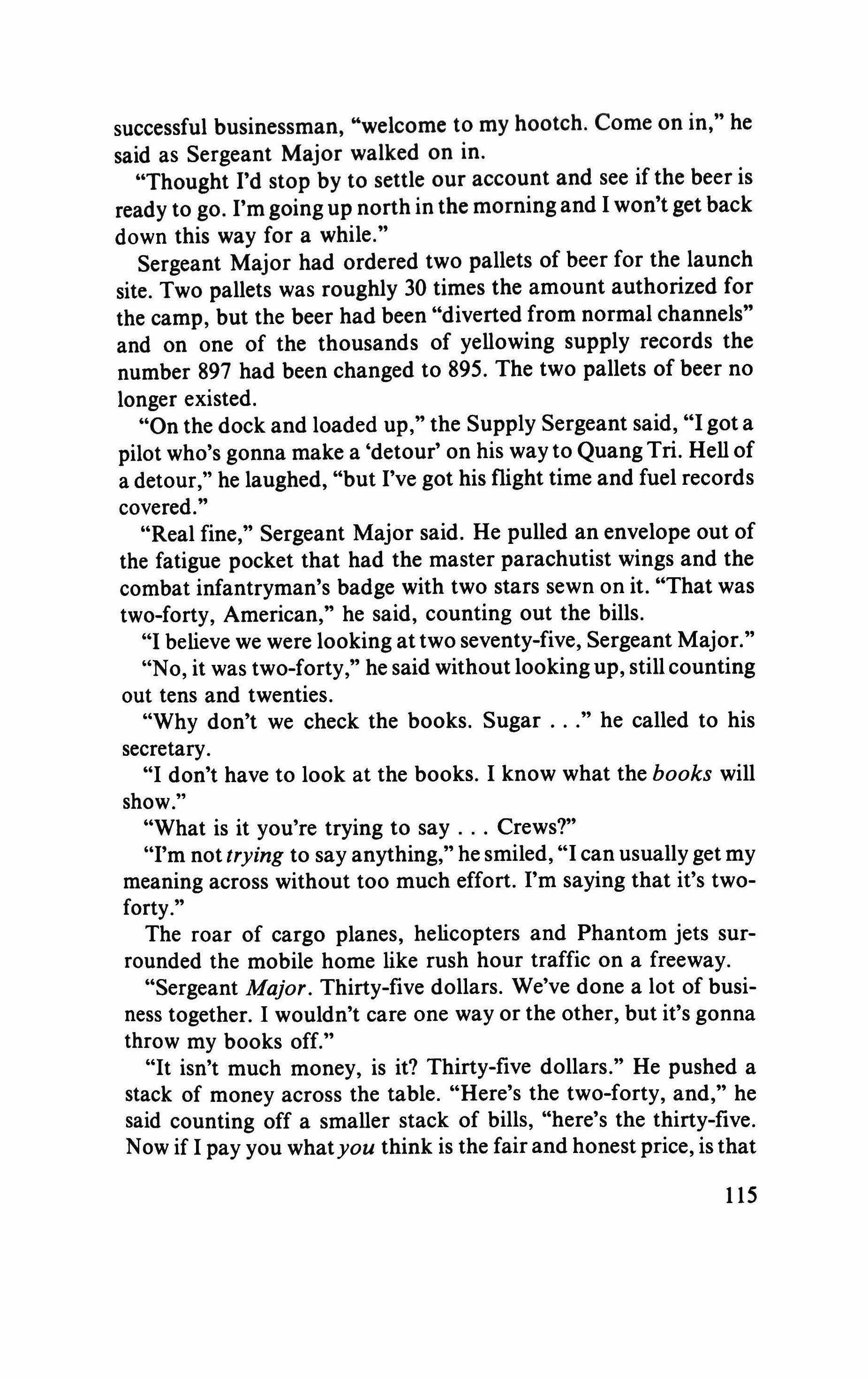
successful businessman, "welcome to my hootch. Come on in," he said as Sergeant Major walked on in.
"Thought I'd stop by to settle our account and see if the beer is ready to go. I'm going up north in the morning and 1 won't get back down this way for a while."
Sergeant Major had ordered two pallets of beer for the launch site. Two pallets was roughly 30 times the amount authorized for the camp, but the beer had been "diverted from normal channels" and on one of the thousands of yellowing supply records the number 897 had been changed to 895. The two pallets of beer no longer existed.
"On the dock and loaded up," the Supply Sergeant said, "I got a pilot who's gonna make a 'detour' on his way to Quang Tri. Hell of a detour," he laughed, "but I've got his flight time and fuel records covered."
"Real fine," Sergeant Major said. He pulled an envelope out of the fatigue pocket that had the master parachutist wings and the combat infantryman's badge with two stars sewn on it. "That was two-forty, American," he said, counting out the bills.
"I believe we were looking at two seventy-five, Sergeant Major."
"No, it was two-forty," he said without looking up, still counting out tens and twenties.
"Why don't we check the books. Sugar he called to his secretary.
"I don't have to look at the books. I know what the books will show."
"What is it you're trying to say Crews?"
"I'm not trying to say anything," he smiled, "I can usuallyget my meaning across without too much effort. I'm saying that it's twoforty."
The roar of cargo planes, helicopters and Phantom jets surrounded the mobile home like rush hour traffic on a freeway.
"Sergeant Major. Thirty-five dollars. We've done a lot of business together. I wouldn't care one way or the other, but it's gonna throw my books off."
"It isn't much money, is it? Thirty-five dollars." He pushed a stack of money across the table. "Here's the two-forty, and," he said counting off a smaller stack of bills, "here's the thirty-five. Now if I pay you whatyou think is the fair and honest price, is that 115
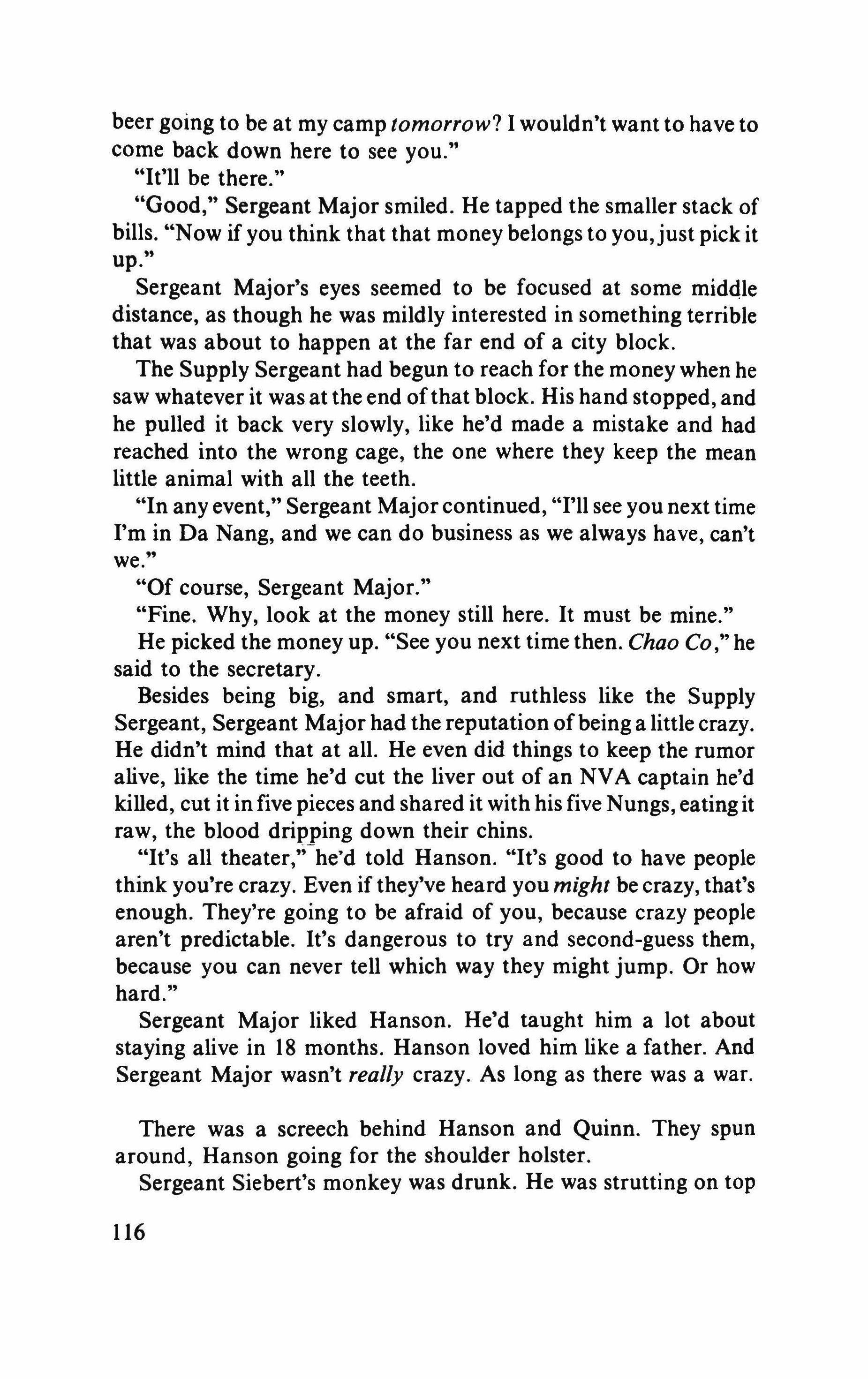
beer going to be at my camp tomorrow? I wouldn't want to have to come back down here to see you."
"It'll be there."
"Good," Sergeant Major smiled. He tapped the smaller stack of bills. "Now if you think that that money belongs to you,just pick it up."
Sergeant Major's eyes seemed to be focused at some middle distance, as though he was mildly interested in something terrible that was about to happen at the far end of a city block.
The Supply Sergeant had begun to reach for the money when he saw whatever it was at the end ofthat block. His hand stopped, and he pulled it back very slowly, like he'd made a mistake and had reached into the wrong cage, the one where they keep the mean little animal with all the teeth.
"In any event," Sergeant Majorcontinued, "I'll see you next time I'm in Da Nang, and we can do business as we always have, can't we."
"Of course, Sergeant Major."
"Fine. Why, look at the money still here. It must be mine."
He picked the money up. "See you next time then. Chao Co," he said to the secretary.
Besides being big, and smart, and ruthless like the Supply Sergeant, Sergeant Major had the reputation ofbeing a little crazy. He didn't mind that at all. He even did things to keep the rumor alive, like the time he'd cut the liver out of an NVA captain he'd killed, cut it in five pieces and shared it with his five Nungs, eating it raw, the blood dripping down their chins.
"It's all theater," he'd told Hanson. "It's good to have people think you're crazy. Even if they've heard you might be crazy, that's enough. They're going to be afraid of you, because crazy people aren't predictable. It's dangerous to try and second-guess them, because you can never tell which way they might jump. Or how hard."
Sergeant Major liked Hanson. He'd taught him a lot about staying alive in 18 months. Hanson loved him like a father. And Sergeant Major wasn't really crazy. As long as there was a war.
There was a screech behind Hanson and Quinn. They spun around, Hanson going for the shoulder holster.
Sergeant Siebert's monkey was drunk. He was strutting on top
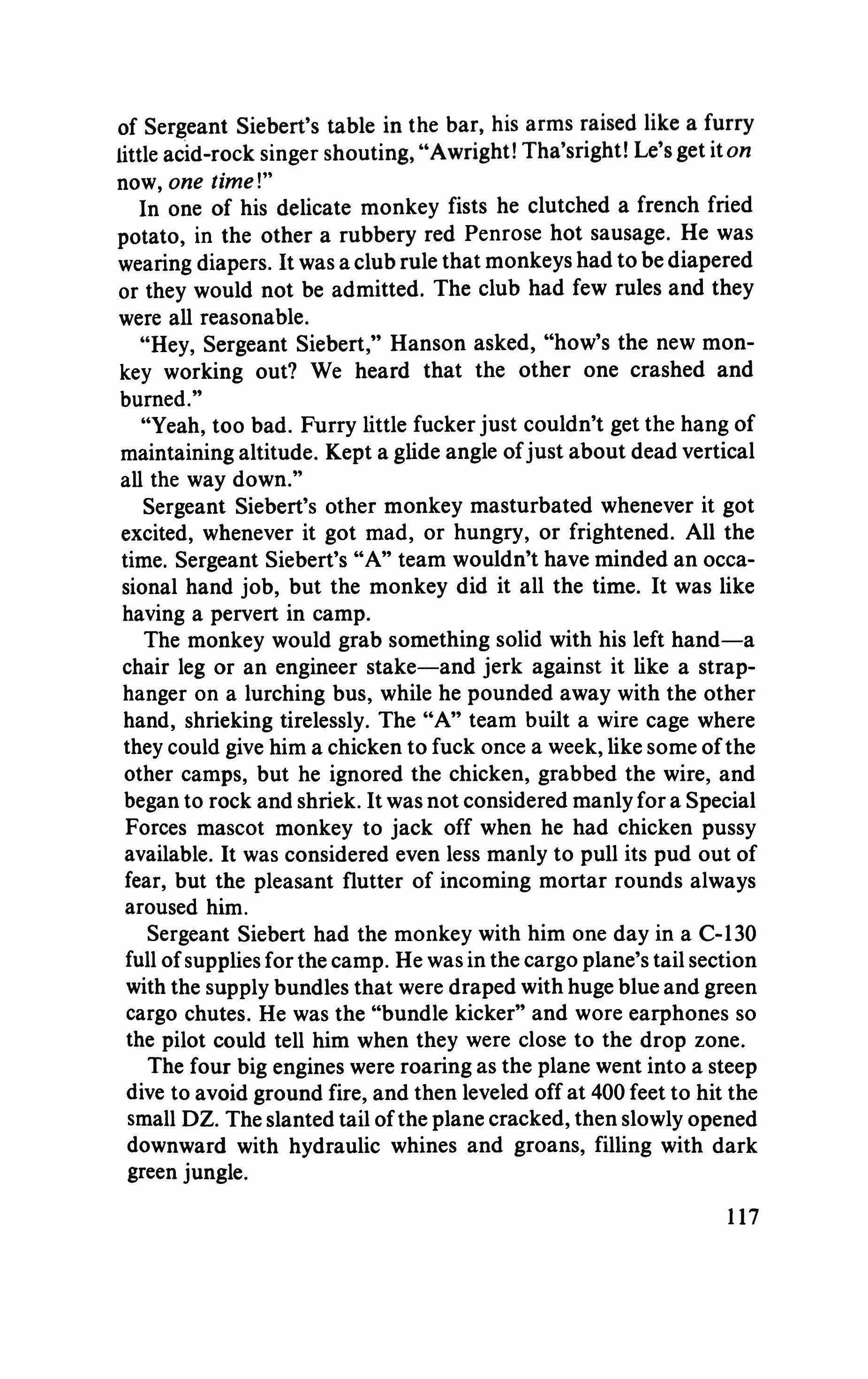
of Sergeant Siebert's table in the bar, his arms raised like a furry little acid-rock singer shouting, "Awright! Tha'sright! Le's get iton now, one time!"
In one of his delicate monkey fists he clutched a french fried potato, in the other a rubbery red Penrose hot sausage. He was wearing diapers. It was a club rule that monkeys had to be diapered or they would not be admitted. The club had few rules and they were all reasonable.
"Hey, Sergeant Siebert," Hanson asked, "how's the new monkey working out? We heard that the other one crashed and burned."
"Yeah, too bad. Furry little fucker just couldn't get the hang of maintaining altitude. Kept a glide angle ofjust about dead vertical all the way down."
Sergeant Siebert's other monkey masturbated whenever it got excited, whenever it got mad, or hungry, or frightened. All the time. Sergeant Siebert's"A" team wouldn't have minded an occasional hand job, but the monkey did it all the time. It was like having a pervert in camp.
The monkey would grab something solid with his left hand-a chair leg or an engineer stake-and jerk against it like a straphanger on a lurching bus, while he pounded away with the other hand, shrieking tirelessly. The "A" team built a wire cage where they could give him a chicken to fuck once a week, like some ofthe other camps, but he ignored the chicken, grabbed the wire, and began to rock and shriek. It was not considered manly for a Special Forces mascot monkey to jack off when he had chicken pussy available. It was considered even less manly to pull its pud out of fear, but the pleasant flutter of incoming mortar rounds always aroused him.
Sergeant Siebert had the monkey with him one day in a C-130 full ofsupplies for the camp. He was in the cargo plane's tail section with the supply bundles that were draped with huge blue and green cargo chutes. He was the "bundle kicker" and wore earphones so the pilot could tell him when they were close to the drop zone.
The four big engines were roaring as the plane went into a steep dive to avoid ground fire, and then leveled off at 400 feet to hit the small DZ. The slanted tail ofthe plane cracked, then slowly opened downward with hydraulic whines and groans, filling with dark green jungle.
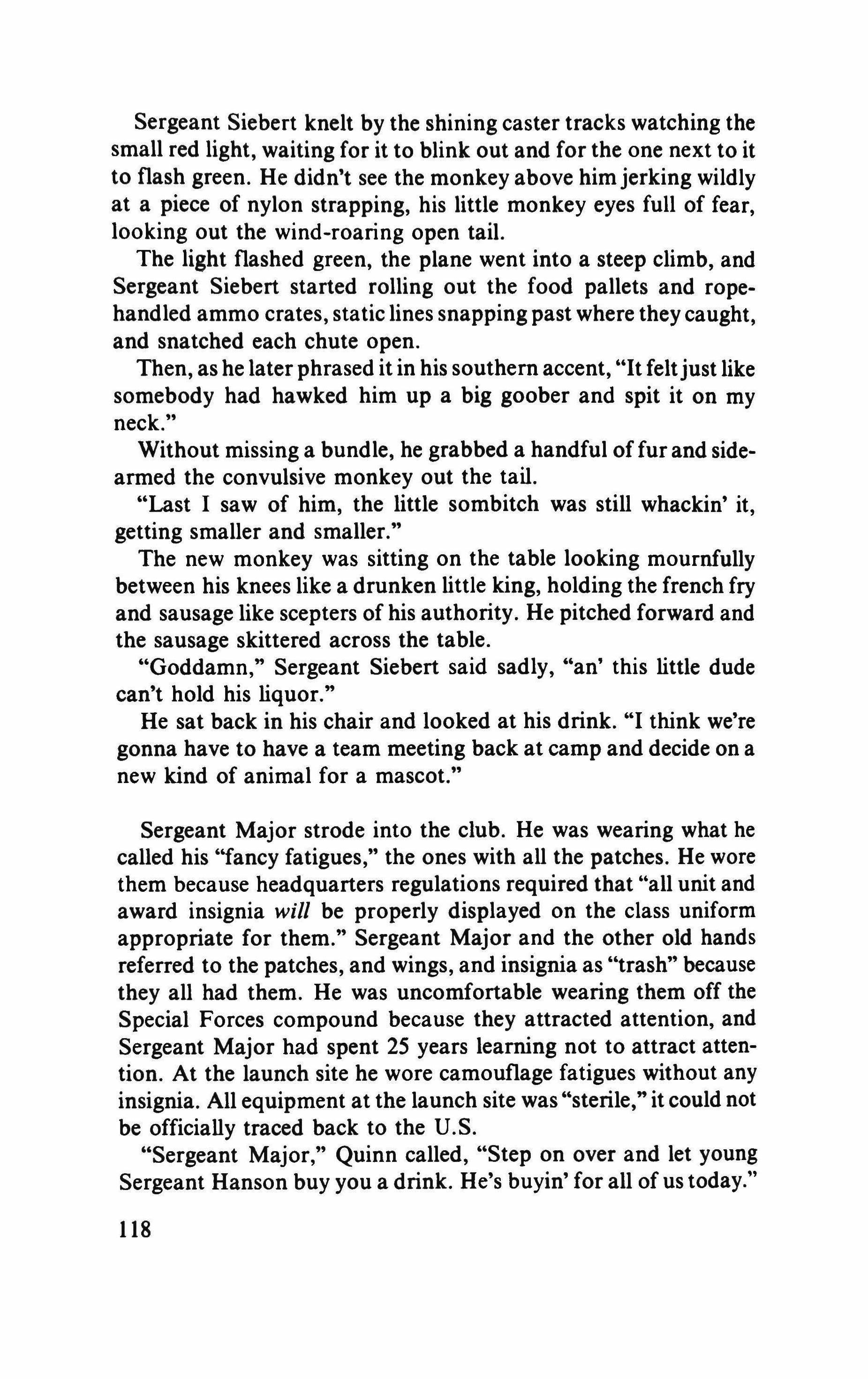
Sergeant Siebert knelt by the shining caster tracks watching the small red light, waiting for it to blink out and for the one next to it to flash green. He didn't see the monkey above himjerking wildly at a piece of nylon strapping, his little monkey eyes full of fear, looking out the wind-roaring open tail.
The light flashed green, the plane went into a steep climb, and Sergeant Siebert started rolling out the food pallets and ropehandled ammo crates, static lines snapping past where theycaught, and snatched each chute open.
Then, as he later phrased it in his southern accent, "It feltjust like somebody had hawked him up a big goober and spit it on my neck."
Without missing a bundle, he grabbed a handful of fur and sidearmed the convulsive monkey out the tail.
"Last I saw of him, the little sombitch was still whackin' it, getting smaller and smaller."
The new monkey was sitting on the table looking mournfully between his knees like a drunken little king, holding the french fry and sausage like scepters of his authority. He pitched forward and the sausage skittered across the table.
"Goddamn," Sergeant Siebert said sadly, "an' this little dude can't hold his liquor."
He sat back in his chair and looked at his drink. "I think we're gonna have to have a team meeting back at camp and decide on a new kind of animal for a mascot."
Sergeant Major strode into the club. He was wearing what he called his "fancy fatigues," the ones with all the patches. He wore them because headquarters regulations required that "all unit and award insignia will be properly displayed on the class uniform appropriate for them." Sergeant Major and the other old hands referred to the patches, and wings, and insignia as "trash" because they all had them. He was uncomfortable wearing them off the Special Forces compound because they attracted attention, and Sergeant Major had spent 25 years learning not to attract attention. At the launch site he wore camouflage fatigues without any insignia. All equipment at the launch site was "sterile," it could not be officially traced back to the U.S.
"Sergeant Major," Quinn called, "Step on over and let young Sergeant Hanson buy you a drink. He's buyin' for all of us today."

"Well, now, I'll do that. Make mine a Bushmill."
They took their drinks to a table, and Sergeant Majorsaid, "Ah, trooper Hanson, you wouldn't listen. Giving up the military for a world of slack-jawed out-of-step civilians who have absolutely no supervision, They're going to be everywhere, and they can't even cross a street without having a light flash on telling them to 'walk.
He took a sip of Bushmill, looked at Hanson, and said, "And here I had plans to mold you in my own image."
They sipped their drinks for a moment, then Quinn slapped his hand against the back of Hanson's chair and said, "And who's gonna be the camp intellectual when you're gone?"
Hanson grinned, "Lieutenant Farr. He outranks me, and he has superior intellectual credentials as well. The man has a master's degree, Quinn."
Quinn laughed. "Farr pulled rank on him once because he was losing an argument in front of the captain. They were arguing about Farr's-what's that fuckin' thing, my man?"
"Thesis," Hanson said.
"Yeah. Thesis. Parr's own specialty. He was goin' down the tube in front of the captain, and he had to pull rank to keep from lookin' like the dud he is. What was that argument about, anyway?"
"I don't know," Hanson said. "I didn't know what he was talking about. Some kind of Sociology, I think. One of them 'Ology's.' Psychology, Criminology, one of those. It's a good deal, you get to be an expert on something without ever having to do it. The Ology field is wide open-Warology, an exciting old field of scholarship combined with stimulating new methodology. Peaceology can be taken before or after warology in the intensive humanities interdisciplinary program. A lot of specialties there. Bulletology, gunology, computer body-count readout. Dead-gookology-there is a language requirement there-but dead gruntology is a similarly structured program and requires only a minimum GRE score plus three letters of introduction and a sincere interest in the field."
"That dipshit Farr," Quinn snarled, "he ain't never gonna make 1st Lieutenant, he's gonna die in grade. He can't talk and think at the same time. That saying 'he don't know whether to shit or go blind,' that's Farr."
"I told you, Quinn, he's an Ologist. They gotta be like that. They spend years learning to transform life into theory, then apply their theory to life. It's hard, Quinn, it's very difficult to do that because

things start getting self-contradictory and incomplete; your statistics don't check out and you gotta keep throwing them back into the computer. It'shard. So the best way to keep from going crazygetting rashes and pimples, swollen glands, limp dick-you gotta keep from paying too much attention to what's going on, from the raw scores."
"My man," Quinn said proudly, "you're really full of shit."
Sergeant Major smiled his pleasant fatherly smile. Hanson and Quinn were his best recon team leaders. When he'd first seen them at the launch site he'd thought it would work out that way. He could usually tell; he'd processed enough of them through, and done enough paperwork on the dead ones. He could usually tell now.
Quinn was tough, good and mean, but he'd never have been more than just competent on recon if Sergeant Major hadn't put him with Hanson. Some of Hanson's craziness rubbed off on Quinn, and that was what had made the team so good.
More often than not, Sergeant Major thought, the crazy ones lived through it, even though they took chances that made you think they were trying to get killed. The crazy ones like Hanson killed a lot of Communists, and brought back a lot of good intelligence. And they were always the ones who knew,just as well as Sergeant Major did, that none of it mattered at all.
The heavy web gear slung over Quinn's left shoulder swung up, then back as he walked. He carried the Swedish "K" in his right hand, the fat silencer a dull black. He was wearing his camouflage fatigues and a floppy brown jungle hat he had taken off a dead NVA. They were better than the American-issue hats; they had a plastic insert that kept the rain out, but they were dangerous to wear if gunships were working the area.
Hanson looked like a child next to him in Levis and a green T-shirt. He was singing softly, trying to sound like Dylan, "John Wesley Hardin' was a friend to the poor, well he ta-raveled with a gun in evree hand
"Charlie McCoy," Hanson thought, "damn it, that's right. That's who plays bass on that. Those tight little drum riffs are nice, too."
The PFC radio repairman didn't notice Quinn and Hanson approaching. He was watching his baby ducks. He'd bought them from a woman in Da Nang City, paying her 20 times what they 120

were worth, smiling and telling her, "Thank you, mama-san." She'd smiled back with her black teeth, hating him, and that had made the PFC happy for the rest of the day.
He didn't know he'd been cheated, but it wouldn't have mattered if he had known. He was used to being fucked over. He was big, pudgy, and awkward. He was very pale and his stiffblack hair grew out in tufts. At a glance there seemed to be something "wrong" about him, the kind ofoversize boy who always wore a slide rule on his belt in high school, and had no friends.
The five yellow ducklings were swimming in the Rubbermaid dishpan he'd bought at the PX.
"The only part [like," Quinn slapped the "K" into his left hand, crouched like a bowler as he swept a duckling from the water, and rose gracefully without breaking strike, "is the head."
He bit down, pulled with a twist-the delicate, grinding crack like a precision machine under an enormous overload-and the body came away. He threw it carelessly over his shoulder, and the fuzzy wings twitched madly as though the ruined, bloody little bird refused to believe it was dead.
The PFC had the same bewildered look they always have in the newspaper photo under the headline: MASS KILLER SURRENDERS: FORMER TEACHER SAYS HE WAS BRILLIANT STUDENT.
Hanson listened to the erratic little brush and thump of the bird as they walked casually on.
When they were out of sight of the PFC's hootch, Hanson said, "The timing. Thepathos of it. I think we have a nine-five, maybe a nine-seven here as soon as you swallow it."
Quinn spit out the wide-eyed yellow head and laughed. "You'll be back. You won't get along with those people, my man. They have no appreciation for that kind of talent." He turned and began to walk away. "Well, I got a chopper to catch."
"Hey," Hanson said.
"Yeah?"
Hanson grabbed Quinn by the sleeves of his fatigues and began to shake him the way you'd shake a child you were angry with. QUinn's web gear rattled, grenades clackingagainst each other like pool balls.
"You son of a bitch," Hanson said, "you bastard. Watch your ass. You go out there and let some fool get you blown away, I'll kill you."

"No sweat, my man. I plan to skate till you get back. Have a nice airplane ride, sport."
Quinn turned and walked on.
Hanson walked down to the wide white beach. It was growing dawn. The black hills across the bay were going to be green soon. Dead gray waves began to flush pink and gold, risingendlesslyand patiently, crashing back into the surf.
Hanson heard a faint steady drumming. There was a black dot over the mouth of the bay, the perimeter gunship.
The door gunner in the perimeter ship was bored. It was like sitting in a windy open wall-locker a thousand feet in the air. The fat Huey helicopter had been circling the huge militarycomplex for four hours. For four hours he had been watching the dark beach. The other door gunner had been watching the dark ocean. The door gunners wore helmets with tinted bubble-faced shields that covered everything but their mouths. They wore thick, rigid ceramic flak vests that curved around their neck and chest. They looked like giant insects. The dead weight of the vest pulled and jerked on its shoulder straps each time the Huey banked around the perimeter.
In front of the door gunner, the M-60 machine gun hung barrel down, rocking slightly like an oar in an oarlock. The belted bullets draped down from the gun, folding into a box by the gunner's foot. He leaned out, into his seat harness, and looked down the beach. There was a single speck against the white sand. He pushed the chrome nubbin down into the black plastic handle, and spoke to the pilot through his helmet mike, "Hey, sir. Let's put herdown on the deck. Wake that stud up."
The pilot was bored, too. He was a Cobra gunship pilot who had come back to Vietnam for a second tour. They had assigned him to the perimeter ship until his orders for a Cobra unit came through. The Cobra is a fast attack helicopter; flying a Cobra was like driving a Corvette. The fat Huey was like a delivery van.
The paddle rotor blades that held the Huey in the air tilted alternately up and down as they spun, stabilizing the helicopter. When a pilot changes the angle of the blades, it is called "pulling pitch," and causes the chopper to go up, or down.
The Huey was a mass ofplastic and alloy steel held in the air by a precise balance and counterbalance of turbine and rotor blades. It

is almost impossible for a Huey to maintain an exact altitude when it is moving forward.
The pilot pulled pitch hard, and the Huey dropped like dead weight. He eased back and held it four feet above the sand, bringing his speed to 85 knots. He smiled. He could feel it all: the flutter of the rotors, the staggered interacting gears, and the shriek of the jet turbine.
The pilot was flying too fast and too low. He knew that. He hadn't felt so good since his last Cobra mission.
His right ear lobe was ragged, as though it had been eaten by some disease. It had been torn away on his last Cobra mission by a 7.62 bullet that had smashed through the canopy of the Cobra, meeting him as he dove directly at the RPD machine gun. The pilot had killed 12 people in less than a minute that day.
The pilot was holding the Huey at four feet byinstinct, by feel. It was almost as though he was not involved, as though he was watching himself fly. He knew that if he even began to think about making a mistake, to interfere with his instincts, the Huey would twitch, dig a skid in the sand, and go into flaming cartwheels.
Hanson watched the Huey grow, slowly at first, then faster. The larger it was, the faster it grew until it was all he could see. It hung there in front of him, the skids at shoulder height, the rotors driving empty air into wedges of sound, jet turbine screaming like pure white light.
Hanson looked up and met the pilot's eyes. The pilot nodded and smiled. But the Huey was moving at almost 100 miles an hour.
The Huey was moving, and then a huge insect was looking at Hanson. It smiled beneath its dark bubble eye and held human fingers in a "peace" sign.
The Huey was half a mile down the beach and getting smaller.
The ocean was a deep blue now. Hanson watched an aircraft carrier and two destroyers out on the horizon slowly altering their positions. It was as though they were trying to spell something out to him in sign language.
2
The padded seat tipped back and pulled him down into it. A shudder ran through the 707, Hanson's arms lifted slightly from the arm rests, and all the GIs cheered as it rose from the runway at Tan
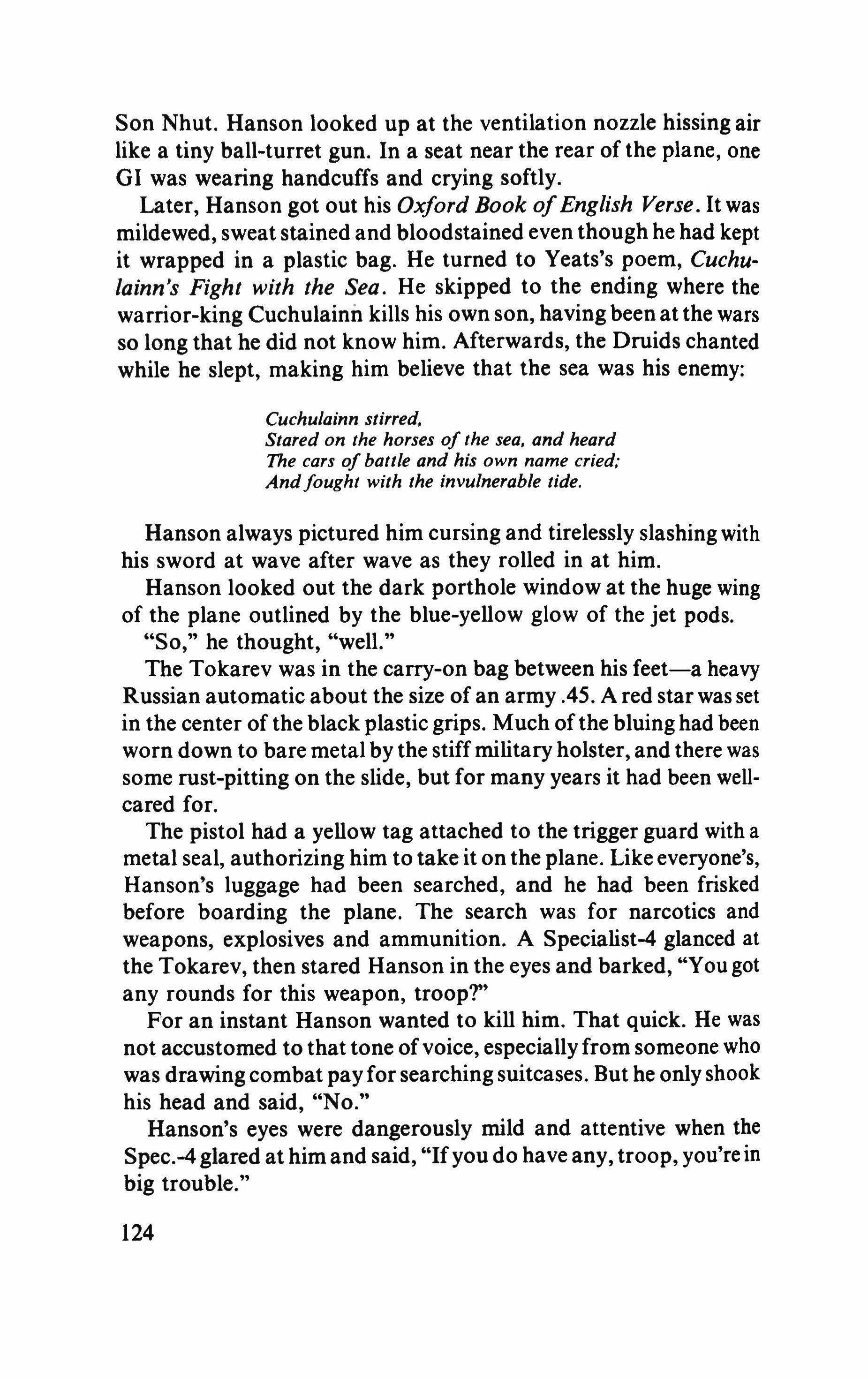
Son Nhut. Hanson looked up at the ventilation nozzle hissing air like a tiny ball-turret gun. In a seat near the rear of the plane, one GI was wearing handcuffs and crying softly.
Later, Hanson got out his Oxford Book ofEnglish Verse. It was mildewed, sweat stained and bloodstained even though he had kept it wrapped in a plastic bag. He turned to Yeats's poem, Cuchulainn's Fight with the Sea. He skipped to the ending where the warrior-king Cuchulainn kills his own son, having been at the wars so long that he did not know him. Afterwards, the Druids chanted while he slept, making him believe that the sea was his enemy:
Cuchulainn stirred.
Stared on the horses of the sea. and heard The cars of battle and his own name cried; Andfought with the invulnerable tide.
Hanson always pictured him cursing and tirelessly slashing with his sword at wave after wave as they rolled in at him.
Hanson looked out the dark porthole window at the huge wing of the plane outlined by the blue-yellow glow of the jet pods. "So," he thought, "well."
The Tokarev was in the carry-on bag between his feet-a heavy Russian automatic about the size of an army .45. A red star was set in the center of the black plastic grips. Much ofthe bluing had been worn down to bare metal by the stiffmilitary holster, and there was some rust-pitting on the slide, but for many years it had been wellcared for.
The pistol had a yellow tag attached to the trigger guard with a metal seal, authorizing him to take it on the plane. Like everyone's, Hanson's luggage had been searched, and he had been frisked before boarding the plane. The search was for narcotics and weapons, explosives and ammunition. A Specialist-4 glanced at the Tokarev, then stared Hanson in the eyes and barked, "You got any rounds for this weapon, troop?"
For an instant Hanson wanted to kill him. That quick. He was not accustomed to that tone ofvoice, especially from someone who was drawing combat pay for searching suitcases. But he only shook his head and said, "No."
Hanson's eyes were dangerously mild and attentive when the Spec.-4glared at him and said, "Ifyou do have any, troop, you're in big trouble."
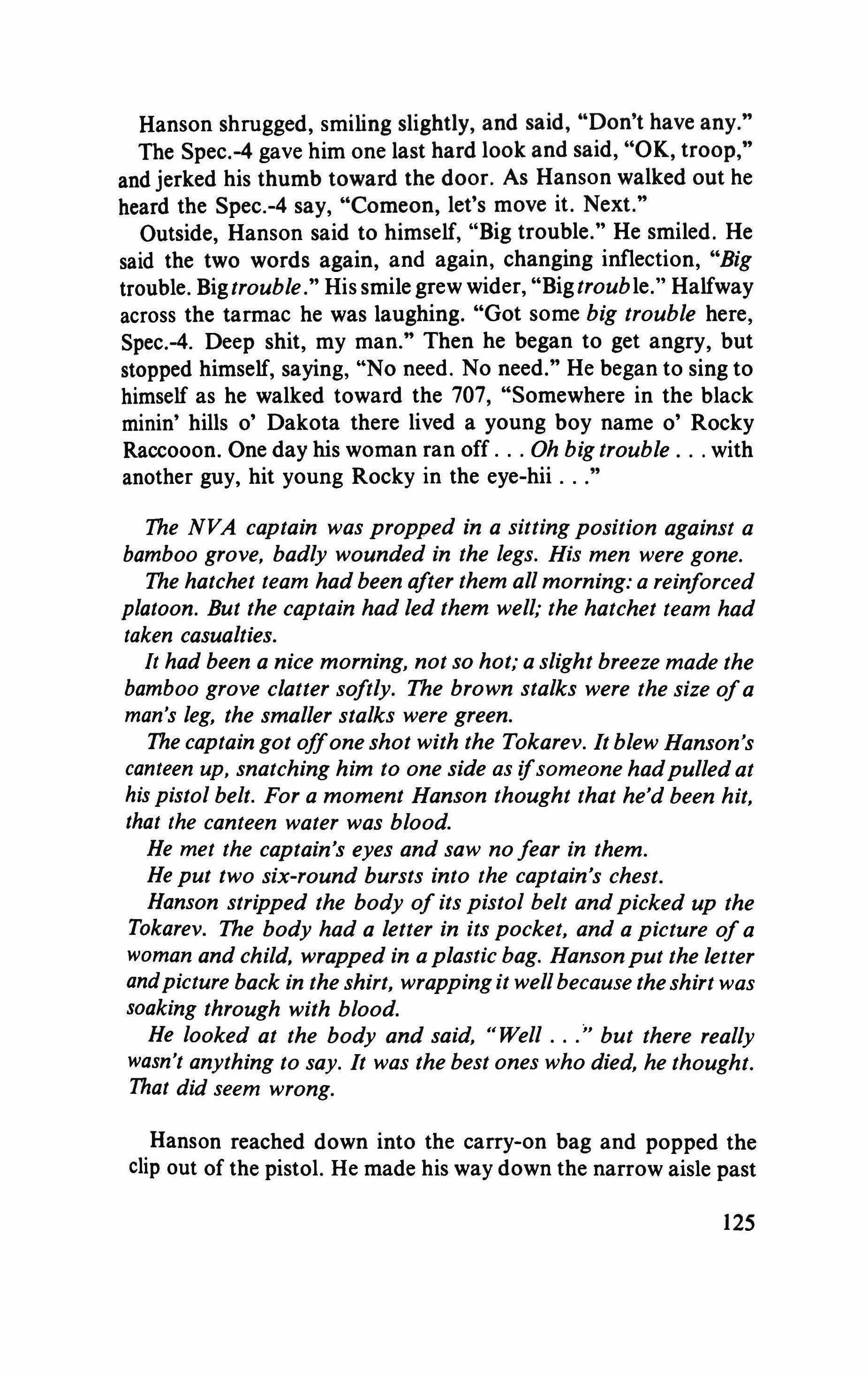
Hanson shrugged, smiling slightly, and said, "Don't have any."
The Spec.-4 gave him one last hard look and said, "OK, troop," and jerked his thumb toward the door. As Hanson walked out he heard the Spec.-4 say, "Comeon, let's move it. Next."
Outside, Hanson said to himself, "Big trouble." He smiled. He said the two words again, and again, changing inflection, "Big trouble. Bigtrouble." His smile grew wider, "Bigtrouble." Halfway across the tarmac he was laughing. "Got some big trouble here, Spec.-4. Deep shit, my man." Then he began to get angry, but stopped himself, saying, "No need. No need." He began to sing to himself as he walked toward the 707, "Somewhere in the black minin' hills 0' Dakota there lived a young boy name 0' Rocky Raccooon. One day his woman ran off Oh big trouble with another guy, hit young Rocky in the eye-hii
The NVA captain was propped in a sitting position against a bamboo grove, badly wounded in the legs. His men were gone.
The hatchet team had been after them all morning: a reinforced platoon. But the captain had led them well; the hatchet team had taken casualties.
It had been a nice morning, not so hot; a slight breeze made the bamboo grove clatter softly. The brown stalks were the size of a man's leg, the smaller stalks were green.
The captain got offone shot with the Tokarev. It blew Hanson's canteen up, snatching him to one side as ifsomeone hadpulled at his pistol belt. For a moment Hanson thought that he'd been hit, that the canteen water was blood.
He met the captain's eyes and saw no fear in them.
He put two six-round bursts into the captain's chest.
Hanson stripped the body of its pistol belt and picked up the Tokarev. The body had a letter in its pocket, and a picture of a woman and child, wrapped in a plastic bag. Hansonput the letter andpicture back in the shirt, wrapping it well because theshirt was soaking through with blood.
He looked at the body and said, "Well .: but there really wasn't anything to say. It was the best ones who died, he thought. That did seem wrong.
Hanson reached down into the carry-on bag and popped the clip out of the pistol. He made his way down the narrow aisle past

the rows of sleeping GIs, some of them softly spotlighted by reading lights, their cheeks and eyes hollow. The plane hit a pocket of turbulence, and all the green-clad GIs leaned to one side, rose slightly, then sank back down into their seats.
When he reached the tail of the plane, a pretty blond stewardess wearing a blue cap looked up. He smiled at her, and she looked back down at the paperback book she was reading.
Inside the lurching little bathroom-glaring light and stainless steel-he loosened the web belt. There was a wide strip of white adhesive tape across the inside of his thigh. He slowly pulled the tape away and the bright bottle-necked bullets dropped one by one into his hand. He threw the tape away, tightened the belt, and pulled the clip from his pocket. Each round made a solid "click" as he thumbed it into the clip. He loaded the rounds the way a man might deposit dimes in a pay phone.
Back in his seat, he slid the loaded clip into the butt of the pistol and stuck the pistol between the arm rest and the side of the plane. For 18 months not a minute had passed when he did not have a weapon in his hand or within easy reach.
Outside the porthole the silver and black wing shuddered slightly. The muffled jets sounded like a waterfall.
"Well," Hanson thought. He smiled slightly, then had to squint to keep his eyes from watering. He leaned his head against the roaring wall, and was asleep in seconds. He dreamed about the skull.
It had been a year and a halfsince Hanson had reported for duty at CCN. The gate into the compound was a narrow path cutting through the wire: triplestrand and engineer stakes, coils of concertina piled shoulder-high and head-high, two-layered webs of tanglefoot with trip-flares hung like beer cans littering the ground cover along a highway. Triplestrand, concertina, tanglefoot all the way in like jagged steel hedges and lawns.
Claymore antipersonnel mines perched on little folding legs facing the gate-almost jolly looking, like fat little "keep off the grass" signs. Across their faces were the words FRONT TOWARDS ENEMY.
There was no grass in the wire. It had been burned away with Me-gas so often that the fired red clay smelled like overheated machinery.
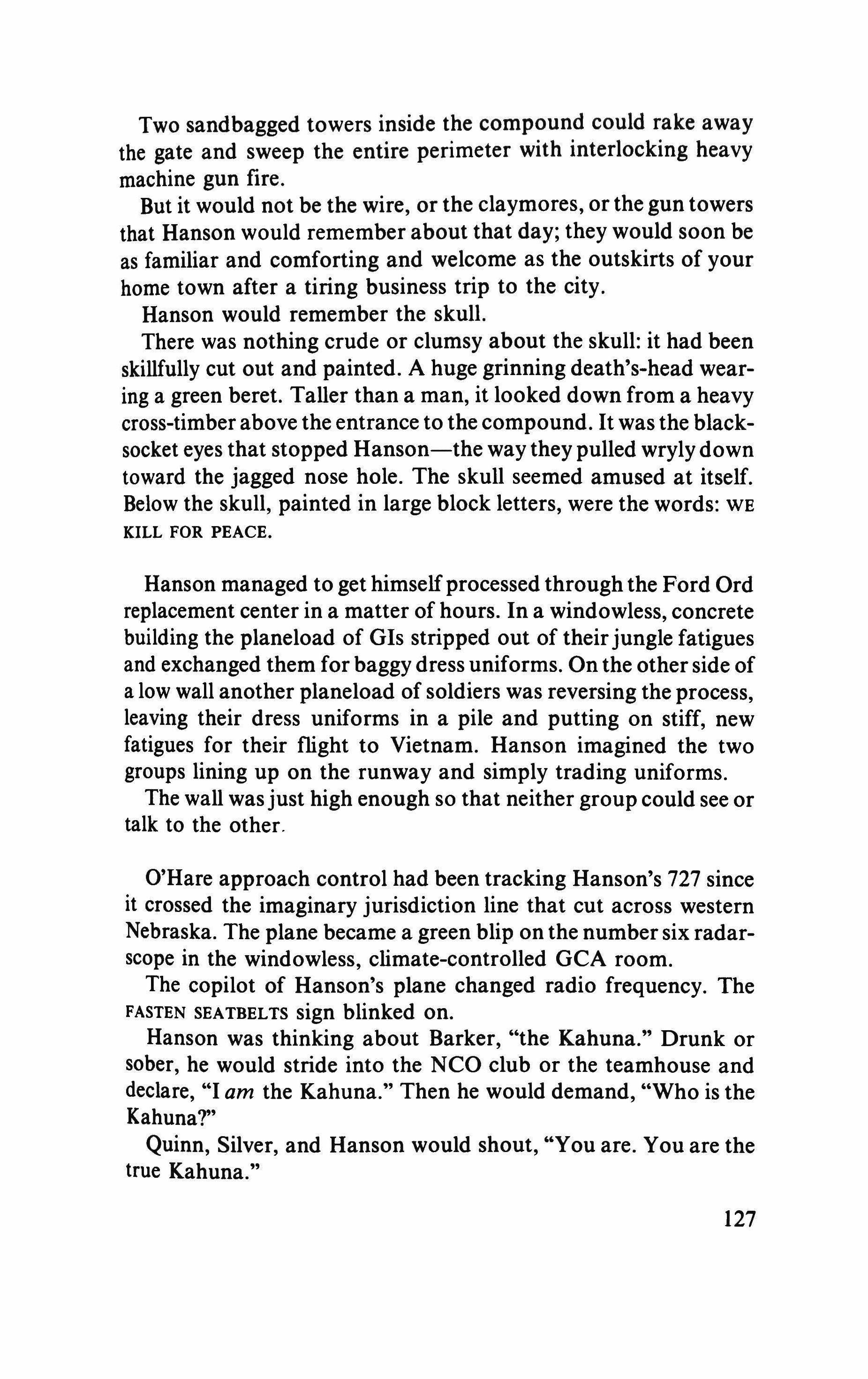
Two sandbagged towers inside the compound could rake away the gate and sweep the entire perimeter with interlocking heavy machine gun fire.
But it would not be the wire, or the claymores, or the gun towers that Hanson would remember about that day; they would soon be as familiar and comforting and welcome as the outskirts of your home town after a tiring business trip to the city.
Hanson would remember the skull.
There was nothing crude or clumsy about the skull: it had been skillfully cut out and painted. A huge grinning death's-head wearing a green beret. Taller than a man, it looked down from a heavy cross-timber above the entrance to the compound. It was the blacksocket eyes that stopped Hanson-the way theypulled wryly down toward the jagged nose hole. The skull seemed amused at itself. Below the skull, painted in large block letters, were the words: WE KILL FOR PEACE.
Hanson managed to get himselfprocessed through the Ford Ord replacement center in a matter of hours. In a windowless, concrete building the planeload of GIs stripped out of theirjungle fatigues and exchanged them for baggy dress uniforms. On the other side of a low wall another planeload of soldiers was reversing the process, leaving their dress uniforms in a pile and putting on stiff, new fatigues for their flight to Vietnam. Hanson imagined the two groups lining up on the runway and simply trading uniforms.
The wall was just high enough so that neither group could see or talk to the other.
O'Hare approach control had been tracking Hanson's 727 since it crossed the imaginary jurisdiction line that cut across western Nebraska. The plane became a green blip on the number six radarscope in the windowless, climate-controlled GCA room.
The copilot of Hanson's plane changed radio frequency. The FASTEN SEATBELTS sign blinked on.
Hanson was thinking about Barker, "the Kahuna." Drunk or sober, he would stride into the NCO club or the teamhouse and declare, "I am the Kahuna." Then he would demand, "Who is the Kahuna?'
Quinn, Silver, and Hanson would shout, "You are. You are the true Kahuna."
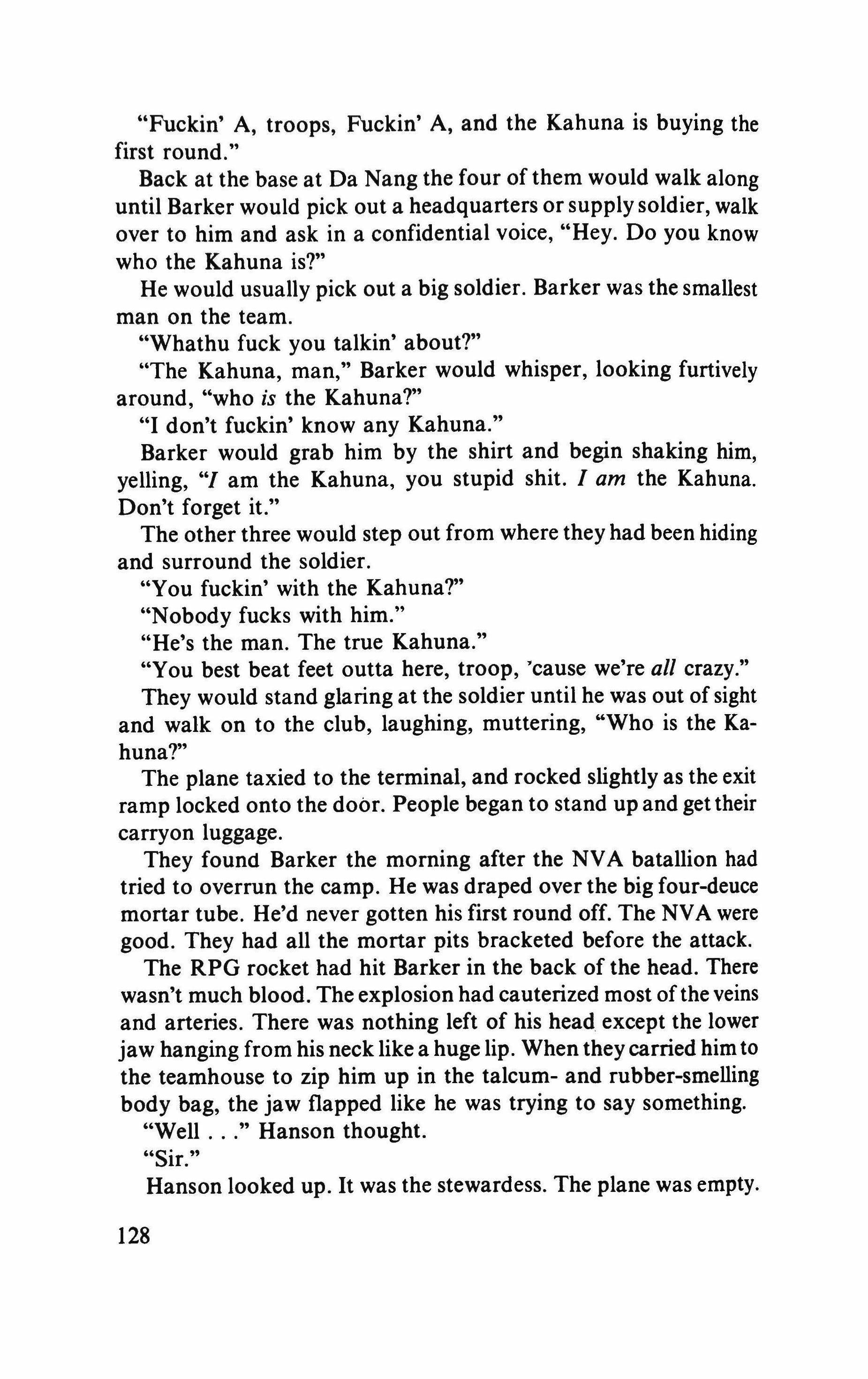
"Fuckin' A, troops, Fuckin' A, and the Kahuna is buying the first round."
Back at the base at Da Nang the four of them would walk along until Barker would pick out a headquarters or supplysoldier, walk over to him and ask in a confidential voice, "Hey. Do you know who the Kahuna is?"
He would usually pick out a big soldier. Barker was the smallest man on the team.
"Whathu fuck you talkin' about?"
"The Kahuna, man," Barker would whisper, looking furtively around, "who is the Kahuna?"
"I don't fuckin' know any Kahuna."
Barker would grab him by the shirt and begin shaking him, yelling, "I am the Kahuna, you stupid shit. / am the Kahuna. Don't forget it."
The other three would step out from where they had been hiding and surround the soldier.
"You fuckin' with the Kahuna?"
"Nobody fucks with him."
"He's the man. The true Kahuna."
"You best beat feet outta here, troop, 'cause we're all crazy."
They would stand glaring at the soldier until he was out ofsight and walk on to the club, laughing, muttering, "Who is the Kahuna?"
The plane taxied to the terminal, and rocked slightly as the exit ramp locked onto the door. People began to stand up and gettheir carryon luggage.
They found Barker the morning after the NVA batallion had tried to overrun the camp. He was draped over the big four-deuce mortar tube. He'd never gotten his first round off. The NVA were good. They had all the mortar pits bracketed before the attack.
The RPG rocket had hit Barker in the back of the head. There wasn't much blood. The explosion had cauterized most of the veins and arteries. There was nothing left of his head except the lower jaw hanging from his neck like a huge lip. When theycarried him to the teamhouse to zip him up in the talcum- and rubber-smelling body bag, the jaw flapped like he was trying to say something.
"Well " Hanson thought.
"Sir.
Hanson looked up. It was the stewardess. The plane was empty.
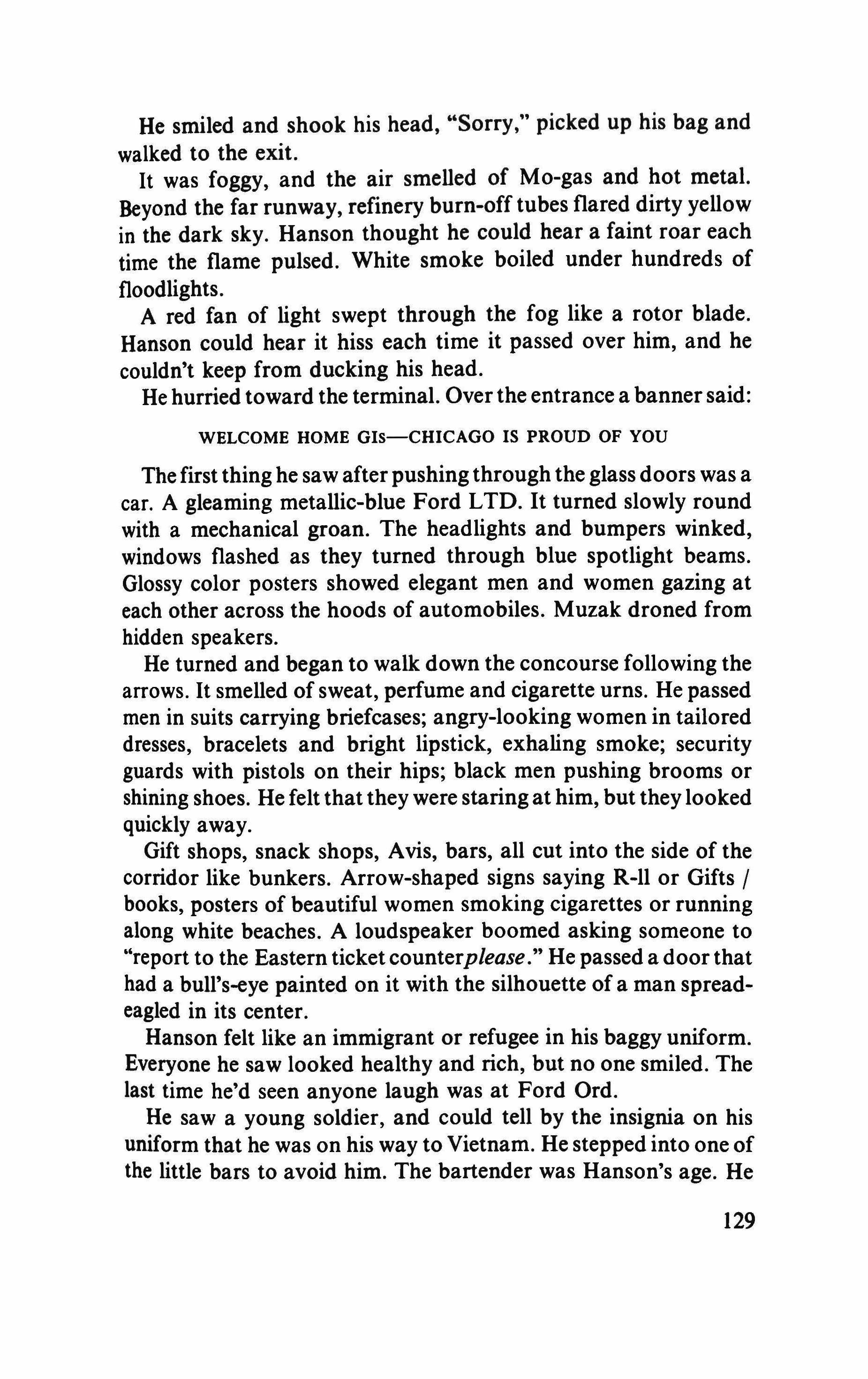
He smiled and shook his head, "Sorry," picked up his bag and walked to the exit.
It was foggy, and the air smelled of Mo-gas and hot metal. Beyond the far runway, refinery burn-off tubes flared dirty yellow in the dark sky. Hanson thought he could hear a faint roar each time the flame pulsed. White smoke boiled under hundreds of floodlights.
A red fan of light swept through the fog like a rotor blade. Hanson could hear it hiss each time it passed over him, and he couldn't keep from ducking his head.
He hurried toward the terminal. Over the entrance a banner said:
WELCOME HOME GIs-CHICAGO IS PROUD OF YOU
The first thing he saw after pushingthrough the glass doors was a car. A gleaming metallic-blue Ford LTD. It turned slowly round with a mechanical groan. The headlights and bumpers winked, windows flashed as they turned through blue spotlight beams. Glossy color posters showed elegant men and women gazing at each other across the hoods of automobiles. Muzak droned from hidden speakers.
He turned and began to walk down the concourse following the arrows. It smelled ofsweat, perfume and cigarette urns. He passed men in suits carrying briefcases; angry-looking women in tailored dresses, bracelets and bright lipstick, exhaling smoke; security guards with pistols on their hips; black men pushing brooms or shining shoes. He felt that they were staring at him, but they looked quickly away.
Gift shops, snack shops, Avis, bars, all cut into the side of the corridor like bunkers. Arrow-shaped signs saying R-ll or Gifts / books, posters of beautiful women smoking cigarettes or running along white beaches. A loudspeaker boomed asking someone to "report to the Eastern ticket counterplease." He passed a door that had a bull's-eye painted on it with the silhouette of a man spreadeagled in its center.
Hanson felt like an immigrant or refugee in his baggy uniform. Everyone he saw looked healthy and rich, but no one smiled. The last time he'd seen anyone laugh was at Ford Ord.
He saw a young soldier, and could tell by the insignia on his uniform that he was on his way to Vietnam. He stepped into one of the little bars to avoid him. The bartender was Hanson's age. He
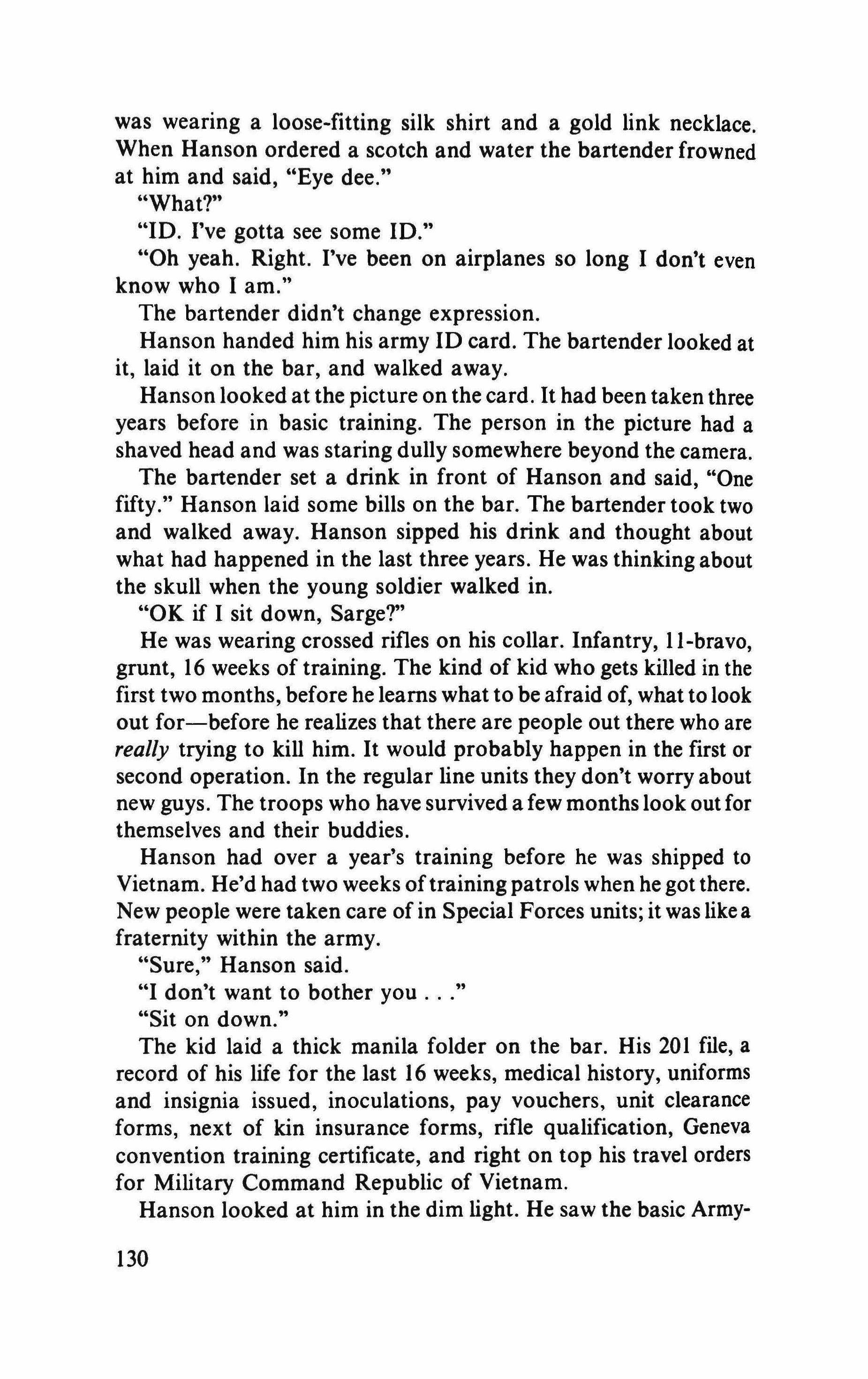
was wearing a loose-fitting silk shirt and a gold link necklace. When Hanson ordered a scotch and water the bartender frowned at him and said, "Eye dee."
"What?"
"ID. I've gotta see some ID."
"Oh yeah. Right. I've been on airplanes so long I don't even know who lam."
The bartender didn't change expression.
Hanson handed him his army ID card. The bartender looked at it, laid it on the bar, and walked away.
Hanson looked at the picture on the card. It had been taken three years before in basic training. The person in the picture had a shaved head and was staring dully somewhere beyond the camera.
The bartender set a drink in front of Hanson and said, "One fifty." Hanson laid some bills on the bar. The bartender took two and walked away. Hanson sipped his drink and thought about what had happened in the last three years. He was thinking about the skull when the young soldier walked in.
"OK if I sit down, Sarge?"
He was wearing crossed rifles on his collar. Infantry, ll-bravo, grunt, 16 weeks of training. The kind of kid who gets killed in the first two months, before he learns what to be afraid of, what to look out for-before he realizes that there are people out there who are really trying to kill him. It would probably happen in the first or second operation. In the regular line units they don't worry about new guys. The troops who have survived a few months look out for themselves and their buddies.
Hanson had over a year's training before he was shipped to Vietnam. He'd had two weeks oftrainingpatrols when he got there. New people were taken care of in Special Forces units; it was like a fraternity within the army.
"Sure," Hanson said.
"I don't want to bother you
"Sit on down."
The kid laid a thick manila folder on the bar. His 201 file, a record of his life for the last 16 weeks, medical history, uniforms and insignia issued, inoculations, pay vouchers, unit clearance forms, next of kin insurance forms, rifle qualification, Geneva convention training certificate, and right on top his travel orders for Military Command Republic of Vietnam.
Hanson looked at him in the dim light. He saw the basic Army-

issue-dead-18-year-old. They all looked alike when they were dead. When Hanson looked at him he saw him as he would look when he was dead.
"Hey, look," Hanson said, "I gotta catch a plane, but lemme give you some quick, free advice."
"Sure, Sarge," he said, trusting Hanson because of the green beret and the ribbons on his coat.
"OK. When you get to your unit you look around for someone who's been there six or eight months. The reason he's still alive is because he knows what he's doing. Try and stay close to him. Don't piss him off with too many questions,just watch what he does and listen to what he says.
"Try and stay in the middle of the column. The middle is good. And don't be afraid of being scared. That'll get you killed. People start shooting, you get down on the ground, OK? You make the first two months, and you got it dicked."
Hanson stood up and said, "Don't sweat it, you'll be OK. I can tell." He pushed the bills lying on the bar over in front ofthe kid. "Lemme buy you a drink. When you get back a yearfrom now, you can buy somebody else one. Take care now."
As he walked out of the bar, Hanson heard the kid say, "Thanks a lot, Sarge."
"Thanks a lot, Sarge," Hanson muttered to himself as he walked quickly away, "thanks a lot for lying to me, for not telling me I'll be dead in six weeks, thanks for the drink, Sarge."
Hanson wanted to kill somebody. He wanted to kill everybody. He wanted somebody to pay.
As he walked toward his boarding gate, Hanson passed a bank of TV screens set into the wall. They were all turned to different channels, mostly game shows and soap operas. The sound was turned off and the whole wall flickered and blinked like a huge computer screen as the camera anglesjumped and cut from scene to scene. On the game shows people were laughing andjumping up and down, hugging TVs and ovens.
One screen stood out like a blind eye. It was black and white. It keptshowing the time, temperature, humidity and wind speed, one fact indifferently replacing the next.
It was raining when Hanson's plane began to taxi down the runway. The tiny raindrops pulled across the round window, lurching sideways toward the tail. The domes and spires of the

refinery gleamed under thousands of floodlights. They floated in the boiling white smoke and bursts ofyellow flame. It looked like a city in the act of destroying itself. Hanson couldn't hear any explosions. He wondered what it would be like ifhe were deaf. But you can/eel the explosions that come close enough to hurt you.
The brakes squealed as the plane stopped. It sat back and shuddered as the engines began to rev. Hanson touched the window lightly with the back of his hand, and felt the pitch ofthe engines.
They began to move. A black and white sign flashed past that said: K-4 RUD CLOSED. Then the blue lights were snapping past like bursts of memory or foreknowledge of events you can't prevent, and the plane was in the clouds.
It was black outside the window. Hanson watched the raindrops drag across the glass. He wondered if it was thejet exhaust or the wind speed that made them act that way.
The pilot announced that it was 72 degrees below zero outside the plane.
In the seat behind him a child began to cry. A woman's voice said, "Jason, if you don't stop that, I'm reallygoing to give it to you when we get home."
He kept crying.
Hanson couldn't remember ever seeing any children cry in Vietnam, not even the ones who were wounded, who had flies crawling on their wounds and faces. He tried to think of at least one, but he couldn't.
As he thought back, recalling face after face, he met the same listless stare each time. They didn't seem to blame him for whatever had happened to them, but they expected him to do something. Most of the time all he could do was wait for the medivac and watch them die.
He was still trying to recall seeing a child cry when his plane became a green blip on the GCA scope at his home town airport.
3
When Hanson reached up to pull a handful ofrazor-grass downfor shade, his canteens and grenades shifted and tugged at him. He had been thinking about time. He glanced at his watch, and saw a green fly licking blood from a cut on the back ot his hand. The sun whined and chirped in his ears. His crotch and armpits were wet, and the grass cuts on his hands stung. He killed the fly, and tried to

recall what he had read about how the half-life of carbon was used to establish the age of prehistoric tools.
He squinted into the sun again, and the earth began to shudder against his chest and thighs. In the valleybeyond the first ridgeline, greasy smoke rose and spread like thunderheads.
Far above, and to the west, three B-52s winked in the pale sky, but Hanson didn't see them. He stood up and watched the rest of the team rise from the tall brown grass: Quinn, Troc, Rau and Mr. Minh.
It was quiet in the valley. Sound did not carry in the damp heat, but seemed to fall dead to the ground. They moved slowly. Any piece of equipment that might" rattle had been taped down or removed. The only sounds were their boots on the baked earth and the rustle of canvas web gear. Dressed for speed and fire-power, they carried only water, ammunition, freeze-dried food and explosives.
Hanson kept losingsight ofthe rest ofthe team in the acrid fogdust, smoke and the ammonia stink of high explosive. He could taste it on the back of his throat. The jungle floor was torn into steaming furrows. Lengths of vine and tiger thorns were tangled like concertina wire. The craters were as big as bedrooms, smelling of sulfur and freshly turned earth, fog clinging to their sides like dirty snow. Scorched bamboo groves hissed, and patches of brush and grass burned noiselessly.
Hanson watched a fired-mud clinker roll slowly down the side of a crater and disappearin the fog. His eyes burned, but he didn't rub them. The yellow dust had turned to paste on his face andhands.
"Anybody who isn't dead," he thought, "is going to be pissed off." He inhaled the smoke and dust, and suddenly had to bite his lip to keep from laughing. He thought about the simple pain in his lip that kept him silent and safe, and he considered the importance of pain in human life.
"Pain is like a-nother language," Sergeant Major had once told him; "people usually understand it better than words. You can get right to the point. Pain works much better than words if you want to persuade someone to do somethingthey don't want to do."
Hanson stepped around an uprooted tree, and saw the soldier, an NVA regular with a carbine. He was caked with the same yellow paste that covered Hanson's face and arms. Only his eyes seemed alive. He seemed to be staring at something far away, or thinking

about something puzzling and important. A fine web of bright blood ran from his ears and nose, collected on his chin, and fell to his chest with softpops. The blood puddled and slid down his arm through the dust to his elbow, then to his hand where it dropped from his fingers to the ground.
His eyes moved slowly until they met Hanson's. Then his feet got tangled up and he sat down like a character in a slapstick comedy who has his chair pulled out from under him. His eyes had a look of total surprise. His head dropped between his knees, and he toppled to one side.
Rau kicked him twice, once in the ribs and once in the head. When they left him behind his eyes were dead, and his brokenjaw sagged with astonishment.
They found five more in the first collapsed bunker. It looked like a mining disaster, the bodies and sandbags shapeless and caked with dirt. Gouts ofcooked rice were stuck to timbers, and there was a heavy smell of fish sauce. Another body was a few meters from the bunker. He must have been running for cover when the bombs fell. One gray foot was twisted up against the ankle. His toenails were yellow and torn. The face beneath the stiff black bangs was a patchwork of black and purple and shading blues, like farmland seen from an airliner. Fat green blowflies rose and settled nervously, lapping at the face like a veil. Something of the face was still there, like those puzzles in children's picture books, clouds and gnarled trees that suddenly take focus and reveal a hidden face.
The team continued silently on, finding several more broken bunkers. The only really funny thing that happened was when Quinn spun and threw his rifle to his shoulder. He had glanced up and seen a body hanging from the crotch of a tree. The rest ofthe team grinned. Troc whispered, "Same bird," and smiled.
At the edge of the impact area they turned north. The heat seemed like part of the terrain, as solid as the earth beneath Hanson's feet. The air was so humid that breathing was difficult; it was like drowning. Hanson touched the compass hanging at his chest and thought, "Good old North." He imagined going north, and north until the jungle changed to tundra, and mountains and solid ice.
A tiny deer broke from the underbrush, barking like a dog. Hanson and the rest of the team dropped into a crouch. The barking deer wheeled and went back the way it had come.
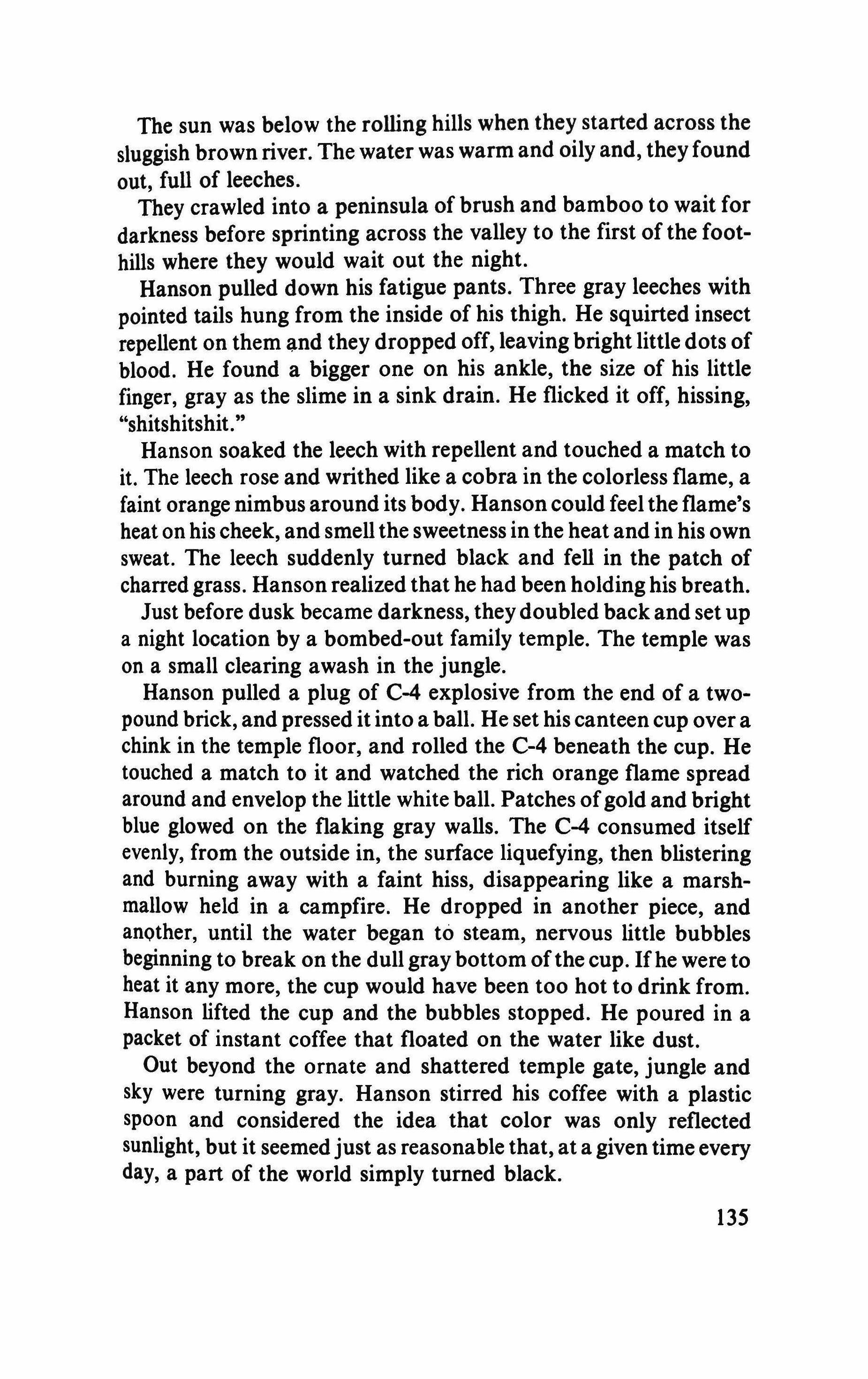
The sun was below the rolling hills when they started across the sluggish brown river. The water was warm and oily and, they found out, full of leeches.
They crawled into a peninsula of brush and bamboo to wait for darkness before sprinting across the valley to the first of the foothills where they would wait out the night.
Hanson pulled down his fatigue pants. Three gray leeches with pointed tails hung from the inside of his thigh. He squirted insect repellent on them and they dropped off, leavingbright little dots of blood. He found a bigger one on his ankle, the size of his little finger, gray as the slime in a sink drain. He flicked it off, hissing, "shitshitshit.
Hanson soaked the leech with repellent and touched a match to it. The leech rose and writhed like a cobra in the colorless flame, a faint orange nimbus around its body. Hanson could feel the flame's heat on his cheek, and smell the sweetness in the heat and in his own sweat. The leech suddenly turned black and fell in the patch of charred grass. Hanson realized that he had been holding his breath.
Just before dusk became darkness, they doubled back and set up a night location by a bombed-out family temple. The temple was on a small clearing awash in the jungle.
Hanson pulled a plug of C-4 explosive from the end of a twopound brick, and pressed it into a ball. He set his canteen cup over a chink in the temple floor, and rolled the C-4 beneath the cup. He touched a match to it and watched the rich orange flame spread around and envelop the little white ball. Patches ofgold and bright blue glowed on the flaking gray walls. The C-4 consumed itself evenly, from the outside in, the surface liquefying, then blistering and burning away with a faint hiss, disappearing like a marshmallow held in a campfire. He dropped in another piece, and another, until the water began to steam, nervous little bubbles beginning to break on the dull gray bottom ofthe cup. Ifhe were to heat it any more, the cup would have been too hot to drink from. Hanson lifted the cup and the bubbles stopped. He poured in a packet of instant coffee that floated on the water like dust.
Out beyond the ornate and shattered temple gate, jungle and sky were turning gray. Hanson stirred his coffee with a plastic spoon and considered the idea that color was only reflected sunlight, but it seemed just as reasonable that, at a given time every day, a part of the world simply turned black.

The countryside had begun to grumble with artillery and heavy machine gun fire. Hanson sipped his coffee and smiled. The guns control the land at night. The firebases cough and take over. They pull their men back inside their perimeter and flail thejungle with ordinance.
The coffee was hot and good.
Hanson and Quinn slung their hammocks near an artillery crater down the slope from the temple. Quinn's hammock swung gently as he whispered the chant, "Airborne ranger, green buh-ray, this is the way we end the day." Then he laughed, so softly that it sounded evil.
"I don't like these fuckin' arc light sweeps," he said, "body counters, one potato, two potato. That fuckin' guy in the tree. Scared the shit out of me. And that first guy. Just standing there. I don't know what he was lookin' at, but 1 don't think it's somethingI ever want to see. And that goddamn little deer. The Yards got some kind of thing about them? Even Mr. Minh acted funny after we saw that deer. Seems like the Yards been acting funny ever since we started this sweep."
"Yeah," Hanson said, "that barking deer's kind of like a black cat. If you start on a trip and it crosses your path, you're supposed to back up and start over."
Quinn's hammock strings grated against the tree they were tied to.
"You really believe a lot of that Montagnard stuff, don't you? The omens and spirits," Quinn said.
"Shit, so do you. Mr. Minh believes it, and he ain't dumb. It makes as much sense as God with a big white beard up in heaven. Remember those fucking pictures in Sunday school. Like the one of Jesus, long blond hair, sensitive blue eyes, knocking at the door of the rustic little cottage, knock, knock, knock."
Hanson began to speak in a southern drawl, "An' that's all you have to do, childern, when you hear him knockin'. That is lord Jeezus knockin' at yore heart, an' you need only to open up the door to receive his blessed love."
It had been the year Hanson'sfather was in Korea, and he was living at his grandmother's. After Sunday school he would go to church, and in the summer they handed out the cardboardfans with the flat wooden handle like a tongue depressor. There was always afuneral home ad on one side, and a gaudy colorpicture on
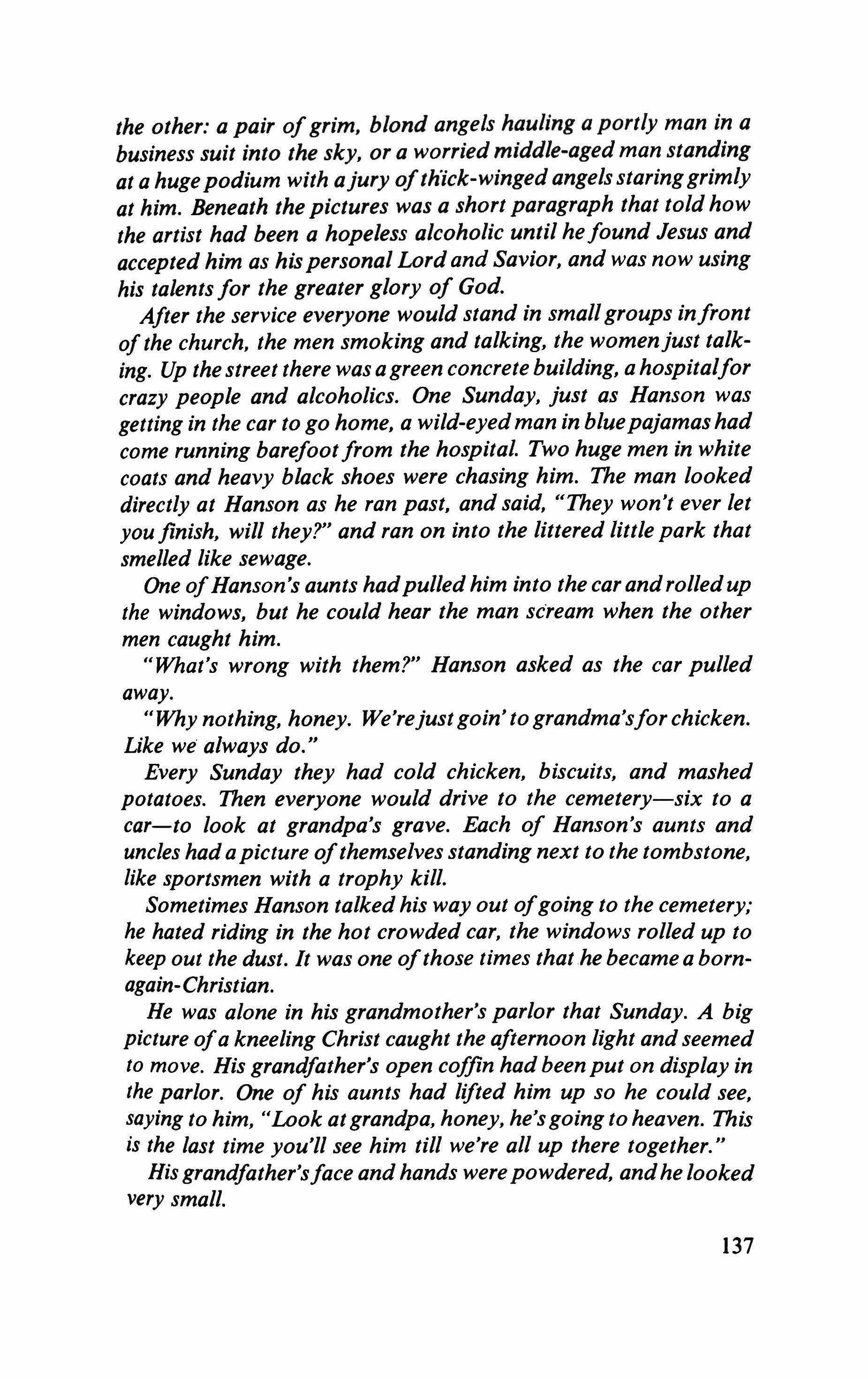
the other: a pair ofgrim, blond angels hauling a portly man in a business suit into the sky, or a worried middle-aged man standing at a hugepodium with ajury ofthick-wingedangelsstaringgrimly at him. Beneath thepictures was a short paragraph that told how the artist had been a hopeless alcoholic until hefound Jesus and accepted him as hispersonal Lord and Savior, and was now using his talents for the greater glory of God.
After the service everyone would stand in smallgroups infront ofthe church, the men smoking and talking, the womenjust talking. Up the street there was a green concrete building, a hospitalfor crazy people and alcoholics. One Sunday, just as Hanson was getting in the car to go home, a wild-eyed man in bluepajamashad come running barefootfrom the hospital. Two huge men in white coats and heavy black shoes were chasing him. The man looked directly at Hanson as he ran past, and said, "They won't ever let you finish, will they?" and ran on into the littered little park that smelled like sewage.
One ofHanson's aunts hadpulled him into the car androlledup the windows, but he could hear the man scream when the other men caught him.
"What's wrong with them?" Hanson asked as the car pulled away.
"Why nothing, honey. We'rejustgoin' to grandma'sfor chicken. Like we always do."
Every Sunday they had cold chicken, biscuits, and mashed potatoes. Then everyone would drive to the cemetery-six to a car-to look at grandpa's grave. Each of Hanson's aunts and uncles had a picture ofthemselves standing next to the tombstone, like sportsmen with a trophy kill.
Sometimes Hanson talked his way out ofgoing to the cemetery; he hated riding in the hot crowded car, the windows rolled up to keep out the dust. It was one ofthose times thathe became a bornagain-Christian.
He was alone in his grandmother's parlor that Sunday. A big picture ofa kneeling Christ caught the afternoon light and seemed to move. His grandfather's open coffin had been put on display in the parlor. One of his aunts had lifted him up so he could see, saying to him, "Look at grandpa, honey, he'sgoing to heaven. This is the last time you'll see him till we're all up there together."
Hisgrandfather'sface and hands werepowdered, andhe looked very small.
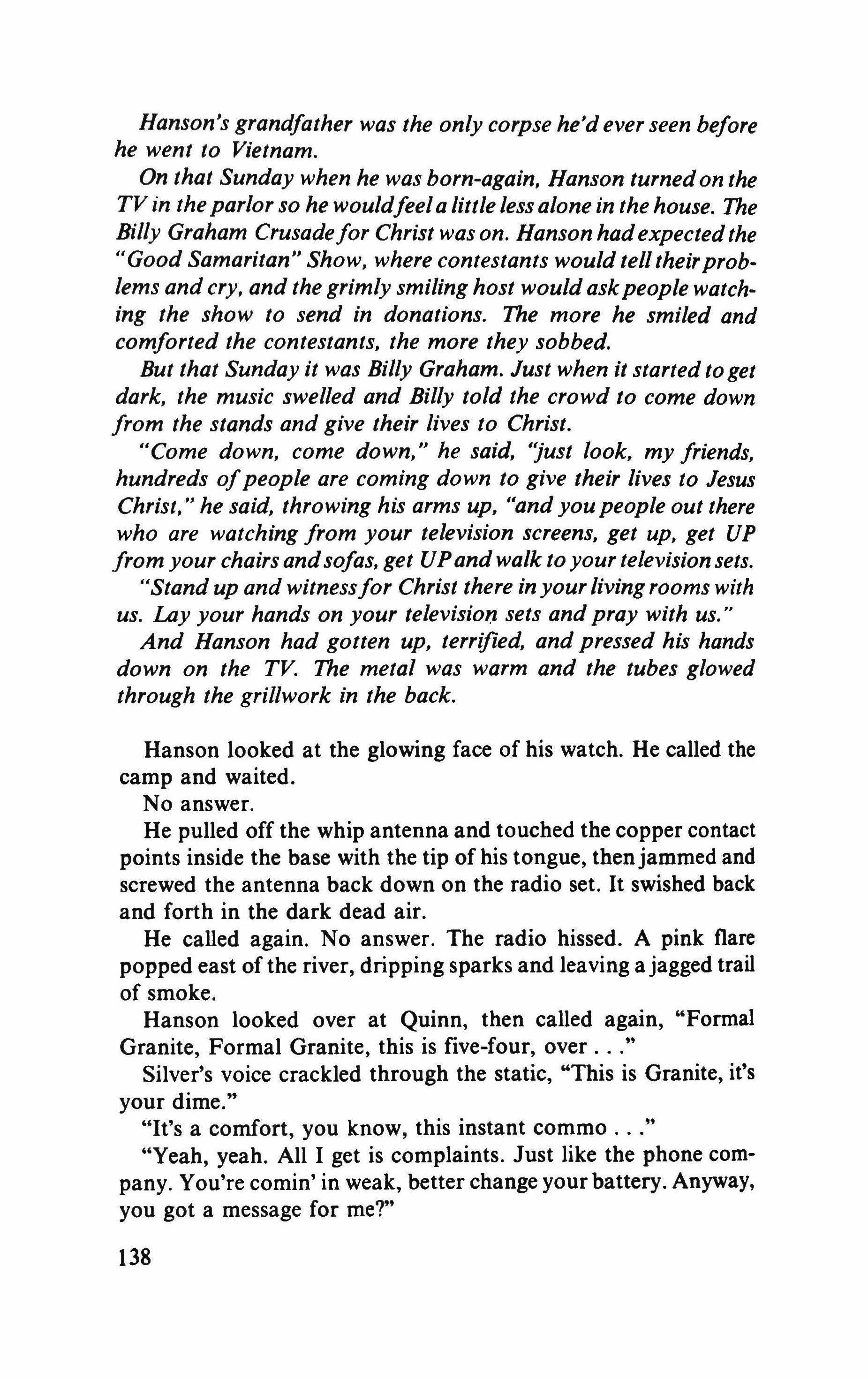
Hanson's grandfather was the only corpse he'd ever seen before he went to Vietnam.
On that Sunday when he was born-again, Hanson turned on the TV in theparlor so he wouldfeel a little less alone in the house. The Billy Graham Crusadefor Christ was on. Hanson hadexpectedthe "Good Samaritan" Show, where contestants would telltheirproblems and cry, and the grimly smiling host would askpeople watching the show to send in donations. The more he smiled and comforted the contestants, the more they sobbed.
But that Sunday it was Billy Graham. Just when it started to get dark, the music swelled and Billy told the crowd to come down from the stands and give their lives to Christ.
"Come down, come down," he said, "just look, my friends, hundreds ofpeople are coming down to give their lives to Jesus Christ," he said, throwing his arms up, "and you people out there who are watching from your television screens, get up, get UP from your chairs andsofas, get UPandwalk to your television sets.
"Stand up and witnessfor Christ there in your living rooms with us. Lay your hands on your television sets and pray with us."
And Hanson had gotten up, terrified, and pressed his hands down on the TV. The metal was warm and the tubes glowed through the grillwork in the back.
Hanson looked at the glowing face of his watch. He called the camp and waited.
No answer.
He pulled off the whip antenna and touched the copper contact points inside the base with the tip of his tongue, thenjammed and screwed the antenna back down on the radio set. It swished back and forth in the dark dead air.
He called again. No answer. The radio hissed. A pink flare popped east of the river, dripping sparks and leaving a jagged trail of smoke.
Hanson looked over at Quinn, then called again, "Formal Granite, Formal Granite, this is five-four, over Silver's voice crackled through the static, "This is Granite, it's your dime."
"It's a comfort, you know, this instant commo
"Yeah, yeah. All I get is complaints. Just like the phone company. You're comin' in weak, better change your battery. Anyway, you got a message for me?"

Hanson sent in the body count, and two night artillerygrids. One grid was H&I fire, a corridor of high explosive to be fired throughout the night around their location. The other grid was plotted directly on the temple, to be fired in the event that they were attacked and had to run.
"I get any mail?"
"Yeah. Last mail chopper. Three letters from Linda and one from that broad in Canada who married the deserter. And one of those commie newspapers from New York."
"Tampering with mail is a federal crime."
"It's all commo. Part of the job. Your partner there got one of those 'GI Paks' from his church in Iowa. Lotta good stuff. 'What every soldier in the field needs,' it says. Toothbrush, shoestrings, deck of cards-you doin' any gambling out there?-pair of white socks, little box of raisins, and a plastic packet of Heinz catsup, about enoughfor one hot dog ifyou got one, and some Bugs Bunny Kool aid. Card says the ladies' auxiliary is behind us 'all the way.' Yep."
Over the radio Silver's laugh sounded like a weak battery trying to start a car.
"Any movies?"
"Yeah, Clint Eastwood flick. The Yards loved it. So, that's all I got on this end."
"OK. Look, things don't feel too good here. Have that stuff ready to shoot if we call for it, 'cause we're gonna have to be steppin' right along."
"You got it. Any more traffic? I gotta make radio check with Da Nang."
"Negative."
"OK. Granite out. Catch you later. Hey, how does this grab you?" A hysterical mechanical laugh came from the radio-the accordion-like laugh-box Silver carried around.
The radio hissed like a TV after sign-off.
Hanson lay in the hammock listening to the big guns. They fired in pairs or groups of three, and sounded like distant boxcars slamming to a stop. Moments later he could hear the big shells coursing over, and past. Some of the explosions sent shudders through the hammock strings. It was strangely comforting.
A voice broke static on the radio, grinding like a gearbox, "Granite, five-four, this is Night Bird, over Hanson looked at Quinn. Quinn shrugged.
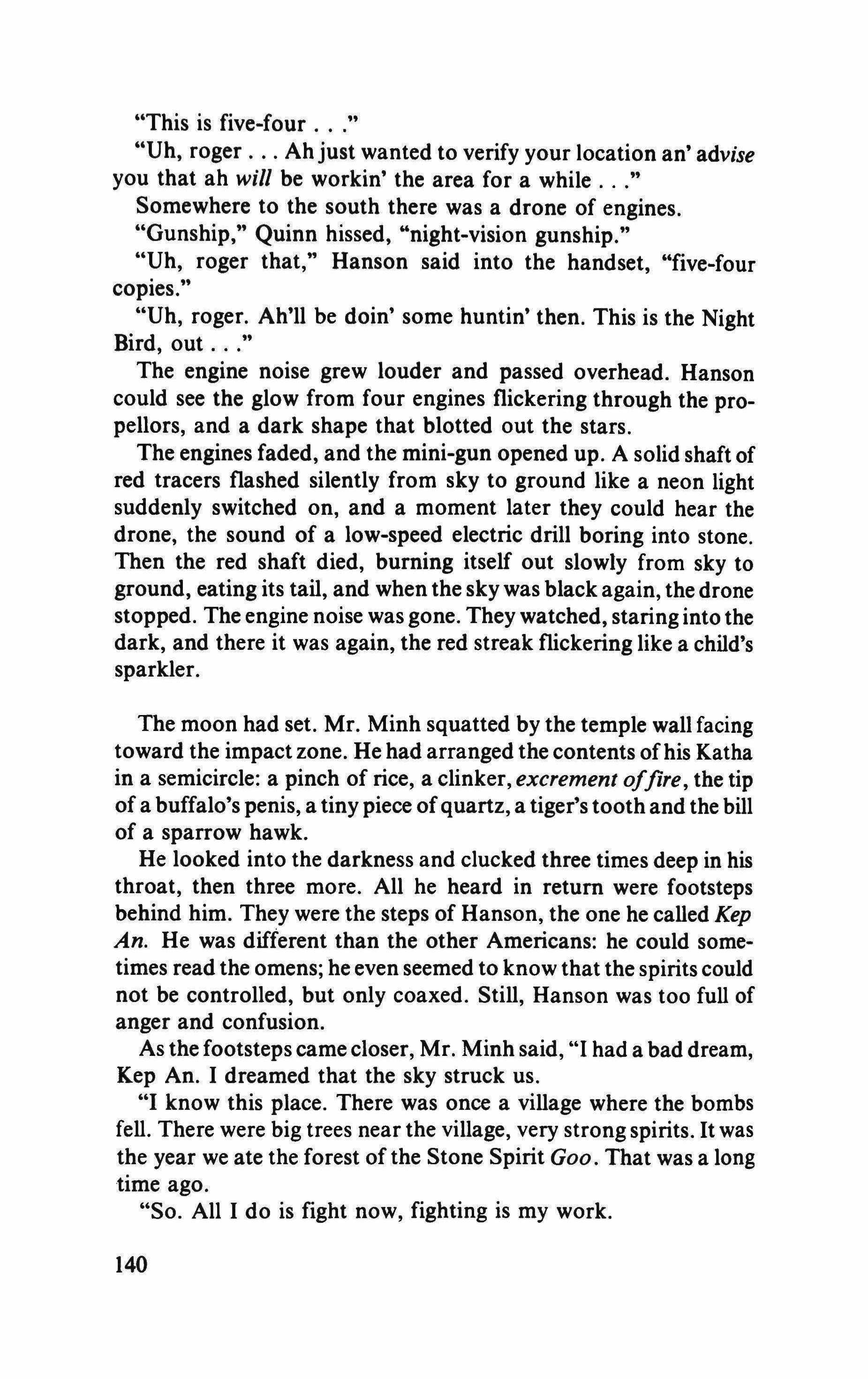
"This is five-four
"Uh, roger Ah just wanted to verify your location an' advise you that ah will be workin' the area for a while
Somewhere to the south there was a drone of engines. "Gunship," Quinn hissed, "night-vision gunship."
"Uh, roger that," Hanson said into the handset, "five-four copies."
"Uh, roger. Ah'll be doin' some huntin' then. This is the Night Bird, out "
The engine noise grew louder and passed overhead. Hanson could see the glow from four engines flickering through the propellors, and a dark shape that blotted out the stars.
The engines faded, and the mini-gun opened up. A solid shaft of red tracers flashed silently from sky to ground like a neon light suddenly switched on, and a moment later they could hear the drone, the sound of a low-speed electric drill boring into stone. Then the red shaft died, burning itself out slowly from sky to ground, eating its tail, and when the sky was black again, the drone stopped. The engine noise was gone. They watched, staring into the dark, and there it was again, the red streak flickering like a child's sparkler.
The moon had set. Mr. Minh squatted by the temple wall facing toward the impact zone. He had arranged the contents ofhis Katha in a semicircle: a pinch of rice, a clinker, excrement offire, the tip of a buffalo's penis, a tinypiece ofquartz, a tiger's tooth and the bill of a sparrow hawk.
He looked into the darkness and clucked three times deep in his throat, then three more. All he heard in return were footsteps behind him. They were the steps of Hanson, the one he called Kep An. He was different than the other Americans: he could sometimes read the omens; he even seemed to know that the spirits could not be controlled, but only coaxed. Still, Hanson was too full of anger and confusion.
As the footsteps came closer, Mr. Minh said, "I had a bad dream, Kep An. I dreamed that the sky struck us.
"I know this place. There was once a village where the bombs fell. There were big trees near the village, very strong spirits. It was the year we ate the forest ofthe Stone Spirit Goo. That was a long time ago.
"So. All 1 do is fight now, fighting is my work.
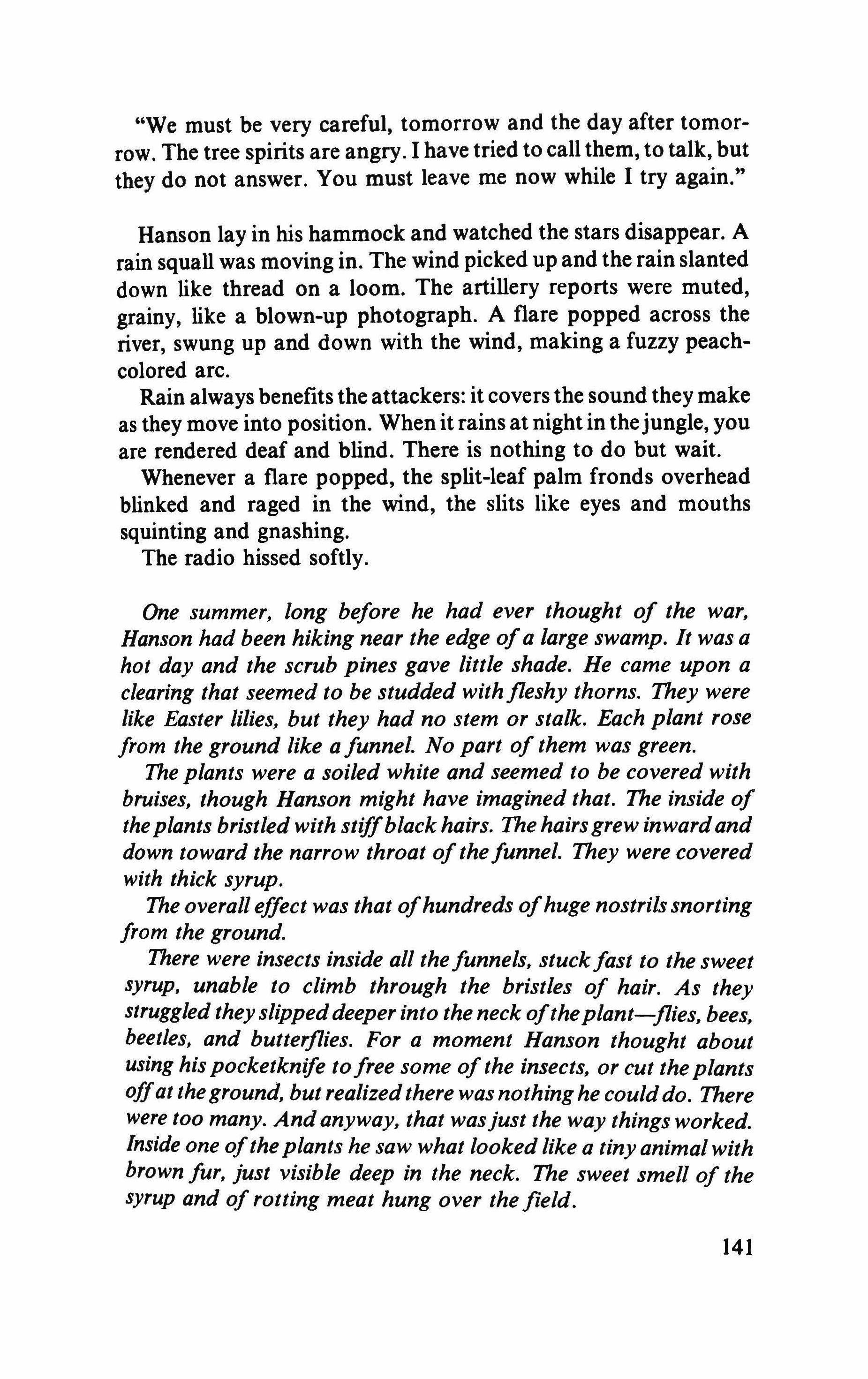
"We must be very careful, tomorrow and the day after tomorrow. The tree spirits are angry. I have tried to call them, to talk, but they do not answer. You must leave me now while I try again."
Hanson lay in his hammock and watched the stars disappear. A rain squall was moving in. The wind picked up and the rain slanted down like thread on a loom. The artillery reports were muted, grainy, like a blown-up photograph. A flare popped across the river, swung up and down with the wind, making a fuzzy peachcolored arc.
Rain always benefits the attackers: it covers the sound they make as they move into position. When it rains at night in thejungle, you are rendered deaf and blind. There is nothing to do but wait.
Whenever a flare popped, the split-leaf palm fronds overhead blinked and raged in the wind, the slits like eyes and mouths squinting and gnashing.
The radio hissed softly.
One summer, long before he had ever thought of the war, Hanson had been hiking near the edge of a large swamp. It was a hot day and the scrub pines gave little shade. He came upon a clearing that seemed to be studded withfleshy thorns. They were like Easter lilies, but they had no stem or stalk. Each plant rose from the ground like a funnel. No part of them was green.
The plants were a soiled white and seemed to be covered with bruises, though Hanson might have imagined that. The inside of theplants bristled with stiffblack hairs. The hairs grew inwardand down toward the narrow throat ofthefunnel. They were covered with thick syrup.
The overall effect was that ofhundreds ofhuge nostrils snorting from the ground.
There were insects inside all thefunnels, stuckfast to the sweet syrup, unable to climb through the bristles of hair. As they struggled theyslippeddeeper into the neck oftheplant-flies, bees, beetles, and butterflies. For a moment Hanson thought about using hispocketknife tofree some ofthe insects, or cut theplants offat theground, but realized there was nothinghe coulddo. There were too many. And anyway, that wasjust the way things worked. Inside one oftheplants he saw what looked like a tiny animal with brown fur, just visible deep in the neck. The sweet smell of the syrup and of rotting meat hung over thefield.
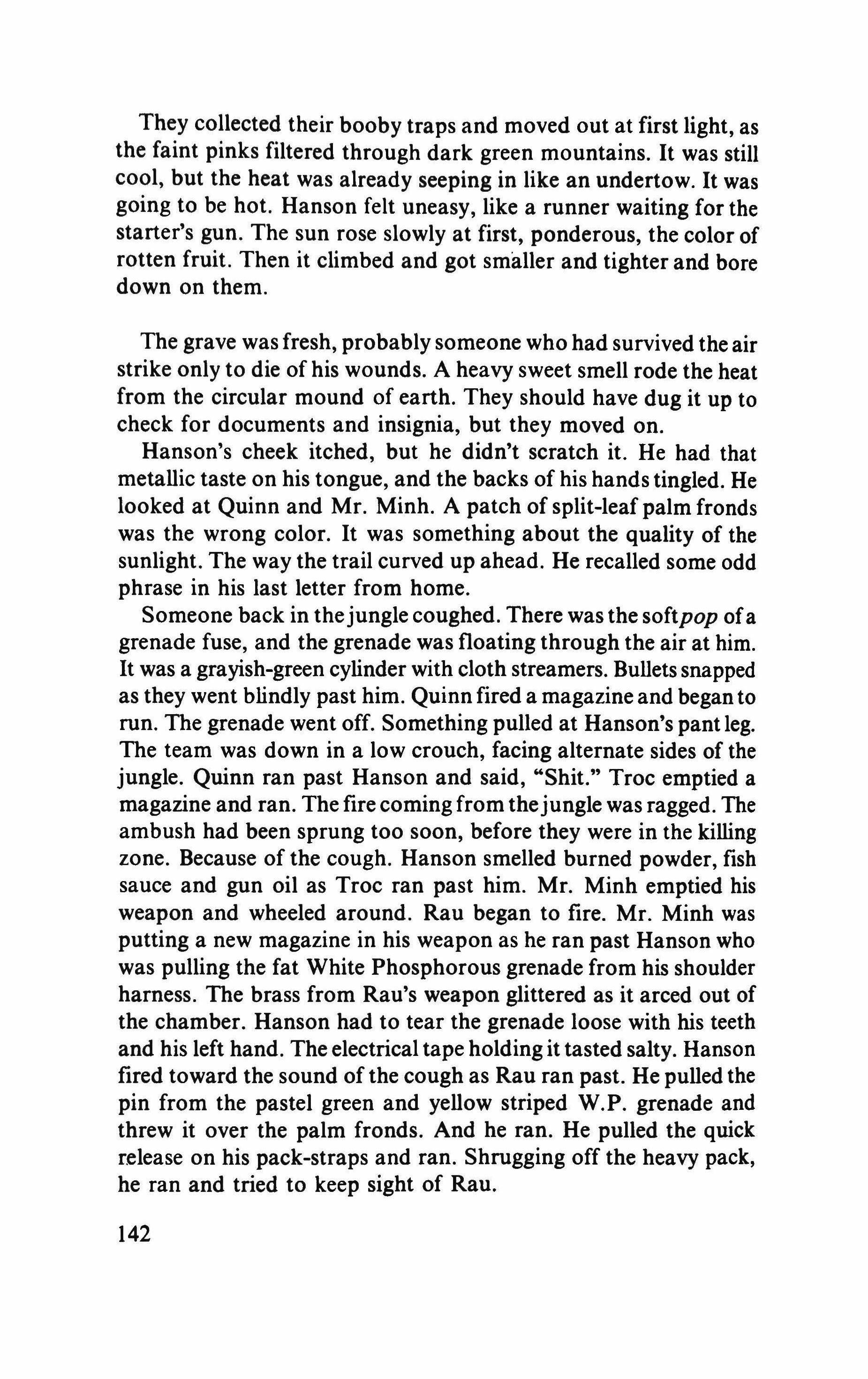
They collected their booby traps and moved out at first light, as the faint pinks filtered through dark green mountains. It was still cool, but the heat was already seeping in like an undertow. It was going to be hot. Hanson felt uneasy, like a runner waiting for the starter's gun. The sun rose slowly at first, ponderous, the color of rotten fruit. Then it climbed and got smaller and tighter and bore down on them.
The grave was fresh, probably someone who had survived the air strike only to die of his wounds. A heavy sweet smell rode the heat from the circular mound of earth. They should have dug it up to check for documents and insignia, but they moved on.
Hanson's cheek itched, but he didn't scratch it. He had that metallic taste on his tongue, and the backs of his hands tingled. He looked at Quinn and Mr. Minh. A patch of split-leafpalm fronds was the wrong color. It was something about the quality of the sunlight. The way the trail curved up ahead. He recalled some odd phrase in his last letter from home.
Someone back in thejungle coughed. There was the softpop of a grenade fuse, and the grenade was floating through the air at him. It was a grayish-green cylinder with cloth streamers. Bullets snapped as they went blindly past him. Quinn fired a magazine and began to run. The grenade went off. Something pulled at Hanson's pant leg. The team was down in a low crouch, facing alternate sides of the jungle. Quinn ran past Hanson and said, "Shit." Troc emptied a magazine and ran. The fire coming from thejungle was ragged. The ambush had been sprung too soon, before they were in the killing zone. Because of the cough. Hanson smelled burned powder, fish sauce and gun oil as Troc ran past him. Mr. Minh emptied his weapon and wheeled around. Rau began to fire. Mr. Minh was putting a new magazine in his weapon as he ran past Hanson who was pulling the fat White Phosphorous grenade from his shoulder harness. The brass from Rau's weapon glittered as it arced out of the chamber. Hanson had to tear the grenade loose with his teeth and his left hand. The electrical tape holding it tasted salty. Hanson fired toward the sound of the cough as Rau ran past. He pulled the pin from the pastel green and yellow striped W.P. grenade and threw it over the palm fronds. And he ran. He pulled the quick release on his pack-straps and ran. Shrugging off the heavy pack, he ran and tried to keep sight of Rau.
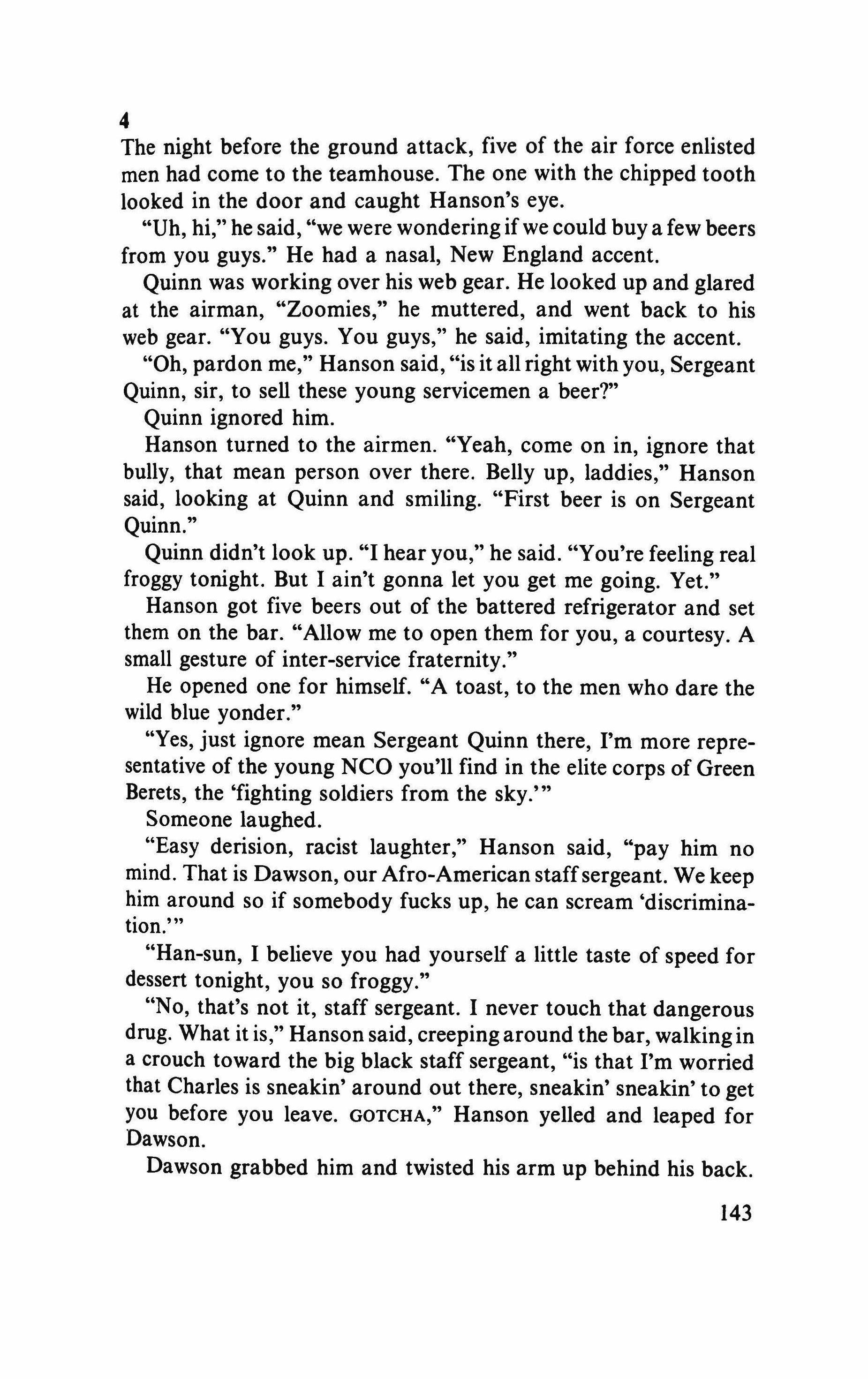
The night before the ground attack, five of the air force enlisted men had come to the teamhouse. The one with the chipped tooth looked in the door and caught Hanson's eye.
"Uh, hi," he said, "we were wondering if we could buy a few beers from you guys." He had a nasal, New England accent.
Quinn was working over his web gear. He looked up and glared at the airman, "Zoornies," he muttered, and went back to his web gear. "You guys. You guys," he said, imitating the accent.
"Oh, pardon me," Hanson said, "is it all right with you, Sergeant Quinn, sir, to sell these young servicemen a beer?"
Quinn ignored him.
Hanson turned to the airmen. "Yeah, come on in, ignore that bully, that mean person over there. Belly up, laddies," Hanson said, looking at Quinn and smiling. "First beer is on Sergeant Quinn."
Quinn didn't look up. "I hear you," he said. "You're feeling real froggy tonight. But 1 ain't gonna let you get me going. Yet."
Hanson got five beers out of the battered refrigerator and set them on the bar. "Allow me to open them for you, a courtesy. A small gesture of inter-service fraternity."
He opened one for himself. "A toast, to the men who dare the wild blue yonder."
"Yes, just ignore mean Sergeant Quinn there, I'm more representative of the young NCO you'll find in the elite corps of Green Berets, the 'fighting soldiers from the sky.'"
Someone laughed.
"Easy derision, racist laughter," Hanson said, "pay him no mind. That is Dawson, our Afro-American staffsergeant. We keep him around so if somebody fucks up, he can scream 'discrimination.'"
"Han-sun, 1 believe you had yourself a little taste of speed for dessert tonight, you so froggy."
"N0, that's not it, staff sergeant. 1 never touch that dangerous drug. What it is," Hanson said, creeping around the bar, walking in a crouch toward the big black staff sergeant, "is that I'm worried that Charles is sneakin' around out there, sneakin' sneakin' to get you before you leave. GOTCHA," Hanson yelled and leaped for Dawson.
Dawson grabbed him and twisted his arm up behind his back.
143
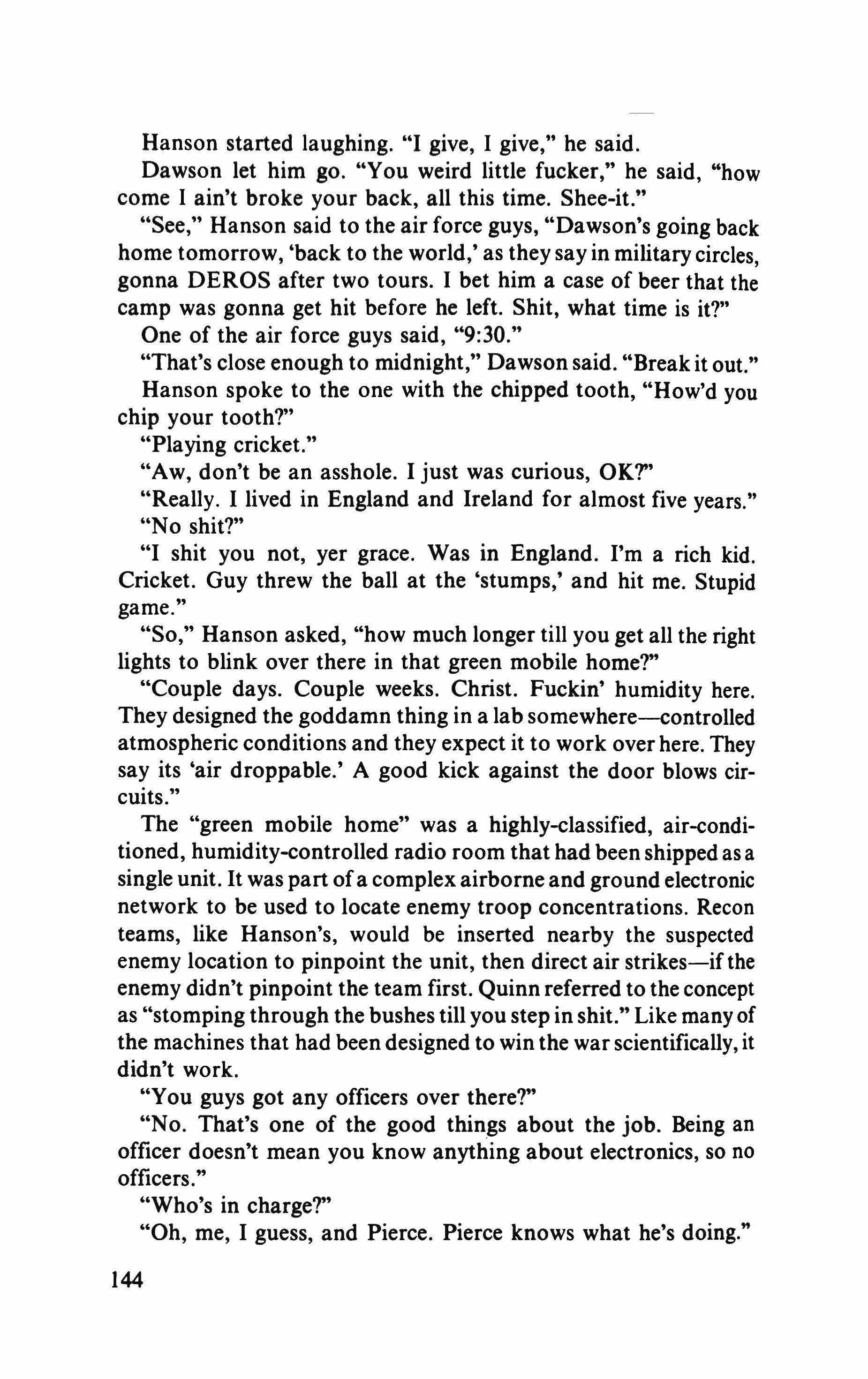
Hanson started laughing. "I give, I give," he said.
Dawson let him go. "You weird little fucker," he said, "how come I ain't broke your back, all this time. Shee-it."
"See," Hanson said to the air force guys, "Dawson's going back home tomorrow, 'back to the world,' as they say in militarycircles, gonna DEROS after two tours. I bet him a case of beer that the camp was gonna get hit before he left. Shit, what time is it?"
One of the air force guys said, "9:30."
"That's close enough to midnight," Dawson said. "Break it out."
Hanson spoke to the one with the chipped tooth, "How'd you chip your tooth?"
"Playing cricket."
"Aw, don't be an asshole. I just was curious, OK?"
"Really. I lived in England and Ireland for almost five years."
"No shit?"
"I shit you not, yer grace. Was in England. I'm a rich kid. Cricket. Guy threw the ball at the 'stumps,' and hit me. Stupid game."
"So," Hanson asked, "how much longer till you get all the right lights to blink over there in that green mobile home?"
"Couple days. Couple weeks. Christ. Fuckin' humidity here. They designed the goddamn thing in a lab somewhere-controlled atmospheric conditions and they expect it to work over here. They say its 'air droppable.' A good kick against the door blows circuits."
The "green mobile home" was a highly-classified, air-conditioned, humidity-controlled radio room that had been shipped as a single unit. It was part of a complex airborne and ground electronic network to be used to locate enemy troop concentrations. Recon teams, like Hanson's, would be inserted nearby the suspected enemy location to pinpoint the unit, then direct air strikes-ifthe enemy didn't pinpoint the team first. Quinn referred to the concept as "stompingthrough the bushes till you step in shit." Like many of the machines that had been designed to win the war scientifically, it didn't work.
"You guys got any officers over there?"
"No. That's one of the good things about the job. Being an officer doesn't mean you know anything about electronics, so no officers.
"Who's in charge?"
"Oh, me, I guess, and Pierce. Pierce knows what he's doing."

"Standard question," Hanson said, "what you doin' over here?"
"Like I said, I'm a rich kid. I fucked around over in England and Ireland when I should have been in school. I got a draft notice and, being a bright lad, I figured four years in the air force beats two in the infantry, so I enlisted."
"No. I mean here, in 'Nam. How bad did you have to fuck up to get sent over here?"
"I volunteered. See, you never been an electronics NCO at Brandenburg AFB, so you can't know. I had to sit in this room all day. There was a neon light over my desk that made this tiny little drone all day long. Nothing to do really. I used to sit under that goddamn light trying to look busy. I was doing dialectics, you know, spending hours debating things with an imaginary opponent. You know, discussing the relative merits of two different kinds of radarscope image-configuration. I was going nuts. Thought pretty soon I'd end up like Nietzsche, throw my arms around a horse's neck and cry, 'Oh, my brother.' So I decided to come and take a look at Vietnam. Is it really like the 6:30 news?"
"Cook's tour of the war," Hanson said. "OK."
They drank in silence for a few minutes, then Hanson looked up at the ceiling and said in a monotone, "Uh, this is Defcon, Bodycount."
Quinn was polishing the bolt of his Swedish K. "Bodycount, this is Defcon, do you copy, over."
Still polishing the bolt, Quinn said, "Uh, roger-roger, Defcon, I copy five by five, over."
"What is our situation here, Bodycount? Do we have Max H&I concentrations this location? Please affirm."
"That is most affirmed. Max H&1. Firebase Bruise and Peggylee on call with selected ordinance to include Willy Pete, HE, Uh, Photoflash, flare, BLU-I0 Bravo Firecracker, and nonpersistent �N nausea, and smoke. One oh fives, one five fives, and eight Inch."
"Uh, roger Bodycount. Have you made contact with Colonel Fang's Phantom battalion and, ifso, have you deployed as planned, Op-plan C73-Tango?"
"That is most affirmed, Defcon."
"Real fine, Bodycount. We have the Zoomie mobile home here calibrated to the X-oh-A system for VHF and UHF capabilities� You may anticipate Max saturation, your location."
"Roger that, Defcon."
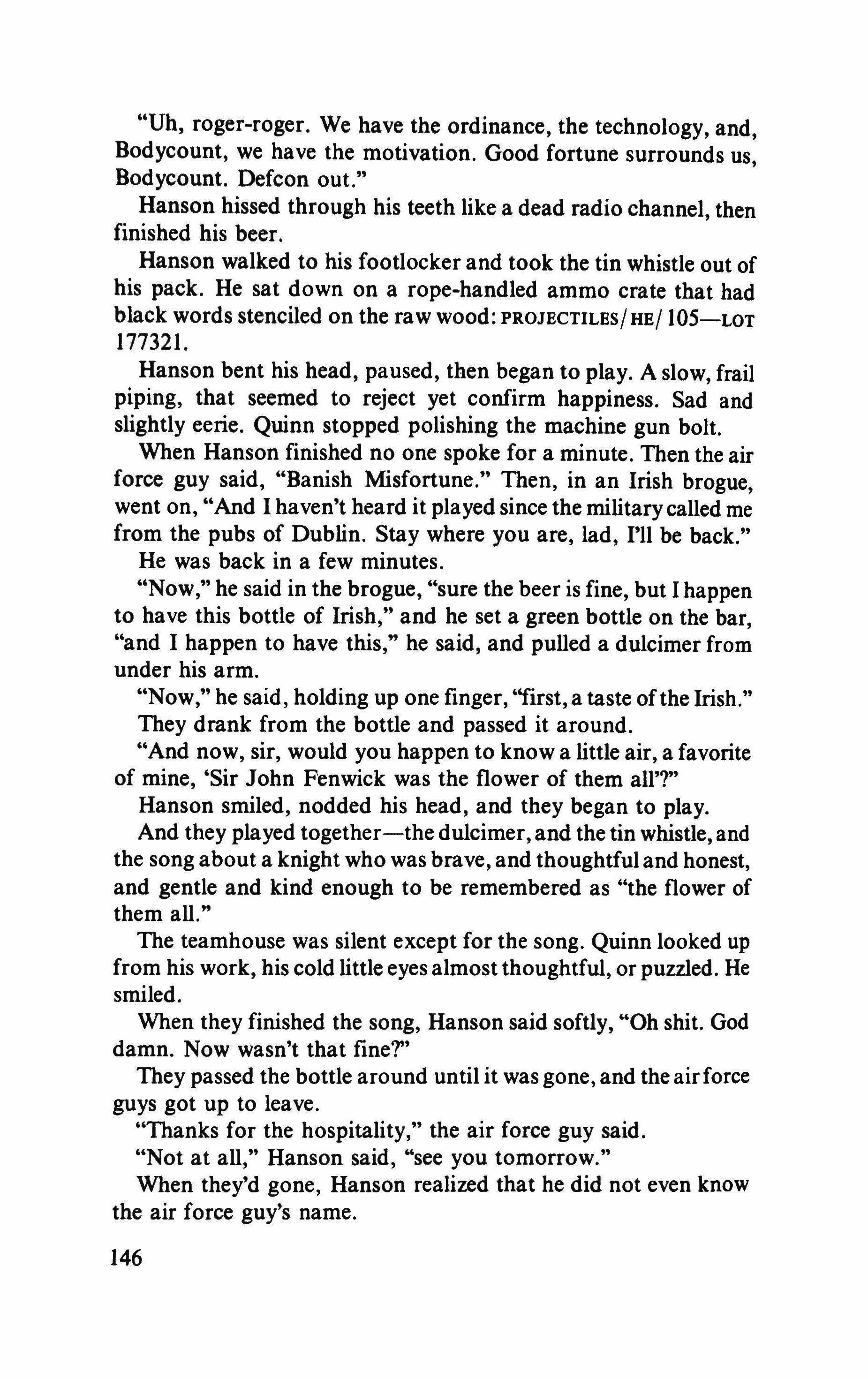
"Uh, roger-roger. We have the ordinance, the technology, and, Bodycount, we have the motivation. Good fortune surrounds us, Bodycount. Defcon out."
Hanson hissed through his teeth like a dead radio channel, then finished his beer.
Hanson walked to his footlocker and took the tin whistle out of his pack. He sat down on a rope-handled ammo crate that had black words stenciled on the raw wood: PROJECTILES/HE/ lOS-LOT 177321.
Hanson bent his head, paused, then began to play. A slow, frail piping, that seemed to reject yet confirm happiness. Sad and slightly eerie. Quinn stopped polishing the machine gun bolt.
When Hanson finished no one spoke for a minute. Then the air force guy said, "Banish Misfortune." Then, in an Irish brogue, went on, "And I haven't heard it played since the militarycalled me from the pubs of Dublin. Stay where you are, lad, I'll be back."
He was back in a few minutes.
"Now," he said in the brogue, "sure the beer is fine, but I happen to have this bottle of Irish," and he set a green bottle on the bar, "and I happen to have this," he said, and pulled a dulcimer from under his arm.
"Now," he said, holding up one finger, ''first, a taste ofthe Irish." They drank from the bottle and passed it around.
"And now, sir, would you happen to know a little air, a favorite of mine, 'Sir John Fenwick was the flower of them all'?"
Hanson smiled, nodded his head, and they began to play. And they played together-the dulcimer, and the tin whistle, and the song about a knight who was brave, and thoughtful and honest, and gentle and kind enough to be remembered as "the flower of them all."
The teamhouse was silent except for the song. Quinn looked up from his work, his cold little eyes almost thoughtful, or puzzled. He smiled.
When they finished the song, Hanson said softly, "Oh shit. God damn. Now wasn't that finer'
They passed the bottle around until it was gone, and the airforce guys got up to leave.
"Thanks for the hospitality," the air force guy said.
"Not at all," Hanson said, "see you tomorrow."
When they'd gone, Hanson realized that he did not even know the air force guy's name.
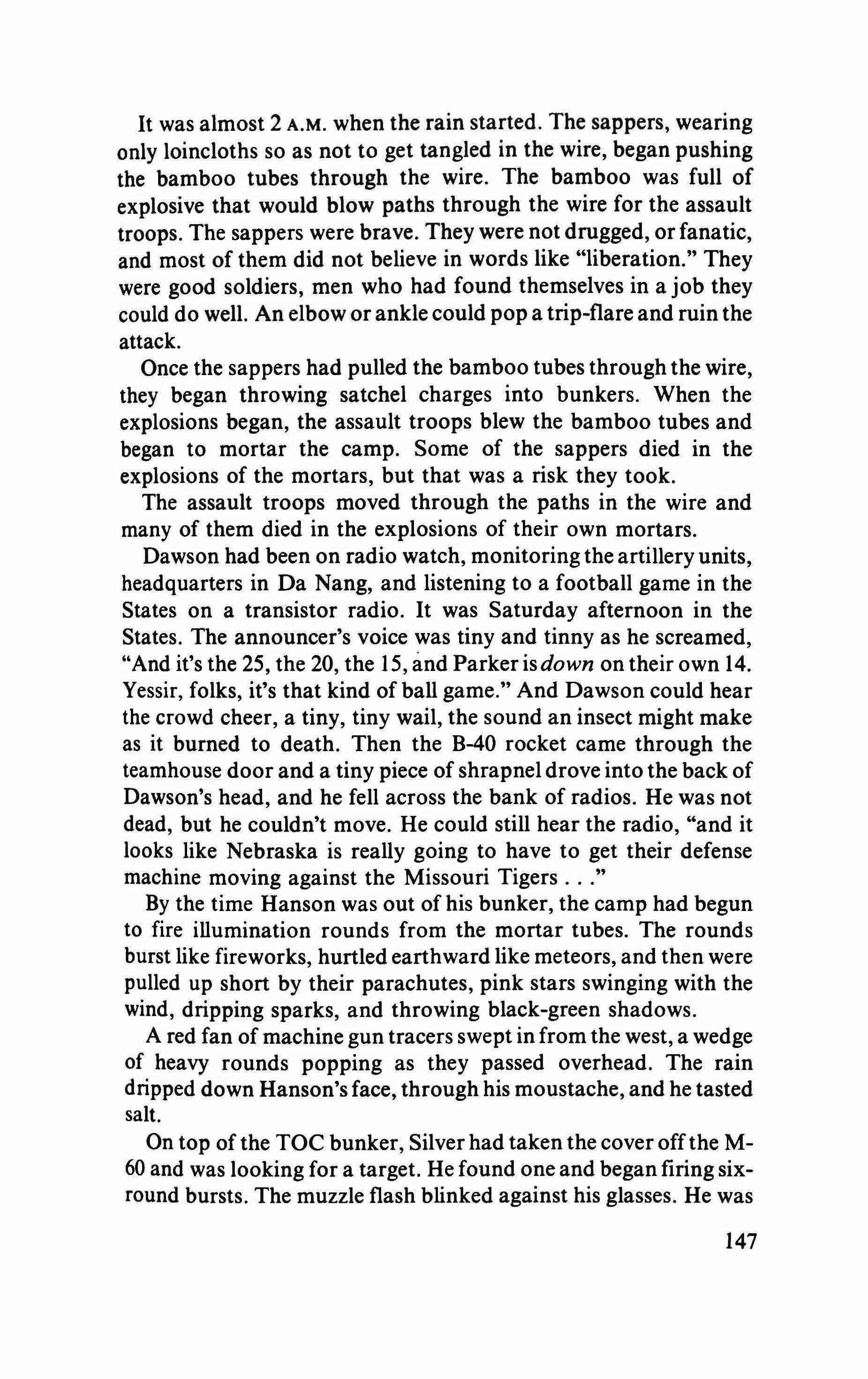
It was almost 2 A.M. when the rain started. The sappers, wearing only loincloths so as not to get tangled in the wire, began pushing the bamboo tubes through the wire. The bamboo was full of explosive that would blow paths through the wire for the assault troops. The sappers were brave. They were not drugged, or fanatic, and most of them did not believe in words like "liberation." They were good soldiers, men who had found themselves in a job they could do well. An elbow or ankle could pop a trip-flare and ruin the attack.
Once the sappers had pulled the bamboo tubes through the wire, they began throwing satchel charges into bunkers. When the explosions began, the assault troops blew the bamboo tubes and began to mortar the camp. Some of the sappers died in the explosions of the mortars, but that was a risk they took.
The assault troops moved through the paths in the wire and many of them died in the explosions of their own mortars.
Dawson had been on radio watch, monitoring the artilleryunits, headquarters in Da Nang, and listening to a football game in the States on a transistor radio. It was Saturday afternoon in the States. The announcer's voice was tiny and tinny as he screamed, "And it's the 25, the 20, the 15, and Parker isdown on their own 14. Yessir, folks, it's that kind of ball game." And Dawson could hear the crowd cheer, a tiny, tiny wail, the sound an insect might make as it burned to death. Then the B-40 rocket came through the teamhouse door and a tiny piece of shrapnel drove into the back of Dawson's head, and he fell across the bank of radios. He was not dead, but he couldn't move. He could still hear the radio, "and it looks like Nebraska is really going to have to get their defense machine moving against the Missouri Tigers
By the time Hanson was out of his bunker, the camp had begun to fire illumination rounds from the mortar tubes. The rounds burst like fireworks, hurtled earthward like meteors, and then were pulled up short by their parachutes, pink stars swinging with the wind, dripping sparks, and throwing black-green shadows.
A red fan of machine gun tracers swept in from the west, a wedge of heavy rounds popping as they passed overhead. The rain dripped down Hanson's face, through his moustache, and he tasted salt.
On top of the Toe bunker, Silver had taken the cover offthe M60 and was looking for a target. He found one and beganfiring sixround bursts. The muzzle flash blinked against his glasses. He was

wearing a bandanna. The recoil of the M-60 pulled at his T-shirt like a heavy wind, puffing it out at the small of his back, plastering it against his ribs.
Hanson yelled, "Get some, Silver," and without turning his head, Silver pumped his fist up and down.
Way out on the southwest corner of the wire a trip-flare burst silver glare and dense white smoke. Hanson thought he could hear it burning with a wet sputter, but of course it was too far away to hear. Then, at the point of the camp nearest the trip-flare, he could make out the hesitant popping of a small gasoline engine being started. The popping rose and steadied into a cheerful little popping like a lawn mower on Saturday afternoon. The small gasoline engine is the power source for the quad-fifty machine gun. Hanson paused, staring through the dark and rain toward the sound.
The gun suddenly showed itselflike a movingpicture flashing on a dark screen, the sound turned all the way up. The linked brass rounds flickered in the muzzle flash, snaking toward the gray slab of the breech block. The gun crew moved in the strobe light ofthe four barrels like silent comedy stars trying to do something hilarious and impossible while there was still time. The crew kept feeding cans of ammo to the gun as the four barrels wove tracers smoothly crossing and recrossing the perimeter. One ofthe barrels burned out and raveled the pattern with a mad counterpoint of plunging rounds.
And Hanson crossed toward the four-deuce mortar position where he knew he would find Quinn, moving in a clumsy lope, heavy web gear shifting and pulling at him, weapon down in a low port arms. He saw a thin, naked man in the wire and fired at him. Pink flares, red and green tracers reflected in puddles and across tin roofs.
At dawn it was like the morning after a bad fire, everything burned and sodden. The time when people sort through the debris for whatever might be left.
They found Sergeant Major first. In the ditch. Hanson looked and realized that all the wounds were AK rounds. No frags or mortars. What that meant was that while Sergeant Major was walking-and he had to have known it-the other people were firing aimed rounds at him. It wasn't a chance frag, it was walking back and forth like walking in front of a firing squad. He remem-
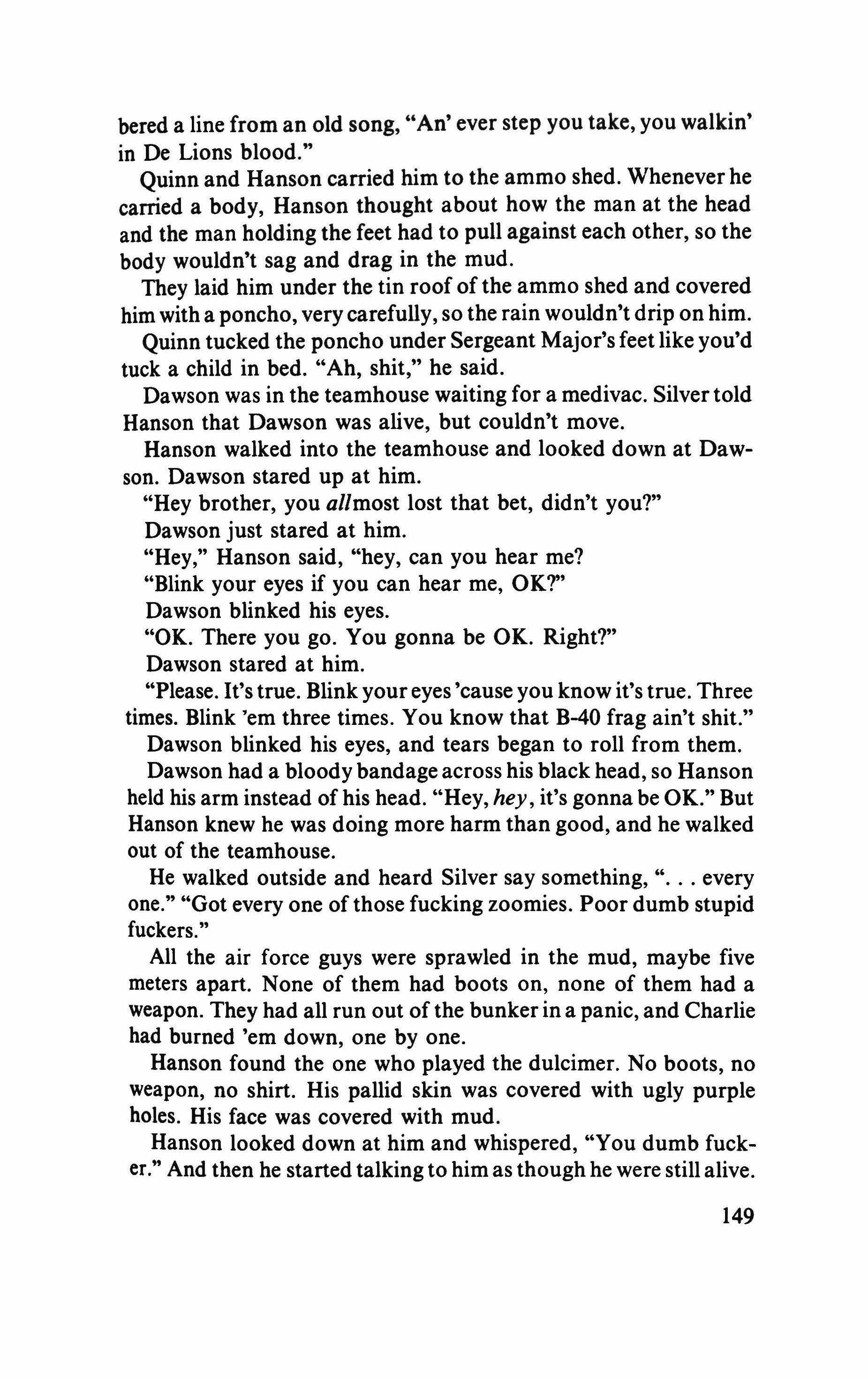
bered a line from an old song, "An' ever step you take, you walkin' in De Lions blood."
Quinn and Hanson carried him to the ammo shed. Whenever he carried a body, Hanson thought about how the man at the head and the man holding the feet had to pull against each other, so the body wouldn't sag and drag in the mud.
They laid him under the tin roof of the ammo shed and covered him with a poncho, very carefully, so the rain wouldn't drip on him.
Quinn tucked the poncho under Sergeant Major's feet like you'd tuck a child in bed. "Ah, shit," he said.
Dawson was in the teamhouse waiting for a medivac. Silver told Hanson that Dawson was alive, but couldn't move.
Hanson walked into the teamhouse and looked down at Dawson. Dawson stared up at him.
"Hey brother, you aI/most lost that bet, didn't you?"
Dawson just stared at him.
"Hey," Hanson said, "hey, can you hear me?
"Blink your eyes if you can hear me, OK?"
Dawson blinked his eyes.
"OK. There you go. You gonna be OK. Right?"
Dawson stared at him.
"Please. It's true. Blink your eyes 'cause you know it's true. Three times. Blink 'em three times. You know that B-40 frag ain't shit."
Dawson blinked his eyes, and tears began to roll from them.
Dawson had a bloody bandage across his black head, so Hanson held his arm instead of his head. "Hey, hey, it's gonna be OK." But Hanson knew he was doing more harm than good, and he walked out of the teamhouse.
He walked outside and heard Silver say something, every one." "Got every one of those fucking zoomies. Poor dumb stupid fuckers."
All the air force guys were sprawled in the mud, maybe five meters apart. None of them had boots on, none of them had a weapon. They had all run out of the bunker in a panic, and Charlie had burned 'em down, one by one.
Hanson found the one who played the dulcimer. No boots, no weapon, no shirt. His pallid skin was covered with ugly purple holes. His face was covered with mud.
Hanson looked down at him and whispered, "You dumb fucker." And then he started talking to him as though he were still alive.

"Youstupid shit. What did you come over here for? To 'seethe war,' right. You ever learn how to shoot that silly ass M-16? They ever take time to teach you that? They ever tell you that there's a lot of people over here who are trying to kill you for no good goddamn reason at all? You and that dumbass electric mobile home that doesn't work anyway.
"Aw, man. Aw, man," Hanson was sobbing now, "just when I think I got things figured out, some shit like this has to happen. "Banish Misfortune, what a crock of shit."
Quinn had walked up behind Hanson. Hanson spun on him. "Fuck off, Quinn. Just fuck off. I don't want to know you any more. You ain't my friend no more. I don't want any more friends. Fuck 'em. All they do is die. Just get the fuck awayfrom me, OK?"
Quinn looked at Hanson and said, "Yeah," and walked off.
Hanson almost threw his rifle into the mud, but he was too welltrained to do that. "Fuckin' air force," he said.
By then the 5th Mech tanks had gotten there and were setting up around the perimeter. Naked sappers still hung in the wire likedead fish. One of the tankers had put a cigarette in the mouth of a dead sapper, and had his arm around the body. Another tanker was taking his picture with an Instamatic. Hanson knocked him down and stomped on the camera. Hanson turned his rifle on the other tanker and said, "I'll kill you, man. You ain't got the right to do that. You ain't got the right." The tears had made lines through the mud and sweat on Hanson's cheeks.
Hanson walked past a tank. The crew members looked at him funny. Hanson still didn't realize that he was crying. One of them said, "Guess it must have been rough, huh?"
Hanson looked at him. The tanker was just trying to say something to help.
Hanson nodded his head, "Yeah," and for most of the day he denied the King of the Red Branch Kings, and Cuchulainn, and that Sir John Fenwick was the flower of them all.
He heard the medivac come thudding in for Dawson.
A few hours later he walked into the teamhouse. Quinn was cleaning his rifle. He looked up, then back down at his rifle.
"Hey," Hanson said, "Quinn, buy you a beer?"
Quinn looked up and smiled. "Never turned down a free beer, have I?"
Sisters
Erik S. Hansen
Not far from the storybookcity ofLuxembourg, near the village of Hamm, there is a cemetery ringed by a high marble wall. A country road leads up to the heavy swinging gates at the entrance. As you approach from a distance, you notice a huge, gold-leafed eagle above the gates. Its wings are spread in half-suspended flight; at close range it appears the eagle's claws have become entangled in the wrought-iron tracery of the archway and cannot be pulled free. It seems to be struggling-and losing. It does not get away. It is frozen in gold.
Beyond this guarded portal, within the ringed enclosure of the wall, stand ten thousand marble crosses. An American soldier lies buried beneath each one. Patton had himself buried there, too, alongside his men.
The white crosses stand out in sharp relief against the green of the grass.
The cemetery at Hamm is a quiet place on a summer day. The shade trees-cypress and poplar-line the walkways and there are benches for the foot-weary visitor. It is very still. The only intrusion from the world outside the marble wall comes from the airport nearby. Jet planes fly over as they lift out of tiny Luxembourg.

Otherwise, both present and future are excluded. Here the past is made vivid and real and memory outlives oblivion.
I had been to this cemetery once before, some four years prior to the summer when I considered visiting it again. At the time I thought it was the right place for my confession. I could have walked, like I did the first time, out of the city on the same country road. I could have counted off at least a hundred headstones all bearing the same date of death, December 21, 1944, the day I was born. I could have said aloud, "This is where it ends. Here the cycle is broken. I will not go off to be buried in some foreign field so that on the same day an American infant can be born to take my place. I won't go."
But at that moment I was alreadyboarding a return flight to New York at the nearby airport. Oh yes, I hesitated for several minutes on that departure ramp in Luxembourg. But it was not long before I was lifted high over the American cemetery at Hamm. From the air the marble wall is hidden in the trees, as is the eagle caught on the gates. The crosses are so small they meld togetherinto a field of white clover.
The train had left Copenhagen in the early morning,joining the night coaches ofthe southbound Paris Express from Stockholm. It was August, and the summer of strawberries and red wine was ending.
I had said my goodbyes to relatives and friends. I would see them all again, I assured them, assured myself. Agimpy, rheumaticgreatuncle going on eighty-five must not have believed me, or perhaps believed I would not see him again, for he came down to the station on his own at six in the morning to see me off. He rapped his knuckles hard against the window glass; he was out ofbreath from going the length ofthe platform trying to find me and had difficulty talking. We had time for only a few words, anyway. The coaches were sealed up, the doors slamming shut like dominoes falling in a row. I leaned out the window and waved as the train pulled away. Uncle Peter stood with his cap curled up in his hands, as if he had just entered a church.
When the station was out ofsight, I returned to my seat and must have watched the factories and streets of the city glide by, then the high-rises of the outskirts, the neat suburban villas, and the first of the countryside villages. The train swept on nonstop across southern Denmark. It did not stop until it arrived in the Baltic port for

the sea link to the German mainland. I expected to carry my bags offthe train and onto the ferry, but instead the locomotive quickly uncoupled and nosed the passenger coaches aboard the vessel. Only then were the doors opened and travelers allowed out on deck. By the time I made it to the salon, the ferry was churning backwards away from the harbor pier.
Some things are easier to remember than others. I should have remembered every mile of the Danish countryside that morning. I must have tried to fix it in my mind. In spite of all the assurances I had given about an eventual return to Denmark-"Look for me next year, or the year after that," I told everyone-I don't think I was very persuasive. Uncle Peter obviously hadn't believed me. He made sure he had a proper goodbye. And I should have been taking leave of Denmark the same way, solidifying a last image in my mind. "Denmark like a rune stone
I remember nothing permanent from the first hours ofthat train ride. Nothing at all, in fact. Except this. At one point I went down the corridor to the w.c. It was occupied. I waited in the hall, outside the last compartment. Inside, next to the window, a young woman was talking to a man considerably older than herself. Suddenly, she stopped talking, turned, and looked directly at me. She smiled. Some things are easy to remember.
Later, as I sat in the salon on the ferry to Germany, I noticed her again. She was out on the boat deck, walking the promenade. She wore a blue and yellow tweed suit and went arm-in-arm with the older man from the train. I immediately identified him as her German lover. He looked like a German lover, a Mercedes in a suit. Sleek and clean-shaven and solid. She looked young and vulnerable. They entered the dining salon and sat down on the starboard side. This time I don't think she saw me, or looked my way, or smiled. Not once.
In Putgarten the train was trundled off the ferry and recoupled, joined with more coaches bound for Paris. I returned to my compartment and unfolded a Danish newspaper. That summer the news was mostly bad: the war, street riots, more assassinations. I don't think I read very long. Moments later the door opened. It was the woman in yellow and blue, minus her German lover.
Perhaps she saw the Scandinavian paper, for she did not hesitate to speak in Swedish and asked if the seats opposite me were taken. That might have been it all along-how Swedish she looked. Rangy, blond, poised. The blue and yellow suit. And now she was
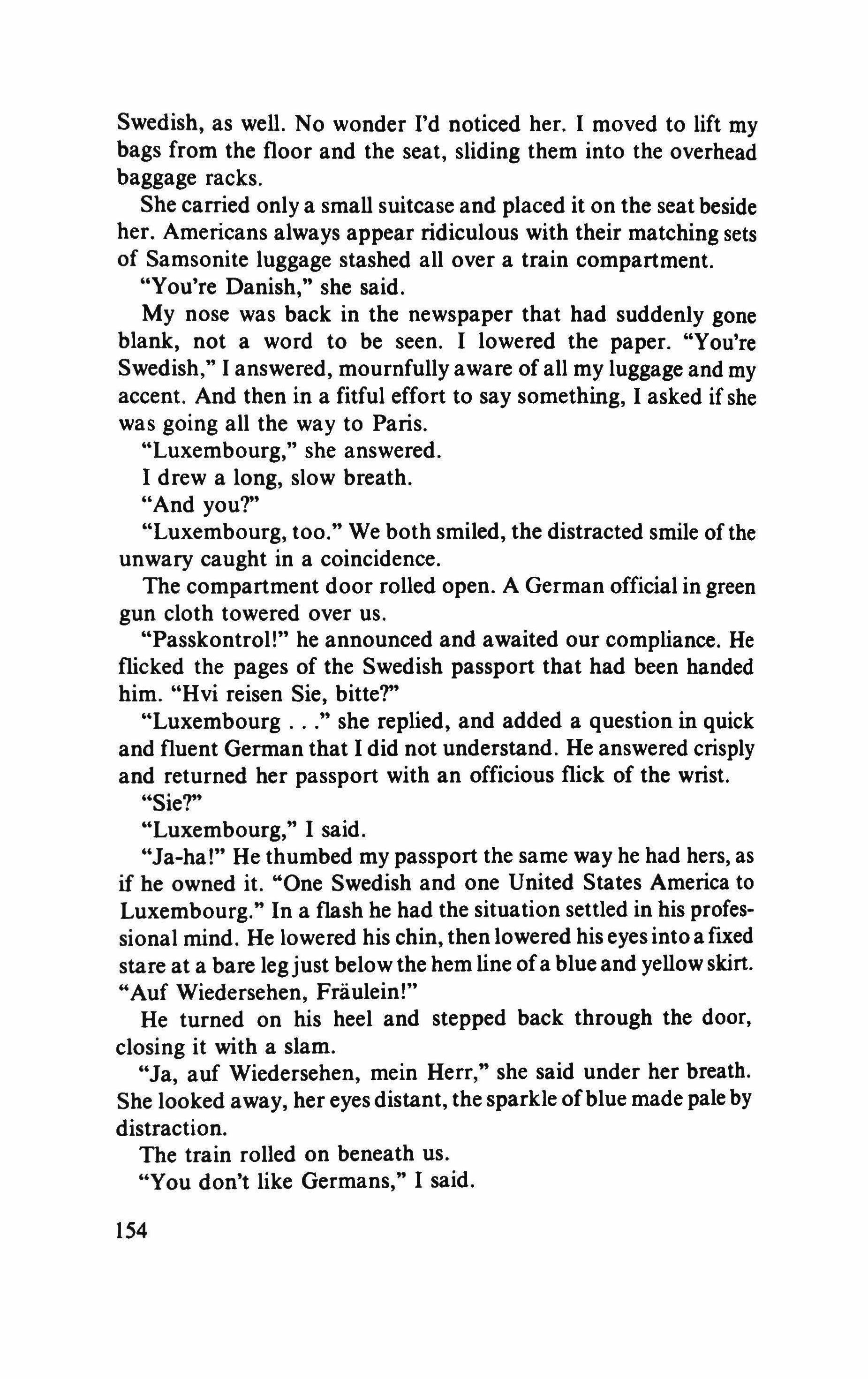
Swedish, as well. No wonder I'd noticed her. I moved to lift my bags from the floor and the seat, sliding them into the overhead baggage racks.
She carried only a small suitcase and placed it on the seat beside her. Americans always appear ridiculous with their matching sets of Samsonite luggage stashed all over a train compartment.
"You're Danish," she said.
My nose was back in the newspaper that had suddenly gone blank, not a word to be seen. I lowered the paper. "You're Swedish," I answered, mournfully aware of all my luggage and my accent. And then in a fitful effort to say something, I asked if she was going all the way to Paris.
"Luxembourg," she answered.
I drew a long, slow breath.
"And you?"
"Luxembourg, too." We both smiled, the distracted smile ofthe unwary caught in a coincidence.
The compartment door rolled open. A German official in green gun cloth towered over us.
"Passkontrol!" he announced and awaited our compliance. He flicked the pages of the Swedish passport that had been handed him. "Hvi reisen Sie, bitte?"
"Luxembourg she replied, and added a question in quick and fluent German that I did not understand. He answered crisply and returned her passport with an officious flick of the wrist.
"Sie?"
"Luxembourg," I said.
"Ja-ha!" He thumbed my passport the same way he had hers, as if he owned it. "One Swedish and one United States America to Luxembourg." In a flash he had the situation settled in his professional mind. He lowered his chin, then lowered his eyes into a fixed stare at a bare legjust below the hem line of a blue and yellow skirt. "Auf Wiedersehen, Fraulein!"
He turned on his heel and stepped back through the door, closing it with a slam.
"Ja, auf Wiedersehen, mein Herr," she said under her breath. She looked away, her eyes distant, the sparkle ofblue made pale by distraction.
The train rolled on beneath us.
"You don't like Germans," I said.

She shook her head. "It's not that. It's nothing." She still looked away.
"I saw you on the ferry," 1 said. "You were walking with someone."
"You're very observant."
1 waited to hear if she would add more.
"That was my father," she noted quietly.
1 felt a prickle of relief. "I thought he was a German."
"He is German." That amused, secretive smile formed again on her lips, as she turned her eyes back to meet mine, but her eyes seemed sadder than her smile and it was hard to tell which told the truth, those blue eyes or that shy smile. "You're not Danish, are you?" she said.
"American," 1 answered.
We talked awhile after that, but she said little about herself. Her name was Kaja; she worked for an airline flying vacation charters to the Mediterranean; Luxembourg was her home base; and she had to meet a flight the following day, about the same time 1 was scheduled to leave. Later she slept, resting her hand against her cheek. Perhaps 1 dozed off as well. She shifted in her seat once, her bare foot coming to rest against mine, and I did not try to move it away.
In Cologne we had lunch together in the Hofbahnhaus cafeteria. It wasn't planned that way. She was still sleeping when the train stopped in the station to add more coaches. During the thirtyminute break I went inside the terminal to eat. It was not long before she entered and sat at an adjoining table. I was jotting on one of those final postcards and pretended not to notice.
"I hope I'm not disturbing you," she said.
"I thought maybe I was disturbingyou." We were suddenly timid again in the new surroundings, as if meeting for the first time.
"Then we should sit together," she decided. She moved in next to me. "I won't fall asleep on you again," she said, making her apology simple and effective, even if it was unneeded.
We ate a moment in silence, testing the new position, side by side, not opposite as on the train.
"Question. If you're a stewardess, why not fly to Luxembourg? Why the train ride?"
"I will tell you a secret," she said between sips of coffee from the tiny porcelain cup. "I don't like to fly."

"You're joking."
"Maybe," she smiled. She was wide-awake now after the long nap on the train and evidently refreshed. "I wanted to come down with my father."
"He's afraid to fly," I laughed.
"Sailors are only at home on the sea, as he puts it."
"He's a sailor."
"A ship's captain, yes."
"And German."
"Yes. He lives in Putgarten."
"If he's German, how are you Swedish?" I asked.
"My mother is Swedish and I am Swedish. Myfatheris German. They met in Stockholm during the war. It didn't last very long. Politics always kept them apart, though not until after they had me. That's why I can be apolitical. I came by it naturally, rightfrom the start." Except for the last remark- she dismissed it as Swedish humor-she spelled out these facts concisely, as if intending them to explain everything there was to know of her life, making it uneventful and uncomplicated. She would say something serious and then look away or make light of it. But to me, this only seemed to make her life more complicated; a riddle, even.
"Are you really apolitical?" I asked.
"I'm Swedish," she laughed. "We're always neutral."
"In Sweden-our American war is not very popular right now."
"It's not very popular in America either, is it?" she asked directly.
"I guess not," I said. "Maybe you ought to know, that's kind of why I'm going back. The draft and everything." I'd been wondering whether I even ought to bother telling her this or, rather, how to tell her. Actually, I liked telling her. It was an easy way to get some sympathy and attention.
Her response was both sympathetic and attentive, but it was not pitying. I think I'd hoped for a little pity.
She asked, "Would you rather stay here?"
Right then it seemed like a good idea again. Who wouldn't rather ride trains around Europe in the company of a Swedish escort? But the old arguments came out: If I didn't go, what about the man called to take my place? And if I really did oppose the war, wouldn't my opposition really come to nothing unless it were voiced within the system?
She didn't argue one side or the other, but simply listened. When
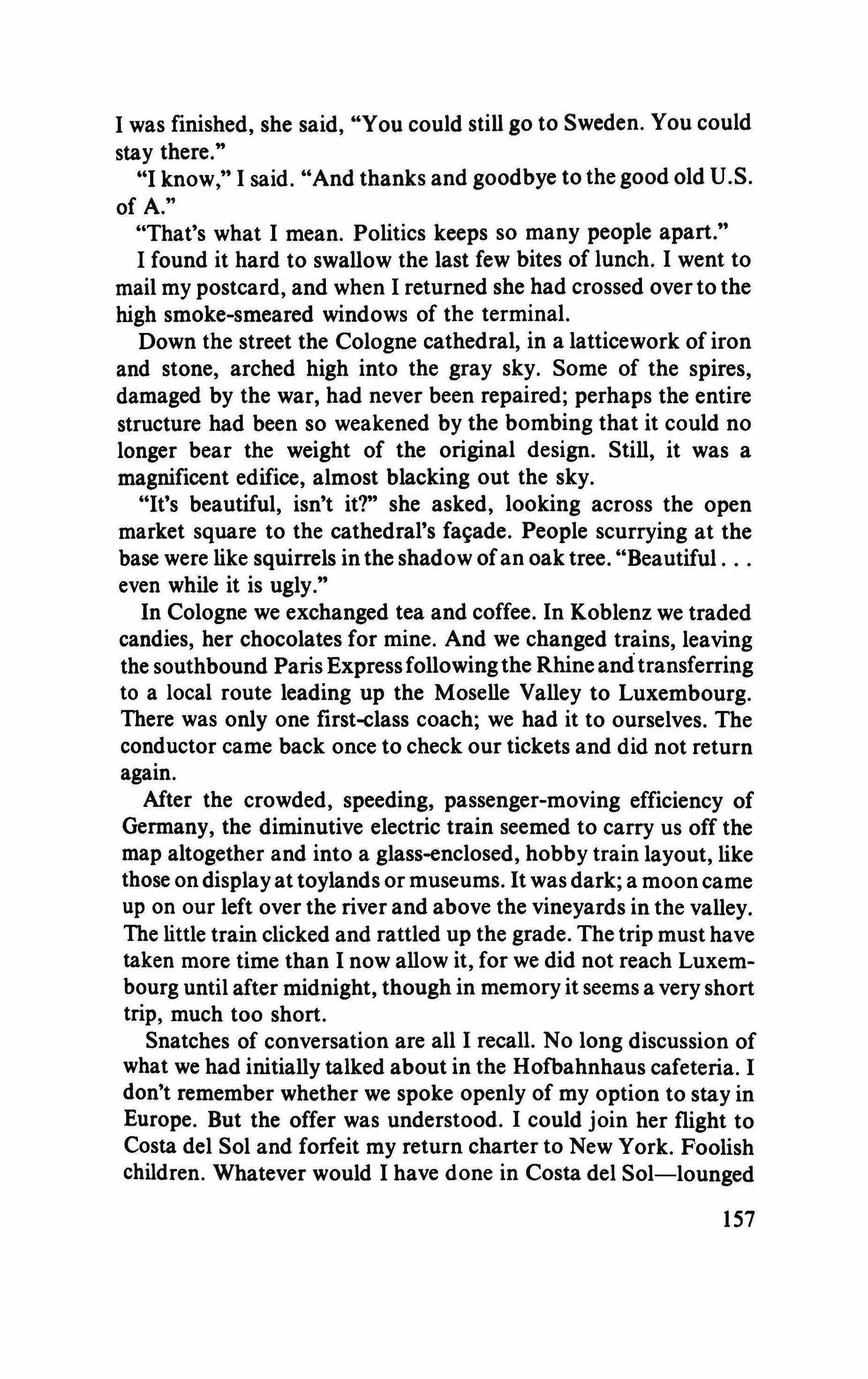
I was finished, she said, "You could still go to Sweden. You could stay there."
"I know," I said. "And thanks and goodbye to the good old U.S. of A."
"That's what I mean. Politics keeps so many people apart."
I found it hard to swallow the last few bites of lunch. I went to mail my postcard, and when I returned she had crossed over to the high smoke-smeared windows of the terminal.
Down the street the Cologne cathedral, in a latticework of iron and stone, arched high into the gray sky. Some of the spires, damaged by the war, had never been repaired; perhaps the entire structure had been so weakened by the bombing that it could no longer bear the weight of the original design. Still, it was a magnificent edifice, almost blacking out the sky.
"It's beautiful, isn't it?" she asked, looking across the open market square to the cathedral's facade. People scurrying at the base were like squirrels in the shadow of an oak tree. "Beautiful even while it is ugly."
In Cologne we exchanged tea and coffee. In Koblenz we traded candies, her chocolates for mine. And we changed trains, leaving the southbound Paris Expressfollowingthe Rhine andtransferring to a local route leading up the Moselle Valley to Luxembourg. There was only one first-class coach; we had it to ourselves. The conductor came back once to check our tickets and did not return again.
After the crowded, speeding, passenger-moving efficiency of Germany, the diminutive electric train seemed to carry us off the map altogether and into a glass-enclosed, hobby train layout, like those on display at toylands or museums. It was dark; a moon came up on our left over the river and above the vineyards in the valley. The little train clicked and rattled up the grade. The trip must have taken more time than I now allow it, for we did not reach Luxembourg until after midnight, though in memory it seems a very short trip, much too short.
Snatches of conversation are all I recall. No long discussion of what we had initially talked about in the Hofbahnhaus cafeteria. I don't remember whether we spoke openly of my option to stay in Europe. But the offer was understood. I could join her flight to Costa del Sol and forfeit my return charter to New York. Foolish children. Whatever would I have done in Costa del Sol-lounged

my life away on the beach? Or returned in a week with Kaja to Sweden? 1 don't know. The option was a very real one, though, that evening along the Moselle. The question seemed to provide its own answer. Say yes, say yes. But the answer, like the question, was never stated during those final miles.
"Sometimes 1 worry that what happened to my parents will happen to me," she would say. "A life of separation. 1 often think they use me as an excuse to get together once a year. They always say it's for my sake they do it, but it's not. Not any more. The old attraction that brought them together in the first place is still there. But politics still keeps them apart. Just as always."
And then it would be my turn: "There's a military cemetery not far from the airport. 1 should take you there. Remember the fairy tale about the tin soldier? I'm trying to think now whether the tin soldier ever makes it back. Whether he returns or not."
"What do you think?" she said.
"I know there's at least ten thousand tin soldiers in the cemetery at Hamm who never made it back."
We sat opposite again, though at some point we had completely changed places. 1 sat in her seat and she in mine, resting her feet in my lap. It was as if we had escaped into each other. She would see the silver-shadowed castles approach in the moonlight and say, "Look, look." And 1 would watch them slide off into the night behind-until the great walled and lighted gorges ofthe city itself came into view and the train stopped in the empty echoes underzhe canopy of the Place de la Gare.
Still 1 wanted more time, as iftime would make the rightdecision for me. 1 wanted to rent a taxi, despite the late hour and travel fatigue, and drive out to Hamm in the dark. Or walk down into the gorges below the old bridges and aqueducts, and walk, and walk. Or spend the night with her somewhere, anywhere.
1 didn't realize it then, but 1 think she knew 1 was stalling. And it occurs to me now that she really did fear living a life ofseparation. What would buying more time together accomplish when it would be borrowed time, time mortgaged against a future course ofevents that were wholly beyond her control, time with a lien upon it from her immediate past, three lives kept apart by politics? What more was there to say?
What was said by way of goodbye that night in the Place de la Gare escapes me now. We must have parted quickly, neither of us wishing to prolong the moment once we both knew the long trip

together was over. But at the airport in the morning-a flightdelay kept me from leaving as early as I had expected-we were given an extra hour to enact that same farewell not once, but three times. I could tell she was glad to see me, calling out, as she did, down the corridor to get my attention. Others in the hallway must have wondered at the strange language we spoke, or the way she ran to catch up with me, or how she removed her white glove and took my hand. Wondered, yes, at what they saw. We two understood perhaps for the first time.
Some events are unfinished and exist forever in a realm of possibility. This was not such an occasion. There was no doubt the separation would be final. No exchange of addresses or promise of letters. Even so, it was hard to accept the truth.
"It could happen," I said. "One day I could be walking down Storgata in Stockholm
"It did happen," she said. "It happened on an express to Paris
When she left to attend the first boarding call of her flight, I walked up to the observation deck and squeezed between wellwishers there to see friends off to Costa del Sol. Kaja stood on the walk-up ramp to the plane. The passengers came out ofthe terminal in an orderly file and proceeded up the ramp; she greeted each of them as they stepped in the doorway of the plane. I pressed closer against the railing. A call came over the loudspeaker announcing the first boarding call for my own flight. Evidently, the two planes would depart almost simultaneously. It was then that she looked directly up at the deck on the roof of the terminal. It seemed unlikely she could have seen me in the midst of that crowd. I raised my hand and moved it slightly, one finger lifted like a gesture of admonition. She responded with a similar wave of her whitegloved hand, the same raised finger.
Last call sounded for both flights; I went through passport control and out the boarding gate onto the tarmac. Engines whining, the two aircraft stood untended, nose to tail, like two great blue snapdragons about to jump straight into the air.
I climbed the steps at the back of the fuselage, and as I mounted the ramp, Kaja appeared once more in the doorway of the adjoining plane. We faced each other a few yards apart one final time. What is required of volition? An act of the will? So little, oh, so little. A physical movement of feet and the choice of a direction. And which direction required the greatest effort or the least?

In minutes I was lifted high over the cemetery at Hamm; four days later I raised my hand stiffly at the induction center; four months after that I was sent halfway around the world to the war I'd once thought to avoid by going to Europe. And inall that time, the months of training and the year overseas, there wasn't once I didn't wish I were back on that departure ramp in Luxembourg, face to face with the Swedish escort whom I'd known less than a day, but with whom, I still told myself long afterwards, I gladly would have spent a lifetime.
If Einstein is right about relativity, and I must assume he is, an object moving at high speed would age more slowly than the same object moving at low speed; at the speed of light time transcends itself. If this is so, perhaps I added precious minutes to my lifetime on the long jet flights in and out of war during the year that followed. But for all my crisscrossing of oceans and continents and ending up halfway around the world, I hardly managed to approach the speed of light. Time did not stand still, and one day the war was over for me.
I told myself it was over, at least, as I paused at the stooped entrance to the plane that would carry me home. All that remained was to find the exact point when the experience ended, and then to relish it, rejoyce in it, savor it. I turned for a last glimpse of that scarred and dusty countryside beyond the barbed wire perimeter. That leave-taking now seems the most pathetic of failures, pure defeat. But at the time how could it be anything but a personal victory? I had survived. I was too exhausted, too empty, too relieved to let it be anything but a triumph.
I lowered my head and passed through the doorway. I sat down next to an emergency exit. There was a space between my seat and the window where a chair had been taken out. I wanted nothing so much as space around me and a means of escape, a way out. In moments the cabin pressure increased, the air-lock sealed. The plane bumped down the runway and lifted into flight.
I pulled a magazine from my briefcase, placed it open on my lap, and read a few lines. But as long as the land was visible below, it was difficult to avoid a last look. Was it at this moment that it all ended? Just now? Then the land, too, was gone beneath a white bank of clouds.
"Are you glad to be going home?"
I turned and looked behind me. In the space between my seat and

the emergency exit by the window, a woman leaned forward with her hands cupped beneath her chin. She was smiling.
What could I say other than yes, I was glad, but I had trouble finding the words. I hadn't spoken to an American woman in a year.
She tried to keep the conversation from faltering. "I couldn't help but notice the article you're reading. 'The Children's Crusade.'"
She was one of the flight attendants, and how she had time to sit and talk to me on the way to Tokyo, I'll never know. But we did talk. Once I started, I could no more stop talking than Icould stop the tremble in my voice or the shaking in my knee. I had a year's supply of things to say.
That was the beginning ofit. The magazine on my lap lay open to a retrospective of the McCarthy campaign of 1968. Had we both really been children then, we wondered aloud. She had worked as an unpaid volunteer during the same summer I'd traveled in Europe to test the option of exile. We talked mostly of that-the past-and how we'd both made a token resistance to the war and then been drawn into direct involvement in it. I recalled something from that summer, a reason for my decision: If my opposition to the war-if opposition was really what I felt-if that opposition was to have a marked effect, it had to come from inside the country, inside the military, if necessary. That's what I had decided. Now, I wasn't so sure.
"I know what you mean," she said. "Thatfeeling of 'I have to do something.'
Her experience was similar. When politics had failed, she became a stewardess on flights ferrying troops across the Pacific. "I thought it would be something like being a nurse," she said. But now it was about to end for her, too. This was her final flight. A stopover in Tokyo, then the last leg back to San Francisco the following day. She'd had enough. What had been a need to "do something" had become, in her mind, simple complicity.
For a time we did not talk but sat back in silent agreement. It didn't take more words to express what was suddenly and painfully apparent to both of us. The effect of our opposition had been negligible. It amounted to a few hesitant words between strangers in the darkening night over the South China Sea.
She was right about one thing, though: you have to do something, you have to choose one direction or another. I may even
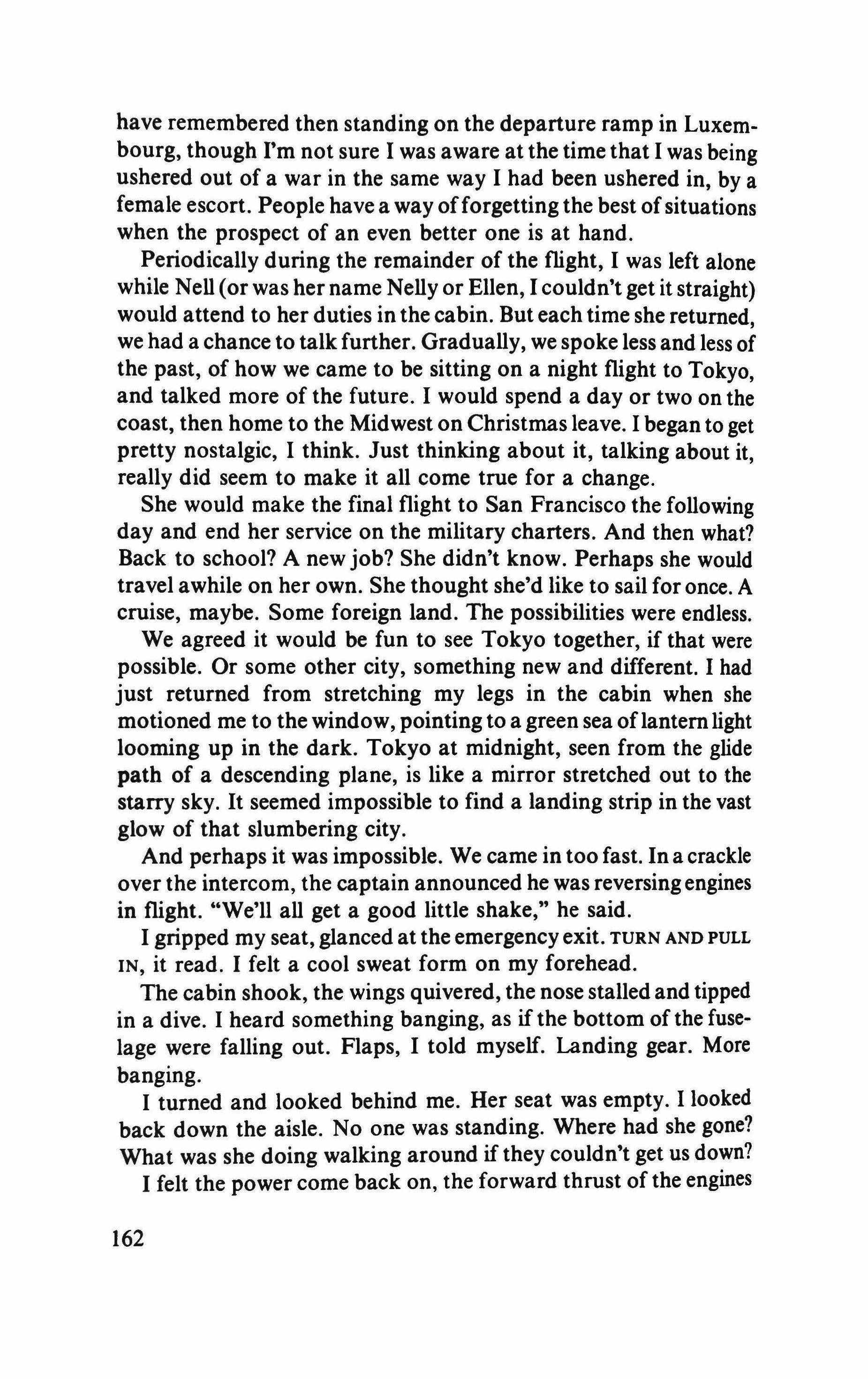
have remembered then standing on the departure ramp in Luxembourg, though I'm not sure I was aware at the time that I was being ushered out of a war in the same way I had been ushered in, by a female escort. People have a way offorgetting the best ofsituations when the prospect of an even better one is at hand.
Periodically during the remainder of the flight, I was left alone while Nell (or was her name Nelly or Ellen, I couldn't get it straight) would attend to her duties in the cabin. But each time she returned, we had a chance to talk further. Gradually, we spoke less and less of the past, of how we came to be sitting on a night flight to Tokyo, and talked more of the future. I would spend a day or two on the coast, then home to the Midwest on Christmas leave. I began to get pretty nostalgic, I think. Just thinking about it, talking about it, really did seem to make it all come true for a change.
She would make the final flight to San Francisco the following day and end her service on the military charters. And then what? Back to school? A new job? She didn't know. Perhaps she would travel awhile on her own. She thought she'd like to sail for once. A cruise, maybe. Some foreign land. The possibilities were endless. We agreed it would be fun to see Tokyo together, if that were possible. Or some other city, something new and different. I had just returned from stretching my legs in the cabin when she motioned me to the window, pointing to a green sea oflantern light looming up in the dark. Tokyo at midnight, seen from the glide path of a descending plane, is like a mirror stretched out to the starry sky. It seemed impossible to find a landing strip in the vast glow of that slumbering city.
And perhaps it was impossible. We came in too fast. In a crackle over the intercom, the captain announced he was reversingengines in flight. "We'll all get a good little shake," he said.
I gripped my seat, glanced at the emergency exit. TURN AND PULL IN, it read. I felt a cool sweat form on my forehead.
The cabin shook, the wings quivered, the nose stalled and tipped in a dive. I heard something banging, as if the bottom of the fuselage were falling out. Flaps, I told myself. Landing gear. More banging.
I turned and looked behind me. Her seat was empty. I looked back down the aisle. No one was standing. Where had she gone? What was she doing walking around if they couldn't get us down?
I felt the power come back on, the forward thrust of the engines
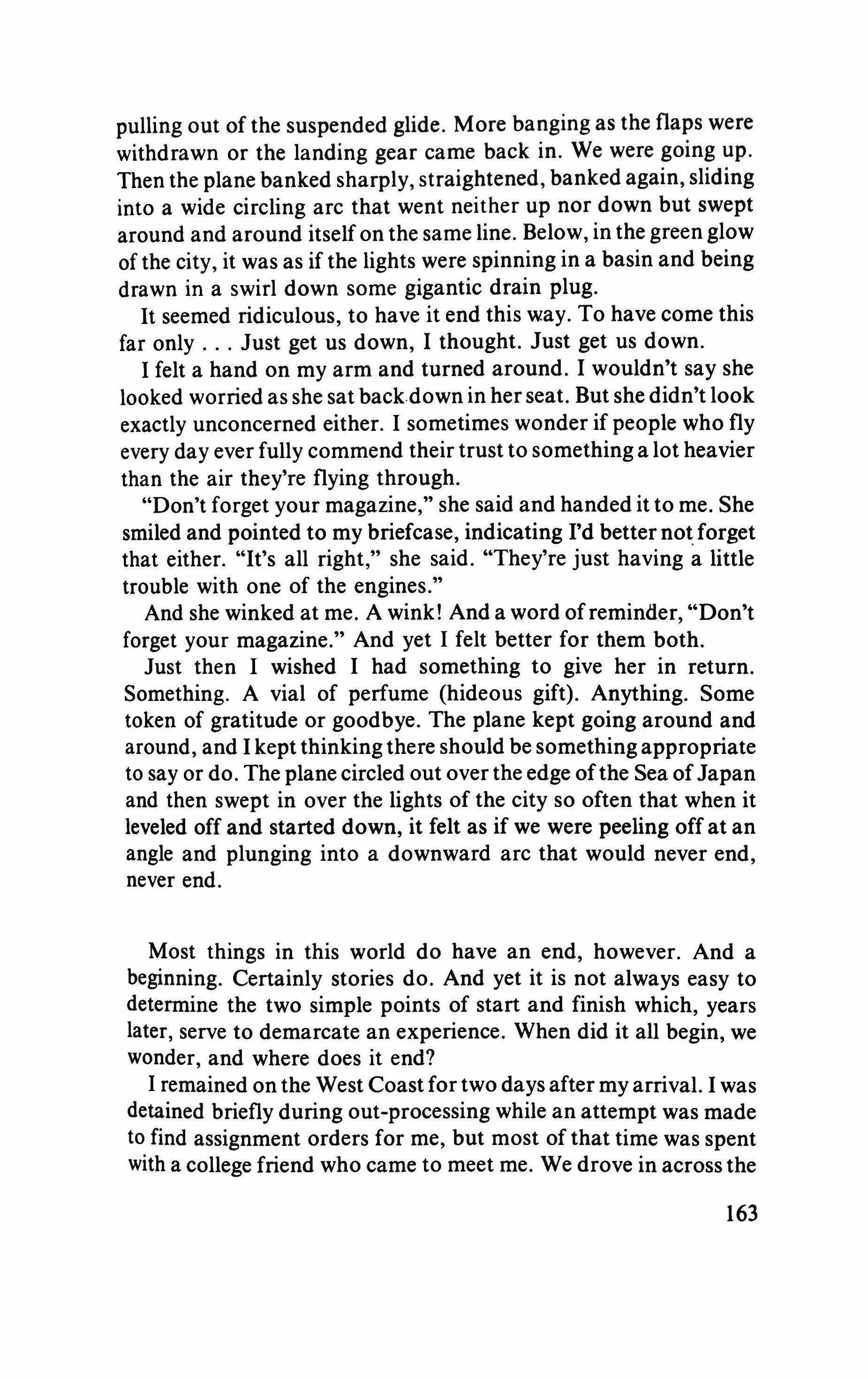
pulling out of the suspended glide. More banging as the flaps were withdrawn or the landing gear came back in. We were going up. Then the plane banked sharply, straightened, banked again, sliding into a wide circling arc that went neither up nor down but swept around and around itself on the same line. Below, in the green glow of the city, it was as if the lights were spinning in a basin and being drawn in a swirl down some gigantic drain plug.
It seemed ridiculous, to have it end this way. To have come this far only Just get us down, I thought. Just get us down.
I felt a hand on my arm and turned around. I wouldn't say she looked worried as she sat back-down in her seat. But she didn't look exactly unconcerned either. I sometimes wonder if people who fly every day ever fully commend their trust to something a lot heavier than the air they're flying through.
"Don't forget your magazine," she said and handed it to me. She smiled and pointed to my briefcase, indicating I'd better not forget that either. "It's all right," she said. "They're just having a little trouble with one of the engines."
And she winked at me. A wink! And a word ofreminder, "Don't forget your magazine." And yet I felt better for them both.
Just then I wished I had something to give her in return. Something. A vial of perfume (hideous gift). Anything. Some token of gratitude or goodbye. The plane kept going around and around, and I keptthinking there should be somethingappropriate to say or do. The plane circled out over the edge ofthe Sea ofJapan and then swept in over the lights of the city so often that when it leveled off and started down, it felt as if we were peeling off at an angle and plunging into a downward arc that would never end, never end.
Most things in this world do have an end, however. And a beginning. Certainly stories do. And yet it is not always easy to determine the two simple points of start and finish which, years later, serve to demarcate an experience. When did it all begin, we wonder, and where does it end?
I remained on the West Coast for two days after my arrival. I was detained briefly during out-processing while an attempt was made to find assignment orders for me, but most of that time was spent with a college friend who came to meet me. We drove in across the
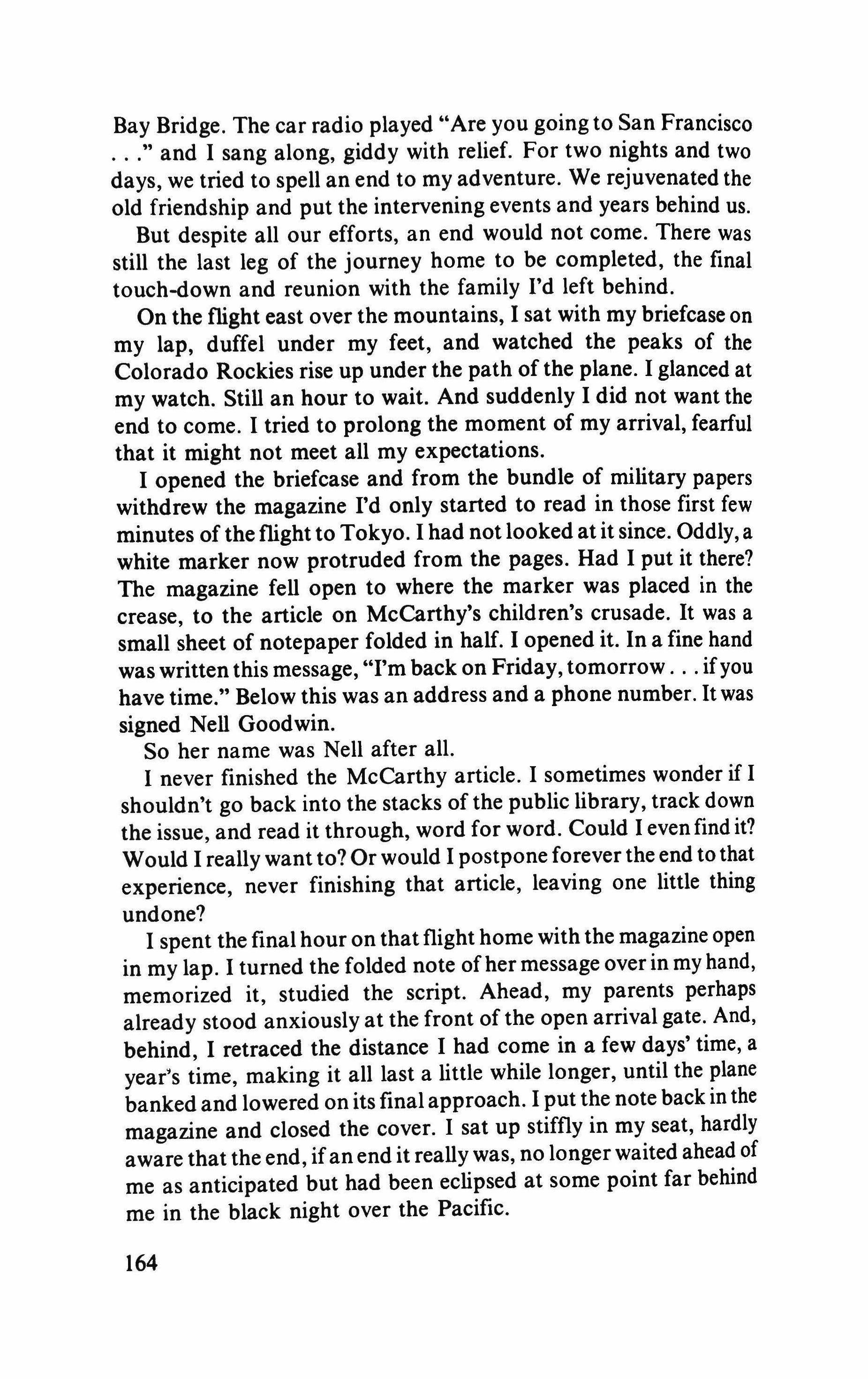
Bay Bridge. The car radio played "Are you going to San Francisco and I sang along, giddy with relief. For two nights and two days, we tried to spell an end to my adventure. We rejuvenated the old friendship and put the intervening events and years behind us.
But despite all our efforts, an end would not come. There was still the last leg of the journey home to be completed, the final touch-down and reunion with the family I'd left behind.
On the flight east over the mountains, I sat with my briefcase on my lap, duffel under my feet, and watched the peaks of the Colorado Rockies rise up under the path of the plane. I glanced at my watch. Still an hour to wait. And suddenly I did not want the end to come. I tried to prolong the moment of my arrival, fearful that it might not meet all my expectations.
I opened the briefcase and from the bundle of military papers withdrew the magazine I'd only started to read in those first few minutes of the flight to Tokyo. I had not looked at it since. Oddly, a white marker now protruded from the pages. Had I put it there? The magazine fell open to where the marker was placed in the crease, to the article on McCarthy's children's crusade. It was a small sheet of notepaper folded in half. I opened it. In a fine hand was written this message, "I'm back on Friday, tomorrow ifyou have time." Below this was an address and a phone number. It was signed Nell Goodwin.
So her name was Nell after all.
I never finished the McCarthy article. I sometimes wonder if I shouldn't go back into the stacks of the public library, track down the issue, and read it through, word for word. Could I even find it? Would I really want to? Or would I postpone forever the end to that experience, never finishing that article, leaving one little thing undone?
I spent the final hour on that flight home with the magazine open in my lap. I turned the folded note of her message over in my hand, memorized it, studied the script. Ahead, my parents perhaps already stood anxiously at the front of the open arrival gate. And, behind, I retraced the distance I had come in a few days' time, a year's time, making it all last a little while longer, until the plane banked and lowered on its final approach. I put the note back in the magazine and closed the cover. I sat up stiffly in my seat, hardly aware that the end, if an end it really was, no longer waited ahead of me as anticipated but had been eclipsed at some point far behind me in the black night over the Pacific.
Ambush: Laos, 1960
Asa Baber
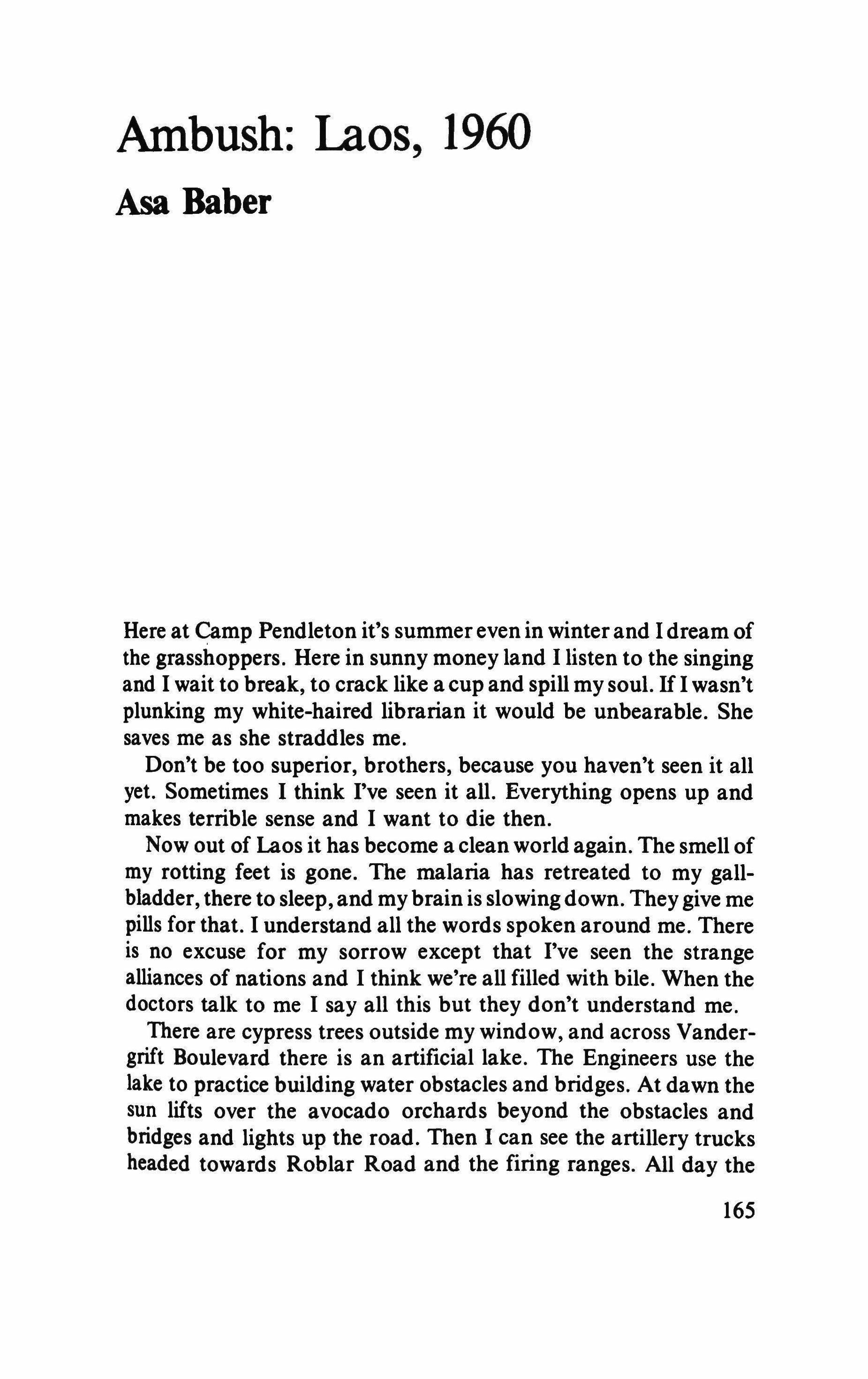
Here at Camp Pendleton it's summer even in winter and I dream of the grasshoppers. Here in sunny money land I listen to the singing and I wait to break, to crack like a cup and spill my soul. If I wasn't plunking my white-haired librarian it would be unbearable. She saves me as she straddles me.
Don't be too superior, brothers, because you haven't seen it all yet. Sometimes I think I've seen it all. Everything opens up and makes terrible sense and I want to die then.
Now out of Laos it has become a clean world again. The smell of my rotting feet is gone. The malaria has retreated to my gallbladder, there to sleep, and my brain is slowingdown. Theygive me pills for that. I understand all the words spoken around me. There is no excuse for my sorrow except that I've seen the strange alliances of nations and I think we're all filled with bile. When the doctors talk to me I say all this but they don't understand me.
There are cypress trees outside my window, and across Vandergrift Boulevard there is an artificial lake. The Engineers use the lake to practice building water obstacles and bridges. At dawn the sun lifts over the avocado orchards beyond the obstacles and bridges and lights up the road. Then I can see the artillery trucks headed towards Roblar Road and the firing ranges. All day the 165

choppers and OE's fly over the hospital. They're noisy but they can't stop the singing.
My room is in one of the white frame huts built at the beginning of World War II. It has Venetian blinds that make prison shadows and a white rail bed and a print of a Utrillo on the wall. I don't know how a print like that found its way into a Marine Corps hospital. I hope it came with the room because I'm sure many men have died in this room and it would be better to die looking at that street scene with the red splotch of paint than the naked wall. I don't plan to die here except on the bad days when the fever comes back and the dysentery hits again. When I can't eat anything and my bowels pass water and blood, I look at the Utrillo and think about dying.
They're very kind when they question me.
I tell them it's screwed up over there, but theyonly listen to what they want to hear, both the navy doctors and our own G-2. I try to tell them about the tangled things, that the French are strong with patrol leaders down to the platoon level, that Russian civilian pilots are flying the airlift Ilyushins, that the North Vietnamese run the Fire Direction Centers.
They listen to me and say yes yes we know all that. They know because they read reports. But it makes it a crazy war when you're over there.
Even Major Kline came by to see me. He lied to General Grider the night we were shipped out. Sutton and Devereux and I were lined up taking shots. They were pumpingexotic vaccines into both my arms. Major Kline told the General we'd been on a twelve-hour alert. Yes sir they're ready sir the last shots of a series yes sir. Devereux got mad and said the last shots ofa series like a one game World Series. The General knew somebody was lying but there was nothing he could do. So we flew to Wake Island and then Tokyo and then Okinawa without calling anyone or saying goodbye. I don't like Major Kline and he doesn't like me, but he owes me something and he knows it.
The grasshoppers come when I sleep. They have the heads of dolphins and they buzz like locusts. They come from left to right across my dreams and always chant we're coming to get you we're coming to get you. Then I try to wake up but I'm too heavy for myself and I have to keep on dreaming while the grasshoppers hurt me. Sometimes I wake up screaming when I see Sutton with his
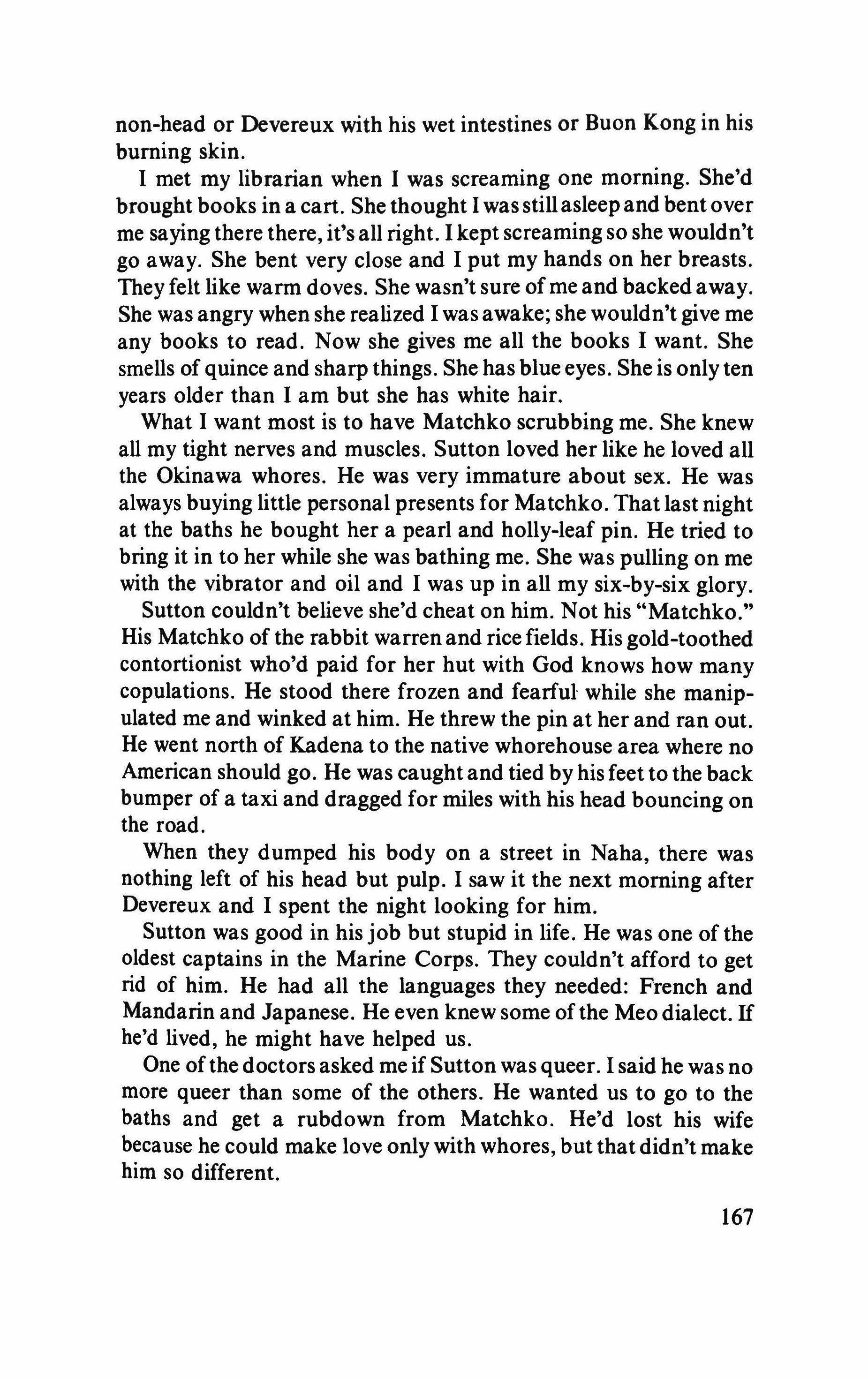
non-head or Devereux with his wet intestines or Buon Kong in his burning skin.
I met my librarian when I was screaming one morning. She'd brought books in a cart. She thought I was still asleep and bent over me saying there there, it's all right. I kept screaming so she wouldn't go away. She bent very close and I put my hands on her breasts. They felt like warm doves. She wasn't sure of me and backed away. She was angry when she realized I was awake; she wouldn't give me any books to read. Now she gives me all the books I want. She smells of quince and sharp things. She has blue eyes. She is only ten years older than I am but she has white hair.
What I want most is to have Matchko scrubbing me. She knew all my tight nerves and muscles. Sutton loved her like he loved all the Okinawa whores. He was very immature about sex. He was always buying little personal presents for Matchko. That last night at the baths he bought her a pearl and holly-leaf pin. He tried to bring it in to her while she was bathing me. She was pulling on me with the vibrator and oil and I was up in all my six-by-six glory.
Sutton couldn't believe she'd cheat on him. Not his "Matchko." His Matchko of the rabbit warren and rice fields. His gold-toothed contortionist who'd paid for her hut with God knows how many copulations. He stood there frozen and fearful while she manipulated me and winked at him. He threw the pin at her and ran out. He went north of Kadena to the native whorehouse area where no American should go. He was caught and tied by his feet to the back bumper of a taxi and dragged for miles with his head bouncing on the road.
When they dumped his body on a street in Naha, there was nothing left of his head but pulp. I saw it the next morning after Devereux and I spent the night looking for him.
Sutton was good in his job but stupid in life. He was one of the oldest captains in the Marine Corps. They couldn't afford to get rid of him. He had all the languages they needed: French and Mandarin and Japanese. He even knew some of the Meo dialect. H he'd lived, he might have helped us.
One of the doctors asked me if Sutton was queer. I said he was no more queer than some of the others. He wanted us to go to the baths and get a rubdown from Matchko. He'd lost his wife because he could make love only with whores, but that didn't make him so different.

There's a myth that the military is a masculine profession, but I don't buy it. It's a profession where men dress for other men. Spit polish and web gear and linseed oil and bleach. For my whitehaired librarian I'll clean and comb myself, but for a Commanding Officer I won't go to so much trouble. Sutton was sloppy at inspections too, but he dressed well when he went whoring. I don't think he was queer.
When Sutton was killed I was made C.O. of the Interrogation Team. We were attached to Task Force 116. We thought we were going into southern Laos. The panhandle area near Mahaxayand Tchepone covered Route Nationale 9. We had black and white lists and air recon maps.
We were sent to Vientiane instead.
My room is as white as noise. The sheets and bandages are white. I'd like to see a calendar. It's either the end of February or the beginning of March. February is a cheating month so I hope it's over. I do not think I'll die this year because it's an odd year, 1961. I'll die in an even year like my father and my grandfather.
The red-haired doctor asked me if I wanted to go back to Laos when I got better, but he wasn't serious.
I wanted to tell him how soft and fine a country it is with its rain forests dark and green all year. The tree trunks are branchless, topped with lianas that hold ferns and orchids and wild figs. Walking through those forests, you can't see the sun. Flying over, you can't see the forest floor. There are groves of small softwoods mixed with wild ginger, rhododendron and bamboo. There are coconuts and areca palms and bananas. There are tigers, panthers, elephants, deer.
When there's a war, our newspapers call these forests "jungles."
I can't tell the doctor what it's like there because his spirit isn't with me. I often see the phi, the spirits, of Sutton and Devereux and Buon Kong. They're wandering the earth and they'llalways be with me. They're back in Laos in Meo country harvesting the poppies now. They're lucky;phi can be in two places at once.
The plants are waist high now, in full bloom of rose or white or blue or mauve. I'd like to be back at the harvest before the palegreen stems are cut. The women go to the fields before the dew lifts. They collect the sap and wrap it in banana leaves. The brown

blocks are sold for very little in Xieng Khouang Province and for a lot in Saigon.
Thephi are strong spirits and must always be honored. They're in the trees and mountains and rivers. They're in every human being and every dead person.
I think it was Sutton's phi that came as a goat to warn us.
Go north of Vientiane on the Royal Road, Route Coloniale 13. For twenty miles there are flat paddies and thickets and the sky is open. Then climb to Ban Namone as the road circles and becomes covered with forest.
Here are the lowland people. They aren't good fighters. Pull them into combat and they'll shoot their rifles into the air. To teach them to shoot to kill, you have to set up targets, let them fire one shot at the target, walk them to the target and show them the bullet hole, go back and have them shoot again.
Their houses are on stilts. Pigs and chickens live underneath. The men sleep most of the day and the women grow enough rice to survive.
These lowland people will be the last people to fightforanything.
After Ban Namone comes the valley of Vang Vieng. Here the road starts to climb steeply through Ban Pha Tang, Ban Thieng, Muong Kassy. At Sala Phou Khoun the road to the Plain of Jars goes east, Route Nationale 7.
All of these roads were built under the supervision ofthe French. The French also collected taxes and rice and salt and women under their "protectorate," which lasted a number of generations. The French set the image for the white man.
A white man is a Frenchman, diseased, the way anything white in Asia must be diseased, whether it is spoiled buffalo meat or moldy fruit or human flesh.
In the mountains near the Plain ofJars live the fighters, the Meo. They build their houses on the ground. They are great hunters and riflemen and horsemen. They live off the land. They eat corn, cabbage, eggplant, onions. They live long lives doctored by the gall of bear and python, marrow of tiger, deer's soft horn.
Devereux had worked with the Meo before Dien Bien Phu when he was attached to the French. He wanted to get back to them and he got permission for the two of us to go. We had to travel incivvies
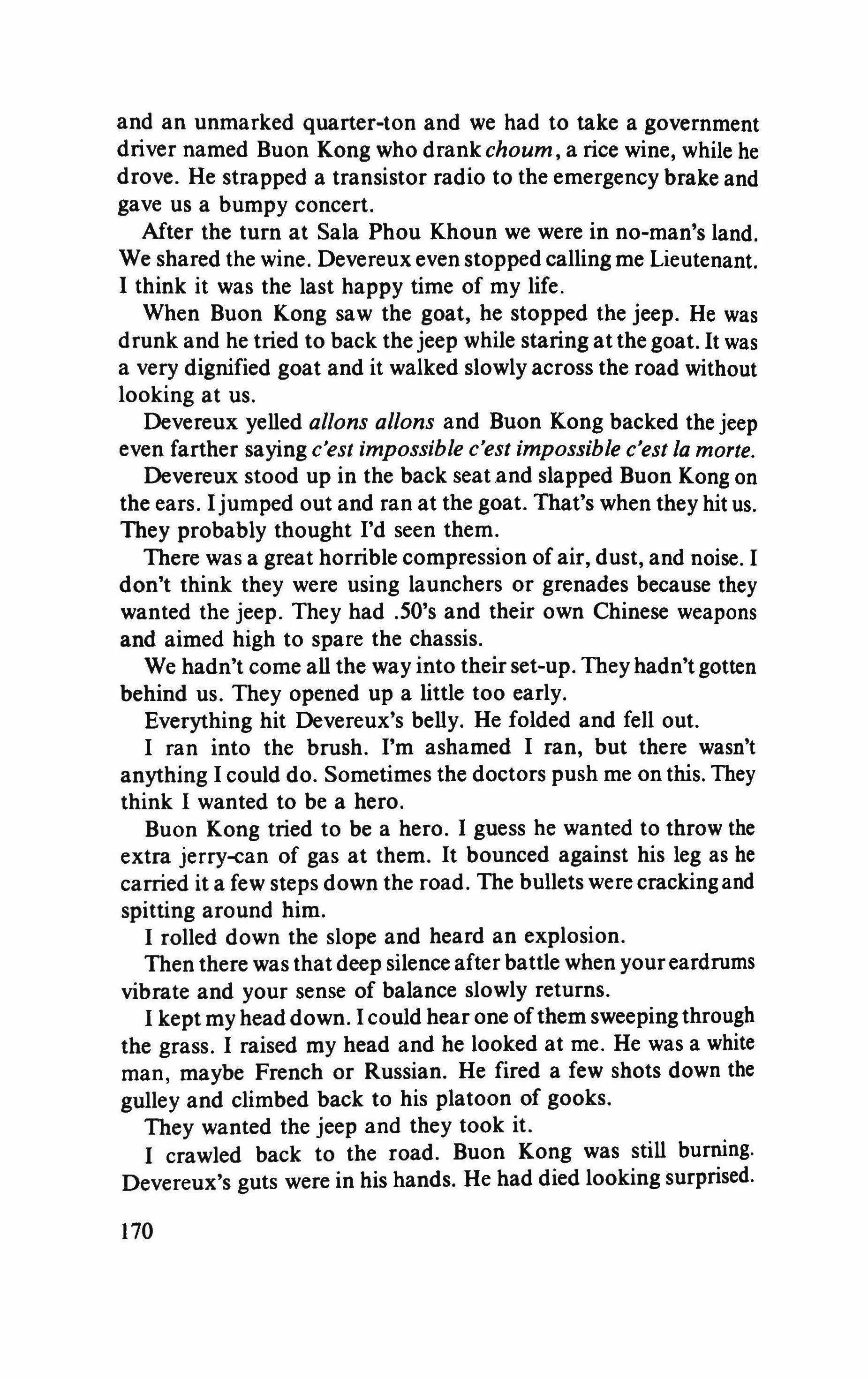
and an unmarked quarter-ton and we had to take a government driver named Buon Kong who drank choum, a rice wine, while he drove. He strapped a transistor radio to the emergency brake and gave us a bumpy concert.
After the turn at Sala Phou Khoun we were in no-man's land. We shared the wine. Devereux even stopped calling me Lieutenant. I think it was the last happy time of my life.
When Buon Kong saw the goat, he stopped the jeep. He was drunk and he tried to back the jeep while staring at the goat. It was a very dignified goat and it walked slowly across the road without looking at us.
Devereux yelled allons allons and Buon Kong backed the jeep even farther saying c'est impossible c'est impossible c'est la morte.
Devereux stood up in the back seat and slapped Buon Kong on the ears. Ijumped out and ran at the goat. That's when they hit us. They probably thought I'd seen them.
There was a great horrible compression of air, dust, and noise. I don't think they were using launchers or grenades because they wanted the jeep. They had .50's and their own Chinese weapons and aimed high to spare the chassis.
We hadn't come all the way into their set-up. They hadn't gotten behind us. They opened up a little too early.
Everything hit Devereux's belly. He folded and fell out.
I ran into the brush. I'm ashamed I ran, but there wasn't anything I could do. Sometimes the doctors push me on this. They think I wanted to be a hero.
Buon Kong tried to be a hero. I guess he wanted to throw the extra jerry-can of gas at them. It bounced against his leg as he carried it a few steps down the road. The bullets were crackingand spitting around him.
I rolled down the slope and heard an explosion.
Then there was that deep silence after battle when your eardrums vibrate and your sense of balance slowly returns.
I kept my head down. I could hear one ofthem sweepingthrough the grass. I raised my head and he looked at me. He was a white man, maybe French or Russian. He fired a few shots down the gulley and climbed back to his platoon of gooks. They wanted the jeep and they took it.
I crawled back to the road. Buon Kong was still burning. Devereux's guts were in his hands. He had died looking surprised.

I went into the brush. I didn't start walking back until that night. It took me three days before I reached the road north of Vientiane.
Here in Camp Pendleton the blinds are raised each day and the sunlight comes into my bleached vanilla room. There are deer running through the sage in the canyons near San Clemente. You can walk the firebreaks on the ridgeline and hunt them. I won't ever be a good hunter again because my hands shake. The doctors give me pills and say I'll get over it, but I don't think so.
My hands shake because I have to fight the grasshoppers and listen to the singing. That makes me tired.
The singing is always in the back of my head. I don't know what song they're singing, but it's a march of some kind with a steady rhythm and stamping feet and many voices.
It's not pleasant, and sometimes they stop singing and they shout.
"I drink my coffee black"
w. D. Ehrhart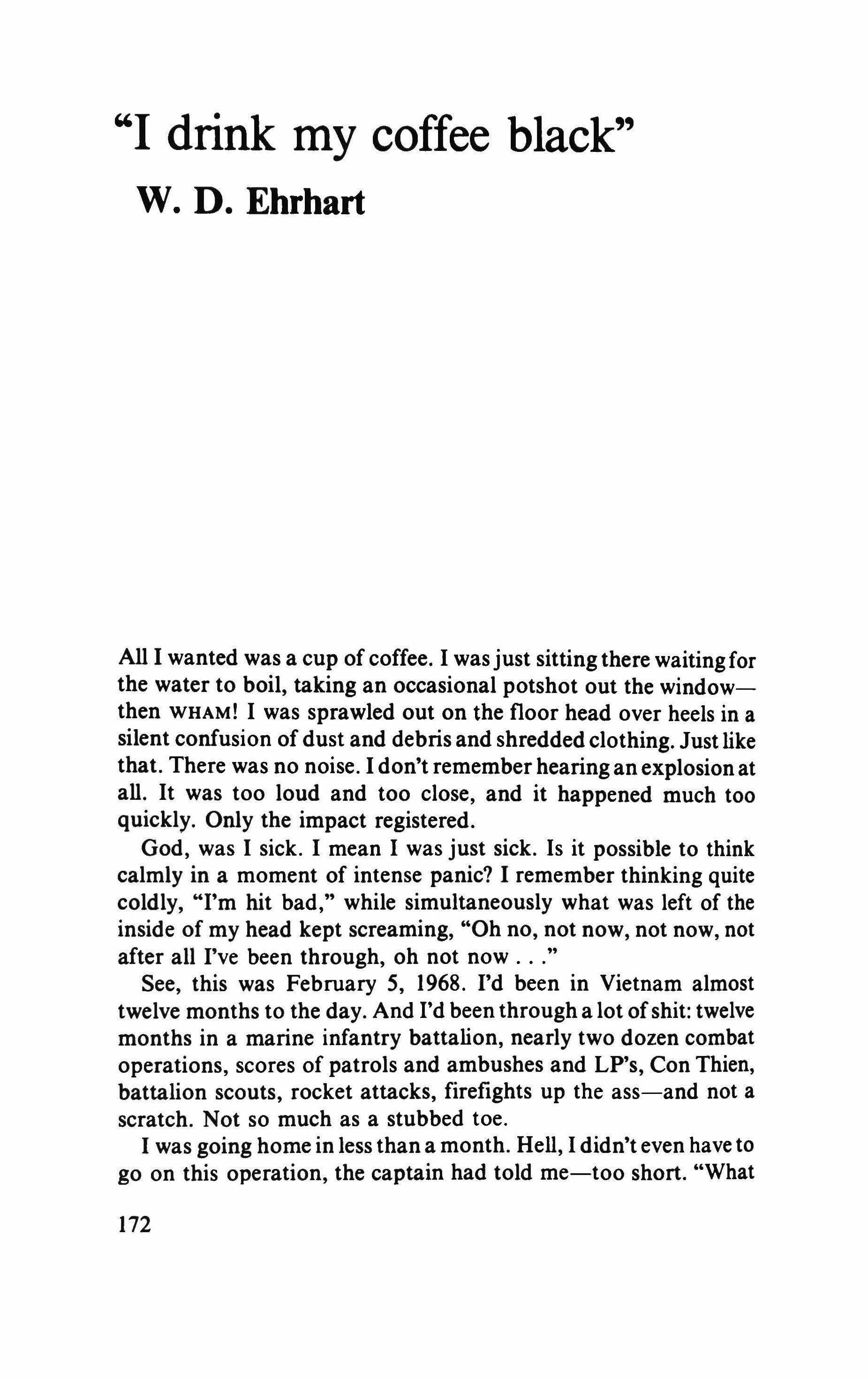
All I wanted was a cup of coffee. I was just sitting there waiting for the water to boil, taking an occasional potshot out the windowthen WHAM! I was sprawled out on the floor head over heels in a silent confusion of dust and debris and shredded clothing. Just like that. There was no noise. I don't remember hearing an explosion at all. It was too loud and too close, and it happened much too quickly. Only the impact registered.
God, was I sick. I mean I was just sick. Is it possible to think calmly in a moment of intense panic? I remember thinking quite coldly, "I'm hit bad," while simultaneously what was left of the inside of my head kept screaming, "Oh no, not now, not now, not after all I've been through, oh not now ."
See, this was February 5, 1968. I'd been in Vietnam almost twelve months to the day. And I'd been through a lot ofshit: twelve months in a marine infantry battalion, nearly two dozen combat operations, scores of patrols and ambushes and LP's, Con Thien, battalion scouts, rocket attacks, firefights up the ass-and not a scratch. Not so much as a stubbed toe.
I was going home in less than a month. Hell, I didn't even have to go on this operation, the captain had told me-too short. "What

the hell," I'd figured, "why not? Can't do diddly-squat in the rear but sit around and mark days off my short-time calendar and get nervous. Might as well be with my buddies."
It wasn't quite as simple as all that, I suppose. In Vietnam, there were really few things worse than having time on your hands. Time to think about what was going on there. Time to compare the real America-the one you'd enlisted for-with the one you saw napalming villages and plowing up rice fields with tanks and running around with your rifle and your face shooting anything that moved. Time to think about those articles you keptreading in Stars 'n Stripes about protest marches and VC flags in Times Square. Time to imagine what miniskirts looked like on real girls and to wonder if the girlfriend you'd gotten a "Dear John" letter from six months ago was wearing one-while every bearded hippie in Trenton fucked her eyeballs out, and her just loving every minute of it with flowers in her hair. Oh goodness yes, I was more afraid of slack time than I ever was, or will be, of combat-though it was never put in so many words. Or even thoughts. Not then.
And I guess there was more than a little macho involved-the "I'm a marine, I ain't scared of a good fight, and even if I am you'll be the last to know about it" kind of thing. Whistling in the dark. One more test.
And I really wouldn't have felt right letting my buddies go without me. Life gets very simple in a war. You eat, you keep your weapon clean, and you love the men you share every moment ofthe long night with because they're all you've got. The only ones who'll ever understand. The ones who hold the other pieces of the Queen of Hearts, one piece to a man.
It's like when you were a kid and the whole gang trashes old Mr. Bowen's garage, and everybody gets caught but you, and they all have to clean up the garage-and you feel so guilty watching them that you finally climb out of the bushes and shuffle over and pitch in.
So it wasn't really "What the hell, why not?" though it certainly felt like it at the time. And besides, nobody realized it was going to be this bad. Christ, how nobody realized
We were just going to bail out the army again. Our battalion had come down to Phu Bai from the DMZ-a little rest and refitting after a long stretch in the boondocks. And then the MACV advisory compound in Hue radios down that they're taking small
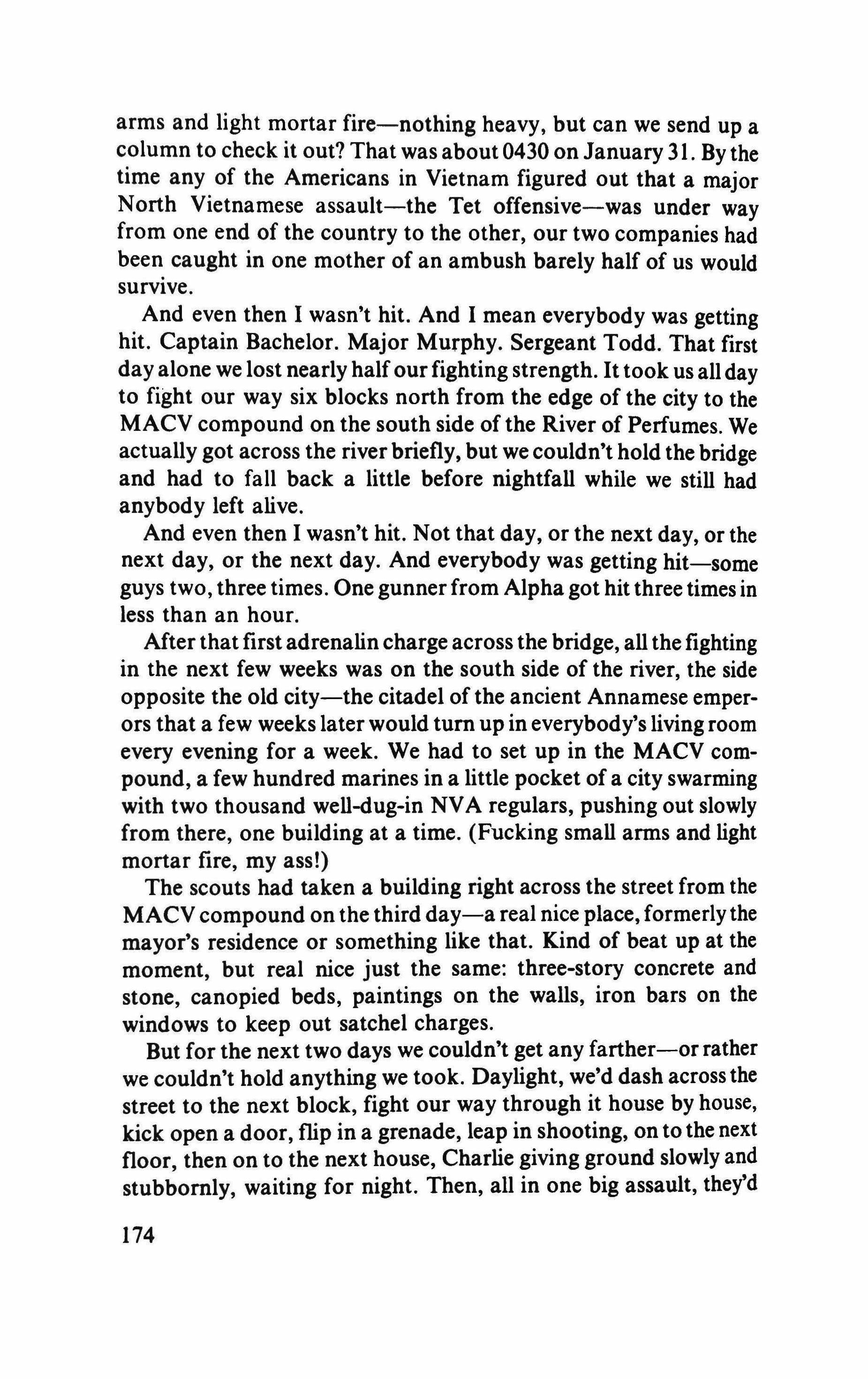
arms and light mortar fire-nothing heavy, but can we send up a column to check it out? That was about 0430 on January 31. By the time any of the Americans in Vietnam figured out that a major North Vietnamese assault-the Tet offensive-was under way from one end of the country to the other, our two companies had been caught in one mother of an ambush barely half of us would survive.
And even then I wasn't hit. And I mean everybody was getting hit. Captain Bachelor. Major Murphy. Sergeant Todd. That first day alone we lost nearly half our fighting strength. It took us all day to fight our way six blocks north from the edge of the city to the MACV compound on the south side of the River of Perfumes. We actually got across the river briefly, but we couldn't hold the bridge and had to fall back a little before nightfall while we still had anybody left alive.
And even then I wasn't hit. Not that day, or the next day, or the next day, or the next day. And everybody was getting hit-some guys two, three times. One gunner from Alpha got hit three times in less than an hour.
After that first adrenalin charge across the bridge, all the fighting in the next few weeks was on the south side of the river, the side opposite the old city-the citadel of the ancient Annamese emperors that a few weeks later would tum up in everybody's living room every evening for a week. We had to set up in the MACV compound, a few hundred marines in a little pocket of a city swarming with two thousand well-dug-in NVA regulars, pushing out slowly from there, one building at a time. (Fucking small arms and light mortar fire, my ass!)
The scouts had taken a building right across the street from the MACV compound on the third day-a real nice place,formerly the mayor's residence or something like that. Kind of beat up at the moment, but real nice just the same: three-story concrete and stone, canopied beds, paintings on the walls, iron bars on the windows to keep out satchel charges.
But for the next two days we couldn't get any farther-or rather we couldn't hold anything we took. Daylight, we'd dash across the street to the next block, fight our way through it house by house, kick open a door, flip in a grenade, leap in shooting, on to the next floor, then on to the next house, Charlie giving ground slowly and stubbornly, waiting for night. Then, all in one big assault, they'd
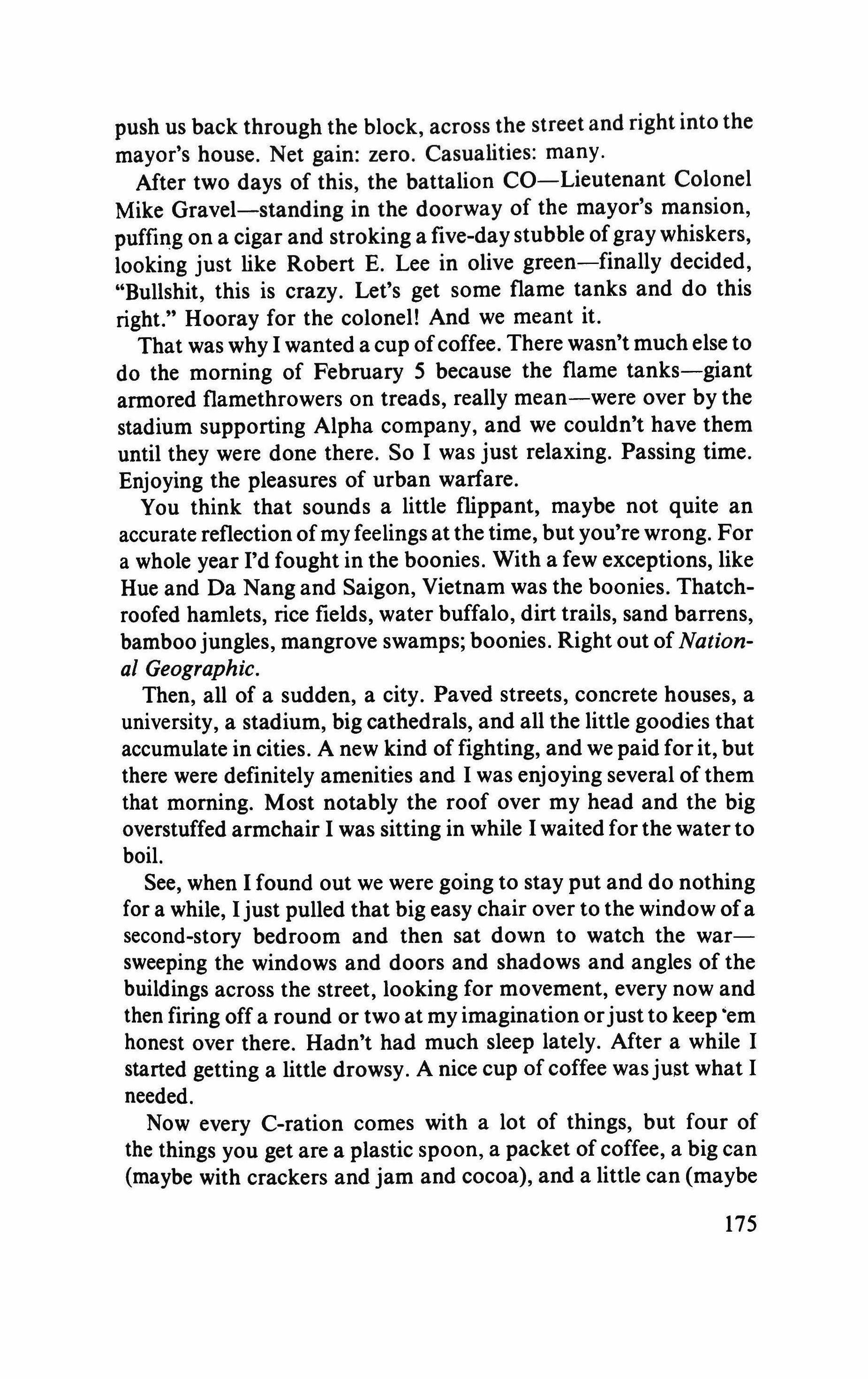
push us back through the block, across the street and right into the mayor's house. Net gain: zero. Casualities: many.
After two days of this, the battalion CO-Lieutenant Colonel Mike Gravel-standing in the doorway of the mayor's mansion, puffing on a cigar and stroking a five-day stubble ofgray whiskers, looking just like Robert E. Lee in olive green-finally decided, "Bullshit, this is crazy. Let's get some flame tanks and do this right." Hooray for the colonel! And we meant it.
That was why I wanted a cup ofcoffee. There wasn't much else to do the morning of February 5 because the flame tanks-giant armored flamethrowers on treads, really mean-were over by the stadium supporting Alpha company, and we couldn't have them until they were done there. So I was just relaxing. Passing time. Enjoying the pleasures of urban warfare.
You think that sounds a little flippant, maybe not quite an accurate reflection ofmy feelings at the time, but you're wrong. For a whole year I'd fought in the boonies. With a few exceptions, like Hue and Da Nang and Saigon, Vietnam was the boonies. Thatchroofed hamlets, rice fields, water buffalo, dirt trails, sand barrens, bamboo jungles, mangrove swamps; boonies. Right out of National Geographic.
Then, all of a sudden, a city. Paved streets, concrete houses, a university, a stadium, big cathedrals, and all the little goodies that accumulate in cities. A new kind of fighting, and we paid for it, but there were definitely amenities and I was enjoying several of them that morning. Most notably the roof over my head and the big overstuffed armchair I was sitting in while I waited for the water to boil.
See, when I found out we were going to stay put and do nothing for a while, I just pulled that big easy chair over to the window of a second-story bedroom and then sat down to watch the warsweeping the windows and doors and shadows and angles of the buildings across the street, looking for movement, every now and then firing off a round or two at my imagination orjust to keep "em honest over there. Hadn't had much sleep lately. After a while I started getting a little drowsy. A nice cup of coffee was just what I needed.
Now every C-ration comes with a lot of things, but four of the things you get are a plastic spoon, a packet of coffee, a big can (maybe with crackers and jam and cocoa), and a little can (maybe
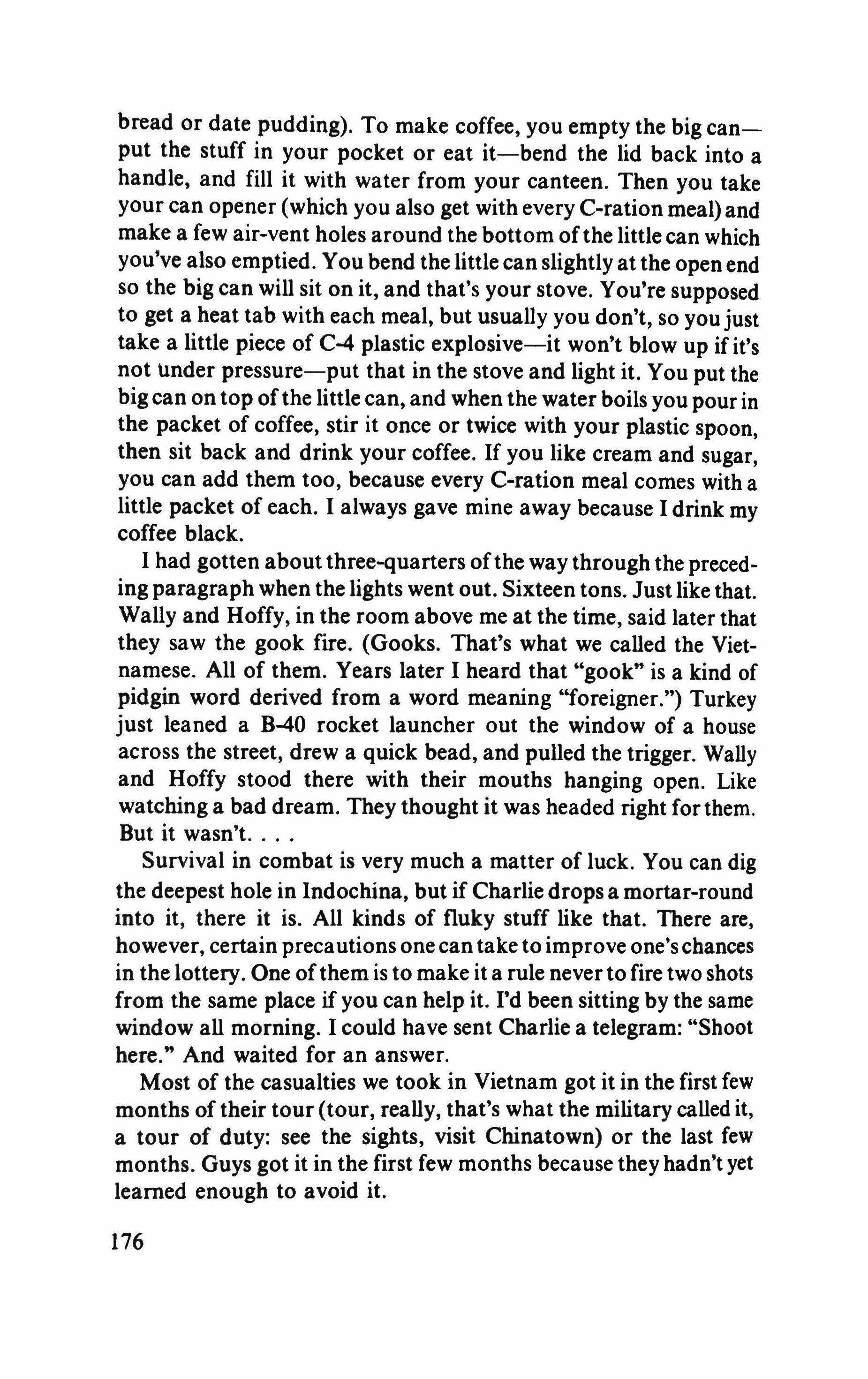
bread or date pudding). To make coffee, you empty the big canput the stuff in your pocket or eat it-bend the lid back into a handle, and fill it with water from your canteen. Then you take your can opener (which you also get with every C-ration meal) and make a few air-vent holes around the bottom ofthe little can which you've also emptied. You bend the little can slightly at the open end so the big can will sit on it, and that's your stove. You're supposed to get a heat tab with each meal, but usually you don't, so you just take a little piece of C-4 plastic explosive-it won't blow up if it's not under pressure-put that in the stove and light it. You put the big can on top ofthe little can, and when the water boils you pour in the packet of coffee, stir it once or twice with your plastic spoon, then sit back and drink your coffee. If you like cream and sugar, you can add them too, because every C-ration meal comes with a little packet of each. I always gave mine away because I drink my coffee black.
I had gotten about three-quarters ofthe way through the precedingparagraph when the lights went out. Sixteen tons. Just like that. Wally and Hoffy, in the room above me at the time, said later that they saw the gook fire. (Gooks. That's what we called the Vietnamese. All of them. Years later I heard that "gook" is a kind of pidgin word derived from a word meaning "foreigner.It) Turkey just leaned a B-40 rocket launcher out the window of a house across the street, drew a quick bead, and pulled the trigger. Wally and Hoffy stood there with their mouths hanging open. Like watching a bad dream. They thought it was headed right for them. But it wasn't.
Survival in combat is very much a matter of luck. You can dig the deepest hole in Indochina, but if Charlie drops a mortar-round into it, there it is. All kinds of fluky stuff like that. There are, however, certain precautions one can take to improve one'schances in the lottery. One ofthem is to make ita rule never to fire two shots from the same place if you can help it. I'd been sitting by the same window all morning. I could have sent Charlie a telegram: "Shoot here." And waited for an answer.
Most of the casualties we took in Vietnam got it in the first few months of their tour (tour, really, that's what the military called it, a tour of duty: see the sights, visit Chinatown) or the last few months. Guys got it in the first few months because they hadn't yet learned enough to avoid it.
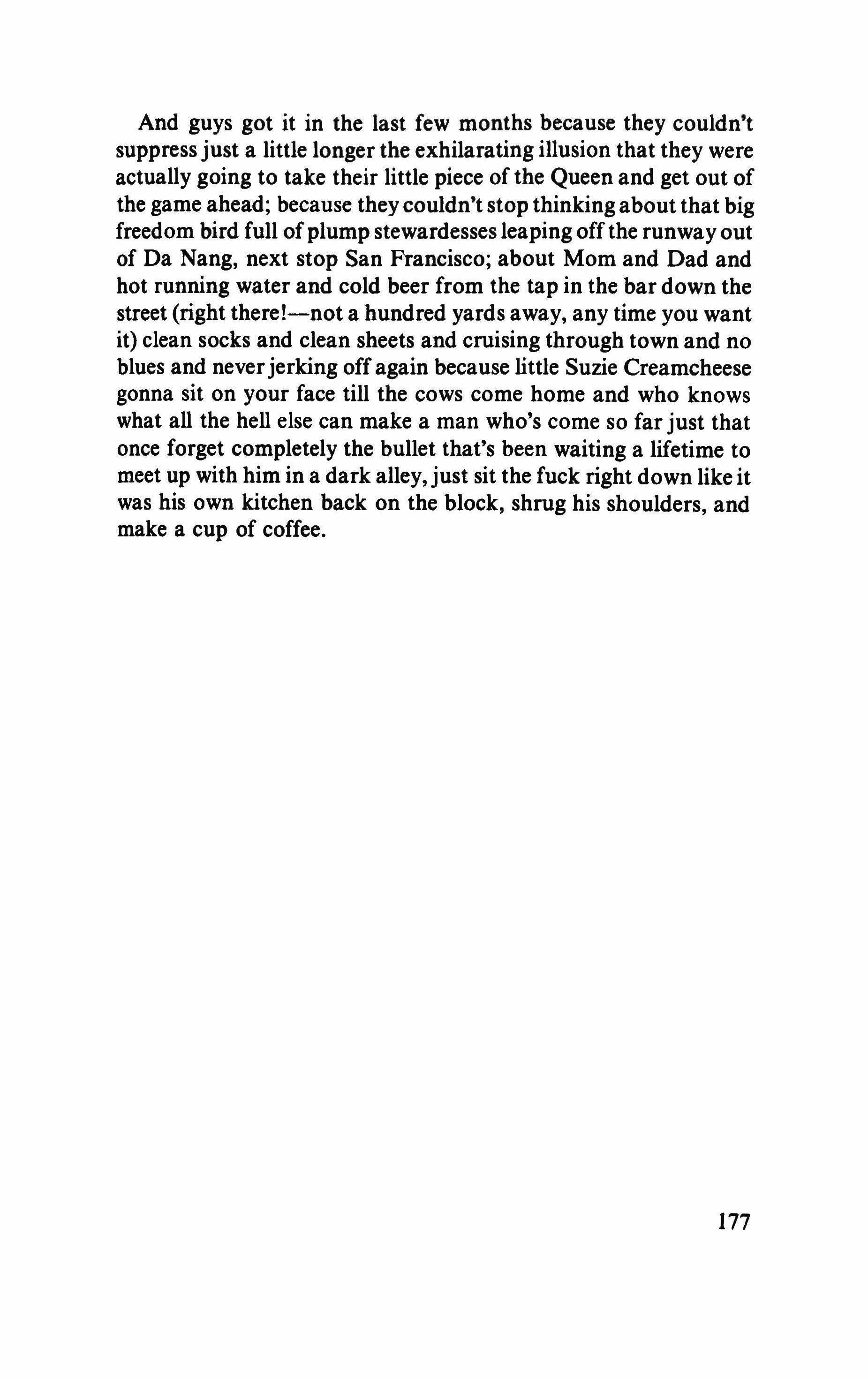
And guys got it in the last few months because they couldn't suppressjust a little longer the exhilarating illusion that they were actually going to take their little piece of the Queen and get out of the game ahead; because they couldn't stop thinking about that big freedom bird full ofplump stewardesses leaping offthe runway out of Da Nang, next stop San Francisco; about Mom and Dad and hot running water and cold beer from the tap in the bar down the street (right there!-not a hundred yards away, any time you want it) clean socks and clean sheets and cruising through town and no blues and never jerking off again because little Suzie Creamcheese gonna sit on your face till the cows come home and who knows what all the hell else can make a man who's come so far just that once forget completely the bullet that's been waiting a lifetime to meet up with him in a dark alley,just sit the fuck right down like it was his own kitchen back on the block, shrug his shoulders, and make a cup of coffee.
The first clean fact
Larry Heinemann
Gather here. Lean a good ear this way. Cup a curved hand around it if you have to.
Let's begin with the first clean fact, James: this ain't no war story. War stories are out-one, two, three and a heave ho, into the lake you go with all the other alewife scuzand foamyharbor scum. But ain't it a pity. All those crinkly, soggy sorts of laid-by tellings crowded together as thick and pitiful as street cobbles, floating mushy bellies up like so much moldy shag rug (dead as rusty-ass doornails, and smelling so peculiar and unchristian). Just isn't it a pity, because here and there and yonder among the corpses are some prizewinning, leg-pulling daisies-some real simple-ass, popin-the-oven muffins, so to speak, some real softly lobbed, easy-out line drives.
But that's the way of the world, James, or so the fairy tales go. The people with the purse strings and apron stringsgripped in their hot and soft little hands denounce war stories-with perfect diction and practiced gestures-as a sideshow geek-monster species of evil-ugly rumor. They stand bolt upright and proclaim with broad and timely sweeps of the arm that war stories put other folks to sleep where they sit. (When the contrary is more to the truth,
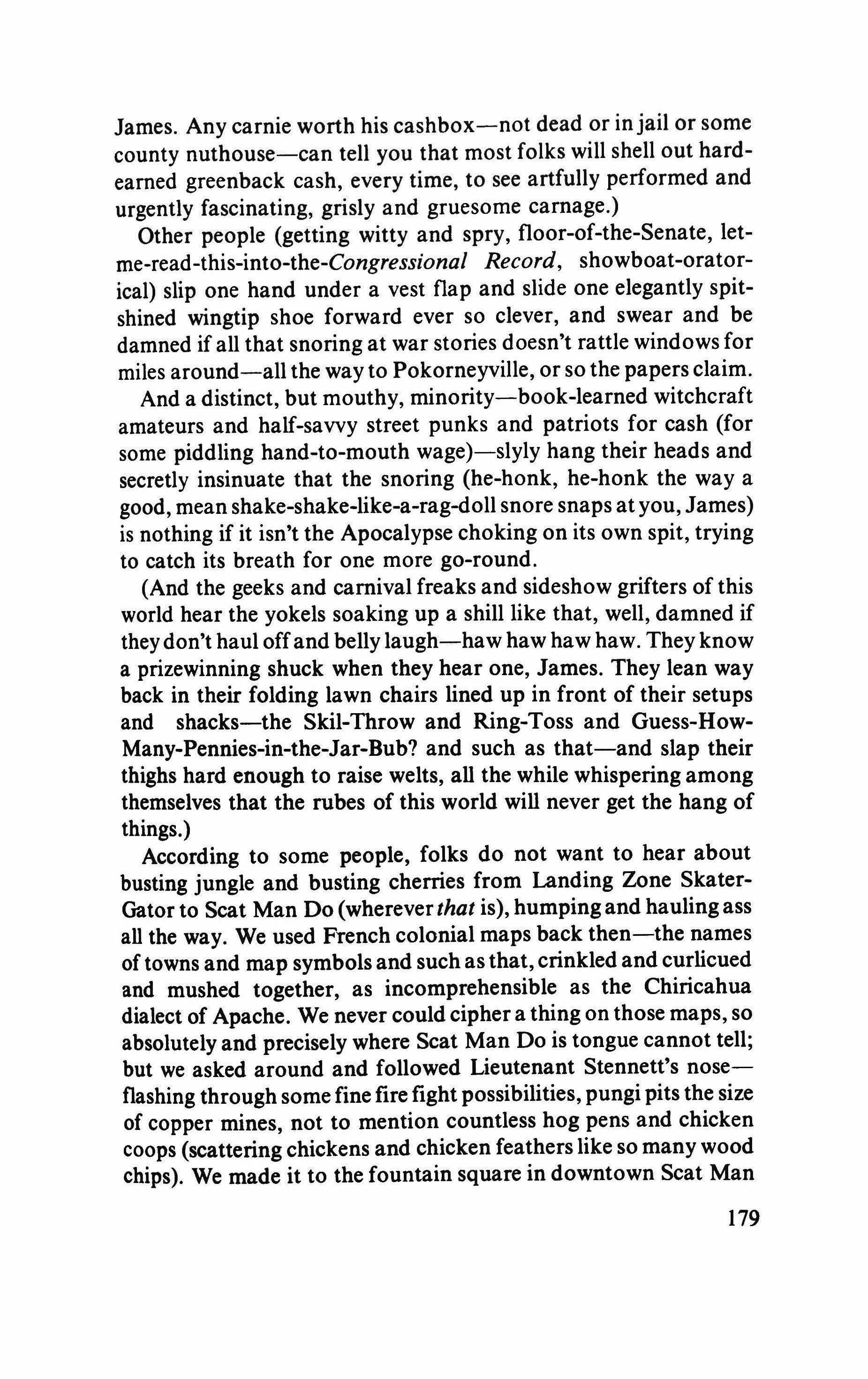
James. Any carnie worth his cashbox-not dead or injail or some county nuthouse-can tell you that most folks will shell out hardearned greenback cash, every time, to see artfully performed and urgently fascinating, grisly and gruesome carnage.)
Other people (getting witty and spry, floor-of-the-Senate, letme-read-this-into-the-Congressional Record, showboat-oratorical) slip one hand under a vest flap and slide one elegantly spitshined wingtip shoe forward ever so clever, and swear and be damned if all that snoring at war stories doesn't rattle windows for miles around-all the way to Pokorneyville, or so the papers claim.
And a distinct, but mouthy, minority-book-Iearned witchcraft amateurs and half-savvy street punks and patriots for cash (for some piddling hand-to-mouth wage)-slyly hang their heads and secretly insinuate that the snoring (he-honk, he-honk the way a good, mean shake-shake-like-a-rag-doll snore snaps at you, James) is nothing if it isn't the Apocalypse choking on its own spit, trying to catch its breath for one more go-round.
(And the geeks and carnival freaks and sideshow grifters of this world hear the yokels soaking up a shill like that, well, damned if they don't haul offand belly laugh-haw haw haw haw. They know a prizewinning shuck when they hear one, James. They lean way back in their folding lawn chairs lined up in front of their setups and shacks-the Skil-Throw and Ring-Toss and Guess-HowMany-Pennies-in-the-Jar-Bub? and such as that-and slap their thighs hard enough to raise welts, all the while Whispering among themselves that the rubes of this world will never get the hang of things.)
According to some people, folks do not want to hear about busting jungle and busting cherries from Landing Zone SkaterGator to Scat Man Do (wherever that is), humping and hauling ass all the way. We used French colonial maps back then-the names of towns and map symbols and such as that, crinkled and curlicued and mushed together, as incomprehensible as the Chiricahua dialect of Apache. We never could cipher a thing on those maps, so absolutely and precisely where Scat Man Do is tongue cannot tell; but we asked around and followed Lieutenant Stennett's noseflashing through some fine fire fightpossibilities,pungipits the size of copper mines, not to mention countless hog pens and chicken coops (scattering chickens and chicken feathers like so many wood chips). We made it to the fountain square in downtown Scat Man
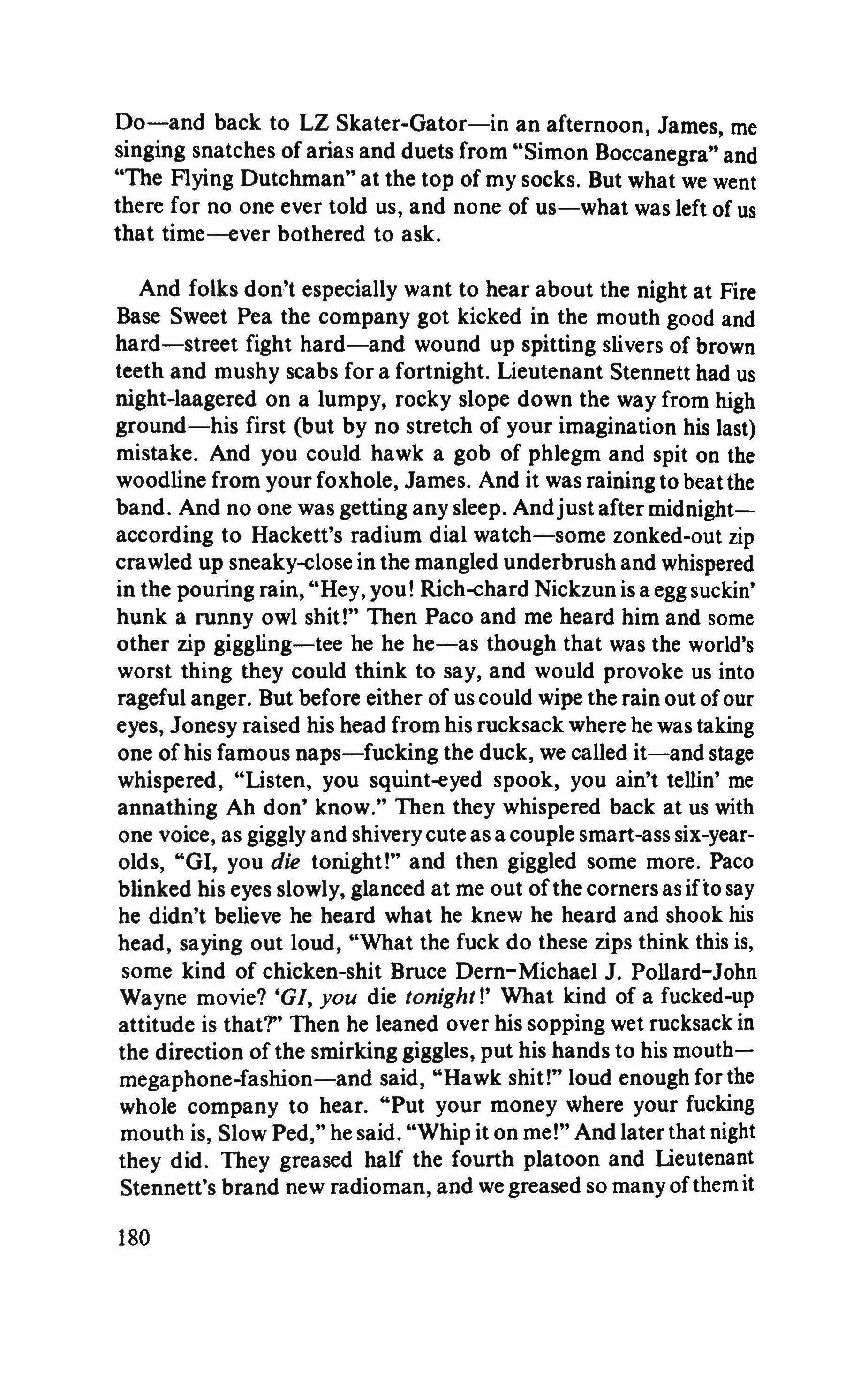
Do-and back to LZ Skater-Gator-in an afternoon, James, me singing snatches of arias and duets from "Simon Boccanegra" and "The Flying Dutchman" at the top of my socks. But what we went there for no one ever told us, and none of us-what was left of us that time-ever bothered to ask.
And folks don't especially want to hear about the night at Fire Base Sweet Pea the company got kicked in the mouth good and hard-street fight hard-and wound up spitting slivers of brown teeth and mushy scabs for a fortnight. Lieutenant Stennett had us night-laagered on a lumpy, rocky slope down the way from high ground-his first (but by no stretch of your imagination his last) mistake. And you could hawk a gob of phlegm and spit on the woodline from your foxhole, James. And it was raining to beat the band. And no one was getting any sleep. Andjust after midnightaccording to Hackett's radium dial watch-some zonked-out zip crawled up sneaky-close in the mangled underbrush and whispered in the pouring rain, "Hey, you! Rich-chard Nickzun is a egg suckin' hunk a runny owl shit!" Then Paco and me heard him and some other zip giggling-tee he he he-as though that was the world's worst thing they could think to say, and would provoke us into rageful anger. But before either of us could wipe the rain out of our eyes, Jonesy raised his head from his rucksack where he was taking one of his famous naps-fucking the duck, we called it-and stage whispered, "Listen, you squint-eyed spook, you ain't tellin' me annathing Ah don' know." Then they whispered back at us with one voice, as giggly and shivery cute as a couple smart-ass six-yearolds, "GI, you die tonight!" and then giggled some more. Paco blinked his eyes slowly, glanced at me out ofthe corners as ifto say he didn't believe he heard what he knew he heard and shook his head, saying out loud, "What the fuck do these zips think this is, some kind of chicken-shit Bruce Dern-Michael J. Pollard-John Wayne movie? 'G/, you die tonight!' What kind of a fucked-up attitude is that?" Then he leaned over his sopping wet rucksack in the direction of the smirkinggiggles, put his hands to his mouthmegaphone-fashion-and said, "Hawk shit!" loud enough for the whole company to hear. "Put your money where your fucking mouth is, Slow Ped," he said. "Whip it on me!" And later that night they did. They greased half the fourth platoon and Lieutenant Stennett's brand new radioman, and we greased so many ofthemit

wasn't even funny. The Lieutenant got pissed at Paco for mouthing off, and getting his radioman blown away so soon-but that was okay, because the Lieutenant wasn't "wrapped too tight," as Jonesy would say.
The next morning we got up, brushed ourselves off, cleared away the air-strike garbage-the fire fight junk and jungle junk-and dusted off the walking wounded and litter wounded, and the body bags. And the morning after that, just as right as rain, James, we saddled up our rucksacks and slugged offinto the deepest, baddest part of the Goongone Forest north of our base camp at Phuc Luc, looking to kick some ass-anybody's ass (can you dig it, James?)and take some names. Yesireebob! We hacked and humped our way from one end of that woods to the other-crisscrossing wherever our whim took us-feeling no more sophisticated or complicated or elegant than an organized gang, looking to nail any and all of that goddamned giggling slime we came across to the bam door. Then one bright and cheery morning when our month was up, Private First Class Elijah Raintree George Washington Carver Jones (Jonesy for short, James) had thirty-nine pair of blackened, leathery, wrinkly ears strung on a bit of black commo wire and wrapped like a garland around that bit ofturned-out brim ofhis steel helmet. He had snipped the ears off with a pearl-handled straight razor just as quick and slick as you'd lance a boil the size of a baseball-snicker-snack-the way he said his uncle could skin a poached deer. Jonesy cured the ears a coupledaysbytucking them under that piece of elastic around his helmet, then toted them crammed in a spare sock. The night before Lieutenant Stennett called it quits, Jonesy sat up way after dark stringing the ears on that bit of wire and suckingsnips of C-ration beefsteak through his teeth.
And the next afternoon, when we finally humped through the south gate at Phuc Luc, you should have seen those rear area motherfucking housecats bug their eyes and cringe every muscle in their bodies, and generally suck back against the buildings (you would have been right proud, James). Jonesy danced this way and that-shucking and jiving, juking and high-stepping, rolling his eyes and snapping his fingers in time-twirling that necklace to a fare-thee-well, shaking and jangling it (as much as a necklace of ears will jangle, James), and generally fooling with it as though it were a cheerleader's pompom.

And the Phuc Luc base camp Viets couldn't help but look, too. The Viets worked the PX checkout counters (good-looking women who had to put out right smart and regular to keep theirjobs) and the PX barbershop (where they could run a 35¢ haircut into 56.50 in fifteen minutes) and the stylishly thatched souvenirshack (where a bandy-legged cripple sold flimsy beer coolers and zippity-do-da housecat ashtrays, and athletic-stylejackets with a map ofVietnam embroidered on the back with the scrolled legend "Hot DamnVietnam" underneath). And, James, don't you know they were Viets ,during the day and zips at night (one zip we body-counted one time couldn't booby-trap a shithouse any better than he could cut hair).
Every Viet in the place crowded the doorways and the screened windows and such as that, gawking at Jonesy-and the rest of us, too. So he made a special show of shaking those ears at them, witch-doctor fashion, while booming out some gibberish mumbojumbo in his best amen-corner baritone and laughing that cool, nasty, grisly laugh ofhis,acting thejive fool for allthose housecats. And the rest ofthe company-what was left of us that time-had to laugh at him, too, even though we humped those last three hundred meters to the tents (up an incline) on mushy, bloody blisters with our teeth gritted, and the fraying rucksack straps squeezing permanent grooves in our shoulders. (A person never gets used to humping, James. When word comes, you saddle your rucksack on your back, take a deep breath and set your jaw good and tight, lean a little forward as though you're walking into a stiff and blunt nor'easter, and begin by putting one foot in front of the other. Then after a good while you've got two sharp painsstraight as a die from your shoulders to your kidneys, but there's nothing to do but grit your teeth a little harder and keep humping. I swear, James, those last uphill three hundred meters were the sorriest, goddamnedest three hundred motherfuckers in all of Southeast Asia.
Captain Courtney Culpepper, who never missed a chance to flash his West Point class ring in your face-that ring the size of a railroad watch-never once offered to send the trucks to meet usat the gate: said we had humped thatfar,mightas well hump the rest.)
Nor do folks want to hear what a stone bore (and I do mean stone, James) sitting bunker guard could be. Now, some called it perimeter guard and some called it berm guard, but it was all the
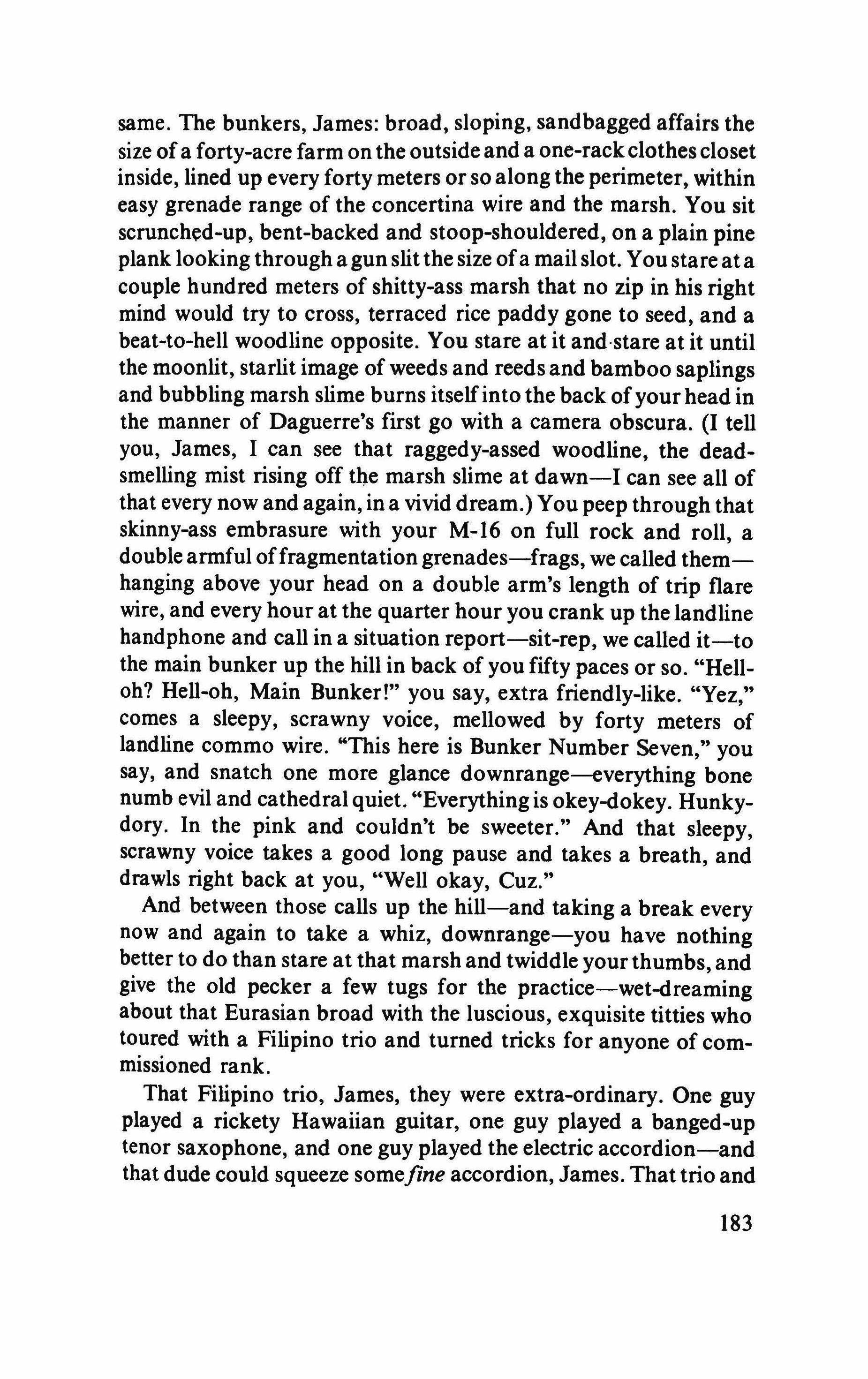
same. The bunkers, James: broad, sloping. sandbagged affairs the size of a forty-acre farm on the outside and a one-rack clothes closet inside, lined up every forty meters or so along the perimeter, within easy grenade range of the concertina wire and the marsh. You sit scrunched-up, bent-backed and stoop-shouldered, on a plain pine plank lookingthrough a gun slitthe size ofa mail slot. You stare at a couple hundred meters of shitty-ass marsh that no zip in his right mind would try to cross, terraced rice paddy gone to seed, and a beat-to-hell woodline opposite. You stare at it andstare at it until the moonlit, starlit image of weeds and reeds and bamboo saplings and bubbling marsh slime burns itselfinto the back ofyour head in the manner of Daguerre's first go with a camera obscura. (I tell you, James, I can see that raggedy-assed woodline, the deadsmelling mist rising off the marsh slime at dawn-I can see all of that every now and again, in a vivid dream.) You peep through that skinny-ass embrasure with your M-16 on full rock and roll, a double armful offragmentationgrenades-frags, we called themhanging above your head on a double arm's length of trip flare wire, and every hour at the quarter hour you crank up the landline handphone and call in a situation report-sit-rep, we called it-to the main bunker up the hill in back of you fifty paces or so. "Helloh? Hell-oh, Main Bunker!" you say, extra friendly-like. "Yez," comes a sleepy, scrawny voice, mellowed by forty meters of landline commo wire. "This here is Bunker Number Seven," you say, and snatch one more glance downrange-everything bone numb evil and cathedral quiet. "Everything is okey-dokey. Hunkydory. In the pink and couldn't be sweeter." And that sleepy, scrawny voice takes a good long pause and takes a breath, and drawls right back at you, "Well okay, Cuz."
And between those calls up the hill-and taking a break every now and again to take a whiz, downrange-you have nothing better to do than stare at that marsh and twiddle your thumbs, and give the old peeker a few tugs for the practice-wet-dreaming about that Eurasian broad with the luscious, exquisite titties who toured with a Filipino trio and turned tricks for anyone of commissioned rank.
That Filipino trio, James, they were extra-ordinary. One guy played a rickety Hawaiian guitar, one guy played a banged-up tenor saxophone, and one guy played the electric accordion-and that dude could squeeze somefine accordion, James. That trio and
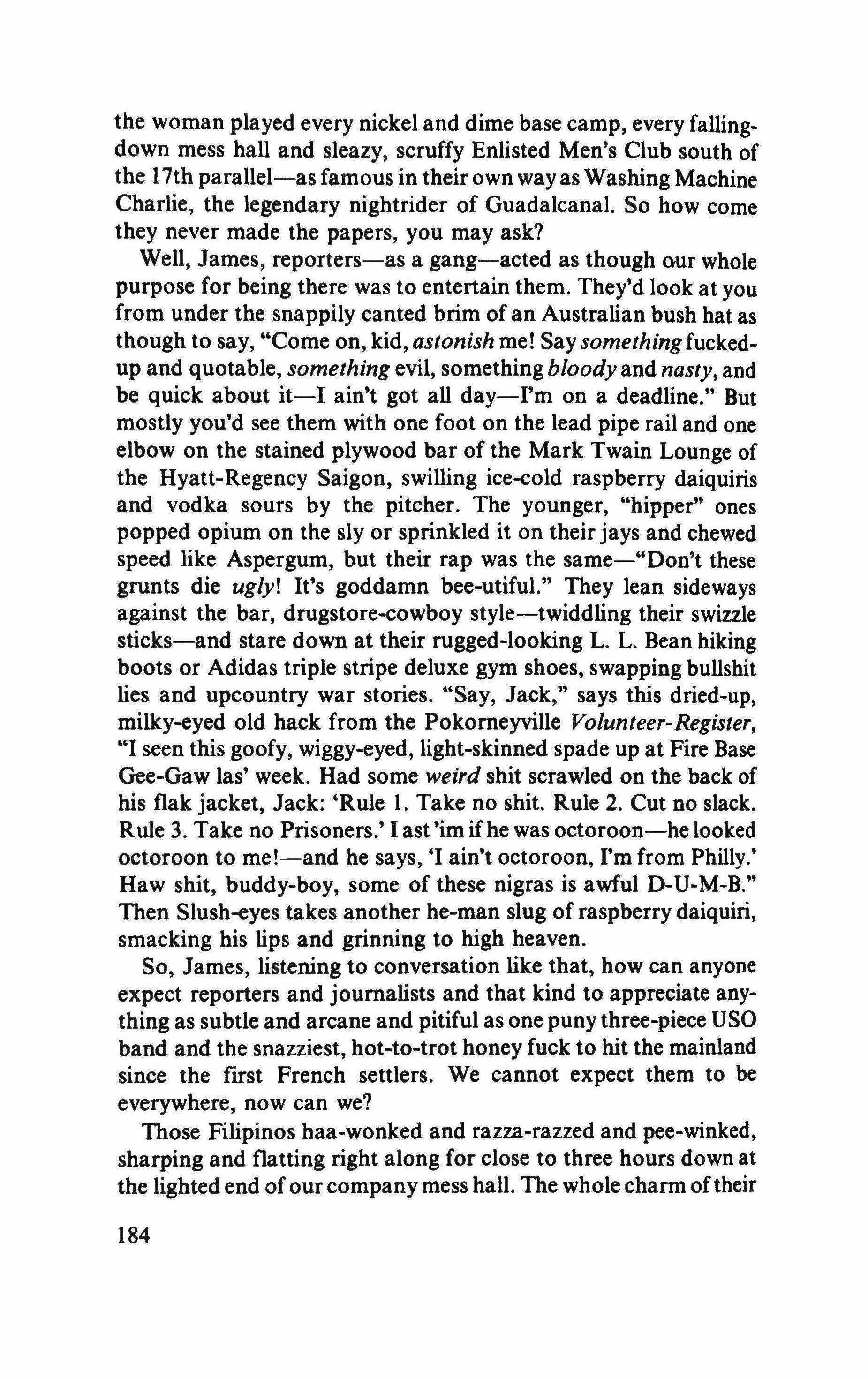
the woman played every nickel and dime base camp, every fallingdown mess hall and sleazy, scruffy Enlisted Men's Club south of the 17th parallel-as famous in their own way as Washing Machine Charlie, the legendary nightrider of Guadalcanal. So how come they never made the papers, you may ask?
Well, James, reporters-as a gang-acted as though our whole purpose for being there was to entertain them. They'd look at you from under the snappily canted brim of an Australian bush hat as though to say, "Come on, kid, astonish me! Saysomethingfuckedup and quotable, something evil, somethingbloody and nasty, and be quick about it-I ain't got all day-I'm on a deadline." But mostly you'd see them with one foot on the lead pipe rail and one elbow on the stained plywood bar of the Mark Twain Lounge of the Hyatt-Regency Saigon, swilling ice-cold raspberry daiquiris and vodka sours by the pitcher. The younger, "hipper" ones popped opium on the sly or sprinkled it on their jays and chewed speed like Aspergum, but their rap was the same-"Don't these grunts die ugly! It's goddamn bee-utiful." They lean sideways against the bar, drugstore-cowboy style-twiddling their swizzle sticks-and stare down at their rugged-looking L. L. Bean hiking boots or Adidas triple stripe deluxe gym shoes, swapping bullshit lies and upcountry war stories. "Say, Jack," says this dried-up, milky-eyed old hack from the Pokorneyville Volunteer-Register, "I seen this goofy, wiggy-eyed, light-skinned spade up at Fire Base Gee-Gaw las' week. Had some weird shit scrawled on the back of his flak jacket, Jack: 'Rule 1. Take no shit. Rule 2. Cut no slack. Rule 3. Take no Prisoners.' last 'im ifhe was octoroon-he looked octoroon to mel-and he says, 'I ain't octoroon, I'm from Philly.' Haw shit, buddy-boy, some of these nigras is awful D-U-M-B." Then Slush-eyes takes another he-man slug of raspberry daiquiri, smacking his lips and grinning to high heaven.
So, James, listening to conversation like that, how can anyone expect reporters and journalists and that kind to appreciate anything as subtle and arcane and pitiful as one puny three-piece usa band and the snazziest, hot-to-trot honey fuck to hit the mainland since the first French settlers. We cannot expect them to be everywhere, now can we?
Those Filipinos haa-wonked and razza-razzed and pee-winked, sharping and flatting right along for close to three hours down at the lighted end of our company mess hall. The whole charm oftheir

music was the fact that they couldn't hit the same note at the same time at the same pitch if you passed a hat, plunked the money down, put a .45 to their heads and said, "There! Now, damn it, play!" They played "The Orange.Blossom Special" and "Home on the Range" and "You Ain't Nothing But a Hound Dog" and "I Can't Get No Satisfaction"-after a fashion. And they played songs like "Good Night, Irene" and "I Wonder. Who's Kissing Her Now?" and "I Love You a Bushel and a Peck"-music no one ever heard of except the grayheaded lifers. That woman, who hardly had a stitch on (and she was one fluffy dish, James), wiggled those sweet pea titties right in the Colonel's moustache-Colonel Hubbel having himself a front row kitchen chair-and she sure did sit him up straight all right, all right. And the rest of the battalion officers and hangers-on (artillery chaplains and brigade busybodies on the slum) sat shoulder patch to shoulder patch with the Colonel in a squared-off semicircle just as parade-ground pretty as you please. They crossed their legs to hide their hard-ons, and tried to look as blase and matter-of-fact-as officer-like and gentlemanly-as was possible, trying to keep us huns away from the honey. The rest of the company, us grunts, stood close-packed on the floor and the chairs and the tables, and hung one-armed from the rafters, our tongues hanging out, swilling beer from the meat locker and circlejerking our brains out-our forearms just a-flying, our forearms just a blur. And that broad shimmied and pranced around nearnaked, jiggling her sweating titties like someone juggling two onepound lumps of greasy, shining hamburger and dry-humping the air with sure and steady, rhythmic thrusts of her snatch-ta-tadaha-humpa, ta-tada-ha-humpa, ta-tada-ha-humpa, ha-who! Then a couple dudes from the third platoon's ambush began to clap their hands in time and shout, "Come on, Sweet Pea, twiddle those goddamned things in my moustache! Come on, Sweet Pea, why don'tcha sit on my face! Haw haw haw!"
But most particularly, folks do not want to hear about the night at LZ Skater-Gator-down the way from Fire Base Harriette and within earshot of a rag-tag bunch of mud and thatch hootches everyone called Gookville-when the whole company, except for one guy, got killed. Fucked-updead, James, scarfed up. Everybody but Paco got nominated and voted into the Hall of Fame in one fell swoop. The company was night-Iaagered in a tight-assed perimeter

up past our eyeballs in a no-shit fire fight with some headhunter NVA-corpses and cartridge brass and oily magazines and dud frags scattered around, and everyone running low on ammo. Lieutenant Stennett had been calling in air strikes and gunships and artillery and dust-offs like they were going out ofstyle when all of a sudden-zooM-the air came alive and crawled and yammered and whizzed and hummed with the roar and buzz of a thousand incoming rounds. Everyone looked up-GIs and zips and knew it was every incoming round left in creation, knew that the dirt under our bellies (and the woods and villes and us with it) was going to be pulverized to ash (and I do mean pulverized, James)-so you could draw a rake through it and not find the chunks, knew by the cool and quiet whispering those rounds were the size of houses. I don't know what the rest ofthe companydidor the zips for that matter-but the second squad of the second platoon swapped that peculiar look around that travels from victim to victim in any disaster. We ciphered it out right then and there that we couldn't dig a hole deep enough, fast enoughcouldn't crawl under something thick enough, couldn't drop our rifles, and what not, and turn tail and beat feet far enough but that this incoming wouldn't catch us by the scruff of the shirt, so to speak, and lay us lengthwise. We looked around at one another as much to say, "My man, this ain't your average, ordinary,everyday, garden-variety sort of incoming. This one's going to blow everybody out." I tell you, James, there are those days-no matter how hard you hump and scrap and scratch-when there is simply nothing left to do but pucker and submit. I leaned my M-16 against a fresh-cut stump, took off my steel helmet and sat down on it, and ran my hands and fingers through my hair to make myself as presentable as possible. Paco slipped off his bandanna and sprinkled the last of his canteen water on it, wiped his face and hands, then twirled it up again and tied it around his neck-the knot to one side. Jonesy laid himself out with his head on his rucksack getting ready to take one of his famous naps. And Hackett, who had a red and black tattoo of a dragon on the inside ofhis forearm from his wrist to his elbow, buttoned his shirt sleeves and brushed himself off, and sat cross-legged with his hands folded meditatively in his lap. In another minute everyone within earshot was quiet, like the hush of anticipation that travels through any crowd. But a minute later the four of us couldn't help but snicker, because we
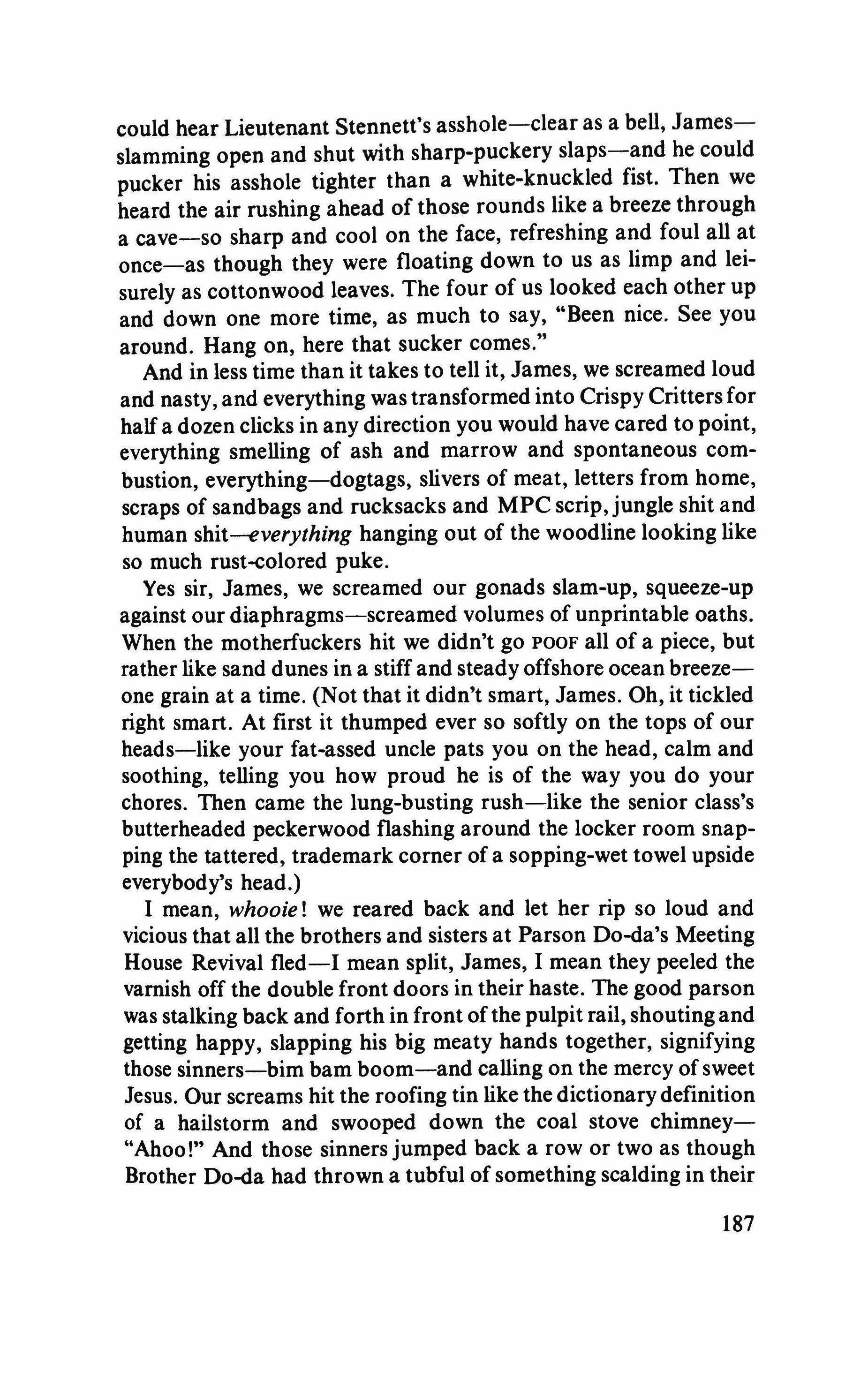
could hear Lieutenant Stennett's asshole-clear as a bell, Jamesslamming open and shut with sharp-puckery slaps-and he could pucker his asshole tighter than a white-knuckled fist. Then we heard the air rushing ahead of those rounds like a breeze through a cave-so sharp and coolon the face, refreshing and foul all at once-as though they were floating down to us as limp and leisurely as cottonwood leaves. The four of us looked each other up and down one more time, as much to say, "Been nice. See you around. Hang on, here that sucker comes."
And in less time than it takes to tell it, James, we screamed loud and nasty, and everything was transformed into Crispy Critters for half a dozen clicks in any direction you would have cared to point, everything smelling of ash and marrow and spontaneous combustion, everything-dogtags, slivers of meat, letters from home, scraps of sandbags and rucksacks and MPC scrip,jungle shit and human shit-everything hanging out of the woodline looking like so much rust-colored puke.
Yes sir, James, we screamed our gonads slam-up, squeeze-up against our diaphragms-screamed volumes of unprintable oaths. When the motherfuckers hit we didn't go POOF all of a piece, but rather like sand dunes in a stiff and steady offshore ocean breezeone grain at a time. (Not that it didn't smart, James. Oh, it tickled right smart. At first it thumped ever so softly on the tops of our heads-like your fat-assed uncle pats you on the head, calm and soothing, telling you how proud he is of the way you do your chores. Then came the lung-busting rush-like the senior class's butterheaded peckerwood flashing around the locker room snapping the tattered, trademark corner of a sopping-wet towel upside everybody's head.)
I mean, whooie! we reared back and let her rip so loud and vicious that all the brothers and sisters at Parson Do-da's Meeting House Revival fled-I mean split, James, I mean they peeled the varnish off the double front doors in their haste. The good parson was stalking back and forth in front ofthe pulpit rail, shouting and getting happy, slapping his big meaty hands together, signifying those sinners-bim bam boom-and calling on the mercy of sweet Jesus. Our screams hit the roofing tin like the dictionary definition of a hailstorm and swooped down the coal stove chimney"Ahoo!" And those sinners jumped back a row or two as though Brother Do-da had thrown a tubful of something scalding in their
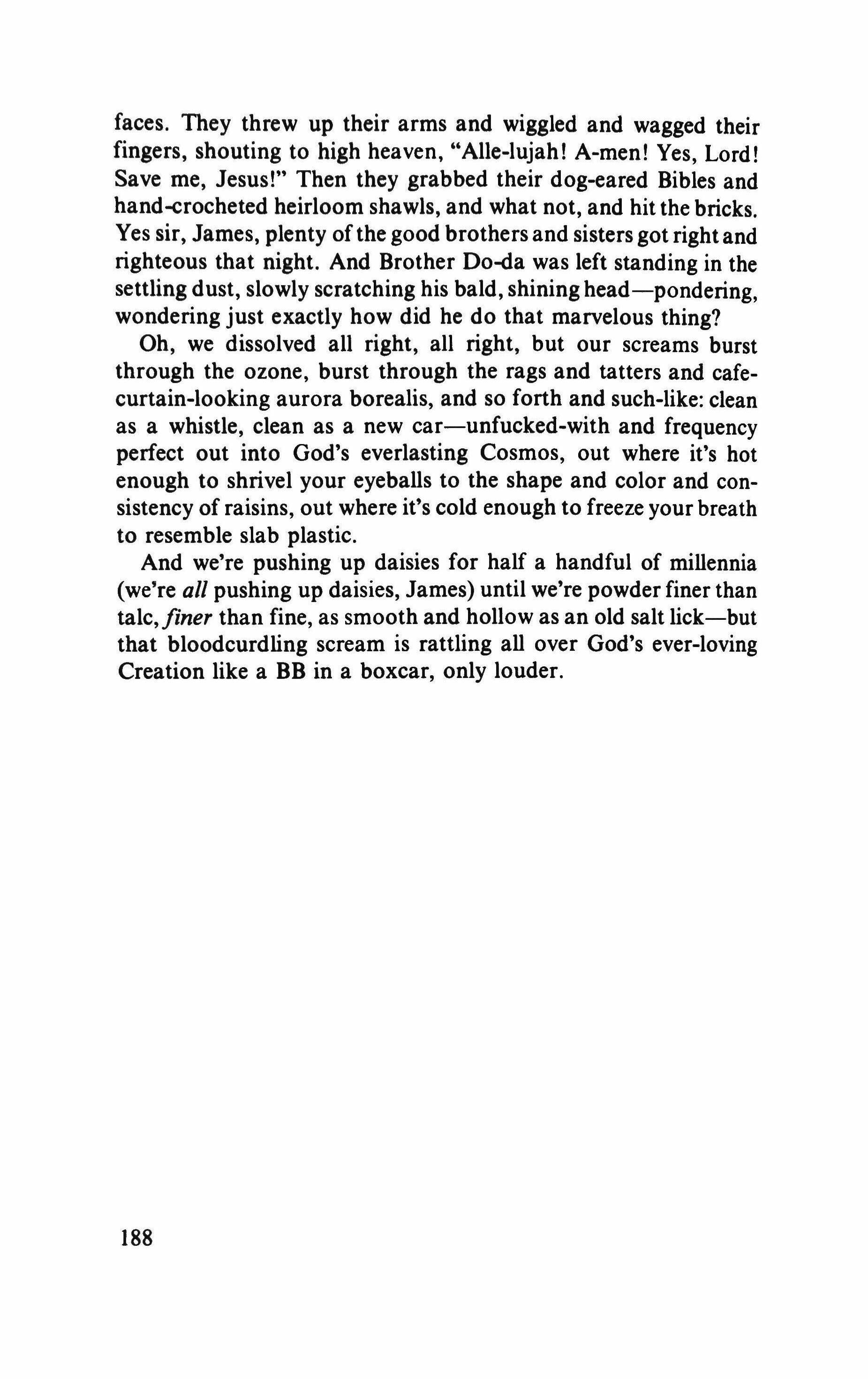
faces. They threw up their arms and wiggled and wagged their fingers, shouting to high heaven, "Alle-lujahl A-men! Yes, Lord! Save me, Jesus!" Then they grabbed their dog-eared Bibles and hand-crocheted heirloom shawls, and what not, and hit the bricks. Yes sir, James, plenty ofthe good brothers and sisters got right and righteous that night. And Brother Do-da was left standing in the settling dust, slowly scratching his bald, shininghead-pondering, wondering just exactly how did he do that marvelous thing?
Oh, we dissolved all right, all right, but our screams burst through the ozone, burst through the rags and tatters and cafecurtain-looking aurora borealis, and so forth and such-like: clean as a whistle, clean as a new car-unfucked-with and frequency perfect out into God's everlasting Cosmos, out where it's hot enough to shrivel your eyeballs to the shape and color and consistency of raisins, out where it's cold enough to freeze your breath to resemble slab plastic.
And we're pushing up daisies for half a handful of millennia (we're all pushing up daisies, James) until we're powder finer than talc,finer than fine, as smooth and hollow as an old salt lick-but that bloodcurdling scream is rattling all over God's ever-loving Creation like a BB in a boxcar, only louder.
In loco parentis
Charles A. Coleman, Jr.
The preponderance of men who consciously recognize that they had a hand in marring the idealistic notion of the Family of Man is an acute neurosis born of the Fifties and nurtured by the liberalism of the Sixties. These men form the majority of our psychiatric communities. And as they witnessed-or participated in-the wholesale destruction of another race, they experienced the mutilation of their own personal, psychological identities reflected in the dismemberment of an alien culture.
-G. W. Nieland, M.D. from a paper presented at the National Conference of Military Psychiatrists November, 1971
"In Loco Parentis" is excerptedfrom a larger documentary concerning Vietnam War-relatedpsychoses entitled The Catalogue of Chameleons. The central action of the book takes place in Chambers Pavilion-the psychiatric complex at Brooke Army Medical Center (BAM-C), Fort Sam Houston, Texas. Here, gathered together over fourfloors and eight wards, exist nearly three hundred veterans of Vietnam. The book's principal narrator, Andrew Collins, is one ofthese veterans. Butfor us psychos, there is no return, to peacetime. lfwe close our eyes, it is to watch with amazement the unforgettable acts. Our acts. Paintedin minia-

ture on the inside ofour eyelids. And with them open? Wefear the outsider who may decipher the secret core of our tainted souls."
Many of the servicemen who aimlessly wander the long corridors of Chambers Pavilion were committeddirectlyfrom action in Vietnam. Edward Sailor, the soldier in "In Loco Parentis," was field-committed following an ingenious night ambush by Viet Cong regulars. Sailor's psychiatrist, Dr. Nieland, has been working with himfor three months in an effort toprepare him toface the Psychiatric Medical Review Board-a tribunal ofArmy officers who will decide his ultimatefate, as well as thefates ofthe other men who have been committed to Chambers.
Because ofthe difficulty in determining the exact circumstances necessitating formal psychiatric commitment, the more progressive psychiatrists assigned to Chambers often requisitionedreports directlyfrom personnel in Vietnam who witnessed the trauma, or who could describe the incident which precipitated the soldier's breakdown. Frequently these reports were tape-recorded in Vietnam and sent back to thepsychiatrist-in this case to Dr. Nieland at Chambers Pavilion.
Because the information andincidents describedin this story are/actual, namesand occasionally places and dates-have been changedfor obvious reasons.
He closed the door as he returned to his office. Shuffling papers, drawers opened and closed, then a voice, but not his. It began to speak abruptly, garbled at first, the pitch rising and falling in fluctuating volume:
" regarding his condition, evacuated Tokyo. Received from Major Penderspot, Fort Sam, BAMC, 12 March. Report by Sergeant Ross."
The strange voice stopped. More papers were jostled. The impact of a stapler. Loud knock on the main door to Dr. Nieland's office. I heard it open.
"Edward, come in please. Right on time. Here, sit down. Yes. Lieutenant Cummings spoke to your wife a short time ago and Carol-it's Carol, isn't it?-was overjoyed to hear that she can see you soon. And I'm hopeful that all will run smoothly this afternoon so you can be dropped to the ground floor according to schedule."
"1-1 don't k-kn-now what to exp-p-pect n-now. I mean I-I've changed. We've changed. I wo-wonder wh-what we'll do now."
"Well, you
"And I know-ow we've ch-ch-chan-ged."
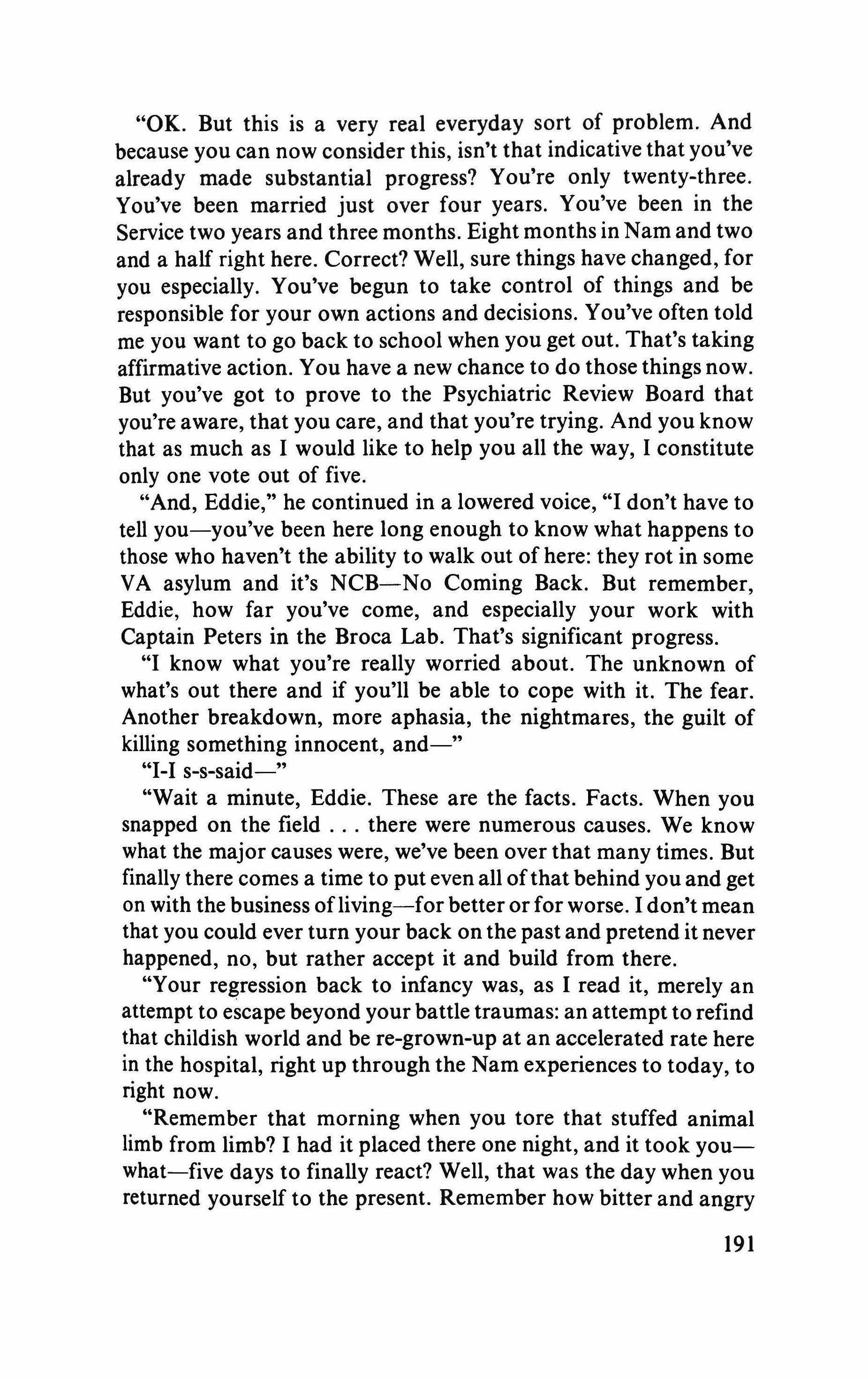
"OK. But this is a very real everyday sort of problem. And because you can now consider this, isn't that indicative that you've already made substantial progress? You're only twenty-three. You've been married just over four years. You've been in the Service two years and three months. Eight months in Nam and two and a half right here. Correct? Well, sure things have changed, for you especially. You've begun to take control of things and be responsible for your own actions and decisions. You've often told me you want to go back to school when you get out. That's taking affirmative action. You have a new chance to do those things now. But you've got to prove to the Psychiatric Review Board that you're aware, that you care, and that you're trying. And you know that as much as 1 would like to help you all the way, I constitute only one vote out of five.
"And, Eddie," he continued in a lowered voice, "I don't have to tell you-you've been here long enough to know what happens to those who haven't the ability to walk out of here: they rot in some VA asylum and it's NCB-No Coming Back. But remember, Eddie, how far you've come, and especially your work with Captain Peters in the Broca Lab. That's significant progress.
"I know what you're really worried about. The unknown of what's out there and if you'll be able to cope with it. The fear. Another breakdown, more aphasia, the nightmares, the guilt of killing something innocent, and-"
"1-1 s-s-said=-"
"Wait a minute, Eddie. These are the facts. Facts. When you snapped on the field there were numerous causes. We know what the major causes were, we've been over that many times. But finally there comes a time to put even all ofthat behind you and get on with the business ofliving-for better or for worse. 1 don't mean that you could ever turn your back on the past and pretend it never happened, no, but rather accept it and build from there.
"Your regression back to infancy was, as 1 read it, merely an attempt to escape beyond your battle traumas: an attempt to refind that childish world and be re-grown-up at an accelerated rate here in the hospital, right up through the Nam experiences to today, to right now.
"Remember that morning when you tore that stuffed animal limb from limb? 1 had it placed there one night, and it took youwhat-five days to finally react? Well, that was the day when you returned yourself to the present. Remember how bitter and angry

you were? But you asserted then that you did want the real world again, no matter what price you'd have to pay for it. That, Eddie, was as much a fight for survival as was your earlier flight from reality-your regression to infancy. And you really chose then for yourself."
"1-1 unders-s-s-stand that. 1 know-w-w-w-w w-w-w-what you mean. But I don't feel l-l-l-like the s-s-same pers-s-s-person. Es-ss-s-s-s because of the s-s-stuttering. Why does it still happen?"
"I've gone over that with Captain Peters and I trust his findings. In fact, I based my whole approach to your problem on his early diagnosis. He feels that since your reflexes, your vocabulary, your grammar, and most important your phrasing and intonation are all in fine working order, then the problem is really your unclear attitude as to whether you want to participate in the real world and to what degree. What Peters has been trying to prove is that there is absolutely nothing wrong with you organically. The skull fracture you received on the field had no effect on your nervous system. Dr. Penderspot originally assumed that there was a lesion or pressure spot affecting the speech centers in your brain. That assumption proved false. In essence, you stutter because some protective device in you wants you to stutter. Why? Well, 1 feel that the conscious impediments to your normal articulation-your speech-remove you slightly Well, they excuse you from the responsibilities and pressures of being normal in the cold, cruel world. Peters said that you stutter much more when direct demands are put upon you, or when something causes you to associate with past experiences. The stuttering permits you to bridge back and forth between the regressive infantile retreat and the more dominant part of you which is mature, normal and healthy. Is all of that clear?"
"Yes, it is. 1 s-s-see, But even w-w-w-when I try to control it, it d-d-d-doesn't w-wo-work."
"Well, that's probably because you're overconscious of it. I've heard you talk to other patients and even to me with absolute ease."
"I know."
"OK. Now, Eddie, 1 want you to hear this tape recording. It's going to take you back to ah, let's see. To the night of February 2. We've been through some of this before. Now you'll hear your buddy, Sergeant Ross, give his own account of what happened to you that night. Remember, Eddie, that I couldn't possibly have played this for you until now. You simply wouldn't have accepted it, and chances were that it might have driven you deeper into
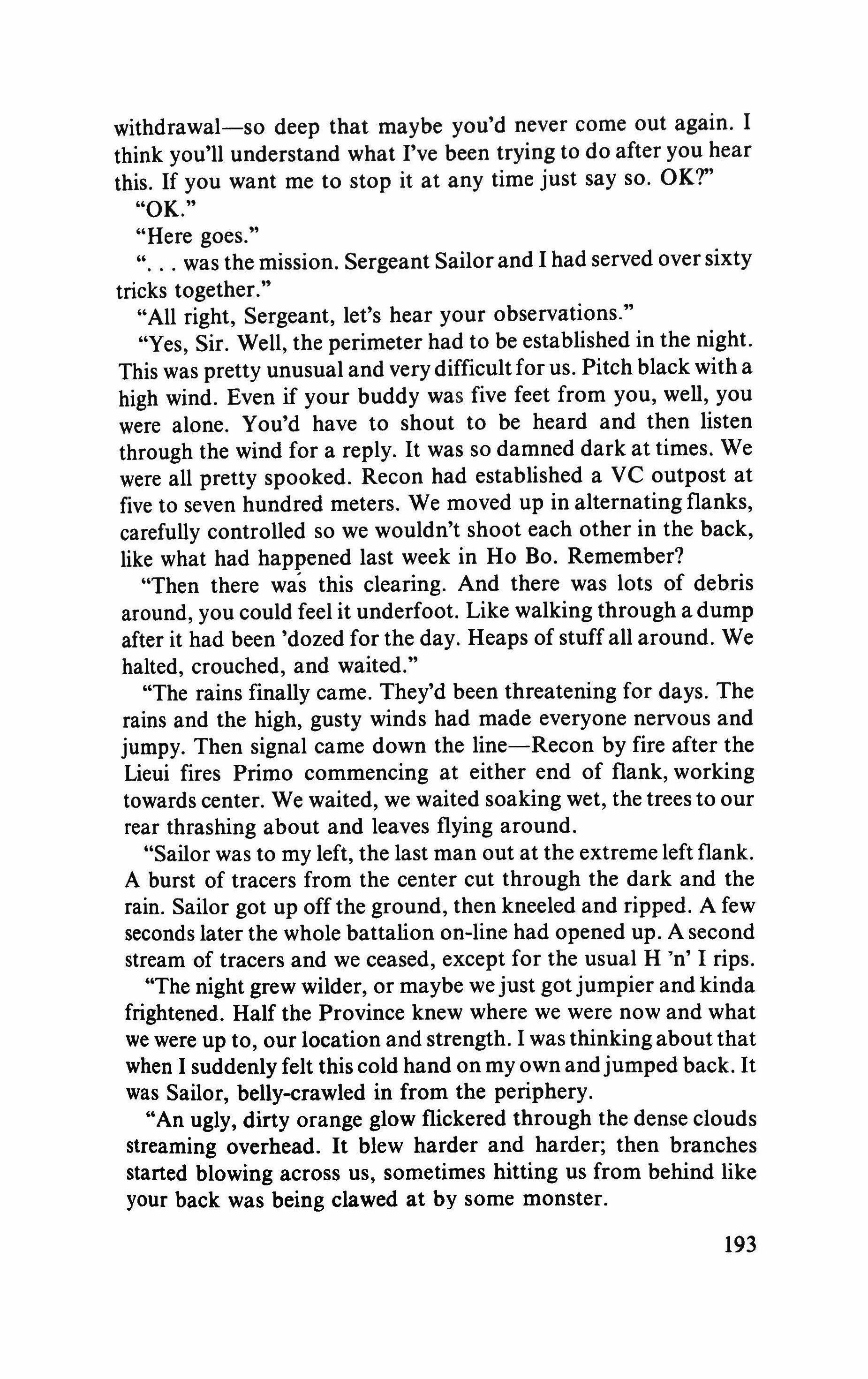
withdrawal-so deep that maybe you'd never come out again. I think you'll understand what I've been trying to do after you hear this. If you want me to stop it at any time just say so. OK?"
"OK."
"Here goes."
was the mission. Sergeant Sailor and I had served over sixty tricks together."
"All right, Sergeant, let's hear your observations."
"Yes, Sir. Well, the perimeter had to be established in the night. This was pretty unusual and very difficult for us. Pitch black with a high wind. Even if your buddy was five feet from you, well, you were alone. You'd have to shout to be heard and then listen through the wind for a reply. It was so damned dark at times. We were all pretty spooked. Recon had established a VC outpost at five to seven hundred meters. We moved up in alternating flanks, carefully controlled so we wouldn't shoot each other in the back, like what had happened last week in Ho Bo. Remember?
"Then there was this clearing. And there was lots of debris around, you could feel it underfoot. Like walking through a dump after it had been 'dozed for the day. Heaps of stuff all around. We halted, crouched, and waited."
"The rains finally came. They'd been threatening for days. The rains and the high, gusty winds had made everyone nervous and jumpy. Then signal came down the line-Recon by fire after the Lieui fires Primo commencing at either end of flank, working towards center. We waited, we waited soaking wet, the trees to our rear thrashing about and leaves flying around.
"Sailor was to my left, the last man out at the extreme left flank. A burst of tracers from the center cut through the dark and the rain. Sailor got up off the ground, then kneeled and ripped. A few seconds later the whole battalion on-line had opened up. A second stream of tracers and we ceased, except for the usual H 'n' I rips.
"The night grew wilder, or maybe we just gotjumpier and kinda frightened. Half the Province knew where we were now and what we were up to, our location and strength. I was thinking about that when I suddenly felt this cold hand on my own andjumped back. It was Sailor, belly-crawled in from the periphery.
"An ugly, dirty orange glow flickered through the dense clouds streaming overhead. It blew harder and harder; then branches started blowing across us, sometimes hitting us from behind like your back was being clawed at by some monster.
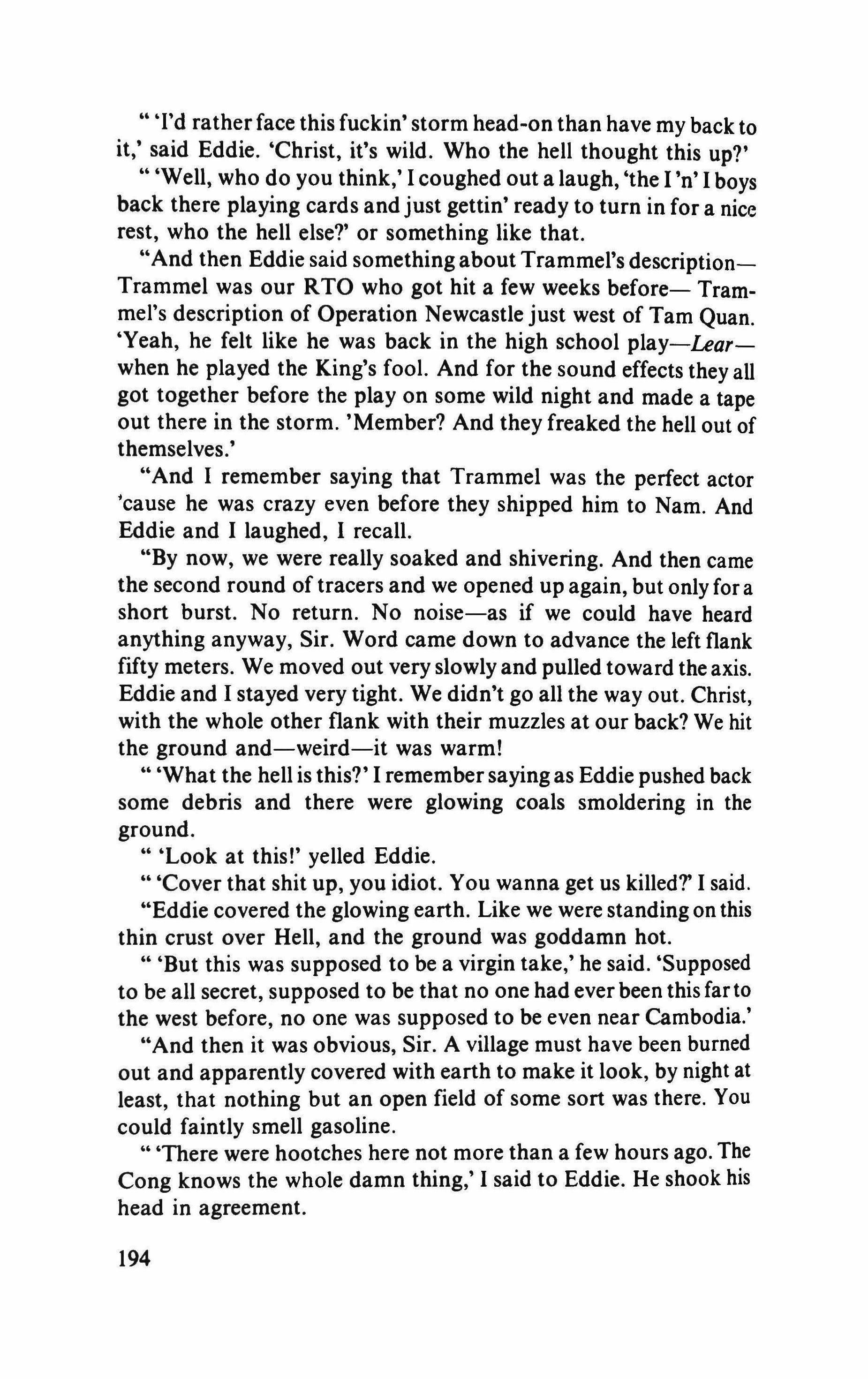
'I'd rather face this fuckin' storm head-on than have my back to it,' said Eddie. 'Christ, it's wild. Who the hell thought this up?'
'Well, who do you think,' I coughed out a laugh, 'the I 'n' I boys back there playing cards and just gettin' ready to turn in for a nice rest, who the hell else?' or something like that.
"And then Eddie said something about Trammel's descriptionTrammel was our RTO who got hit a few weeks before- Trammel's description of Operation Newcastle just west of Tam Quan. 'Yeah, he felt like he was back in the high school plaY-Learwhen he played the King's fool. And for the sound effects they all got together before the play on some wild night and made a tape out there in the storm. 'Member? And they freaked the hell out of themselves. '
"And I remember saying that Trammel was the perfect actor 'cause he was crazy even before they shipped him to Nam. And Eddie and I laughed, I recall.
"By now, we were really soaked and shivering. And then came the second round of tracers and we opened up again, but only for a short burst. No return. No noise-as if we could have heard anything anyway, Sir. Word came down to advance the left flank fifty meters. We moved out very slowly and pulled toward the axis. Eddie and I stayed very tight. We didn't go all the way out. Christ, with the whole other flank with their muzzles at our back? We hit the ground and-weird-it was warm!
'What the hell is this?' I remember saying as Eddie pushed back some debris and there were glowing coals smoldering in the ground.
" 'Look at this!' yelled Eddie.
" 'Cover that shit up, you idiot. You wanna get us killed?' I said.
"Eddie covered the glowing earth. Like we were standing on this thin crust over Hell, and the ground was goddamn hot.
'But this was supposed to be a virgin take,' he said. 'Supposed to be all secret, supposed to be that no one had ever been this far to the west before, no one was supposed to be even near Cambodia.'
"And then it was obvious, Sir. A village must have been burned out and apparently covered with earth to make it look, by night at least, that nothing but an open field of some sort was there. You could faintly smell gasoline
'There were hootches here not more than a few hours ago. The Cong knows the whole damn thing,' I said to Eddie. He shook his head in agreement.
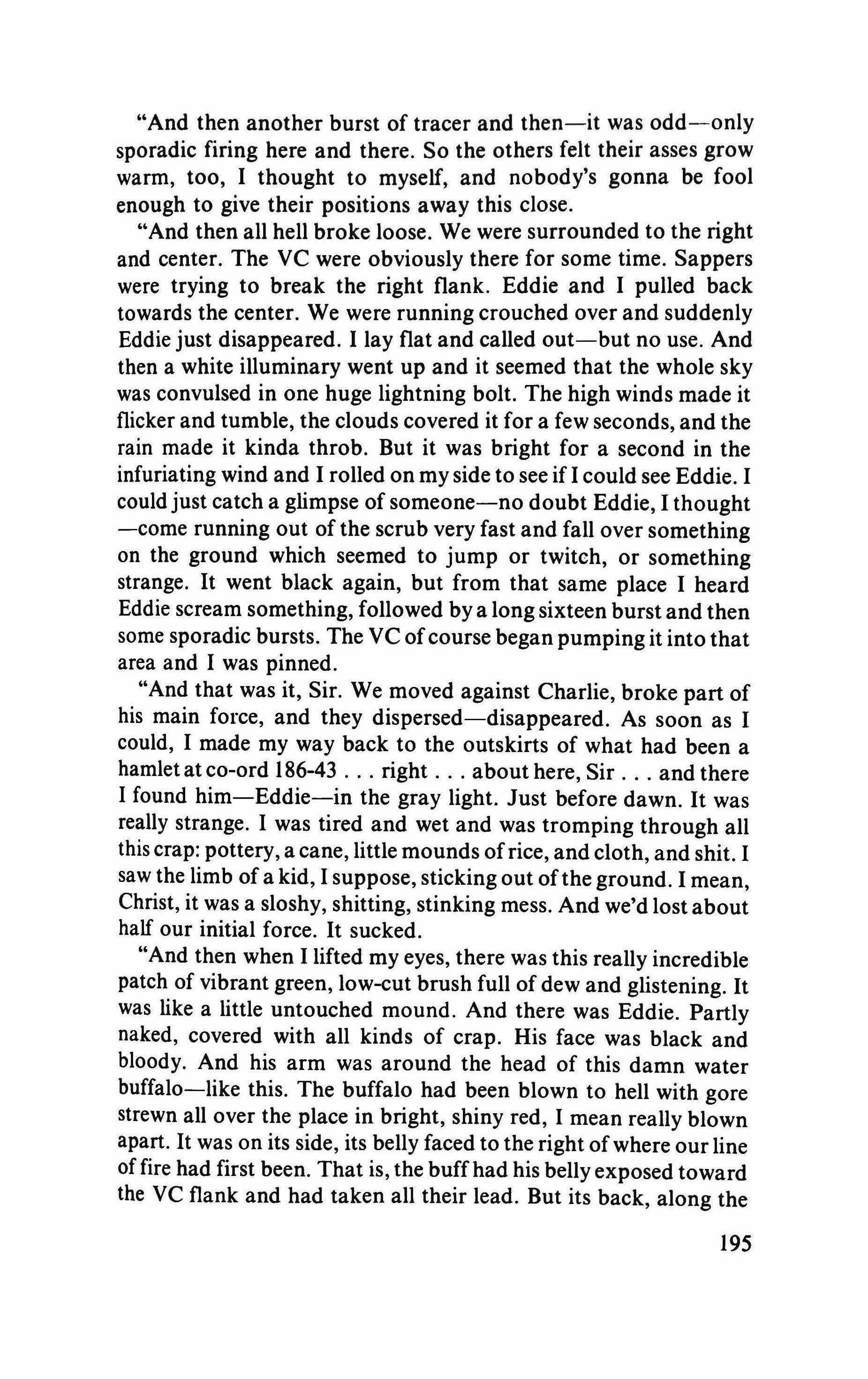
"And then another burst of tracer and then-it was odd-only sporadic firing here and there. So the others felt their asses grow warm, too, I thought to myself, and nobody's gonna be fool enough to give their positions away this close.
"And then all hell broke loose. We were surrounded to the right and center. The VC were obviously there for some time. Sappers were trying to break the right flank. Eddie and I pulled back towards the center. We were running crouched over and suddenly Eddie just disappeared. I lay flat and called out-but no use. And then a white illuminary went up and it seemed that the whole sky was convulsed in one huge lightning bolt. The high winds made it flicker and tumble, the clouds covered it for a few seconds, and the rain made it kinda throb. But it was bright for a second in the infuriating wind and I rolled on my side to see if I could see Eddie. I could just catch a glimpse of someone-no doubt Eddie, I thought -come running out of the scrub very fast and fall over something on the ground which seemed to jump or twitch, or something strange. It went black again, but from that same place I heard Eddie scream something, followed by a long sixteen burst and then some sporadic bursts. The VC of course began pumping it into that area and I was pinned.
"And that was it, Sir. We moved against Charlie, broke part of his main force, and they dispersed-disappeared. As soon as I could, I made my way back to the outskirts of what had been a hamlet at co-ord 186-43 right about here, Sir and there I found him-Eddie-in the gray light. Just before dawn. It was really strange. I was tired and wet and was tromping through all this crap: pottery, a cane, little mounds ofrice, and cloth, and shit. I saw the limb of a kid, I suppose, sticking out ofthe ground. I mean, Christ, it was a sloshy, shitting, stinking mess. And we'd lost about half our initial force. It sucked.
"And then when I lifted my eyes, there was this really incredible patch of vibrant green, low-cut brush full of dew and glistening. It was like a little untouched mound. And there was Eddie. Partly naked, covered with all kinds of crap. His face was black and bloody. And his arm was around the head of this damn water buffalo-like this. The buffalo had been blown to hell with gore strewn all over the place in bright, shiny red, I mean really blown apart. It was on its side, its belly faced to the right ofwhere our line of fire had first been. That is, the buff had his belly exposed toward the VC flank and had taken all their lead. But its back, along the
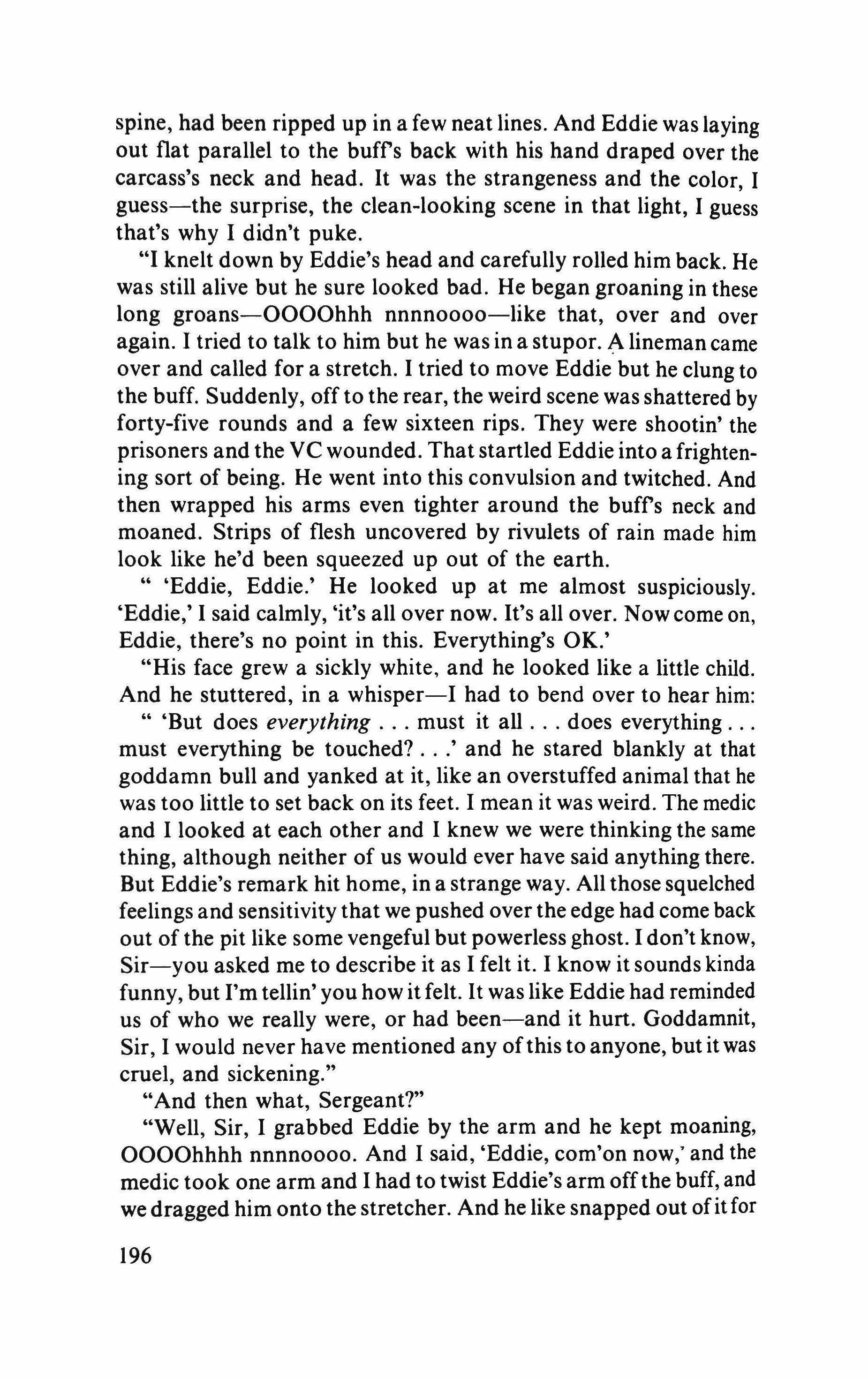
spine, had been ripped up in a few neat lines. And Eddie was laying out flat parallel to the buffs back with his hand draped over the carcass's neck and head. It was the strangeness and the color, I guess-the surprise, the clean-looking scene in that light, I guess that's why I didn't puke.
"I knelt down by Eddie's head and carefully rolled him back. He was still alive but he sure looked bad. He began groaning in these long groans-OOOOhhh nnnnoooo-like that, over and over again. I tried to talk to him but he was in a stupor. A lineman came over and called for a stretch. I tried to move Eddie but he clung to the buff. Suddenly, off to the rear, the weird scene was shattered by forty-five rounds and a few sixteen rips. They were shootin' the prisoners and the VC wounded. That startled Eddie into a frightening sort of being. He went into this convulsion and twitched. And then wrapped his arms even tighter around the buffs neck and moaned. Strips of flesh uncovered by rivulets of rain made him look like he'd been squeezed up out of the earth.
'Eddie, Eddie.' He looked up at me almost suspiciously. 'Eddie,' I said calmly, 'it's all over now. It's all over. Nowcome on, Eddie, there's no point in this. Everything's OK.'
"His face grew a sickly white, and he looked like a little child. And he stuttered, in a whisper-I had to bend over to hear him: 'But does everything must it all does everything must everything be touched? .' and he stared blankly at that goddamn bull and yanked at it, like an overstuffed animal that he was too little to set back on its feet. I mean it was weird. The medic and I looked at each other and I knew we were thinking the same thing, although neither of us would ever have said anything there. But Eddie's remark hit home, in a strange way. All those squelched feelings and sensitivity that we pushed over the edge had come back out of the pit like some vengeful but powerless ghost. I don't know, Sir-you asked me to describe it as I felt it. I know it sounds kinda funny, but I'm tellin' you how it felt. It was like Eddie had reminded us of who we really were, or had been-and it hurt. Goddamnit, Sir, I would never have mentioned any ofthis to anyone, but it was cruel, and sickening."
"And then what, Sergeant?"
"Well, Sir, I grabbed Eddie by the arm and he kept moaning, OOOOhhhh nnnnoooo. And I said, 'Eddie, com'on now; and the medic took one arm and I had to twist Eddie's arm offthe buff, and we dragged him onto the stretcher. And he like snapped out ofitfor

a
second and extended his arms like he wanted to embrace that gory animal once more. And then he fell back on the stretcher. And that was it. He just moaned and cried and never seemed to regain consciousness. And I helped them put him on the medivac and that's the last I saw of him."
"OK, Sergeant Ross. Thank you very much. I'll send this tape recording right off This is Colonel Regins
"Sir, excuse me, but do you know anything about him?"
"Only that he's in the States, in Texas, at the mental hospital there. The shrinks RQ-d for close-up information and what I think you just reported should present a fine picture."
"Yes, Sir. I hope so You know, it must have been that buff he fell over and Eddie thinking it was a VC or something must have ripped it up the back, and then he probably realized what it was. Saved his life, I bet."
"Yes, Sergeant, thank you. This is Colonel Re "
When Nieland stopped the voices on the tape, I was suspended waiting for a timed charge to explode. I lay there breathless, my muscles tense in expectation of something sensational going on behind the door. I was feeling again! Felt Sailor quietly crying in the next room.
just part of what's to be faced, Eddie. That's just part ofit," said Nieland softly. "Look at it, Eddie, you're at a point now where we can talk about these things, don't you see? You have your choice now. Most of these men in here-these ghosts of men-have no choice, at least not the choice you have. You fought for your country-now to hell with the country, fight for yourself.
"When we meet-" Dr. Nieland was interrupted by a knock on the door.
"One minute," shouted Nieland.
"OK, Eddie. When we go upstairs you're gonna be on your own. I'll play the tape, they'll ask you the usual questions. Just keep cool."
Another knock at the door.
"Yes, yes! And Eddie, afterthe Board has finished reviewing your case you just get up and walk back to the ward by yourself. OK? I'm not going to call down an escort."
"Come in!"
"Sir, General Desmond wishes to notify you that the Psychiatric Medical Review Board is in session and is waiting for you."
"Let's go, Eddie."
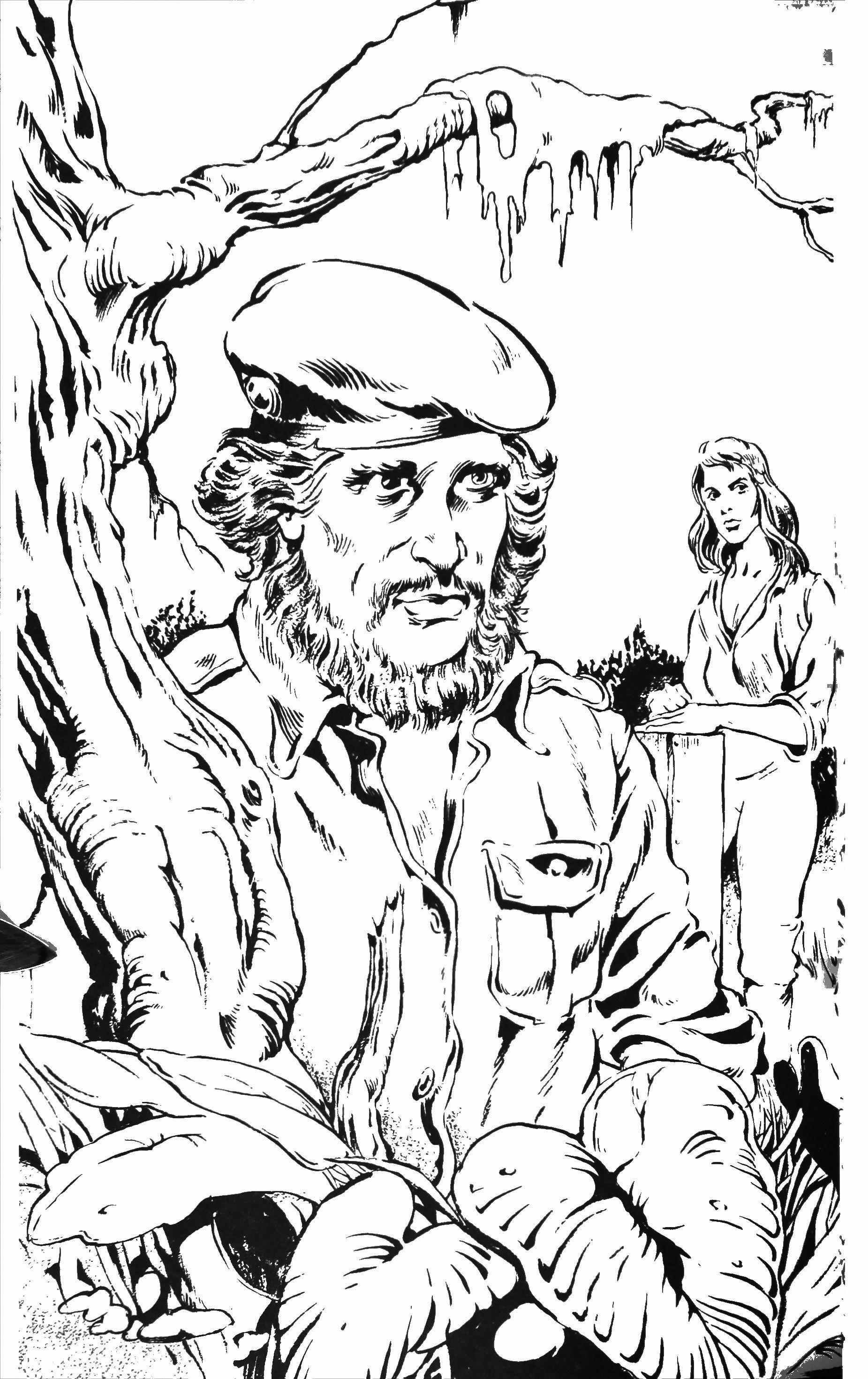
Bolivia
Jay Cantor
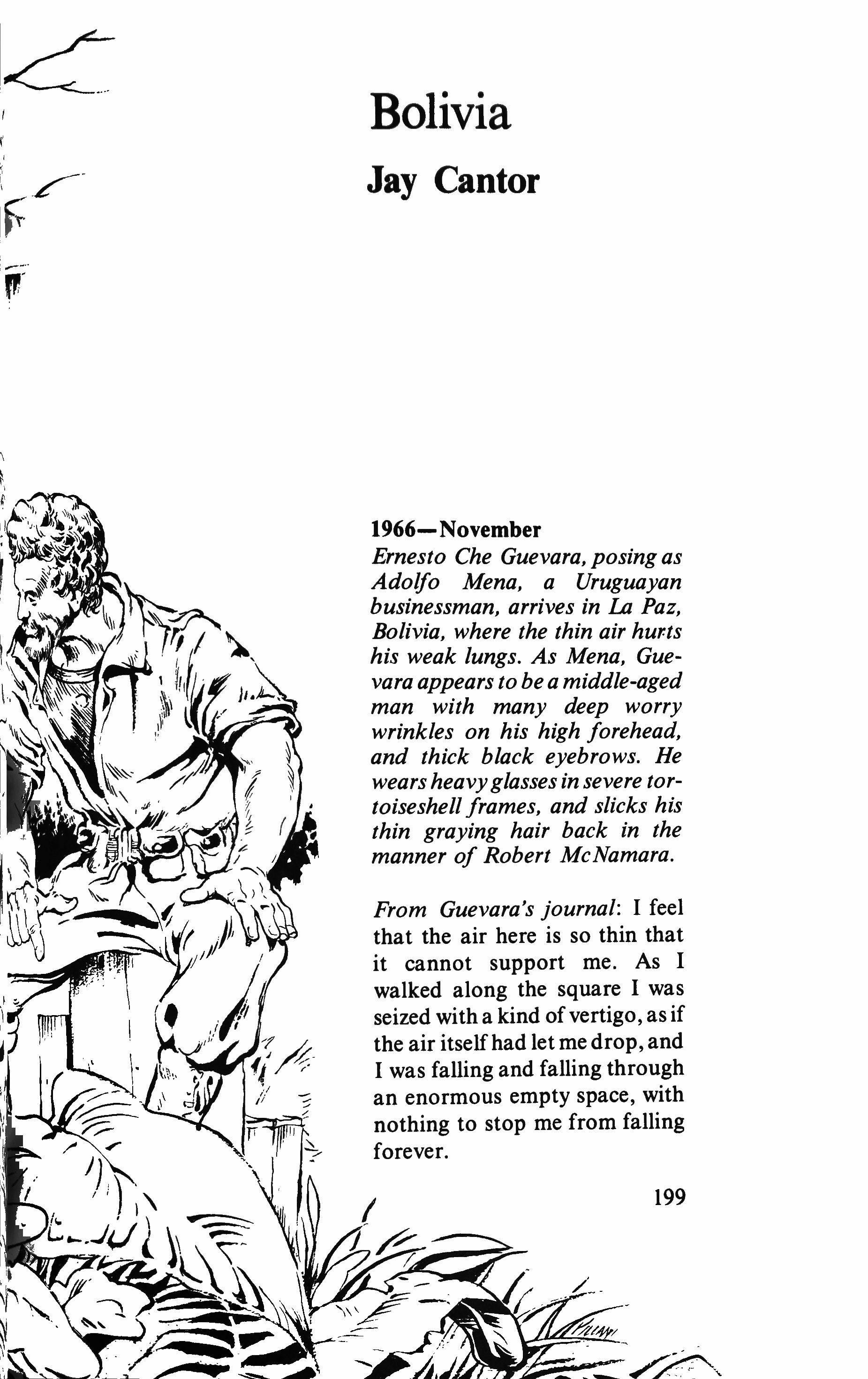
1966-November
Ernesto Che Guevara, posing as Adolfo Mena, a Uruguayan businessman, arrives in La Paz, Bolivia, where the thin air hurts his weak lungs. As Mena, Guevara appears to be a middle-aged man with many deep worry wrinkles on his high forehead, and thick black eyebrows. He wears heavyglasses in severe tortoiseshellframes, and slicks his thin graying hair back in the manner of Robert McNamara.
From Guevara's journal: I feel that the air here is so thin that it cannot support me. As I walked along the square I was seized with a kind of vertigo, as if the air itselfhad let me drop, and I was falling and falling through an enormous empty space, with nothing to stop me from falling forever.
199

Instead I arrived at the bar opposite the government palace. This time, with my businessman's gray suit, my immaculate though scanty coiffure and an authoritative stare, the waiters seem happy to serve me. I look rich and accustomed to command. As, in fact, I am.
The waiter snapped open the cap of the beer bottle and, because of the altitude, foam gushed up. I grabbed at it with my hand, as is (or was) the custom. "Money will come to you," one of the men at the bar said, smiling. He was a colonel in the Bolivian Army, and was wearing sunglasses despite the bar's dim lighting. "You bet," I said, and turned away. No more staring contests for me; my anger has found more appropriate means.
The red plush of the bar seats has worn away to frayed cord in places, like the Bolivian Revolution itself. The bar and I are both the worse for wear. But one beer, at this height, still makes me tipsy.
I toddled back to my hotel, unmolested, a man of peace. The only Indians in La Paz, or workers, are ghost dancers. The government wishes their silent labor, not their presence. And the only posters on the walls show half-naked women carrying rifles: movie advertisements. I was angry at myself. It was stupid, really, to go to that bar, stupid to show myself.
Guevara is driven from La Paz to the guerrilla base in the Nancahuazu region.
From Guevara's journal: Jorge, my driver, has let his hair grow while at the farm. Thick black curls stand out on all sides of his head, like a bushy hat or a hidden animal. His moustache, though, has grown less profusely. There's a little space, right below his nose, the very deep indentation of his lip, which is completely bare. As we talked he kept taking his hands from the wheel, smoothing down the wings of his moustache, touching the bare spot under his nose. (I mentally christened him "Moustache.") He thinks, as he's been told by Tania, that I'm an old man, a Cuban Party official, come to survey the arrangements. He spoke with me as you might with an old man: polite chatter, but with an air of being slightly more knowing about this business than a member of an oldergeneration could be. He talked a good deal, which made him a fine companion for a car ride, though it might be a strain later. The ones who talk a 200
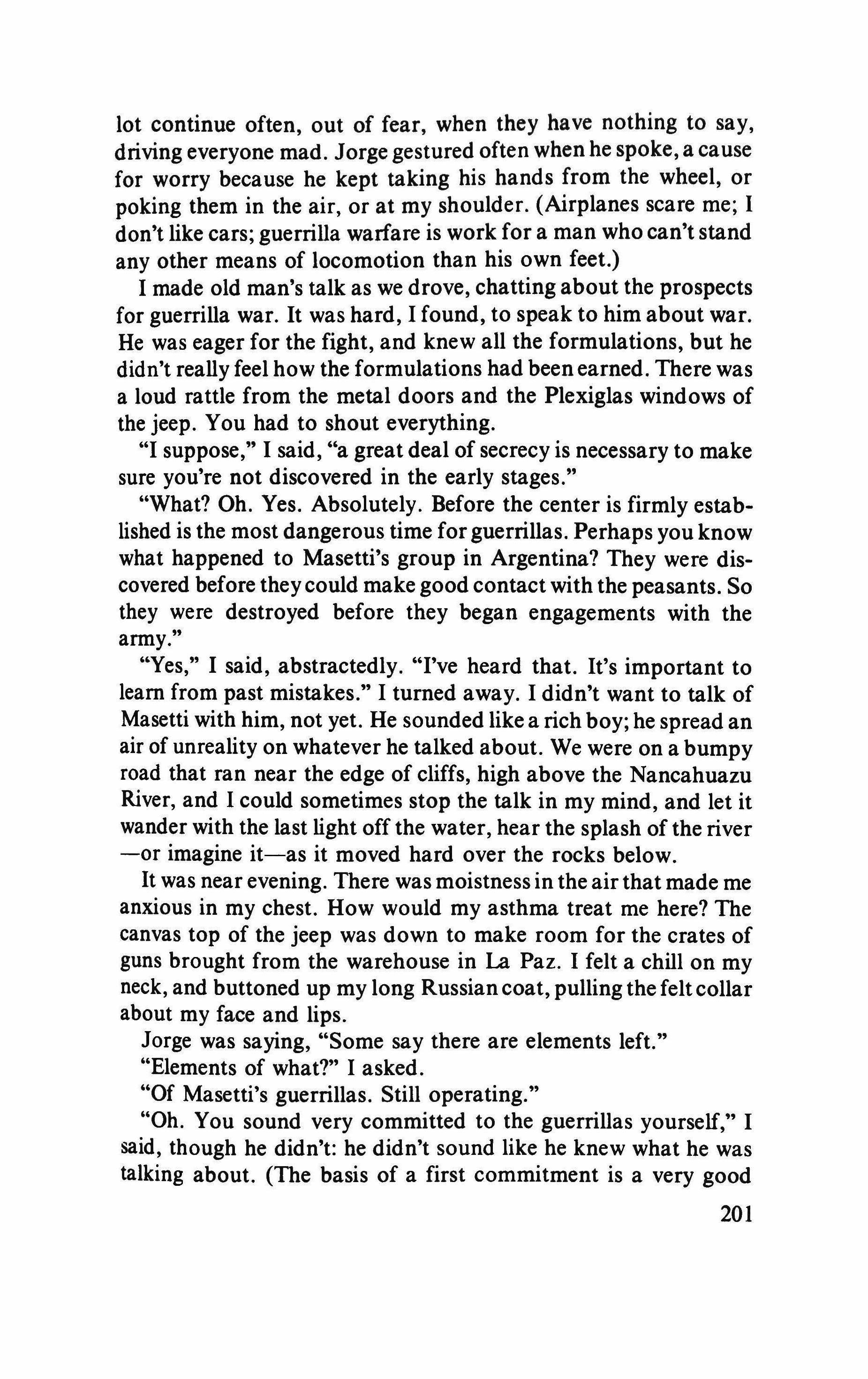
lot continue often, out of fear, when they have nothing to say, driving everyone mad. Jorge gestured often when he spoke, a cause for worry because he kept taking his hands from the wheel, or poking them in the air, or at my shoulder. (Airplanes scare me; I don't like cars; guerrilla warfare is work for a man who can't stand any other means of locomotion than his own feet.)
I made old man's talk as we drove, chatting about the prospects for guerrilla war. It was hard, I found, to speak to him about war. He was eager for the fight, and knew all the formulations, but he didn't really feel how the formulations had been earned. There was a loud rattle from the metal doors and the Plexiglas windows of the jeep. You had to shout everything.
"I suppose," I said, "a great deal of secrecy is necessary to make sure you're not discovered in the early stages."
"What? Oh. Yes. Absolutely. Before the center is firmly established is the most dangerous time for guerrillas. Perhaps you know what happened to Masetti's group in Argentina? They were discovered before they could make good contact with the peasants. So they were destroyed before they began engagements with the army."
"Yes," I said, abstractedly. "I've heard that. It's important to learn from past mistakes." I turned away. I didn't want to talk of Masetti with him, not yet. He sounded like a rich boy; he spread an air of unreality on whatever he talked about. We were on a bumpy road that ran near the edge of cliffs, high above the Nancahuazu River, and I could sometimes stop the talk in my mind, and let it wander with the last light off the water, hear the splash of the river -or imagine it-as it moved hard over the rocks below.
It was near evening. There was moistness in the air that made me anxious in my chest. How would my asthma treat me here? The canvas top of the jeep was down to make room for the crates of guns brought from the warehouse in La Paz. I felt a chill on my neck, and buttoned up my long Russian coat, pulling the felt collar about my face and lips.
Jorge was saying, "Some say there are elements left."
"Elements of what?" I asked.
"Of Masetti's guerrillas. Still operating."
"Oh. You sound very committed to the guerrillas yourself," I said, though he didn't: he didn't sound like he knew what he was talking about. (The basis of a first commitment is a very good

imagination, so you can at least dream the dangers you are entering. I need a battalion of dreamers?) "Will you stay with the guerrillas," I asked, "if the Party doesn't support them?" My hands were touching my wrinkles as I spoke now, crawling through the ravines on my forehead, scurrying through the wiry vegetation of my eyebrows, acquainting myself nervously with the new map ofmyface. Myoid face was there and not there, peekaboo around the edges. I'm not comfortable in disguise; I hate appearing old.
"I don't know if I'd stay then," Jorge said, alarmingly taking his hands from the wheel to open his palms into the air and turn towards me. His eyes were deep set, and they looked troubled by my question. "I'm not sure. For myself, I'm certain that this is the right course eventually. But Monje, the Party's First Secretary, says one must be sure to pick the right time to open hostilities; that's just as important as the rightness of your course. Otherwise, it'sjust suicide, and you help no one. And only the Party can decide when the revolution is on the agenda. That's what Monje says."
"I think," I said, "the time is very auspicious now, here, in Bolivia. The miners have learned that if they stay by their mines, in fixed positions, they will be bombed into submission. The government and the army are the same and rule for imperialism. Guerrilla war is clearly the only possibilityfor liberation." I had forgotten, as I spoke, who I appeared to be. My hands reminded me that I was an old man. "I think," I concluded, "one creates the right time-by beginning." In my disguise my words had none ofthe authority my name would have given them; lacking my presence, they were merely rhetorical.
"You do?" Jorge said, looking away from the road and smiling condescendingly at me. He thought I was an old man! Jorge was a bit of a brat in my opinion. (I wondered what his class background was. I must keep up my charade, I reminded myself, till I know him better, have sounded his commitment.) "Well, we-the othersfrom the Party and myself-are waiting for Monje to declare the Party's position. I think," Jorge said, "I will go along with the Party. When I became a Party militant I committed myself to their discipline. And we all respect Monje. He's a very clearheaded man."
"Is he?" This was the reverse of what Debray had reported to me. He called Monje lacking in clarity, weak, and vacillating. But Monje hadn't known I'd be leading the undertaking. I wondered what difference that would make.
"Yes," Jorge continued, "very intelligent. And a warm, good
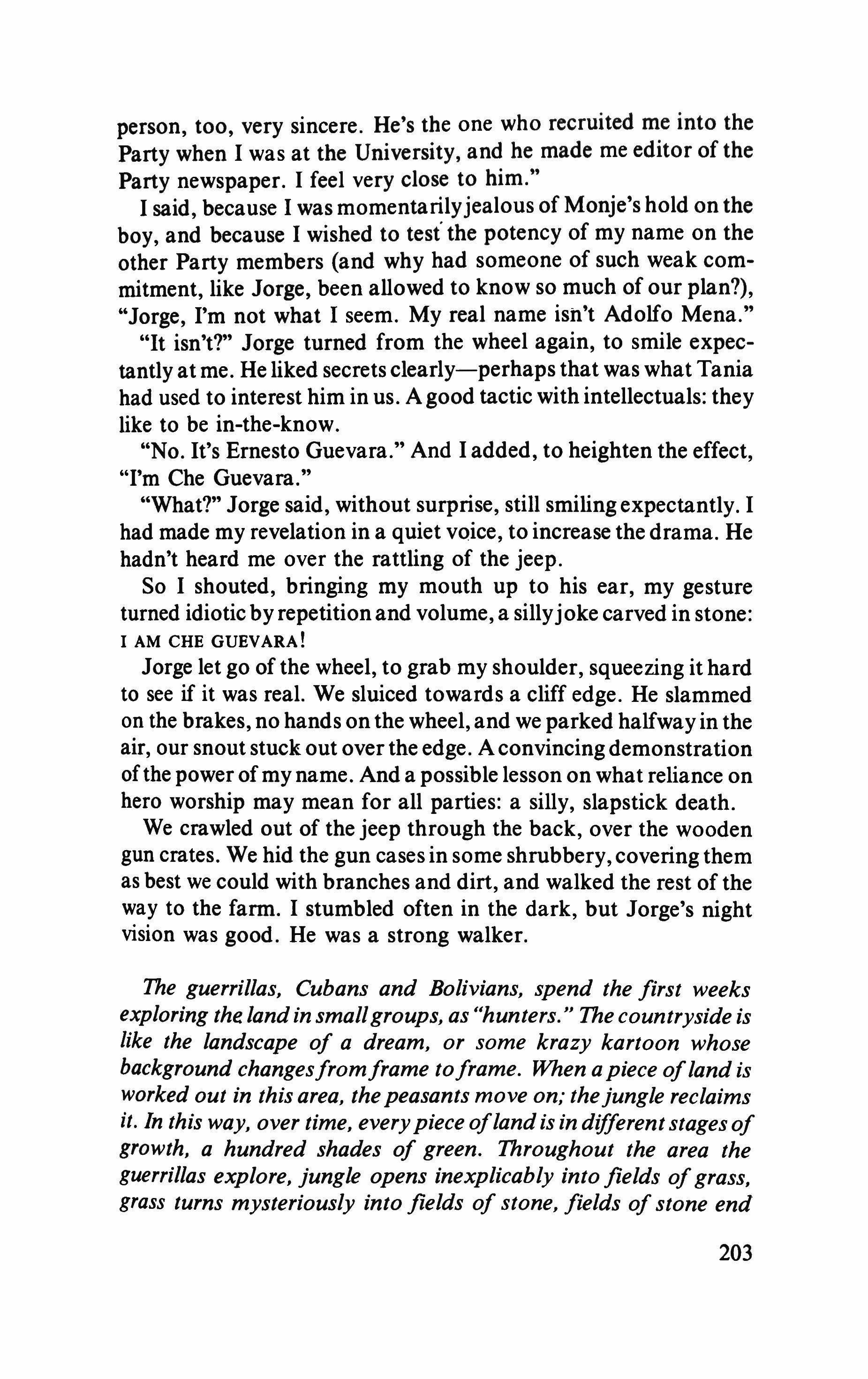
person, too, very sincere. He's the one who recruited me into the Party when I was at the University, and he made me editor of the Party newspaper. I feel very close to him."
I said, because I was momentarilyjealous of Monje's hold on the boy, and because I wished to test the potency of my name on the other Party members (and why had someone of such weak commitment, like Jorge, been allowed to know so much of our plan?), "Jorge, I'm not what I seem. My real name isn't Adolfo Mena."
"It isn't?" Jorge turned from the wheel again, to smile expectantly at me. He liked secrets clearly-perhaps that was what Tania had used to interest him in us. A good tactic with intellectuals: they like to be in-the-know.
"No. It's Ernesto Guevara." And I added, to heighten the effect, "I'm Che Guevara."
"What?" Jorge said, without surprise, still smilingexpectantly. I had made my revelation in a quiet voice, to increase the drama. He hadn't heard me over the rattling of the jeep.
So I shouted, bringing my mouth up to his ear, my gesture turned idiotic byrepetition and volume, a sillyjoke carved in stone: I AM CHE GUEVARA!
Jorge let go of the wheel, to grab my shoulder, squeezing it hard to see if it was real. We sluiced towards a cliff edge. He slammed on the brakes, no hands on the wheel, and we parked halfway in the air, our snout stuck. out over the edge. A convincing demonstration ofthe power of my name. And a possible lesson on what reliance on hero worship may mean for all parties: a silly, slapstick death. We crawled out of the jeep through the back, over the wooden gun crates. We hid the gun cases in some shrubbery,covering them as best we could with branches and dirt, and walked the rest of the way to the farm. I stumbled often in the dark, but Jorge's night vision was good. He was a strong walker.
The guerrillas, Cubans and Bolivians, spend the first weeks exploring the land in smallgroups, as "hunters." The countryside is like the landscape of a dream, or some krazy kartoon whose background changesfromframe toframe. When apiece ofland is worked out in this area, thepeasants move on; thejungle reclaims it. In this way, over time, everypiece ofland is in differentstages of growth, a hundred shades of green. Throughout the area the guerrillas explore, jungle opens inexplicably into fields ofgrass, grass turns mysteriously into fields of stone, fields of stone end
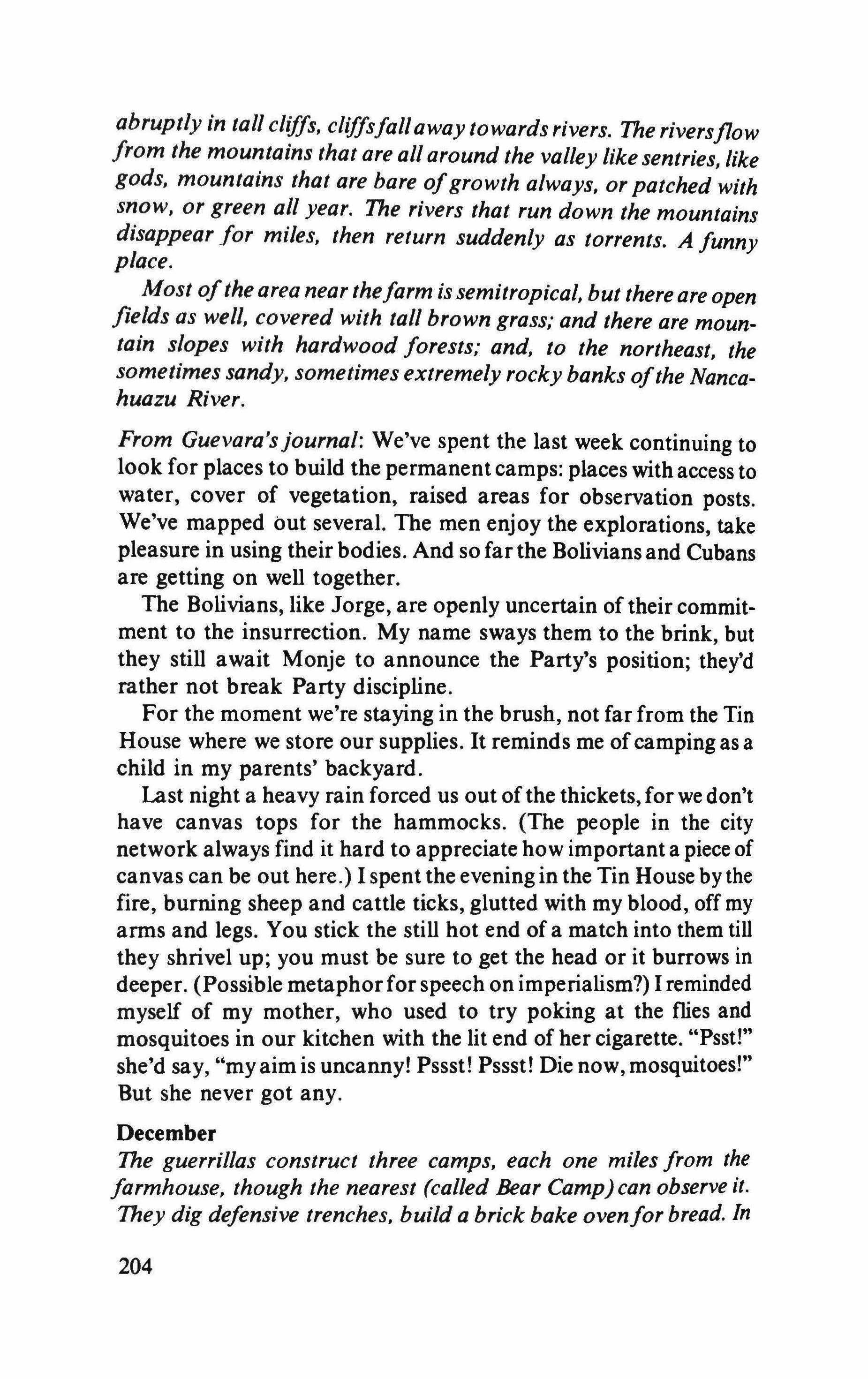
abruptly in tall cliffs, cliffsfallaway towards rivers. The riversflow from the mountains that are all around the valley like sentries, like gods, mountains that are bare ofgrowth always, or patched with snow, or green al/ year. The rivers that run down the mountains disappear for miles, then return suddenly as torrents. A funny place.
Most ofthe area near thefarm is semitropical, but there are open fields as well, covered with tall brown grass,' and there are mountain slopes with hardwood forests; and, to the northeast, the sometimes sandy, sometimes extremely rocky banks ofthe Nancahuazu River.
From Guevara'sjournal: We've spent the last week continuing to look for places to build the permanent camps: places with access to water, cover of vegetation, raised areas for observation posts. We've mapped but several. The men enjoy the explorations, take pleasure in using their bodies. And so far the Bolivians and Cubans are getting on well together.
The Bolivians, like Jorge, are openly uncertain of their commitment to the insurrection. My name sways them to the brink, but they still await Monje to announce the Party's position; they'd rather not break Party discipline.
For the moment we're staying in the brush, not far from the Tin House where we store our supplies. It reminds me ofcamping as a child in my parents' backyard.
Last night a heavy rain forced us out ofthe thickets, for we don't have canvas tops for the hammocks. (The people in the city network always find it hard to appreciate how important a piece of canvas can be out here.) I spent the evening in the Tin House by the fire, burning sheep and cattle ticks, glutted with my blood, off my arms and legs. You stick the still hot end of a match into them till they shrivel up; you must be sure to get the head or it burrows in deeper. (Possible metaphorfor speech on imperialism?) I reminded myself of my mother, who used to try poking at the flies and mosquitoes in our kitchen with the lit end of her cigarette. "Psst!" she'd say, "myaim is uncanny! Pssst! Pssst! Die now, mosquitoes!" But she never got any.
December
The guerrillas construct three camps, each one miles from the farmhouse, though the nearest (called Bear Camp) can observe it. They dig defensive trenches, build a brick bake ovenfor bread. In
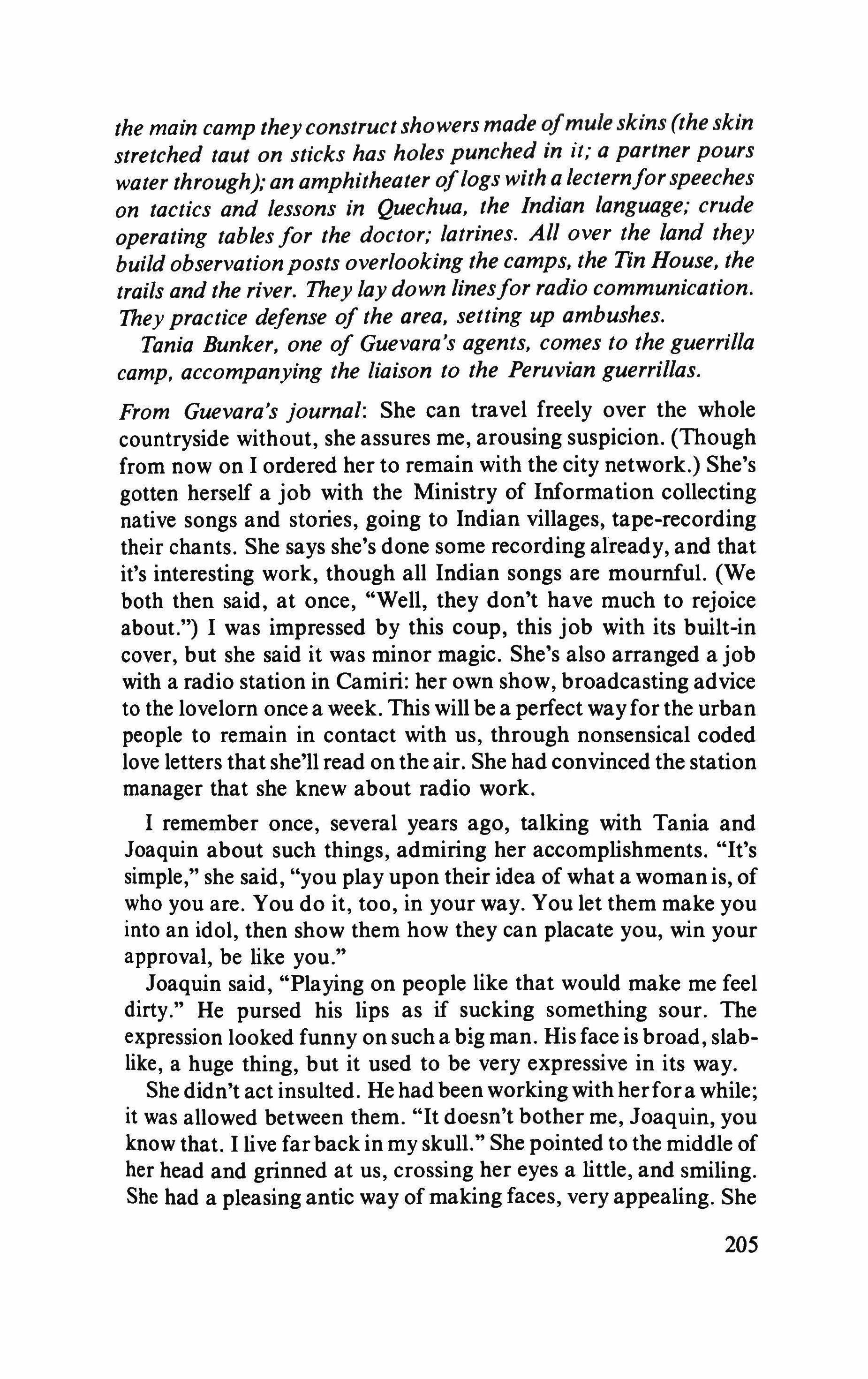
the main camp they construct showers made ofmule skins (the skin stretched taut on sticks has holes punched in it; a partner pours water through); an amphitheater oflogs with a lecternforspeeches on tactics and lessons in Quechua, the Indian language; crude operating tables for the doctor; latrines. All over the land they build observationposts overlooking the camps, the Tin House, the trails and the river. They lay down linesfor radio communication. They practice defense of the area, setting up ambushes.
Tania Bunker, one of Guevara's agents, comes to the guerrilla camp, accompanying the liaison to the Peruvian guerrillas.
From Guevara's journal: She can travel freely over the whole countryside without, she assures me, arousing suspicion. (Though from now on I ordered her to remain with the city network.) She's gotten herself a job with the Ministry of Information collecting native songs and stories, going to Indian villages, tape-recording their chants. She says she's done some recording already, and that it's interesting work, though all Indian songs are mournful. (We both then said, at once, "Well, they don't have much to rejoice about.") I was impressed by this coup, this job with its built-in cover, but she said it was minor magic. She's also arranged a job with a radio station in Camiri: her own show, broadcasting advice to the lovelorn once a week. This will bea perfect wayfor the urban people to remain in contact with us, through nonsensical coded love letters that she'll read on the air. She had convinced the station manager that she knew about radio work.
I remember once, several years ago, talking with Tania and Joaquin about such things, admiring her accomplishments. "It's simple," she said, "you play upon their idea of what a woman is, of who you are. You do it, too, in your way. You let them make you into an idol, then show them how they can placate you, win your approval, be like you."
Joaquin said, "Playing on people like that would make me feel dirty." He pursed his lips as if sucking something sour. The expression looked funny on such a big man. His face is broad, slablike, a huge thing, but it used to be very expressive in its way. She didn't act insulted. He had been working with herfora while; it was allowed between them. "It doesn't bother me, Joaquin, you know that. I live far back in my skull." She pointed to the middle of her head and grinned at us, crossing her eyes a little, and smiling. She had a pleasing antic way of making faces, very appealing. She

had told me once, in another discussion, that she never felt any regret. ("Oh, occasionally maybe, very late at night.") She didn't brood about what happened to her. Like a cartoon figure, or Venus, she could go through any disaster and be restored, whole, the next frame. Perhaps, I thought, that is what gives herface such pleasing vivacity, such lightness.
She continued, "I take it all in from far away, Joaquin. It doesn't reach me. The truth is, I laugh at them. They think I'm this; they think I'm that. What do I care what they think! They think I'm a pin-up. An easy lay. A reckless woman, a helpless person. Whatever. What do I care what they think? I use their image of me. There's always something in it, a little point that I can ride in the direction I want to go. Do they want to help the helpless? Be strong to the weak? Do they want to fuck me-ignite the cold woman? Or act really dirty with the sensualist? Or do they want to cure the crazy-that one is more popular then you'd think!-calm the hysteric? It remains their image, not mine. I'm far away from their hands, their eyes, their words. Takingit all in, getting what I want. I don't care." She smiled. She had her hair down that evening, and several buttons of her green blouse open. (I disapproved; I was attracted.)
I told them-we were drunk by then-of when I'd been an artist's "model" with Hilda, of being absorbed into the businessmen's pornographic reflections, until they entered me and I lost my balance, becoming cruel to Hilda, becoming the way they saw me.
"Anyway, comrade," she said, "it's the same in any case. The truth is, I've learned, that others decide who you are always. You're just playing a part that they need for their production, their play. And they're doing it, too, strangely enough, foreach other, though they don't know it. I wonder where the director has gone? I know that sounds adolescent. I know it's an adolescent feeling. But it's true, too, and I can't outgrow it. It's funnyhaving that feeling that I should be so happy play-acting. But if there's nothing real, then knowing you're play-acting makes it better. I'm like a great actor, see, who doesn't care that his wife is having an affair." She puffed her chest out, and pretended to curl moustache ends. "He decides he wants her to do it, wants to be jealous, so he can playa great Othello. He knows that everyone's wife is unfaithful after all, his, yours"-she looked at me-"but he knows that he's differentfrom you, he can use it. At least this way I have my little joke on everyone. When I'm doing something all I worry about is if I have
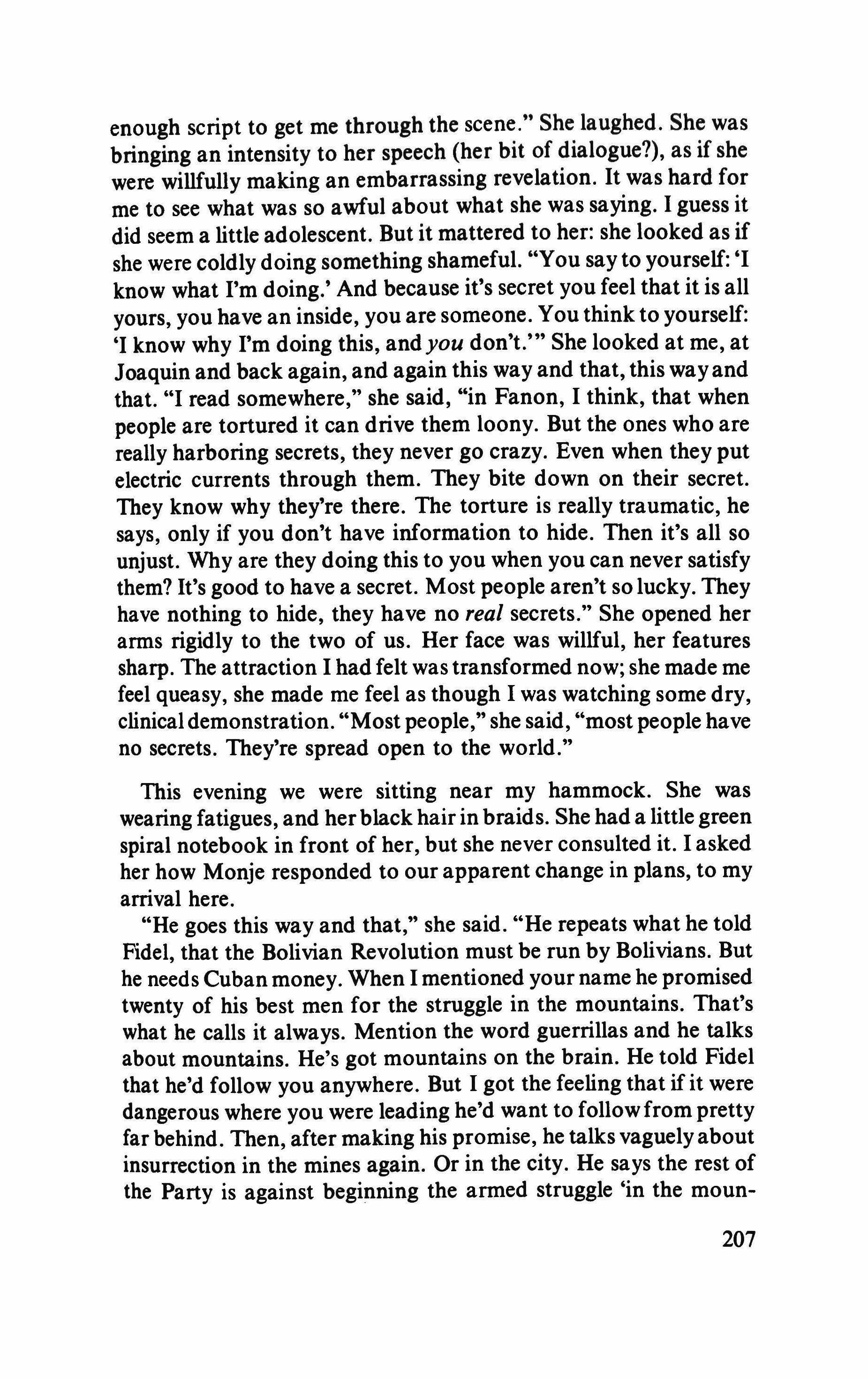
enough script to get me through the scene." She laughed. She was bringing an intensity to her speech (her bit of dialogue"), as if she were willfully making an embarrassing revelation. It was hard for me to see what was so awful about what she was saying. 1 guess it did seem a little adolescent. But it mattered to her: she looked as if she were coldly doing something shameful. "You say to yourself: 'I know what I'm doing.' And because it's secret you feel that it is all yours, you have an inside, you are someone. You think to yourself: 'I know why I'm doing this, and you don't.''' She looked at me, at Joaquin and back again, and again this way and that, this way and that. "I read somewhere," she said, "in Fanon, 1 think, that when people are tortured it can drive them loony. But the ones who are really harboring secrets, they never go crazy. Even when they put electric currents through them. They bite down on their secret. They know why they're there. The torture is really traumatic, he says, only if you don't have information to hide. Then it's all so unjust. Why are they doing this to you when you can never satisfy them? It's good to have a secret. Most people aren't so lucky. They have nothing to hide, they have no real secrets." She opened her arms rigidly to the two of us. Her face was willful, her features sharp. The attraction 1 had felt was transformed now; she made me feel queasy, she made me feel as though 1 was watching some dry, clinical demonstration. "Most people," she said, "most people have no secrets. They're spread open to the world."
This evening we were sitting near my hammock. She was wearingfatigues, and herblack hair in braids. She had a little green spiral notebook in front of her, but she never consulted it. 1 asked her how Monje responded to our apparent change in plans, to my arrival here.
"He goes this way and that," she said. "He repeats what he told Fidel, that the Bolivian Revolution must be run by Bolivians. But he needs Cuban money. When 1 mentioned your name he promised twenty of his best men for the struggle in the mountains. That's what he calls it always. Mention the word guerrillas and he talks about mountains. He's got mountains on the brain. He told Fidel that he'd follow you anywhere. But 1 got the feeling that if it were dangerous where you were leading he'd want to follow from pretty far behind. Then, after making his promise, he talks vaguely about insurrection in the mines again. Or in the city. He says the rest of the Party is against beginning the armed struggle 'in the moun-

tains' too soon. They're afraid of the crackdown, they're afraid of being thought to be bed-wetters, They're afraid of a lot, frankly. I did as you said and arranged a meeting here. Perhaps seeing you will clarify things for him. And anyway, we've recruited the most militant members of the Party. The two brothers, Coco and Inti, they're the best of them. And Jorge is all right. But if the Party turns against you, it will be up to your personal magnetism to hold them."
"And the correctness of my position."
"Yes," she said smiling. "That, too. Absolutely. But be crafty when you talk with Monje. You can bring him round if you do it right. Be wily as a serpent, gentle as a dove. Don't define him out of things. Let him think he's a very very big part of your plans. He's got a sizable ego. He's got to be flattered a lot, always made to feel the important man, central to everything. And he's pretty clever, too. He's been around awhile."
"And Moises Guevara?"
"He holds down the Peking line among the miners. He's split with the CP about their foot dragging. Very ardent for the armed struggle. Debray likes him. Moises is working class. That counts big with Regis. Ricardo met him, though, and says he's a silly, trouble-making prick. If we have his support Monje won't touch us. Debray hates Monje. Thinks he's unclear and deceitful. But it's the lack of clarity he hates most. He thinks everyone but you is insufficiently clear." She sat up straight and set her lips in a thin, tight line. With one hand she smoothed down an imaginary Debray moustache. "No compromises for him."
I said, "You better close down the warehouse. It's more danger than it's worth now."
From Guevara's journal: The mosquitoes are thick at night and very annoying. I still have an allergic reaction to their bites: they swell on my arm to the size of walnuts. So I've appropriated the only mosquito netting for my own hammock (fortuitous conjunction of power and need).
Mario Monje, First Secretaryofthe Bolivian Communist Party, comes to the Nancahuazu camp to meet with Che Guevara.
From Guevara's journal: We were gathered in the amphitheater when he arrived, digesting Christmas dinner-roast pig, nougat from Spain, beer and cider. I was leading a session ofself-criticism.

In the last few days there have been fights between the Bolivians and Cubans, especially Ricardo, who is leading the Cuban vanguard group. Many of the Bolivians-Chingolo and Coco among them-say he's too harsh, makes them work too much, shows favoritism to Cubans. But many of the Bolivians (I suspect Chingolo) are slackers. It's a bad sign against us (I was saying), for even the shadow ofnationalism must be banished. The only nationalism for a country under imperialism is socialist internationalism. So I was saying. (I had to be vague: I didn't know if the Bolivians involved were just jerking off.)
I was speaking from my place on the logs, my words rising into the cool evening. I could hardly see the men's faces, which caused a lazy infatuation with my own voice. "You have no more nationality except the liberated territory directly under your feet." At first I wasn't glad to see Monje. His presence could only draw these apparent contradictions more sharply. But that would be good for us after the initial difficulty; it would purify our forces. I walked over to him.
"I am Che Guevara," I said. I still had a balding forehead and gray hair; I was barely recognizable. Monje and I clasped hands, and he looked down quizzically at mine, for one expects a stronger grip from a warrior. I'd barely touched his flesh. His hand was tender, a bureaucrat's, but his grip was firm. His face, onlydimly lit now, looked round and plump, with small eyes, slight folds ofskin above them. A troll's face. He had a scraggly black beard, and wore a green cap that was too small for him perched high on his head. His clothes were the same fatigues we all wore, but fresh looking compared to ours-more of a costume, I thought. He looked uncomfortable, kept hitching his shoulders back to make things fit. He was a young man, about my age.
"Guevara," he said, "I am honored. We must talk. When I get my breath back, that is. That was a long walk for me." He smiled. The men were all looking at us. Monje's unstated question, why areyou here?, was in everyone's mind.
"Yes. We must talk." I started to squat.
"But we cannot talk here." His voice was deep but not overly resonant, a sincere, effective voice for small gatherings, for committee meetings.
"Why not?" I said (though I knew).
Monje gestured very slightly with his arm, indicating the men watching us.
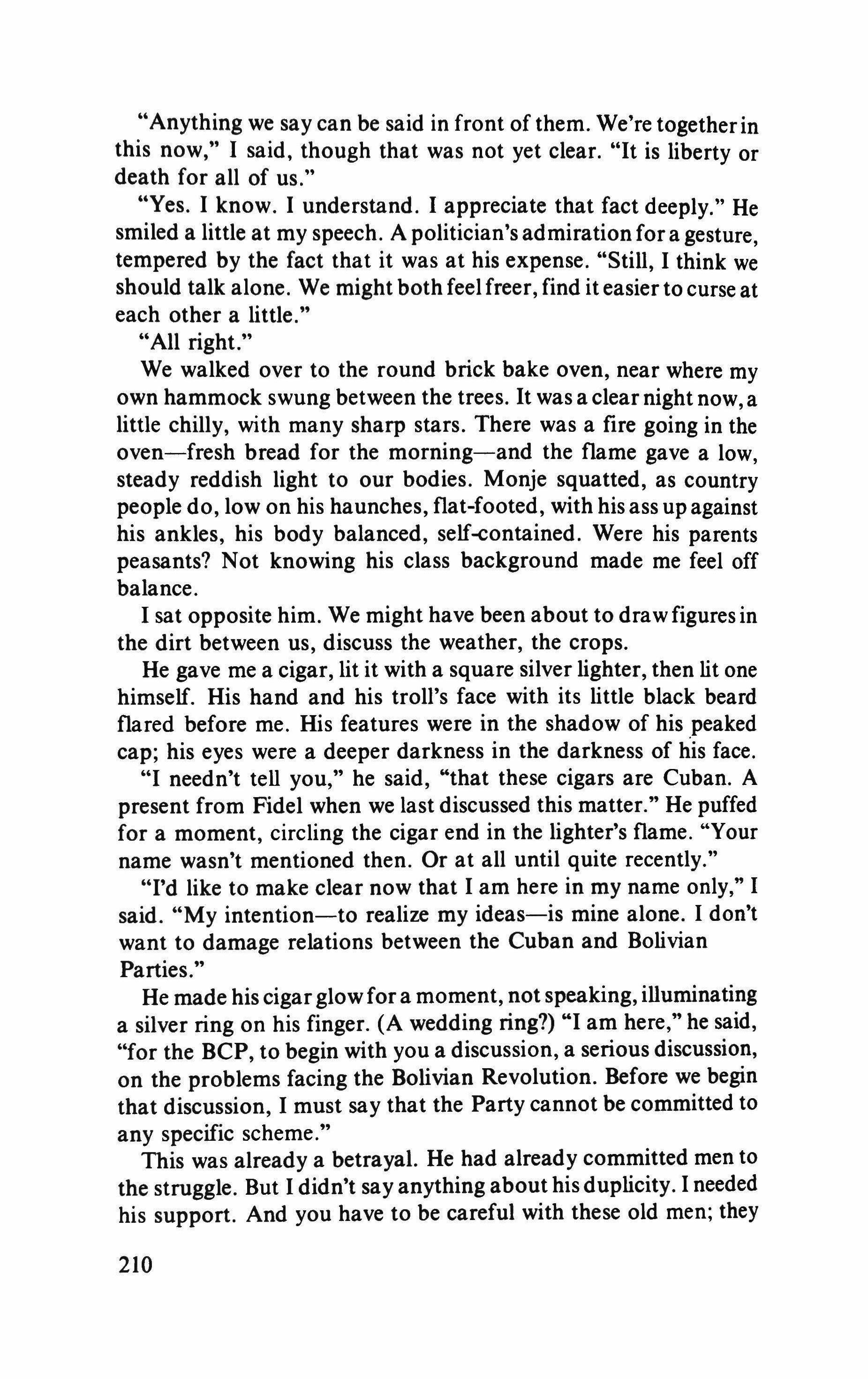
"Anything we say can be said in front of them. We're together in this now," I said, though that was not yet clear. "It is liberty or death for all of us."
"Yes. I know. I understand. I appreciate that fact deeply." He smiled a little at my speech. A politician's admiration for a gesture, tempered by the fact that it was at his expense. "Still, I think we should talk alone. We might both feel freer, find it easier to curse at each other a little."
"All right."
We walked over to the round brick bake oven, near where my own hammock swung between the trees. It was a clear night now, a little chilly, with many sharp stars. There was a fire going in the oven-fresh bread for the morning-and the flame gave a low, steady reddish light to our bodies. Monje squatted, as country people do, low on his haunches, flat-footed, with his ass up against his ankles, his body balanced, self-contained. Were his parents peasants? Not knowing his class background made me feel off balance.
I sat opposite him. We might have been about to draw figures in the dirt between us, discuss the weather, the crops.
He gave me a cigar, lit it with a square silver lighter, then lit one himself. His hand and his troll's face with its little black beard flared before me. His features were in the shadow of his peaked cap; his eyes were a deeper darkness in the darkness of his face.
"I needn't tell you," he said, "that these cigars are Cuban. A present from Fidel when we last discussed this matter." He puffed for a moment, circling the cigar end in the lighter's flame. "Your name wasn't mentioned then. Or at all until quite recently."
"I'd like to make clear now that I am here in my name only," I said. "My intention-to realize my ideas-is mine alone. I don't want to damage relations between the Cuban and Bolivian Parties."
He made his cigarglowfor a moment, not speaking, illuminating a silver ring on his finger. (A wedding ring?) "I am here," he said, "for the BCP, to begin with you a discussion, a serious discussion, on the problems facing the Bolivian Revolution. Before we begin that discussion, I must say that the Party cannot be committed to any specific scheme."
This was already a betrayal. He had already committed men to the struggle. But I didn't say anything about his duplicity. I needed his support. And you have to be careful with these old men; they

have enormous vanity. "Instead," I said, "I want you to know, before we talk, that I intend to begin the struggle with those here with me now, with whoever remains with me. We want your participation as political head of the g�errillas, subordinate only to the military chief. For the moment that is myself."
"Well, we have a lot to discuss."
"What I said was clear."
"Yes. Oh, yes. It was clear. The Party thinks, though, that there must be a Bolivian head of the revolution as long as it has a Bolivian environment."
"I will be military chief. There will be one command." I wanted to define my position sharply. He would have to confront it and eventually change.
"The Party," he said, "must direct the guerrilla movement."
"I understand," I said angrily, "you will supply the ideas from the city, and we will supply the dead in the countryside, in 'the mountains.' No. the guerrilla movement is now the vanguard ofthe class struggle. It is the people in uniform." The Party, if I allowed it, would compromise our goal: continental revolution. I was sure of it. They wanted the guerrillas to put pressure on the national ruling class, then call them offif a good deal could be made, ifthey'd share power. But the guerrilla was the only instrument that could smash the army, and without that no socialist revolution could stay in power in America. "One form of struggle is primary if the aim is revolution. Guerrilla war. There must be a single command to the struggle: the guerrilla chief. The guerrillas do not merely create the conditions in the city for a coup d'etat, quickly won and quickly lost. The people have not struggled; they have not shaken off their passivity; they are not transformed. And the army remains. The imperialists will share power only for a moment. The guerrilla struggle is the method forclass struggle throughout Latin America, for making the Continental Revolution. We will win."
"Bolivia is not Cuba, comrade. Our country is strongly nationalist. You will not be able to unite the masses unless the Bolivian Revolution is also a nationalist revolution, and has a Bolivian head."
"You know, Monje, the imperialists see you rolling your little ball of twine across the field, saying everything on this side is Bolivian and belongs to me, and everything on the other side belongs to Guevara. And they laugh. Because they know that the whole field is theirs. And as long as you think like that it will always

be theirs. Something called the 'Bolivian Revolution' cannot be won. They'd struggle this country to death: you have no port. They'd organize the petite bourgeoisie against you. They'd have you overthrown. It's ajoke, a runningjoke, already on its waytoa plane into exile. If we do not struggle on many fronts, in Africa, Asia, and Latin America, we cannot win. We must divide the forces of imperialism, here, and in Brazil, in Peru, and Argentina, Colombia, Uruguay, Ecuador. We will make this continent another Vietnam. They cannot fight like that, here and in Indochina. We'll bleed them to death. The Revolution must be continental. Once we make that clear, once you help us make that clear, the people will understand."
I was gesturing with my cigar as I spoke, and by mistake touched the lighted end to my own wrist. I yelped.
"What?" Monje said.
"Nothing. An accident." We paused for a moment. The pain was good for me; it distracted my mind from my anger. I cooled off, but my anger left me exhausted. Monje was scratching himselfthrough his beard over and over. My words were annoying flies. Or maybe he was being bitten by mosquitoes. Lenin's phrase came to mind: "If you want to know what the bourgeoisie is thinking, don't listen to their words, watch their hands." Another phrase then came to mind, I don't know from where: If you want to know what you're thinking, watch your own hands in dreams. I wondered what Lenin would have thought of that clearly I was tired.
"You haven't heard me out, Comandante," Monje said. That was true. We had both been talking veryquickly,exchanging slogans. Nonetheless, I did not expect to hear much from him any more. But perhaps he would come around, now that my stand was clear: continental revolution. We would go ahead without him. The Party could support us or be swept away "As the head of the Revolution, I will be better able to secure our relations with other groups. I can secure the support of the Communist parties throughout the continent. You have spoken of how important it is for work in the cities to complement the guerrilla groups in the mountains. I think I can secure Venezuela's support for Douglas Bravo. Codovilla is a friend of mine."
This was more crap. "You are certainly welcome to try. But it won't work. For Codovilla to support Bravo is for him to support an insurrection in his own party. I am sure I will be able to unite the revolutionary forces of the continent."

"You seem very certain of your power," Monje said, almost sarcastically.
"I am sure of the correctness of my ideas. And I am willing to risk my life to prove that they are right." I tried to talk more slowly, too. But I wanted to get this over with. I wanted Monje to leave. I could tell we'd get nothing from him till we were victors. Even though I'd given nothing away, our conversation made me feel unclean. I literally felt as if my bowels were straining, as if I were trying to defecate.
Monje said, "I will resign my position in the Party, secure its neutrality, and bring cadres with me."
He would be of the Party and not of it. I needed his cadres, but he'd find a way to compromise us, to make us dirty. It wasn't worth that. "Your resignation is up to you," I said. "But you're just protecting the good name of the Central Committee members who should be denounced for betraying the struggle if they don't support us. You're vacillating. They should be condemned for their crookedness. We must make our position clear. Time will decide who is right. Our task now is to unite all who will make the revolution."
"That is another point," Monje said calmly, as if he didn't care, or didn't notice, that I'd insulted him. "We think your force is attracting all the heterodox elements, the pro-Peking groups, the Trotskyites. You've been negotiating with the renegade Moises Guevara. As political chief of the guerrillas I can give them a consistent line. I will keep out adventurers and provocateurs. And infiltrators. We will follow the Party line and have their cadres."
For a time I said nothing. I was weary and anxious at once; I wanted to be out ofthere. Monje again lit his cigarand I imagined I could see the expression on his face, a look ofhurt, and great anger. But I had nothing more to say. "These polemics are for the rich. We will unite all who wish to make the revolution. I will be chief ofthe guerrillas.
"Comandante, I must ask if you're willing to negotiate." "No." He knew I wasn't. This was all shit. I wanted it over with. "I am the chief."
"Then I think we have no more to discuss. I must take this opportunity to tell your men that whatever my personal feelings may be-and I admire you very much- they will not have the support of the Party, and that they will be breaking Partydiscipline by staying here."
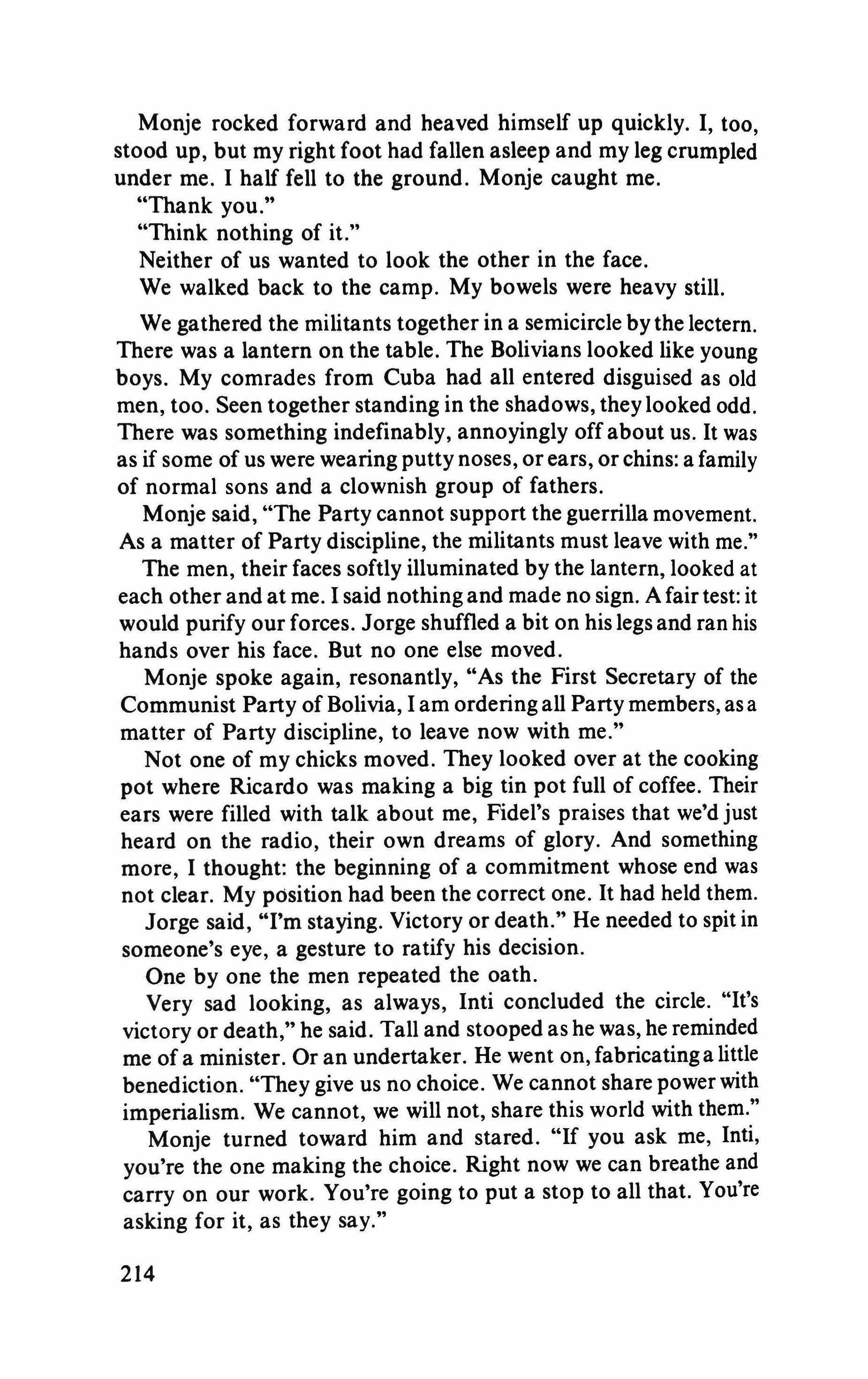
Monje rocked forward and heaved himself up quickly. I, too, stood up, but my right foot had fallen asleep and my leg crumpled under me. I half fell to the ground. Monje caught me.
"Thank you."
"Think nothing of it."
Neither of us wanted to look the other in the face.
We walked back to the camp. My bowels were heavy still.
We gathered the militants together in a semicircle by the lectern. There was a lantern on the table. The Bolivians looked like young boys. My comrades from Cuba had all entered disguised as old men, too. Seen together standing in the shadows, they looked odd. There was something indefinably, annoyingly off about us. It was as if some of us were wearing putty noses, or ears, or chins: a family of normal sons and a clownish group of fathers.
Monje said, "The Party cannot support the guerrilla movement. As a matter of Party discipline, the militants must leave with me."
The men, their faces softly illuminated by the lantern, looked at each other and at me. I said nothing and made no sign. A fair test: it would purify our forces. Jorge shuffled a bit on his legs and ran his hands over his face. But no one else moved.
Monje spoke again, resonantly, "As the First Secretary of the Communist Party of Bolivia, I am ordering all Party members, as a matter of Party discipline, to leave now with me."
Not one of my chicks moved. They looked over at the cooking pot where Ricardo was making a big tin pot full of coffee. Their ears were filled with talk about me, Fidel's praises that we'd just heard on the radio, their own dreams of glory. And something more, I thought: the beginning of a commitment whose end was not clear. My position had been the correct one. It had held them.
Jorge said, "I'm staying. Victory or death." He needed to spit in someone's eye, a gesture to ratify his decision.
One by one the men repeated the oath.
Very sad looking, as always, Inti concluded the circle. "It's victory or death," he said. Tall and stooped as he was, he reminded me of a minister. Or an undertaker. He went on, fabricating a little benediction. "They give us no choice. We cannot share power with imperialism. We cannot, we will not, share this world with them."
Monje turned toward him and stared. "If you ask me, Inti, you're the one making the choice. Right now we can breathe and carryon our work. You're going to put a stop to all that. You're asking for it, as they say."
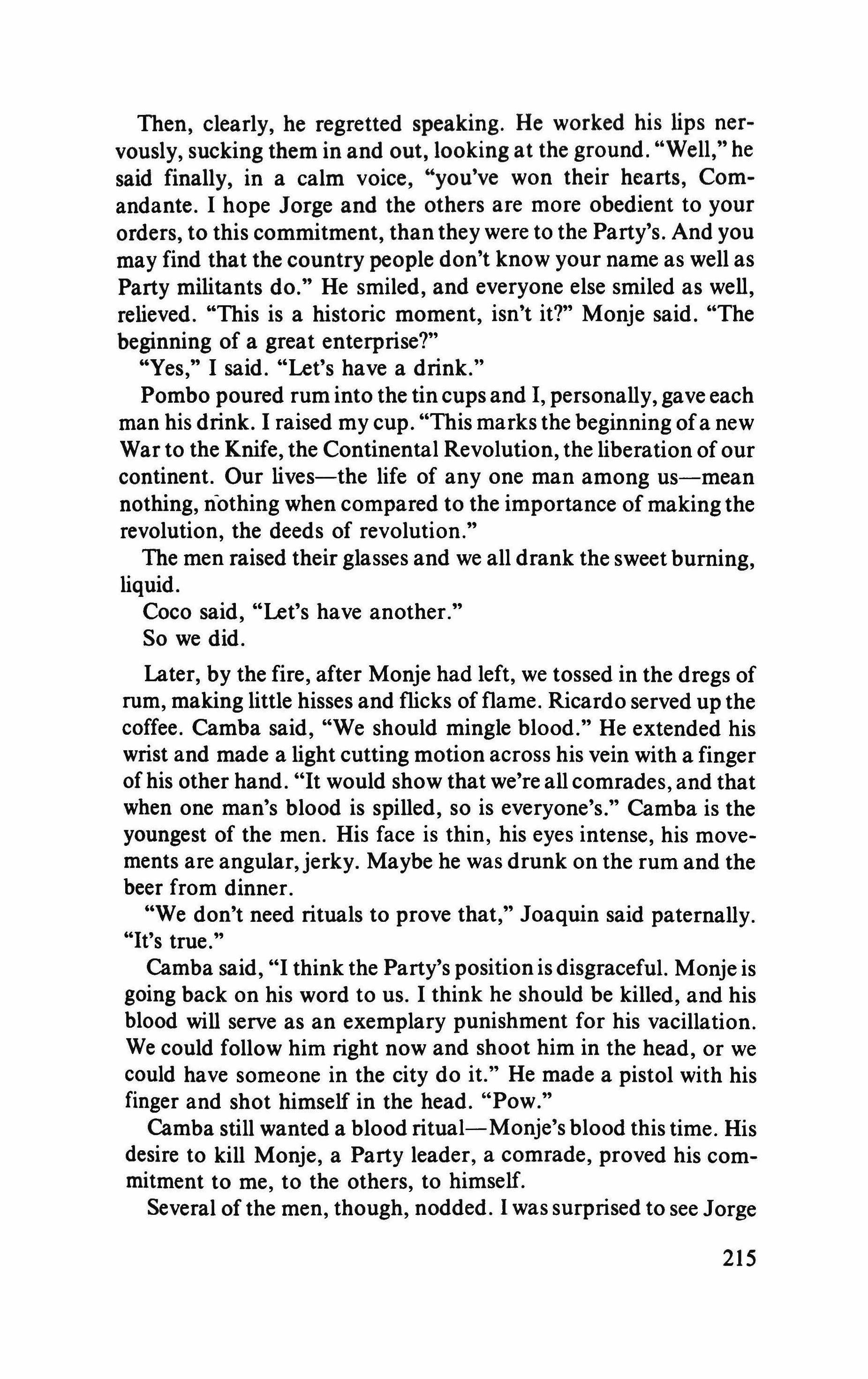
Then, clearly, he regretted speaking. He worked his lips nervously, sucking them in and out, looking at the ground. "Well," he said finally, in a calm voice, "you've won their hearts, Comandante. I hope Jorge and the others are more obedient to your orders, to this commitment, than they were to the Party's. And you may find that the country people don't know your name as well as Party militants do." He smiled, and everyone else smiled as well, relieved. "This is a historic moment, isn't it?" Monje said. "The beginning of a great enterprise?"
"Yes," I said. "Let's have a drink."
Pombo poured rum into the tin cups and I, personally, gave each man his drink. I raised my cup. "This marks the beginning of a new War to the Knife, the Continental Revolution, the liberation of our continent. Our lives-the life of anyone man among us-mean nothing, nothing when compared to the importance of making the revolution, the deeds of revolution."
The men raised their glasses and we all drank the sweet burning, liquid.
Coco said, "Let's have another."
So we did.
Later, by the fire, after Monje had left, we tossed in the dregs of rum, making little hisses and flicks of flame. Ricardo served up the coffee. Camba said, "We should mingle blood." He extended his wrist and made a light cutting motion across his vein with a finger of his other hand. "It would show that we're all comrades, and that when one man's blood is spilled, so is everyone's." Camba is the youngest of the men. His face is thin, his eyes intense, his movements are angular,jerky. Maybe he was drunk on the rum and the beer from dinner.
"We don't need rituals to prove that," Joaquin said paternally. "It's true."
Camba said, "I think the Party's position is disgraceful. Monje is going back on his word to us. I think he should be killed, and his blood will serve as an exemplary punishment for his vacillation. We could follow him right now and shoot him in the head, or we could have someone in the city do it." He made a pistol with his finger and shot himself in the head. "Pow."
Camba still wanted a blood ritual-Monje's blood this time. His desire to kill Monje, a Party leader, a comrade, proved his commitment to me, to the others, to himself.
Several of the men, though, nodded. I was surprised to see Jorge

among them. I suppose they felt abandoned by the Party at a time when individually they each faced great danger.
"No," I said. "The Party will support us at some point. Once they see that we will win."
Tania agreed. "Yes. Che is right. I hadn't seen it before. This way the Party won't be a brake on your actions. And when you win victories the Party will support you."
From Pombo's journal: I am sad. Today I am very sad. There is clearly some problem with my friend, our chief. All this talk of purity! Who cares about purity? Only saints and crazy people who wash themselves over and over and over. He should have compromised wth Monje, made some deal. Or lied to him. Or, best of all, gotten men from him, taken Monje on the march with us as "political chief' and killed him. Not the way Camba said, making an example. That's like Che, more puritycrap, makingexamples to the world. No, it should have been sneaky, the way Fidel would have done it. Why does Che have to draw the line, be right,appear before everyone as an example, with clean hands, get us in bad difficulties?
I spoke to him about it. "You should have done a deal with him."
"There was no deal." He looked angry at me. He's changed; he doesn't want a "devil's advocate" anymore. Or any opposition. But I am his friend, so I went on.
"You got angry," I said, "you consigned him to the flames. All right, he is no revolutionary, yes, I agree. But you could have lied to him. You could have let him think more highly of himself. You could have neutralized him."
"No, that would have muddied the situation. This way our stand is clear and sharp. Tania agrees with me."
"Who knows what she thinks?"
"We will be an example to be emulated, a rallying point. Everyone knows what we stand for."
"I could have stood the ambiguity."
"No. By making our position clear we'll attract better people, ones who are truly committed to us. The situation will organize itself around us. We will ring like a bell."
"Ding-dong!" It was all I could think of to say.
Che laughed at me and walked away.
That was our conversation. It made me sad. It makes me scared, too.

From Guevara'sjournal: I had a troubling conversation with Inti this afternoon. (He is a profoundly serious young man, perhaps a little melancholy. I like him. I will make him political commissar over the Bolivians, to settle the uncertainties and doubts that are bound to develop about the line we are following once the worm of hunger starts gnawing in their guts. There is nothing like hunger to improve the workings of the critical faculties. They will wonder if guerrilla warfare is mass enough, or ifit is adventurism, if Guevara is a madman. Once we win victories and gain recruits it will all seem clear to them again. But for the time of uncertainty and anguish Inti can provide the necessary clarity, the necessary discipline.) Inti thinks that Monje knew-from conversations with Debray and Coco-that I would never agree to relinquishleadership ofthe guerrillas to the Party. He came with that demand knowing it would force a rupture and leave him with clean hands, as if he'd tried to make a deal. That's why he wasn't disturbed by my insults. There had been no hurt on his face; I'd imagined it. He didn't want anything from our conversation.
This was especially troubling; Monje's reports to Fidel and Debray had been crucial in our decision to come to Bolivia (whatever we may have thought of him personally). He had described Bolivia as ripe for rebellion. Inti thinks this was a ploy to get Fidel's money.
But Inti says he is himselfunshakable in his conviction that ours is the right course, and that this is the time to begin. Victory or death.
1967-January
From Guevara'sjournal: In the late afternoon, after a day's work cutting trails, I gathered the men in the "amphitheater"for Joaquin to talk about Masetti. I wanted to reinforce my speech about the difficulties to come, the test we would face; I wanted the men to have something to test their green commitment against.
Joaquin stood stiffly by the lectern. He is a huge man, with arms like steam shovels. He stared straight ahead as he spoke, not even looking from face to face. Public speaking must make him uncomfortable; and the mobility I remember in his face has been gone from it since his return from Argentina.
He began to lecture in his deep paternal voice: "Before the guerrillas are established among the people is the most difficult, the most dangerous time for them. We must all be very careful that we

are not seen, or that we have a good story for whoever sees us. This is what happened to us in Argentina: we were discovered before we could begin killing the soldiers. The zone we operated in didn't have enough people. It was poor. And that made it difficult to get food.
"The first thing our commander, Jorge Masetti, did when we arrived in the mountains of Argentina was to issue a proclamation of our existence, our strategy and our goals. He wanted the people to rally to us. He wanted to make our stand clear. This was a mistake. Many people did come to join us, dedicated people, good people, people who were eager to fight. I remember a boy named Growald. He had his toenails extracted so they wouldn't become ingrown and hobble him on the march. But before we were ready to face the army, the army knew all about us. We never really saw them. There were no victories. The guerrillasbegan to turn on each other."
Joaquin's eyes were unfocused; he wasn't looking at any of us; he wasn't talking to us anymore. He had told the story many times, he was telling it again. The images were made to pass through the mind and he tried to feel nothing. To feel nothing he had to be far from the images. His face, I noticed, was covered with perspiration, but he didn't touch it. He wouldn't, or couldn't, move his hands; they lay by his sides. I wanted to wipe the sweat from him.
His voice became slower and slower, as he sank into his dream, his nightmare. "There were fights constantly,just constantly. Men began to talk about whether guerrilla struggle was the right course. Maybe it was elitist or adventurist. Maybe we had begun too early. Maybe we should have prepared the ground better. Masetti should have stopped such talk; he should have been stronger. But maybe he had doubts himself, too many doubts. The boy Growald was tried for lack of morale. That wasn't the reason. He was tried for being too critical, for spreading dissension. I didn't understand that. Everyone was doing it. The tribunal was undecided. But Masetti ordered him shot. I was ordered to carry out the sentence. I didn't understand it. But I did it. The boy died shouting, 'Long live the Revolution!'
"From then on, everyone knew that going on was pointless. But we went on, marching around. Our radio was broken. We had no contact with the outside. Masetti, our commander, became withdrawn. No one could speak to him. He didn't speak to anyone, only gave orders, that's how it was. Men began to desert. The army
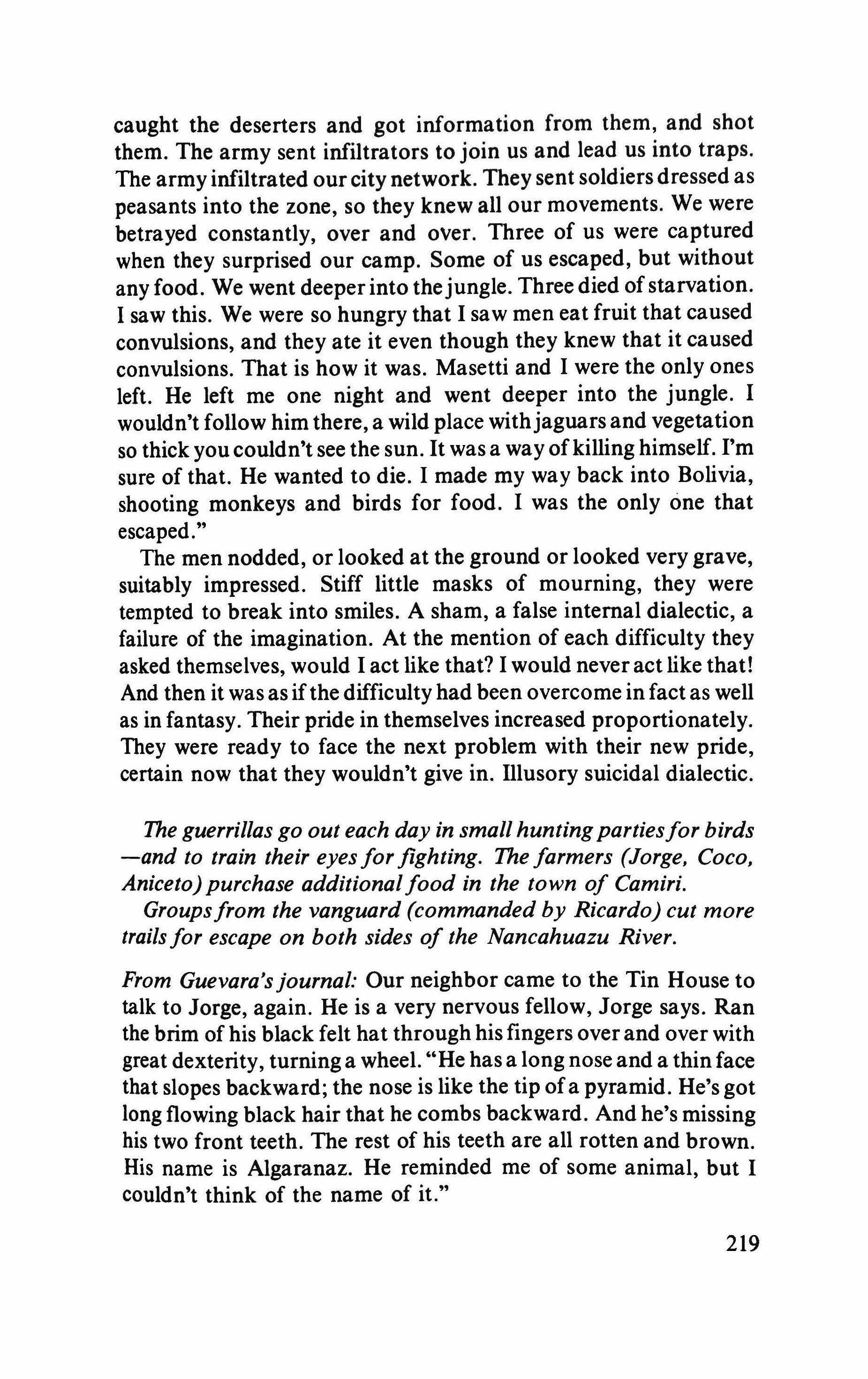
caught the deserters and got information from them, and shot them. The army sent infiltrators to join us and lead us into traps. The army infiltrated our city network. They sent soldiers dressed as peasants into the zone, so they knew all our movements. We were betrayed constantly, over and over. Three of us were captured when they surprised our camp. Some of us escaped, but without any food. We went deeper into thejungle. Three died ofstarvation. I saw this. We were so hungry that I saw men eat fruit that caused convulsions, and they ate it even though they knew that it caused convulsions. That is how it was. Masetti and I were the only ones left. He left me one night and went deeper into the jungle. I wouldn't follow him there, a wild place withjaguars and vegetation so thick youcouldn't see the sun. It was a way ofkilling himself. I'm sure of that. He wanted to die. I made my way back into Bolivia, shooting monkeys and birds for food. I was the only one that escaped."
The men nodded, or looked at the ground or looked very grave, suitably impressed. Stiff little masks of mourning, they were tempted to break into smiles. A sham, a false internal dialectic, a failure of the imagination. At the mention of each difficulty they asked themselves, would I act like that? I would never act like that! And then it was as ifthe difficulty had been overcome infact as well as in fantasy. Their pride in themselves increased proportionately. They were ready to face the next problem with their new pride, certain now that they wouldn't give in. lllusory suicidal dialectic.
The guerrillas go out each day in small huntingpartiesfor birds -and to train their eyes forfighting. The farmers (Jorge, Coco, Aniceto)purchase additionalfood in the town of Camiri.
Groupsfrom the vanguard (commanded by Ricardo) cut more trailsfor escape on both sides of the Nancahuazu River.
From Guevara'sjournal: Our neighbor came to the Tin House to talk to Jorge, again. He is a very nervous fellow, Jorge says. Ran the brim of his black felt hat through his fingers over and over with great dexterity, turning a wheel. "He has a long nose and a thin face that slopes backward; the nose is like the tip of a pyramid. He's got long flowing black hair that he combs backward. And he's missing his two front teeth. The rest of his teeth are all rotten and brown. His name is Algaranaz. He reminded me of some animal, but I couldn't think of the name of it."

"A ferret," I said.
"A hawk," Pombo said.
"A fox," Inti said.
"A bloodhound," Camba said.
"Please go on," 1 said.
"Well, 1 didn't invite him in. I didn't want him getting too chummy. He stared at his shoes for a while, asking if the shooting was good, how the game was running. He said, 'There are certainly a lot of hunters, a lot of men with rifles around here, a lot of hunting going on, unh-huh, unh-huh, unh-huh.' He said unh-huh over and over after every few words. And in between sentences he would whisper things to himself very fast.
" 'Yes,' 1 said, 'now we have friends up often to hunt. I told you we would be using this place as a hunting lodge for our friends, as well as doing a little farming. Don't you remember?' He was very oily to me, very obsequious. 1 acted like he was a piece of cow dung that 1 didn't want inside, so he'd know his place and leave us alone." Jorge paused, to see if I approved.
1 smiled. "Go on." Jorge was a good mimic.
"He was drunk, 1 think. He smelled boozy and rank. And he was leaning up against one of the doorjambs as if to steady himself. While 1 was talking he started sinking down. He stopped turning his hat and gripped it till his knuckles were white, and he braced himself against the door. He stared at me. We were only a few feet apart. He said, 'I know you're not a hunter.' His eyes were going unfocused; I thought he was going to pass out. 'No, 1 know what you're doing, unh-huh, unh-huh. I know a lot ofthings about you.' He started whisperingagain while I stared at him dumbfounded. 'I know a lot more than you think 1 do. And I'm willing to collaborate in the cocaine business, unh-huh, unh-huh. The cocaine business, isn't it? Isn't it? That brings in a lot of money, doesn't it? You have to be more evenhanded with your gains. We're not all as rich as you are, you know.'
"I told him he was crazy, and just walked away. Left him in the door. After a while, he clamped his hat down really hard on his head and walked off."
I instructed Jorge to tell Algaranaz that we'd be happy to have his help with the farm; I told him to offer him a small bribe and add that if he made any trouble for us at all, if he went to the police, ifhe told anyone, even a friend, we'd find out about it and we'd have him killed.

I know Algaranaz's type well, and we're in no real danger. He's a peasant landowner who's done all right for himself. He's shrewd, cunning: a mixture of short-lived belligerence, petty daring, and deep subservience. Courage enough for a little blackmail, a little black market dealing, but not enough essential dignity to see how petty his schemes are, how he's just about as badly used as the poorer peasants, his occasional employees. The small landowner's vanity is immense. But it'sjust vanity, not pride; there's no way for it to become revolutionary anger. The oppressor sits in his heart, a fierce fat little god, and exhales dread. Algaranaz has no character except what he apes from the class above him. He tries to imitate his idol's words, but when he speaks them they appear all mangled, comical. He knows he sounds like a clown, and he hates himselffor it. So he takes revenge on anyone more powerless. Greed, resentment and dread are the substance of his little life. Jorge's contempt was just the right tactic to remind him of his place. Coupled with a sweet little bribe, the threat will be enough to take care of him completely.
Three days after Jorge Vasquezpays a bribe to Algaranaz.four policemen come to the ranch to demand a bribefor themselves, as well.
From Pombo's journal: The bug felt the touch but jumped in an unexpected direction. Algaranaz was more daring than Che thought. Or he couldn't help boasting.
We had to bribe the police. Soon the whole countryside will be on our payroll, and we won't have to make a revolution. We'll order them to become socialists and fire the ones who don't. Does Che, I wonder, underestimate the courage of the petite bourgeoisie? He has too many theories, sometimes, to see what's right before his eyes. But it's hard anymore to talk about these matters with him. I'll save it for my book, My Comrade, Che. (Or perhaps, My Difficult Comrade, Che. Or, My Pig-headed Comrade, Che.)
From Guevara'sjournal: Coco returned from La Paz, where he'd gone to get the recruits from the youth wing ofthe Party. I met him in the Bear Camp, the one overlooking the farm. He was still wearing his business suit, a thin blue fabric, worn through and too small for him. His black shoes were dusty from his walk. His face, usually so amiable looking, was red, angry.

"I got them, all right. As planned. Then he popped up at the bus terminal. "
"Who popped up?" 1 said. "Slow down."
"Monje," Coco said. But he didn't slow down. "He was waiting at the bus by the door, by the bus to Camiri. He stood right in front of the door and said, 'I won't allow you to take these men with you. They're young communist militants, and they're under Party discipline. I can't allow them to go with you.' You know, as if it wasn't his idea, but a Party decision that he had to carry out. Well, the two of them said they were going anyway, they didn't give a fuck about Party discipline. They were good kids. They were brave guys. One of them said he was a Party member, and wanted to remain a Party member. One of them didn't say anything at all. He was too confused. 1 thought he was going to faint in the middle of the bus station. He would have been a big help! Monje said that if any of them went with me he was going to give their names to the police. I couldn't believe that! I loved Monje, you know, and he would kill us all! 1 said, 'If you do that, I'll kill you. 1 swear to you, Monje, Inti or 1 will kill you.' But 1 had to leave the men with him, didn't I? 1 didn't have any choice, did I? The whole thing upset me a lot. 1 have to sit down. Why did he do that?"
What is Monje's game? First his offer to Fidel, and now this. His duplicity? Or perhaps even Soviet pressure? Kill him?
Kill Algaranaz now? As an example? Too late for that.
February
A group of thirty soldiers approaches the Tin House across the openfields, andalong the river bank. Pacho, aformer miner who is part of Ricardo's vanguard group, disobeys orders and shoots an army sentry. Ricardo strikes Pacho across theface with the handle of a machete and orders the immediate retreat of the vanguard group toward the base camp, where Che is waiting with the main guerrilla body.
A messengerfrom Ricardo, preceding the vanguard, arrives at the main camp. Sweating, out of breath, he tells everyone to prepareforcomplete retreat. Guevara, enragedby Ricardo's order, sends a message to the vanguard leader reminding him that "wars are won with bullets." He orders the vanguard to return to Bear Camp, and set up ambushes in the established locations.
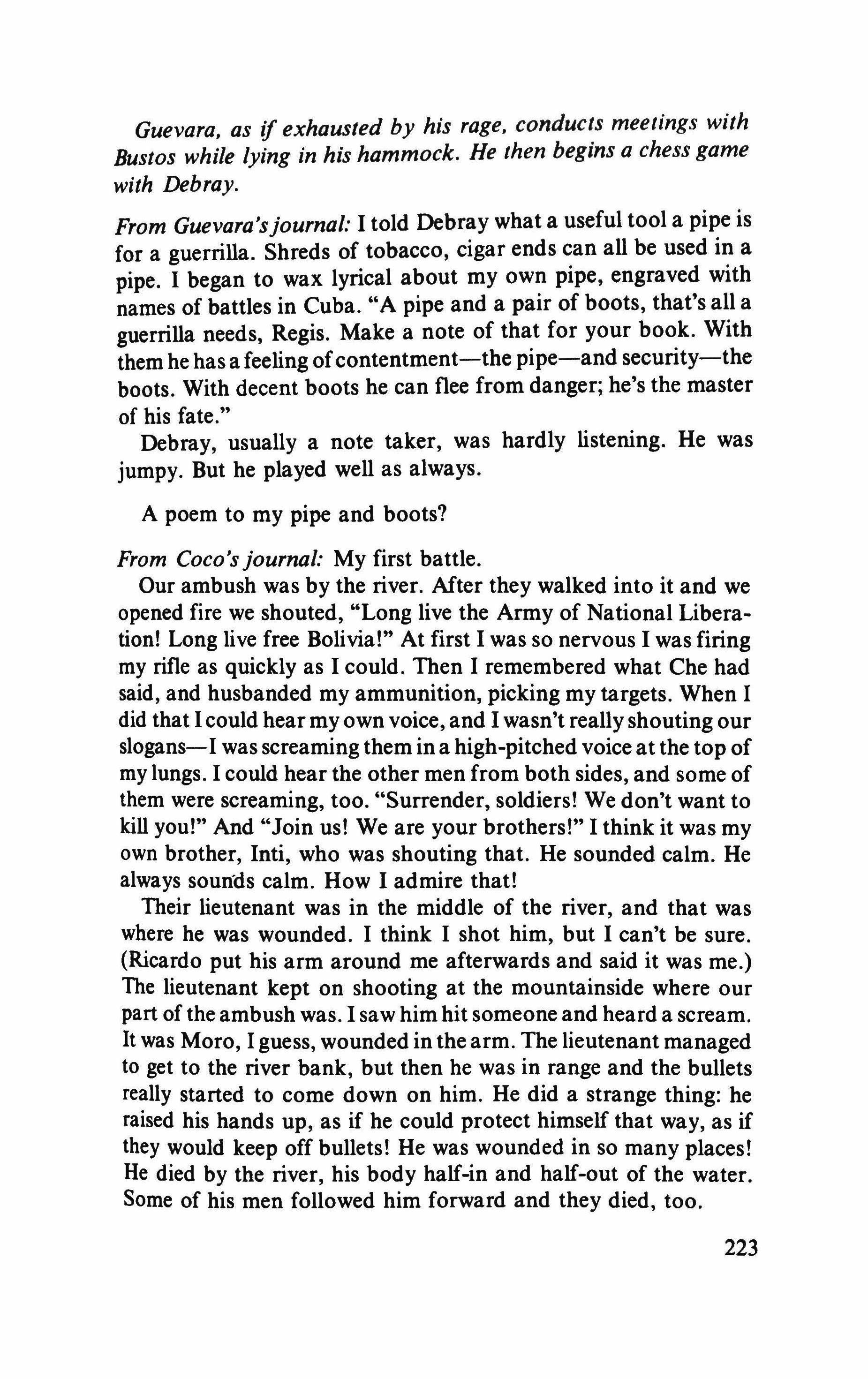
Guevara, as if exhausted by his rage, conducts meetings with Bustos while lying in his hammock. He then begins a chess game with Debray.
From Guevara'sjournal: I told Debray what a useful tool a pipe is for a guerrilla. Shreds of tobacco, cigar ends can all be used in a pipe. I began to wax lyrical about my own pipe, engraved with names of battles in Cuba. "A pipe and a pair of boots, that's all a guerrilla needs, Regis. Make a note of that for your book. With them he has a feeling ofcontentment-the pipe-and security-the boots. With decent boots he can flee from danger; he's the master of his fate."
Debray, usually a note taker, was hardly listening. He was jumpy. But he played well as always.
A poem to my pipe and boots?
From Coco's journal: My first battle.
Our ambush was by the river. After they walked into it and we opened fire we shouted, "Long live the Army of National Liberation! Long live free Bolivia!" At first I was so nervous I was firing my rifle as quickly as I could. Then I remembered what Che had said, and husbanded my ammunition, picking my targets. When I did that I could hear my own voice, and I wasn't reallyshouting our slogans-I was screaming them in a high-pitched voice at the top of my lungs. I could hear the other men from both sides, and some of them were screaming, too. "Surrender, soldiers! We don't want to kill you!" And "Join us! We are your brothers!" I think it was my own brother, Inti, who was shouting that. He sounded calm. He always sounds calm. How I admire that!
Their lieutenant was in the middle of the river, and that was where he was wounded. I think I shot him, but I can't be sure. (Ricardo put his arm around me afterwards and said it was me.) The lieutenant kept on shooting at the mountainside where our part of the ambush was. I saw him hit someone and heard a scream. It was Moro, I guess, wounded in the arm. The lieutenant managed to get to the river bank, but then he was in range and the bullets really started to come down on him. He did a strange thing: he raised his hands up, as if he could protect himself that way, as if they would keep off bullets! He was wounded in so many places! He died by the river, his body half-in and half-out of the water. Some of his men followed him forward and they died, too.
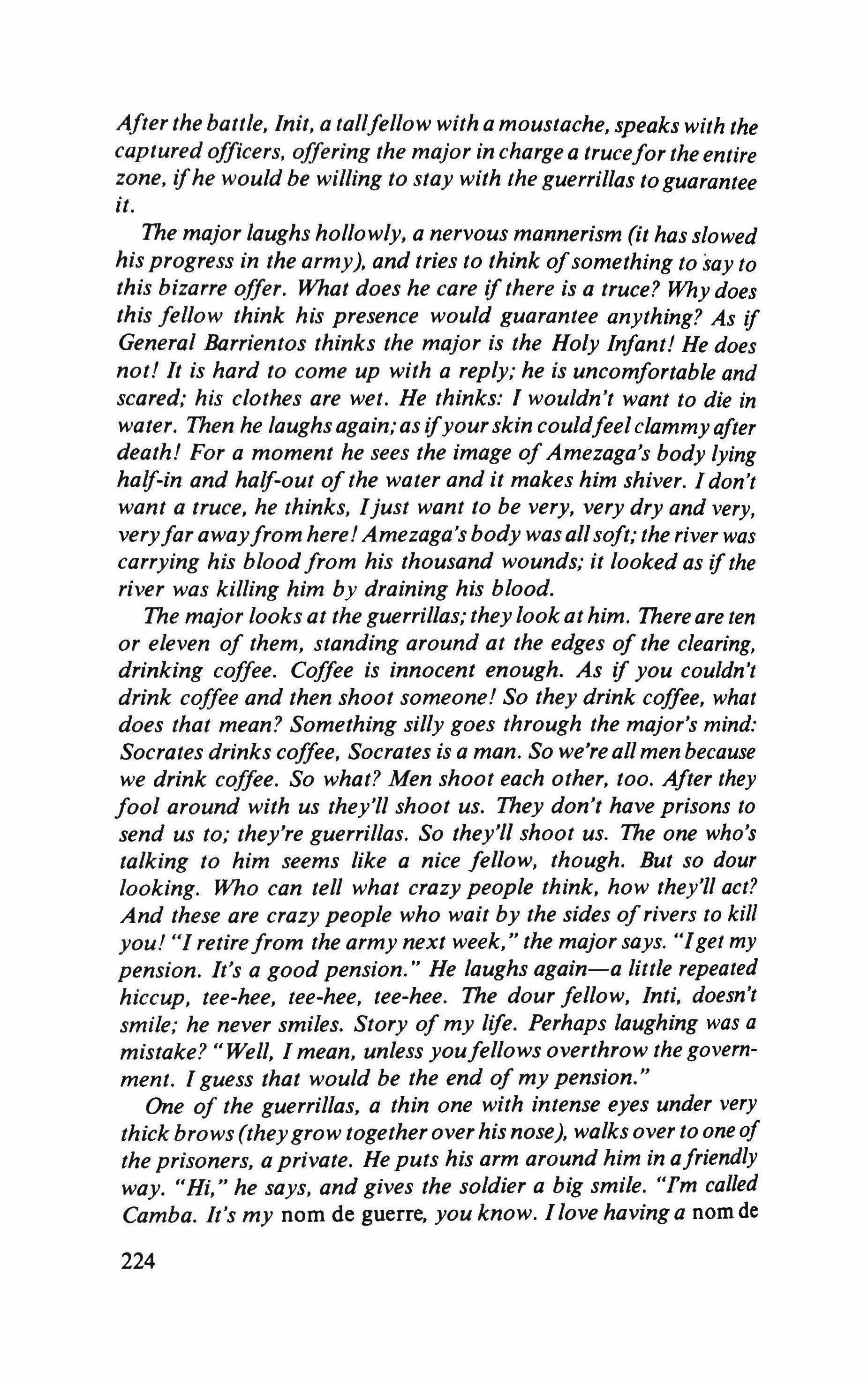
After the battle, Init, a tallfellow with a moustache, speaks with the captured officers, offering the major in charge a trucefor the entire zone, ifhe would be willing to stay with the guerrillas to guarantee it.
The major laughs hollowly, a nervous mannerism (it has slowed his progress in the army), and tries to think ofsomething to say to this bizarre offer. What does he care if there is a truce? Why does this fellow think his presence would guarantee anything? As if General Barrientos thinks the major is the Holy Infant! He does not! It is hard to come up with a reply; he is uncomfortable and scared; his clothes are wet. He thinks: I wouldn't want to die in water. Then he laughs again; as ifyour skin couldfeelclammyafter death! For a moment he sees the image of Amezaga's body lying half-in and half-out of the water and it makes him shiver. I don't want a truce, he thinks, Ijust want to be very, very dry and very, veryfar awayfrom here! Amezaga'sbody was allsoft; the river was carrying his bloodfrom his thousand wounds; it looked as ifthe river was killing him by draining his blood.
The major looks at the guerrillas; they look at him. There are ten or eleven of them, standing around at the edges of the clearing, drinking coffee. Coffee is innocent enough. As if you couldn't drink coffee and then shoot someone! So they drink coffee, what does that mean? Something silly goes through the major's mind: Socrates drinks coffee, Socrates is a man. So we're all men because we drink coffee. So what? Men shoot each other, too. After they fool around with us they'll shoot us. They don't have prisons to send us to; they're guerrillas. So they'll shoot us. The one who's talking to him seems like a nice fellow, though. But so dour looking. Who can tell what crazy people think, how they'll act? And these are crazy people who wait by the sides ofrivers to kill you! "I retirefrom the army next week," the major says. "Iget my pension. It's a good pension." He laughs again-a little repeated hiccup, tee-hee, tee-hee, tee-hee. The dour fellow, Inti, doesn't smile; he never smiles. Story of my life. Perhaps laughing was a mistake? "Well, I mean, unless youfellows overthrow the government. I guess that would be the end of my pension."
One of the guerrillas, a thin one with intense eyes under very thick brows (theygrow together over his nose), walks over to one of the prisoners, a private. He puts his arm around him in afriendly way. "Hi," he says, and gives the soldier a big smile. "Tm called Camba. It's my nom de guerre, you know. Ilove having a nom de
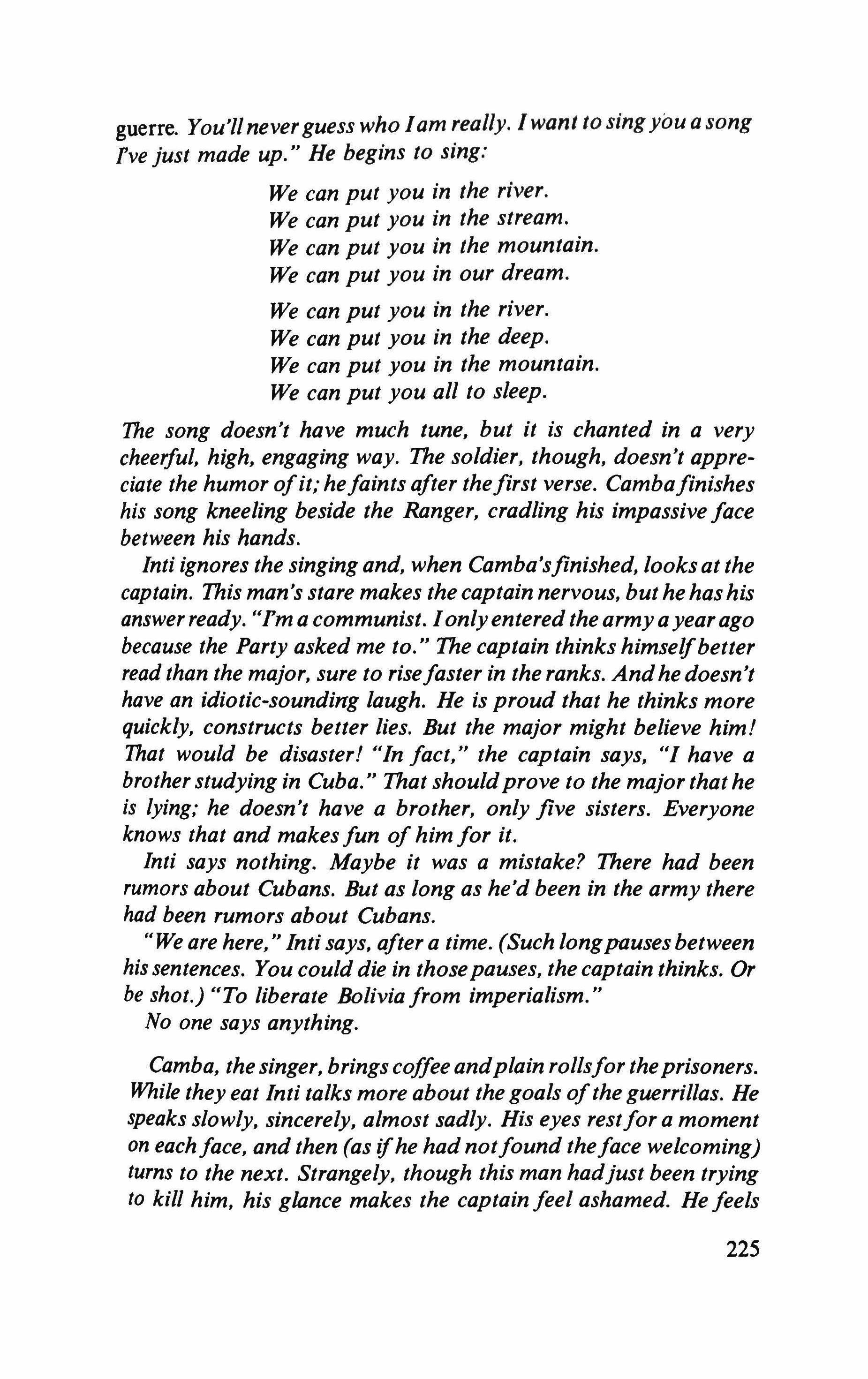
guerre. You'll neverguess who Iam really. Iwant to singyou a song I've just made up." He begins to sing:
We can put you in the river.
We can put you in the stream. We can put you in the mountain. We can put you in our dream.
We can put you in the river.
We can put you in the deep.
We can put you in the mountain.
We can put you all to sleep.
The song doesn't have much tune, but it is chanted in a very cheerful, high, engaging way. The soldier, though, doesn't appreciate the humor ofit; hefaints after thefirst verse. Cambafinishes his song kneeling beside the Ranger, cradling his impassiveface between his hands.
Inti ignores the singing and, when Camba'sfinished, looks at the captain. This man's stare makes the captain nervous, but he hashis answer ready. "I'm a communist. Ionlyentered the army a yearago because the Party asked me to." The captain thinks himselfbetter read than the major, sure to risefaster in the ranks. Andhe doesn't have an idiotic-sounding laugh. He is proud that he thinks more quickly, constructs better lies. But the major might believe him! That would be disaster! "In fact," the captain says, "I have a brother studying in Cuba." That shouldprove to the major that he is lying; he doesn't have a brother, only five sisters. Everyone knows that and makesfun of him for it.
Inti says nothing. Maybe it was a mistake? There had been rumors about Cubans. But as long as he'd been in the army there had been rumors about Cubans.
"We are here," Inti says, after a time. (Such longpauses between his sentences. You could die in thosepauses, the captain thinks. Or be shot.) "To liberate Bolivia from imperialism."
No one says anything.
Camba, thesinger, bringscoffee andplain rollsfor theprisoners. While they eat Inti talks more about the goals ofthe guerrillas. He speaks slowly, sincerely, almost sadly. His eyes restfora moment on eachface, and then (as ifhe had notfound theface welcoming) turns to the next. Strangely, though this man hadjust been trying to kill him, his glance makes the captainfeel ashamed. He feels
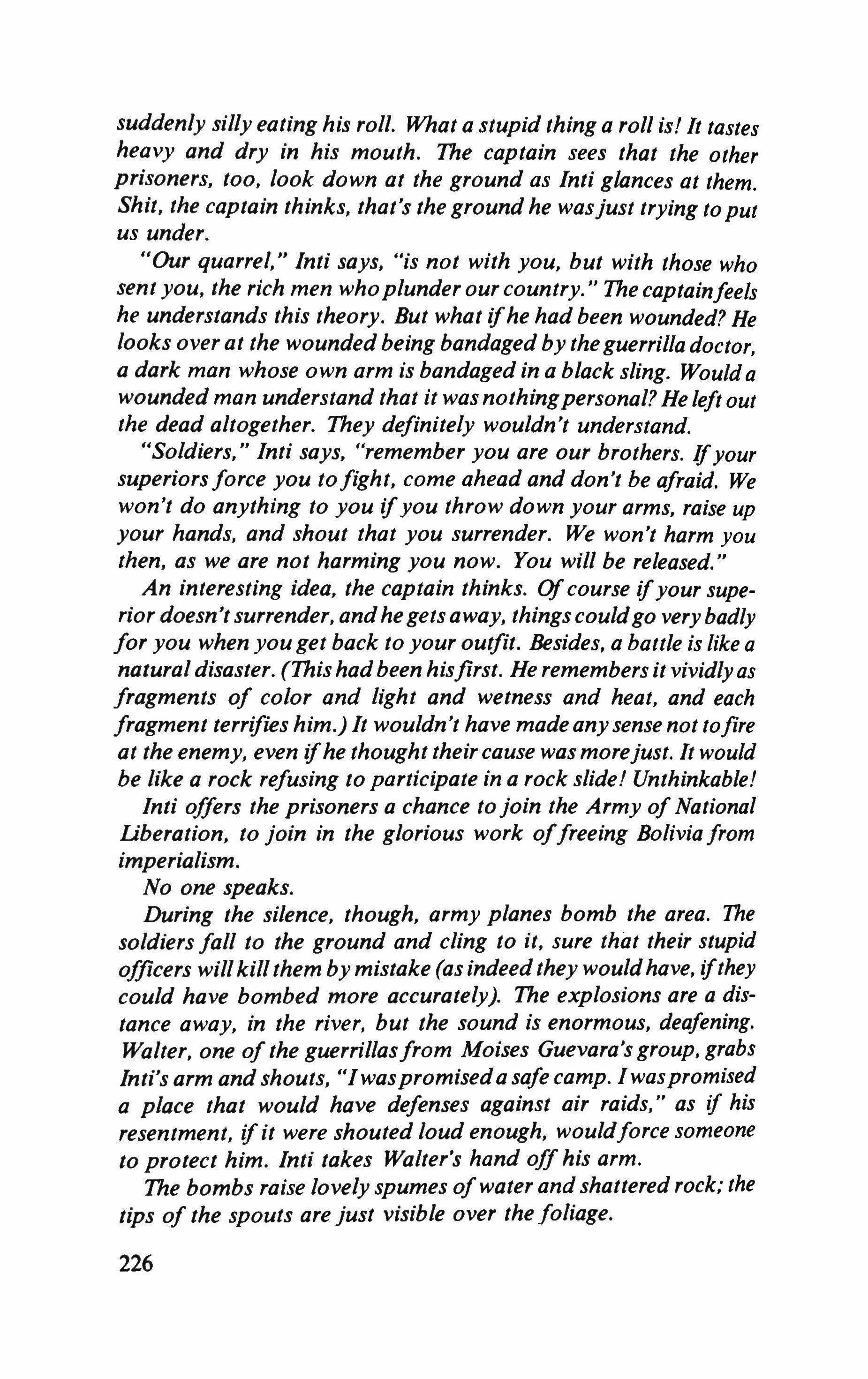
suddenly silly eating his roll. What a stupid thing a roll is! It tastes heavy and dry in his mouth. The captain sees that the other prisoners, too, look down at the ground as Inti glances at them. Shit, the captain thinks, that's the ground he wasjust trying to put us under.
"Our quarrel, JJ Inti says, "is not with you, but with those who sent you, the rich men whoplunder our country. JJ The captainfeels he understands this theory. But what ifhe had been wounded? He looks over at the wounded being bandaged by theguerrilladoctor, a dark man whose own arm is bandaged in a black sling. Would a wounded man understand that it was nothingpersonal? He left out the dead altogether. They definitely wouldn't understand.
"Soldiers, JJ Inti says, "remember you are our brothers. Ifyour superiorsforce you tofight, come ahead and don't be afraid. We won't do anything to you ifyou throw down your arms, raise up your hands, and shout that you surrender. We won't harm you then, as we are not harming you now. You will be released."
An interesting idea, the captain thinks. Of course ifyour superior doesn't surrender, andhegets away, thingscouldgo very badly for you when you get back to your outfit. Besides, a battle is like a natural disaster. (This hadbeen hisfirst. He remembers it vividly as fragments of color and light and wetness and heat, and each fragment terrifies him.) It wouldn't have made any sense not tofire at the enemy, even ifhe thought their cause was morejust. It would be like a rock refusing to participate in a rock slide! Unthinkable!
Inti offers the prisoners a chance to join the Army of National liberation, to join in the glorious work offreeing Boliviafrom imperialism. No one speaks.
During the silence, though, army planes bomb the area. The soldiers fall to the ground and cling to it, sure that their stupid officers willkillthem by mistake (as indeed they wouldhave, ifthey could have bombed more accurately). The explosions are a distance away, in the river, but the sound is enormous, deafening. Walter, one of the guerrillasfrom Moises Guevara's group, grabs Inti's arm and shouts, "Iwaspromised a safe camp. I waspromised a place that would have defenses against air raids, JJ as if his resentment, ifit were shouted loud enough, wouldforce someone to protect him. Inti takes Walter's hand off his arm.
The bombs raise lovely spumes of water and shattered rock; the tips of the spouts are just visible over thefoliage. 226
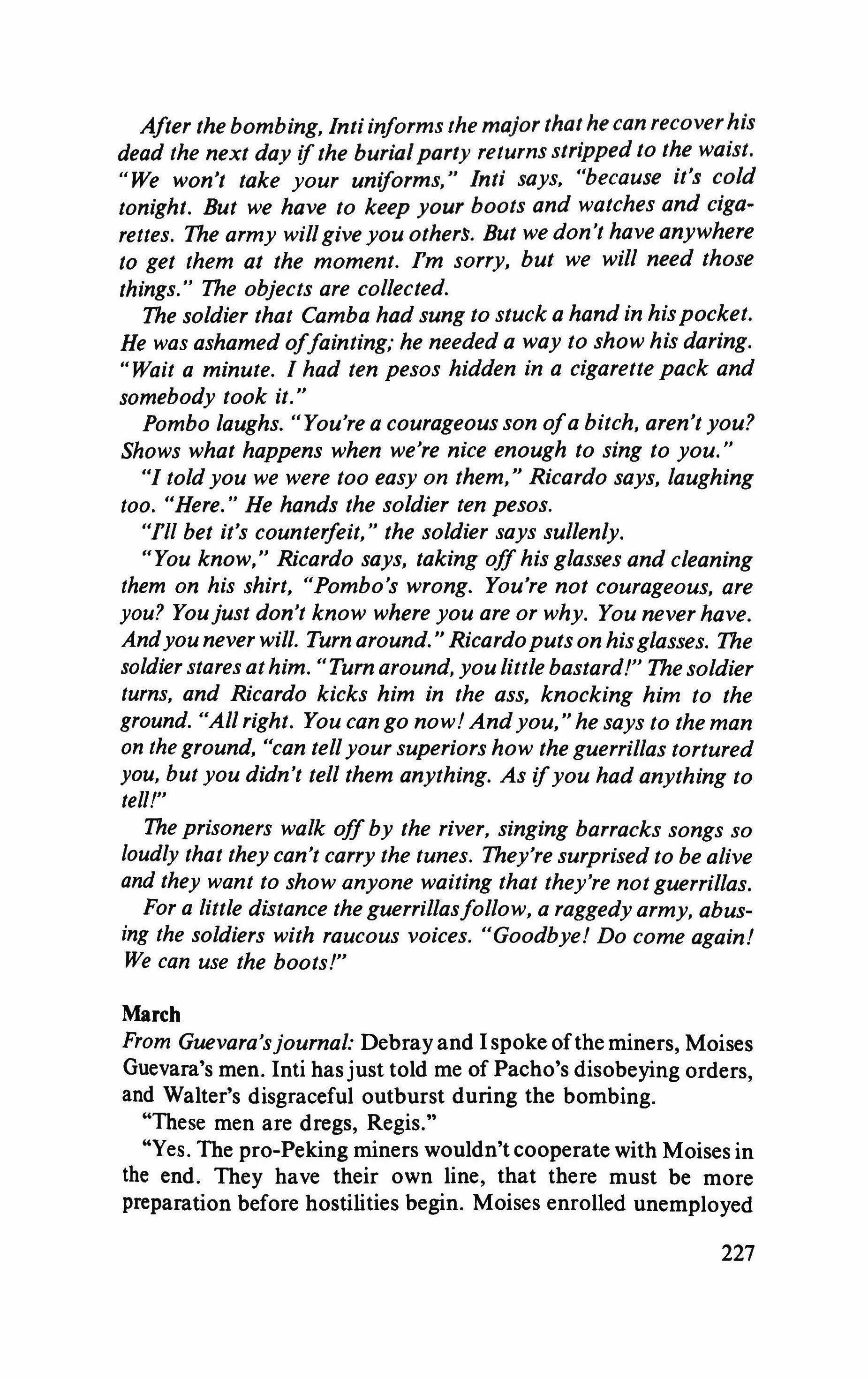
After the bombing, Inti informs the major that he can recover his dead the next day if the burialparty returns stripped to the waist. "We won't take your uniforms," Inti says, "because it's cold tonight. But we have to keep your boots and watches and cigarettes. The army willgive you others. But we don't have anywhere to get them at the moment. I'm sorry, but we will need those things." The objects are collected.
The soldier that Camba had sung to stuck a hand in hispocket. He was ashamed offainting; he needed a way to show his daring. "Wait a minute. I had ten pesos hidden in a cigarette pack and somebody took it."
Pombo laughs. "You're a courageous son ofa bitch, aren't you? Shows what happens when we're nice enough to sing to you."
"I told you we were too easy on them," Ricardo says, laughing too. "Here." He hands the soldier ten pesos.
'Til bet it's counterfeit," the soldier says sullenly.
"You know," Ricardo says, taking off his glasses and cleaning them on his shirt, "Pombo's wrong. You're not courageous, are you? Youjust don't know where you are or why. You never have. Andyou never will. Turn around." Ricardoputs on hisglasses. The soldier stares at him. "Turn around, you little bastard!" The soldier turns, and Ricardo kicks him in the ass, knocking him to the ground. "All right. You can go now! Andyou," he says to the man on the ground, "can tell your superiors how the guerrillas tortured you, but you didn't tell them anything. As ifyou had anything to tell!"
The prisoners walk offby the river, singing barracks songs so loudly that they can't carry the tunes. They're surprised to be alive and they want to show anyone waiting that they're not guerrillas. For a little distance the guerrillasfollow, a raggedy army, abusing the soldiers with raucous voices. "Goodbye! Do come again! We can use the boots!"
March
From Guevara'sjournal: Debrayand I spoke ofthe miners, Moises Guevara's men. Inti hasjust told me of Pacho's disobeying orders, and Walter's disgraceful outburst during the bombing.
"These men are dregs, Regis."
"Yes. The pro-Peking miners wouldn't cooperate with Moises in the end. They have their own line, that there must be more preparation before hostilities begin. Moises enrolled unemployed
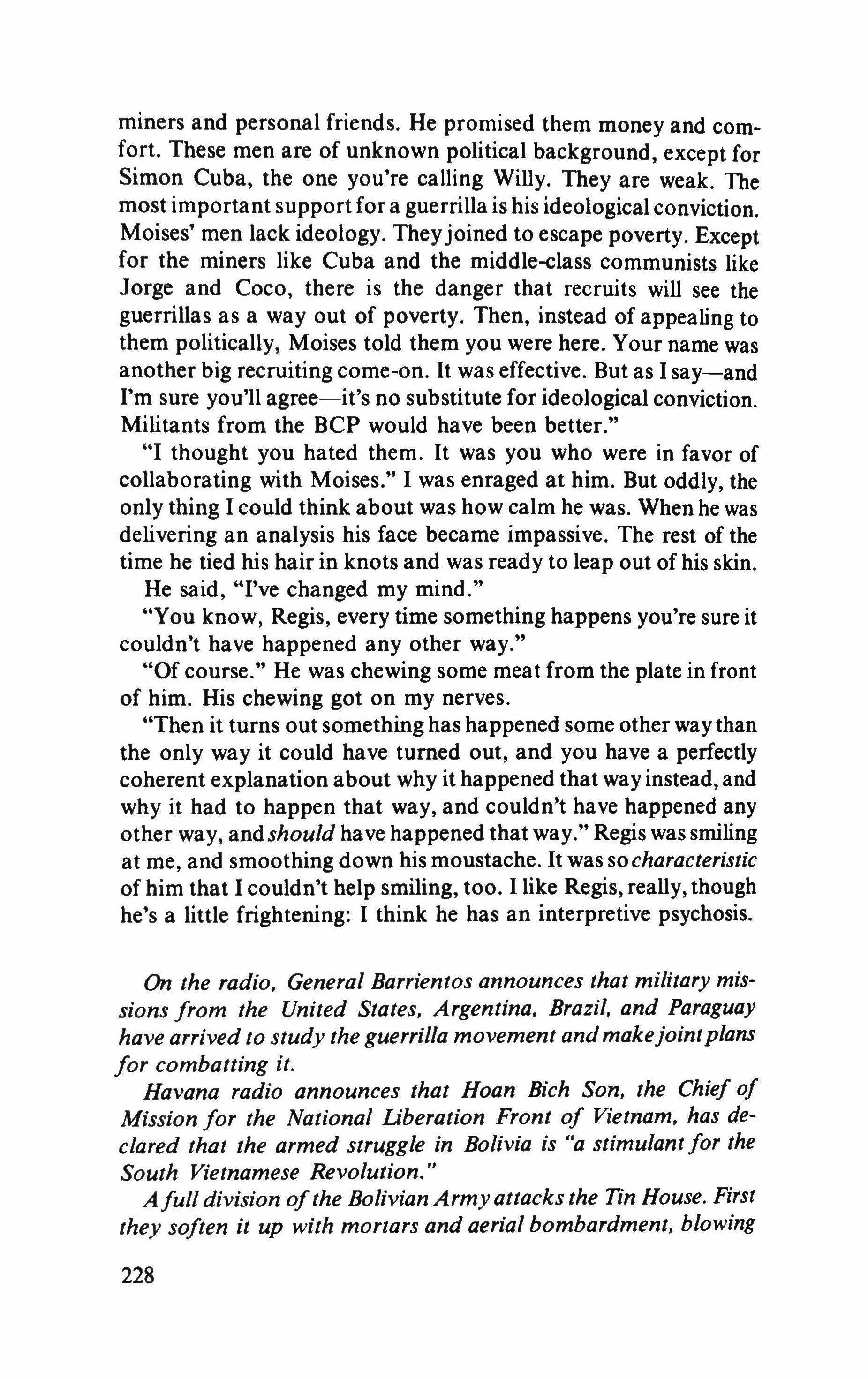
miners and personal friends. He promised them money and comfort. These men are of unknown political background, except for Simon Cuba, the one you're calling Willy. They are weak. The most important support for a guerrilla is his ideological conviction. Moises' men lack ideology. Theyjoined to escape poverty. Except for the miners like Cuba and the middle-class communists like Jorge and Coco, there is the danger that recruits will see the guerrillas as a way out of poverty. Then, instead of appealing to them politically, Moises told them you were here. Your name was another big recruiting come-on. It was effective. But as 1 say-and I'm sure you'll agree-it's no substitute for ideological conviction. Militants from the BCP would have been better."
"I thought you hated them. It was you who were in favor of collaborating with Moises." 1 was enraged at him. But oddly, the only thing 1 could think about was how calm he was. When he was delivering an analysis his face became impassive. The rest of the time he tied his hair in knots and was ready to leap out of his skin.
He said, "I've changed my mind."
"You know, Regis, every time something happens you're sure it couldn't have happened any other way."
"Of course." He was chewing some meat from the plate in front of him. His chewing got on my nerves.
"Then it turns out something has happened some other way than the only way it could have turned out, and you have a perfectly coherent explanation about why it happened that way instead, and why it had to happen that way, and couldn't have happened any other way, andshould have happened that way." Regis was smiling at me, and smoothing down his moustache. It was so characteristic of him that 1 couldn't help smiling, too. 1 like Regis, really, though he's a little frightening: 1 think he has an interpretive psychosis.
On the radio, General Barrientos announces that military missions from the United States, Argentina, Brazil, and Paraguay have arrived to study the guerrilla movement andmakejointplans for combatting it.
Havana radio announces that Hoan Rich Son, the Chief of Mission for the National liberation Front of Vietnam, has declared that the armed struggle in Bolivia is "a stimulantfor the South Vietnamese Revolution."
Afull division ofthe Bolivian Army attacks the Tin House. First they soften it up with mortars and aerial bombardment, blowing

up the outhouse, the corral, the vegetable garden, the hen house, the few hens and the rooster (who screams and screams-each scream is counted by a Bolivian colonel and added to the number ofguerrillas killed). Then they retreat.
The guerrillas store their excess supplies in the caves they've prepared: arms, bullets, documents, photos,film, books, dollars, cameras, tape recorders, typewriters, clothing, blankets, the boots they've taken from the soldiers, medicine (epinephrinefor Che's asthma). Theirplan is to draw the army out ofthe zone and, when necessary, circle back to Nancahuazu to retrieve the medicinesand other things they will need.
When they unwrap the radio they have storedfor broadcasting messages, they discover it has been destroyed by water seepage.
The guerrillas move north, passing the unburied bodies of the soldiers killed in ambush. A dead Bolivian Ranger wears a black beret,jackboots, a leather belt, lightgreen sunglasses, anda brownbordered white handkerchief tied in a silver loop. The vultures have turnedhisshirt andhandkerchiefto rags. Imperialism and the war ofliberation have turned the soldiers to garbage. The corpses, lying in the mud, mostly still wear their black berets andsunglasses. What littleflesh still clings to theirfaces is black andpuffy. The dead Bolivian Ranger also wears tightpants stuffed into his boots; his legs were protected (or wasted)-the vultures couldn't get at them. The river could, though. Bits of very white, water-logged flesh come loose under the pants andfloat downstream.
North ofthe Rio Grande the guerrillas lose their way, encounter steep cliffs, are forced to double back.
From Guevara'sjournal: Inti and I have tried to talk with peasants in this region. It's been an unsatisfactory comedy. We don't scare them, but we don't bother them much, either. They listen and hang their heads, and listen, as impenetrable as stones. There is one guy near the river with his family, named Rojas, who was friendly, or at least accommodating. We bought a pig and gave him some money to raise hogs for us. This will implicate him, and make him think that we'll be returning. We told him that if he helped the army we would kill him. The army will tell him that if he helps the guerrillas they will kill him. We'll see which way he jumps. He seems capable of helping us, but incapable yet of imagining the dangers involved. That makes him dangerous.
The doctor treated the children, putting salve on their eyes for worms.

From Coco's journal: On the march today I walked with my brother. "Inti," I said, "you remember during the battle?
"Remember what?" A long sentence for him.
"I want to tell you something. I was so scared that I pissed in my pants. I don't think I'll make a good guerrilla."
Inti stared at me for a moment. He is very quick-witted, I know. What does he think about in those silences? "That's nothing," he said, "I shit mine."
"Come on," I said, "you're saying that to make me feel better."
"No. I really did. Big soft wet turds and shitty liquid in a stream; it started coming out all at once, I couldn't control it. As soon as they started firing at us. And all the time I was talking to the prisoners about liberation and our fight against imperialism my pants were full of shit. I thought everybody would be able to smell it."
Moro came up behind us with his arms in a sling. I was carrying his pack for him. It was heavy and the sun was terrible. He must have overheard us. "That's nothing. The first time I was in battle in Cuba I shit my pants, and pissed, and I swear to God, snot came out of my nose. I was leaking from every hole in my body."
"See," Inti said, "the Cubans do more of everything." He didn't smile, but I'm sure he was joking. It's better to make jokes about such feelings than to let them fester.
"No really," Moro said, "when I'm nervous I snort. When the firing started I began to snort really hard. When I felt the snot on my lip I thought it was blood. That's when I pissed in my pants, because I thought I'd been wounded in the face. When I felt the wetness in my underwear, I thought I was bleeding there, too, that I'd been shot in the balls. That's when I shit in my pants. All the Cubans have some story like that. Even Ricardo."
"Even Che?" I asked.
"Even Che, I suppose. I don't know. I've never asked him."
From Camba's journal: Buzzz buzzzz buzzzzz. The mosquitoes are always in our ears, on our skin, sucking our blood. Soon all I'll be able to hear is that sound; it will fill my whole brain. That's when I die. When my head is one big red mosquito buzz, all my own blood gone, replaced by buzzing.
Theguerrillas eat bitter.fibrousmonkey meat, when they can get it. Otherwise, they eat dead/ish/rom the backwaters ofthe rivers.

From Guevara's journal: Tania played me a tape of the native music she's collected. It reminded me of my other time in Bolivia, after medical school. I told her a little about it. "I liked the way the Indians didn't show any discomfort. But that could kill us now. They think everything is as it is forever. The stones, the trees, the landlords, the soldiers are all facts of nature, immutable. They're all stoics."
"No, Che," she said, "you don't understand them at all. They are not stoics like that. They are always in rebellion. You know, in all the villages I've been to they have churches. They're Christians, right? But they drive the priests crazy. And I mean really crazy, looney=lonely, helpless, confused. The priests start to hear voices. But the Indians already hear voices. The priests talk at them and talk at them, and they don't even talk back. But the Indians' voices talk to him, and every element of ritual the priests tell them they twist up in some way. The priest baptizes a child and the Indian mother takes him away immediately after paying the priest and has a curer take a mouthful of rum and spit it all over the baby."
"A baptism of fire," Camba said, "after the baptism of water." He was walking with us. He makes me uneasy. "Exactly," Tania said. "You thinkjust like an Indian. And after the priest performs a burial, the whole family goes up and starts kicking the coffin. They want the dead guy to be angry at them. They believe in the resurrection, all right. Immediately, and for the purposes of souring milk and sucking blood. They don't want the dead guy taking them to the land of the dead for company. So they kick him to show they're not his pals. And the Indians listen to the priest, but they think Christ must have been an Indian, too. Because the Jews-that means rich whites with tails as far as they're concerned-crucified him. So they don't care what the priest says, they don't bother praying to him. A guy who gets crucified can't do much for you. They worship the saints which are these store dummies that they've got dressed up in their idea ofrich people's clothing, like lace tablecloths and dried fruit on a string. And some time these saints come to them in their dreams, but then they don't look like whites, they look like Indians. And they tell them to put their priest in a deep hole with some dry turds and only give him dried com and water for a week-enough to keep him alive. And they do it. But the police can't find out who did it, because the whole village did it, nobody did it, the saints told them to do it. It may not sound like much
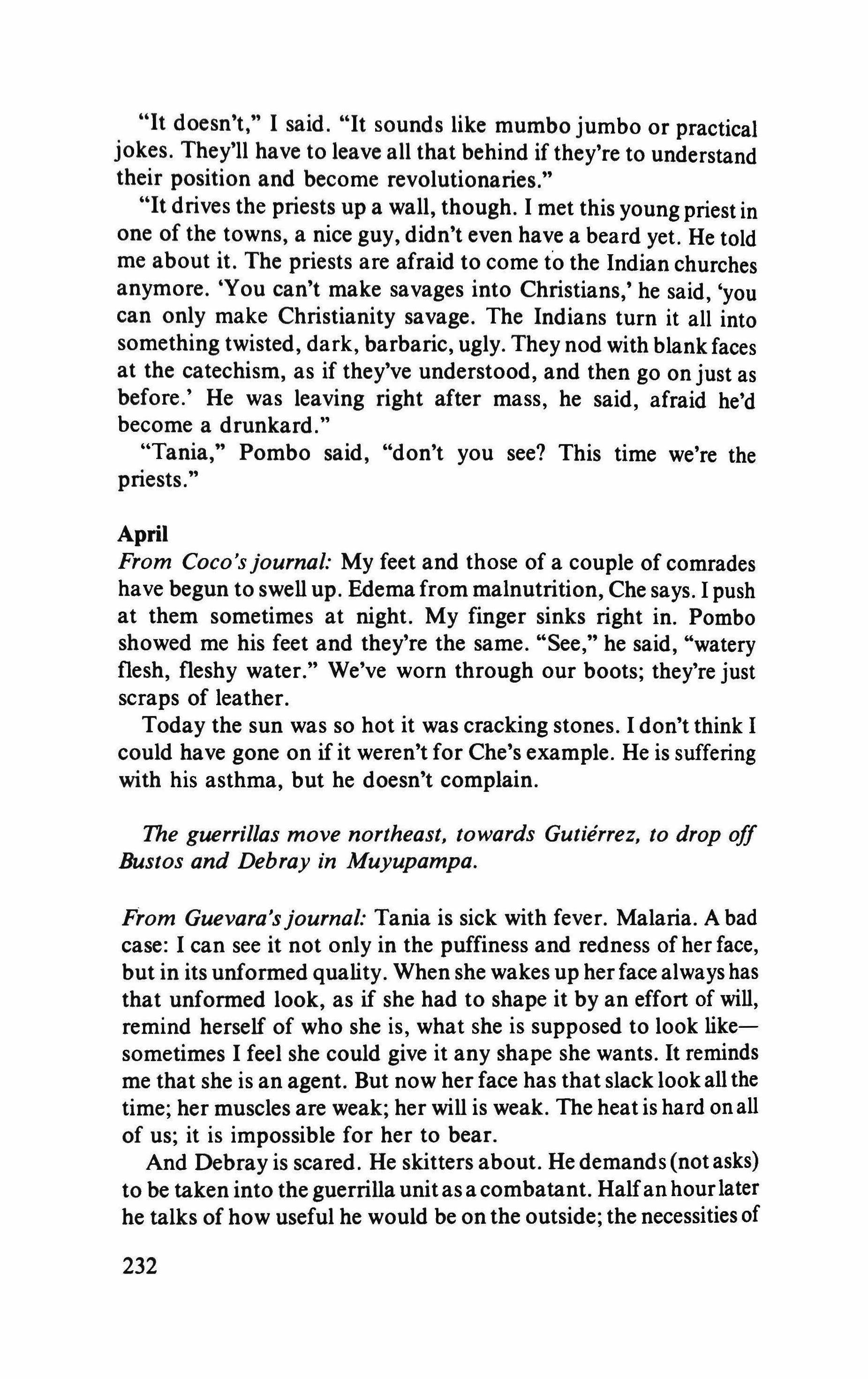
"It doesn't," I said. "It sounds like mumbo jumbo or practical jokes. They'll have to leave all that behind if they're to understand their position and become revolutionaries."
"It drives the priests up a wall, though. I met this young priest in one of the towns, a nice guy, didn't even have a beard yet. He told me about it. The priests are afraid to come to the Indian churches anymore. 'You can't make savages into Christians,' he said, 'you can only make Christianity savage. The Indians turn it all into something twisted, dark, barbaric, ugly. They nod with blank faces at the catechism, as if they've understood, and then go on just as before.' He was leaving right after mass, he said, afraid he'd become a drunkard."
"Tania," Pombo said, "don't you see? This time we're the priests."
April
From Coco'sjournal: My feet and those of a couple of comrades have begun to swell up. Edema from malnutrition, Che says. I push at them sometimes at night. My finger sinks right in. Pombo showed me his feet and they're the same. "See," he said, "watery flesh, fleshy water." We've worn through our boots; they're just scraps of leather.
Today the sun was so hot it was cracking stones. I don't think I could have gone on if it weren't for Che's example. He is suffering with his asthma, but he doesn't complain.
The guerrillas move northeast, towards Gutierrez, to drop off Bustos and Debray in Muyupampa.
From Guevara'sjournal: Tania is sick with fever. Malaria. A bad case: I can see it not only in the puffiness and redness of her face, but in its unformed quality. When she wakes up her face always has that unformed look, as if she had to shape it by an effort of will, remind herself of who she is, what she is supposed to look likesometimes I feel she could give it any shape she wants. It reminds me that she is an agent. But now her face has that slack look all the time; her muscles are weak; her will is weak. The heat is hard on all of us; it is impossible for her to bear.
And Debray is scared. He skitters about. He demands (notasks) to be taken into the guerrilla unit as a combatant. Half an hourlater he talks of how useful he would be on the outside; the necessities of
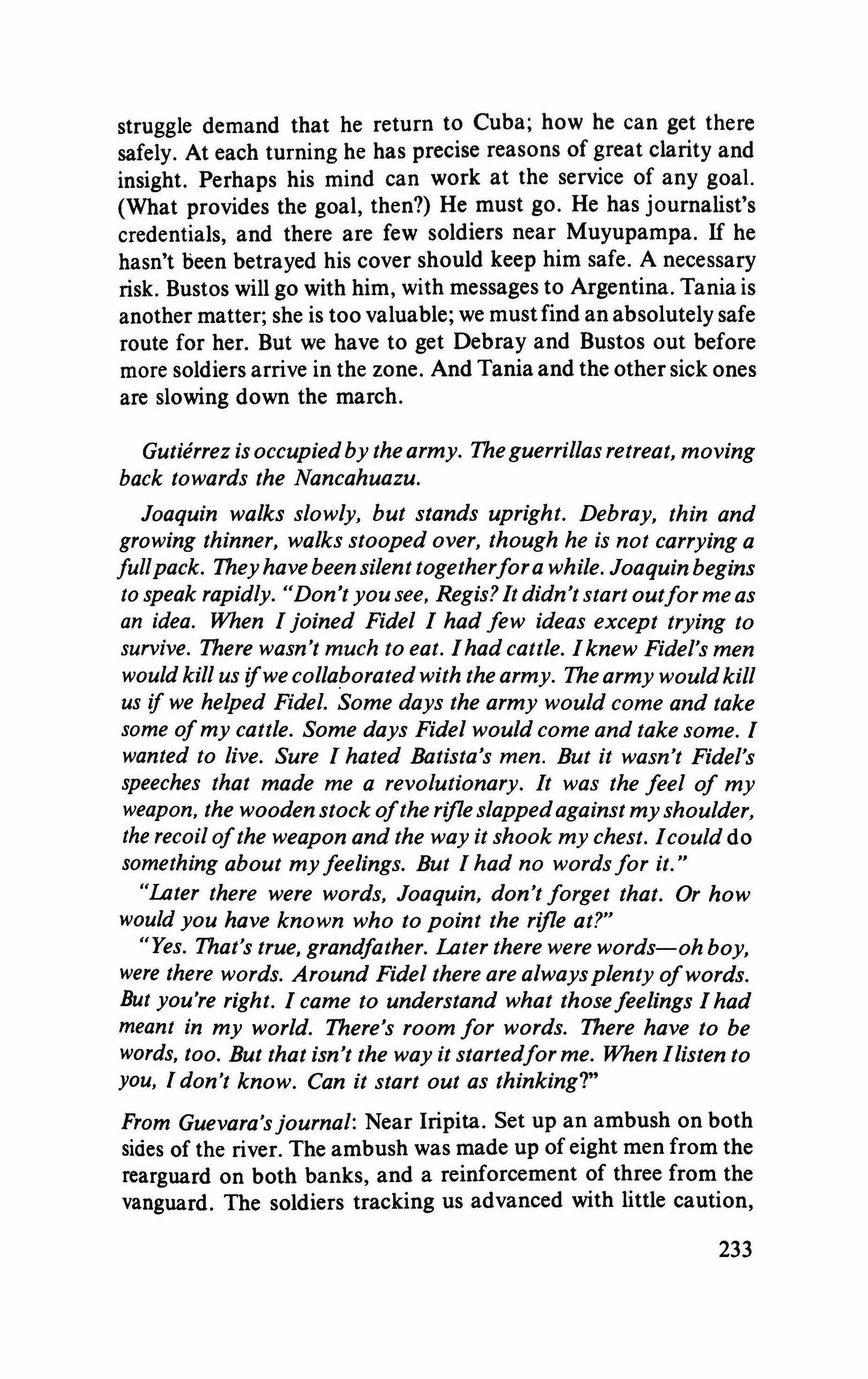
struggle demand that he return to Cuba; how he can get there safely. At each turning he has precise reasons of great clarity and insight. Perhaps his mind can work at the service of any goal. (What provides the goal, then?) He must go. He has journalist's credentials, and there are few soldiers near Muyupampa. If he hasn't been betrayed his cover should keep him safe. A necessary risk. Bustos will go with him, with messages to Argentina. Tania is another matter; she is too valuable; we must find an absolutely safe route for her. But we have to get Debrayand Bustos out before more soldiers arrive in the zone. And Tania and the other sick ones are slowing down the march.
Gutierrez is occupiedby the army. Theguerrillas retreat, moving back towards the Nancahuazu.
Joaquin walks slowly, but stands upright. Debray, thin and growing thinner, walks stooped over, though he is not carrying a fullpack. Theyhave been silent togetherfor a while. Joaquinbegins to speak rapidly. "Don't you see, Regis? It didn't start outfor me as an idea. When I joined Fidel I had few ideas except trying to survive. There wasn't much to eat. Ihad cattle. Iknew Fidel's men would kill us ifwe collaboratedwith the army. The army wouldkill us if we helped Fidel. Some days the army would come and take some ofmy cattle. Some days Fidel would come and take some. I wanted to live. Sure I hated Batista's men. But it wasn't Fidel's speeches that made me a revolutionary. It was the feel of my weapon, the wooden stock ofthe rifleslappedagainst my shoulder, the recoil ofthe weapon and the way it shook my chest. Icould do something about myfeelings. But I had no wordsfor it."
"Later there were words, Joaquin, don't forget that. Or how would you have known who to point the rifle at?"
"Yes. That's true, grandfather. Later there were words-oh boy, were there words. Around Fidel there are alwaysplenty ofwords. But you're right. I came to understand what thosefeelings I had meant in my world. There's room for words. There have to be words, too. But that isn't the way it startedfor me. When Ilisten to you, I don't know. Can it start out as thinking?"
From Guevara'sjournal: Near Iripita. Set up an ambush on both sides of the river. The ambush was made up of eight men from the rearguard on both banks, and a reinforcement of three from the vanguard. The soldiers tracking us advanced with little caution, 233
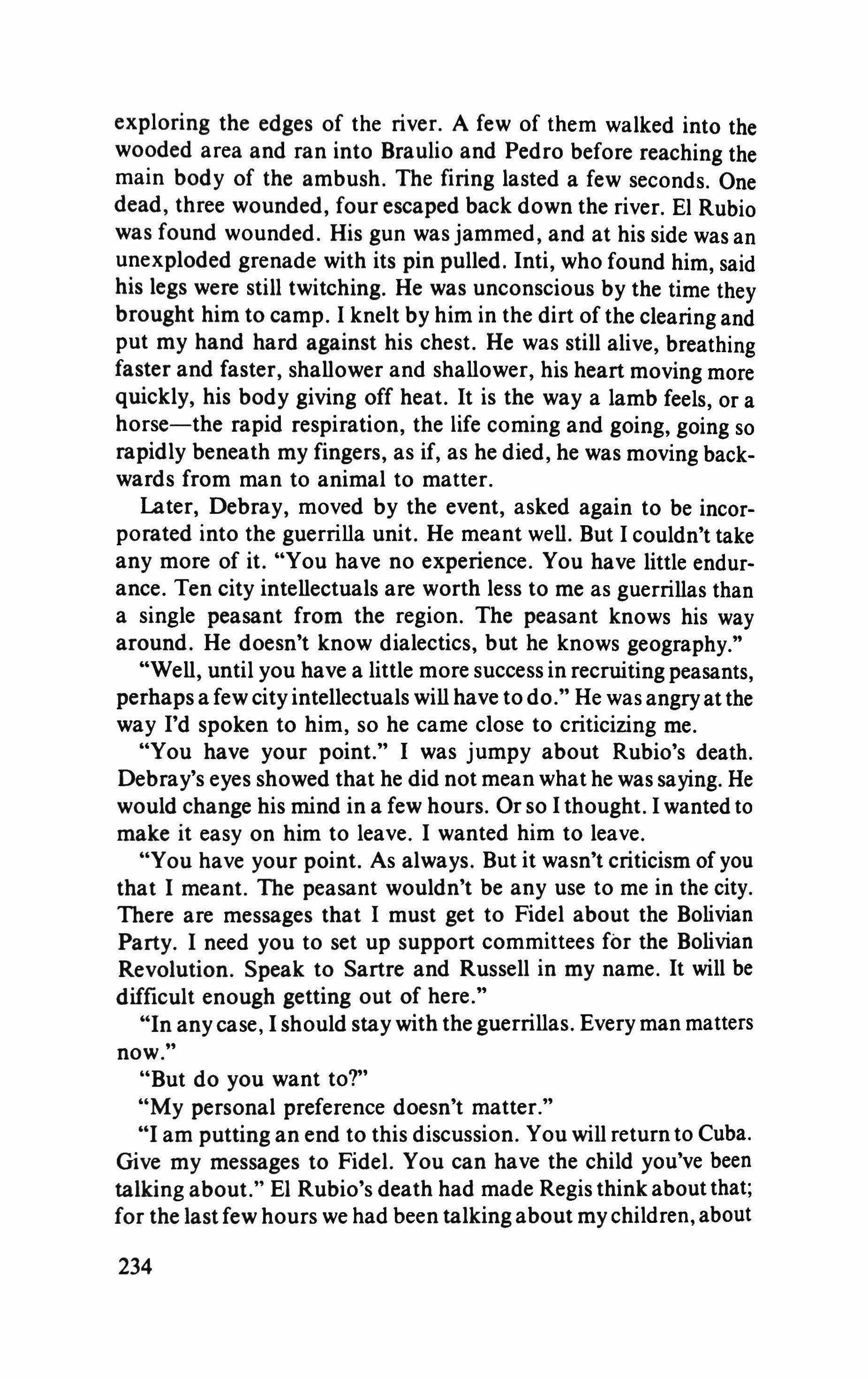
exploring the edges of the river. A few of them walked into the wooded area and ran into Braulio and Pedro before reaching the main body of the ambush. The firing lasted a few seconds. One dead, three wounded, four escaped back down the river. EI Rubio was found wounded. His gun was jammed, and at his side was an unexploded grenade with its pin pulled. Inti, who found him, said his legs were still twitching. He was unconscious by the time they brought him to camp. I knelt by him in the dirt of the clearing and put my hand hard against his chest. He was still alive, breathing faster and faster, shallower and shallower, his heart moving more quickly, his body giving off heat. It is the way a lamb feels, or a horse-the rapid respiration, the life coming and going, going so rapidly beneath my fingers, as if, as he died, he was moving backwards from man to animal to matter.
Later, Debray, moved by the event, asked again to be incorporated into the guerrilla unit. He meant well. But I couldn't take any more of it. "You have no experience. You have little endurance. Ten city intellectuals are worth less to me as guerrillas than a single peasant from the region. The peasant knows his way around. He doesn't know dialectics, but he knows geography."
"Well, until you have a little more success in recruiting peasants, perhaps a few city intellectuals will have to do." He was angry at the way I'd spoken to him, so he came close to criticizing me.
"You have your point." I was jumpy about Rubio's death. Debray's eyes showed that he did not mean what he was saying. He would change his mind in a few hours. Or so I thought. I wanted to make it easy on him to leave. I wanted him to leave.
"You have your point. As always. But it wasn't criticism of you that I meant. The peasant wouldn't be any use to me in the city. There are messages that I must get to Fidel about the Bolivian Party. I need you to set up support committees for the Bolivian Revolution. Speak to Sartre and Russell in my name. It will be difficult enough getting out of here."
"In any case, I should stay with the guerrillas. Every man matters now."
"But do you want to?"
"My personal preference doesn't matter."
"1 am putting an end to this discussion. You will return to Cuba. Give my messages to Fidel. You can have the child you've been talking about." EI Rubio's death had made Regis think about that; for the last few hours we had been talking about my children, about

his desire to become a father. "You'll make a good father. Very stem. But you'll give them clear standards to measure themselves against. Let's not talk about it anymore."
Still, there was something impressive about Regis. Each night, nervous as he was, exhausted as we all were, he would sit and go over a manuscript on the Latin American Revolution he was carrying in his knapsack, revising, getting it right.
The guerrillas move southwest, awayfrom the army, tofind a place to drop offtheir visitors, their contacts with the worldoutside the mountains.
Che leaves a group, including Tania, with Joaquin, then leads a second group south to divert the army andfind a safe town for Debray. But Iripita is now an army staging area. Che retreats and spends the next week unsuccessfullysearchingforJoaquin'sgroup. There are troops all over; they are unable to stay in the area.
They move north to Ticucha and then to El Meson. There they set up camp. A column ofsixty-five soldiers is spotted, and the guerrillas place a hasty ambush near the river. The advance element ofthe column is ledby a man with two dogs. Che shoots at the first and misses. Other guerrillasfire and the guard and dogs are killed. The rest of the column retreats, exchangingfire with the guerrillas as they move. Rolando is fatally wounded.
From Guevara'sjournal: A coded message from Havana. We taperecorded it and played it over and over to decode it. Dark news: Brizola's group in Brazil is finished. They were decimated by bubonic plague, and the few survivors were picked up by the army.
Monje has met with Fidel and announced to him his full support of the guerrillas. He has requested more money for operations in the city. Should it be given to him?
One almost has to admire his audacity. Pombo was right. I should have killed that bastard when I had the chance.
Or is he responding to news of our victory at Nancahuazu? We are still the darlings of the airwaves. It is possible that the Party is coming around. I must get a message to Fidel of our needs and how to contact us. He can oversee the Party's good faith.
At a meeting of the Tri-Continental Conference in Havana, Fidel Castro reads Che Guevara's message, from "somewhere in the Americas":

"The solidarity ofal/ the progressiveforces ofthe world toward Vietnam is similar to the bitter irony of the plebians coaxing the gladiators into the Roman arena. It is not a matter of wishing success to the victim ofaggression, but ofsharinghisfate: one must accompany him to death or victory.
"We must ask ourselves how shall rebellionflourish? We have said, for quite some time now, the struggle in our America must achieve continental proportions.
"The beginning will not be easy. The oligarchies' power of repression, all their capacity for brutality will be placed at the service of their cause. Our mission, in thefirst hour, shall be to survive. Later we shall carry out armed propaganda in the Vietnamese sense: our bullets or propaganda will be spent in battles won or lost-butfoughtI-against the enemy.
"The great lesson of the invincibility of the guerrilla will take root in the dispossessed masses. We will galvanize the national spirit. We will use hatred as an element ofthe struggle, a relentless hatred of the enemy impelling us over and beyond the natural limitations that man is heir to and transforming us into an effective, violent, cold, and selective killing machine. Our soldiers must be thus; a people without hatred cannot vanquish a brutal enemy.
"How close to a brightfuture we could be should two, or three, or many Vietnamsflourish throughout the world. Each death, each immense tragedy, each everyday act ofheroism, andeach repeated blow will impel the imperialists to disperse theirforces under the sudden attack and increasing hatred ofall thepeople ofthe world.
"Our every action is a battle cry against imperialism, a battle hymn for the people's unity against the great enemy ofmankind: the United States ofAmerica. Wherever death may surprise us let it be welcome, provided that this our battle cry may have reached some receptive ear, andanotherhand may be extended to wield our weapons, and other men ready to intone thefuneral dirge to the staccato singing of the machine guns, and new cries of war and victory."
(Prolonged applause.)
From Pombo'sjournal: We played the radios very quietly at night, deep in the forest. The glow from the dials was the onlylight. (Now is the hour of the radios ) We had to lie on the ground with our heads near the speakers to hear. Afterwards nobody said anything, anything at all.

From Camba's journal: Last night I had a dream: We were on a high mountain together, Che and myself, alone. The air was very thin at the top of the mountain. I felt woozy in my dream. There was a little crust of blood inside my nose. I touched it with my finger as he was talking and brought it out to look at. We were above the timberline. The earth was red and dry. There was snow on nearby peaks. It was very quiet, the only sound the woosh woosh wooosh of the wind moving around us. Che was pointing out the countryside to me, saying that from this mountain we could see four of the countries of the continent at war. "There's Patagonia," he said, "and that's Babylonia, and that's Folderol, and that's Pompadoodle." They were all funny names. I can't remember them exactly. "See, Camba," he said, "they're all turning red." And it was true: the ground down there was oozing blood. When he finished pointing out the different countries he said, "See, there's a hill that looks like a dinosaur, don't you think?" And he pointed to a hill that had four humps, a little egg-shaped one for the head, a big one in the middle, and two small ones on either side for feet. Suddenly we were standing in front of the hill. It was a giant green and red lizard with a man's face. The face was craggy, like a mountain, because it was a mountain, and bearded with a very wispy black beard. It wore a funny green cap. It said to Che, "You think you can eat me, young man? You want to try my tough salty meat?" It had a woman's voice, very deep, but a woman's voice. It laughed, a high-pitched trill, like the nervous major we captured. Then it swept its tail across us. The tail had sharp scales, sharp as razors. They were so sharp and moved so quickly that if they cut you, you wouldn't feel anything. I don't know how I knew this, but I knew it in my dream. I looked at Che, and his face was covered with blood. I started to scream and put my hands to my face because I wanted to know if it was covered with blood, too. But Che took my hands away from my face. He said, "Be quiet, Camba," and put his arms around me. "Don't worry, Camba," he said. I was crying, and he rocked me in his arms. It was nice being held and rocked. That's when I woke up.
I never got to feel my face and find out if there was blood on it.
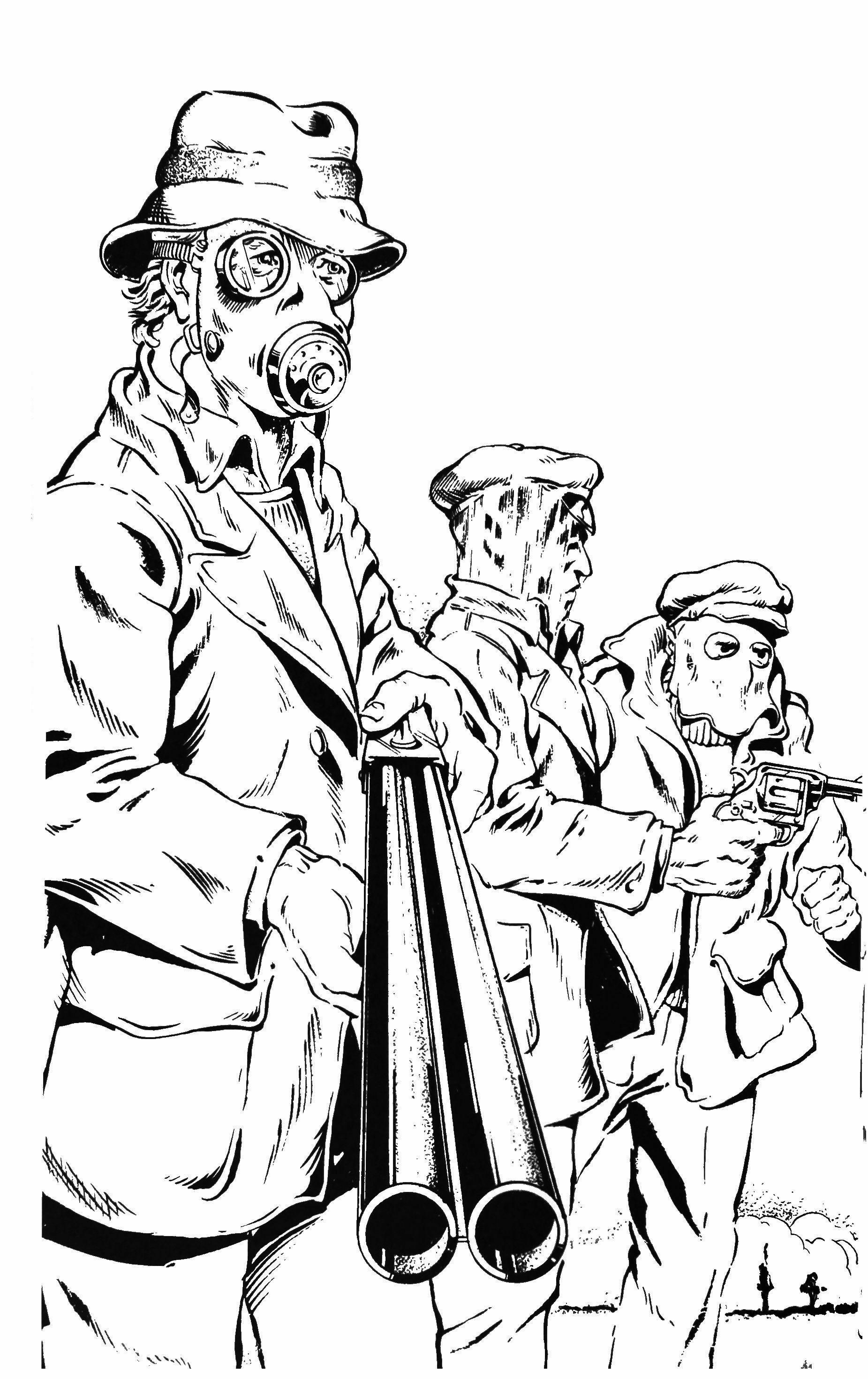
Proxopera Benedict Kiely
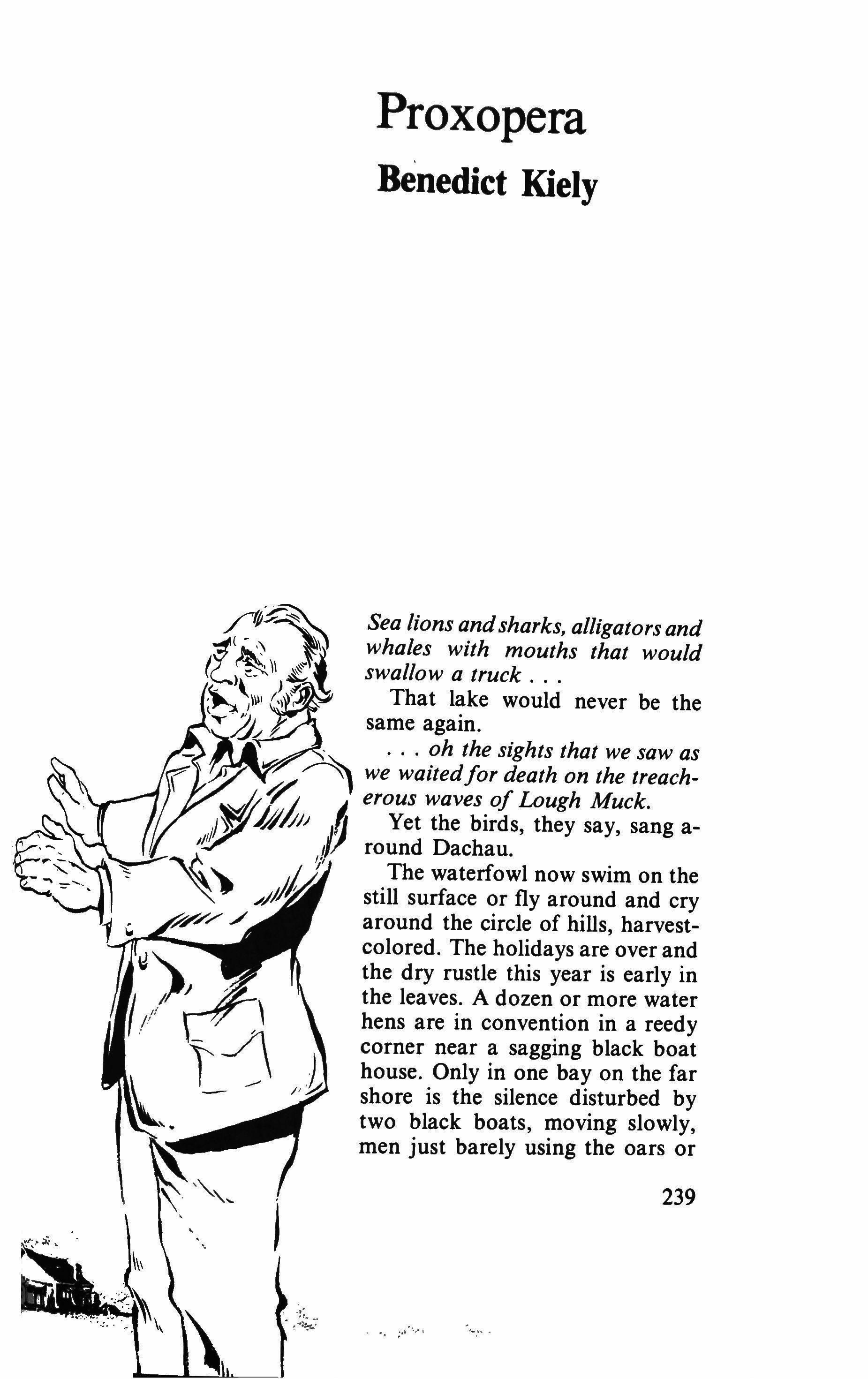
t_/1{�-�'\'£��i'
Sea lions andsharks, alligators and �� whales with mouths that would t, ) �-', \\ £. swallow a truck �\\III I� �
That lake would never be the t ;j� r. same again.
oh the sights that we saw as �) w:::i � we waitedfor death on the treach�" /h � '1 erous waves of Lough Muck ,�J/liJ) J�
Yet the birds, they say, sang a- Il!!!)" III round Dachau. ,-t """ J Ii'
The waterfowl now swim on the �. //I� still surface or fly around and cry �// ./ around the circle of hills, harvestcolored. The holidays are over and the dry rustle this year is early in the leaves. A dozen or more water hens are in convention in a reedy corner near a sagging black boat house. Only in one bay on the far shore is the silence disturbed by two black boats, moving slowly, men just barely using the oars or 239

standing up and sitting down again. The sound of voices comes faintly across the water. He says to his son: the lake will never be the same again.
- The water never knew what was happening.
I doubt that. Water may know more than we think. And grass. And old rocks. Think of all those old rocks that were around us in Donegal for the last three weeks. The lake looked as ifit knew what was happening on the day of the waterskiing.
His son's wife, who is a tall, handsome redheaded girl with slightly prominent teeth, daring breasts, and the faintest hint of an incipient double chin-very voluptuous, although he shouldn't be thinking along those lines-says that on the day ofthe waterskiing the lake was bright and dancing. On the night that thinghappened the lake was dark and still. Wouldn't that make a difference?
He pats her on the shoulder affectionately as he climbs out from the back of the car where he has been sitting with the two children and a large glassjar containing two morose crabs rudely tom away from their homes on the Donegal shore.
She is an amusing, imaginative girl.
-But no, he says, still waters run deep and all that. Water doesn't need light in order to see. Water is a sort of a god. Or at any rate a goddess. That's what people thought long ago; they called rivers after goddesses.
The lake for sure had been a goddess on the day of the waterskiing. Never had he thought that he would see on his own lake the sort of thing you saw in movies or on television: Californian or Hawaiian beaches, galloping rollers, bouncing speedboats, naked young women on surfboards, Arion on the dolphin's back, rising and falling, vanishing, reappearing throughjewels of flying spray, spirits at one moment of the air and the water, marred by no speck of sordid earth. Was it better or worse to be young now than it was, say, forty-five years ago?
For him in his boyhood that lake had always been asleep. He lived in those days in the town three miles away. The walk from the town to the lake switchbacked over rolling farmland, root crops and oats, heavy black soil, solid square slated farmhouses, a wellplanted Presbyterian countryside. After the first mile it was the custom for himself and his comrades to slither down an embankment where the road crossed the railway to the west and the ocean, to walk a hundred yards into a dank rock-cutting, to drink there
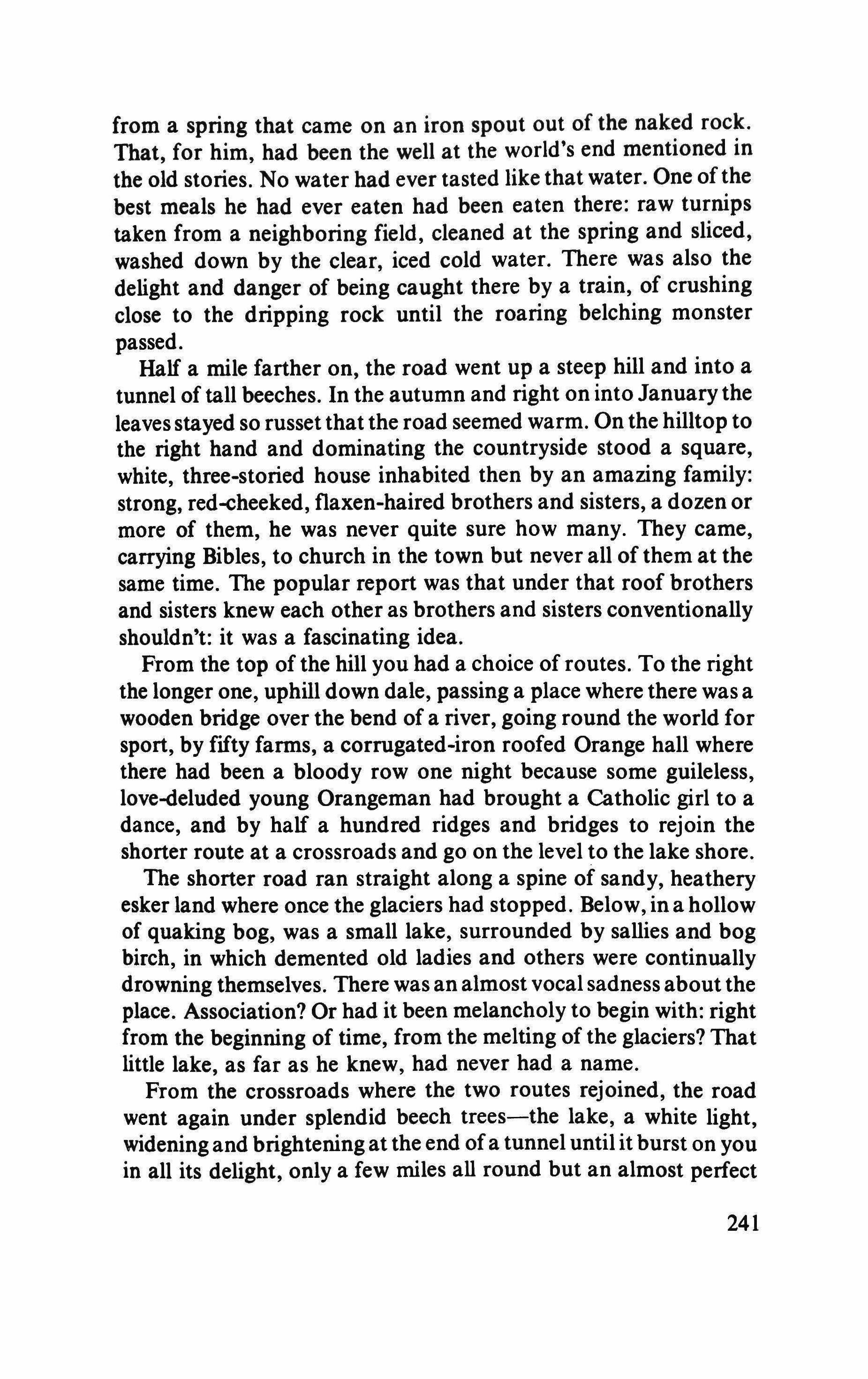
from a spring that came on an iron spout out of the naked rock. That, for him, had been the well at the world's end mentioned in the old stories. No water had ever tasted like that water. One ofthe best meals he had ever eaten had been eaten there: raw turnips taken from a neighboring field, cleaned at the spring and sliced, washed down by the clear, iced cold water. There was also the delight and danger of being caught there by a train, of crushing close to the dripping rock until the roaring belching monster passed.
Half a mile farther on, the road went up a steep hill and into a tunnel of tall beeches. In the autumn and right on into January the leaves stayed so russet that the road seemed warm. On the hilltop to the right hand and dominating the countryside stood a square, white, three-storied house inhabited then by an amazing family: strong, red-cheeked, flaxen-haired brothers and sisters, a dozen or more of them, he was never quite sure how many. They came, carrying Bibles, to church in the town but never all of them at the same time. The popular report was that under that roof brothers and sisters knew each other as brothers and sisters conventionally shouldn't: it was a fascinating idea.
From the top of the hill you had a choice of routes. To the right the longer one, uphill down dale, passing a place where there was a wooden bridge over the bend of a river, going round the world for sport, by fifty farms, a corrugated-iron roofed Orange hall where there had been a bloody row one night because some guileless, love-deluded young Orangeman had brought a Catholic girl to a dance, and by half a hundred ridges and bridges to rejoin the shorter route at a crossroads and go on the level to the lake shore.
The shorter road ran straight along a spine of sandy, heathery esker land where once the glaciers had stopped. Below, in a hollow of quaking bog, was a small lake, surrounded by sallies and bog birch, in which demented old ladies and others were continually drowning themselves. There was an almost vocal sadness about the place. Association? Or had it been melancholy to begin with: right from the beginning of time, from the melting of the glaciers? That little lake, as far as he knew, had never had a name.
From the crossroads where the two routes rejoined, the road went again under splendid beech trees-the lake, a white light, widening and brightening at the end of a tunnel until it burst on you in all its delight, only a few miles all round but an almost perfect

oval, a black boat house to the right and boats dancing attendance in a semicircle in front of it, a half mile around the gravelly lakeshore road the bright red timber of thejetty and diving boards at the swimming club.
These dark days the swimming club didn't function any more. The waterskiing had been a heroic attempt to give that sort of life back to the lake. The last attempt? The lake would never be the same again.
The murmur of voices still comes across the water from the men searching and searching in a bay among the reeds, in a bay that had been the best place of all for perch on those long-lost sunny days.
July was the best month for perch and the best day was the twelfth. It was folklore that the Orangemenalways got a sunnyday for their procession ofbands and banners in honor of King William of Orange and the Battle ofthe Boyne. Up to the age oftwelve or so the band and the banners were what the Americans called fun things: fifes and pipes and brass and melodeons, kettledrums, big drums, and giant drums beaten-merely to make a rolling rhythmical bedlam that might bring down rain on the Sahara-with bamboo canes by sweating, coatless men with bleeding knuckles. Often it took two men to carry one of those drums: one fore, the actual drummer (naturally) aft. The best drummer was the man who smashed the most canes, even the most hides. Odd as the jungle it all was, bongo, bongo, bongo, I don't want to leave the Congo! but what the hell? The marching men wore colored sashes. On the silken picture-banners King William on a white horse went splashing across the Boyne, or Queen Victoria sat on a throne and handed a Bible to a kneeling negress and the legend said: The secret of England's greatness.
Then, after twelve or so you began to think, and the thing wasn't funny any more, wasn't just parade and pantomime, and the giant drums were actuallysaying something. Like To Hellwith the Pope, Crappies lie down, We'll kick ten thousand Papishes right over Dolly's Brae, Siewter, slaughter, holy water, harry the Papishes everyone, drive them under and cut them asunder, the Protestant boys will carry the drum.
What it was all about was hate, which, as always, bred hate, and suddenly you were sick of the town on that day and the lake was paradise.
Like the Orangemen, the perch shoaled and were lively in the
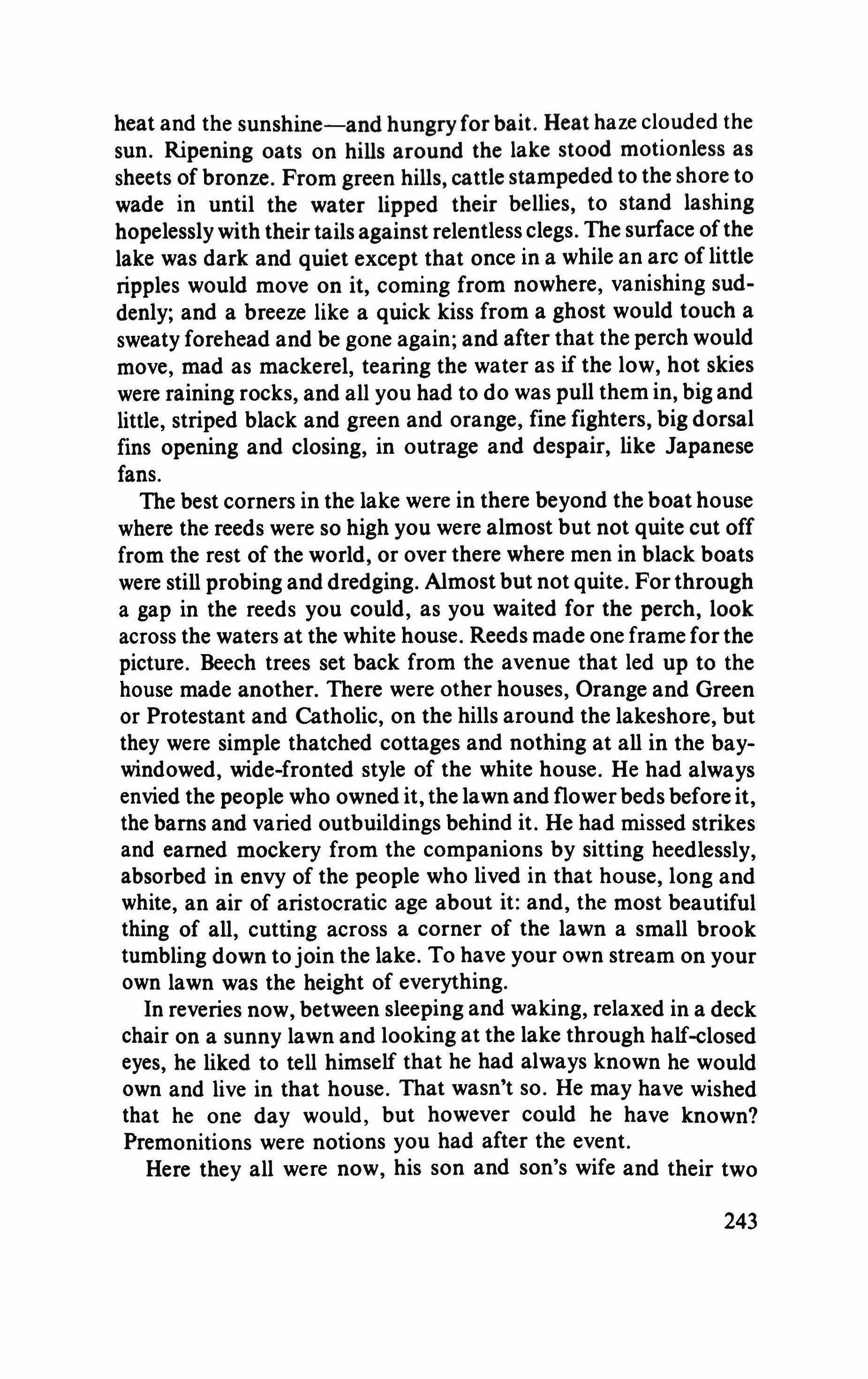
heat and the sunshine-and hungry for bait. Heat haze clouded the sun. Ripening oats on hills around the lake stood motionless as sheets of bronze. From green hills, cattle stampeded to the shore to wade in until the water lipped their bellies, to stand lashing hopelessly with their tails against relentless clegs. The surface ofthe lake was dark and quiet except that once in a while an arc of little ripples would move on it, coming from nowhere, vanishing suddenly; and a breeze like a quick kiss from a ghost would touch a sweaty forehead and be gone again; and after that the perch would move, mad as mackerel, tearing the water as if the low, hot skies were raining rocks, and all you had to do was pull them in, big and little, striped black and green and orange, fine fighters, big dorsal fins opening and closing, in outrage and despair, like Japanese fans.
The best corners in the lake were in there beyond the boat house where the reeds were so high you were almost but not quite cut off from the rest of the world, or over there where men in black boats were still probing and dredging. Almost but not quite. For through a gap in the reeds you could, as you waited for the perch, look across the waters at the white house. Reeds made one frame for the picture. Beech trees set back from the avenue that led up to the house made another. There were other houses, Orange and Green or Protestant and Catholic, on the hills around the lakeshore, but they were simple thatched cottages and nothing at all in the baywindowed, wide-fronted style of the white house. He had always envied the people who owned it, the lawn and flowerbeds before it, the barns and varied outbuildings behind it. He had missed strikes and earned mockery from the companions by sitting heedlessly, absorbed in envy of the people who lived in that house, long and white, an air of aristocratic age about it: and, the most beautiful thing of all, cutting across a corner of the lawn a small brook tumbling down to join the lake. To have your own stream on your own lawn was the height of everything.
In reveries now, between sleeping and waking, relaxed in a deck chair on a sunny lawn and looking at the lake through half-closed eyes, he liked to tell himself that he had always known he would own and live in that house. That wasn't so. He may have wished that he one day would, but however could he have known? Premonitions were notions you had after the event.
Here they all were now, his son and son's wife and their two
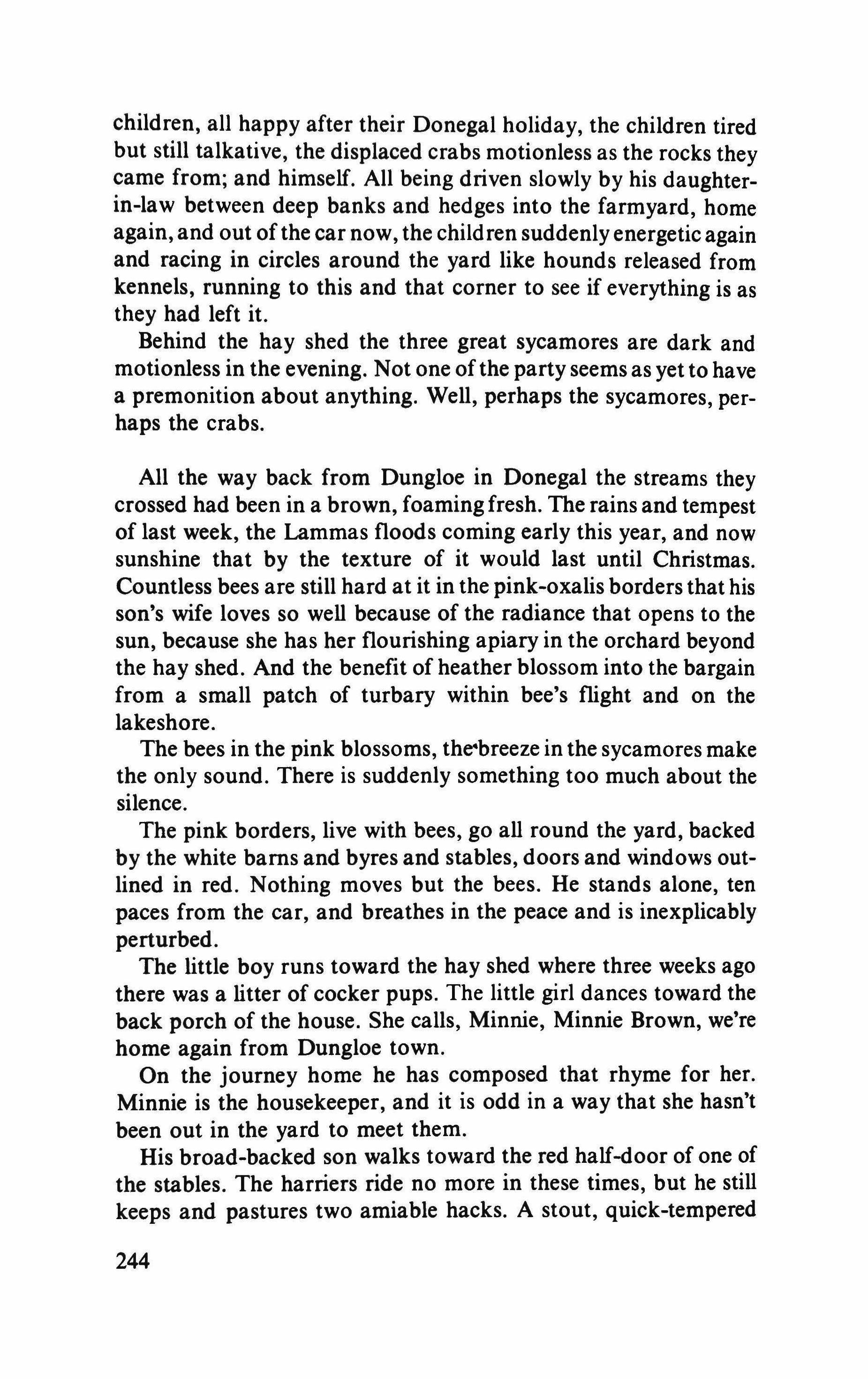
children, all happy after their Donegal holiday, the children tired but still talkative, the displaced crabs motionless as the rocks they came from; and himself. All being driven slowly by his daughterin-law between deep banks and hedges into the farmyard, home again, and out ofthe car now, the child ren suddenlyenergeticagain and racing in circles around the yard like hounds released from kennels, running to this and that corner to see if everything is as they had left it.
Behind the hay shed the three great sycamores are dark and motionless in the evening. Not one ofthe party seems as yet to have a premonition about anything. Well, perhaps the sycamores, perhaps the crabs.
All the way back from Dungloe in Donegal the streams they crossed had been in a brown, foamingfresh. The rains and tempest of last week, the Lammas floods coming early this year, and now sunshine that by the texture of it would last until Christmas. Countless bees are still hard at it in the pink-oxalis borders that his son's wife loves so well because of the radiance that opens to the sun, because she has her flourishing apiary in the orchard beyond the hay shed. And the benefit of heather blossom into the bargain from a small patch of turbary within bee's flight and on the lakeshore.
The bees in the pink blossoms, the-breeze in the sycamores make the only sound. There is suddenly something too much about the silence.
The pink borders, live with bees, go all round the yard, backed by the white barns and byres and stables, doors and windows outlined in red. Nothing moves but the bees. He stands alone, ten paces from the car, and breathes in the peace and is inexplicably perturbed.
The little boy runs toward the hay shed where three weeks ago there was a litter of cocker pups. The little girl dances toward the back porch of the house. She calls, Minnie, Minnie Brown, we're home again from Dungloe town.
On the journey home he has composed that rhyme for her. Minnie is the housekeeper, and it is odd in a way that she hasn't been out in the yard to meet them.
His broad-backed son walks toward the red half-door of one of the stables. The harriers ride no more in these times, but he still keeps and pastures two amiable hacks. A stout, quick-tempered
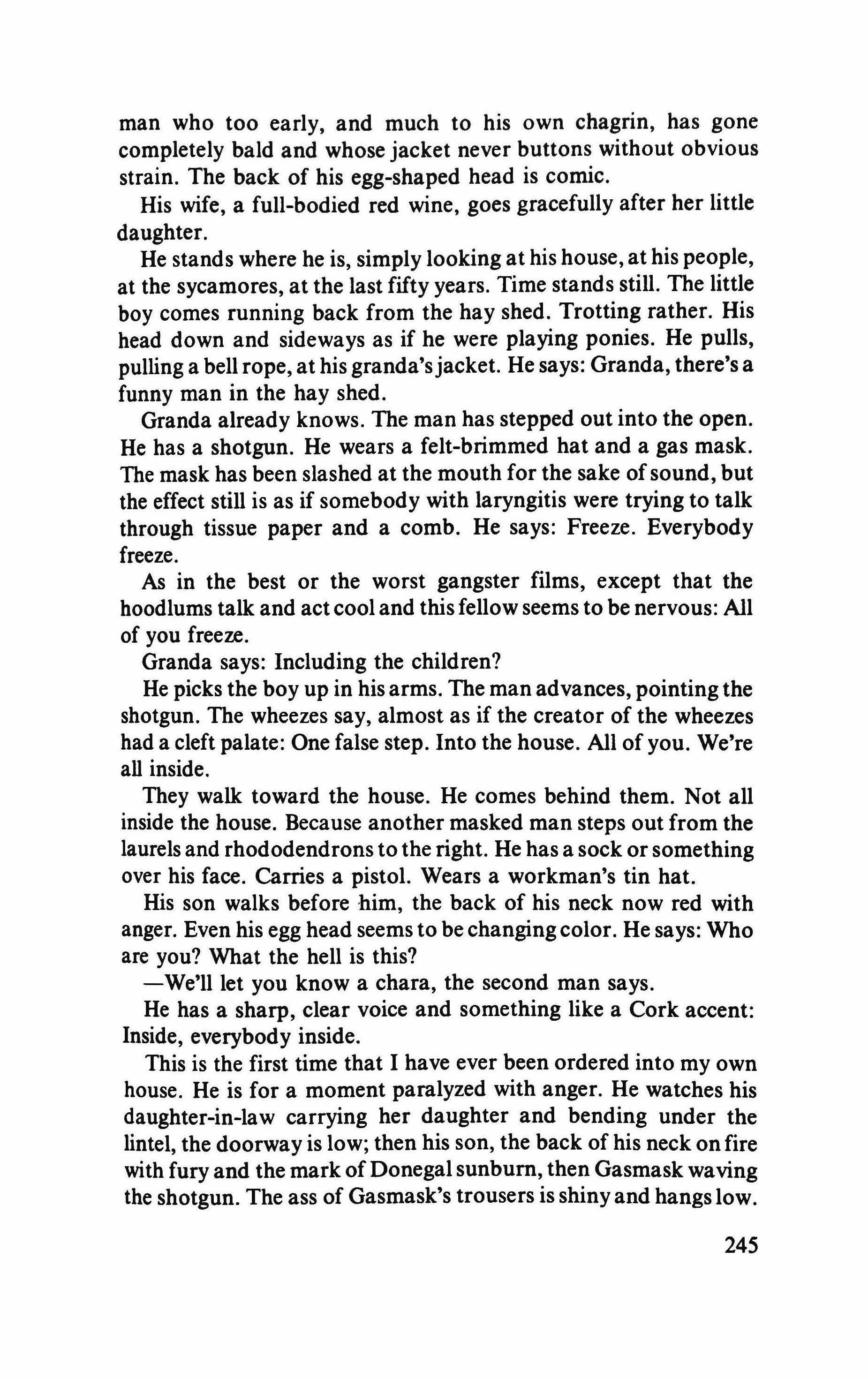
man who too early, and much to his own chagrin, has gone completely bald and whose jacket never buttons without obvious strain. The back of his egg-shaped head is comic.
His wife, a full-bodied red wine, goes gracefully after her little daughter.
He stands where he is, simply looking at his house, at his people, at the sycamores, at the last fifty years. Time stands still. The little boy comes running back from the hay shed. Trotting rather. His head down and sideways as if he were playing ponies. He pulls, pulling a bell rope, at his granda'sjacket, He says: Granda, there's a funny man in the hay shed.
Granda already knows. The man has stepped out into the open. He has a shotgun. He wears a felt-brimmed hat and a gas mask. The mask has been slashed at the mouth for the sake ofsound, but the effect still is as if somebody with laryngitis were trying to talk through tissue paper and a comb. He says: Freeze. Everybody freeze.
As in the best or the worst gangster films, except that the hoodlums talk and act cool and this fellow seems to be nervous: All of you freeze.
Granda says: Including the children?
He picks the boy up in his arms. The man advances, pointing the shotgun. The wheezes say, almost as if the creator of the wheezes had a cleft palate: One false step. Into the house. All of you. We're all inside.
They walk toward the house. He comes behind them. Not all inside the house. Because another masked man steps out from the laurels and rhododendrons to the right. He has a sock or something over his face. Carries a pistol. Wears a workman's tin hat.
His son walks before him, the back of his neck now red with anger. Even his egg head seems to be changing color. He says: Who are you? What the hell is this?
-We'll let you know a chara, the second man says.
He has a sharp, clear voice and something like a Cork accent: Inside, everybody inside.
This is the first time that I have ever been ordered into my own house. He is for a moment paralyzed with anger. He watches his daughter-in-law carrying her daughter and bending under the lintel, the doorway is low; then his son, the back of his neck on fire with fury and the mark ofDonegalsunburn, then Gasmask waving the shotgun. The ass of Gasmask's trousers is shiny and hangs low.
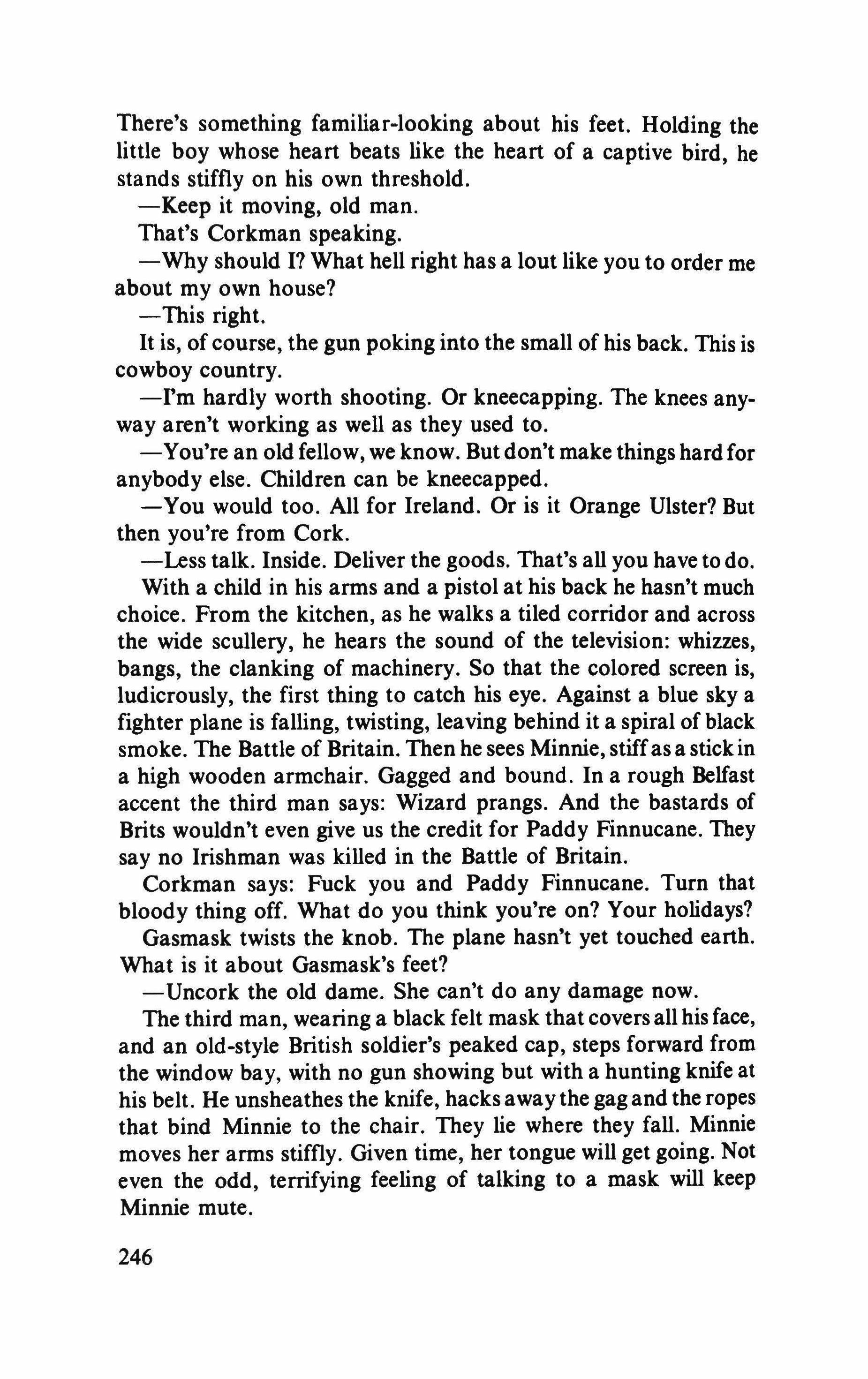
There's something familiar-looking about his feet. Holding the little boy whose heart beats like the heart of a captive bird, he stands stiffly on his own threshold.
-Keep it moving, old man. That's Corkman speaking.
- Why should I? What hell right has a lout like you to order me about my own house?
-This right.
It is, of course, the gun poking into the small of his back. This is cowboy country.
-rm hardly worth shooting. Or kneecapping. The knees anyway aren't working as well as they used to.
- You're an old fellow, we know. But don't make things hard for anybody else. Children can be kneecapped.
- You would too. All for Ireland. Or is it Orange Ulster? But then you're from Cork.
- Less talk. Inside. Deliver the goods. That's all you have to do. With a child in his arms and a pistol at his back he hasn't much choice. From the kitchen, as he walks a tiled corridor and across the wide scullery, he hears the sound of the television: whizzes, bangs, the clanking of machinery. So that the colored screen is, ludicrously, the first thing to catch his eye. Against a blue sky a fighter plane is falling, twisting, leaving behind it a spiral of black smoke. The Battle of Britain. Then he sees Minnie, stiffas a stickin a high wooden armchair. Gagged and bound. In a rough Belfast accent the third man says: Wizard prangs. And the bastards of Brits wouldn't even give us the credit for Paddy Finnucane. They say no Irishman was killed in the Battle of Britain.
Corkman says: Fuck you and Paddy Finnucane. Turn that bloody thing off. What do you think you're on? Your holidays?
Gasmask twists the knob. The plane hasn't yet touched earth. What is it about Gasmask's feet?
-Uncork the old dame. She can't do any damage now.
The third man, wearing a black felt mask that covers all his face, and an old-style British soldier's peaked cap, steps forward from the window bay, with no gun showing but with a hunting knife at his belt. He unsheathes the knife, hacks away the gag and the ropes that bind Minnie to the chair. They lie where they fall. Minnie moves her arms stiffly. Given time, her tongue will get going. Not even the odd, terrifying feeling of talking to a mask will keep Minnie mute.
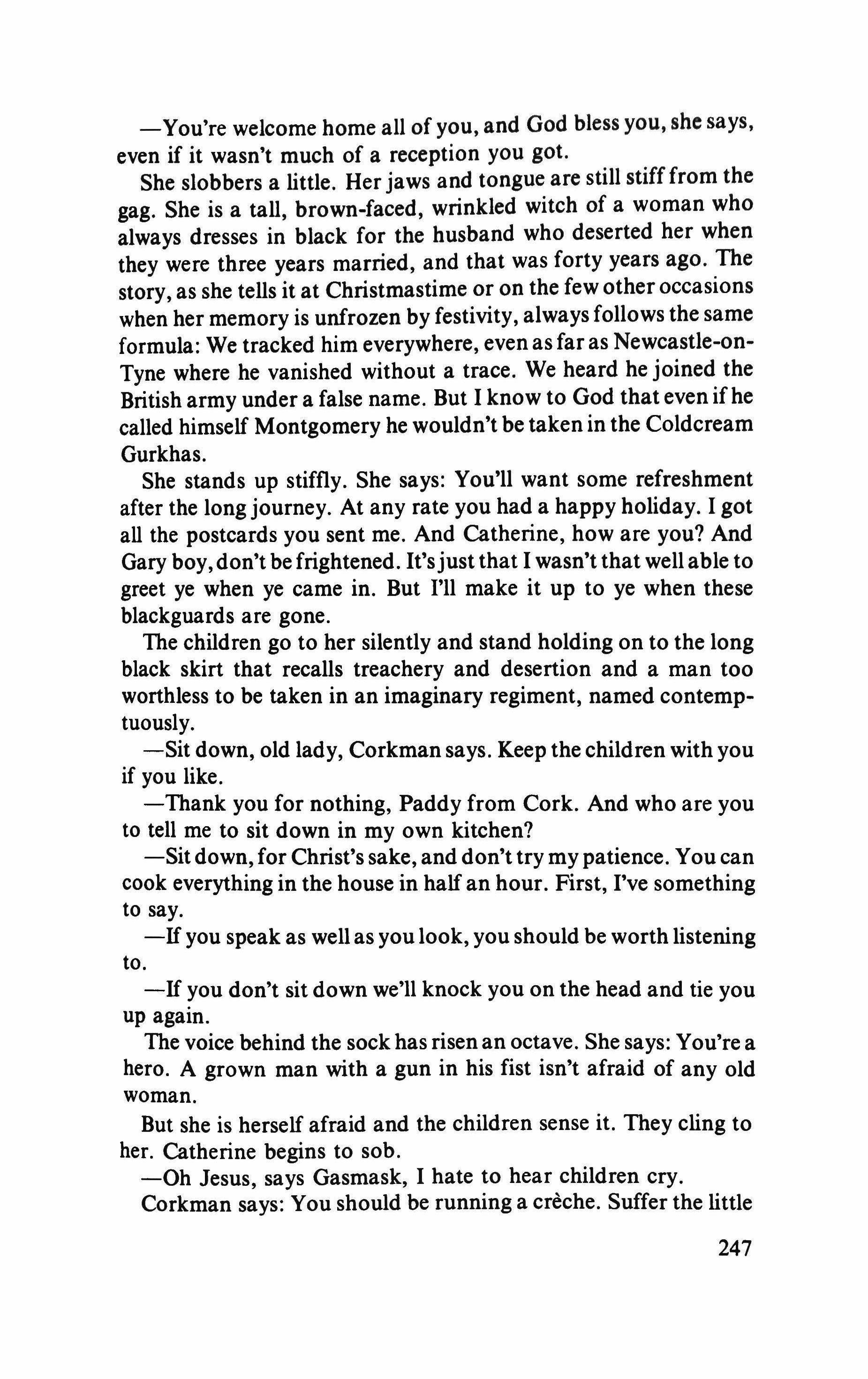
- You're welcome home all of you, and God bless you, she says, even if it wasn't much of a reception you got.
She slobbers a little. Her jaws and tongue are still stifffrom the gag. She is a tall, brown-faced, wrinkled witch of a woman who always dresses in black for the husband who deserted her when they were three years married, and that was forty years ago. The story, as she tells it at Christmastime or on the few other occasions when her memory is unfrozen by festivity, always follows the same formula: We tracked him everywhere, even as far as Newcastle-onTyne where he vanished without a trace. We heard he joined the British army under a false name. But I know to God that even ifhe called himself Montgomery he wouldn't be taken in the Coldcream Gurkhas.
She stands up stiffly. She says: You'll want some refreshment after the longjourney. At any rate you had a happy holiday. I got all the postcards you sent me. And Catherine, how are you? And Gary boy, don't be frightened. It'sjust that I wasn't that well able to greet ye when ye came in. But I'll make it up to ye when these blackguards are gone.
The children go to her silently and stand holding on to the long black skirt that recalls treachery and desertion and a man too worthless to be taken in an imaginary regiment, named contemptuously.
-Sit down, old lady, Corkman says. Keep the children with you if you like.
- Thank you for nothing, Paddy from Cork. And who are you to tell me to sit down in my own kitchen?
-Sit down, for Christ's sake, and don't try my patience. You can cook everything in the house in half an hour. First, I've something to say.
-If you speak as well as you look, you should be worth listening to.
-If you don't sit down we'll knock you on the head and tie you up again.
The voice behind the sock has risen an octave. She says: You're a hero. A grown man with a gun in his fist isn't afraid of any old woman.
But she is herself afraid and the children sense it. They cling to her. Catherine begins to sob.
-Oh Jesus, says Gasmask, I hate to hear children cry.
Corkman says: You should be running a creche. Suffer the little

children. Sit down, you old hag, while your kneecaps still allow you to bend your knees.
- Wait a minute, his son says.
And takes a step forward. But Corkman tilts the pistol upward and there is a silence broken only by the little girl's sobs; and that seems to last for a long time until Corkman laughs, a rich, hearty, surprisingly good-natured laugh. He says: There's many a fat farmer whose heart would break in two if he could see the townland that we are riding to. Dear gracious old lady, would you for the last time, and for the love and honor of Almighty God, sit down and shut up and keep the children quiet?
She's frightened, more by the masks, he'd say, than by any horrors that she, at her age and coming out of another time, can readily imagine. Even though she reads the papers every day and clucks her tongue and says Sacred Heart of Jesus over outrage after outrage, she has not yet fully realized the nature of the deeds now being done-for Ireland or what they call Ulster. Masks and queer faces and painted devils she can understand and she knows that they are evil: Lucifer looked like that once upon a time, with the addition of horns and tail and a cow's foot. Yet, frightened or not, she does not give up easily: I'll sit down when Mr. Binchey asks me to sit down. Either ofthem. They are the masters in this house. And gentlemen into the bargain.
Under the sock Corkman hisses like a serpent. Binchey senior realizes with guilt that he has been enjoying, or at least studying, this struggle of wills between an old woman and a madman in a mask. Bincheyjunior, isolated and furious and helpless where the pistol has halted him in the middle ofthe floor, says hoarsely and so unexpectedly that it sounds like a startled shout: Sit down, Minnie. We'll hear what the man has to say.
The hissing ceases. It has been a most deliberate performance. Corkman says: Well said, Mr. Binchey Two. Ex ore infantium or out of the mouths of babes and sucklings. Thanks for consenting to listen. I don't want to be forced to show you who for the moment is master in this house. But I want you two men to listen carefully. If everybody plays ball, nobody will get hurt.
The children, silent again, are together between Minnie's long legs, faces to her midriff like frightened sheep at a fair.
- Ifthe three ofyou would sit together on that couch for the sake of concentration like, we could get down to business. What time is it now?

Gasmask tells him. He pulls a chair close to the couch and sits looking at an angle at fatherand son and the woman between them. He says: We'll have a wait, but it can't be helped. The stuffisn't here yet. We can't move until light, tomorrow morning, when the good people are going to Sunday mass.
- What in hell do you mean? You're telling us nothing. That was Binchey Two.
- Patience, brother. I'll explain. I want Binchey One here to do a little milk delivery. To one oftwo spots in the town. He'll even have a choice. This is a free democratic society.
-My father-in-law, she says, can't drive any more.
Binchey Two says: I'll do it.
Corkman is hissingagain, steam escaping. What sort of a mind is in there behind the sock?
-Jesus, give us credit for some savvy. We know you're suspended for dangerous and drunken driving. The first Royal Ulster cunt of a constable that saw you would pull you in. The town wouldn't get its milk delivery.
-It's a proxy bomb.
-How bright you are, fat farmer.
-Mraid to do your own dirty work.
-Stuff it. Too many pigs spoil the breath. They say that when you were in college you used to go to the cattle market in the morning to get dung on your boots to let the world know you were doing agriculture.
Soldier's Cap, who sits straddle on a chair, his back to the low bay window, the light fading through the bloodred leaves of Virginia creeper, and who is honing his hunting knife on the heel of his hand, laughs hoarsely. Gasmask stands by the door, butt ofhis shotgun grounded, at attention almost, a soldier of the Republic. What the hell is it about his feet? Gasmask says nothing. Binchey Two is very red in the face and in the bald head: The smell was better in the cattle market, and that goes for you. Put down the gun and step outside and we'll see how much pigshit you contain.
-Easy, easy, fat man. We're here on business.
-Keep it that way.
Minnie whoops and cackles: It was a fair gentleman's challenge. The hissing must make the sock uncomfortablydamp. Gasmask shifts his feet and gun butt; behind the mask he could be alarmed. The woman says: Take it easy, everybody. My father-in-law has been forbidden to drive. He has a heart condition.

-The police don't know that.
- He could drop at the wheel.
-He can drive carefully. Lady. we all have heart conditions. Binchey senior says that nowadays a man is lucky to have any sort of a condition, or a heart to tick or a knee to bend: What do you want me to drive and where?
-You'll do it.
-I don't have much choice.
- You're a reasonable man.
- 1 wouldn't count on it.
The woman says: The people will wonder ifthey see him driving.
-They will like fuck, Soldier's Cap says. They'lljust think he's so mean he can't keep his hands off the wheel.
Again the coarse laugh. He has a gravelly, recognizable voice. With the exception of Corkman these are local people, for Gasmask's feet are as familiar as fire irons. Soldier's Cap knows that he still has an interest in the hackney-car business that his father, who was also a saddler, founded. Corkman walks slowly, blowing into his pistol, to where Soldier's Cap sits straddled in the bay of the window. They wait uneasily for blows and discipline. The children have not moved. Minnie murmurs to them and strokes their heads. Corkman stoops and whispers, hissing, and Soldier'S Capleaps up as if he had been electrocuted, sheathes the hunting knife, stands rigid as a guardsman. The last light is dying behind the red creepers. Binchey Two sullenly repeats to Corkman: 1 can easilydo the driving. Who'll stop me on a Sunday morning?
- Your license is suspended.
-Like you don't want to do anything illegal. My father has bad sight as well as a weak heart.
-He can drive slow and wear his glasses. Look, farmer boy, we've been over this.
The woman says: I drove back from Donegal.
-Lady, we can't send a woman out with the goods.
-Chivalry, says Binchey One.
-Dear Christ, Corkman hisses, we have enough to do fighting the Brits without listening to your bullshit.
-Fight the Brits, says Binchey Two, to the last Catholic shop in the village of Belleek or the town of Strabane. Man, you love the Brits, you couldn't exist without them. The nickname is affectionate. They give you the chance to be Irish heroes. Theygive you targets you can easily see.
250

In a low strained voice, controlling hysteria, the woman says: Stop it, all of you. Let's get this over with. There are the children.
-Sense, lady, says Corkman. I could do biz with you.
Before her man can again explode, she says: The occasion won't arise. But tell us, for God's sake, what the drill is.
-Simple. Sometime during the night a creamery can will be delivered here. All you have to do is drive it into the town and leave it in one of two places.
- What happens to the car?
-You're well insured, farmer boy.
Soldier's Cap says: Commandeered by the freedom fighters. But the silence that Corkman allows to settle for a while after that remark indicates to Soldier's Cap that his words are unwanted.
-Suppose, says Binchey One, that we all refuse to do it.
- You won't. There are children. And the women. We don't want to be rough.
There's an even longer silence and then Minnie's voice, low and hoarse: Harm a hair on their heads and I'll pray prayers on you and yours.
-Jesus, Gasmask says.
But Corkman tells the old woman to be quiet: Pray not for me nor on me but for yourselves and for your children.
-You mock God's words, Minnie says.
-Jesus, Gasmask says, I don't like this.
He shuffles uneasily from one familiar foot to another.
-It'll be a nice quiet time, says Corkman. But plenty people on the roads going to Mass and meeting. The Brits and the R. U. cunts will be keeping a low profile. Put the children to bed, old woman. You (he means Soldier's Cap) go with her and keep your big mouth shut. One place is the entryway between the town hall and the post office. But if the security there is too tight, the next best place is the avenue between Judge Flynn's house and the golf club. Very close to thejudge. We have the women and the children and your fine, fat son. Remember that.
-I'll remember. I'll remember it for a long time.
-No threats, old man. You're in no fucking position.
-Judge Flynn is one of the best men in the north.
- The more reason he shouldn't be where he is. He lends credit to the system.
Soldier's Cap, who has returned, ventures to say that Judge Flynn is a tool of imperialism. No comment from Corkman.
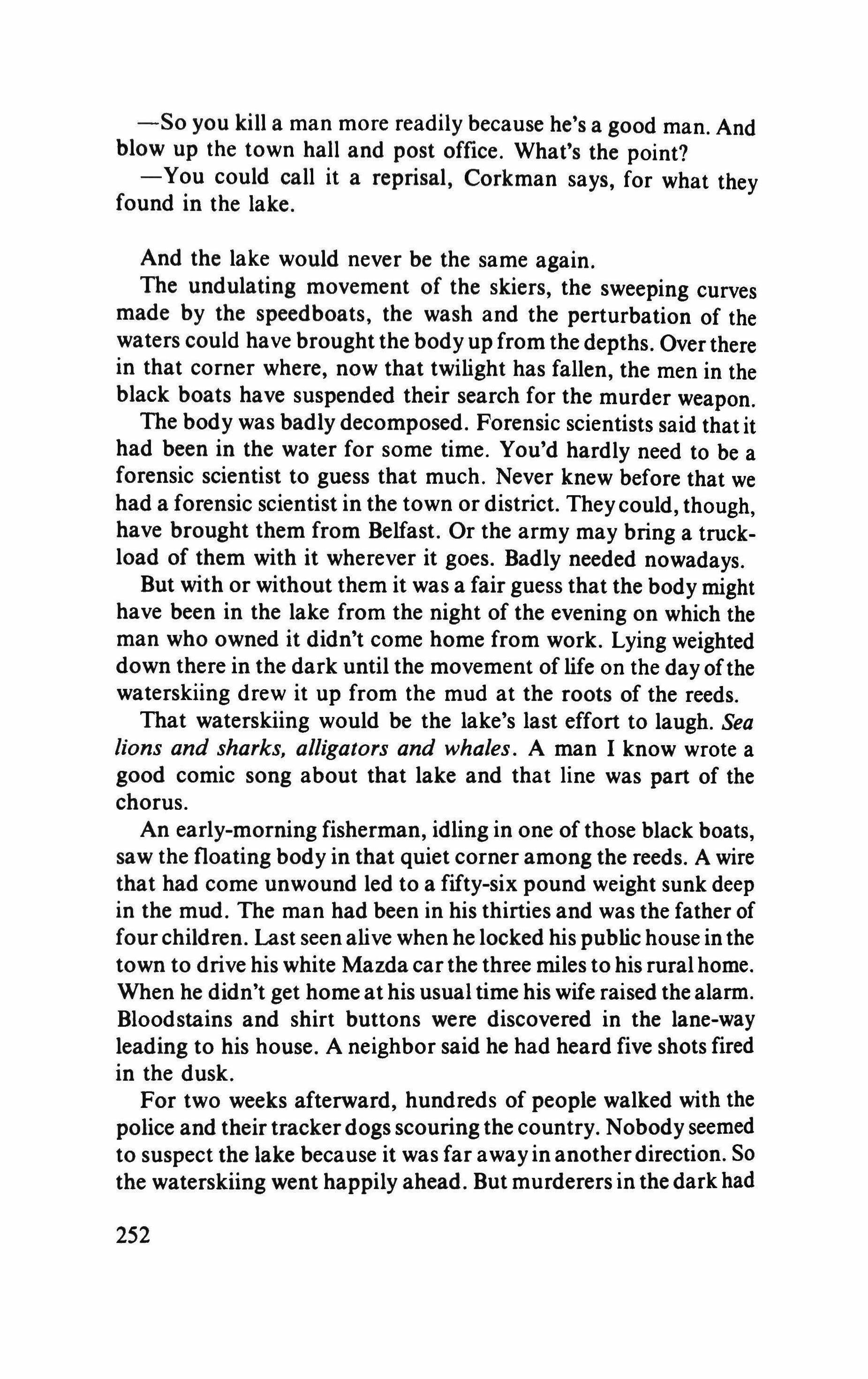
-So you kill a man more readily because he's a good man. And blow up the town hall and post office. What's the point?
-You could call it a reprisal, Corkman says, for what they found in the lake.
And the lake would never be the same again.
The undulating movement of the skiers, the sweeping curves made by the speedboats, the wash and the perturbation of the waters could have brought the body up from the depths. Over there in that corner where, now that twilight has fallen, the men in the black boats have suspended their search for the murder weapon.
The body was badly decomposed. Forensic scientists said that it had been in the water for some time. You'd hardly need to be a forensic scientist to guess that much. Never knew before that we had a forensic scientist in the town or district. Theycould, though, have brought them from Belfast. Or the army may bring a truckload of them with it wherever it goes. Badly needed nowadays.
But with or without them it was a fair guess that the body might have been in the lake from the night of the evening on which the man who owned it didn't come home from work. Lying weighted down there in the dark until the movement of life on the day ofthe waterskiing drew it up from the mud at the roots of the reeds.
That waterskiing would be the lake's last effort to laugh. Sea lions and sharks, alligators and whales. A man I know wrote a good comic song about that lake and that line was part of the chorus.
An early-morning fisherman, idling in one of those black boats, saw the floating body in that quiet corner among the reeds. A wire that had come unwound led to a fifty-six pound weight sunk deep in the mud. The man had been in his thirties and was the father of four children. Last seen alive when he locked his public house in the town to drive his white Mazda car the three miles to his rural home. When he didn't get home at his usual time his wife raised the alarm. Bloodstains and shirt buttons were discovered in the lane-way leading to his house. A neighbor said he had heard five shots fired in the dusk.
For two weeks afterward, hundreds of people walked with the police and their tracker dogsscouring the country. Nobody seemed to suspect the lake because it was far awayin anotherdirection. So the waterskiing went happily ahead. But murderers in the dark had

made the sleeping lake their accomplice. The innocent lake had been forced to share the guilt. The lake, out there and fading into another dusk, the lake knew. It could never be the same again.
Corkman is speaking: They killed him because some of us used his pub. He wasn't one of us. But he was with us. We'll get them.
-They say ye shot him because he spoke against murder gangs at a town council meeting.
-Mind your manners, old man.
-Manners, says Binchey Two.
-Anyway, it's a fucking lie. We'll get them.
-You'll get who, Binchey One asks. The town hall? The post office? Judge Flynn who sure as God had nothing to do with it?
-We'll show them we're active. That we can plant bombs where we like.
-Big deal. When my father does it for you.
-Stuff it, farmer.
His hand, a long, bony, pale hand, has tightened on the pistol. It could also be a damp hand.
The women and children have been locked into Minnie's basement bedroom. They have been told that their men's lives depend on their conduct. But as an extra precaution Soldier's Cap has been ordered outside to watch the bedroom window, to watch the world around them. He clearly doesn't like the detail, but he goes. The dishonored lake lies uneasily in the darkness: Oh the sights that we saw as we waitedfor death on the treacherous waves of Lough Muck.
Binchey One says: Judge Flynn stands for justice and peace.
-Old man, for an old man who was a famous teacher you've no head on your shoulders. They'll blame the people who put the body in the lake. Who wants peace?
-Logic, says Binchey Two. We. They. Them. Us. Who, in Christ's name, is who? Everybody wants peace except the madmen.
-Big words, farmer boy. We're not dealing with logicians. Let me tell you a story.
Seated on a chair by the door that leads to the night outside, and the lake and the town, Gasmask crosses his legs and, dear God, I know now what's familiar about his feet, his father's feet, poor civil shambling sod. In the corner on the floor behind him there's a child's tricycle, red with green wheels, and a doll's pram, the doll

sitting upright and staring, lonely for three weeks while her playmate was in Donegal, still lonely, and surprised that no hugs and kisses have come her way for the homecoming.
- The little girl, he says, may need her doll.
-See to it, Corkman says.
And Gasmask stands up on his father's awkward feet and, with his shotgun trailing, wheels the pram out the other door and along the corridor to Minnie's room. The severed ropes and gag still lie where they fell. What has happened to the two crabs in thejar? The dead have peace but they don't know it.
- Let me tell both of you a story to show you the sort of animals we're dealing with.
Binchey Two says: Public relations. Corkman ignores him. He tells his story.
-There were three U.V.F. men came over from the murder triangle by Portadown to kill a Catholic in Newtownstewart. Two hit men and one man to finger the subject. When theygotthere, the man's away in Dublin. They go into a pub in Newtownsteward and start to drink. Then the fingerman says he knows another Papish who would be better dead. They set out to get him. But he has emigrated to Canada. Feeling very bad, they go back to the pub in Newtownstewart. On the way home, well drunk, they stop in Gortin Gap for a piss and the gunmen shoot the fingerman because he couldn't find anybody for them to shoot. One of their own. Think of that, old man.
-Quite right they were, says Binchey Two. He wasted a whole day on them. Time's money in your business.
- You'll push me too far, farmer boy.
-Go out and tar and feather a few girls. To keep your hand in.
-Jesus, I'll kneecap you just for the fun of it.
- Kneecaps are up in the Tam Ratings, the popularitypolls. You don't know who you are until you look at your knees. I made you a fair offer. Put down the gun and step outside.
-Jesus.
Corkman is on his feet, the pistol coming up. Binchey One steps in front of him.
- Enough. Both of you. One shot and I'm through. And to his son: Keep it cool. This will all be over by noon. Think of the women.

Corkman says: You should have whipped sense into him before he went bald. Men have been shot for less.
They are all seated again except Gasmask, who stands shifting from one awkward foot to the other, his back to the wide window. Corkman orders him to pull the curtains. And to Binchey One: Get what rest you can. I want you fresh for the morning.
The curtains are drawn. Gasmask hisses: The shades ofnight are falling fast.
-A poet, says Binchey Two, by God a poet.
-As regards the men in Gortin Gap, Binchey One says, it makes more sense than to murder Judge Flynn because he's a good man. More of you should kill each other. Go to the Greenland Cap and settle whatever it is between ye and leave normal people alone.
Bearing the bomb, an angel ofdeath, he will in the morningdrive past the graveyard in which his wife is buried. Soles occidere possunt et redire. The back of the couch is hard against his spine. This is a rare way to keep a vigil. St. Ignatius, turning his back on the sword and vowing himself to Christ and to Christ his mother, had, in the mad manner of the man from La Mancha, watched all night over his armor. Nobis cum semel occidit brevis lux. There would be no time to stop to say a prayer at the graveside. The urgent business of Ireland did not nowadays allow time for prayer. Nox est perpetua, una dormienda. Da mihi basia mille.
No time to walk crunching up the gravel path, past the graves of men and women who were still alive in his memory. The tall, tweedyjeweler, a great man to fish trout and salmon, prematurely bald like my pugnacious son, who had married such a handsome brunette, much younger than himself, from another town, that he was the envy of every man. Mysteriously she died young, and the tall lean man fished no more, spoke little and only to few, and, among hisjewels and trinkets and chimney clocks, withered away.
The two main paths in the graveyard are cruciform, Protestants to the left as you enter, Catholics to the right. The cross that had divided them in life divided them also in death: on one arm of the cross the grave of my father and mother and beside it my wife, a controversial placing perhaps, since she had been born and died a Protestant, and beside her the grave of that big happy companion of my youth, six years older than me, with whom I used to go
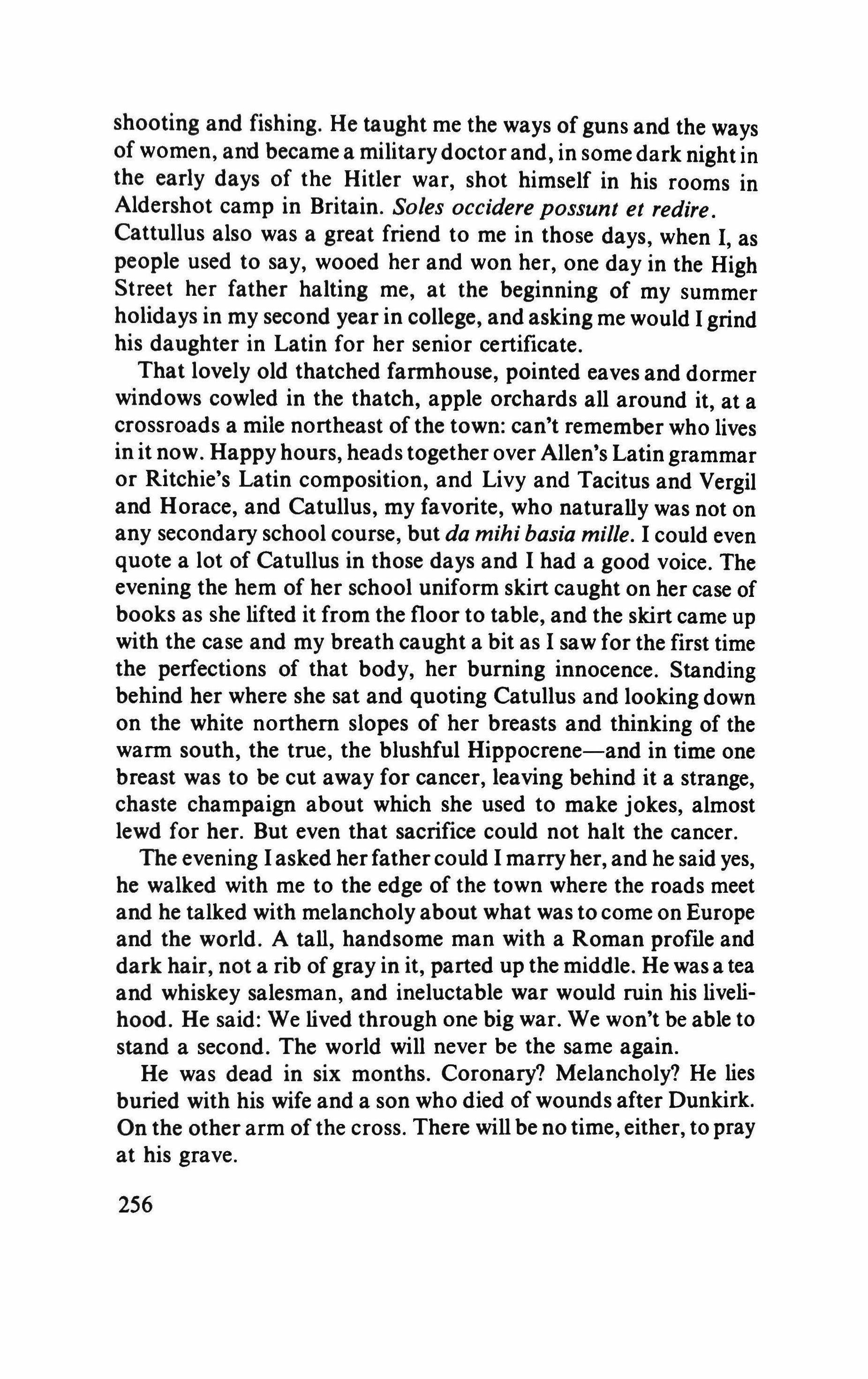
shooting and fishing. He taught me the ways of guns and the ways of women, and became a military doctor and, in some dark night in the early days of the Hitler war, shot himself in his rooms in Aldershot camp in Britain. Soles occidere possum et redire. Cattullus also was a great friend to me in those days, when I, as people used to say, wooed her and won her, one day in the High Street her father halting me, at the beginning of my summer holidays in my second year in college, and asking me would I grind his daughter in Latin for her senior certificate.
That lovely old thatched farmhouse, pointed eaves and dormer windows cowled in the thatch, apple orchards all around it, at a crossroads a mile northeast of the town: can't remember who lives in it now. Happy hours, heads together over Allen's Latin grammar or Ritchie's Latin composition, and Livy and Tacitus and Vergil and Horace, and Catullus, my favorite, who naturally was not on any secondary school course, but da mihi basia mille. I could even quote a lot of Catullus in those days and I had a good voice. The evening the hem of her school uniform skirt caught on her case of books as she lifted it from the floor to table, and the skirt came up with the case and my breath caught a bit as I saw for the first time the perfections of that body, her burning innocence. Standing behind her where she sat and quoting Catullus and looking down on the white northern slopes of her breasts and thinking of the warm south, the true, the blushful Hippocrene-and in time one breast was to be cut away for cancer, leaving behind it a strange, chaste champaign about which she used to make jokes, almost lewd for her. But even that sacrifice could not halt the cancer.
The evening I asked her father could I marry her, and he said yes, he walked with me to the edge of the town where the roads meet and he talked with melancholy about what was to come on Europe and the world. A tall, handsome man with a Roman profile and dark hair, not a rib of gray in it, parted up the middle. He was a tea and whiskey salesman, and ineluctable war would ruin his livelihood. He said: We lived through one big war. We won't be able to stand a second. The world will never be the same again.
He was dead in six months. Coronary? Melancholy? He lies buried with his wife and a son who died of wounds after Dunkirk. On the other arm of the cross. There will be no time, either, to pray at his grave.
256

Corkman sits, his elbows on the kitchen table, the pistol on the board before him. He is silent but very much awake. His son, with his head in his hands, seems asleep-but restlessly. Gasmask is snoring in Minnie's rocking chair. Through the slit in the mask the snores make a sound that was never heard before. For sure and certain, these distorted faces are out of a nightmare. Soldier's Cap is making out as well as he may in the shrubbery, with the cold promise that the watch will be changed at three in the morning. Corkman's tin hat has tilted and the sock-or-something, misshapen over his face, makes him like a Guy Fawkes or that Colonel Lundy the Orangemen used to bum annually in effigy in happy memory of the siege of Derry. From Antrim crossing over in sixteen eightyeight, a plumedand belted lover came to the Ferry Gate. That was the Earl of Tryconnel. She summoned to defend her, our sires, a beardless race. With shouts ofNo Surrender, theyslammedit in his face.
The Apprentice Boys of Protestant Derry, the Maiden City, close the gate before Tyrconnel and the troops of James Stuart. The long memory lives on. With riots and ructions and bombs and bloody Sundays as much a maiden now as Dresden on the morning after.
All this he says to Corkman. No comment. Gasmask creaks and rocks in the chair. The snores ride on like advancingshingly waves.
-The Cambridge rapist, he says, had a better mask than any of you. More imagination. You must have seen a picture of it in the papers. Like a great, black, pointy bonnet with a longzipper where the mouth should be. He had sewn hair all around the bottom ofit so that it looked as if he had long hair and a beard.
No comment from Corkman.
-And white eyebrows painted above the eyeholes. And painted in white on the forehead, or what covered it, the simple word Rapist. He wasn't, do you see, ashamed of his craft, trade, or profession. When a girl woke up and looked up and read that in the middle of the night she knew right away what was in store for her.
No comment.
-What could you write on your forehead? From behind his cupped clutched hands Binchey Two says Cain. No comment.
- The chief constable in Cambridge blamed the case on the 257

prevalence of unchecked porn. A dangerous word to use. It could have been misprinted.
-Old man, you talk too much.
-It's an old man's privilege.
- You don't have any privileges until you deliver the goods.
-After that, says Binchey Two, you could send him a 1916 medal.
No comment.
Binchey One says that, according to Irenaeus in Edmund Spenser's Viewe of the State of Ireland, the kerns and gallowglasses oppressed all men, spoiled their own people as well as the enemy, stole, were cruel and bloody and full ofrevenge, delighted in deadly execution, were licentious, swearers and blasphemers, common ravishers of women and murderers of children.
-He didn't like the Irish, old man, We know you taught Latin and history and English literature. It had to be English. We know what your history was like.
- You know a lot for a stranger to these parts.
-I do my homework.
Gasmask's snores trample onward toward a gravelly coast. He is wandering through London streets with his wife. They are planning a trip by water to the country, but they fall asleep in a pub or in a flat and can't get to the boat. We meet a young official who asks me to telephone Mary Cluskey that in my youth I rolled in the ditches with, on the expert advice of that big happy man who died in Aldershot by his own hand. And when I'm talking to Mary on the phone I can still hear my wife's voice in the background. I keep asking Mary to pass the phone on to her, but when she tries to, my wife is gone. Then she reappears, walking along Kensington High Street and carrying two traveling bags. She says she won't go to wherever it was we were going because I would only torment myself and her. Kensington High Street becomes a clay road between shambles of outhouses. We meet a crowd ofboys playing with dogs and ask them the way to Hampstead. We have been going the wrong way, and an adult, a dwarf, Dickens's Daniel Quilp, redirects us. We sit down to eat at a rough wooden table and in the open air. My son is there as a boy, and his sister, grown up, the image of her mother. In a dry, deep-sunken dyke to my left are
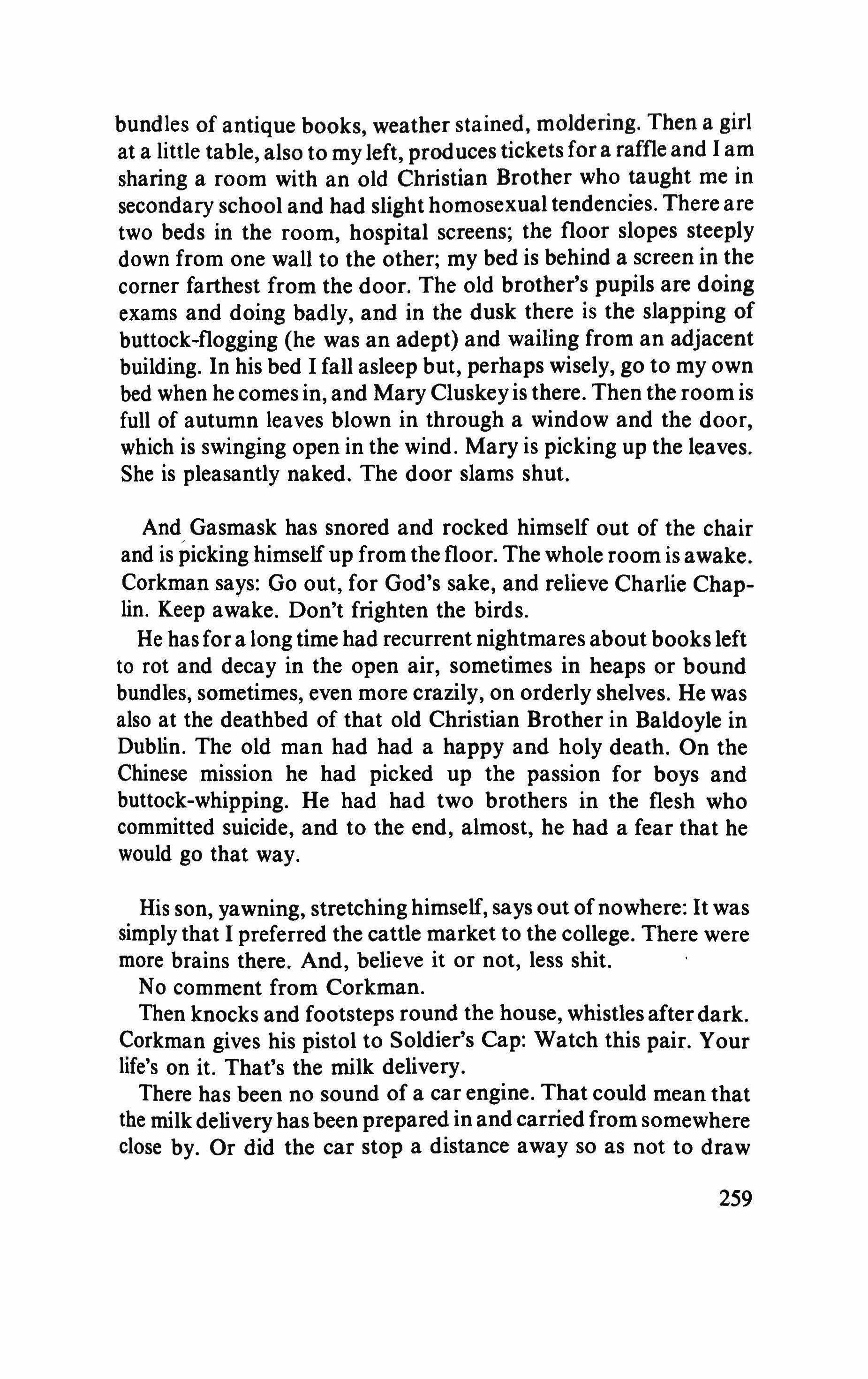
bundles of antique books, weather stained, moldering. Then a girl at a little table, also to my left, produces tickets for a raffle and I am sharing a room with an old Christian Brother who taught me in secondary school and had slight homosexual tendencies. There are two beds in the room, hospital screens; the floor slopes steeply down from one wall to the other; my bed is behind a screen in the corner farthest from the door. The old brother's pupils are doing exams and doing badly, and in the dusk there is the slapping of buttock-flogging (he was an adept) and wailing from an adjacent building. In his bed I fall asleep but, perhaps wisely, go to my own bed when he comes in, and MaryCluskeyis there. Then the room is full of autumn leaves blown in through a window and the door, which is swinging open in the wind. Mary is picking up the leaves. She is pleasantly naked. The door slams shut.
And Gasmask has snored and rocked himself out of the chair and is picking himself up from the floor. The whole room is awake. Corkman says: Go out, for God's sake, and relieve Charlie Chaplin. Keep awake. Don't frighten the birds.
He has for a long time had recurrent nightmares about books left to rot and decay in the open air, sometimes in heaps or bound bundles, sometimes, even more crazily, on orderly shelves. He was also at the deathbed of that old Christian Brother in Baldoyle in Dublin. The old man had had a happy and holy death. On the Chinese mission he had picked up the passion for boys and buttock-whipping. He had had two brothers in the flesh who committed suicide, and to the end, almost, he had a fear that he would go that way.
His son, yawning, stretchinghimself, says out of nowhere: It was simply that I preferred the cattle market to the college. There were more brains there. And, believe it or not, less shit. No comment from Corkman.
Then knocks and footsteps round the house, whistles afterdark. Corkman gives his pistol to Soldier's Cap: Watch this pair. Your life's on it. That's the milk delivery.
There has been no sound of a car engine. That could mean that the milk delivery has been prepared in and carried from somewhere close by. Or did the car stop a distance away so as not to draw

attention to the house? It would be odd to think that somebodyin a neighboring cottage could all the time have been plotting and preparing this. His son says: One day when I was in primary school I was walking home through Fountain Lane where the soldiers' girls lived. Two ofthem were having an argy-bargy and one ofthem called the other a hoor. So being all of eight years of age, I went right home and asked my mother what was a hoor? She laughed until she cried. She said: You'll find out soon enough. There's a fair share of them in this town.
-Next morning I'm on my way back through Fountain Lane and one of the pair is leaning out over the half-door, red in the face, hair in the eyes. She shouted at me: Wee fella, did you pass many worms this morning?
- That puzzled me for a long time. You see, I couldn't recall seeing or overtaking any worms.
Something's going on outside. The gentlemen go by. Five and twenty ponies trotting through the dark, brandy for the parson, baccy for the clerk, laces for a lady, letters for a spy, watch the wall my darling
- That's life for you, his son says. Or a lot of it. Hoors and worms. Worms and hoors.
No comment from Soldier's Cap. Corkman has come back. He says: That was the milk delivery, the creamery can. Brace yourself, old man. You might yet be the first ofyour breed to die for Ireland.
Standing with one foot in the stone-flagged corridor and one in the basement bathroom, holding his shotgun as if he were behind a covered wagon and waiting for Indians, Gasmask hisses: Be careful, Mr. Binchey. And good luck.
Binchey One is in shirt and trousers, and washing and shaving. This is a job he needs to be fresh for: Oh weep, my own town, for after all these years of love I carry death to your threshold.
Carefully he combs back his plentiful silver hair. It changed color after she died, but it stayed with me. When he was younger and drank more than was good for him he always had a fancy that if your hair was combed you looked sober. He soaks a facecloth in cold water and swabs his face, with particular attention to the ears so that I'll hear the bomb ifit goes off prematurely. Do you hearthe bomb that kills you? On the western front the old sweats said that you didn't hear the whistle ofthe shell that had your name on it. Yet

how could anybody know if nobody lived to tell the tale? He says: That's the oddest bloody wish I ever heard, Bertie. He hadn't meant to use the name, but the harm's done now, ifit is harm. Gasmask doesn't move. Or Bertie. He may be seeing Indians. He hisses: Search me. Silence is golden. With those temporary speech defects he should eschew sibilants.
-Your father's feet, Bertie.
- I'm saying nothing.
-I'd know them anywhere.
-For God's sake, don't let him know you know me.
-Are you afraid of him?
-He's hell on wheels. He might hear us.
-He can't with the sound of the rashers frying. And also the voices of children, who seem blessedly to have adapted, accepted painted devils and funny faces so as now, in the morning, to be able to dance around Minnie, Minnie Brown, we're home again from Dungloe town, and to tell her in a pattering hailshower of words in two voices about Donegal and the ocean and the crabs in the glass jars and the golden and white strands of the Rosses. Soldier's Cap has been detailed to carry the crabs into the kitchen. Corkman says: Anything to keep them quiet. He sits by the outer door, pistol in hand, back to the wall. Soldier's Cap has been sent out again to watch the world and the loaded car. Binchey Two sits on the couch, his head in his hands, brooding, his father fears, violence. The two women cook breakfast. It is Sunday morning and callers are unlikely and it is the custom of the house to pick up the Sunday papers in the town after Mass. So there will be no newsboy. For all the townspeople know, they are still in Donegal.
-He's all ears, Gasmask hisses. He's one of the big ones.
-Who? That half-educated gutty from Cork. He's big when he's out like the prick of a jackass.
-Holy God, Mr. Bee, be careful. Keep your voice down.
-In my own house?
It's his house now. For the cause. You were good to my father, Mr. Bee, my father always says.
-The son repays me.
-It's the cause, Mr. Bee. We must get the Brits out of Ireland. They want our oil.
-Our hair oil. I never knew we had oil.

-We will have offshore oil.
TYou won't see much of it, Bertie boy, where you're going. You'll have more need of luck than I'll have.
-Not my name, Mr. Bee. Walls have ears. The trees outside have ears.
-You really are a poet, Bertie. Your father was a decent man. Your father's son shouldn't be mixed up in this.
- I'm a soldier of the Republic.
- You're an ass. You could give me that gun. Mad Eyes Minahan has only a knife.
-Jesus, Mr. Bee, you know him too. No mask could hide those mad eyes.
He hadn't recognized the eyes. He had just guessed. If I survive this, will I pass the names to the police?
Carefully he knots his dark-green tie, Dublin poplin. He could do with a clean shirt; and suddenly his care for such things at such a time seems crazily comic. Yet he dusts the broad shoulders of his pin-striped jacket, carefully polishes and sets his pince-nez. He's the last man in these parts to go in for pinstripe and pince-nez: she had always liked them.
- You could give me that gun.
-Dear God, Mr. Bee, talk sense. You were a teacher. He'd kill us all. Even if he didn't get me, they would. There's no way out. Sorry, Mr. Bee.
The elbow of his left arm, slightly crooked, pains a little as it has done most mornings since he broke it in a boxing bout in college, and, after my time, my son was shaping well on the college team but he lost interest and gave all his heart to farming; and perhaps Bertie, as stupid as his father before him, is right and there's no way out, and Corkman is calling from the kitchen to say that time is ticking away and the milk may be boiled over.
His son still sits with his head in his hands. The emptydoll'spram is under the table. The doll is asleep in Minnie's bed. The crabs stare out from their jar on the wide windowsill. Rashers and eggs and tea laced with brandy, good for the ticking ofthe heart. There's a double noggin of brandy in the back of the car and he hopesthey haven't found out about that. The family sit and eat, and Corkman and Bertie guard the doors; they'll eat, Corkman says, when the milk is safely on the road. His son's strong hands, now marmalading bread for the children, are matted with dark hair, none on his
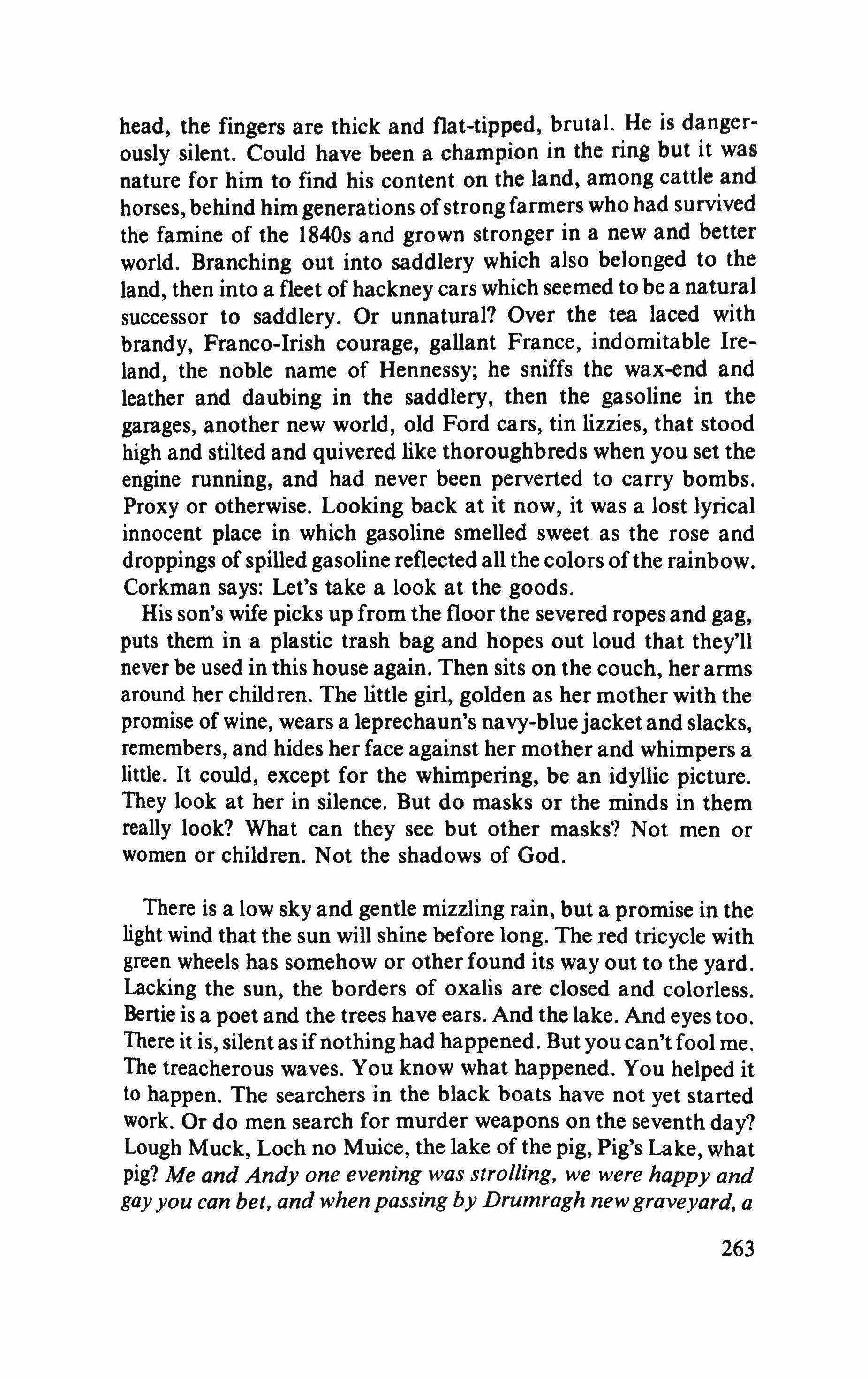
head, the fingers are thick and flat-tipped, brutal. He is dangerously silent. Could have been a champion in the ring but it was nature for him to find his content on the land, among cattle and horses, behind him generations ofstrong farmers who had survived the famine of the 1840s and grown stronger in a new and better world. Branching out into saddlery which also belonged to the land, then into a fleet of hackney cars which seemed to be a natural successor to saddlery. Or unnatural? Over the tea laced with brandy, Franco-Irish courage, gallant France, indomitable Ireland, the noble name of Hennessy; he sniffs the wax-end and leather and daubing in the saddlery, then the gasoline in the garages, another new world, old Ford cars, tin lizzies, that stood high and stilted and quivered like thoroughbreds when you set the engine running, and had never been perverted to carry bombs. Proxy or otherwise. Looking back at it now, it was a lost lyrical innocent place in which gasoline smelled sweet as the rose and droppings of spilled gasoline reflected all the colors ofthe rainbow. Corkman says: Let's take a look at the goods. His son's wife picks up from the floor the severed ropes and gag, puts them in a plastic trash bag and hopes out loud that they'll never be used in this house again. Then sits on the couch, her arms around her children. The little girl, golden as her mother with the promise of wine, wears a leprechaun's navy-bluejacket and slacks, remembers, and hides her face against her mother and whimpers a little. It could, except for the whimpering, be an idyllic picture. They look at her in silence. But do masks or the minds in them really look? What can they see but other masks? Not men or women or children. Not the shadows of God.
There is a low sky and gentle mizzling rain, but a promise in the light wind that the sun will shine before long. The red tricycle with green wheels has somehow or other found its way out to the yard. Lacking the sun, the borders of oxalis are closed and colorless. Bertie is a poet and the trees have ears. And the lake. And eyes too. There it is, silent as ifnothing had happened. But you can't fool me. The treacherous waves. You know what happened. You helped it to happen. The searchers in the black boats have not yet started work. Or do men search for murder weapons on the seventh day? Lough Muck, Loch no Muice, the lake of the pig, Pig's Lake, what pig? Me and Andy one evening was strolling, we were happy and gay you can bet, and whenpassing by Drumragh new graveyard, a

young Loughmuck sailor we met. She sleeps forever in New Drumragh on the wrong arm of the cross. He brought us along to his liner that was breasting the lake like a duck. And that was the start of our ill-fated cruise on the treacherous waves ofLoughmuck. That now was the first verse of the comic song: two drunks from the town astray in these rural parts, falling footless in a dyke, suffering alcoholic comas about an ocean cruise on the oval inland lake, a comic laughing lake, sea lions, sharks, alligators, whales, shipwreck, and a pity it was the name ofdeath, oh the sights that we saw as we waitedfor death, had to be mentioned in the chorus of the song: There we lay on that beach quite exhausted till a man with a big dog drew near. He shouted out, Hey, clear away out ofthis, we want no drunk towney boyshere. Laughterand innocence were gone. The shadow ofthe monstrous mythological pig brooded over a landscape that could never free itself from vengeance and old wrongs. A pig of an island, an island changed by the magic of the Tuatha-de-Danaan into that mammoth of a black pig crouching on the sea, so as to try to prevent the Milesian wandering heroes from coming safely to haven on their isle of destiny. What a destiny, to consort with murderers in the valley of the black pig.
Corkman opens the boot of the car, which has been reversed or pushed back to the hay shed, in which there is another car, a Ford Cortina. But it didn't come there during the night. No noise. Must have been there before we drove from the happiness of Donegal into the haunted farmyard.
- You're a learned man, Corkman says.
Bertie, like a statue of the Rifleman, stands in the shrubbery away at the gable of the house.
- There she is. You'U like to know what's in her.
She is a stout, squat creamery can, shining silver.
-One hundred pounds ofammonium nitrate mixed with fuel oil and about three pounds of gelignite.
-A sweet cocktail.
-She'll do the job. Watch her. Technologically we've made big advances.
Carefully he closes the boot: Don't bump her, old man.
-Advances? Toward what?
-That's the way we'll bugger the Brits. Technology. The town hall, the post office, any innocent person who mightbe

in them or walking the street past them, Judge Flynn doomed because of his virtue: a madman spoke behind the mask, the man in the mask was mad.
-Some American says that shortlyanyfool will be able to make a hydrogen bomb in his own backyard.
-You read too much, old man.
Once upon a time a creamery can had been a harmless or lovely, even a musical, object. Up and down the street in the town in which he was reared, the horses and carts from the farms would travel, bright withjingling cans, taking fresh milk to the creamery, taking away the skim milk for cattle food. In Hamilton's smithy, where three gigantic Presbyterian men, a father and two sons, swung their hammers and reddened the forge, the horses and the cart wheels were shod when the need arose: Presbyterian iron, and across the street his father and his helpers, all Catholics, including Bertie's poor fool of a father, provided the leather. Genuine cooperation: the horses had no sectarian prejudices. One large, red-faced farmer boy would sit sideways on his cart, outsized hobnailed feet trailing on the ground and, fancying himself perhaps on the Oregon Trail, would sing in the rural dialect: Rowl along, covered wagon, rowl along.
No shuddering, shattering death in those bright cans.
Nowadays motortrucks took the cans to a modem factory.
-Time's ticking away, Corkman says. He agrees. What else is new? Corkman is a bore; and suddenly the brutal effrontery of the whole business freezes his blood and sets him shivering. What right have these brainless bastards with their half-baked ideas to crash in on the lives of better people, to bind and gag old women, set children whimpering, and himself bearing death and ruin to the town he loves. Ireland? What Ireland? Ulster? What Ulster? MUltiplying like body lice, the other crabs, in the hairy undergrowth, one madman produces another. He says to Corkman that indeed time is ticking away, that they're all closer to the grave than they were yesterdaymorning. He says: I heard of a man who defied a gang like you
-Gang? Watch it, old man.
-And said: Murder me now. What would you do, Corkman?
- Try me and see. Nobody would miss your son, for starters. But listen to me now and listen good and no cod-acting. You can't take the short way into the town. They may be easy on a Sunday
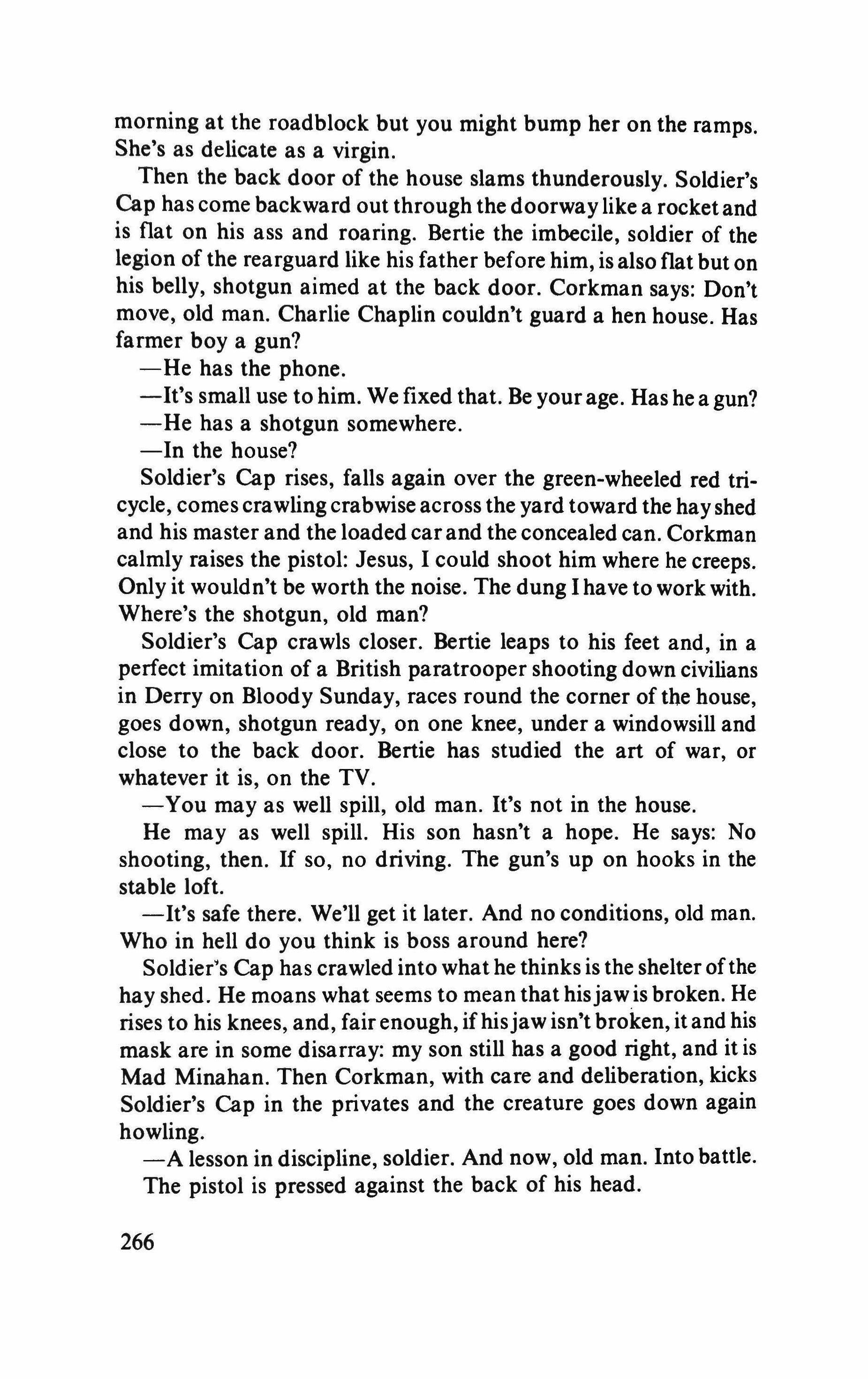
morning at the roadblock but you might bump her on the ramps. She's as delicate as a virgin.
Then the back door of the house slams thunderously. Soldier's Cap has come backward out through the doorway like a rocketand is flat on his ass and roaring. Bertie the imbecile, soldier of the legion of the rearguard like his father before him, is also flat but on his belly, shotgun aimed at the back door. Corkman says: Don't move, old man. Charlie Chaplin couldn't guard a hen house. Has farmer boy a gun?
- He has the phone.
-It's small use to him. We fixed that. Be your age. Has he a gun?
-He has a shotgun somewhere.
-In the house?
Soldier's Cap rises, falls again over the green-wheeled red tricycle, comes crawling crabwise across the yard toward the hay shed and his master and the loaded car and the concealed can. Corkman calmly raises the pistol: Jesus, I could shoot him where he creeps. Only it wouldn't be worth the noise. The dung I have to work with. Where's the shotgun, old man?
Soldier's Cap crawls closer. Bertie leaps to his feet and, in a perfect imitation of a British paratrooper shooting down civilians in Derry on Bloody Sunday, races round the corner of the house, goes down, shotgun ready, on one knee, under a windowsill and close to the back door. Bertie has studied the art of war, or whatever it is, on the TV.
- You may as well spill, old man. It's not in the house. He may as well spill. His son hasn't a hope. He says: No shooting, then. If so, no driving. The gun's up on hooks in the stable loft.
-It's safe there. We'll get it later. And no conditions, old man. Who in hell do you think is boss around here?
Soldier's Cap has crawled into what he thinks is the shelter ofthe hay shed. He moans what seems to mean that hisjawis broken. He rises to his knees, and, fair enough, ifhisjaw isn't broken, it and his mask are in some disarray: my son still has a good right, and it is Mad Minahan. Then Corkman, with care and deliberation, kicks Soldier's Cap in the privates and the creature goes down again howling.
-A lesson in discipline, soldier. And now, old man. Into battle. The pistol is pressed against the back of his head.

-Walk slowly across to within twenty paces ofthe door. Tell the idiot farmer boy to step out backward, hands behind back. Women and children in kitchen and quiet. If not, I'll shoot you in one kneecap. Also we'll run the milk delivery up to the back door and leave it there. Time's ticking away. The virgin's in the boot. Waiting to be bust. Fed-up fooling, old man. Soldier boy, on your feet. You stupid fucker. The Battle of Britain and Paddy Finnucane. And get the cuffs out of the Cortina.
He stirs Mad Minahan more than briskly with his foot, and the creature rises and hobbles, doubled up and moaning, toward the hidden car. They pace across the yard. Quasimodo Minahan lurches behind. The borders of oxalis are stirring in expectation of the sun. The birds are busy. The birds sang around Dachau. The mouth of the pistol is not touching his head but he feels that it is.
Cold, shivering anger at outrage is not enough. You need guns and bombs and swinging ropes and the shooting of hostages. But here and now there's no help for it, no way out. If the milk has to be delivered anywhere, better not at your own door. So his son steps out backward, hands behind his back, and Quasimodo, hobbling sideways and groaning, snaps the cuffs on him in a flash and a click and, for better value, kicks him viciously on the shins. Corkman laughs again that astoundingly good-natured laugh and says: Chained in the marketplace he stood, a man of giant frame. Then: To the wheel, old man, to the wheel.
- Will my son be safe?
The humiliation, oh heart of Jesus, the humiliation, hoors, whores and worms.
- If he minds himself, and if you deliver the goods. He can't masturbate the way he is. He won't grow hair on the palms of his hands. To the wheel, old man.
- The women? My daughter-in-law? The children?
Bertie's father's awkward feet have walked into the house.
- N0 time, old man, for tearful farewells. Kiss them all you want when you come back. If you ever do. Time's ticking away.
The pistol, really touching his head, pushes him toward the car. His son stands silent, chained in the marketplace amid the gathering multitude that shrank to hear his name, men without hands, girls without legs in restaurants in Belfast, images of Ireland Gaelic and free, never till the latest day shall the memory pass away ofthe gallant lives thus given for our land, images of Ulster or of a

miserable withdrawn corner of O'Neill's Irish Ulster safe from popery and brass money and wooden shoes. These mad dogs have made outrage a way of life. To the wheel, to the wheel, to the wheel, time's ticking away, in the town the churchbells are ringing, Catholic, Church of Ireland, Presbyterian, Methodist, Baptist, all calling people away from each other to get them in the end by various routes, variis itineribus to the home in the heavens of the same omnipotent, omniscient, omnipresent Great Father with a long white beard, but why not unite here and now and not wait for then, come all to church good people good people come and pray, and the angel of death is at the wheel or on the wing, and ye know neither the day nor the hour.
Before him like a bloodred flag the bright flamingos flew. The bright, evil lake is behind him. The car runs well. To look at it, nobody would have a notion. This now is the crossroads and the longest way round is the shortest way home. And his still-silent, silvery passenger, glutted with fuel oil and gelignite and ammonium nitrate, might be discommoded into burpingby the bumps of the ramps. Beloved, may your sleep be sound. She sleeps in New Drumragh. Death sleeps in the silver can. In Dublin long ago he had gone with her to see that movie about Venezuela and the wages of fear. A friend of his had even introduced them to the Frenchman who had written the novel: a tall man, visiting Dublin at the time, who wrote about deadbeats in a vile South American town, island of lost souls, taking perilous jobs, only the lost would take them, that was a pothole and a bad bump, driving nitroglycerin or something to mines or quarries or was it oil wells: the occupational hazard, a blinding flash over the ridge, scarcely an explosion,just a blinding flash and that was that.
But at least those wrecks of men were paid to carry the stuff. More or less they went willingly. If they won through, they had their ticket to somewhere out of hell. If they didn't, they felt no more pain. While I ferry murder to my town and its people so as to save my children, my children's children, an old deserted woman, a long white house. And on the cause must go, throughjoy or weal or woe, till we make Ireland a nation free and grand. Not even the Mafia thought of the proxy bomb, operation proxy, proxopera for gallant Irish patriots fighting imaginary empires by murdering the neighbors. Could Pearse in the post office have, by proxy, summoned Cuchulain to his side, could the wild geese have, by proxy,
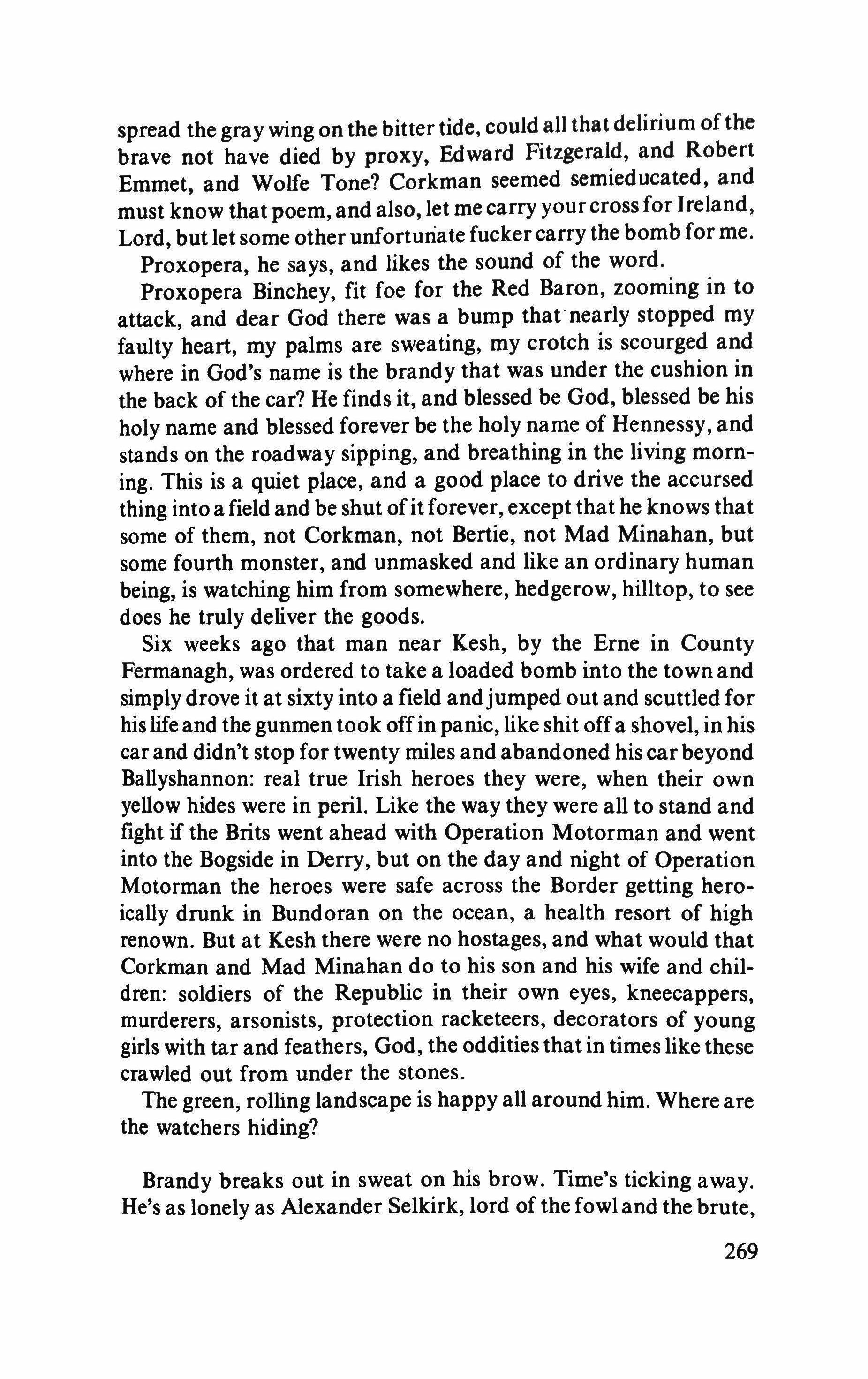
spread the gray wing on the bitter tide, could all that delirium of the brave not have died by proxy, Edward Fitzgerald, and Robert Emmet, and Wolfe Tone? Corkman seemed semieducated, and must know that poem, and also, let me carry your cross for Ireland, Lord, but let some other unfortunate fucker carry the bomb for me.
Proxopera, he says, and likes the sound of the word.
Proxopera Binchey, fit foe for the Red Baron, zooming in to attack, and dear God there was a bump that-nearly stopped my faulty heart, my palms are sweating, my crotch is scourged and where in God's name is the brandy that was under the cushion in the back of the car? He finds it, and blessed be God, blessed be his holy name and blessed forever be the holy name of Hennessy, and stands on the roadway sipping, and breathing in the living morning. This is a quiet place, and a good place to drive the accursed thing into a field and be shut ofit forever, except that he knows that some of them, not Corkman, not Bertie, not Mad Minahan, but some fourth monster, and unmasked and like an ordinary human being, is watching him from somewhere, hedgerow, hilltop, to see does he truly deliver the goods.
Six weeks ago that man near Kesh, by the Erne in County Fermanagh, was ordered to take a loaded bomb into the town and simply drove it at sixty into a field andjumped out and scuttled for his life and the gunmen took offin panic, like shit off a shovel, in his car and didn't stop for twenty miles and abandoned his car beyond Ballyshannon: real true Irish heroes they were, when their own yellow hides were in peril. Like the way they were all to stand and fight if the Brits went ahead with Operation Motorman and went into the Bogside in Derry, but on the day and night of Operation Motorman the heroes were safe across the Border getting heroically drunk in Bundoran on the ocean, a health resort of high renown. But at Kesh there were no hostages, and what would that Corkman and Mad Minahan do to his son and his wife and children: soldiers of the Republic in their own eyes, kneecappers, murderers, arsonists, protection racketeers, decorators of young girls with tar and feathers, God, the oddities that in times like these crawled out from under the stones.
The green, rolling landscape is happy all around him. Where are the watchers hiding?
Brandy breaks out in sweat on his brow. Time's ticking away. He's as lonely as Alexander Selkirk, lord of the fowland the brute,

lord of destruction and the day of doom. Into battle, then. To the wheel. To the wheel. Get a good grip on myself. Another sip. More sweat, but the heart seems easy. A man of my age in Belfast was forced to drive a bomb to the Europa Hotel, already bombed seventeen times, and had a heart attack and died, and the bomb didn't even go off; the cursed murderous cretins, and all the happy days I passed along this road on my way to the innocent lake and the vision ofthe white house ofdestiny; and now, out ofhumanity's reach, I, Alexander Selkirk, on my own island and passing her holy grave without time for a prayer, must finish my journey alone.
Traffic is slight for a Sunday morning. Have the men of blood frightened the people from going to Mass or meeting? Three cars overtake him and hoot at him in salute, and in the noise and reverberation of their passing he grips the wheel until his sweating palms hurt. He doesn't hoot back. They'llall be surprised to see me driving. God preserve any of them from stopping to make inquiries. An old woman-oddly enough he doesn't recognize her although he thought he knew everybody on this road-thumbs a lift and, out of habit, he is almost about to respond. She'll be amazed and annoyed that he hasn't. People in these parts were always generous about giving lifts. These morons have blighted the landscape, corrupted custom, blackened memory, drawn nothing from history but hatred and poison. Proxopera, proxopera lift up your voice and sing. So he sings, but softly: Going to Mass last Sunday my true love passed me by. I knew her mind was altered by the rolling of her eye. And when I stood in God's dark light, my tongue could word no prayer, knowing my saint had fled and left her reliquary bare.
My true love passed me by. No, but I passed her by, in fear and without a prayer, when I passed the green spiked railings of New Drumragh. He sings again, this is as close to prayer as. I can come: Ringleted youth of my love with your bright golden tresses behind thee, you passed on the road up above but you never came in to fmd me.
How dear to me now, doomed to solitude, a murderer by proxy, are my memories, how dear the ordinary details of life, a red tricycle with green wheels, a doll's pram, the rocks of Donegal, two crabs in a glass jar, the wrinkled face of an old woman, the winy body of a young woman, the bald head of my angry son, the voices

of his children, the sound of the hooves of his horses, the oxalis opening to the sun now breaking out splendidly beyond my doomed town.
Spiked green railings surround the dead, the graveled cross divides them.
Outside a Wesleyan hall in Belfast a woman has been found impaled on the railings. Foul play is not suspected. She fell from a window. Of a Wesleyan hall? Odd, very odd. And in Belfast, where for six years there has been nothing but foul play. Christ, there I went bump bump over a bridge over a small stream out of which, with the humble worm, I took my first-ever brown trout. Has the creamery can moved? Rattled? How do you fall from the window of a Wesleyan hall and impale yourself on the railings? Shades of Shaka, the great Zulu, who amused himself by seating his enemies on pointed stakes and letting them sink to find their own level. A very painful happening, buggery by proxy, proxbuggery. But the Turks had more finesse with a slender, pliable, tough rod tapped gently in at the anus and up and up, an expert job, and out at the back of the neck and one end ofthe rod lashed securely to the other and the victim raised on a pole to perish as soon or as slowly as he pleased. With their hammers and nails and carpentered crosses, the ancient Romans were a crude bloody crowd. Proxopera in the highest, hosanna to the king.
Long ago she said in all innocence: Take my cherry. They were sitting in an ice-cream parlor in O'Connell Street in Dublin.
He picked the cherry from the top of her phallic bombe cardinale, blunted multicolored obelisk of ice cream, and told her what she had just said, and she blushed and laughed and laughed and blushed, and still I remember the first touch of the tip of my finger on the fragile membrane.
-She's as delicate, Corkman said, as a virgin.
Or was that what the bastard had said?
And that, God above, was another bad bump. St. Christopher, pray for me, who carried Christ on your back; I carry Lucifer, evil and a blinding light.
Once in an old churchyard that must have been in some eighteenth-centuryengraving, and beside a high Norman earthwork, a 271
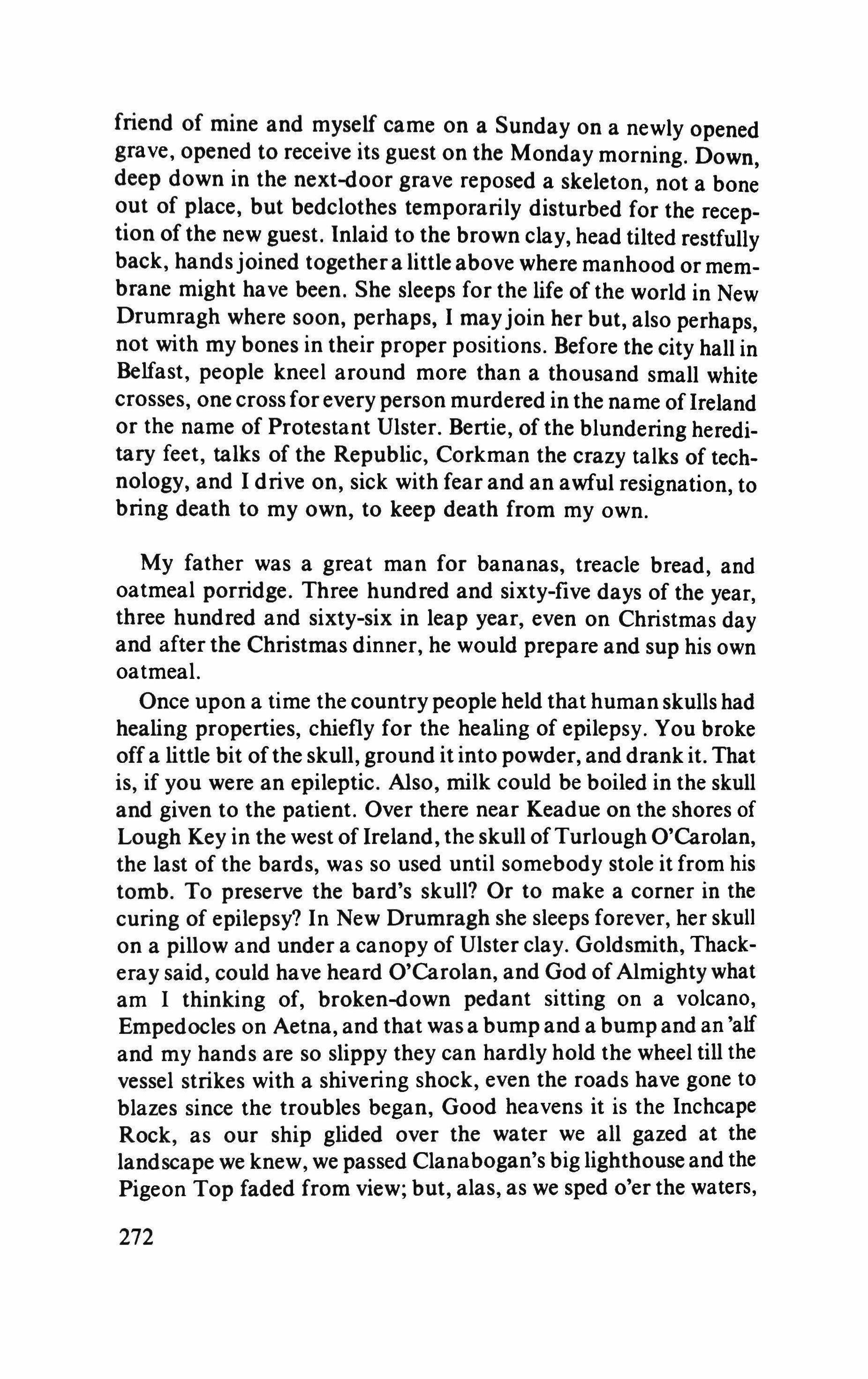
friend of mine and myself came on a Sunday on a newly opened grave, opened to receive its guest on the Monday morning. Down, deep down in the next-door grave reposed a skeleton, not a bone out of place, but bedclothes temporarily disturbed for the reception of the new guest. Inlaid to the brown clay, head tilted restfully back, handsjoined together a little above where manhood or membrane might have been. She sleeps for the life of the world in New Drumragh where soon, perhaps, I mayjoin her but, also perhaps, not with my bones in their proper positions. Before the city hall in Belfast, people kneel around more than a thousand small white crosses, one cross forevery person murdered in the name of Ireland or the name of Protestant Ulster. Bertie, of the blundering hereditary feet, talks of the Republic, Corkman the crazy talks of technology, and I drive on, sick with fear and an awful resignation, to bring death to my own, to keep death from my own.
My father was a great man for bananas, treacle bread, and oatmeal porridge. Three hundred and sixty-five days of the year, three hundred and sixty-six in leap year, even on Christmas day and after the Christmas dinner, he would prepare and sup his own oatmeal.
Once upon a time the country people held that human skulls had healing properties, chiefly for the healing of epilepsy. You broke off a little bit ofthe skull, ground it into powder, and drank it. That is, if you were an epileptic. Also, milk could be boiled in the skull and given to the patient. Over there near Keadue on the shores of Lough Key in the west of Ireland, the skull ofTurlough O'Carolan, the last of the bards, was so used until somebody stole it from his tomb. To preserve the bard's skull? Or to make a corner in the curing of epilepsy? In New Drumragh she sleeps forever, her skull on a pillow and under a canopy of Ulster clay. Goldsmith, Thackeray said, could have heard O'Carolan, and God of Almighty what am I thinking of, broken-down pedant sitting on a volcano, Empedocles on Aetna, and that was a bump and a bump and an 'alf and my hands are so slippy they can hardly hold the wheel till the vessel strikes with a shivering shock, even the roads have gone to blazes since the troubles began, Good heavens it is the Inchcape Rock, as our ship glided over the water we all gazed at the landscape we knew, we passed Clanabogan's big lighthouse and the Pigeon Top faded from view; but, alas, as we sped o'er the waters,

we were all soon with horrordumbstruck, for without any warning a big storm arose on the treacherous waves of Lough Muck and, Sacred Heart of Jesus, what now is happening in my white house that I first saw and loved across the waters of the lake that have been polluted forever; and Bertie's father was a born fool for this night, when my father was cooking the porridge, he steps into our kitchen with a collection box, and all round his left biceps a tricolored ribbon oh, collecting cash for Caithlin Ni Houlihan, the Hag of Beare and Caith Ni Dhuibhir, and Patrick Pearse and the sainted dead who died for Ireland. Nowadays people die for Ireland in the oddest ways.
-And what will you do with the money? says my father and he carefully watching the bubbling oatmeal.
-Elect members to Stormont and Westminster, Mr. Binchey.
-And what will you do then, Brian boy?
- The members will then abstain from attendance, Mr. Binchey. They'll be abstentionist members.
- Bully for them. That'll save train and boat fare. And what will you do then, Brian?
-Spread our propaganda among the Orangemen, Mr. Binchey. Bring them round to our way of thinking.
-A laudable intention. And what then, Brian?
-Declare a republic, Mr. Binchey.
-Oh la dee da, says my father and goes on stirring the porridge.
But how could Brian help it and the way he was reared, with an uncle that was foreverinand out ofjailfor Ireland and an aunt that blew herself up making bombs for Ireland and a mother that ran a restaurant and lodging house always as full ofrepublicans as Rome before the Caesars, so that it was regularly being raided by the Royal Ulster Constabulary, and one night Brian's mother and Bertie's grandmother poured from a second-floor window, and all for Ireland, the contents of a chamber pot from under the bed of a drunken joumeyman-carpenter, over the shoulders of a police sergeant who came knock-knocking at the door; and the sergeant's name was Poxy Thompson because of the pockmarks on his face and for no worse reason, and one of his shoulders was lower or higher than the other. A family that was fierce Irish, as they'd say in irony in Dublin; and now Bertie on his father's feet and with a face like a faceless monster goes plodding unbidden around the house of my boyhood dreams.

But Kyrie Eleison, what is this on the road on a Sunday morning, smoke rising from the smoldering stump of what's left of the Orange Hall where once that love-bewildered young Protestant provoked a riot by footing the light fantastic with a papist girl? In this present Ulster world there's little place for the light fantastic; close to Newry town the U.V.F., or was it the U.D.A., murdered a show band.
My road drops down, doing a double bend, into a saucer of a valley. High, green, terraced banks, no turn left or right, no turning back, no way out except straight through. There we were like two Robinson Crusoesfar awayfrom Fireagh Orange Hall. Though we starved on that rock for a fortnight, not a ship ever came within call. Fireagh, here I come. And the Orange Hall has just gone. Up in smoke. Thirty or so people are in and around what's left ofit. As close to the smoldering ruins as they dare to go. The flames have blackened the bushes on the high bank above. Sweet sight for a Sunday in a good autumn. No soldiers around. This is a fire. Nota fight. Thank God for that. But for what? One policeman raises his blue-black arm. What can I do but stop? No use to say to him halt me at your peril. And the peril ofeverybody in this little valley. And of my son and his wife and Gary and Catherine and Minnie, Minnie Brown we're home again from Dungloe town.
-Good morning, Mr. Binchey. Bit of a surprise to see you at the wheel.
A decent fellow. I drank with his father. Also in the force. And a brother of his, a plainclothes man, murdered in the town twelve months ago. Sitting reading the paper at a bar counter when two gunmen walked in. Into a pub in which he had had his first drink. And in which on my way from teaching I used to drink with his father, at the same counter at the same place. Tried to pull his gun. They shot him once. Crawled into the gents. They followed him and finished the job and shouted: We have you in the right place, on the shithouse floor.
That pub would never be the same again.
-Good morning, constable. I wouldn't be at the wheel, only necessity knows no law. How true, how bloody true.
- We got back from Donegal last night. Margaret wasn't feeling too well. Robert's on the suspended list. As you know. So old granddad has to head off to the chemist. But I'm taking it easy.
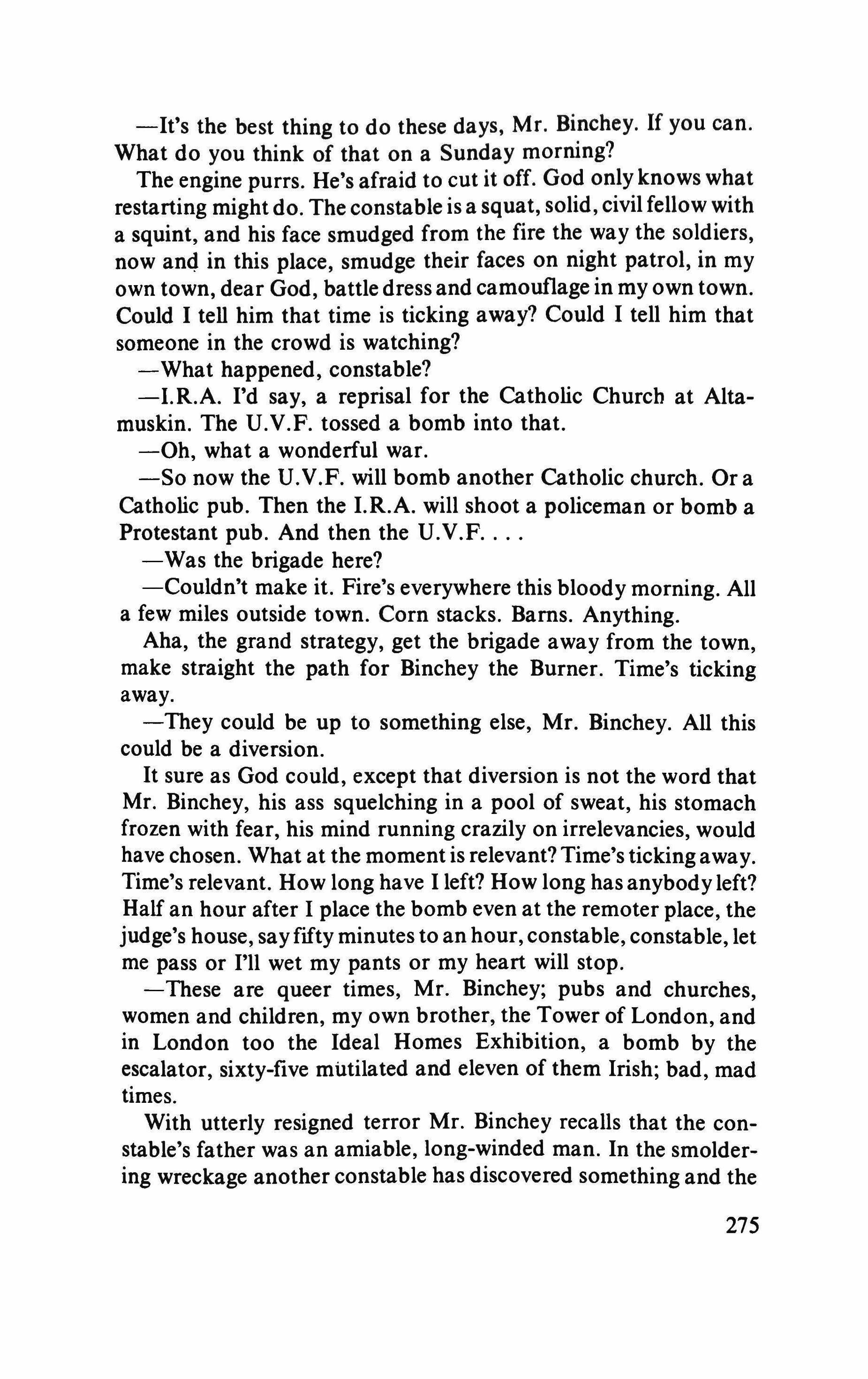
-It's the best thing to do these days, Mr. Binchey. If you can. What do you think of that on a Sunday morning?
The engine purrs. He's afraid to cut it off. God only knows what restarting might do. The constable is a squat, solid, civil fellow with a squint, and his face smudged from the fire the way the soldiers, now and in this place, smudge their faces on night patrol, in my own town, dear God, battle dress and camouflage in my own town. Could I tell him that time is ticking away? Could I tell him that someone in the crowd is watching?
- What happened, constable?
-I.R.A. I'd say, a reprisal for the Catholic Church at Altamuskin. The U.V.F. tossed a bomb into that.
-Oh, what a wonderful war.
-So now the U.V.F. will bomb another Catholic church. Ora Catholic pub. Then the I.R.A. will shoot a policeman or bomb a Protestant pub. And then the U.V.F
- Was the brigade here?
-Couldn't make it. Fire's everywhere this bloody morning. All a few miles outside town. Corn stacks. Barns. Anything. Aha, the grand strategy, get the brigade away from the town, make straight the path for Binchey the Burner. Time's ticking away.
-They could be up to something else, Mr. Binchey. All this could be a diversion.
It sure as God could, except that diversion is not the word that Mr. Binchey, his ass squelching in a pool of sweat, his stomach frozen with fear, his mind running crazily on irrelevancies, would have chosen. What at the moment is relevant? Time's ticking away. Time's relevant. How long have I left? How long has anybody left? Half an hour after I place the bomb even at the remoter place, the judge's house, say fifty minutes to an hour, constable, constable, let me pass or I'll wet my pants or my heart will stop.
- These are queer times, Mr. Binchey; pubs and churches, women and children, my own brother, the Tower of London, and in London too the Ideal Homes Exhibition, a bomb by the escalator, sixty-five mutilated and eleven of them Irish; bad, mad times.
With utterly resigned terror Mr. Binchey recalls that the constable's father was an amiable, long-winded man. In the smoldering wreckage another constable has discovered something and the
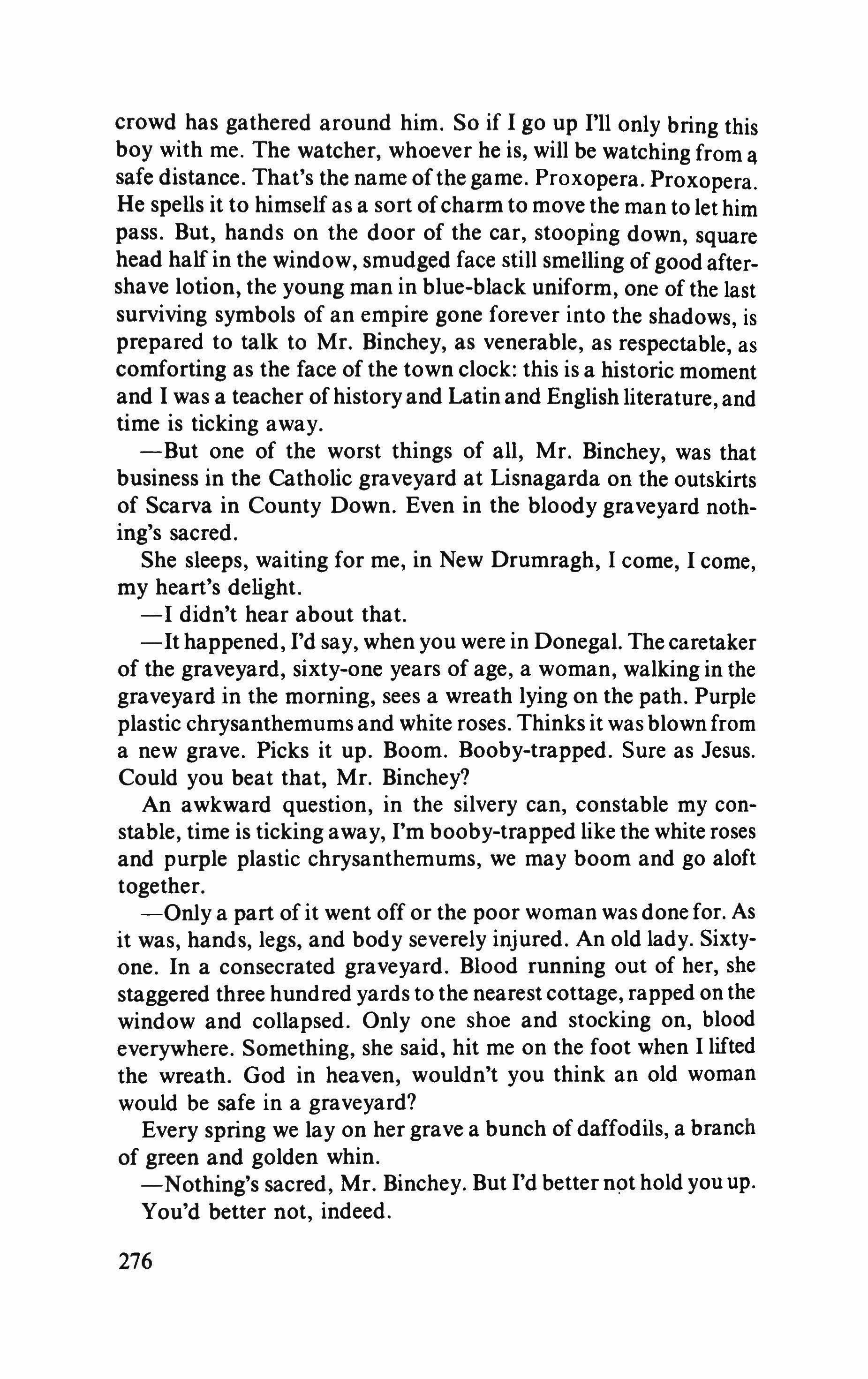
crowd has gathered around him. So if I go up I'll only bring this boy with me. The watcher, whoever he is, will be watching from a safe distance. That's the name ofthe game. Proxopera. Proxopera. He spells it to himself as a sort ofcharm to move the man to let him pass. But, hands on the door of the car, stooping down, square head half in the window, smudged face still smelling of good aftershave lotion, the young man in blue-black uniform, one of the last surviving symbols of an empire gone forever into the shadows, is prepared to talk to Mr. Binchey, as venerable, as respectable, as comforting as the face of the town clock: this is a historic moment and I was a teacher of history and Latin and English literature, and time is ticking away.
-But one of the worst things of all, Mr. Binchey, was that business in the Catholic graveyard at Lisnagarda on the outskirts of Scarva in County Down. Even in the bloody graveyard nothing's sacred.
She sleeps, waiting for me, in New Drumragh, I come, I come, my heart's delight.
-I didn't hear about that.
-It happened, I'd say, when you were in Donegal. The caretaker of the graveyard, sixty-one years of age, a woman, walking in the graveyard in the morning, sees a wreath lying on the path. Purple plastic chrysanthemums and white roses. Thinks it was blown from a new grave. Picks it up. Boom. Booby-trapped. Sure as Jesus. Could you beat that, Mr. Binchey?
An awkward question, in the silvery can, constable my constable, time is ticking away, I'm booby-trapped like the white roses and purple plastic chrysanthemums, we may boom and go aloft together.
-Only a part of it went off or the poor woman was done for. As it was, hands, legs, and body severely injured. An old lady. Sixtyone. In a consecrated graveyard. Blood running out of her, she staggered three hundred yards to the nearest cottage, rapped on the window and collapsed. Only one shoe and stocking on, blood everywhere. Something, she said, hit me on the foot when I lifted the wreath. God in heaven, wouldn't you think an old woman would be safe in a graveyard?
Every spring we lay on her grave a bunch of daffodils, a branch of green and golden whin.
-Nothing's sacred, Mr. Binchey. But I'd better not hold you up. You'd better not, indeed. 276

-And the odd thing, Mr. Binchey, is that a lot of these fellows, I.R.A. or U.V.F. or U.D.A., or ABCDEXYZ, ifleft alone wouldn't hurt a cat or a child. But get a few of them together and give them what they think is a leader or an ideal and they'd destroy Asia and themselves and their nearest and 'dearest.
A military truck comes from the direction of the town.
-Good luck, Mr. Binchey. And I hope young Mrs. Bincheywill be well soon.
- Thank you, constable. And so do I.
Two soldiers walk toward them. They wave casually at Mr. Binchey as he goes on his way toward the town he was reared in.
Those two soldiers looked like lizards, protective coloring to be worn in the Emerald Isle, Ireland of the welcomes and the bomb in the pub and the bullet in the back. He remembers a time when the soldiers in the town dressed smartly: pipe-clayed belts and shining brass badges, polished nailed boots, puttees rolled with precision, peaked caps at an exact angle, walking cane under the oxter the way you'd truss a chicken. They were part of the town then, too, even if they were also part of the far-flung empire: the Royal Irish, the Royal Inniskillings, the pipes playing Adieu to Bellashanny and the Inniskilling Dragoon as theymarched from the barracks to the railway station and thence to Aldershot and India or Egypt or the West Indies or Hong Kong or the Burma Road itself. A soldier out for the evening could talk to friends on the street although regulations did not encourage them to loiter at street corners. They drank with the people in the pubs and no madman gloried in shooting them dead in the shithouse. They relaxed with the girls in and around a public park. Or, better still, in whatever private place a poor man could find. Nobody thought of them as an invading hostile army. No girl had her head shaved or was tarred and feathered.
But then we always had with us Bertie's father and the like of him,
Curious thing, but the only book I ever saw in the hands of Bertie's father was a copy ofMein Kampf. Not in his hands exactly, but under the oxter where the soldiers kept the canes. He had a stiff left leg and always wore a brown belted overcoat, and had no brains, and through 1939 and 1940 he was never without that book. Never did I see him open it to peek at the treasures within. Was he like the vagrant who was washed and treated at a delousing center

and was delighted to discover, buried under alluvial mud in his navel, a collar stud he had lost six years before? Yet he carried, even if he didn't read, Mein Kampf, because since the Jerries were marching against and going to invade England, Hitler had to be a republican. Declare a republic, Mr. Binchey. Oh la dee da, says my father, and goes on stirring the porridge. And about the same time there was a crazy missionary father going around, a roaring beanpole of a man, preaching missions in rural and even urban churches, the purest Goebbels who had noebbels at all, and all about the Jews and the Freemasons, and the real names of the rulers of Russia, all ending in ski, until his religious superiors had to put a stop to his gallop and lock him up or something. Oh never fear for Ireland, boys, for she has soldiers still.
No pipe-clayed belts, no shining brass badges, no girls in the park, no drinks with the people in the pubs. But soldier boys like lizards on a sunny Irish Sunday against a background of scorched hedgerows and a burned-out Orange Hall, black wicked guns carried at an angle, pointing upward, Martian antennae. They hold on to their guns as if they might rocket into space. They whistle through their teeth so as to seem carefree. Young fellows from the other island who scarcely know where they are or what they're doing here or what in hell it's all about. Their boots are dull-black, rubber-soled. They can move as quietly as cats round corners or along alleys. In the old days you could hear the clatter ofthe nailed boots half a mile away: evil secrecies of the world we have lived into. Forty shades of green, ironically, the green above the red, over trousers and combatjacket. And over the bullet-proof vest, a life jacket for very dryland, and tied down back and front. But only a black beret protects the head, and where have all the tin hats and helmets gone?
Christ hear us, Christ graciously hear us, I'm gripping the wheel so hard that my left arm has gone completely numb, it's not there, it's amputated, I've only one arm remaining and the road is empty and the sun bright and high and I swelch in sweat but I'll make the bridge where the railway used to be before I rest long enough to shake and rub and exercise that arm back into existence. In Jefferson County jail in Alabama there's a prisoner who's in for using an artificial arm to kill a man-like thejoker who killed Miss Kilmannsegg with and for her precious golden leg. He has two
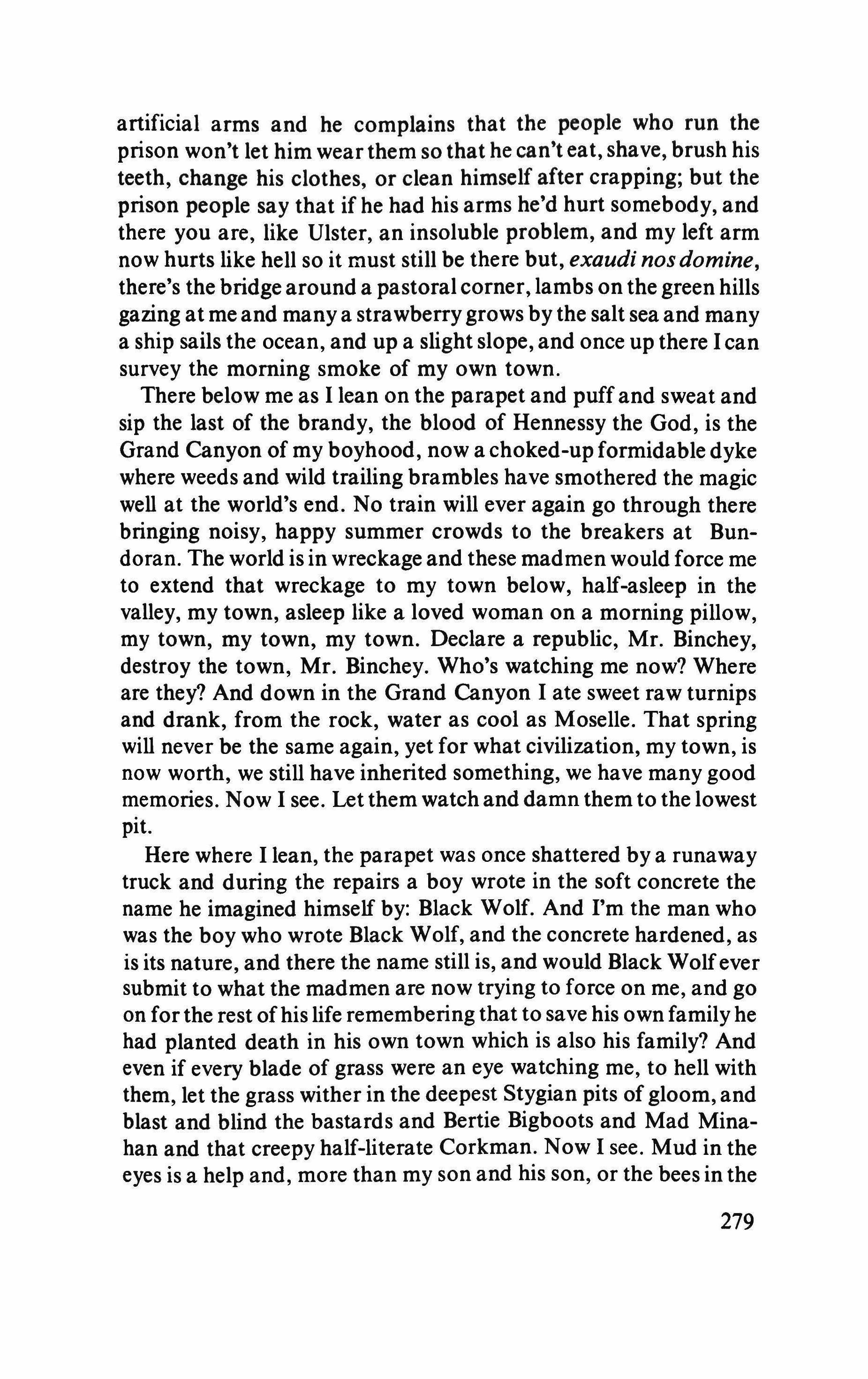
artificial arms and he complains that the people who run the prison won't let him wear them so that he can't eat, shave, brush his teeth, change his clothes, or clean himself after crapping; but the prison people say that if he had his arms he'd hurt somebody, and there you are, like Ulster, an insoluble problem, and my left arm now hurts like hell so it must still be there but, exaudi nos domine, there's the bridge around a pastoral corner, lambs on the green hills gazing at me and many a strawberrygrows by the salt sea and many a ship sails the ocean, and up a slight slope, and once up there I can survey the morning smoke of my own town.
There below me as I lean on the parapet and puff and sweat and sip the last of the brandy, the blood of Hennessy the God, is the Grand Canyon of my boyhood, now a choked-up formidable dyke where weeds and wild trailing brambles have smothered the magic well at the world's end. No train will ever again go through there bringing noisy, happy summer crowds to the breakers at Bundoran. The world is in wreckage and these madmen would force me to extend that wreckage to my town below, half-asleep in the valley, my town, asleep like a loved woman on a morning pillow, my town, my town, my town. Declare a republic, Mr. Binchey, destroy the town, Mr. Binchey. Who's watching me now? Where are they? And down in the Grand Canyon I ate sweet raw turnips and drank, from the rock, water as cool as Moselle. That spring will never be the same again, yet for what civilization, my town, is now worth, we still have inherited something, we have many good memories. Now I see. Let them watch and damn them to the lowest pit.
Here where I lean, the parapet was once shattered by a runaway truck and during the repairs a boy wrote in the soft concrete the name he imagined himself by: Black Wolf. And I'm the man who was the boy who wrote Black Wolf, and the concrete hardened, as is its nature, and there the name still is, and would Black Wolf ever submit to what the madmen are now trying to force on me, and go on forthe rest ofhis life remembering that to save his own family he had planted death in his own town which is also his family? And even if every blade of grass were an eye watching me, to hell with them, let the grass wither in the deepest Stygian pits of gloom, and blast and blind the bastards and Bertie Bigboots and Mad Minahan and that creepy half-literate Corkman. Now I see. Mud in the eyes is a help and, more than my son and his son, or the bees in the

pink oxalis, I see there my town and all its people, Orange and Green, and the post office with all its clerks and postmen and red mail vans, and the town hall and its glass dome and everybody in it-from that fine man, my friend, town clerk or mayor, for fortyodd years, down to the decent tobacco-chewing man who swabs out the publicjakes in the basement, my people, my people. Under that glass dome I played as a young man in amateur theatricals, the Coming of the Magi, the Plough and the Stars, the Shadow, God help us, of a Gunman, and the return of Professor Tim and the Monkey's Paw and the shop at Sly Corner and Look at the Heffernans, and all the talk and all the harmless posturing and laughter, my people. Hissing into a sock or something, Corkman couldn't know what a town is. Even byconsenting for a moment to drive this load ofdeath I've given these rotten bastards some sort of a devil's right over the lives of my people. What, after my death, will they say about me in the local papers, what would they remember: that I carried a bomb on a sunny Sunday to the town hall and the post office or to the door ofJudge Flynn, who's one of the best men in the north and who goes every day in danger;they've already murdered a good judge at his door in the morning and in the presence of his seven-year-old daughter, and now I see and there she is, the virgin, the sleepingbeauty inaccessible in a sleeping wood, and thorns and thorns around her and the cries ofnight? Did she stir in her sleep? Did her guts rumble? My left arm stings but it is alive again.
He places his left hand, palm flat, on the creamery can. He strokes her as if she were a cat. He recalls harmless tricks of boyhood: putting carbide in tins, boring holes in the tins, clamping down the lids, dripping water through the holes, listening for the hiss, putting matches to the holes, and delighting in the bangs and the soaring tins, or tossing squibs over the garden fences ofcrabbed old men. Down in the valley his town is at peace and blue peace is on the hills beyond. This may be farewell forever, the end ofmy illfated cruise on the treacherous waves of Lough Muck. He says to the can that, daughter of Satan, you'll never get to where you were sent. The beleaguered white house is far away in another world, her grave is very near. He closes the boot carelessly, turns the car sharply on the road, and drives back toward the nameless lake of the mad old women.

That pillar of smoke, of cloud, ahead of me cannot, surely to God, be still coming from the corpse of the Orange Hall. The smoke had died down before I left the place. Where does it come from? Up the steep hill and into the tunnel of tall beeches. Not yet russet enough to make the road seem warm. Up and down this hill, through this tunnel, walked so often that amazingfamily ofstrong, red-cheeked, flaxen-haired brothers and sisters, a dozen or more of them, clutching their Bibles and meditating, perhaps, on Lot's daughters and the night before. All gone now. Where to? Somewhere in England? Lost in the last war? Did they separate or stay together? House and place went to a stronger farmer who lives elsewhere. The house, a bam now like the barns behind it, and out of the tunnel and close to the hilltop and the Checkpoint Charley and, under God, it's the barns are on fire, not smoke only but fine dancing flames, another diversion, all the fun of the fair, to keep the army and police away from Binchey the Bomber! They'd burn all Ireland so I could plant one bomb to burn what was left and get the Brits on the run. Who'd want to stay? The Irish have to. Some of them.
Only two soldiers, lizards, at the checkpoint. One looking one way, one another, for the enemy, for firebugs, for the brigade if it ever gets here.
Careful and slow, the ramp might bust the virgin.
So he says to one soldier, and is amazed at the cold steadiness of his own voice, many an old woman walked along this road to a lonely end: There's a bomb in this car, I want to dump it in the bog beyond, proxopera, a proxy bomb.
The first soldier says: Puck.
Involuntarily goes back a step.
The second soldier says: Let me take the wheel, dad.
The first soldier says: I'll phone the squad. Is gone.
-The wheel, dad.
- Why should you? It isn't your town.
-Hurry, dad.
-They have my house and family. The white house by the lake.
-Dad.
-Follow me. Keep far away. He drives on. More rapidly. Fuck: to quote the first soldier.
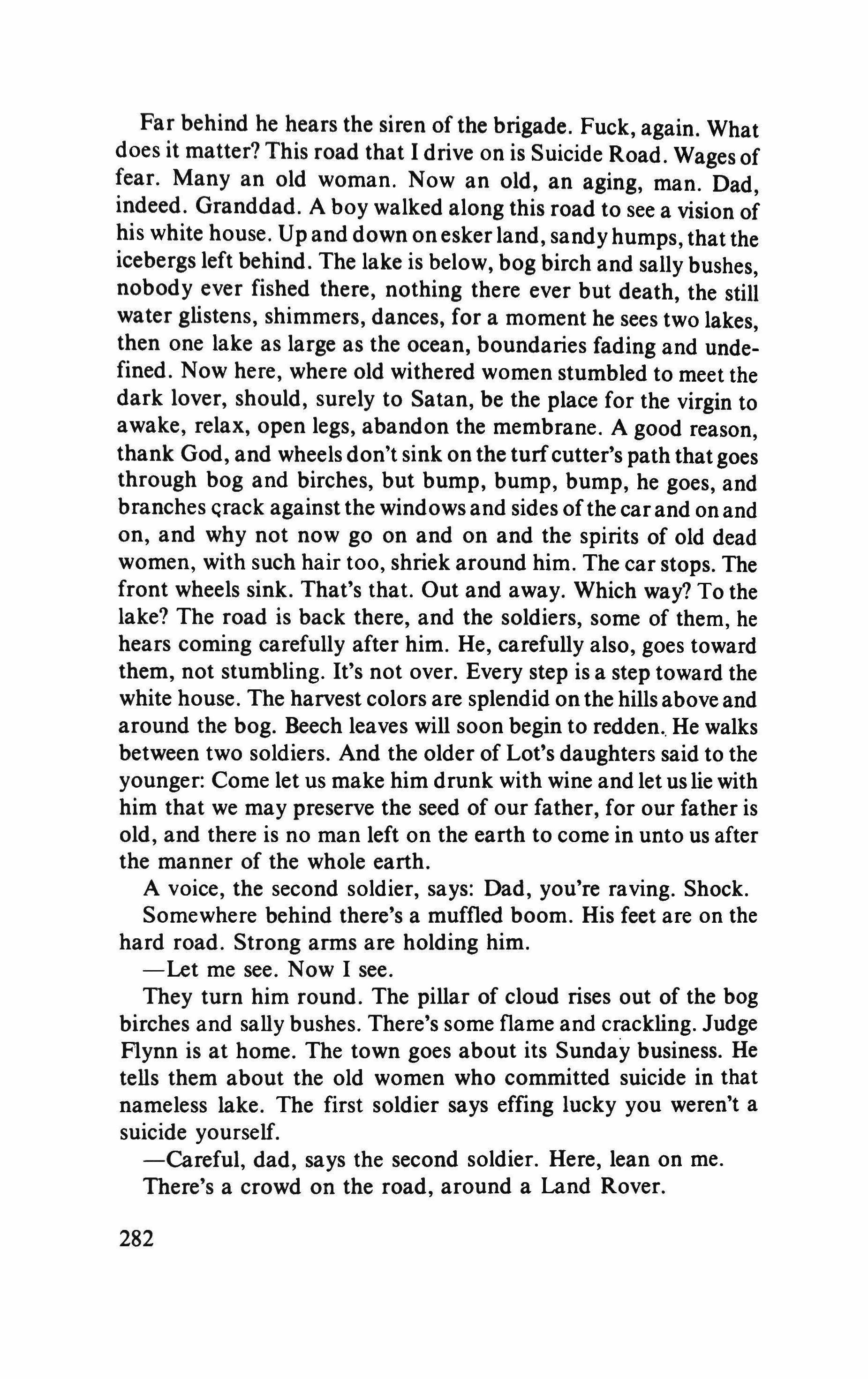
Far behind he hears the siren of the brigade. Fuck, again. What does it matter? This road that I drive on is Suicide Road. Wages of fear. Many an old woman. Now an old, an aging, man. Dad, indeed. Granddad. A boy walked along this road to see a vision of his white house. Up and down on esker land, sandyhumps, that the icebergs left behind. The lake is below, bog birch and sally bushes, nobody ever fished there, nothing there ever but death, the still water glistens, shimmers, dances, for a moment he sees two lakes, then one lake as large as the ocean, boundaries fading and undefined. Now here, where old withered women stumbled to meet the dark lover, should, surely to Satan, be the place for the virgin to awake, relax, open legs, abandon the membrane. A good reason, thank God, and wheels don't sink on the turfcutter's path that goes through bog and birches, but bump, bump, bump, he goes, and branches crack against the windows and sides ofthe car and on and on, and why not now go on and on and the spirits of old dead women, with such hair too, shriek around him. The car stops. The front wheels sink. That's that. Out and away. Which way? To the lake? The road is back there, and the soldiers, some of them, he hears coming carefully after him. He, carefully also, goes toward them, not stumbling. It's not over. Every step is a step toward the white house. The harvest colors are splendid on the hills above and around the bog. Beech leaves will soon begin to redden -, He walks between two soldiers. And the older of Lot's daughters said to the younger: Come let us make him drunk with wine and let us lie with him that we may preserve the seed of our father, for our father is old, and there is no man left on the earth to come in unto us after the manner of the whole earth.
A voice, the second soldier, says: Dad, you're raving. Shock. Somewhere behind there's a muffled boom. His feet are on the hard road. Strong arms are holding him.
-Let me see. Now I see.
They turn him round. The pillar of cloud rises out of the bog birches and sally bushes. There's some flame and crackling. Judge Flynn is at home. The town goes about its Sunday business. He tells them about the old women who committed suicide in that nameless lake. The first soldier says effing lucky you weren't a suicide yourself.
-Careful, dad, says the second soldier. Here, lean on me. There's a crowd on the road, around a Land Rover.
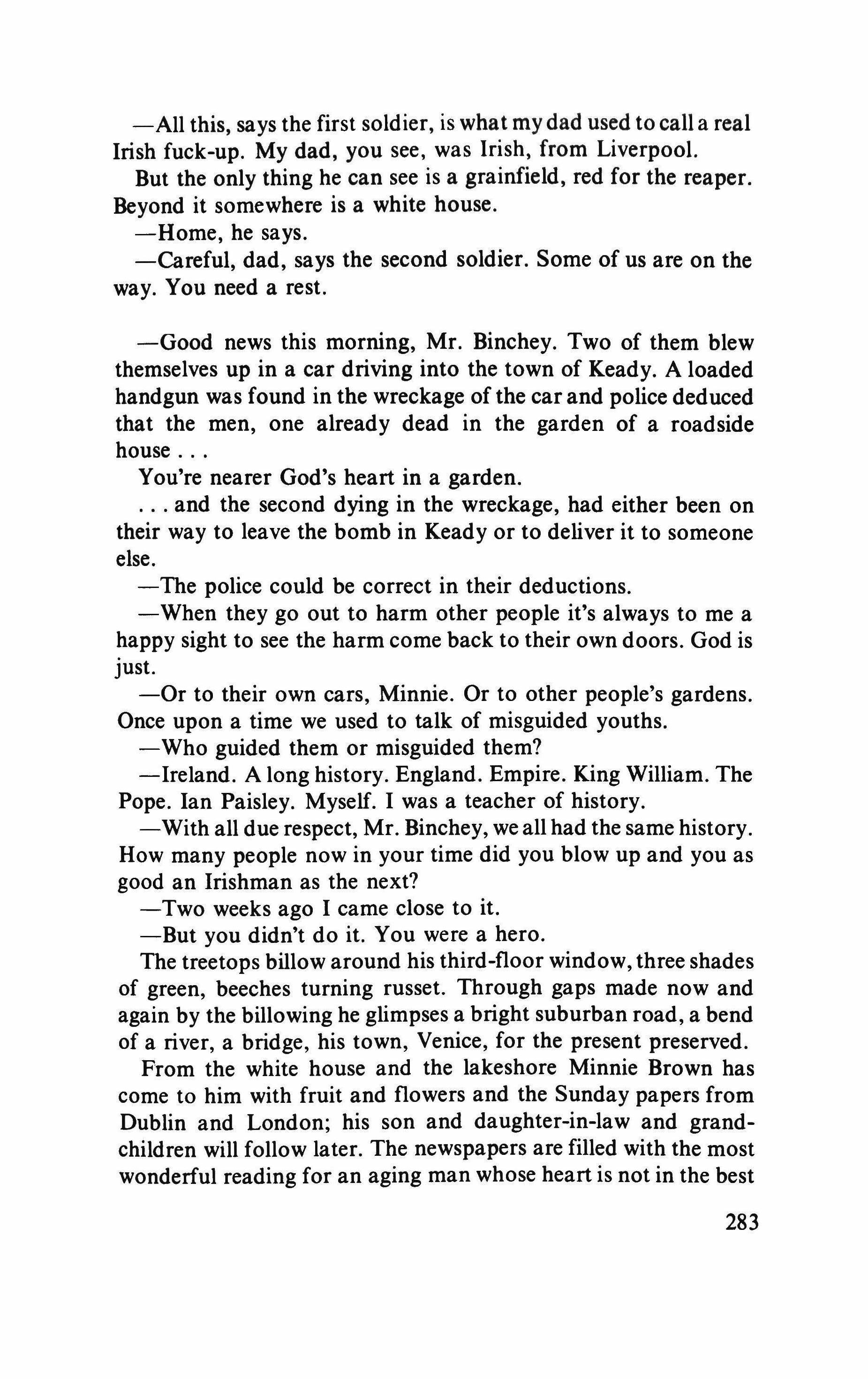
-All this, says the first soldier, is what mydad used to call a real Irish fuck-up. My dad, you see, was Irish, from Liverpool. But the only thing he can see is a grainfield, red for the reaper. Beyond it somewhere is a white house.
-Home, he says.
-Careful, dad, says the second soldier. Some of us are on the way. You need a rest.
-Good news this morning, Mr. Binchey. Two of them blew themselves up in a car driving into the town of Keady. A loaded handgun was found in the wreckage of the car and police deduced that the men, one already dead in the garden of a roadside house
You're nearer God's heart in a garden and the second dying in the wreckage, had either been on their way to leave the bomb in Keady or to deliver it to someone else.
- The police could be correct in their deductions.
-When they go out to harm other people it's always to me a happy sight to see the harm come back to their own doors. God is just.
-Or to their own cars, Minnie. Or to other people's gardens. Once upon a time we used to talk of misguided youths.
- Who guided them or misguided them?
-Ireland. A long history. England. Empire. King William. The Pope. Ian Paisley. Myself. I was a teacher of history.
-With all due respect, Mr. Binchey, we all had the same history. How many people now in your time did you blow up and you as good an Irishman as the next?
-Two weeks ago I came close to it.
-But you didn't do it. You were a hero.
The treetops billow around his third-floor window, three shades of green, beeches turning russet. Through gaps made now and again by the billowing he glimpses a bright suburban road, a bend of a river, a bridge, his town, Venice, for the present preserved.
From the white house and the lakeshore Minnie Brown has come to him with fruit and flowers and the Sunday papers from Dublin and London; his son and daughter-in-law and grandchildren will follow later. The newspapers are filled with the most wonderful reading for an aging man whose heart is not in the best
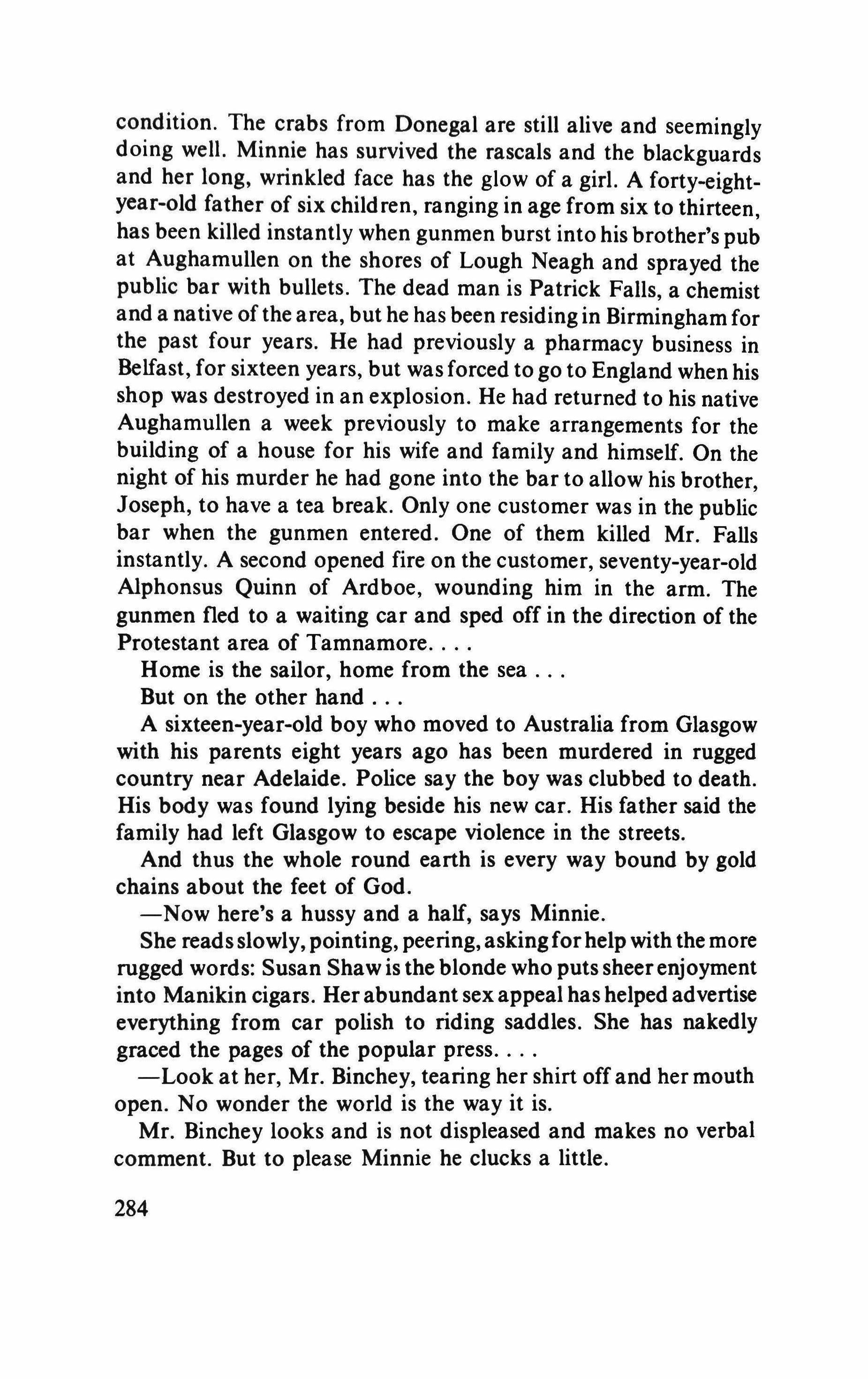
condition. The crabs from Donegal are still alive and seemingly doing well. Minnie has survived the rascals and the blackguards and her long, wrinkled face has the glow of a girl. A forty-eightyear-old father of six children, ranging in age from six to thirteen, has been killed instantly when gunmen burst into his brother's pub at Aughamullen on the shores of Lough Neagh and sprayed the public bar with bullets. The dead man is Patrick Falls, a chemist and a native of the area, but he has been residing in Birmingham for the past four years. He had previously a pharmacy business in Belfast, for sixteen years, but was forced to go to England when his shop was destroyed in an explosion. He had returned to his native Aughamullen a week previously to make arrangements for the building of a house for his wife and family and himself. On the night of his murder he had gone into the bar to allow his brother, Joseph, to have a tea break. Only one customer was in the public bar when the gunmen entered. One of them killed Mr. Falls instantly. A second opened fire on the customer, seventy-year-old Alphonsus Quinn of Ardboe, wounding him in the arm. The gunmen fled to a waiting car and sped off in the direction of the Protestant area of Tamnamore
Home is the sailor, home from the sea
But on the other hand
A sixteen-year-old boy who moved to Australia from Glasgow with his parents eight years ago has been murdered in rugged country near Adelaide. Police say the boy was clubbed to death. His body was found lying beside his new car. His father said the family had left Glasgow to escape violence in the streets.
And thus the whole round earth is every way bound by gold chains about the feet of God.
-Now here's a hussy and a half, says Minnie.
She readsslowly,pointing, peering,askingforhelp with the more rugged words: Susan Shaw is the blonde who puts sheerenjoyment into Manikin cigars. Her abundant sex appeal has helped advertise everything from car polish to riding saddles. She has nakedly graced the pages of the popular press
-Look at her, Mr. Binchey, tearing her shirt off and her mouth open. No wonder the world is the way it is.
Mr. Binchey looks and is not displeased and makes no verbal comment. But to please Minnie he clucks a little. 284

-She gets twelve pounds a picture with her clothes on and two hundred and fifty in her pelt. Mr. Binchey, did you ever?
-Never, says Mr. Binchey.
Surprisingly Minnie, who hasn't much respect for sex, laughs until the tears flow down the gullies of her cheeks.
-Well now, says Mr. Binchey. His father might have said: Boysaboys.
Or La dee da.
Or was La dee da only for politics and republics? He is tired, he cannot remember, the billowing movement ofthe treetops is lulling him asleep. But again to please Minnie he makes a heroic effort to keep awake and to listen to her and to go on reading the papers. He is after all a hero. Also he feels she is hidingsomething. Ifhe lets her talk she may betray herself.
-It says here, Mr. Binchey, that the I.R.A. blew up a young private soldier of the Ulster Defense Regiment as he was making a regular call on a sixty-eight-year-old housebound widow. He was off duty and on a tractor and going to chop wood, a daily task to help the aged widow. All U.D.R. men have been warned (Mr. Binchey has had to help her with some of the words) to exercise caution in carrying out spare-time errands of mercy to help the aged and infirm.
-It's in an English newspaper, Minnie.
-Still.
The gullies of her cheeks are again wet but not, this time, with laughter.
-For all those blackguards care, Mr. Binchey, all of us old people could starve or freeze in our houses. If we had a house left to starve in.
She has betrayed herself. He is wide awake. The treetops are still, or seem to be. The town below is still unviolated. The gun attack which killed three men in the Belfast pub owned by former Stormont minister Roy Bradford is believed to have been the work of a Republican group seeking vengeance for the bombing of the White Fort Inn in Andersonstown in which two men died and six were seriously injured. Come landlord fill the flowing bowl, and an Irishman's pub is no longer his castle: it was all so unexpected, in seconds men who had been enjoying themselves and watching athletics on the TV were slumped dead or wounded at the counter.
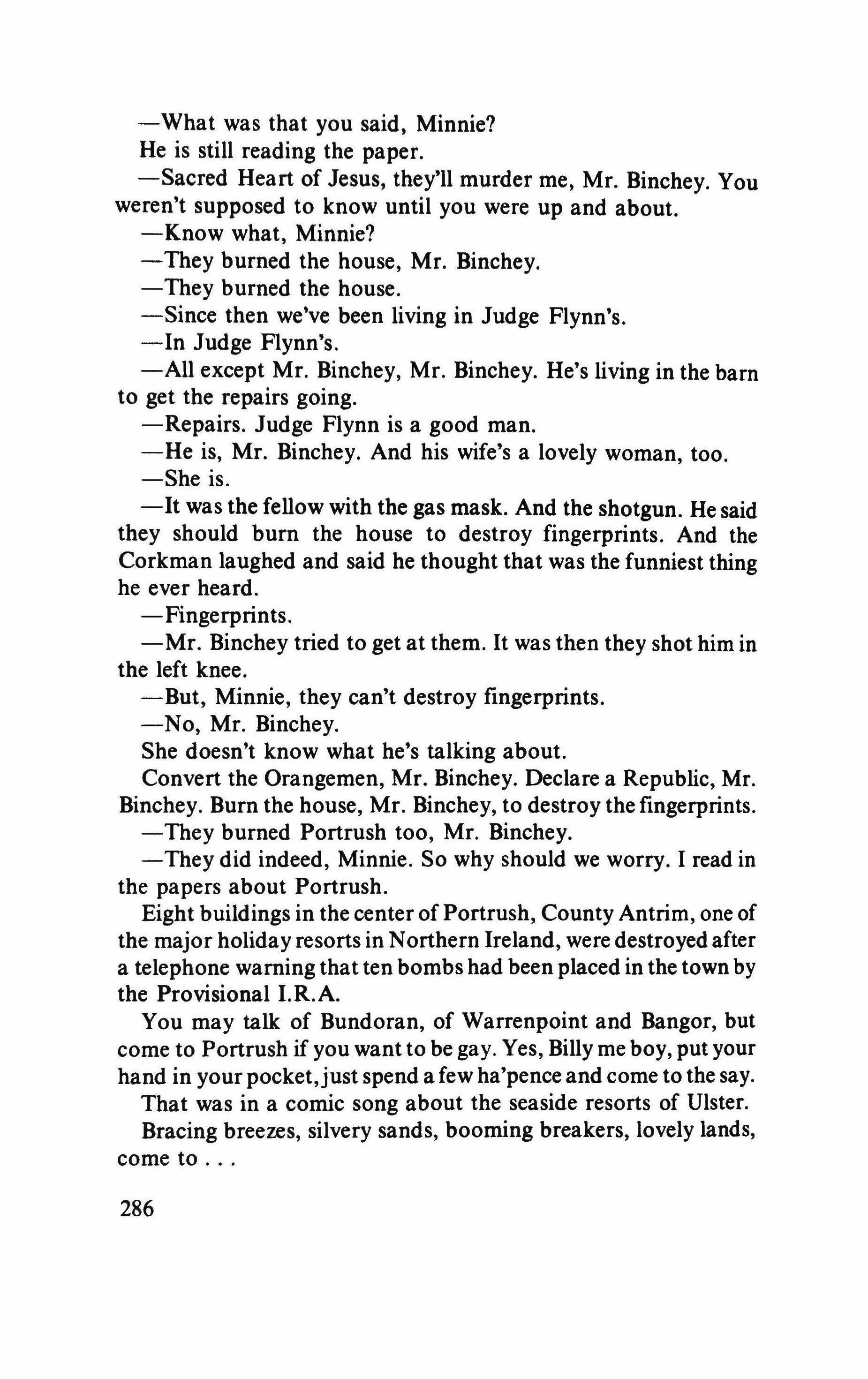
-What was that you said, Minnie? He is still reading the paper.
-Sacred Heart of Jesus, they'll murder me, Mr. Binchey. You weren't supposed to know until you were up and about.
-Know what, Minnie?
- They burned the house, Mr. Binchey.
- They burned the house.
-Since then we've been living in Judge Flynn's.
-In Judge Flynn's.
-All except Mr. Binchey, Mr. Binchey. He's living in the barn to get the repairs going.
-Repairs. Judge Flynn is a good man.
-He is, Mr. Binchey. And his wife's a lovely woman, too.
-She is.
- It was the fellow with the gas mask. And the shotgun. He said they should burn the house to destroy fingerprints. And the Corkman laughed and said he thought that was the funniest thing he ever heard.
-Fingerprints.
-Mr. Binchey tried to get at them. It was then they shot him in the left knee.
- But, Minnie, they can't destroy fingerprints.
-No, Mr. Binchey.
She doesn't know what he's talking about.
Convert the Orangemen, Mr. Binchey. Declare a Republic, Mr. Binchey. Burn the house, Mr. Binchey, to destroy the fingerprints.
- They burned Portrush too, Mr. Binchey.
- They did indeed, Minnie. So why should we worry. I read in the papers about Portrush.
Eight buildings in the center of Portrush, County Antrim, one of the major holiday resorts in Northern Ireland, were destroyed after a telephone warning that ten bombs had been placed in the town by the Provisional I.R.A.
You may talk of Bundoran, of Warrenpoint and Bangor, but come to Portrush if you want to be gay. Yes, Billy me boy, put your hand in your pocket,justspend a few ha'pence and come to the say.
That was in a comic song about the seaside resorts of Ulster.
Bracing breezes, silvery sands, booming breakers, lovely lands, come to
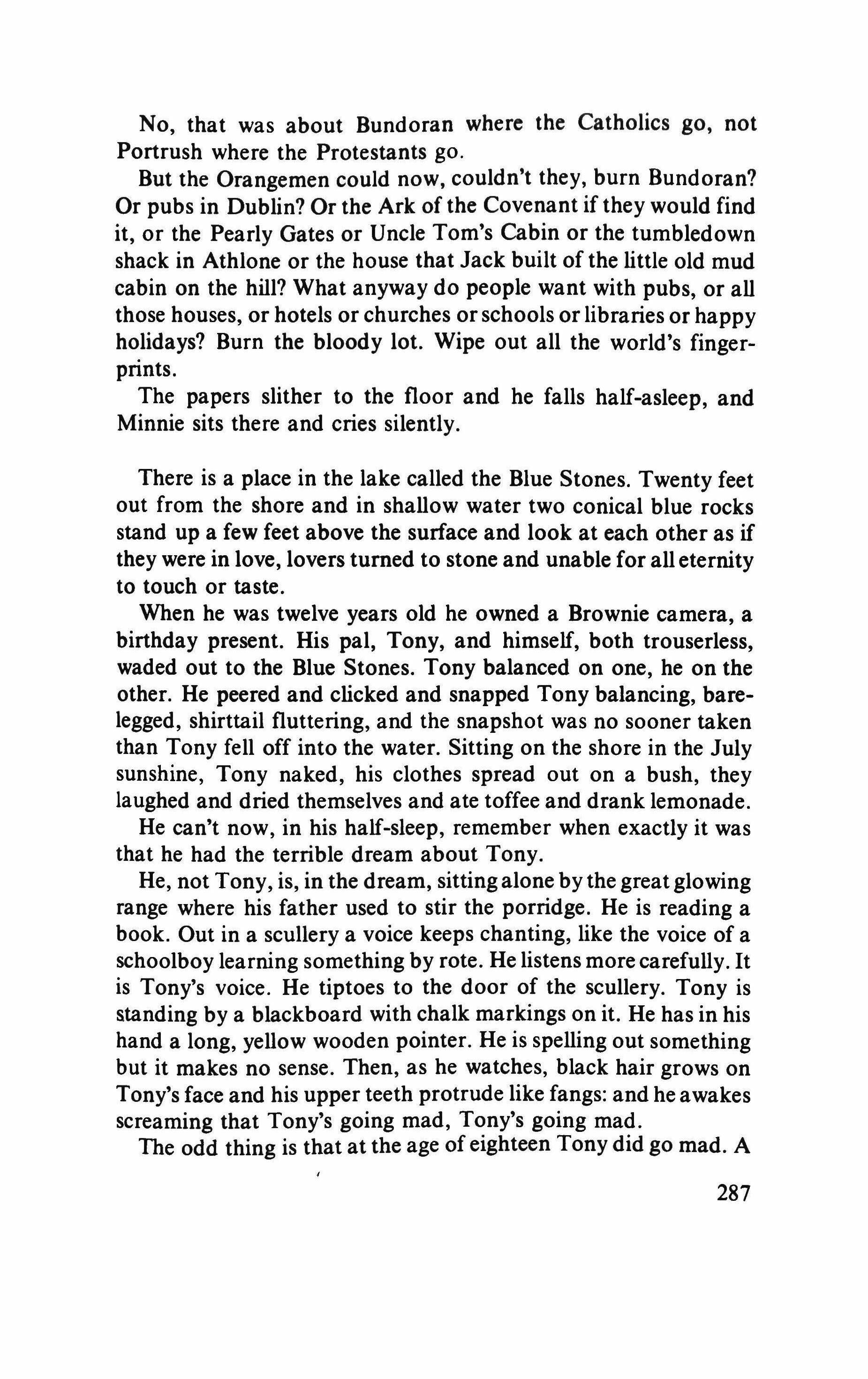
No, that was about Bundoran where the Catholics go, not Portrush where the Protestants go.
But the Orangemen could now, couldn't they, burn Bundoran? Or pubs in Dublin? Or the Ark of the Covenant if they would find it, or the Pearly Gates or Uncle Tom's Cabin or the tumbledown shack in Athlone or the house that Jack built of the little old mud cabin on the hill? What anyway do people want with pubs, or all those houses, or hotels or churches or schools or libraries or happy holidays? Burn the bloody lot. Wipe out all the world's fingerprints.
The papers slither to the floor and he falls half-asleep, and Minnie sits there and cries silently.
There is a place in the lake called the Blue Stones. Twenty feet out from the shore and in shallow water two conical blue rocks stand up a few feet above the surface and look at each other as if they were in love, lovers turned to stone and unable for all eternity to touch or taste.
When he was twelve years old he owned a Brownie camera, a birthday present. His pal, Tony, and himself, both trouserless, waded out to the Blue Stones. Tony balanced on one, he on the other. He peered and clicked and snapped Tony balancing, barelegged, shirttail fluttering, and the snapshot was no sooner taken than Tony fell off into the water. Sitting on the shore in the July sunshine, Tony naked, his clothes spread out on a bush, they laughed and dried themselves and ate toffee and drank lemonade.
He can't now, in his half-sleep, remember when exactly it was that he had the terrible dream about Tony.
He, not Tony, is, in the dream, sitting alone by the great glowing range where his father used to stir the porridge. He is reading a book. Out in a scullery a voice keeps chanting, like the voice of a schoolboy learning something by rote. He listens more carefully. It is Tony's voice. He tiptoes to the door of the scullery. Tony is standing by a blackboard with chalk markings on it. He has in his hand a long, yellow wooden pointer. He is spelling out something but it makes no sense. Then, as he watches, black hair grows on Tony's face and his upper teeth protrude like fangs: and he awakes screaming that Tony's going mad, Tony's going mad.
The odd thing is that at the age of eighteen Tony did go mad. A

premonition? Or was the dream before or after the event? Either way, that was the end of the laughter of the water and the Blue Stones. A dream, like the dream of the white house. Somewhere somewhere he still has that snapshot.
His eyes open again. Minnie has dried her tears. When I was a teacher, pinstripe and pince-nez, my jokes in class were well known, even became proverbial, so I may have given something to my town to be remembered as long as the last of my students live, then to be forgotten or attributed to someone else. Cathy comes in and runs to Minnie. At least my body will go intact to lie beside her, membrane by member, ghosts, to the final, far beyond this partial, day of doom. Gary comes in and runs to his grandfather's bedside. But by the living Jesus they should not have touched my house, my living dream seen across water and through tall reeds and beech trees, they should not, they should not have touched my living dream; Mad Minahan, Bertie Bigfeet, Creepy Corkman whoever you are, I will see you all in hell. His son comes in hobbling on a half-crutch. Followed by his wife, as rich a red wine as ever, carrying parcels and grandfather's clothes.
- Minnie, Minnie Brown, Cathy sings, we're home again from Dungloe town.
The crabs are dead within the last hour. The oxalis is past its best. The house is burned. There is no laughter around the Blue Stones. The lake will never be the same again. Tony the madman roars through his dreams. Oh, the sights that we see as we wait here for death on the treacherous waves.
-But not destroyed, his son says.
More than my town, more than my family, my dream of a white house.
-They did their worst, his son says. But they should have brought a professional pyromaniac with them. We kept it out of the papers.
-You could have told me.
By the living Jesus they should not have tampered with my dream.
- You had enough to recover from. We thought it better. Minnie and his daughter-in-law and the children are by the window laughing at the antics of a crew of magpies in the swaying treetops. The town, still undisturbed, is far below. His son gathers

the newspapers from the carpet, stooping and rising again with some difficulty. He says: You knew them.
-Two of them. That'll do to begin with.
-I felt you might know them.
-Oh, I've been watching people in this town for a long time. Their faces. Their families. The books they read. Even their feet. If you looked at little else but the way people walk you could write a history of a place. Boots, boots, boots marching up and down again. Kipling, you know.
Patiently his son says: 1 know.
And through a gap in the reeds he looks, as he waits for the perch, across the water at the white house. Reeds make one frame for the picture. Beech trees, set back from the avenue that leads up to the house, make another. He envies the people who own it, the lawn and the flower beds before it, the barns and varied outbuildings behind it. He has missed a strike. Tony is laughing. And the most beautiful thing of all, cutting across a corner of the lawn, a small brook tumbling down to join the lake. To have your own stream on your own lawn is the height of everything.
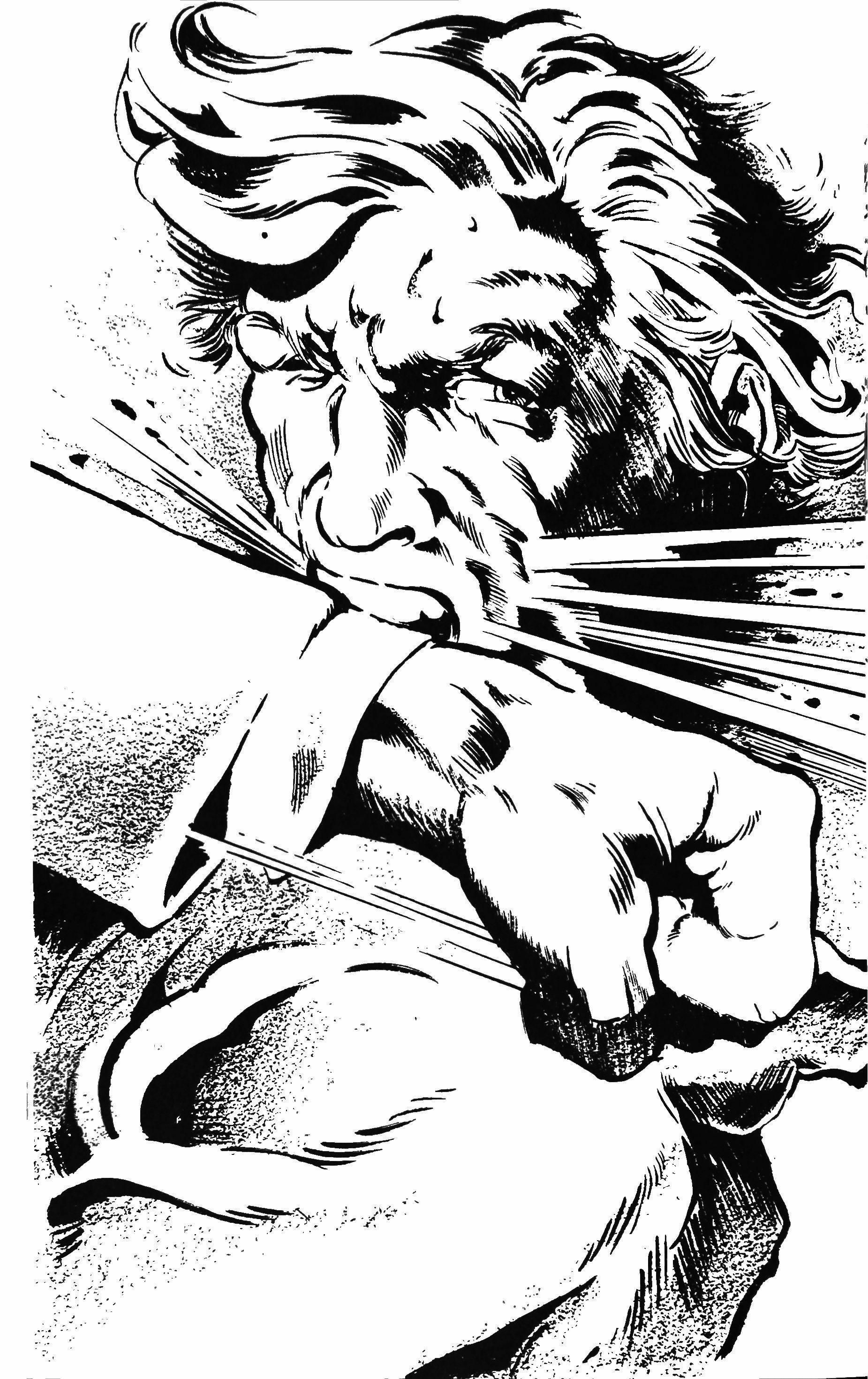
Safety
John Jacob
Jones peered through the leaden door of the apartment building, east, at the sun beginning to rise behind the Sears Tower. Clouds scattered through the air to the north, but today even the tower's tip was visible, a needle spraying the gray sky with flecks of blue. The look was justified. The day would begin as usual. He shoved the door open, swung it freely behind him, took the three steps down, and began his two-mile run up Central Avenue south, toward the Eisenhower Expressway.
The early heat on the concrete reflected an image of Jones just beyond every bouncingstep. The liquor store on the corner at Madison broke the image down, cutting it like a hand through a window. He was tall, about 6'2:',
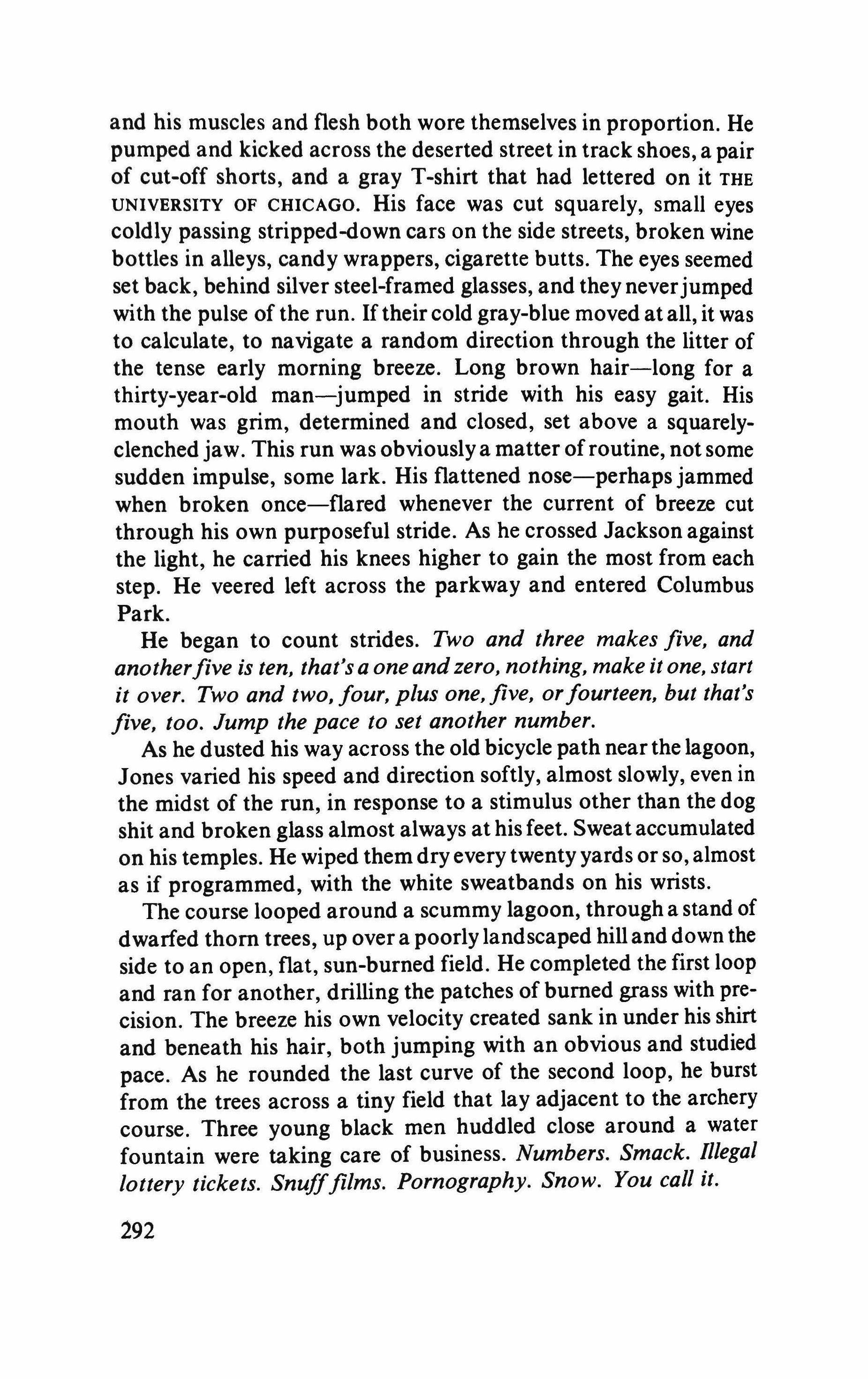
and his muscles and flesh both wore themselves in proportion. He pumped and kicked across the deserted street in track shoes, a pair of cut-off shorts, and a gray T-shirt that had lettered on it THE UNIVERSITY OF CHICAGO. His face was cut squarely, small eyes coldly passing stripped-down cars on the side streets, broken wine bottles in alleys, candy wrappers, cigarette butts. The eyes seemed set back, behind silver steel-framed glasses, and they neverjumped with the pulse of the run. Iftheir cold gray-blue moved at all, it was to calculate, to navigate a random direction through the litter of the tense early morning breeze. Long brown hair-long for a thirty-year-old man-jumped in stride with his easy gait. His mouth was grim, determined and closed, set above a squarelyclenched jaw. This run was obviously a matter ofroutine, not some sudden impulse, some lark. His flattened nose-perhapsjammed when broken once-flared whenever the current of breeze cut through his own purposeful stride. As he crossed Jackson against the light, he carried his knees higher to gain the most from each step. He veered left across the parkway and entered Columbus Park.
He began to count strides. Two and three makes five, and anotherfive is ten, that's a one and zero, nothing, make it one, start it over. Two and two, four, plus one, five, orfourteen, but that's five, too. Jump the pace to set another number.
As he dusted his way across the old bicycle path near the lagoon, Jones varied his speed and direction softly, almost slowly, even in the midst of the run, in response to a stimulus other than the dog shit and broken glass almost always at his feet. Sweat accumulated on his temples. He wiped them dry every twentyyards or so, almost as if programmed, with the white sweatbands on his wrists.
The course looped around a scummy lagoon, through a stand of dwarfed thorn trees, up over a poorlylandscaped hilland down the side to an open, flat, sun-burned field. He completed the first loop and ran for another, drilling the patches of burned grass with precision. The breeze his own velocity created sank in under his shirt and beneath his hair, both jumping with an obvious and studied pace. As he rounded the last curve of the second loop, he burst from the trees across a tiny field that lay adjacent to the archery course. Three young black men huddled close around a water fountain were taking care of business. Numbers. Smack. Illegal lottery tickets. Snufffilms. Pornography. Snow. You call it.
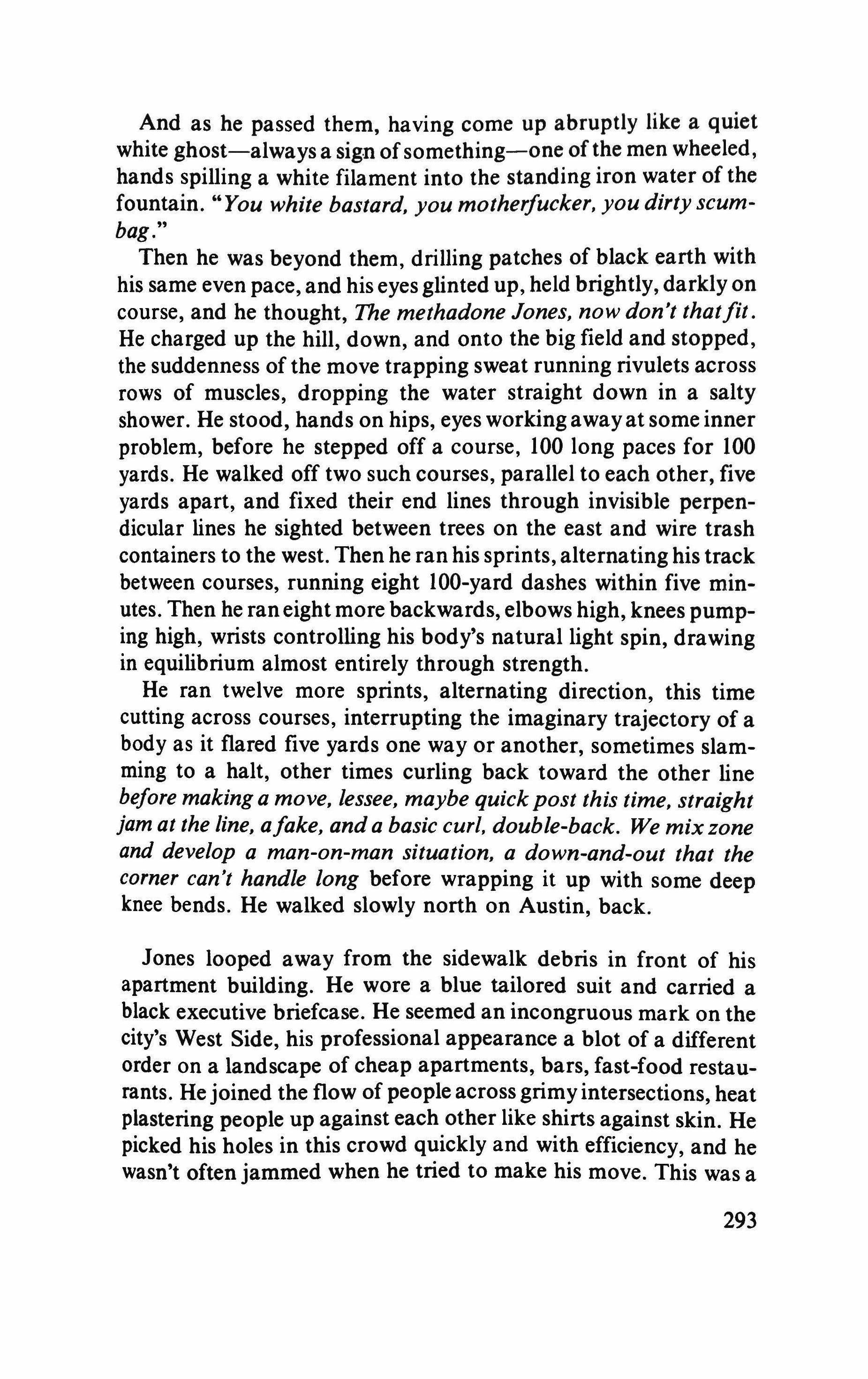
And as he passed them, having come up abruptly like a quiet white ghost-always a sign ofsomething-one ofthe men wheeled, hands spilling a white filament into the standing iron water of the fountain. "You white bastard. you motherfucker, you dirty scumbag."
Then he was beyond them, drilling patches of black earth with his same even pace, and his eyes glinted up, held brightly, darkly on course, and he thought, The methadone Jones. now don't that/it. He charged up the hill, down, and onto the big field and stopped, the suddenness of the move trapping sweat running rivulets across rows of muscles, dropping the water straight down in a salty shower. He stood, hands on hips, eyes working away at some inner problem, before he stepped off a course, 100 long paces for 100 yards. He walked off two such courses, parallel to each other, five yards apart, and fixed their end lines through invisible perpendicular lines he sighted between trees on the east and wire trash containers to the west. Then he ran his sprints, alternating his track between courses, running eight 100-yard dashes within five minutes. Then he ran eight more backwards, elbows high, knees pumping high, wrists controlling his body's natural light spin, drawing in equilibrium almost entirely through strength.
He ran twelve more sprints, alternating direction, this time cutting across courses, interrupting the imaginary trajectory of a body as it flared five yards one way or another, sometimes slamming to a halt, other times curling back toward the other line before making a move, lessee, maybe quickpost this time, straight jam at the line, afake, and a basic curl, double-back. We mix zone and develop a man-on-man situation, a down-and-out that the corner can't handle long before wrapping it up with some deep knee bends. He walked slowly north on Austin, back.
Jones looped away from the sidewalk debris in front of his apartment building. He wore a blue tailored suit and carried a black executive briefcase. He seemed an incongruous mark on the city's West Side, his professional appearance a blot of a different order on a landscape of cheap apartments, bars, fast-food restaurants. He joined the flow of people across grimyintersections, heat plastering people up against each other like shirts against skin. He picked his holes in this crowd quickly and with efficiency, and he wasn't often jammed when he tried to make his move. This was a
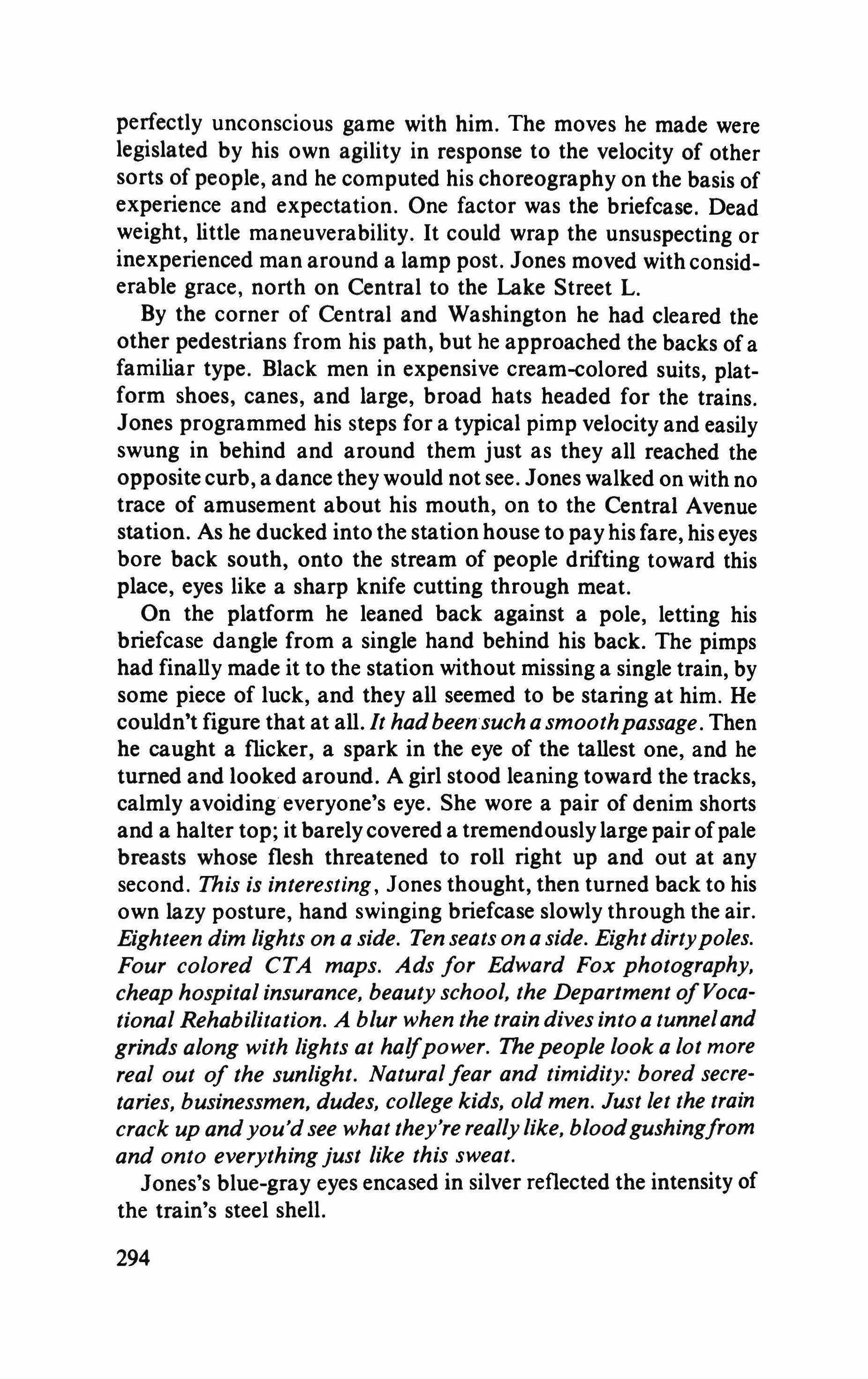
perfectly unconscious game with him. The moves he made were legislated by his own agility in response to the velocity of other sorts of people, and he computed his choreography on the basis of experience and expectation. One factor was the briefcase. Dead weight, little maneuverability. It could wrap the unsuspecting or inexperienced man around a lamp post. Jones moved withconsiderable grace, north on Central to the Lake Street L.
By the corner of Central and Washington he had cleared the other pedestrians from his path, but he approached the backs of a familiar type. Black men in expensive cream-colored suits, platform shoes, canes, and large, broad hats headed for the trains. Jones programmed his steps for a typical pimp velocity and easily swung in behind and around them just as they all reached the opposite curb, a dance they would not see. Jones walked on with no trace of amusement about his mouth, on to the Central Avenue station. As he ducked into the station house to pay his fare, his eyes bore back south, onto the stream of people drifting toward this place, eyes like a sharp knife cutting through meat.
On the platform he leaned back against a pole, letting his briefcase dangle from a single hand behind his back. The pimps had finally made it to the station without missing a single train, by some piece of luck, and they all seemed to be staring at him. He couldn't figure that at all. It hadbeensuch a smoothpassage. Then he caught a flicker, a spark in the eye of the tallest one, and he turned and looked around. A girl stood leaning toward the tracks, calmly avoiding everyone's eye. She wore a pair of denim shorts and a halter top; it barelycovered a tremendouslylarge pair ofpale breasts whose flesh threatened to roll right up and out at any second. This is interesting, Jones thought, then turned back to his own lazy posture, hand swinging briefcase slowly through the air. Eighteen dim lights on a side. Ten seats on a side. Eightdirtypoles. Four colored CTA maps. Ads for Edward Fox photography, cheap hospital insurance, beauty school, the Department ofVocational Rehabilitation. A blur when the train dives into a tunneland grinds along with lights at halfpower. Thepeople look a lot more real out of the sunlight. Naturalfear and timidity: bored secretaries, businessmen, dudes, college kids, old men. Just let the train crack up andyou'd see what they'rereallylike, bloodgushingfrom and onto everythingjust like this sweat.
Jones's blue-gray eyes encased in silver reflected the intensity of the train's steel shell.
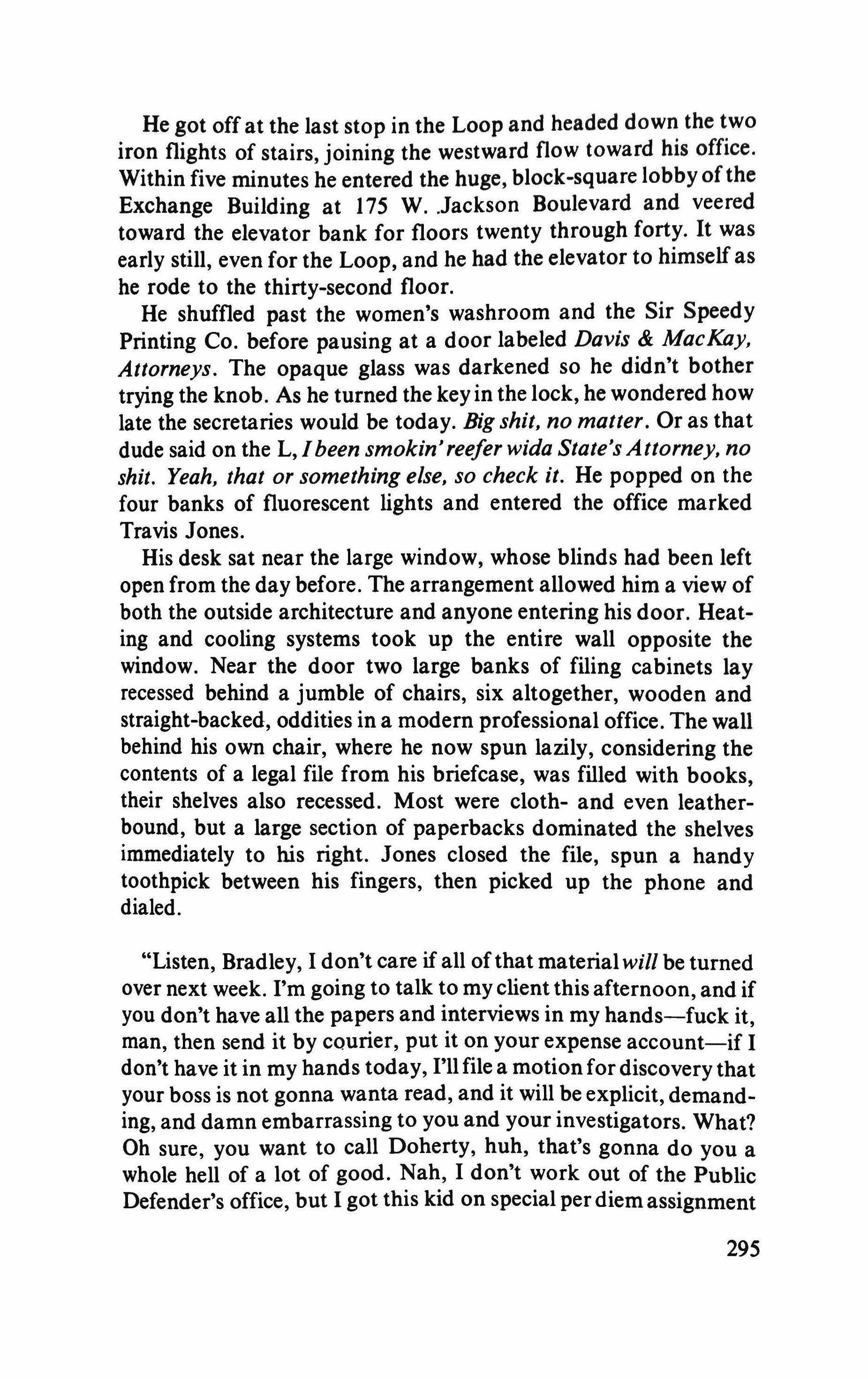
He got off at the last stop in the Loop and headed down the two iron flights of stairs, joining the westward flow toward his office. Within five minutes he entered the huge, block-square lobby ofthe Exchange Building at 175 W. Jackson Boulevard and veered toward the elevator bank for floors twenty through forty. It was early still, even for the Loop, and he had the elevator to himself as he rode to the thirty-second floor.
He shuffled past the women's washroom and the Sir Speedy Printing Co. before pausing at a door labeled Davis & MacKay, Attorneys. The opaque glass was darkened so he didn't bother trying the knob. As he turned the key in the lock, he wondered how late the secretaries would be today. Big shit, no matter. Or as that dude said on the L, Ibeen smokin'reefer wida State's Attorney, no shit. Yeah, that or something else, so check it. He popped on the four banks of fluorescent lights and entered the office marked Travis Jones.
His desk sat near the large window, whose blinds had been left open from the day before. The arrangement allowed him a view of both the outside architecture and anyone entering his door. Heating and cooling systems took up the entire wall opposite the window. Near the door two large banks of filing cabinets lay recessed behind a jumble of chairs, six altogether, wooden and straight-backed, oddities in a modern professional office. The wall behind his own chair, where he now spun lazily, considering the contents of a legal file from his briefcase, was filled with books, their shelves also recessed. Most were cloth- and even leatherbound, but a large section of paperbacks dominated the shelves immediately to his right. Jones closed the file, spun a handy toothpick between his fingers, then picked up the phone and dialed.
"Listen, Bradley, I don't care if all ofthat materialwill be turned over next week. I'm going to talk to my client this afternoon, and if you don't have all the papers and interviews in my hands-fuck it, man, then send it by courier, put it on your expense account-if I don't have it in my hands today, I'll file a motion for discovery that your boss is not gonna wanta read, and it will be explicit, demanding, and damn embarrassing to you and your investigators. What? Oh sure, you want to call Doherty, huh, that's gonna do you a whole hell of a lot of good. Nah, I don't work out of the Public Defender's office, but I got this kid on special per diemassignment

from that office, and that's just your tough beans. They'refarming out cases to cut into the docket and they're paying per kid per day to convince the judges to bring these cases to trial. And if you try to continue this case again," he broke the toothpick into quarters, "you'll be back in Women's Court watchin' the hookers you charge flounce out on bond ten minutes later. Yeah. Yeah. Good enough. I'll want to study it at home tonight. Yeah. Yeah. No sweat, Bradley, I just gotta stay on your case. See you Thursday."
He swiveled his chair to the window, listening as the city's sounds increased in volume and density, working an eye like the flutter of cloth in a breeze, an open shutter, picking up on his interview two days ago.
The Arthur J. Audy Juvenile Home for Children sits like a dead bug on the corner of Roosevelt and Ogden. The area is a no-man's land of contrasts, the police and the "victims ofcrime" establishing a line of turf out on Hamilton near the coffee truck, the kids accused of those crimes resentfully smoking across the street. Two major city social work complexes repose only two blocks away, ringed by twelve-foot fences, grass, and other rare commodities. Their architecture reflects the only recent attempts at renewal for blocks around. Across the street from the Edwards Shelter,former emergency placement for runaways, on Roosevelt, are four or five bars. Jones had heard a young social worker describe the time he had on a whim gone into one for lunch. He was digging into a greasy cheeseburger when the man next to him yanked a woman's severed head from a paper bag and propped its bloody stump on the bar next to his 50¢ for a Schlitz.
No one reallylives in the area. While waiting for the Damen bus, Jones had seen fugitive figures dart from room to room in the upper-floor windows above the bars and taco stands. They were physically there, but they were as much a part of the landscape as an old bus transfer blowing down the street.
He had entered through the unused west doors to avoid the rush of people near the entrance on the east end. The Juvenile Court, oldest and largest in the world, occupies the entire first floor ofthe flat, colorless building. Jones passed a knot of people spitting at each other in street Spanish on his way up the stairs to the Audy Home concourse, flashed his ID to a matron on duty, and signed in the central log.

"Your name is Wilfredo Velasquez, a.k.a. Thomas Quezco? O.K. I'm a lawyer for a friend of yours, Louis Imerio. Right? You know him?"
"Yeah I know him. He lives behind me in the project."
"O.K. I don't have much time, Wilfredo-" "Tommy."
"Alright. Tommy. I don't have much time, but I want to explain some things and I want you to tell me if there's anything you don't understand. O.K.?"
"Yeah, sure."
"Now Tommy, you can have a PD present if you want. Do you understand that? If you want a lawyer, they'll send one up."
"No, man, I don't need no PD."
"O.K. Now I'm going to talk about the afternoon of Sunday, April 23, 1976. I'm not gonna get into a lot of basic questions like some other people have. I'm going to read from parts of the police report and investigation and ask you some questions, just a few questions. O.K. so far?"
A nod, scuffling of cleated boots on the green linoleum floor.
"The report says that on or around 4: 15 you, Louis Imerio, and a boy named Kenny Gomez were playing near the lagoon in the park near the project. It goes on to say that the three of you got into an argument, that you and your friend Imerio pushed Kenny Gomez into the lagoon. That you both took off your belts and started to beat him, as a joke at first, that's what you said later-" (Jones stared through the gray translucent window and could not detect sky, clouds, trees, anything real with color)-"as a joke, that Gomez went down and that the two of you kicked him repeatedly in the face with cleated boots"-Quezco bent his knees and scuffled his boots out of sight under his plastic chair-"boots that revealed traces of A-type blood, which was the type of Kenny Gomezbut of neither you nor Louis Imerio"-Jones continued straight through the report, one brow arched against the fine xeroxed print, an index finger crooking the air absent as a breeze in trees-"until he, Kenny Gomez, went under the water, whereupon one ofthe two juvenile respondents-at that time the designation for you and Louis both-held Gomez under the water by means of a boot on the top of his head for five to ten minutes. Attached to the report are statements of witnesses, your own confessions, which are automaticallycontested, and lab reports from the county coroner."
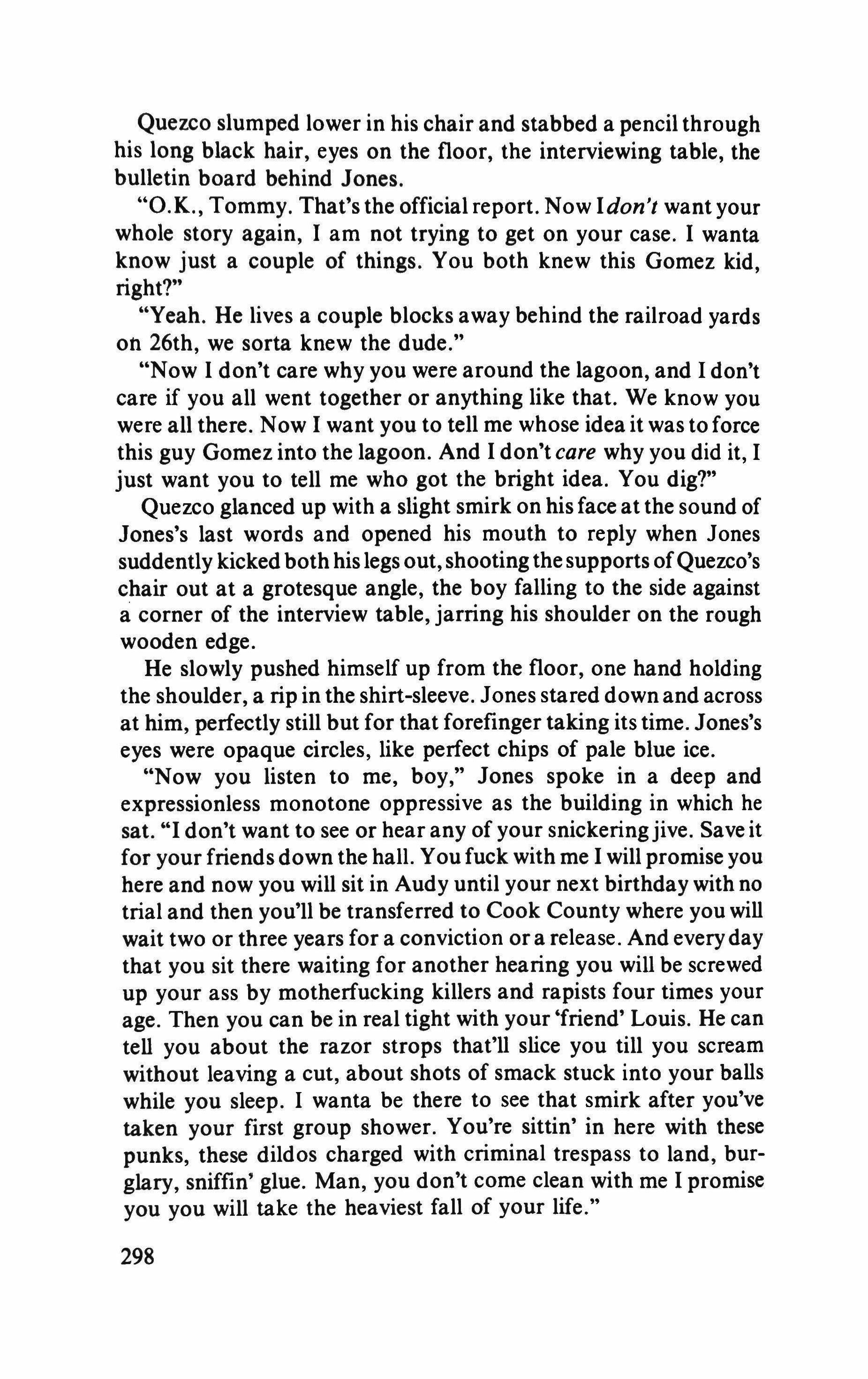
Quezco slumped lower in his chair and stabbed a pencil through his long black hair, eyes on the floor, the interviewing table, the bulletin board behind Jones.
"O.K., Tommy. That's the official report. Now 1don't want your whole story again, 1 am not trying to get on your case. 1 wanta know just a couple of things. You both knew this Gomez kid, right?"
"Yeah. He lives a couple blocks away behind the railroad yards on 26th, we sorta knew the dude."
"Now I don't care why you were around the lagoon, and 1 don't care if you all went together or anything like that. We know you were all there. Now 1 want you to tell me whose idea it was to force this guy Gomez into the lagoon. And 1 don't care why you did it, 1 just want you to tell me who got the bright idea. You dig?"
Quezco glanced up with a slight smirk on his face at the sound of Jones's last words and opened his mouth to reply when Jones suddently kicked both his legs out, shooting the supports ofQuezco's chair out at a grotesque angle, the boy falling to the side against a corner of the interview table, jarring his shoulder on the rough wooden edge.
He slowly pushed himself up from the floor, one hand holding the shoulder, a rip in the shirt-sleeve. Jones stared down and across at him, perfectly still but for that forefingertaking its time. Jones's eyes were opaque circles, like perfect chips of pale blue ice.
"Now you listen to me, boy," Jones spoke in a deep and expressionless monotone oppressive as the building in which he sat. "I don't want to see or hear any of your snickeringjive. Save it for your friends down the hall. You fuck with me 1 will promise you here and now you will sit in Audy until your next birthday with no trial and then you'll be transferred to Cook County where you will wait two or three years for a conviction or a release. And everyday that you sit there waiting for another hearing you will be screwed up your ass by motherfucking killers and rapists four times your age. Then you can be in real tight with your 'friend' Louis. He can tell you about the razor strops that'll slice you till you scream without leaving a cut, about shots of smack stuck into your balls while you sleep. 1 wanta be there to see that smirk after you've taken your first group shower. You're sittin' in here with these punks, these dildos charged with criminal trespass to land, burglary, sniffin' glue. Man, you don't come clean with me 1 promise you you will take the heaviest fall of your life."
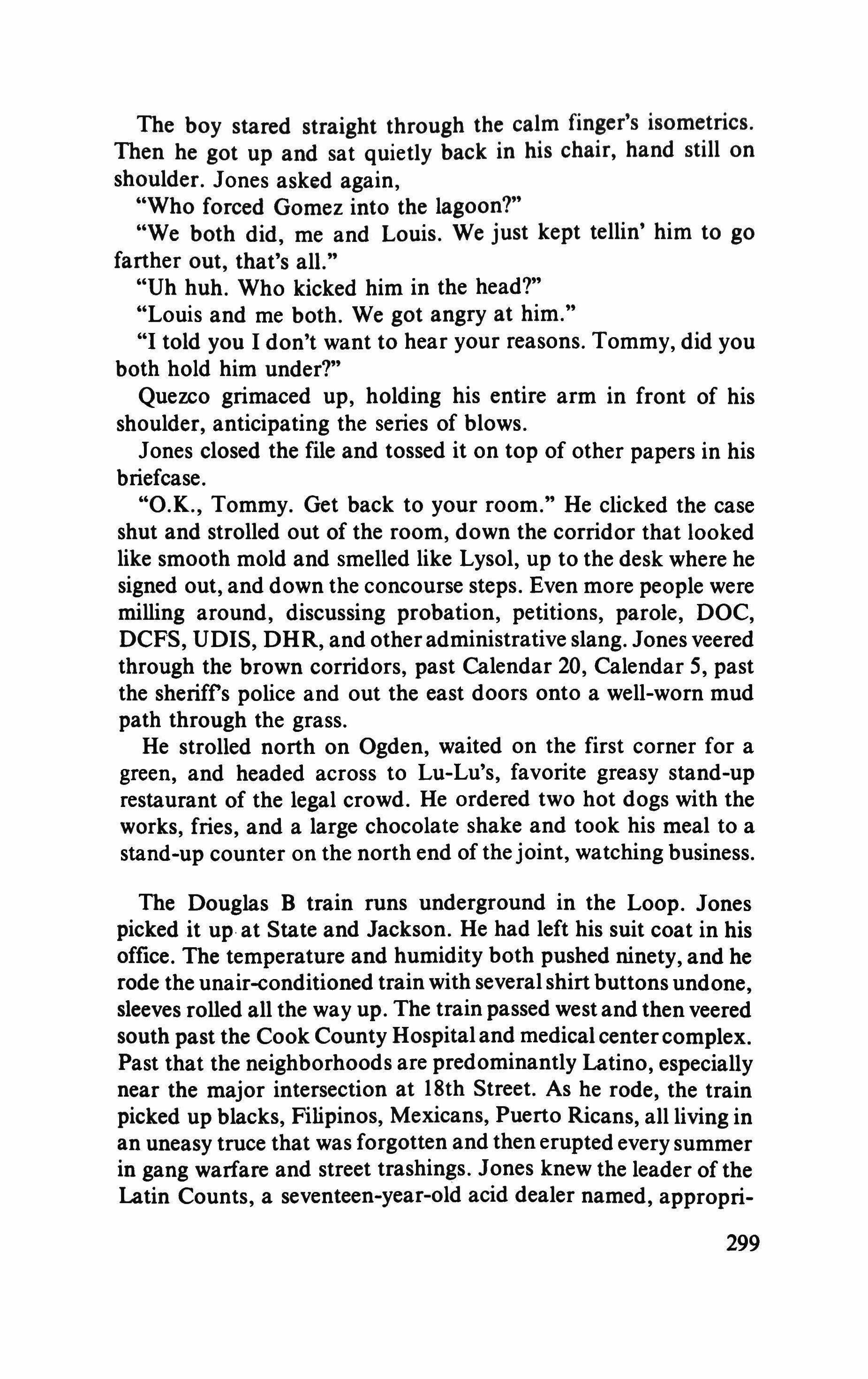
The boy stared straight through the calm finger's isometrics. Then he got up and sat quietly back in his chair, hand still on shoulder. Jones asked again,
"Who forced Gomez into the lagoon?"
"We both did, me and Louis. We just kept tellin' him to go farther out, that's all."
"Uh huh. Who kicked him in the head?"
"Louis and me both. We got angry at him."
"I told you 1 don't want to hear your reasons. Tommy, did you both hold him under?"
Quezco grimaced up, holding his entire arm in front of his shoulder, anticipating the series of blows.
Jones closed the file and tossed it on top of other papers in his briefcase.
"O.K., Tommy. Get back to your room." He clicked the case shut and strolled out of the room, down the corridor that looked like smooth mold and smelled like Lysol, up to the desk where he signed out, and down the concourse steps. Even more people were milling around, discussing probation, petitions, parole, DOC, DCFS, UDIS, DHR, and other administrative slang. Jones veered through the brown corridors, past Calendar 20, Calendar S, past the sheriff's police and out the east doors onto a well-worn mud path through the grass.
He strolled north on Ogden, waited on the first corner for a green, and headed across to Lu-Lu's, favorite greasy stand-up restaurant of the legal crowd. He ordered two hot dogs with the works, fries, and a large chocolate shake and took his meal to a stand-up counter on the north end of thejoint, watching business.
The Douglas B train runs underground in the Loop. Jones picked it up at State and Jackson. He had left his suit coat in his office. The temperature and humidity both pushed ninety, and he rode the unair-conditioned train with several shirt buttons undone, sleeves rolled all the way up. The train passed west and then veered south past the Cook County Hospitaland medical center complex. Past that the neighborhoods are predominantly Latino, especially near the major intersection at 18th Street. As he rode, the train picked up blacks, Filipinos, Mexicans, Puerto Ricans, all living in an uneasy truce that was forgotten and then erupted every summer in gang warfare and street trashings. Jones knew the leader of the Latin Counts, a seventeen-year-old acid dealer named, appropri-
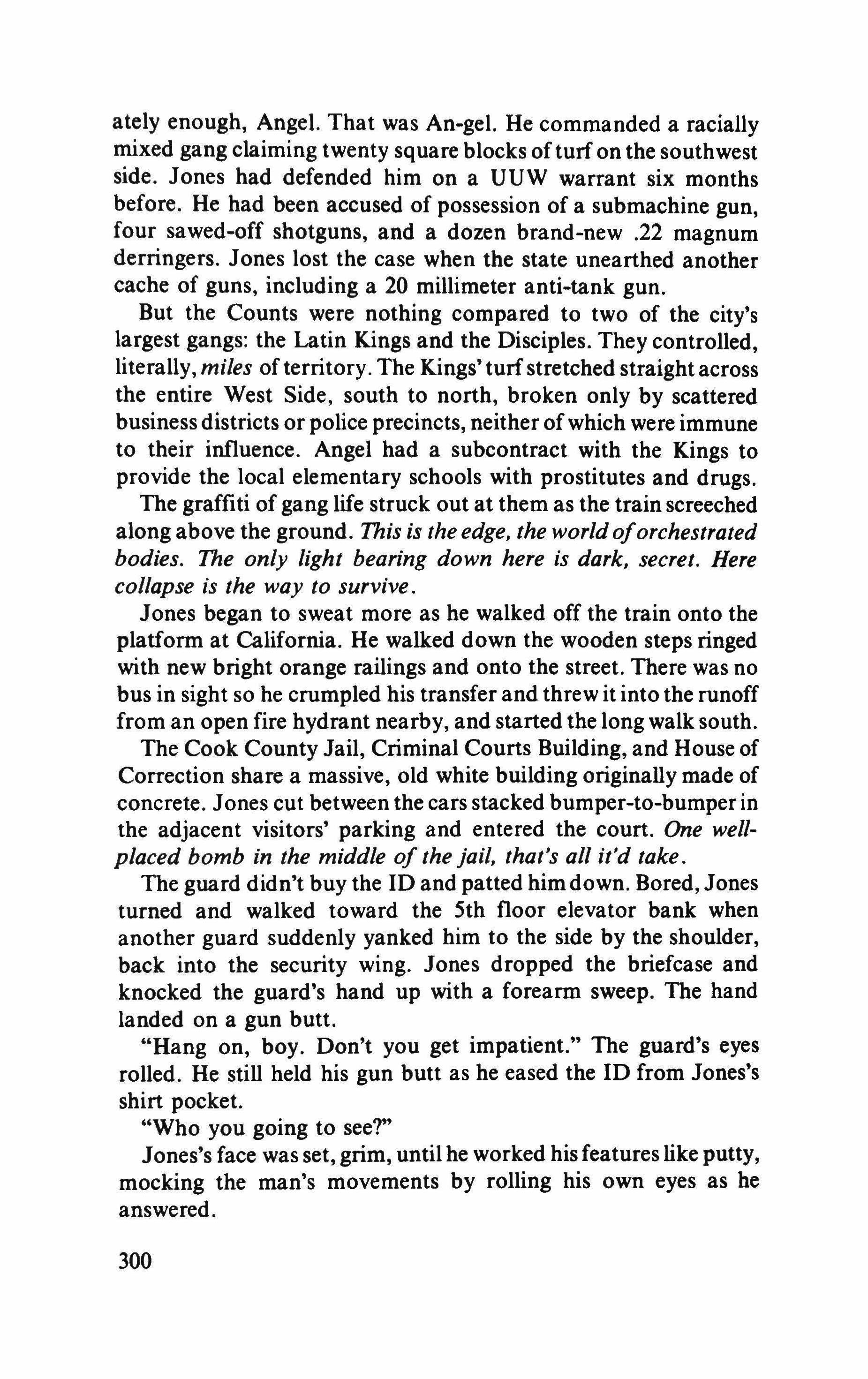
ately enough, Angel. That was An-gel. He commanded a racially mixed gang claiming twenty square blocks ofturf on the southwest side. Jones had defended him on a UUW warrant six months before. He had been accused of possession of a submachine gun, four sawed-off shotguns, and a dozen brand-new .22 magnum derringers. Jones lost the case when the state unearthed another cache of guns, including a 20 millimeter anti-tank gun.
But the Counts were nothing compared to two of the city's largest gangs: the Latin Kings and the Disciples. They controlled, literally, miles ofterritory. The Kings' turfstretched straight across the entire West Side, south to north, broken only by scattered business districts or police precincts, neither ofwhich were immune to their influence. Angel had a subcontract with the Kings to provide the local elementary schools with prostitutes and drugs.
The graffiti of gang life struck out at them as the train screeched along above the ground. This is the edge, the worldoforchestrated bodies. The only light bearing down here is dark, secret. Here collapse is the way to survive.
Jones began to sweat more as he walked off the train onto the platform at California. He walked down the wooden steps ringed with new bright orange railings and onto the street. There was no bus in sight so he crumpled his transfer and threw it into the runoff from an open fire hydrant nearby, and started the long walk south.
The Cook County Jail, Criminal Courts Building, and House of Correction share a massive, old white building originally made of concrete. Jones cut between the cars stacked bumper-to-bumperin the adjacent visitors' parking and entered the court. One wellplaced bomb in the middle of the jail, that's all it'd take.
The guard didn't buy the ID and patted him down. Bored, Jones turned and walked toward the 5th floor elevator bank when another guard suddenly yanked him to the side by the shoulder, back into the security wing. Jones dropped the briefcase and knocked the guard's hand up with a forearm sweep. The hand landed on a gun butt.
"Hang on, boy. Don't you get impatient." The guard's eyes rolled. He still held his gun butt as he eased the ID from Jones's shirt pocket.
"Who you going to see?"
Jones's face was set, grim, until he worked his features like putty, mocking the man's movements by rolling his own eyes as he answered. 300
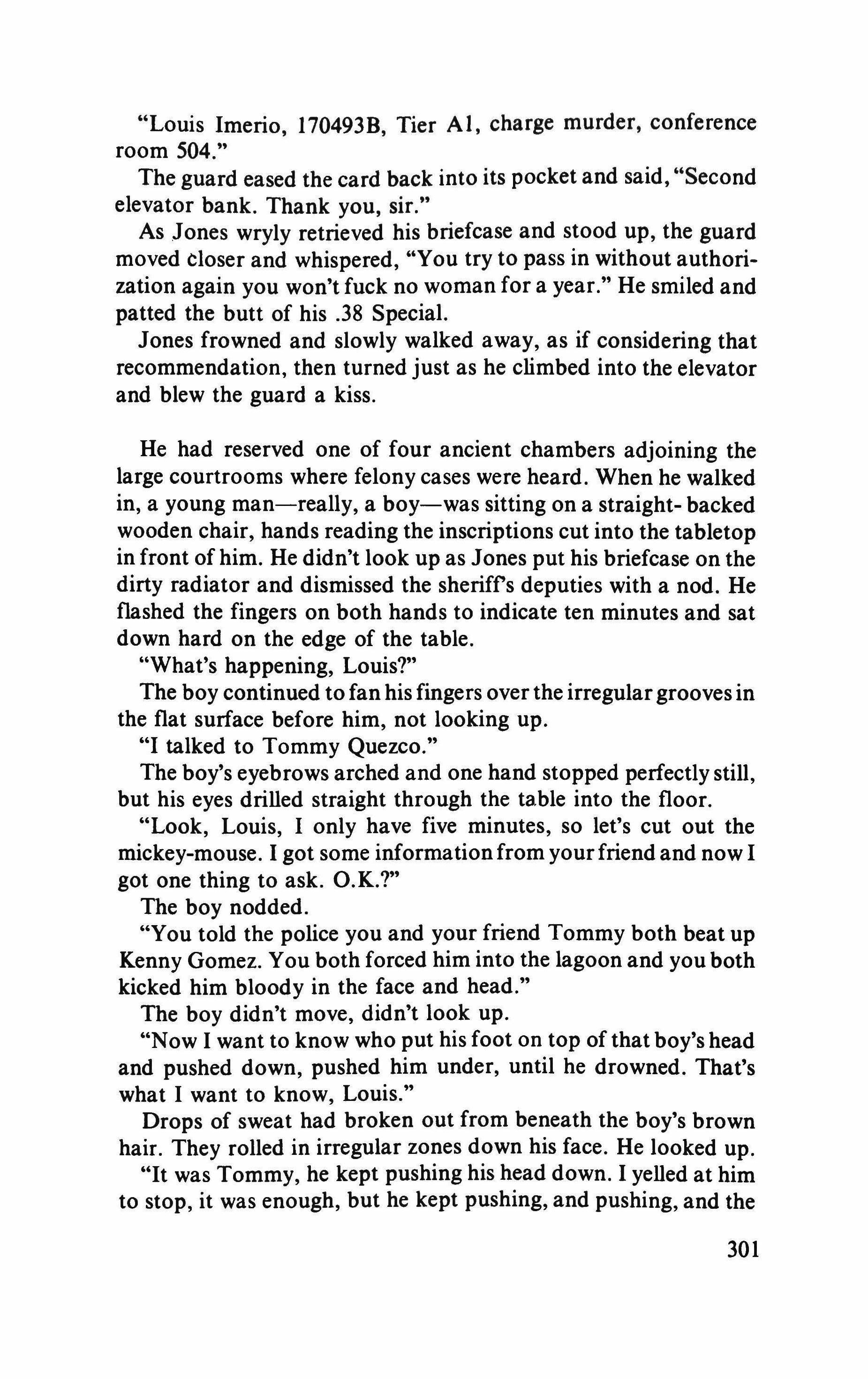
"Louis Imerio, 170493B, Tier AI, charge murder, conference room 504."
The guard eased the card back into its pocket and said, "Second elevator bank. Thank you, sir."
As Jones wryly retrieved his briefcase and stood up, the guard moved closer and whispered, "You try to pass in without authorization again you won't fuck no woman for a year." He smiled and patted the butt of his .38 Special.
Jones frowned and slowly walked away, as if considering that recommendation, then turned just as he climbed into the elevator and blew the guard a kiss.
He had reserved one of four ancient chambers adjoining the large courtrooms where felony cases were heard. When he walked in, a young man-really, a boy-was sitting on a straight- backed wooden chair, hands reading the inscriptions cut into the tabletop in front of him. He didn't look up as Jones put his briefcase on the dirty radiator and dismissed the sheriffs deputies with a nod. He flashed the fingers on both hands to indicate ten minutes and sat down hard on the edge of the table.
"What's happening, Louis?"
The boy continued to fan his fingers over the irregular grooves in the flat surface before him, not looking up.
"I talked to Tommy Quezco."
The boy's eyebrows arched and one hand stopped perfectlystill, but his eyes drilled straight through the table into the floor.
"Look, Louis, 1 only have five minutes, so let's cut out the mickey-mouse. 1 got some information from your friend and now 1 got one thing to ask. O.K.?"
The boy nodded.
"You told the police you and your friend Tommy both beat up Kenny Gomez. You both forced him into the lagoon and you both kicked him bloody in the face and head."
The boy didn't move, didn't look up.
"Now 1 want to know who put his foot on top of that boy's head and pushed down, pushed him under, until he drowned. That's what 1 want to know, Louis."
Drops of sweat had broken out from beneath the boy's brown hair. They rolled in irregular zones down his face. He looked up.
"It was Tommy, he kept pushing his head down. 1 yelled at him to stop, it was enough, but he kept pushing, and pushing, and the

body kept slipping up, lunging, and lunging, like it would never stop. 1 ran through the woods to the project. That's the truth, Mr. Jones. 1 beat him, and bad, but 1 couldn't drown him."
The boy's whole body was shaking as if he were going to be sick. His sweat outlined shadows casting about his face. Jones walked to the radiator, picked up his briefcase, and motioned the deputies in as he headed for the elevator. A tall young black man was engaged in a conversation down the hall, but when he spotted Jones he broke away and tried to catch up with the long, even, but rapid stride.
"Hey, Trav. Slow down, baby. 1 want to talk to you."
"1'1 be at the game, Denny, maybe late. But I'll be there."
"No, Trav. About the Imerio case."
"I have neither the time nor the patience, man. Whatsa matter? You want to drop the charges?"
"Not quite. But we're thinking of continuing until the grandjury can consider the Quezco evidence. We won't proceed with murder one until we can dispose of all the evidence together."
"Forget it, Denny. Tomorrow morning I'm filing a motion for severance and will request an immediate trial for my client."
"Severance! Are you out of your mind? What are your grounds? We've got a PD report and affidavits from witnesses-and confessions."
"And I've got a client who says he maybe an accomplice but that he didn't drown the kid. And a statement of who did. I also have a kid in Audy who's standing mute. And that's just about all 1 need. Besides, Imerio is in bad shape. It wouldn't be hard for him to convince a jury, and then maybe he can talk you into a light sentence, say a five-and-two running wild."
He paused at the elevator bank, waiting for the doors to open. The black man said, "Yeah, sure. You actually bought that b.s.? That was a real merciful killing. They might as well have shot him in the groin with a hot load and left him to bleed to death."
The doors opened and Jones entered the elevator, turning with a cold glare, a hand holding the rubber bumper on one door open.
"So you tell me, Mr. State's Attorney, which ofthese three kids is not responsible for part of what happened that afternoon. You tell me which kid didn't assume a role. You tell me that this was a planned, premeditated murder, a cold, calculated, pure crime of violence. And then tell me that this kid, sitting down there in that
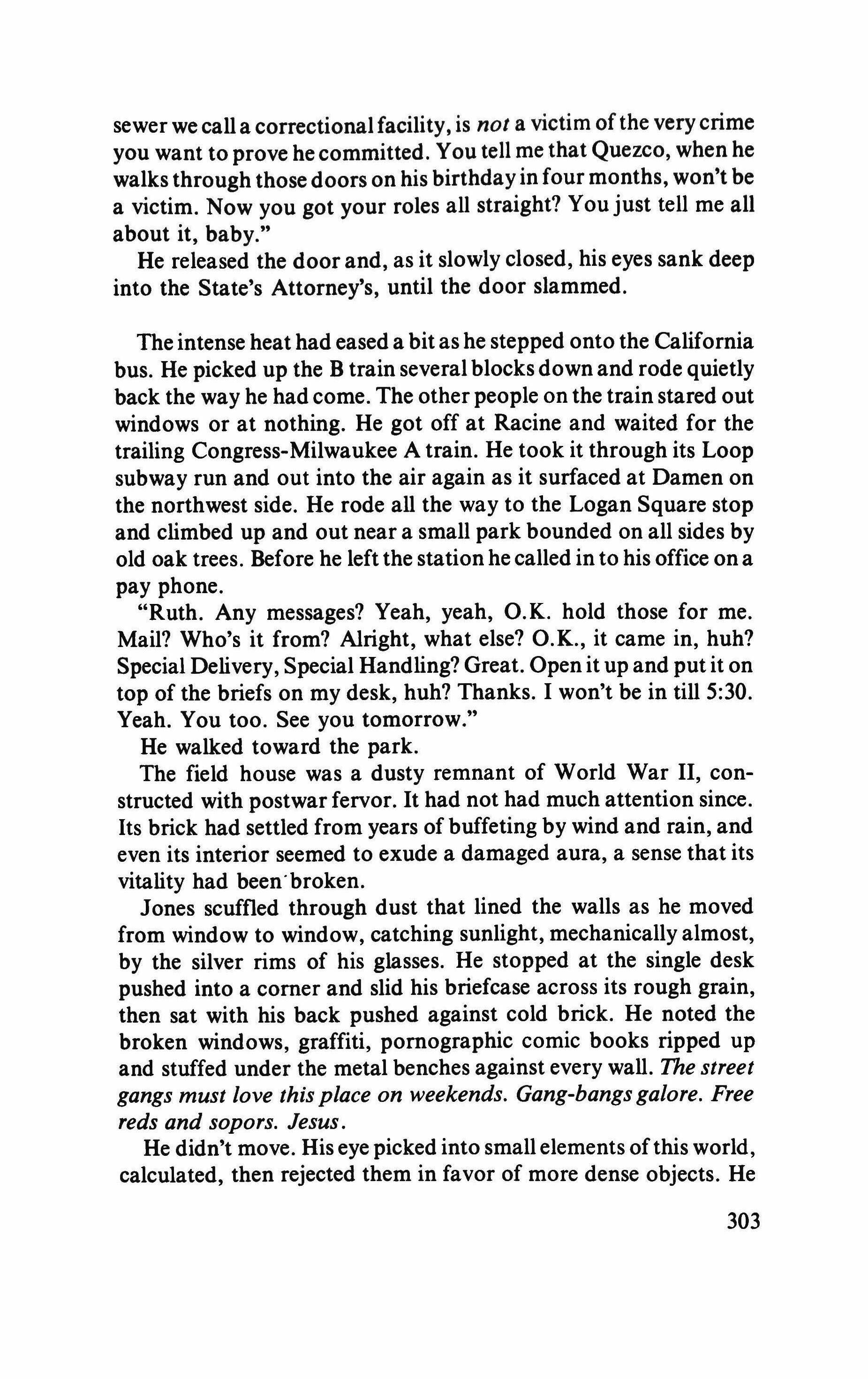
sewer we call a correctional facility, is not a victim of the very crime you want to prove he committed. You tell me that Quezco, when he walks through those doors on his birthday in four months, won't be a victim. Now you got your roles all straight? You just tell me all about it, baby."
He released the door and, as it slowly closed, his eyes sank deep into the State's Attorney's, until the door slammed.
The intense heat had eased a bit as he stepped onto the California bus. He picked up the B train several blocks down and rode quietly back the way he had come. The other people on the train stared out windows or at nothing. He got off at Racine and waited for the trailing Congress-Milwaukee A train. He took it through its Loop subway run and out into the air again as it surfaced at Damen on the northwest side. He rode all the way to the Logan Square stop and climbed up and out near a small park bounded on all sides by old oak trees. Before he left the station he called in to his office on a pay phone.
"Ruth. Any messages? Yeah, yeah, O.K. hold those for me. Mail? Who's it from? Alright, what else? O.K., it came in, huh? Special Delivery, Special Handling? Great. Open it up and put it on top of the briefs on my desk, huh? Thanks. I won't be in till 5:30. Yeah. You too. See you tomorrow."
He walked toward the park.
The field house was a dusty remnant of World War II, constructed with postwar fervor. It had not had much attention since. Its brick had settled from years of buffeting by wind and rain, and even its interior seemed to exude a damaged aura, a sense that its vitality had beenbroken.
Jones scuffled through dust that lined the walls as he moved from window to window, catching sunlight, mechanicallyalmost, by the silver rims of his glasses. He stopped at the single desk pushed into a corner and slid his briefcase across its rough grain, then sat with his back pushed against cold brick. He noted the broken windows, graffiti, pornographic comic books ripped up and stuffed under the metal benches against every wall. The street gangs must love this place on weekends. Gang-bangsgalore. Free reds and sopors. Jesus.
He didn't move. His eye picked into small elements ofthis world, calculated, then rejected them in favor of more dense objects. He

considered the history and life of this place in turns. As time passed and the sun's angle dipped, more and more dust seemed to sift down into the room. Jones sat, immobile, in the midst of this deterioration until his eyes caught a flash of movement near the side door. He heard a Whisper, and all was silent.
"That's alright, Mrs. Gomez, I'm alone, you can come in." He strained to hear against the noise of cans bouncing across the cement playground adjacent to the building.
For several moments nothing moved but Jones's eyes, and shadows throughout the room. Then the side door swung in, almost too quickly, upsetting the equilibrium of the scene. There, beyond the door, stood two figures: a woman, about thirty-five, short, dressed in jeans and an old blouse, and a child, young, maybe eight, evidently a girl, dressed in jeans and a work shirt.
They stepped slowly into the field house, as though any unnecessary motion at all would disrupt their odd bearing.
The woman had the stringiest hair that Jones had ever seen. It was so dirty and oily that it looked like she hadjust been caught out in the open by a sudden summer rainstorm. She held herdaughter's hand. The child had no distinctive qualities ofher own, unattached from her mother, except for a large and somehow disquietinggrin.
"We are alone, Mrs. Gomez." He shoved the old telephone across the desk, clearing a dusty space.
"Sit down."
The woman stood at the other end of the table, near the telephone, meshing her daughter'sfingers with her own. She seemed to look directly past Jones, and up a bit, at a discolored mark on the wall. And Jones followed her gaze back down, ignoring the child, particularly her face.
"Mrs. Gomez, I agreed to talk to you. That's why I'm here. But I don't have forever. What do you want?" She looked past him again.
"Tell me now or I'll be on my way."
She spoke in a monotone, eyes moving from brick to brick behind Jones's head in a monotonous motion that mirrored her voice.
"You are a lawyer for one ofthe boys who killed Kenny. You are a lawyer for the Imerio boy. The newspapers say he will plead innocent. I want to know why you want this boy who killed my son to be free." Her eyes dully reflected errant rays of sunlight.
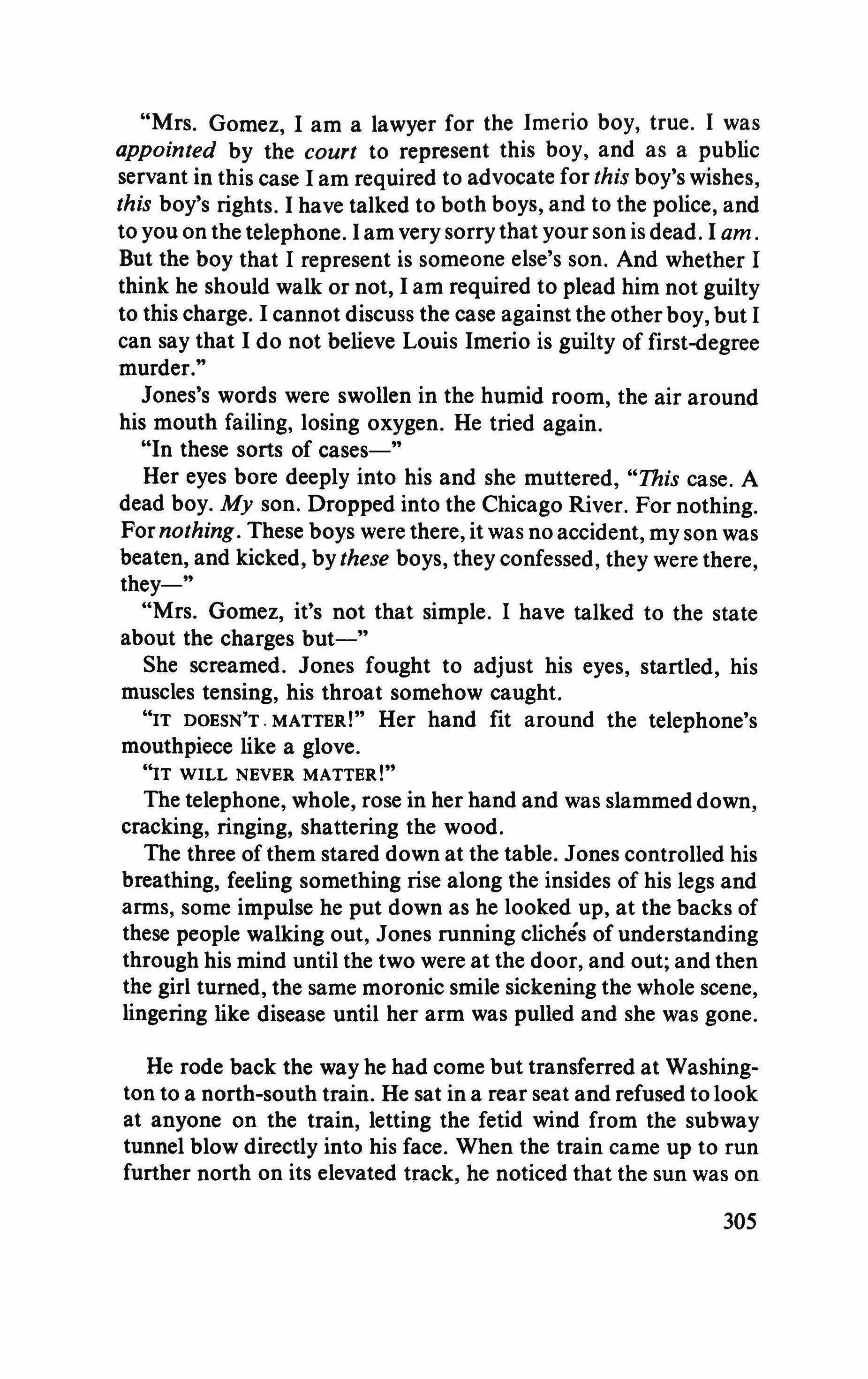
"Mrs. Gomez, I am a lawyer for the Imerio boy, true. I was appointed by the court to represent this boy, and as a public servant in this case I am required to advocate for this boy's wishes, this boy's rights. I have talked to both boys, and to the police, and to you on the telephone. I am very sorry that your son is dead. I am. But the boy that I represent is someone else's son. And whether I think he should walk or not, I am required to plead him not guilty to this charge. I cannot discuss the case against the other boy, but I can say that I do not believe Louis Imerio is guilty of first-degree murder."
Jones's words were swollen in the humid room, the air around his mouth failing, losing oxygen. He tried again.
"In these sorts of cases-"
Her eyes bore deeply into his and she muttered, "This case. A dead boy. My son. Dropped into the Chicago River. For nothing. Fornothing. These boys were there, it was no accident, my son was beaten, and kicked, by these boys, they confessed, they were there, they-"
"Mrs. Gomez, it's not that simple. I have talked to the state about the charges but-"
She screamed. Jones fought to adjust his eyes, startled, his muscles tensing, his throat somehow caught.
"IT DOESN·T. MATTER!" Her hand fit around the telephone's mouthpiece like a glove.
"IT WILL NEVER MATTER!"
The telephone, whole, rose in her hand and was slammed down, cracking, ringing, shattering the wood.
The three of them stared down at the table. Jones controlled his breathing, feeling something rise along the insides of his legs and arms, some impulse he put down as he looked up, at the backs of these people walking out, Jones running cliches of understanding through his mind until the two were at the door, and out; and then the girl turned, the same moronic smile sickening the whole scene, lingering like disease until her arm was pulled and she was gone.
He rode back the way he had come but transferred at Washington to a north-south train. He sat in a rear seat and refused to look at anyone on the train, letting the fetid wind from the subway tunnel blow directly into his face. When the train came up to run further north on its elevated track, he noticed that the sun was on
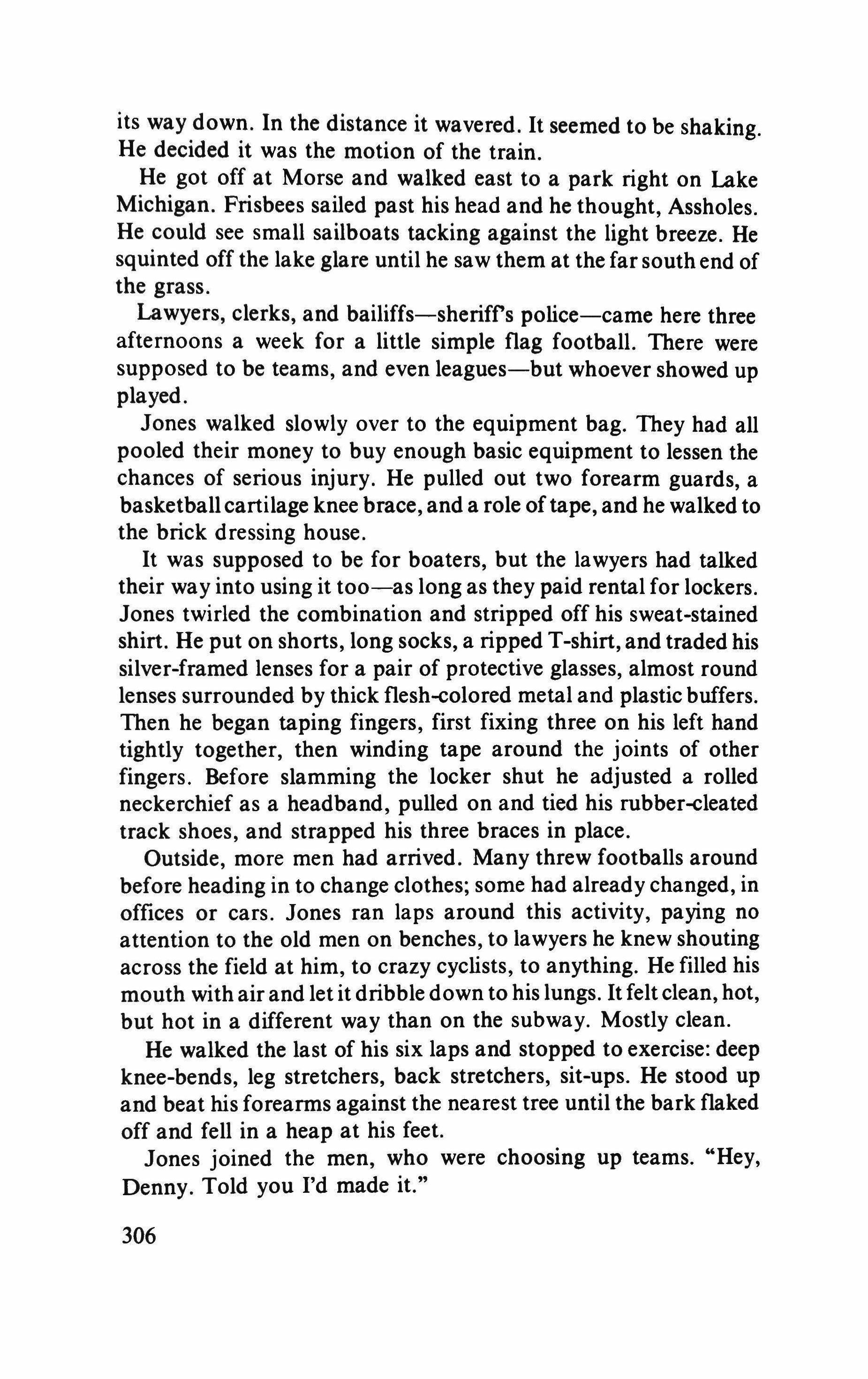
its way down. In the distance it wavered. It seemed to be shaking. He decided it was the motion of the train.
He got off at Morse and walked east to a park right on Lake Michigan. Frisbees sailed past his head and he thought, Assholes. He could see small sailboats tacking against the light breeze. He squinted off the lake glare until he saw them at the far south end of the grass.
Lawyers, clerks, and bailiffs=-shenff's police-came here three afternoons a week for a little simple flag football. There were supposed to be teams, and even leagues-but whoever showed up played.
Jones walked slowly over to the equipment bag. They had all pooled their money to buy enough basic equipment to lessen the chances of serious injury. He pulled out two forearm guards, a basketballcartilage knee brace, and a role oftape, and he walked to the brick dressing house.
It was supposed to be for boaters, but the lawyers had talked their way into using it too-as long as they paid rental for lockers. Jones twirled the combination and stripped off his sweat-stained shirt. He put on shorts, long socks, a ripped T-shirt, and traded his silver-framed lenses for a pair of protective glasses, almost round lenses surrounded by thick flesh-colored metal and plastic buffers. Then he began taping fingers, first fixing three on his left hand tightly together, then winding tape around the joints of other fingers. Before slamming the locker shut he adjusted a rolled neckerchief as a headband, pulled on and tied his rubber-cleated track shoes, and strapped his three braces in place.
Outside, more men had arrived. Many threw footballs around before heading in to change clothes; some had already changed, in offices or cars. Jones ran laps around this activity, paying no attention to the old men on benches, to lawyers he knew shouting across the field at him, to crazy cyclists, to anything. He filled his mouth with air and let it dribble down to his lungs. It felt clean, hot, but hot in a different way than on the subway. Mostly clean.
He walked the last of his six laps and stopped to exercise: deep knee-bends, leg stretchers, back stretchers, sit-ups. He stood up and beat his forearms against the nearest tree until the bark flaked off and fell in a heap at his feet.
Jones joined the men, who were choosing up teams. "Hey, Denny. Told you I'd made it."
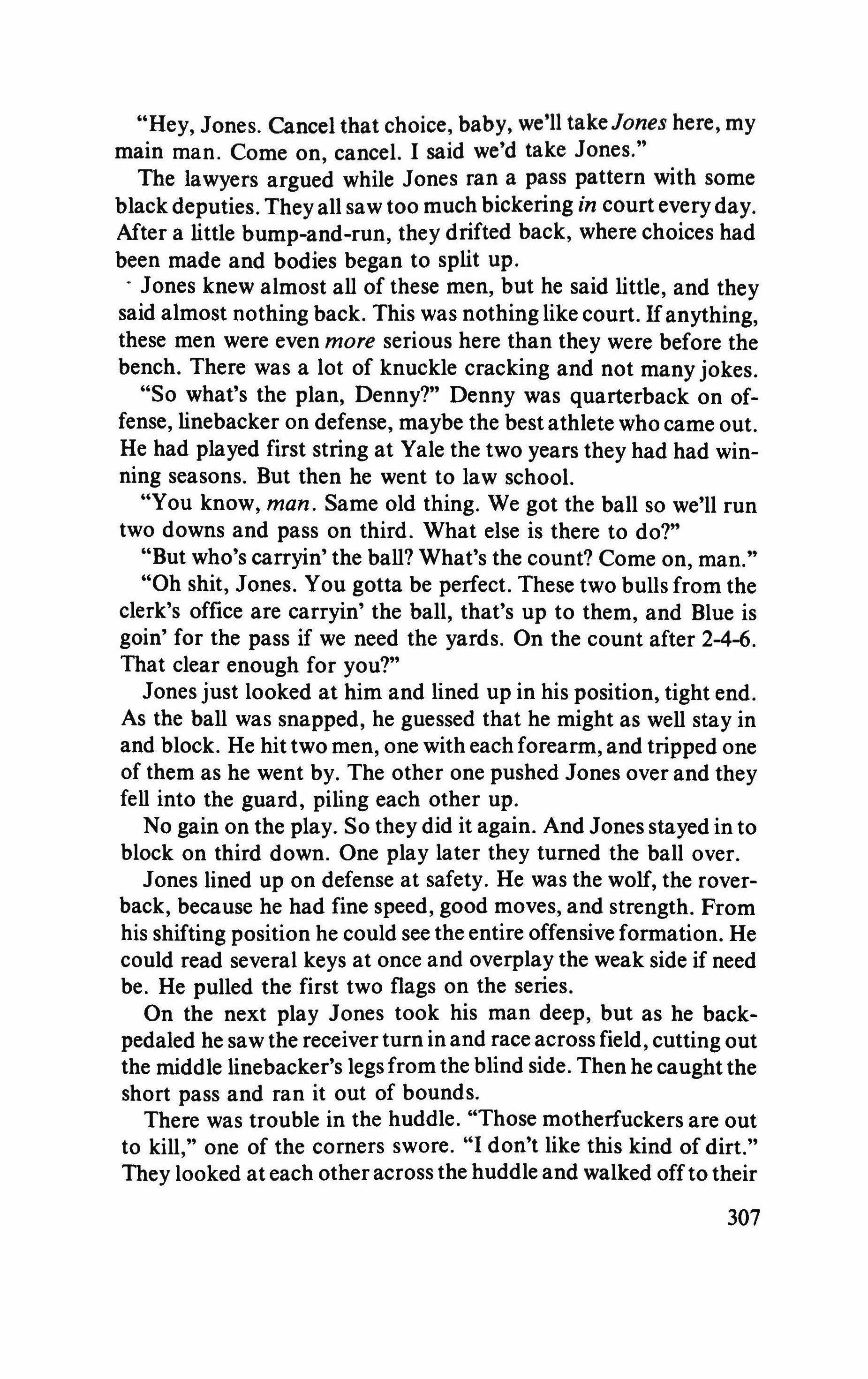
"Hey, Jones. Cancel that choice, baby, we'll take Jones here, my main man. Come on, cancel. 1 said we'd take Jones."
The lawyers argued while Jones ran a pass pattern with some black deputies. They all saw too much bickering in court every day. After a little bump-and-run, they drifted back, where choices had been made and bodies began to split up
Jones knew almost all of these men, but he said little, and they said almost nothing back. This was nothing like court. Ifanything, these men were even more serious here than they were before the bench. There was a lot of knuckle cracking and not many jokes.
"So what's the plan, Denny?" Denny was quarterback on offense, linebacker on defense, maybe the best athlete who came out. He had played first string at Yale the two years they had had winning seasons. But then he went to law school.
"You know, man. Same old thing. We got the ball so we'll run two downs and pass on third. What else is there to do?"
"But who's carryin' the ball? What's the count? Come on, man."
"Oh shit, Jones. You gotta be perfect. These two bulls from the clerk's office are carryin' the ball, that's up to them, and Blue is goin' for the pass if we need the yards. On the count after 2-4-6. That clear enough for you?"
Jones just looked at him and lined up in his position, tight end. As the ball was snapped, he guessed that he might as well stay in and block. He hit two men, one with each forearm, and tripped one of them as he went by. The other one pushed Jones over and they fell into the guard, piling each other up.
No gain on the play. So they did it again. And Jones stayed in to block on third down. One play later they turned the ball over.
Jones lined up on defense at safety. He was the wolf, the roverback, because he had fine speed, good moves, and strength. From his shifting position he could see the entire offensive formation. He could read several keys at once and overplay the weak side if need be. He pulled the first two flags on the series.
On the next play Jones took his man deep, but as he backpedaled he saw the receiver turn in and race across field, cutting out the middle linebacker's legs from the blind side. Then he caught the short pass and ran it out of bounds.
There was trouble in the huddle. "Those motherfuckers are out to kill," one of the corners swore. "I don't like this kind of dirt." They looked at each other across the huddle and walked off to their
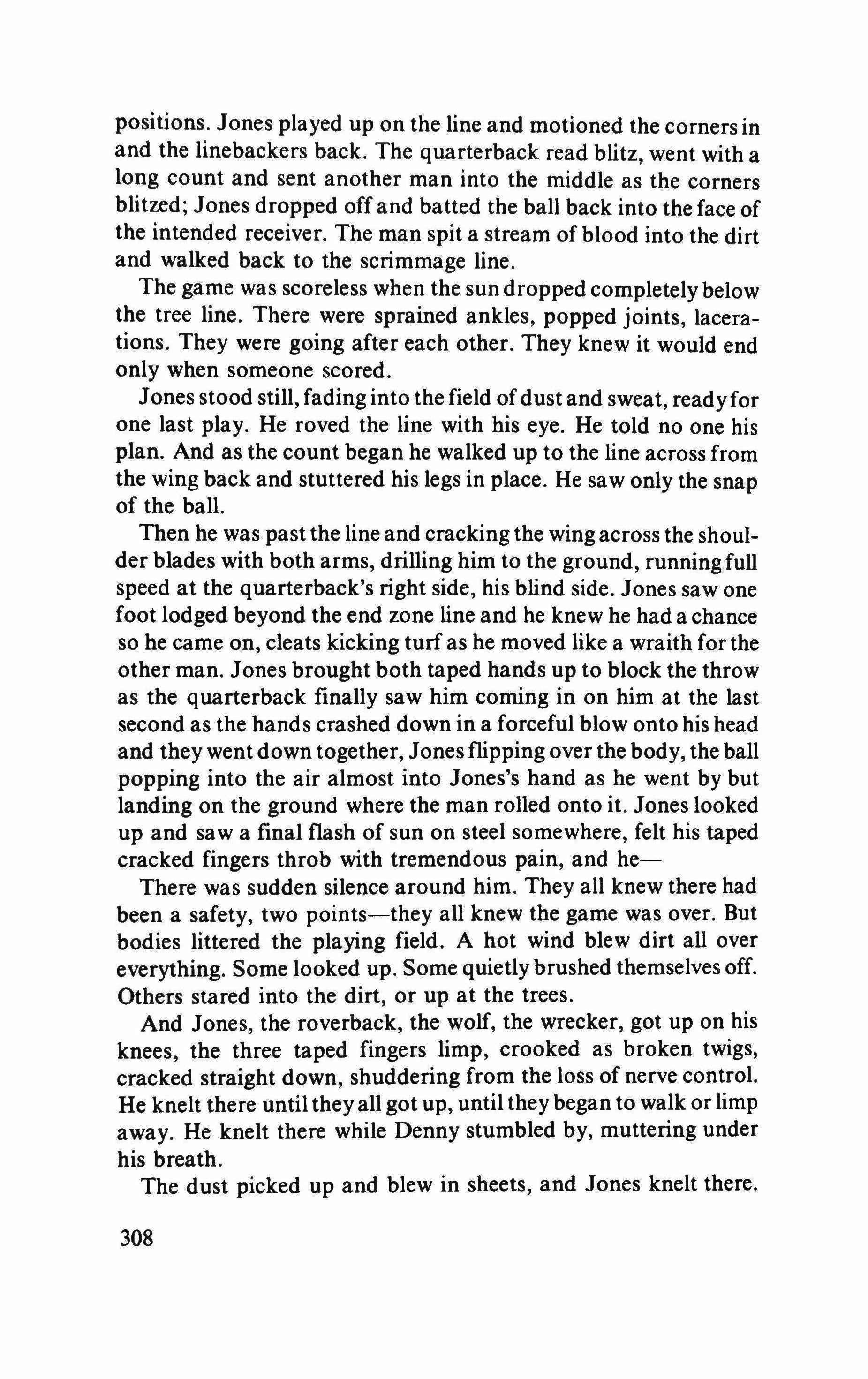
positions. Jones played up on the line and motioned the corners in and the linebackers back. The quarterback read blitz, went with a long count and sent another man into the middle as the corners blitzed; Jones dropped off and batted the ball back into the face of the intended receiver. The man spit a stream of blood into the dirt and walked back to the scrimmage line.
The game was scoreless when the sun dropped completelybelow the tree line. There were sprained ankles, popped joints, lacerations. They were going after each other. They knew it would end only when someone scored.
Jones stood still,fading into the field ofdust and sweat, readyfor one last play. He roved the line with his eye. He told no one his plan. And as the count began he walked up to the line across from the wing back and stuttered his legs in place. He saw only the snap of the ball.
Then he was past the line and cracking the wing across the shoulder blades with both arms, drilling him to the ground, runningfull speed at the quarterback's right side, his blind side. Jones saw one foot lodged beyond the end zone line and he knew he had a chance so he came on, cleats kicking turf as he moved like a wraith for the other man. Jones brought both taped hands up to block the throw as the quarterback finally saw him coming in on him at the last second as the hands crashed down in a forceful blow onto his head and they went down together, Jones flipping over the body, the ball popping into the air almost into Jones's hand as he went by but landing on the ground where the man rolled onto it. Jones looked up and saw a final flash of sun on steel somewhere, felt his taped cracked fingers throb with tremendous pain, and he-
There was sudden silence around him. They all knew there had been a safety, two points-they all knew the game was over. But bodies littered the playing field. A hot wind blew dirt all over everything. Some looked up. Some quietly brushed themselves off. Others stared into the dirt, or up at the trees.
And Jones, the roverback, the wolf, the wrecker, got up on his knees, the three taped fingers limp, crooked as broken twigs, cracked straight down, shuddering from the loss of nerve control. He knelt there until they all got up, until theybegan to walk or limp away. He knelt there while Denny stumbled by, muttering under his breath.
The dust picked up and blew in sheets, and Jones knelt there.
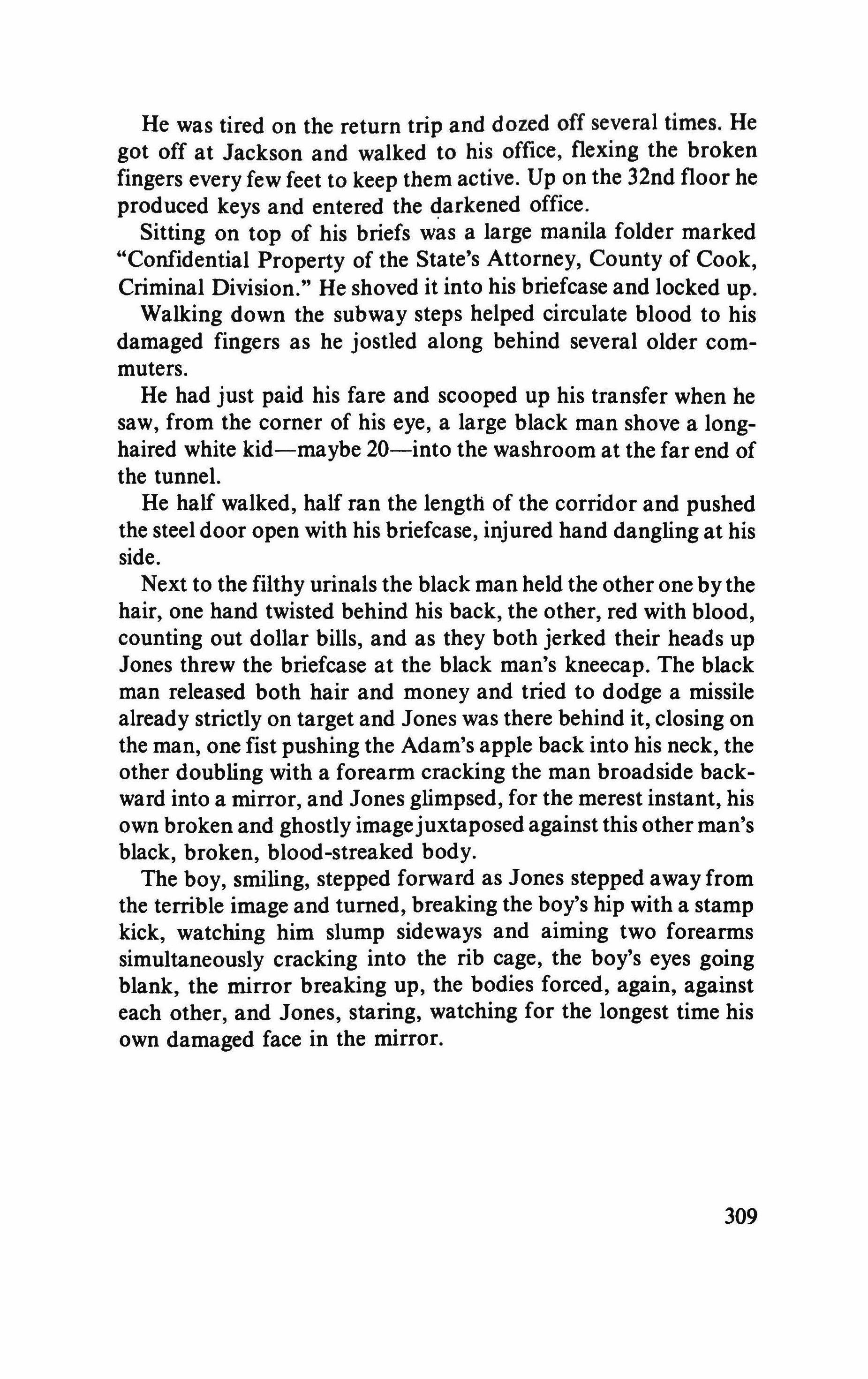
He was tired on the return trip and dozed off several times. He got off at Jackson and walked to his office, flexing the broken fingers every few feet to keep them active. Up on the 32nd floor he produced keys and entered the darkened office.
Sitting on top of his briefs was a large manila folder marked "Confidential Property of the State's Attorney, County of Cook, Criminal Division." He shoved it into his briefcase and locked up.
Walking down the subway steps helped circulate blood to his damaged fingers as he jostled along behind several older commuters.
He had just paid his fare and scooped up his transfer when he saw, from the corner of his eye, a large black man shove a longhaired white kid-maybe 20-into the washroom at the far end of the tunnel.
He half walked, half ran the length of the corridor and pushed the steel door open with his briefcase, injured hand dangling at his side.
Next to the filthy urinals the black man held the other one by the hair, one hand twisted behind his back, the other, red with blood, counting out dollar bills, and as they both jerked their heads up Jones threw the briefcase at the black man's kneecap. The black man released both hair and money and tried to dodge a missile already strictly on target and Jones was there behind it, closing on the man, one fist pushing the Adam's apple back into his neck, the other doubling with a forearm cracking the man broadside backward into a mirror, and Jones glimpsed, for the merest instant, his own broken and ghostly imagejuxtaposed against this other man's black, broken, blood-streaked body.
The boy, smiling, stepped forward as Jones stepped away from the terrible image and turned, breaking the boy's hip with a stamp kick, watching him slump sideways and aiming two forearms simultaneously cracking into the rib cage, the boy's eyes going blank, the mirror breaking up, the bodies forced, again, against each other, and Jones, staring, watching for the longest time his own damaged face in the mirror.
Contributors:

Jay Neugeboren is the author of six books, including Sem's Legacy and An Orphan's Tale. He is currently a writer-in-residence at the University of Massachusetts. Milovan Djilas was born in Montenegro in 1911 and now lives in Belgrade. His many published works include two critical studies of Communism: The New Class and Conversations with Stalin; as well as three autobiographical works: Land Without Justice, Memoir of a Revolutionary, and Wal1ime. "Potatoes, Linseeds and Marzipan-Kings" is Lillian Gewirtzman's first published story. She is working toward her M.A. in Philosophy at Queens College in New York. Ian MacMillan teaches creative writing at the University of Hawaii and has published stories in numerous magazines. His novel Blakeley'sArk will be published next year by Berkeley/Putnam. Arnost Lustig, a native of Prague, was interned at Theresienstdadt, Buchenwald, and Auschwitz. He has published thirteen books, including Darkness Casts No Shadows, Night andHope, and A Prayerfor Katerina Horovitzova-which was nominated for a National Book Award. He teaches film and literature at American University in Washington, D.C. Kent Anderson has served in the Merchant Marine, as a Special Forces Sergeant in Vietnam, and as a patrolman. His "Sympathy for the Devil is excerpted from a novel-in-progress under contract to Houghton

Mifflin. He lives in Columbia, Missouri. Eric Hansen's stories have appeared in Denver Quarterly and Bridge. He lives in New Hampshire, where he teaches high school and is at work on a novel. Asa Baber is a freelance writer living in Chicago. His novel about the Vietnam War, The Land 0/ a Million Elephants, was published in 1970. A collection of his stories will be published by Fiction International in spring 1979. W.D. Ehrhart teaches English and History at Sandy Spring Friends School in Maryland. As a former Marine Corps Sergeant, he has been active in Vietnam Veterans Against the War, co-edited Demilitarized Zones: Veterans After Vietnam, and contributed to Winning Hearts and Minds. He has published three chapbooks of poetry. Larry Heinemann is a Vietnam combat veteran and the author of a novel, Close Quarters; a play, Quinn; and a numberof short stories. He lives in Chicago, where he is a senior Story Workshop director in the Advanced Writing Program at Columbia College. Charles A. Coleman Jr. 's "In Loco Parentis" is excerpted from The Catalogue ofChameleons, a documentary concerning the treatment of mind-damaged Vietnam veterans. He lives in Massachusetts where he is at work on a novel, Family Secrets. Jay Cantor's "Bolivia" is excerpted from his novel-in-progress about the life and death of Che Guevara. He has published stories in a number of magazines. He is a member of the Department of English at Thfts University. Benedict Kiely is a native ofCounty Tyrone, Ireland, and now lives in Dublin. He has worked as a journalist and broadcaster in Ireland and in the United States. His most recent books include a novel, Dogs Enjoy the Morning, and a collection of stories, A Ball 0/ Malt & Madame Butterfly. A translation ofProxopera appeared in the German edition of Playboy. John Jacob is a freelance writer and teacher living in Chicago. A collection of his urban stories, including "Safety," will appear from Black Cat Bone Press (Chicago) in 1979. He is at work on a book about street gangs. Ron VIllani is a Chicago based illustrator and painter. After graduating from the School of the Art Institute in Chicago, he worked as a painter and sculptor in Europe and the U.S. He is currently design director for Encyclopaedia Britannica. He has produced work for numerous agencies as well as Skeptic and Playboy.
 by Frederic Manning
by Frederic Manning
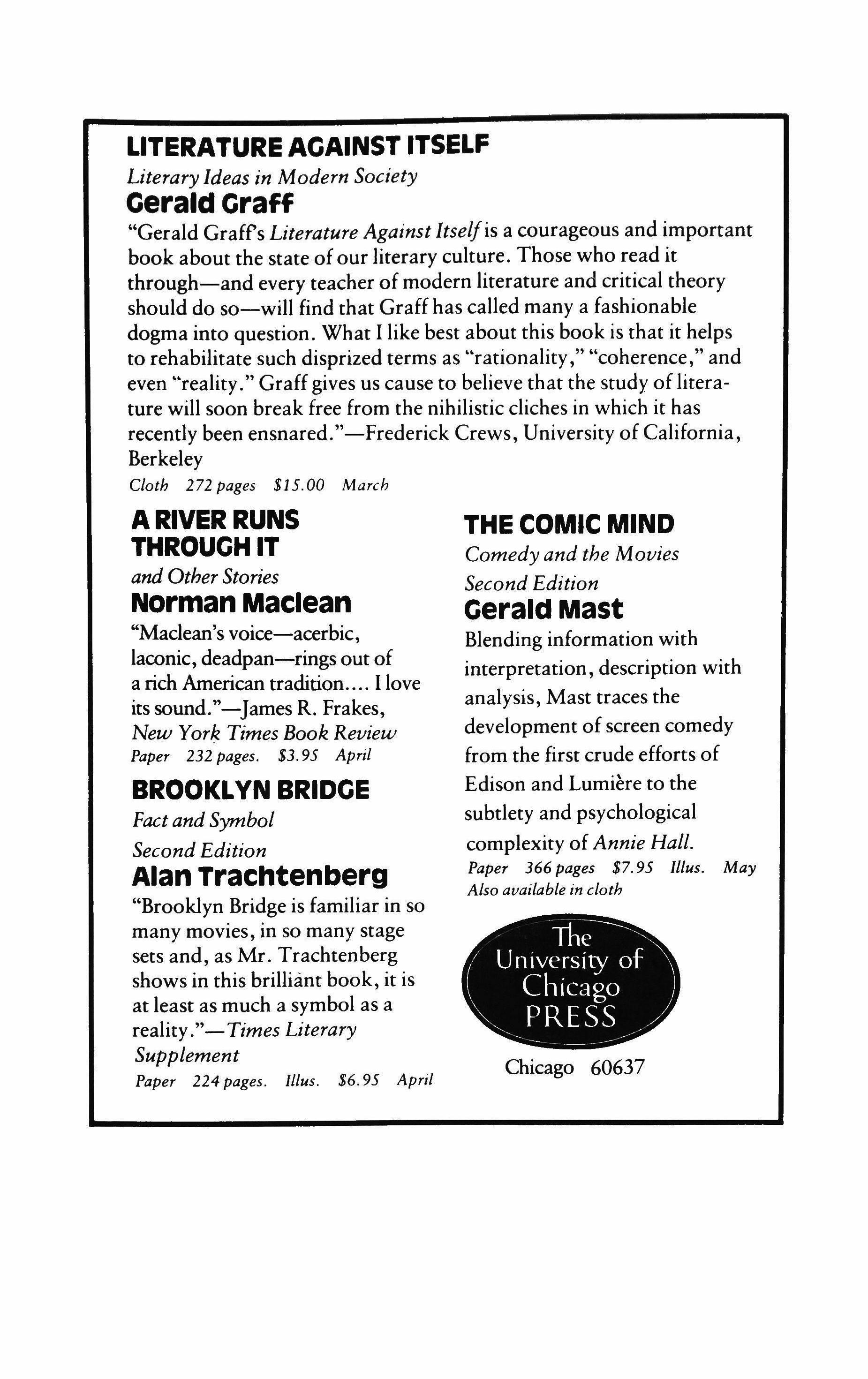
LITERATURE ACAINST ITSELF
Literary Ideas in Modern Society
Cerald Craff
"Gerald Graff's Literature Against Itselfis a courageous and important book about the state of our literary culture. Those who read it through-and every teacher of modern literature and critical theory should do so-will find that Graff has called many a fashionable dogma into question. What I like best about this book is that it helps to rehabilitate such disprized terms as "rationality," "coherence," and even "reality." Graff gives us cause to believe that the study of literature will soon break free from the nihilistic cliches in which it has recently been ensnared."-Frederick Crews, University of California, Berkeley Cloth 272 pages $15.00 March
A RIVER RUNS THROUCH IT
and Other Stories
NOrman Maclean
"Maclean's voice-acerbic, laconic, deadpan-rings out of a rich American tradition I love its sound."-James R. Frakes, New York Times Book Review Paper 232 pages. $3.95 April
BROOKLYN BRIDCE
Fact and Symbol
Second Edition
Alan Trachtenberg
"Brooklyn Bridge is familiar in so many movies, in so many stage sets and, as Mr. Trachtenberg shows in this brilliant book, it is at least as much a symbol as a reality." - Times Literary Supplement Paper 224 pages. IIIus. $6.95 April
THE COMIC MIND
Comedy and the Movies
Second Edition
Cerald Mast
Blending information with interpretation, description with analysis, Mast traces the development of screen comedy from the first crude efforts of Edison and Lumiere to the subtlety and psychological complexity of Annie Hall. Paper 366 pages $7.95 IIIus. May Also available in cloth
Continuous publication since 1912
POETRY
NEWS NOTES
REVIEWS
Editor
JOHN FREDEruCK NIMSThere is nothing quite like it anywhere else: Poetry has had imitators, but has so far survived them all. It is an American Institution. To poetry-readers abroad it is still the magazine to which we look first, to make us aware of whatever new poetic talent appears in the U.S.A

I wish to subscribe to POETRY. I enclose: 0 $18.00 for one year 0 $33.00 for two years.
o I would like to become an Associate ofthe Modern Poetry Association, the non-profit organization which supports POETRY. Enclosed is my check for $35, which includes the cost of a one-year subscription.
THEPARIS REVIEW

"The biggest 'little magazine' in history!" -Time
"The best-known journal of its kind in the English language." -Saturday Review ofLiterature
"An extremely professional and variegated magazine."
-John Wain, The Observer

These are some of the people who have written for
PARTISAN REVIEW
A. Alvarez. Jonathan Baumbach. Samuel Beckett. Norman Birnbaum. Harold Brodkey. Peter Brooks. Robert Brustein. Anthony Burgess. Noam Chomsky. Robert Coles. Robert Coover. Robert Creeley. Morris Dickstein. Martin Duberman, Jules Feiffer. Leslie Fiedler. Michel Foucault. William Gass, Richard Gilman. Allen Ginsberg. Peter Handke. Michael Harrington. Lillian Hellman. Richard Howard. Irving Howe. Frank Kermode, Christopher Lasch. Doris Lessing. Denise Levertov. Robert Lowell. Jack Ludwig. Norman Mailer. Steven Marcus. Herbert Marcuse. James Merrill. Leonard Michaels. Mark Mirsky. Juliet Mitchell. Hans Morgenthau. Victor Navasky. Joyce Carol Oates. Marge Piercy. Richard Poirier. Adrienne Rich. Barbara Rose. Philip Roth. Arthur Schlesinger. Jr.• Alan Sillitoe. Susan Sontag. Gilbert Sorrentino. Stephen Spender. Christina Stead. William Styron. Ronald Sukenick. Tony Tanner. James Tate. Diana Trilling. Gore Vidal. Robert Penn Warren
Why don't you become one of our readers?
PARTISAN REVIEW c/o Boston University, 128 Bay State Rd., Boston, MA 02215
Enter
ComicReHef
Humor In Contemporary American Uterature
Edited by Sarah Blacher Cohen
No other recent anthology of black literature. scholarship. and art has drawn so deeply from the well of black creativity as Chant ofSaints. In its pages are fiction (by Ralph Ellison. Ernest J. Gaines. Gayl Jones. James Alan McPherson. John O. Stewart. Toni Morrison. Leon Forrest): interviews' (of Ellison. Forrest. Jones. Morrison. Derek Walcott): poems (by Robert Hayden. Michael S. Harper. Sherley Anne Williams. Walcott. Jay Wright): critical essays: photographs: art: prose pieces. John Hope Franklin writes in his foreword that Chant ofSaints "may well be regarded as a yardstick by which to measure the evolution of Afro· American literature and culture since the appearance of The New Negro in 1925." Cloth. $20.00: paper. $7.95.
'The criticism of humor can be a deadly business. but this sparkling collection of essays-dealing with American humor of the 1950's and 1960's-is amusing and stimulating, albeit scholarly. Editor Cohen presents a wide-ranging overview. by 17 authors. of today's humor. Included are Max Schulz on black humor, John Vernon on humor in current po�. C. Hugh Holman on Southern humor. David Ketterer on science fiction humor, Wendy Martin on Mary McCarthy's satire, George Garrett on WASP humor Sharp analysis is given to Nabokov. Barth. Roth, Bellow. and fellow comics Invaluable to researchists is editor Cohen's 12-page bibliography ofcritical works on contemporary American humor." -Choice. "A fine job." -AlA Booklist. $15.00.
ChantofSaints
A Gathering of Afro-American Uterature. Art. and Scholarship
Edited by Michael S. Harper and Robert B. Stepto. Foreword byJohn HopeFranklin

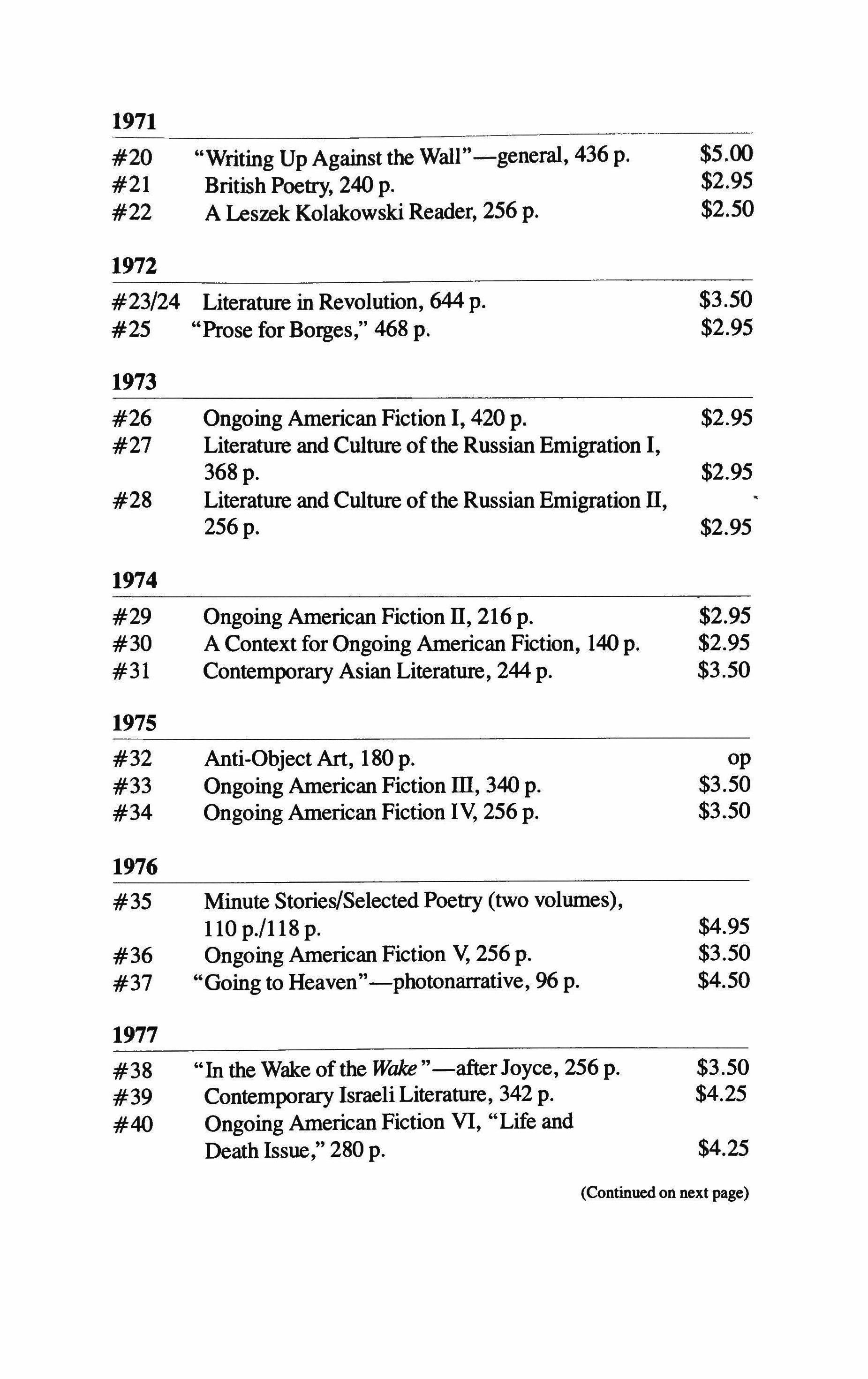
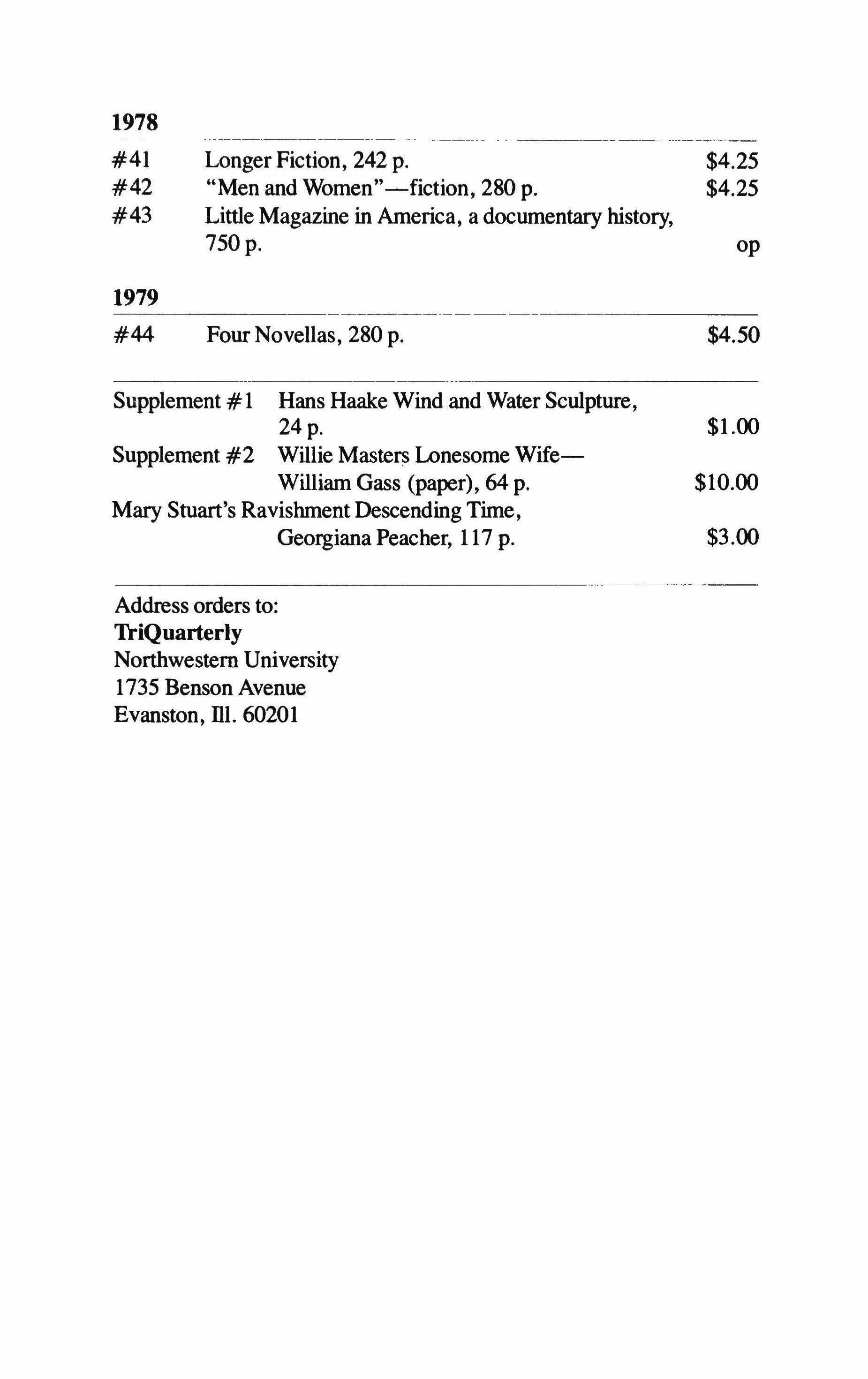
#41 #42 #43 Longer Fiction, 242 p. "Men and Women"-fiction, 280 p. Little Magazine in America, a documentary history, 750p. 1979 $4.25 $4.25 op #44 Four Novellas, 280 p. $4.50
Supplement # 1 Hans Haake Wind and Water Sculpture, 24p.
Supplement #2 Willie Masters Lonesome WifeWilliam Gass (paper), 64 p.
Mary Stuart's Ravishment Descending Time, Georgiana Peacher, 117 p.
Address

